| schema location: | ..\schema\railML.xsd |
| attributeFormDefault: | |
| elementFormDefault: | qualified |
| targetNamespace: | https://www.railml.org/schemas/2018 |
| Elements |
| railml |
| schema location: | ..\schema\infrastructure.xsd |
| attributeFormDefault: | |
| elementFormDefault: | qualified |
| targetNamespace: | https://www.railml.org/schemas/2018 |
| schema location: | ..\schema\rollingstock.xsd |
| attributeFormDefault: | |
| elementFormDefault: | qualified |
| targetNamespace: | https://www.railml.org/schemas/2018 |
| schema location: | ..\schema\timetable.xsd |
| attributeFormDefault: | |
| elementFormDefault: | qualified |
| targetNamespace: | https://www.railml.org/schemas/2018 |
| schema location: | ..\schema\infrastructureTypes.xsd |
| attributeFormDefault: | |
| elementFormDefault: | qualified |
| targetNamespace: | https://www.railml.org/schemas/2018 |
| schema location: | http://www.w3.org/2001/03/xml.xsd |
| attributeFormDefault: | |
| elementFormDefault: | |
| targetNamespace: | http://www.w3.org/XML/1998/namespace |
| Attributes | Attr. groups |
| base | specialAttrs |
| lang | |
| space |
| schema location: | ..\schema\rollingstockTypes.xsd |
| attributeFormDefault: | |
| elementFormDefault: | qualified |
| targetNamespace: | https://www.railml.org/schemas/2018 |
| schema location: | ..\schema\timetableTypes.xsd |
| attributeFormDefault: | |
| elementFormDefault: | qualified |
| targetNamespace: | https://www.railml.org/schemas/2018 |
| schema location: | ..\schema\railwayUnits.xsd |
| attributeFormDefault: | |
| elementFormDefault: | qualified |
| targetNamespace: | https://www.railml.org/schemas/2018 |
| schema location: | ..\schema\railwayBaseTypes.xsd |
| attributeFormDefault: | |
| elementFormDefault: | qualified |
| targetNamespace: | https://www.railml.org/schemas/2018 |
| schema location: | ..\schema\physicalUnits.xsd |
| attributeFormDefault: | |
| elementFormDefault: | qualified |
| targetNamespace: | https://www.railml.org/schemas/2018 |
| schema location: | ..\schema\genericRailML.xsd |
| attributeFormDefault: | |
| elementFormDefault: | qualified |
| targetNamespace: | https://www.railml.org/schemas/2018 |
| schema location: | http://dublincore.org/schemas/xmls/qdc/2008/02/11/dc.xsd |
| attributeFormDefault: | unqualified |
| elementFormDefault: | qualified |
| targetNamespace: | http://purl.org/dc/elements/1.1/ |
| Elements | Groups | Complex types |
| any | elementsGroup | elementContainer |
| contributor | SimpleLiteral | |
| coverage | ||
| creator | ||
| date | ||
| description | ||
| format | ||
| identifier | ||
| language | ||
| publisher | ||
| relation | ||
| rights | ||
| source | ||
| subject | ||
| title | ||
| type |
element railml
| diagram |  |
||||||||||||||||||||||||||||||||||||||||||||||||||||||||||||||||||||||||||||||||||||||||||||||||||||||||||||||||||||||||||||||||||||||||||||||||||||||||||||||||||||||||||||||||||||||||||||||||||||||||||||||||||||||||||||||||||||||||||||||||||||||||||||||||||||||||||||||||||||||||||||||||||||||||||||||||||||||||||||||||||||||||||||||||||||||||||||||||||||||||||||||||||||||||||||||||||||||||||||||||||||||||||||||||||||||||||||||||||||||||||||||||||||||||||||||||||||||||||||||||||||||||||||||||||
| namespace | https://www.railml.org/schemas/2018 | ||||||||||||||||||||||||||||||||||||||||||||||||||||||||||||||||||||||||||||||||||||||||||||||||||||||||||||||||||||||||||||||||||||||||||||||||||||||||||||||||||||||||||||||||||||||||||||||||||||||||||||||||||||||||||||||||||||||||||||||||||||||||||||||||||||||||||||||||||||||||||||||||||||||||||||||||||||||||||||||||||||||||||||||||||||||||||||||||||||||||||||||||||||||||||||||||||||||||||||||||||||||||||||||||||||||||||||||||||||||||||||||||||||||||||||||||||||||||||||||||||||||||||||||||||
| properties |
|
||||||||||||||||||||||||||||||||||||||||||||||||||||||||||||||||||||||||||||||||||||||||||||||||||||||||||||||||||||||||||||||||||||||||||||||||||||||||||||||||||||||||||||||||||||||||||||||||||||||||||||||||||||||||||||||||||||||||||||||||||||||||||||||||||||||||||||||||||||||||||||||||||||||||||||||||||||||||||||||||||||||||||||||||||||||||||||||||||||||||||||||||||||||||||||||||||||||||||||||||||||||||||||||||||||||||||||||||||||||||||||||||||||||||||||||||||||||||||||||||||||||||||||||||||
| children | rail:metadata rail:infrastructure rail:infrastructureVisualizations rail:rollingstock rail:timetable | ||||||||||||||||||||||||||||||||||||||||||||||||||||||||||||||||||||||||||||||||||||||||||||||||||||||||||||||||||||||||||||||||||||||||||||||||||||||||||||||||||||||||||||||||||||||||||||||||||||||||||||||||||||||||||||||||||||||||||||||||||||||||||||||||||||||||||||||||||||||||||||||||||||||||||||||||||||||||||||||||||||||||||||||||||||||||||||||||||||||||||||||||||||||||||||||||||||||||||||||||||||||||||||||||||||||||||||||||||||||||||||||||||||||||||||||||||||||||||||||||||||||||||||||||||
| attributes |
|
||||||||||||||||||||||||||||||||||||||||||||||||||||||||||||||||||||||||||||||||||||||||||||||||||||||||||||||||||||||||||||||||||||||||||||||||||||||||||||||||||||||||||||||||||||||||||||||||||||||||||||||||||||||||||||||||||||||||||||||||||||||||||||||||||||||||||||||||||||||||||||||||||||||||||||||||||||||||||||||||||||||||||||||||||||||||||||||||||||||||||||||||||||||||||||||||||||||||||||||||||||||||||||||||||||||||||||||||||||||||||||||||||||||||||||||||||||||||||||||||||||||||||||||||||
| identity constraints |
|
||||||||||||||||||||||||||||||||||||||||||||||||||||||||||||||||||||||||||||||||||||||||||||||||||||||||||||||||||||||||||||||||||||||||||||||||||||||||||||||||||||||||||||||||||||||||||||||||||||||||||||||||||||||||||||||||||||||||||||||||||||||||||||||||||||||||||||||||||||||||||||||||||||||||||||||||||||||||||||||||||||||||||||||||||||||||||||||||||||||||||||||||||||||||||||||||||||||||||||||||||||||||||||||||||||||||||||||||||||||||||||||||||||||||||||||||||||||||||||||||||||||||||||||||||
| source | <xs:element name="railml"> <xs:complexType> <xs:annotation> <xs:documentation source="http://wiki.railml.org/index.php?title=CO:railml"/> </xs:annotation> <xs:sequence> <xs:element name="metadata" type="rail:tMetadata" minOccurs="0"> <xs:annotation> <xs:documentation source="http://wiki.railml.org/index.php?title=CO:metadata"/> </xs:annotation> </xs:element> <xs:element ref="rail:infrastructure" minOccurs="0"> <xs:annotation> <xs:documentation>"subschema Infrastructure (IS)" can be outsourced in extra file and imported with xi:include mechanism</xs:documentation> </xs:annotation> </xs:element> <xs:element ref="rail:infrastructureVisualizations" minOccurs="0"> <xs:annotation> <xs:documentation>use this branch to model explicit visualizations of infrastructure data</xs:documentation> </xs:annotation> </xs:element> <xs:element ref="rail:rollingstock" minOccurs="0"> <xs:annotation> <xs:documentation>"subschema Rollingstock (RS)" can be outsourced in extra file and imported with xi:include mechanism</xs:documentation> </xs:annotation> </xs:element> <xs:element ref="rail:timetable" minOccurs="0"> <xs:annotation> <xs:documentation>"subschema Timetable (TT)" can be outsourced in extra file and imported with xi:include mechanism</xs:documentation> </xs:annotation> </xs:element> </xs:sequence> <xs:attribute name="version" type="rail:tRailMLVersion"> <xs:annotation> <xs:documentation>supported railML version should be declared for software compatibility reasons, valid for all subschemas, don't mix railML versions between subschemas in one XML file</xs:documentation> </xs:annotation> </xs:attribute> </xs:complexType> <!-- infrastructureManager identity in metadata --> <xs:key name="infrastructureManagerKey"> <xs:selector xpath=".//rail:organizationalUnits/rail:infrastructureManager"/> <xs:field xpath="@id"/> </xs:key> <!-- infrastructureManager reference in infrastructure subschema --> <xs:keyref name="infrastructureManager-ownerKeyref" refer="rail:infrastructureManagerKey"> <xs:selector xpath=".//rail:infraAttributes/rail:owner"/> <xs:field xpath="@infrastructureManagerRef"/> </xs:keyref> <xs:keyref name="infrastructureManager-ownerChangeKeyref" refer="rail:infrastructureManagerKey"> <xs:selector xpath=".//rail:ownerChange"/> <xs:field xpath="@infrastructureManagerRef"/> </xs:keyref> <xs:keyref name="infrastructureManager-lineKeyref" refer="rail:infrastructureManagerKey"> <xs:selector xpath=".//rail:line"/> <xs:field xpath="@infrastructureManagerRef"/> </xs:keyref> <!-- vehicleManufacturer identity in metadata --> <xs:key name="vehicleManufacturerKey"> <xs:selector xpath=".//rail:organizationalUnits/rail:vehicleManufacturer"/> <xs:field xpath="@id"/> </xs:key> <!-- vehicleManufacturer reference in rollingstock subschema --> <xs:keyref name="vehicleManufacturer-manufacturerKeyref" refer="rail:vehicleManufacturerKey"> <xs:selector xpath=".//rail:classification/rail:manufacturer"/> <xs:field xpath="@vehicleManufacturerRef"/> </xs:keyref> <!-- vehicleOperator identity in metadata --> <xs:key name="vehicleOperatorKey"> <xs:selector xpath=".//rail:organizationalUnits/rail:vehicleOperator"/> <xs:field xpath="@id"/> </xs:key> <!-- vehicleOperator reference in rollingstock subschema --> <xs:keyref name="vehicleOperator-operatorKeyref" refer="rail:vehicleOperatorKey"> <xs:selector xpath=".//rail:classification/rail:operator"/> <xs:field xpath="@vehicleOperatorRef"/> </xs:keyref> <!-- customer identity in metadata --> <xs:key name="customerKey"> <xs:selector xpath=".//rail:organizationalUnits/rail:customer"/> <xs:field xpath="@id"/> </xs:key> <!-- customer reference in timetable subschema --> <xs:keyref name="customer-customerKeyref" refer="rail:customerKey"> <xs:selector xpath=".//rail:organizationalUnitBinding/rail:customer"/> <xs:field xpath="@ref"/> </xs:keyref> <!-- railwayUndertaking identity in metadata --> <xs:key name="railwayUndertakingKey"> <xs:selector xpath=".//rail:organizationalUnits/rail:railwayUndertaking"/> <xs:field xpath="@id"/> </xs:key> <!-- railwayUndertaking reference in timetable subschema --> <xs:keyref name="railwayUndertaking-railwayUndertakingKeyref" refer="rail:railwayUndertakingKey"> <xs:selector xpath=".//rail:organizationalUnitBinding/rail:railwayUndertaking"/> <xs:field xpath="@ref"/> </xs:keyref> <!-- operationalUndertaking identity in metadata --> <xs:key name="operationalUndertakingKey"> <xs:selector xpath=".//rail:organizationalUnits/rail:operationalUndertaking"/> <xs:field xpath="@id"/> </xs:key> <!-- operationalUndertaking reference in timetable subschema --> <xs:keyref name="operationalUndertaking-operationalUndertakingKeyref" refer="rail:operationalUndertakingKey"> <xs:selector xpath=".//rail:organizationalUnitBinding/rail:operationalUndertaking"/> <xs:field xpath="@ref"/> </xs:keyref> <!-- concessionaire identity in metadata --> <xs:key name="concessionaireKey"> <xs:selector xpath=".//rail:organizationalUnits/rail:concessionaire"/> <xs:field xpath="@id"/> </xs:key> <!-- concessionaire reference in timetable subschema --> <xs:keyref name="concessionaire-concessionaireKeyref" refer="rail:concessionaireKey"> <xs:selector xpath=".//rail:organizationalUnitBinding/rail:concessionaire"/> <xs:field xpath="@ref"/> </xs:keyref> <!-- contractor identity in metadata --> <xs:key name="contractorKey"> <xs:selector xpath=".//rail:organizationalUnits/rail:contractor"/> <xs:field xpath="@id"/> </xs:key> <!-- contractor reference in timetable subschema --> <xs:keyref name="contractor-contractorKeyref" refer="rail:contractorKey"> <xs:selector xpath=".//rail:organizationalUnitBinding/rail:contractor"/> <xs:field xpath="@ref"/> </xs:keyref> <!-- ocp idendity in infrastructure subschema --> <xs:key name="ocpKey"> <xs:selector xpath=".//rail:operationControlPoints/rail:ocp"/> <xs:field xpath="@id"/> </xs:key> <!-- ocp reference in infrastructure subschema --> <xs:keyref name="ocp-macroscopicNodeKeyref" refer="rail:ocpKey"> <xs:selector xpath=".//rail:macroscopicNode"/> <xs:field xpath="@ocpRef"/> </xs:keyref> <xs:keyref name="ocp-switchKeyref" refer="rail:ocpKey"> <xs:selector xpath=".//rail:switch"/> <xs:field xpath="@ocpStationRef"/> </xs:keyref> <xs:keyref name="ocp-crossSectionKeyref" refer="rail:ocpKey"> <xs:selector xpath=".//rail:crossSections/rail:crossSection"/> <xs:field xpath="@ocpRef"/> </xs:keyref> <xs:keyref name="ocp-levelCrossingKeyref" refer="rail:ocpKey"> <xs:selector xpath=".//rail:levelCrossings/rail:levelCrossing"/> <xs:field xpath="@ocpStationRef"/> </xs:keyref> <xs:keyref name="ocp-signalKeyref" refer="rail:ocpKey"> <xs:selector xpath=".//rail:signals/rail:signal"/> <xs:field xpath="@ocpStationRef"/> </xs:keyref> <xs:keyref name="ocp-trainDetectorKeyref" refer="rail:ocpKey"> <xs:selector xpath=".//rail:trainDetectionElements/rail:trainDetector"/> <xs:field xpath="@ocpStationRef"/> </xs:keyref> <xs:keyref name="ocp-trackCircuitBorderKeyref" refer="rail:ocpKey"> <xs:selector xpath=".//rail:trainDetectionElements/rail:trackCircuitBorder"/> <xs:field xpath="@ocpStationRef"/> </xs:keyref> <xs:keyref name="ocp-platformEdgeKeyref" refer="rail:ocpKey"> <xs:selector xpath=".//rail:platformEdges/rail:platformEdge"/> <xs:field xpath="@ocpRef"/> </xs:keyref> <xs:keyref name="ocp-serviceSectionKeyref" refer="rail:ocpKey"> <xs:selector xpath=".//rail:serviceSections/rail:serviceSection"/> <xs:field xpath="@ocpRef"/> </xs:keyref> <xs:keyref name="ocp-stopPostKeyref" refer="rail:ocpKey"> <xs:selector xpath=".//rail:stopPosts/rail:stopPost"/> <xs:field xpath="@ocpRef"/> </xs:keyref> <xs:keyref name="ocp-locallyControlledAreaKeyref" refer="rail:ocpKey"> <xs:selector xpath=".//rail:trackGroups/rail:locallyControlledArea"/> <xs:field xpath="@ocpStationRef"/> </xs:keyref> <xs:keyref name="ocp-stateKeyref" refer="rail:ocpKey"> <xs:selector xpath=".//rail:states/rail:state/rail:*"/> <xs:field xpath="@ocpRef"/> </xs:keyref> <xs:keyref name="ocp-signal-signalBoxKeyref" refer="rail:ocpKey"> <xs:selector xpath=".//rail:signals/rail:signal"/> <xs:field xpath="@signalBoxOcpRef"/> <!-- Deprecated --> </xs:keyref> <xs:keyref name="ocp-signal-stationKeyref" refer="rail:ocpKey"> <xs:selector xpath=".//rail:signals/rail:signal"/> <xs:field xpath="@stationOcpRef"/> <!-- Deprecated --> </xs:keyref> <xs:keyref name="ocp-locallyControlledArea-shortKeyref" refer="rail:ocpKey"> <xs:selector xpath=".//rail:trackGroups/rail:locallyControlledArea"/> <xs:field xpath="@ocpRef"/> <!-- Deprecated --> </xs:keyref> <!-- ocp reference in timetable subschema --> <xs:keyref name="ocp-ocpTTKeyref" refer="rail:ocpKey"> <xs:selector xpath=".//rail:ocpsTT/rail:ocpTT"/> <xs:field xpath="@ocpRef"/> </xs:keyref> <xs:keyref name="ocp-connectionKeyref" refer="rail:ocpKey"> <xs:selector xpath=".//rail:ocpTT/rail:connections/rail:connection"/> <xs:field xpath="@ocpRef"/> </xs:keyref> <xs:keyref name="ocp-blockPartStartKeyref" refer="rail:ocpKey"> <xs:selector xpath=".//rail:blockParts/rail:blockPart"/> <xs:field xpath="@startOcpRef"/> </xs:keyref> <xs:keyref name="ocp-blockPartEndKeyref" refer="rail:ocpKey"> <xs:selector xpath=".//rail:blockParts/rail:blockPart"/> <xs:field xpath="@endOcpRef"/> </xs:keyref> <!-- track idendity in infrastructure subschema --> <xs:key name="trackKey"> <xs:selector xpath=".//rail:tracks/rail:track"/> <xs:field xpath="@id"/> </xs:key> <!-- track reference in infrastructure subschema --> <xs:keyref name="track-lineKeyref" refer="rail:trackKey"> <xs:selector xpath=".//rail:trackGroups/rail:line/rail:trackRef"/> <xs:field xpath="@ref"/> </xs:keyref> <xs:keyref name="track-locallyControlledAreaKeyref" refer="rail:trackKey"> <xs:selector xpath=".//rail:trackGroups/rail:locallyControlledArea/rail:trackRef"/> <xs:field xpath="@ref"/> </xs:keyref> <xs:keyref name="track-ocpKeyref" refer="rail:trackKey"> <xs:selector xpath=".//rail:operationControlPoints/rail:ocp/rail:propEquipment/rail:trackRef"/> <xs:field xpath="@ref"/> </xs:keyref> <!-- track reference in timetable subschema --> <xs:keyref name="track-ocpTTKeyref" refer="rail:trackKey"> <xs:selector xpath=".//rail:ocpsTT/rail:ocpTT"/> <xs:field xpath="@trackRef"/> </xs:keyref> <xs:keyref name="track-sectionTTKeyref" refer="rail:trackKey"> <xs:selector xpath=".//rail:ocpTT/rail:sectionTT/rail:trackRef"/> <xs:field xpath="@ref"/> </xs:keyref> <!-- line idendity in infrastructure subschema --> <xs:key name="lineKey"> <xs:selector xpath=".//rail:trackGroups/rail:line"/> <xs:field xpath="@id"/> </xs:key> <!-- line reference in infrastructure subschema --> <xs:keyref name="line-signalLineKeyref" refer="rail:lineKey"> <xs:selector xpath=".//rail:signal/rail:line"/> <xs:field xpath="@ref"/> </xs:keyref> <xs:keyref name="line-signalMilepostKeyref" refer="rail:lineKey"> <xs:selector xpath=".//rail:signal/rail:milepost"/> <xs:field xpath="@lineRef"/> </xs:keyref> <!-- line reference in timetable subschema --> <xs:keyref name="line-sectionTTKeyref" refer="rail:lineKey"> <xs:selector xpath=".//rail:ocpTT/rail:sectionTT"/> <xs:field xpath="@lineRef"/> </xs:keyref> <!-- vehicle idendity in rollingstock subschema --> <xs:key name="vehicleKey"> <xs:selector xpath=".//rail:vehicles/rail:vehicle"/> <xs:field xpath="@id"/> </xs:key> <!-- vehicle reference in rollingstock subschema --> <xs:keyref name="vehicle-vehicleFamilyKeyref" refer="rail:vehicleKey"> <xs:selector xpath=".//rail:vehicles/rail:vehicle"/> <xs:field xpath="@vehicleFamilyRef"/> </xs:keyref> <xs:keyref name="vehicle-trainOrderKeyref" refer="rail:vehicleKey"> <xs:selector xpath=".//rail:trainOrder/rail:vehicleRef"/> <xs:field xpath="@vehicleRef"/> </xs:keyref> <!-- vehicle reference in timetable subschema --> <xs:keyref name="vehicle-bookingKeyref" refer="rail:vehicleKey"> <xs:selector xpath=".//rail:reservationInfo/rail:booking"/> <xs:field xpath="@vehicleRef"/> </xs:keyref> <xs:keyref name="vehicle-rosteringKeyref" refer="rail:vehicleKey"> <xs:selector xpath=".//rail:rosterings/rail:rostering"/> <xs:field xpath="@vehicleRef"/> </xs:keyref> <xs:keyref name="vehicle-blockPartKeyref" refer="rail:vehicleKey"> <xs:selector xpath=".//rail:blockParts/rail:blockPart"/> <xs:field xpath="@vehicleRef"/> </xs:keyref> <!-- formation idendity in rollingstock subschema --> <xs:key name="formationKey"> <xs:selector xpath=".//rail:formations/rail:formation"/> <xs:field xpath="@id"/> </xs:key> <!-- formation reference in timetable subschema --> <xs:keyref name="formation-formationTTKeyref" refer="rail:formationKey"> <xs:selector xpath=".//rail:trainParts/rail:trainPart/rail:formationTT"/> <xs:field xpath="@formationRef"/> </xs:keyref> <xs:keyref name="formation-rosteringKeyref" refer="rail:formationKey"> <xs:selector xpath=".//rail:rosterings/rail:rostering"/> <xs:field xpath="@formationRef"/> </xs:keyref> <xs:keyref name="formation-blockPartKeyref" refer="rail:formationKey"> <xs:selector xpath=".//rail:blockParts/rail:blockPart"/> <xs:field xpath="@formationRef"/> </xs:keyref> <!-- category idendity in timetable subschema --> <xs:key name="categoryKey"> <xs:selector xpath=".//rail:categories/rail:category"/> <xs:field xpath="@id"/> </xs:key> <!-- category reference in timetable subschema --> <xs:keyref name="category-trainPartKeyref" refer="rail:categoryKey"> <xs:selector xpath=".//rail:trainParts/rail:trainPart"/> <xs:field xpath="@categoryRef"/> </xs:keyref> <xs:keyref name="category-trainPartSequenceKeyref" refer="rail:categoryKey"> <xs:selector xpath=".//rail:trains/rail:train/rail:trainPartSequence"/> <xs:field xpath="@categoryRef"/> </xs:keyref> <!-- category reference in rollingstock subschema --> <xs:keyref name="category-formationKeyref" refer="rail:categoryKey"> <xs:selector xpath=".//rail:formations/rail:formation/rail:categoryRef"/> <xs:field xpath="@ref"/> </xs:keyref> <!-- speed profile idendity in infrastructure subschema --> <xs:key name="speedProfileKey"> <xs:selector xpath=".//rail:speedProfiles/rail:speedProfile"/> <xs:field xpath="@id"/> </xs:key> <!-- speed profile reference in timetable subschema --> <xs:keyref name="speedProfile-trainPartSequenceKeyref" refer="rail:speedProfileKey"> <xs:selector xpath=".//rail:trainPartSequence/rail:speedProfileRef"/> <xs:field xpath="@ref"/> </xs:keyref> <!-- stop post idendity in infrastructure subschema --> <xs:key name="stopPostKey"> <xs:selector xpath=".//rail:stopPosts/rail:stopPost"/> <xs:field xpath="@id"/> </xs:key> <!-- stop post reference in timetable subschema --> <xs:keyref name="stopPost-stopDescriptionKeyref" refer="rail:stopPostKey"> <xs:selector xpath=".//rail:ocpsTT/rail:ocpTT/rail:stopDescription"/> <xs:field xpath="@stopPostRef"/> </xs:keyref> <!-- platform edge identity in infrastructure subschema --> <xs:key name="platformEdgeKey"> <xs:selector xpath=".//rail:platformEdges/rail:platformEdge"/> <xs:field xpath="@id"/> </xs:key> <!-- platform edge reference in infrastructure subschema --> <xs:keyref name="platformEdge-platformEdgeKeyref" refer="rail:platformEdgeKey"> <xs:selector xpath=".//rail:platformEdges/rail:platformEdge"/> <xs:field xpath="@parentPlatformEdgeRef"/> </xs:keyref> <xs:keyref name="platformEdge-stopPostKeyref" refer="rail:platformEdgeKey"> <xs:selector xpath=".//rail:stopPosts/rail:stopPost"/> <xs:field xpath="@platformEdgeRef"/> </xs:keyref> <!-- platform edge reference in timetable subschema --> <xs:keyref name="platformEdge-stopDescriptionKeyref" refer="rail:platformEdgeKey"> <xs:selector xpath=".//rail:stopDescription/rail:platformEdgeRef"/> <xs:field xpath="@ref"/> </xs:keyref> <!-- service section identity in infrastructure subschema --> <xs:key name="serviceSectionKey"> <xs:selector xpath=".//rail:serviceSections/rail:serviceSection"/> <xs:field xpath="@id"/> </xs:key> <!-- service section reference in infrastructure subschema --> <xs:keyref name="serviceSection-serviceSectionKeyref" refer="rail:serviceSectionKey"> <xs:selector xpath=".//rail:serviceSections/rail:serviceSection"/> <xs:field xpath="@parentServiceSectionRef"/> </xs:keyref> <!-- service section reference in timetable subschema --> <xs:keyref name="serviceSection-stopDescriptionKeyref" refer="rail:serviceSectionKey"> <xs:selector xpath=".//rail:stopDescription/rail:serviceSectionRef"/> <xs:field xpath="@ref"/> </xs:keyref> <!-- operating period identity in timetable subschema --> <xs:key name="operatingPeriodKey"> <xs:selector xpath=".//rail:operatingPeriods/rail:operatingPeriod"/> <xs:field xpath="@id"/> </xs:key> <!-- operating period reference in timetable subschema --> <xs:keyref name="operatingPeriod-trainPartKeyref" refer="rail:operatingPeriodKey"> <xs:selector xpath=".//rail:trainParts/rail:trainPart/rail:operatingPeriodRef"/> <xs:field xpath="@ref"/> </xs:keyref> <xs:keyref name="operatingPeriod-stopDescriptionKeyref" refer="rail:operatingPeriodKey"> <xs:selector xpath=".//rail:ocpsTT/rail:ocpTT/rail:stopDescription"/> <xs:field xpath="@operatingPeriodRef"/> </xs:keyref> <xs:keyref name="operatingPeriod-blockPartKeyref" refer="rail:operatingPeriodKey"> <xs:selector xpath=".//rail:blockParts/rail:blockPart"/> <xs:field xpath="@operatingPeriodRef"/> </xs:keyref> <xs:keyref name="operatingPeriod-circulationKeyref" refer="rail:operatingPeriodKey"> <xs:selector xpath=".//rail:circulations/rail:circulation"/> <xs:field xpath="@operatingPeriodRef"/> </xs:keyref> <xs:keyref name="operatingPeriod-circulationNextKeyref" refer="rail:operatingPeriodKey"> <xs:selector xpath=".//rail:circulations/rail:circulation"/> <xs:field xpath="@nextOperatingPeriodRef"/> </xs:keyref> <xs:keyref name="operatingPeriod-annotationKeyref" refer="rail:operatingPeriodKey"> <xs:selector xpath=".//rail:annotationRef"/> <xs:field xpath="@operatingPeriodRef"/> </xs:keyref> <!-- operating period reference in infrastructure subschema --> <xs:keyref name="operatingPeriod-stateKeyref" refer="rail:operatingPeriodKey"> <xs:selector xpath=".//rail:states/rail:state"/> <xs:field xpath="@operatingPeriodRef"/> </xs:keyref> <xs:keyref name="operatingPeriod-speedProfileKeyref" refer="rail:operatingPeriodKey"> <xs:selector xpath=".//rail:speedProfiles/rail:speedProfile"/> <xs:field xpath="@operatingPeriodRef"/> </xs:keyref> </xs:element> |
attribute railml/@version
| type | rail:tRailMLVersion | ||||||
| facets |
|
||||||
| annotation |
|
||||||
| source | <xs:attribute name="version" type="rail:tRailMLVersion"> <xs:annotation> <xs:documentation>supported railML version should be declared for software compatibility reasons, valid for all subschemas, don't mix railML versions between subschemas in one XML file</xs:documentation> </xs:annotation> </xs:attribute> |
element railml/metadata
| diagram |  |
||||||
| namespace | https://www.railml.org/schemas/2018 | ||||||
| type | rail:tMetadata | ||||||
| properties |
|
||||||
| children | any rail:organizationalUnits | ||||||
| source | <xs:element name="metadata" type="rail:tMetadata" minOccurs="0"> <xs:annotation> <xs:documentation source="http://wiki.railml.org/index.php?title=CO:metadata"/> </xs:annotation> </xs:element> |
element infrastructure
| diagram |  |
||||||||||||||||||||||||||||||||||||||||||||||||||||||||||||||||||||||||||||||||||||||||||||||||||||||||||||||||||||||||||||||||||||||||||||||||||||||||||||||||||||||||||||||||||||||||||||||||||||||||||||
| namespace | https://www.railml.org/schemas/2018 | ||||||||||||||||||||||||||||||||||||||||||||||||||||||||||||||||||||||||||||||||||||||||||||||||||||||||||||||||||||||||||||||||||||||||||||||||||||||||||||||||||||||||||||||||||||||||||||||||||||||||||||
| type | extension of rail:tInfrastructure | ||||||||||||||||||||||||||||||||||||||||||||||||||||||||||||||||||||||||||||||||||||||||||||||||||||||||||||||||||||||||||||||||||||||||||||||||||||||||||||||||||||||||||||||||||||||||||||||||||||||||||||
| properties |
|
||||||||||||||||||||||||||||||||||||||||||||||||||||||||||||||||||||||||||||||||||||||||||||||||||||||||||||||||||||||||||||||||||||||||||||||||||||||||||||||||||||||||||||||||||||||||||||||||||||||||||||
| children | rail:additionalName rail:metadata rail:infraAttrGroups rail:tracks rail:trackGroups rail:operationControlPoints rail:controllers rail:speedProfiles rail:states | ||||||||||||||||||||||||||||||||||||||||||||||||||||||||||||||||||||||||||||||||||||||||||||||||||||||||||||||||||||||||||||||||||||||||||||||||||||||||||||||||||||||||||||||||||||||||||||||||||||||||||||
| used by |
|
||||||||||||||||||||||||||||||||||||||||||||||||||||||||||||||||||||||||||||||||||||||||||||||||||||||||||||||||||||||||||||||||||||||||||||||||||||||||||||||||||||||||||||||||||||||||||||||||||||||||||||
| attributes |
|
||||||||||||||||||||||||||||||||||||||||||||||||||||||||||||||||||||||||||||||||||||||||||||||||||||||||||||||||||||||||||||||||||||||||||||||||||||||||||||||||||||||||||||||||||||||||||||||||||||||||||||
| identity constraints |
|
||||||||||||||||||||||||||||||||||||||||||||||||||||||||||||||||||||||||||||||||||||||||||||||||||||||||||||||||||||||||||||||||||||||||||||||||||||||||||||||||||||||||||||||||||||||||||||||||||||||||||||
| source | <xs:element name="infrastructure"> <xs:annotation> <xs:documentation source="http://wiki.railml.org/index.php?title=IS:infrastructure"/> </xs:annotation> <xs:complexType> <xs:complexContent> <xs:extension base="rail:tInfrastructure"> <xs:sequence> <xs:element name="infraAttrGroups" type="rail:eInfraAttrGroup" minOccurs="0"> <xs:annotation> <xs:documentation source="http://wiki.railml.org/index.php?title=IS:infraAttrGroups"/> </xs:annotation> </xs:element> <xs:element name="tracks" type="rail:eTracks" minOccurs="0"> <xs:annotation> <xs:documentation source="http://wiki.railml.org/index.php?title=IS:tracks"/> </xs:annotation> </xs:element> <xs:element name="trackGroups" type="rail:eTrackGroups" minOccurs="0"> <xs:annotation> <xs:documentation source="http://wiki.railml.org/index.php?title=IS:trackGroups"/> </xs:annotation> </xs:element> <xs:element name="operationControlPoints" type="rail:eOperationControlPoints" minOccurs="0"> <xs:annotation> <xs:documentation source="http://wiki.railml.org/index.php?title=IS:operationControlPoints"/> </xs:annotation> </xs:element> <xs:element name="controllers" type="rail:eControllers" minOccurs="0"> <xs:annotation> <xs:documentation source="http://wiki.railml.org/index.php?title=IS:controllers"/> </xs:annotation> </xs:element> <xs:element name="speedProfiles" type="rail:eSpeedProfiles" minOccurs="0"> <xs:annotation> <xs:documentation source="http://wiki.railml.org/index.php?title=IS:speedProfiles"/> </xs:annotation> </xs:element> <xs:element name="states" type="rail:tStates" minOccurs="0"> <xs:annotation> <xs:documentation>Container to define disabled/enabled status of infrastructure</xs:documentation> </xs:annotation> </xs:element> </xs:sequence> </xs:extension> </xs:complexContent> </xs:complexType> <xs:key name="infraAttributesKey"> <xs:selector xpath=".//rail:infraAttrGroups/rail:infraAttributes"/> <xs:field xpath="@id"/> </xs:key> <xs:keyref name="infraAttributes-trackKeyref" refer="rail:infraAttributesKey"> <xs:selector xpath=".//rail:tracks/rail:track"/> <xs:field xpath="@infraAttrGroupRef"/> </xs:keyref> <xs:keyref name="infraAttributes-infraAttrGroupRefKeyref" refer="rail:infraAttributesKey"> <xs:selector xpath=".//rail:infraAttrGroupRefs/rail:infraAttrGroupRef"/> <xs:field xpath="@ref"/> </xs:keyref> <xs:key name="connectionKey"> <xs:selector xpath=".//rail:connection"/> <xs:field xpath="@id"/> </xs:key> <xs:keyref name="connection-connectionKeyref" refer="rail:connectionKey"> <xs:selector xpath=".//rail:connection"/> <xs:field xpath="@ref"/> </xs:keyref> <xs:key name="speedChangeKey"> <xs:selector xpath=".//rail:speedChanges/rail:speedChange"/> <xs:field xpath="@id"/> </xs:key> <xs:keyref name="speedChange-signalSpeedRefKeyref" refer="rail:speedChangeKey"> <xs:selector xpath=".//rail:signal/rail:speed/rail:speedChangeRef"/> <xs:field xpath="@ref"/> </xs:keyref> <xs:key name="levelCrossingKey"> <xs:selector xpath=".//rail:levelCrossings/rail:levelCrossing"/> <xs:field xpath="@id"/> </xs:key> <xs:keyref name="levelCrossing-signalLevelCrossingKeyref" refer="rail:levelCrossingKey"> <xs:selector xpath=".//rail:signal/rail:levelCrossing"/> <xs:field xpath="@ref"/> </xs:keyref> <xs:key name="trackConditionKey"> <xs:selector xpath=".//rail:trackConditions/rail:trackCondition"/> <xs:field xpath="@id"/> </xs:key> <xs:keyref name="trackCondition-signalTrainRadioKeyref" refer="rail:trackConditionKey"> <xs:selector xpath=".//rail:signal/rail:trainRadio"/> <xs:field xpath="@trackConditionRef"/> </xs:keyref> <xs:keyref name="trackCondition-signalCatenaryKeyref" refer="rail:trackConditionKey"> <xs:selector xpath=".//rail:signal/rail:catenary"/> <xs:field xpath="@trackConditionRef"/> </xs:keyref> <xs:keyref name="trackCondition-signalBrakingKeyref" refer="rail:trackConditionKey"> <xs:selector xpath=".//rail:signal/rail:braking"/> <xs:field xpath="@trackConditionRef"/> </xs:keyref> <xs:key name="mileageChangeKey"> <xs:selector xpath=".//rail:mileageChanges/rail:mileageChange"/> <xs:field xpath="@id"/> </xs:key> <xs:keyref name="mileageChange-signalMilepostKeyref" refer="rail:mileageChangeKey"> <xs:selector xpath=".//rail:signal/rail:milepost"/> <xs:field xpath="@mileageChangeRef"/> </xs:keyref> <xs:key name="signalKey"> <xs:selector xpath=".//rail:signals/rail:signal"/> <xs:field xpath="@id"/> </xs:key> <xs:keyref name="signal-signalRefKeyref" refer="rail:signalKey"> <xs:selector xpath=".//rail:stopPost/rail:signalRef"/> <xs:field xpath="@ref"/> </xs:keyref> <xs:keyref name="signal-signalGroupKeyref" refer="rail:signalKey"> <xs:selector xpath=".//rail:signalGroups/rail:signalGroup/rail:signalRef"/> <xs:field xpath="@ref"/> </xs:keyref> <xs:key name="baliseKey"> <xs:selector xpath=".//rail:balises/rail:balise"/> <xs:field xpath="@id"/> </xs:key> <xs:keyref name="balise-baliseGroupKeyref" refer="rail:baliseKey"> <xs:selector xpath=".//rail:baliseGroup/rail:baliseRef"/> <xs:field xpath="@ref"/> </xs:keyref> <xs:key name="baliseGroupKey"> <xs:selector xpath=".//rail:balises/rail:baliseGroup"/> <xs:field xpath="@id"/> </xs:key> <xs:keyref name="baliseGroup-signalKeyref" refer="rail:baliseGroupKey"> <xs:selector xpath=".//rail:signals/rail:signal/rail:baliseGroupRef"/> <xs:field xpath="@ref"/> </xs:keyref> <xs:key name="trainProtectionElementKey"> <xs:selector xpath=".//rail:trainProtectionElements/rail:trainProtectionElement"/> <xs:field xpath="@id"/> </xs:key> <xs:keyref name="trainProtectionElement-trainProtectionElementGroupKeyref" refer="rail:trainProtectionElementKey"> <xs:selector xpath=".//rail:trainProtectionElementGroup/rail:trainProtectionElementRef"/> <xs:field xpath="@ref"/> </xs:keyref> <xs:key name="trainProtectionElementGroupKey"> <xs:selector xpath=".//rail:trainProtectionElements/rail:trainProtectionElementGroup"/> <xs:field xpath="@id"/> </xs:key> <xs:keyref name="trainProtectionElementGroup-signalKeyref" refer="rail:trainProtectionElementGroupKey"> <xs:selector xpath=".//rail:signals/rail:signal/rail:trainProtectionElementGroupRef"/> <xs:field xpath="@ref"/> </xs:keyref> <xs:key name="controllerKey"> <xs:selector xpath=".//rail:controllers/rail:controller"/> <xs:field xpath="@id"/> </xs:key> <xs:keyref name="controller-switchKeyref" refer="rail:controllerKey"> <xs:selector xpath=".//rail:switch"/> <xs:field xpath="@controllerRef"/> </xs:keyref> <xs:keyref name="controller-levelCrossingKeyref" refer="rail:controllerKey"> <xs:selector xpath=".//rail:levelCrossings/rail:levelCrossing"/> <xs:field xpath="@controllerRef"/> </xs:keyref> <xs:keyref name="controller-signalKeyref" refer="rail:controllerKey"> <xs:selector xpath=".//rail:signals/rail:signal"/> <xs:field xpath="@controllerRef"/> </xs:keyref> <xs:keyref name="controller-trainDetectorKeyref" refer="rail:controllerKey"> <xs:selector xpath=".//rail:trainDetectionElements/rail:trainDetector"/> <xs:field xpath="@controllerRef"/> </xs:keyref> <xs:keyref name="controller-trackCircuitBorderKeyref" refer="rail:controllerKey"> <xs:selector xpath=".//rail:trainDetectionElements/rail:trackCircuitBorder"/> <xs:field xpath="@controllerRef"/> </xs:keyref> <xs:keyref name="controller-locallyControlledAreaKeyref" refer="rail:controllerKey"> <xs:selector xpath=".//rail:trackGroups/rail:locallyControlledArea"/> <xs:field xpath="@controllerRef"/> </xs:keyref> </xs:element> |
element infrastructure/infraAttrGroups
| diagram |  |
||||||
| namespace | https://www.railml.org/schemas/2018 | ||||||
| type | rail:eInfraAttrGroup | ||||||
| properties |
|
||||||
| children | rail:infraAttributes | ||||||
| source | <xs:element name="infraAttrGroups" type="rail:eInfraAttrGroup" minOccurs="0"> <xs:annotation> <xs:documentation source="http://wiki.railml.org/index.php?title=IS:infraAttrGroups"/> </xs:annotation> </xs:element> |
element infrastructure/tracks
| diagram |  |
||||||
| namespace | https://www.railml.org/schemas/2018 | ||||||
| type | rail:eTracks | ||||||
| properties |
|
||||||
| children | rail:track | ||||||
| source | <xs:element name="tracks" type="rail:eTracks" minOccurs="0"> <xs:annotation> <xs:documentation source="http://wiki.railml.org/index.php?title=IS:tracks"/> </xs:annotation> </xs:element> |
element infrastructure/trackGroups
| diagram |  |
||||||
| namespace | https://www.railml.org/schemas/2018 | ||||||
| type | rail:eTrackGroups | ||||||
| properties |
|
||||||
| children | rail:line rail:locallyControlledArea | ||||||
| source | <xs:element name="trackGroups" type="rail:eTrackGroups" minOccurs="0"> <xs:annotation> <xs:documentation source="http://wiki.railml.org/index.php?title=IS:trackGroups"/> </xs:annotation> </xs:element> |
element infrastructure/operationControlPoints
| diagram |  |
||||||
| namespace | https://www.railml.org/schemas/2018 | ||||||
| type | rail:eOperationControlPoints | ||||||
| properties |
|
||||||
| children | rail:ocp | ||||||
| source | <xs:element name="operationControlPoints" type="rail:eOperationControlPoints" minOccurs="0"> <xs:annotation> <xs:documentation source="http://wiki.railml.org/index.php?title=IS:operationControlPoints"/> </xs:annotation> </xs:element> |
element infrastructure/controllers
| diagram |  |
||||||
| namespace | https://www.railml.org/schemas/2018 | ||||||
| type | rail:eControllers | ||||||
| properties |
|
||||||
| children | rail:controller | ||||||
| source | <xs:element name="controllers" type="rail:eControllers" minOccurs="0"> <xs:annotation> <xs:documentation source="http://wiki.railml.org/index.php?title=IS:controllers"/> </xs:annotation> </xs:element> |
element infrastructure/speedProfiles
| diagram |  |
||||||
| namespace | https://www.railml.org/schemas/2018 | ||||||
| type | rail:eSpeedProfiles | ||||||
| properties |
|
||||||
| children | rail:speedProfile | ||||||
| source | <xs:element name="speedProfiles" type="rail:eSpeedProfiles" minOccurs="0"> <xs:annotation> <xs:documentation source="http://wiki.railml.org/index.php?title=IS:speedProfiles"/> </xs:annotation> </xs:element> |
element infrastructure/states
| diagram |  |
||||||
| namespace | https://www.railml.org/schemas/2018 | ||||||
| type | rail:tStates | ||||||
| properties |
|
||||||
| children | rail:state | ||||||
| annotation |
|
||||||
| source | <xs:element name="states" type="rail:tStates" minOccurs="0"> <xs:annotation> <xs:documentation>Container to define disabled/enabled status of infrastructure</xs:documentation> </xs:annotation> </xs:element> |
element infrastructureVisualizations
| diagram |  |
||||||||||||||
| namespace | https://www.railml.org/schemas/2018 | ||||||||||||||
| properties |
|
||||||||||||||
| children | rail:visualization | ||||||||||||||
| used by |
|
||||||||||||||
| attributes |
|
||||||||||||||
| source | <xs:element name="infrastructureVisualizations"> <xs:complexType> <xs:sequence> <xs:element name="visualization" type="rail:eInfrastructureVisualization" minOccurs="0" maxOccurs="unbounded"> <xs:annotation> <xs:documentation>container elements for all infrastructure visualizations</xs:documentation> </xs:annotation> </xs:element> </xs:sequence> <xs:attribute ref="xml:base"/> </xs:complexType> </xs:element> |
element infrastructureVisualizations/visualization
| diagram |  |
||||||||||||||||||||||||
| namespace | https://www.railml.org/schemas/2018 | ||||||||||||||||||||||||
| type | rail:eInfrastructureVisualization | ||||||||||||||||||||||||
| properties |
|
||||||||||||||||||||||||
| children | rail:lineVis rail:ocpVis | ||||||||||||||||||||||||
| attributes |
|
||||||||||||||||||||||||
| annotation |
|
||||||||||||||||||||||||
| source | <xs:element name="visualization" type="rail:eInfrastructureVisualization" minOccurs="0" maxOccurs="unbounded"> <xs:annotation> <xs:documentation>container elements for all infrastructure visualizations</xs:documentation> </xs:annotation> </xs:element> |
complexType eAttributes
| diagram |  |
||
| namespace | https://www.railml.org/schemas/2018 | ||
| children | rail:attribute | ||
| used by |
|
||
| source | <xs:complexType name="eAttributes"> <xs:sequence> <xs:element name="attribute" type="rail:tAttribute" minOccurs="0" maxOccurs="unbounded"> <xs:annotation> <xs:documentation source="http://wiki.railml.org/index.php?title=IS:attribute"/> </xs:annotation> </xs:element> </xs:sequence> </xs:complexType> |
element eAttributes/attribute
| diagram |  |
||||||||||||||||||
| namespace | https://www.railml.org/schemas/2018 | ||||||||||||||||||
| type | rail:tAttribute | ||||||||||||||||||
| properties |
|
||||||||||||||||||
| attributes |
|
||||||||||||||||||
| source | <xs:element name="attribute" type="rail:tAttribute" minOccurs="0" maxOccurs="unbounded"> <xs:annotation> <xs:documentation source="http://wiki.railml.org/index.php?title=IS:attribute"/> </xs:annotation> </xs:element> |
complexType eAxleWeightChanges
| diagram |  |
||
| namespace | https://www.railml.org/schemas/2018 | ||
| children | rail:axleWeightChange | ||
| used by |
|
||
| source | <xs:complexType name="eAxleWeightChanges"> <xs:sequence> <xs:element name="axleWeightChange" type="rail:tAxleWeightChange" minOccurs="0" maxOccurs="unbounded"> <xs:annotation> <xs:documentation source="http://wiki.railml.org/index.php?title=IS:axleWeightChange"/> </xs:annotation> </xs:element> </xs:sequence> </xs:complexType> |
element eAxleWeightChanges/axleWeightChange
| diagram |  |
||||||||||||||||||||||||||||||||||||||||||||||||||||||||||||||||||||||||||||||||||||||
| namespace | https://www.railml.org/schemas/2018 | ||||||||||||||||||||||||||||||||||||||||||||||||||||||||||||||||||||||||||||||||||||||
| type | rail:tAxleWeightChange | ||||||||||||||||||||||||||||||||||||||||||||||||||||||||||||||||||||||||||||||||||||||
| properties |
|
||||||||||||||||||||||||||||||||||||||||||||||||||||||||||||||||||||||||||||||||||||||
| children | rail:additionalName rail:geoCoord rail:states | ||||||||||||||||||||||||||||||||||||||||||||||||||||||||||||||||||||||||||||||||||||||
| attributes |
|
||||||||||||||||||||||||||||||||||||||||||||||||||||||||||||||||||||||||||||||||||||||
| source | <xs:element name="axleWeightChange" type="rail:tAxleWeightChange" minOccurs="0" maxOccurs="unbounded"> <xs:annotation> <xs:documentation source="http://wiki.railml.org/index.php?title=IS:axleWeightChange"/> </xs:annotation> </xs:element> |
complexType eBalises
| diagram |  |
||
| namespace | https://www.railml.org/schemas/2018 | ||
| children | rail:balise rail:baliseGroup | ||
| used by |
|
||
| source | <xs:complexType name="eBalises"> <xs:sequence> <xs:element name="balise" type="rail:tBalise" maxOccurs="unbounded"> <xs:annotation> <xs:documentation source="http://wiki.railml.org/index.php?title=IS:balise"/> </xs:annotation> </xs:element> <xs:element name="baliseGroup" type="rail:tBaliseGroup" minOccurs="0" maxOccurs="unbounded"> <xs:annotation> <xs:documentation source="http://wiki.railml.org/index.php?title=IS:baliseGroup"/> </xs:annotation> </xs:element> </xs:sequence> </xs:complexType> |
element eBalises/balise
| diagram |  |
||||||||||||||||||||||||||||||||||||||||||||||||||||||||||||||||||||||||||||||||||||||||||||||||||||||||||||||||||||||
| namespace | https://www.railml.org/schemas/2018 | ||||||||||||||||||||||||||||||||||||||||||||||||||||||||||||||||||||||||||||||||||||||||||||||||||||||||||||||||||||||
| type | rail:tBalise | ||||||||||||||||||||||||||||||||||||||||||||||||||||||||||||||||||||||||||||||||||||||||||||||||||||||||||||||||||||||
| properties |
|
||||||||||||||||||||||||||||||||||||||||||||||||||||||||||||||||||||||||||||||||||||||||||||||||||||||||||||||||||||||
| children | rail:additionalName rail:geoCoord rail:states | ||||||||||||||||||||||||||||||||||||||||||||||||||||||||||||||||||||||||||||||||||||||||||||||||||||||||||||||||||||||
| attributes |
|
||||||||||||||||||||||||||||||||||||||||||||||||||||||||||||||||||||||||||||||||||||||||||||||||||||||||||||||||||||||
| source | <xs:element name="balise" type="rail:tBalise" maxOccurs="unbounded"> <xs:annotation> <xs:documentation source="http://wiki.railml.org/index.php?title=IS:balise"/> </xs:annotation> </xs:element> |
element eBalises/baliseGroup
| diagram |  |
||||||||||||||||||||||||||||||||||||||||||||||||||||||
| namespace | https://www.railml.org/schemas/2018 | ||||||||||||||||||||||||||||||||||||||||||||||||||||||
| type | rail:tBaliseGroup | ||||||||||||||||||||||||||||||||||||||||||||||||||||||
| properties |
|
||||||||||||||||||||||||||||||||||||||||||||||||||||||
| children | rail:additionalName rail:baliseRef | ||||||||||||||||||||||||||||||||||||||||||||||||||||||
| attributes |
|
||||||||||||||||||||||||||||||||||||||||||||||||||||||
| source | <xs:element name="baliseGroup" type="rail:tBaliseGroup" minOccurs="0" maxOccurs="unbounded"> <xs:annotation> <xs:documentation source="http://wiki.railml.org/index.php?title=IS:baliseGroup"/> </xs:annotation> </xs:element> |
complexType eBorder
| diagram |  |
||
| namespace | https://www.railml.org/schemas/2018 | ||
| children | rail:border | ||
| used by |
|
||
| source | <xs:complexType name="eBorder"> <xs:sequence> <xs:element name="border" type="rail:tBorder" minOccurs="0" maxOccurs="unbounded"> <xs:annotation> <xs:documentation source="http://wiki.railml.org/index.php?title=IS:border"/> </xs:annotation> </xs:element> </xs:sequence> </xs:complexType> |
element eBorder/border
| diagram |  |
||||||||||||||||||||||||||||||||||||||||||||||||||||||||||||||||||||||||||||||||
| namespace | https://www.railml.org/schemas/2018 | ||||||||||||||||||||||||||||||||||||||||||||||||||||||||||||||||||||||||||||||||
| type | rail:tBorder | ||||||||||||||||||||||||||||||||||||||||||||||||||||||||||||||||||||||||||||||||
| properties |
|
||||||||||||||||||||||||||||||||||||||||||||||||||||||||||||||||||||||||||||||||
| children | rail:additionalName rail:geoCoord rail:states | ||||||||||||||||||||||||||||||||||||||||||||||||||||||||||||||||||||||||||||||||
| attributes |
|
||||||||||||||||||||||||||||||||||||||||||||||||||||||||||||||||||||||||||||||||
| source | <xs:element name="border" type="rail:tBorder" minOccurs="0" maxOccurs="unbounded"> <xs:annotation> <xs:documentation source="http://wiki.railml.org/index.php?title=IS:border"/> </xs:annotation> </xs:element> |
complexType eBridge
| diagram |  |
||||||||||||||||||||||||||||||||||||||||||||||||||||||||||||||||||||||||||||||||||||||||||||||
| namespace | https://www.railml.org/schemas/2018 | ||||||||||||||||||||||||||||||||||||||||||||||||||||||||||||||||||||||||||||||||||||||||||||||
| type | extension of rail:tBridge | ||||||||||||||||||||||||||||||||||||||||||||||||||||||||||||||||||||||||||||||||||||||||||||||
| properties |
|
||||||||||||||||||||||||||||||||||||||||||||||||||||||||||||||||||||||||||||||||||||||||||||||
| children | rail:additionalName rail:geoCoord rail:states rail:crossedElements | ||||||||||||||||||||||||||||||||||||||||||||||||||||||||||||||||||||||||||||||||||||||||||||||
| used by |
|
||||||||||||||||||||||||||||||||||||||||||||||||||||||||||||||||||||||||||||||||||||||||||||||
| attributes |
|
||||||||||||||||||||||||||||||||||||||||||||||||||||||||||||||||||||||||||||||||||||||||||||||
| source | <xs:complexType name="eBridge"> <xs:complexContent> <xs:extension base="rail:tBridge"> <xs:sequence> <xs:element name="crossedElements" type="rail:eCrossedElements" minOccurs="0"> <xs:annotation> <xs:documentation>list the elements that are crossed by this element</xs:documentation> </xs:annotation> </xs:element> </xs:sequence> </xs:extension> </xs:complexContent> </xs:complexType> |
element eBridge/crossedElements
| diagram |  |
||||||
| namespace | https://www.railml.org/schemas/2018 | ||||||
| type | rail:eCrossedElements | ||||||
| properties |
|
||||||
| children | rail:crossedElement | ||||||
| annotation |
|
||||||
| source | <xs:element name="crossedElements" type="rail:eCrossedElements" minOccurs="0"> <xs:annotation> <xs:documentation>list the elements that are crossed by this element</xs:documentation> </xs:annotation> </xs:element> |
complexType eBridges
| diagram |  |
||
| namespace | https://www.railml.org/schemas/2018 | ||
| children | rail:brigde | ||
| used by |
|
||
| source | <xs:complexType name="eBridges"> <xs:sequence> <xs:element name="brigde" type="rail:eBridge" minOccurs="0" maxOccurs="unbounded"> <xs:annotation> <xs:documentation source="http://wiki.railml.org/index.php?title=IS:brigde"/> </xs:annotation> </xs:element> </xs:sequence> </xs:complexType> |
element eBridges/brigde
| diagram |  |
||||||||||||||||||||||||||||||||||||||||||||||||||||||||||||||||||||||||||||||||||||||||||||||
| namespace | https://www.railml.org/schemas/2018 | ||||||||||||||||||||||||||||||||||||||||||||||||||||||||||||||||||||||||||||||||||||||||||||||
| type | rail:eBridge | ||||||||||||||||||||||||||||||||||||||||||||||||||||||||||||||||||||||||||||||||||||||||||||||
| properties |
|
||||||||||||||||||||||||||||||||||||||||||||||||||||||||||||||||||||||||||||||||||||||||||||||
| children | rail:additionalName rail:geoCoord rail:states rail:crossedElements | ||||||||||||||||||||||||||||||||||||||||||||||||||||||||||||||||||||||||||||||||||||||||||||||
| attributes |
|
||||||||||||||||||||||||||||||||||||||||||||||||||||||||||||||||||||||||||||||||||||||||||||||
| source | <xs:element name="brigde" type="rail:eBridge" minOccurs="0" maxOccurs="unbounded"> <xs:annotation> <xs:documentation source="http://wiki.railml.org/index.php?title=IS:brigde"/> </xs:annotation> </xs:element> |
complexType eClearanceGaugeChanges
| diagram |  |
||
| namespace | https://www.railml.org/schemas/2018 | ||
| children | rail:clearanceGaugeChange | ||
| used by |
|
||
| source | <xs:complexType name="eClearanceGaugeChanges"> <xs:sequence> <xs:element name="clearanceGaugeChange" type="rail:tClearanceGaugeChange" minOccurs="0" maxOccurs="unbounded"> <xs:annotation> <xs:documentation source="http://wiki.railml.org/index.php?title=IS:clearanceGaugeChange"/> </xs:annotation> </xs:element> </xs:sequence> </xs:complexType> |
element eClearanceGaugeChanges/clearanceGaugeChange
| diagram |  |
||||||||||||||||||||||||||||||||||||||||||||||||||||||||||||||||||||||||||
| namespace | https://www.railml.org/schemas/2018 | ||||||||||||||||||||||||||||||||||||||||||||||||||||||||||||||||||||||||||
| type | rail:tClearanceGaugeChange | ||||||||||||||||||||||||||||||||||||||||||||||||||||||||||||||||||||||||||
| properties |
|
||||||||||||||||||||||||||||||||||||||||||||||||||||||||||||||||||||||||||
| children | rail:additionalName rail:geoCoord rail:states rail:clearanceGauge | ||||||||||||||||||||||||||||||||||||||||||||||||||||||||||||||||||||||||||
| attributes |
|
||||||||||||||||||||||||||||||||||||||||||||||||||||||||||||||||||||||||||
| source | <xs:element name="clearanceGaugeChange" type="rail:tClearanceGaugeChange" minOccurs="0" maxOccurs="unbounded"> <xs:annotation> <xs:documentation source="http://wiki.railml.org/index.php?title=IS:clearanceGaugeChange"/> </xs:annotation> </xs:element> |
complexType eConnections
| diagram |  |
||
| namespace | https://www.railml.org/schemas/2018 | ||
| children | rail:switch rail:crossing | ||
| used by |
|
||
| source | <xs:complexType name="eConnections"> <xs:choice minOccurs="0" maxOccurs="unbounded"> <xs:element name="switch" type="rail:eSwitch" minOccurs="0" maxOccurs="unbounded"> <xs:annotation> <xs:documentation source="http://wiki.railml.org/index.php?title=IS:switch"/> </xs:annotation> </xs:element> <xs:element name="crossing" type="rail:eCrossing" minOccurs="0" maxOccurs="unbounded"> <xs:annotation> <xs:documentation source="http://wiki.railml.org/index.php?title=IS:crossing"/> </xs:annotation> </xs:element> </xs:choice> </xs:complexType> |
element eConnections/switch
| diagram |  |
||||||||||||||||||||||||||||||||||||||||||||||||||||||||||||||||||||||||||||||||||||||||||||||||||||||||||||||||||||||
| namespace | https://www.railml.org/schemas/2018 | ||||||||||||||||||||||||||||||||||||||||||||||||||||||||||||||||||||||||||||||||||||||||||||||||||||||||||||||||||||||
| type | rail:eSwitch | ||||||||||||||||||||||||||||||||||||||||||||||||||||||||||||||||||||||||||||||||||||||||||||||||||||||||||||||||||||||
| properties |
|
||||||||||||||||||||||||||||||||||||||||||||||||||||||||||||||||||||||||||||||||||||||||||||||||||||||||||||||||||||||
| children | rail:additionalName rail:geoCoord rail:states rail:connection | ||||||||||||||||||||||||||||||||||||||||||||||||||||||||||||||||||||||||||||||||||||||||||||||||||||||||||||||||||||||
| attributes |
|
||||||||||||||||||||||||||||||||||||||||||||||||||||||||||||||||||||||||||||||||||||||||||||||||||||||||||||||||||||||
| source | <xs:element name="switch" type="rail:eSwitch" minOccurs="0" maxOccurs="unbounded"> <xs:annotation> <xs:documentation source="http://wiki.railml.org/index.php?title=IS:switch"/> </xs:annotation> </xs:element> |
element eConnections/crossing
| diagram |  |
||||||||||||||||||||||||||||||||||||||||||||||||||||||||||||||||||||||||||||||||||||||||||||||||||||||||||||||||||||||
| namespace | https://www.railml.org/schemas/2018 | ||||||||||||||||||||||||||||||||||||||||||||||||||||||||||||||||||||||||||||||||||||||||||||||||||||||||||||||||||||||
| type | rail:eCrossing | ||||||||||||||||||||||||||||||||||||||||||||||||||||||||||||||||||||||||||||||||||||||||||||||||||||||||||||||||||||||
| properties |
|
||||||||||||||||||||||||||||||||||||||||||||||||||||||||||||||||||||||||||||||||||||||||||||||||||||||||||||||||||||||
| children | rail:additionalName rail:geoCoord rail:states rail:connection | ||||||||||||||||||||||||||||||||||||||||||||||||||||||||||||||||||||||||||||||||||||||||||||||||||||||||||||||||||||||
| attributes |
|
||||||||||||||||||||||||||||||||||||||||||||||||||||||||||||||||||||||||||||||||||||||||||||||||||||||||||||||||||||||
| source | <xs:element name="crossing" type="rail:eCrossing" minOccurs="0" maxOccurs="unbounded"> <xs:annotation> <xs:documentation source="http://wiki.railml.org/index.php?title=IS:crossing"/> </xs:annotation> </xs:element> |
complexType eControllers
| diagram |  |
||
| namespace | https://www.railml.org/schemas/2018 | ||
| children | rail:controller | ||
| used by |
|
||
| source | <xs:complexType name="eControllers"> <xs:sequence> <xs:element name="controller" type="rail:tController" minOccurs="0" maxOccurs="unbounded"> <xs:annotation> <xs:documentation source="http://wiki.railml.org/index.php?title=IS:controller"/> </xs:annotation> </xs:element> </xs:sequence> </xs:complexType> |
element eControllers/controller
| diagram | 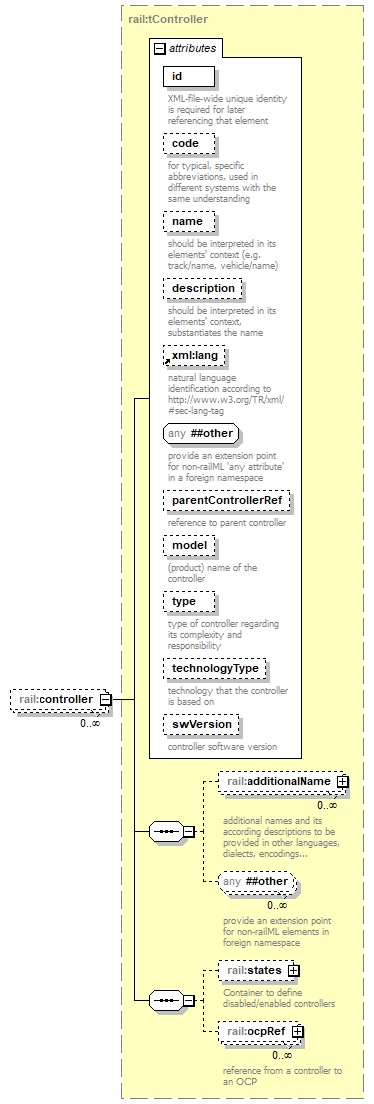 |
||||||||||||||||||||||||||||||||||||||||||||||||||||||||||||||||||||||||||||||||||||||
| namespace | https://www.railml.org/schemas/2018 | ||||||||||||||||||||||||||||||||||||||||||||||||||||||||||||||||||||||||||||||||||||||
| type | rail:tController | ||||||||||||||||||||||||||||||||||||||||||||||||||||||||||||||||||||||||||||||||||||||
| properties |
|
||||||||||||||||||||||||||||||||||||||||||||||||||||||||||||||||||||||||||||||||||||||
| children | rail:additionalName rail:states rail:ocpRef | ||||||||||||||||||||||||||||||||||||||||||||||||||||||||||||||||||||||||||||||||||||||
| attributes |
|
||||||||||||||||||||||||||||||||||||||||||||||||||||||||||||||||||||||||||||||||||||||
| source | <xs:element name="controller" type="rail:tController" minOccurs="0" maxOccurs="unbounded"> <xs:annotation> <xs:documentation source="http://wiki.railml.org/index.php?title=IS:controller"/> </xs:annotation> </xs:element> |
complexType eCrossedElements
| diagram |  |
||
| namespace | https://www.railml.org/schemas/2018 | ||
| children | rail:crossedElement | ||
| used by |
|
||
| source | <xs:complexType name="eCrossedElements"> <xs:sequence> <xs:element name="crossedElement" type="rail:tCrossedElement" maxOccurs="unbounded"> <xs:annotation> <xs:documentation source="http://wiki.railml.org/index.php?title=IS:crossedElement"/> </xs:annotation> </xs:element> </xs:sequence> </xs:complexType> |
element eCrossedElements/crossedElement
| diagram |  |
||||||||||||||||||||||||||||||||||||||||||||||||||||||||||||||||
| namespace | https://www.railml.org/schemas/2018 | ||||||||||||||||||||||||||||||||||||||||||||||||||||||||||||||||
| type | rail:tCrossedElement | ||||||||||||||||||||||||||||||||||||||||||||||||||||||||||||||||
| properties |
|
||||||||||||||||||||||||||||||||||||||||||||||||||||||||||||||||
| children | rail:additionalName | ||||||||||||||||||||||||||||||||||||||||||||||||||||||||||||||||
| attributes |
|
||||||||||||||||||||||||||||||||||||||||||||||||||||||||||||||||
| source | <xs:element name="crossedElement" type="rail:tCrossedElement" maxOccurs="unbounded"> <xs:annotation> <xs:documentation source="http://wiki.railml.org/index.php?title=IS:crossedElement"/> </xs:annotation> </xs:element> |
complexType eCrossing
| diagram |  |
||||||||||||||||||||||||||||||||||||||||||||||||||||||||||||||||||||||||||||||||||||||||||||||||||||||||||||||||||||||
| namespace | https://www.railml.org/schemas/2018 | ||||||||||||||||||||||||||||||||||||||||||||||||||||||||||||||||||||||||||||||||||||||||||||||||||||||||||||||||||||||
| type | extension of rail:tCrossing | ||||||||||||||||||||||||||||||||||||||||||||||||||||||||||||||||||||||||||||||||||||||||||||||||||||||||||||||||||||||
| properties |
|
||||||||||||||||||||||||||||||||||||||||||||||||||||||||||||||||||||||||||||||||||||||||||||||||||||||||||||||||||||||
| children | rail:additionalName rail:geoCoord rail:states rail:connection | ||||||||||||||||||||||||||||||||||||||||||||||||||||||||||||||||||||||||||||||||||||||||||||||||||||||||||||||||||||||
| used by |
|
||||||||||||||||||||||||||||||||||||||||||||||||||||||||||||||||||||||||||||||||||||||||||||||||||||||||||||||||||||||
| attributes |
|
||||||||||||||||||||||||||||||||||||||||||||||||||||||||||||||||||||||||||||||||||||||||||||||||||||||||||||||||||||||
| source | <xs:complexType name="eCrossing"> <xs:complexContent> <xs:extension base="rail:tCrossing"> <xs:sequence> <xs:element name="connection" type="rail:tSwitchConnectionData" maxOccurs="3"> <xs:annotation> <xs:documentation source="http://wiki.railml.org/index.php?title=IS:connection_crossing"/> </xs:annotation> </xs:element> </xs:sequence> </xs:extension> </xs:complexContent> </xs:complexType> |
element eCrossing/connection
| diagram |  |
||||||||||||||||||||||||||||||||||||||||||||||||||||||||
| namespace | https://www.railml.org/schemas/2018 | ||||||||||||||||||||||||||||||||||||||||||||||||||||||||
| type | rail:tSwitchConnectionData | ||||||||||||||||||||||||||||||||||||||||||||||||||||||||
| properties |
|
||||||||||||||||||||||||||||||||||||||||||||||||||||||||
| attributes |
|
||||||||||||||||||||||||||||||||||||||||||||||||||||||||
| source | <xs:element name="connection" type="rail:tSwitchConnectionData" maxOccurs="3"> <xs:annotation> <xs:documentation source="http://wiki.railml.org/index.php?title=IS:connection_crossing"/> </xs:annotation> </xs:element> |
complexType eCrossSections
| diagram |  |
||
| namespace | https://www.railml.org/schemas/2018 | ||
| children | rail:crossSection | ||
| used by |
|
||
| source | <xs:complexType name="eCrossSections"> <xs:sequence> <xs:element name="crossSection" type="rail:tCrossSection" minOccurs="0" maxOccurs="unbounded"> <xs:annotation> <xs:documentation source="http://wiki.railml.org/index.php?title=IS:crossSection"/> </xs:annotation> </xs:element> </xs:sequence> </xs:complexType> |
element eCrossSections/crossSection
| diagram |  |
||||||||||||||||||||||||||||||||||||||||||||||||||||||||||||||||||||||||||||||||||||||||||||||||||||||
| namespace | https://www.railml.org/schemas/2018 | ||||||||||||||||||||||||||||||||||||||||||||||||||||||||||||||||||||||||||||||||||||||||||||||||||||||
| type | rail:tCrossSection | ||||||||||||||||||||||||||||||||||||||||||||||||||||||||||||||||||||||||||||||||||||||||||||||||||||||
| properties |
|
||||||||||||||||||||||||||||||||||||||||||||||||||||||||||||||||||||||||||||||||||||||||||||||||||||||
| children | rail:additionalName rail:geoCoord rail:states | ||||||||||||||||||||||||||||||||||||||||||||||||||||||||||||||||||||||||||||||||||||||||||||||||||||||
| attributes |
|
||||||||||||||||||||||||||||||||||||||||||||||||||||||||||||||||||||||||||||||||||||||||||||||||||||||
| source | <xs:element name="crossSection" type="rail:tCrossSection" minOccurs="0" maxOccurs="unbounded"> <xs:annotation> <xs:documentation source="http://wiki.railml.org/index.php?title=IS:crossSection"/> </xs:annotation> </xs:element> |
complexType eDerailers
| diagram |  |
||
| namespace | https://www.railml.org/schemas/2018 | ||
| children | rail:derailer | ||
| used by |
|
||
| source | <xs:complexType name="eDerailers"> <xs:sequence> <xs:element name="derailer" type="rail:tDerailer" minOccurs="0" maxOccurs="unbounded"> <xs:annotation> <xs:documentation source="http://wiki.railml.org/index.php?title=IS:derailer"/> </xs:annotation> </xs:element> </xs:sequence> </xs:complexType> |
element eDerailers/derailer
| diagram |  |
||||||||||||||||||||||||||||||||||||||||||||||||||||||||||||||||||||||||||||||||||||||||||||||||||||||||||
| namespace | https://www.railml.org/schemas/2018 | ||||||||||||||||||||||||||||||||||||||||||||||||||||||||||||||||||||||||||||||||||||||||||||||||||||||||||
| type | rail:tDerailer | ||||||||||||||||||||||||||||||||||||||||||||||||||||||||||||||||||||||||||||||||||||||||||||||||||||||||||
| properties |
|
||||||||||||||||||||||||||||||||||||||||||||||||||||||||||||||||||||||||||||||||||||||||||||||||||||||||||
| children | rail:additionalName rail:geoCoord rail:states | ||||||||||||||||||||||||||||||||||||||||||||||||||||||||||||||||||||||||||||||||||||||||||||||||||||||||||
| attributes |
|
||||||||||||||||||||||||||||||||||||||||||||||||||||||||||||||||||||||||||||||||||||||||||||||||||||||||||
| source | <xs:element name="derailer" type="rail:tDerailer" minOccurs="0" maxOccurs="unbounded"> <xs:annotation> <xs:documentation source="http://wiki.railml.org/index.php?title=IS:derailer"/> </xs:annotation> </xs:element> |
complexType eElectrificationChanges
| diagram |  |
||
| namespace | https://www.railml.org/schemas/2018 | ||
| children | rail:electrificationChange | ||
| used by |
|
||
| source | <xs:complexType name="eElectrificationChanges"> <xs:sequence> <xs:element name="electrificationChange" type="rail:tElectrificationChange" minOccurs="0" maxOccurs="unbounded"> <xs:annotation> <xs:documentation source="http://wiki.railml.org/index.php?title=IS:electrificationChange"/> </xs:annotation> </xs:element> </xs:sequence> </xs:complexType> |
element eElectrificationChanges/electrificationChange
| diagram |  |
||||||||||||||||||||||||||||||||||||||||||||||||||||||||||||||||||||||||||||||||||||||||||||||||||||||||
| namespace | https://www.railml.org/schemas/2018 | ||||||||||||||||||||||||||||||||||||||||||||||||||||||||||||||||||||||||||||||||||||||||||||||||||||||||
| type | rail:tElectrificationChange | ||||||||||||||||||||||||||||||||||||||||||||||||||||||||||||||||||||||||||||||||||||||||||||||||||||||||
| properties |
|
||||||||||||||||||||||||||||||||||||||||||||||||||||||||||||||||||||||||||||||||||||||||||||||||||||||||
| children | rail:additionalName rail:geoCoord rail:states rail:maxTrainCurrent | ||||||||||||||||||||||||||||||||||||||||||||||||||||||||||||||||||||||||||||||||||||||||||||||||||||||||
| attributes |
|
||||||||||||||||||||||||||||||||||||||||||||||||||||||||||||||||||||||||||||||||||||||||||||||||||||||||
| source | <xs:element name="electrificationChange" type="rail:tElectrificationChange" minOccurs="0" maxOccurs="unbounded"> <xs:annotation> <xs:documentation source="http://wiki.railml.org/index.php?title=IS:electrificationChange"/> </xs:annotation> </xs:element> |
complexType eGaugeChanges
| diagram |  |
||
| namespace | https://www.railml.org/schemas/2018 | ||
| children | rail:gaugeChange | ||
| used by |
|
||
| source | <xs:complexType name="eGaugeChanges"> <xs:sequence> <xs:element name="gaugeChange" type="rail:tGaugeChange" minOccurs="0" maxOccurs="unbounded"> <xs:annotation> <xs:documentation source="http://wiki.railml.org/index.php?title=IS:gaugeChange"/> </xs:annotation> </xs:element> </xs:sequence> </xs:complexType> |
element eGaugeChanges/gaugeChange
| diagram | 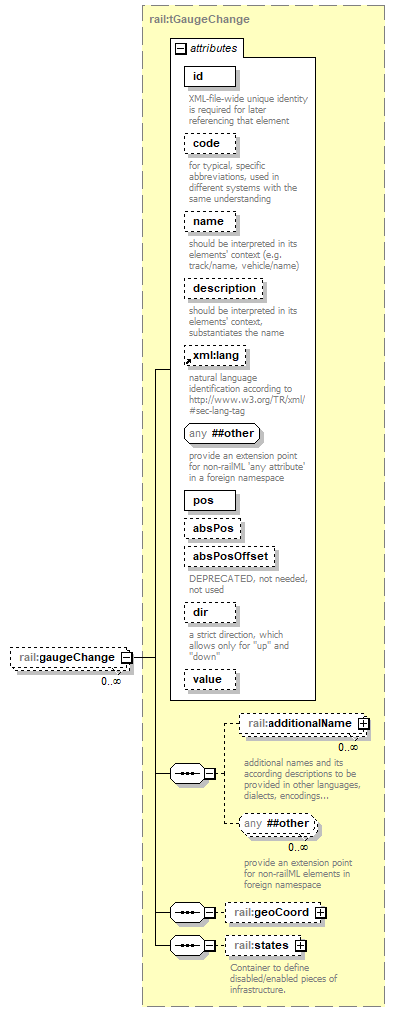 |
||||||||||||||||||||||||||||||||||||||||||||||||||||||||||||||||||||||||||||||||
| namespace | https://www.railml.org/schemas/2018 | ||||||||||||||||||||||||||||||||||||||||||||||||||||||||||||||||||||||||||||||||
| type | rail:tGaugeChange | ||||||||||||||||||||||||||||||||||||||||||||||||||||||||||||||||||||||||||||||||
| properties |
|
||||||||||||||||||||||||||||||||||||||||||||||||||||||||||||||||||||||||||||||||
| children | rail:additionalName rail:geoCoord rail:states | ||||||||||||||||||||||||||||||||||||||||||||||||||||||||||||||||||||||||||||||||
| attributes |
|
||||||||||||||||||||||||||||||||||||||||||||||||||||||||||||||||||||||||||||||||
| source | <xs:element name="gaugeChange" type="rail:tGaugeChange" minOccurs="0" maxOccurs="unbounded"> <xs:annotation> <xs:documentation source="http://wiki.railml.org/index.php?title=IS:gaugeChange"/> </xs:annotation> </xs:element> |
complexType eGeneralInfraAttribute
| diagram |  |
||
| namespace | https://www.railml.org/schemas/2018 | ||
| children | rail:attributes | ||
| used by |
|
||
| source | <xs:complexType name="eGeneralInfraAttribute"> <xs:sequence> <xs:element name="attributes" type="rail:eAttributes" minOccurs="0"> <xs:annotation> <xs:documentation source="http://wiki.railml.org/index.php?title=IS:attributes"/> </xs:annotation> </xs:element> <xs:any namespace="##other" processContents="strict" minOccurs="0" maxOccurs="unbounded"/> </xs:sequence> </xs:complexType> |
element eGeneralInfraAttribute/attributes
| diagram |  |
||||||
| namespace | https://www.railml.org/schemas/2018 | ||||||
| type | rail:eAttributes | ||||||
| properties |
|
||||||
| children | rail:attribute | ||||||
| source | <xs:element name="attributes" type="rail:eAttributes" minOccurs="0"> <xs:annotation> <xs:documentation source="http://wiki.railml.org/index.php?title=IS:attributes"/> </xs:annotation> </xs:element> |
complexType eGeneralInfraAttributes
| diagram |  |
||
| namespace | https://www.railml.org/schemas/2018 | ||
| children | rail:generalInfraAttribute | ||
| used by |
|
||
| source | <xs:complexType name="eGeneralInfraAttributes"> <xs:sequence> <xs:element name="generalInfraAttribute" type="rail:eGeneralInfraAttribute" minOccurs="0" maxOccurs="unbounded"> <xs:annotation> <xs:documentation source="http://wiki.railml.org/index.php?title=IS:generalInfraAttribute"/> </xs:annotation> </xs:element> </xs:sequence> </xs:complexType> |
element eGeneralInfraAttributes/generalInfraAttribute
| diagram | 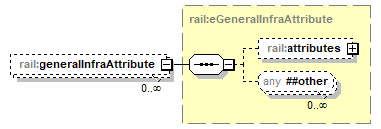 |
||||||
| namespace | https://www.railml.org/schemas/2018 | ||||||
| type | rail:eGeneralInfraAttribute | ||||||
| properties |
|
||||||
| children | rail:attributes | ||||||
| source | <xs:element name="generalInfraAttribute" type="rail:eGeneralInfraAttribute" minOccurs="0" maxOccurs="unbounded"> <xs:annotation> <xs:documentation source="http://wiki.railml.org/index.php?title=IS:generalInfraAttribute"/> </xs:annotation> </xs:element> |
complexType eGeoMappings
| diagram |  |
||
| namespace | https://www.railml.org/schemas/2018 | ||
| children | rail:geoMapping | ||
| used by |
|
||
| source | <xs:complexType name="eGeoMappings"> <xs:sequence> <xs:element name="geoMapping" type="rail:tPlacedElement" minOccurs="0" maxOccurs="unbounded"> <xs:annotation> <xs:documentation source="http://wiki.railml.org/index.php?title=IS:geoMapping"/> </xs:annotation> </xs:element> </xs:sequence> </xs:complexType> |
element eGeoMappings/geoMapping
| diagram | 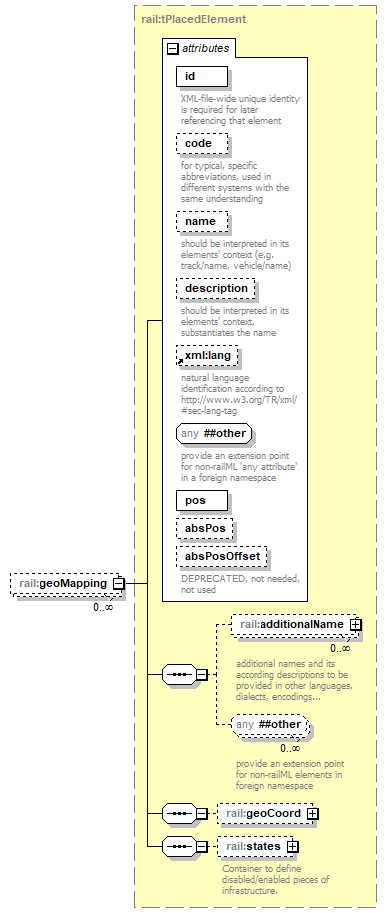 |
||||||||||||||||||||||||||||||||||||||||||||||||||||||||||||||||||
| namespace | https://www.railml.org/schemas/2018 | ||||||||||||||||||||||||||||||||||||||||||||||||||||||||||||||||||
| type | rail:tPlacedElement | ||||||||||||||||||||||||||||||||||||||||||||||||||||||||||||||||||
| properties |
|
||||||||||||||||||||||||||||||||||||||||||||||||||||||||||||||||||
| children | rail:additionalName rail:geoCoord rail:states | ||||||||||||||||||||||||||||||||||||||||||||||||||||||||||||||||||
| attributes |
|
||||||||||||||||||||||||||||||||||||||||||||||||||||||||||||||||||
| source | <xs:element name="geoMapping" type="rail:tPlacedElement" minOccurs="0" maxOccurs="unbounded"> <xs:annotation> <xs:documentation source="http://wiki.railml.org/index.php?title=IS:geoMapping"/> </xs:annotation> </xs:element> |
complexType eGradientChanges
| diagram |  |
||
| namespace | https://www.railml.org/schemas/2018 | ||
| children | rail:gradientChange | ||
| used by |
|
||
| source | <xs:complexType name="eGradientChanges"> <xs:sequence> <xs:element name="gradientChange" type="rail:tGradientChange" minOccurs="0" maxOccurs="unbounded"> <xs:annotation> <xs:documentation source="http://wiki.railml.org/index.php?title=IS:gradientChange"/> </xs:annotation> </xs:element> </xs:sequence> </xs:complexType> |
element eGradientChanges/gradientChange
| diagram | 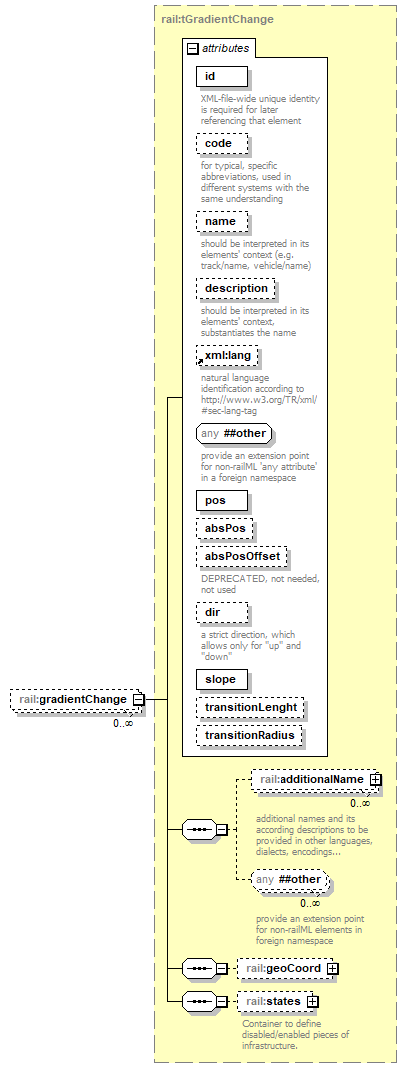 |
||||||||||||||||||||||||||||||||||||||||||||||||||||||||||||||||||||||||||||||||||||||||||||
| namespace | https://www.railml.org/schemas/2018 | ||||||||||||||||||||||||||||||||||||||||||||||||||||||||||||||||||||||||||||||||||||||||||||
| type | rail:tGradientChange | ||||||||||||||||||||||||||||||||||||||||||||||||||||||||||||||||||||||||||||||||||||||||||||
| properties |
|
||||||||||||||||||||||||||||||||||||||||||||||||||||||||||||||||||||||||||||||||||||||||||||
| children | rail:additionalName rail:geoCoord rail:states | ||||||||||||||||||||||||||||||||||||||||||||||||||||||||||||||||||||||||||||||||||||||||||||
| attributes |
|
||||||||||||||||||||||||||||||||||||||||||||||||||||||||||||||||||||||||||||||||||||||||||||
| source | <xs:element name="gradientChange" type="rail:tGradientChange" minOccurs="0" maxOccurs="unbounded"> <xs:annotation> <xs:documentation source="http://wiki.railml.org/index.php?title=IS:gradientChange"/> </xs:annotation> </xs:element> |
complexType eInfraAttr
| diagram | 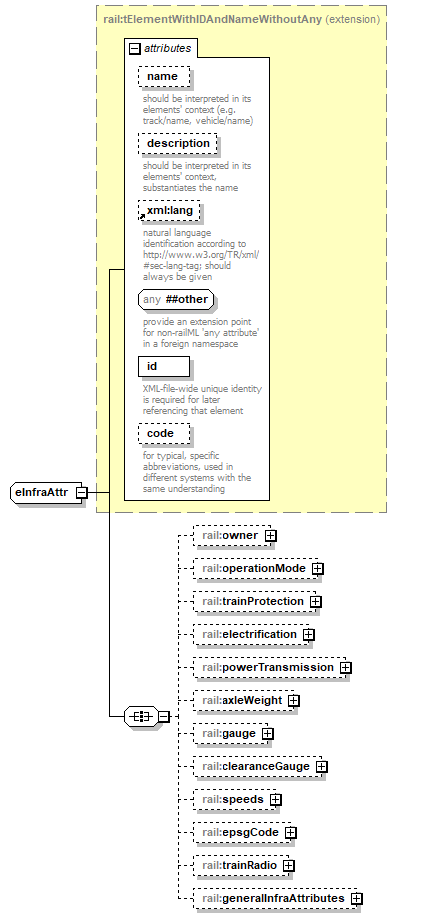 |
||||||||||||||||||||||||||||||||||||||||||||||
| namespace | https://www.railml.org/schemas/2018 | ||||||||||||||||||||||||||||||||||||||||||||||
| type | extension of rail:tElementWithIDAndNameWithoutAny | ||||||||||||||||||||||||||||||||||||||||||||||
| properties |
|
||||||||||||||||||||||||||||||||||||||||||||||
| children | rail:owner rail:operationMode rail:trainProtection rail:electrification rail:powerTransmission rail:axleWeight rail:gauge rail:clearanceGauge rail:speeds rail:epsgCode rail:trainRadio rail:generalInfraAttributes | ||||||||||||||||||||||||||||||||||||||||||||||
| used by |
|
||||||||||||||||||||||||||||||||||||||||||||||
| attributes |
|
||||||||||||||||||||||||||||||||||||||||||||||
| source | <xs:complexType name="eInfraAttr"> <xs:complexContent> <xs:extension base="rail:tElementWithIDAndNameWithoutAny"> <xs:all> <xs:element name="owner" type="rail:tOwner" minOccurs="0"> <xs:annotation> <xs:documentation source="http://wiki.railml.org/index.php?title=IS:owner"/> </xs:annotation> </xs:element> <xs:element name="operationMode" type="rail:tOperationMode" minOccurs="0"> <xs:annotation> <xs:documentation source="http://wiki.railml.org/index.php?title=IS:operationMode"/> </xs:annotation> </xs:element> <xs:element name="trainProtection" type="rail:tTrainProtection" minOccurs="0"> <xs:annotation> <xs:documentation source="http://wiki.railml.org/index.php?title=IS:trainProtection"/> </xs:annotation> </xs:element> <xs:element name="electrification" type="rail:tElectrification" minOccurs="0"> <xs:annotation> <xs:documentation source="http://wiki.railml.org/index.php?title=IS:electrification"/> </xs:annotation> </xs:element> <xs:element name="powerTransmission" type="rail:tPowerTransmission" minOccurs="0"> <xs:annotation> <xs:documentation source="http://wiki.railml.org/index.php?title=IS:powerTransmission"/> </xs:annotation> </xs:element> <xs:element name="axleWeight" type="rail:tAxleWeight" minOccurs="0"> <xs:annotation> <xs:documentation source="http://wiki.railml.org/index.php?title=IS:axleWeight"/> </xs:annotation> </xs:element> <xs:element name="gauge" type="rail:tGauge" minOccurs="0"> <xs:annotation> <xs:documentation source="http://wiki.railml.org/index.php?title=IS:gauge"/> </xs:annotation> </xs:element> <xs:element name="clearanceGauge" type="rail:tClearanceGaugeType" minOccurs="0"> <xs:annotation> <xs:documentation source="http://wiki.railml.org/index.php?title=IS:clearanceGauge"/> </xs:annotation> </xs:element> <xs:element name="speeds" type="rail:eSpeeds" minOccurs="0"> <xs:annotation> <xs:documentation source="http://wiki.railml.org/index.php?title=IS:speeds"/> </xs:annotation> </xs:element> <xs:element name="epsgCode" type="rail:tEpsgCode" minOccurs="0"> <xs:annotation> <xs:documentation source="http://wiki.railml.org/index.php?title=IS:epsgCode"/> </xs:annotation> </xs:element> <xs:element name="trainRadio" type="rail:tTrainRadioAttributes" minOccurs="0"> <xs:annotation> <xs:documentation source="http://wiki.railml.org/index.php?title=IS:trainRadio"/> </xs:annotation> </xs:element> <xs:element name="generalInfraAttributes" type="rail:eGeneralInfraAttributes" minOccurs="0"> <xs:annotation> <xs:documentation source="http://wiki.railml.org/index.php?title=IS:generalInfraAttributes"/> </xs:annotation> </xs:element> </xs:all> </xs:extension> </xs:complexContent> </xs:complexType> |
element eInfraAttr/owner
| diagram | 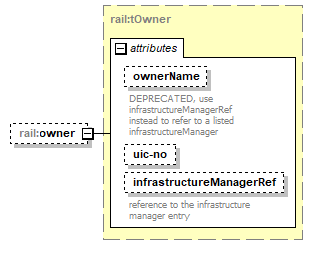 |
||||||||||||||||||||||||||||
| namespace | https://www.railml.org/schemas/2018 | ||||||||||||||||||||||||||||
| type | rail:tOwner | ||||||||||||||||||||||||||||
| properties |
|
||||||||||||||||||||||||||||
| attributes |
|
||||||||||||||||||||||||||||
| source | <xs:element name="owner" type="rail:tOwner" minOccurs="0"> <xs:annotation> <xs:documentation source="http://wiki.railml.org/index.php?title=IS:owner"/> </xs:annotation> </xs:element> |
element eInfraAttr/operationMode
| diagram | 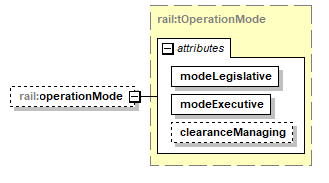 |
||||||||||||||||||||||||
| namespace | https://www.railml.org/schemas/2018 | ||||||||||||||||||||||||
| type | rail:tOperationMode | ||||||||||||||||||||||||
| properties |
|
||||||||||||||||||||||||
| attributes |
|
||||||||||||||||||||||||
| source | <xs:element name="operationMode" type="rail:tOperationMode" minOccurs="0"> <xs:annotation> <xs:documentation source="http://wiki.railml.org/index.php?title=IS:operationMode"/> </xs:annotation> </xs:element> |
element eInfraAttr/trainProtection
| diagram | 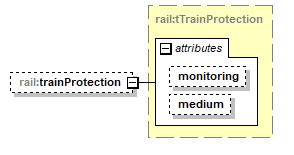 |
||||||||||||||||||
| namespace | https://www.railml.org/schemas/2018 | ||||||||||||||||||
| type | rail:tTrainProtection | ||||||||||||||||||
| properties |
|
||||||||||||||||||
| attributes |
|
||||||||||||||||||
| source | <xs:element name="trainProtection" type="rail:tTrainProtection" minOccurs="0"> <xs:annotation> <xs:documentation source="http://wiki.railml.org/index.php?title=IS:trainProtection"/> </xs:annotation> </xs:element> |
element eInfraAttr/electrification
| diagram | 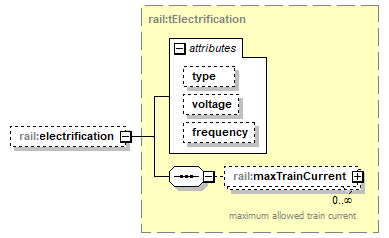 |
||||||||||||||||||||||||
| namespace | https://www.railml.org/schemas/2018 | ||||||||||||||||||||||||
| type | rail:tElectrification | ||||||||||||||||||||||||
| properties |
|
||||||||||||||||||||||||
| children | rail:maxTrainCurrent | ||||||||||||||||||||||||
| attributes |
|
||||||||||||||||||||||||
| source | <xs:element name="electrification" type="rail:tElectrification" minOccurs="0"> <xs:annotation> <xs:documentation source="http://wiki.railml.org/index.php?title=IS:electrification"/> </xs:annotation> </xs:element> |
element eInfraAttr/powerTransmission
| diagram | 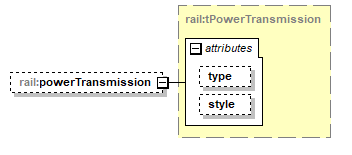 |
||||||||||||||||||
| namespace | https://www.railml.org/schemas/2018 | ||||||||||||||||||
| type | rail:tPowerTransmission | ||||||||||||||||||
| properties |
|
||||||||||||||||||
| attributes |
|
||||||||||||||||||
| source | <xs:element name="powerTransmission" type="rail:tPowerTransmission" minOccurs="0"> <xs:annotation> <xs:documentation source="http://wiki.railml.org/index.php?title=IS:powerTransmission"/> </xs:annotation> </xs:element> |
element eInfraAttr/axleWeight
| diagram | 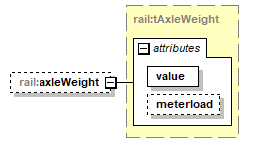 |
||||||||||||||||||
| namespace | https://www.railml.org/schemas/2018 | ||||||||||||||||||
| type | rail:tAxleWeight | ||||||||||||||||||
| properties |
|
||||||||||||||||||
| attributes |
|
||||||||||||||||||
| source | <xs:element name="axleWeight" type="rail:tAxleWeight" minOccurs="0"> <xs:annotation> <xs:documentation source="http://wiki.railml.org/index.php?title=IS:axleWeight"/> </xs:annotation> </xs:element> |
element eInfraAttr/gauge
| diagram | 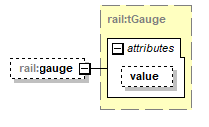 |
||||||||||||
| namespace | https://www.railml.org/schemas/2018 | ||||||||||||
| type | rail:tGauge | ||||||||||||
| properties |
|
||||||||||||
| attributes |
|
||||||||||||
| source | <xs:element name="gauge" type="rail:tGauge" minOccurs="0"> <xs:annotation> <xs:documentation source="http://wiki.railml.org/index.php?title=IS:gauge"/> </xs:annotation> </xs:element> |
element eInfraAttr/clearanceGauge
| diagram | 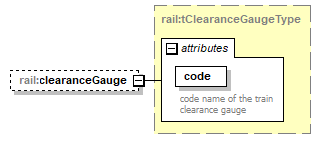 |
||||||||||||||||
| namespace | https://www.railml.org/schemas/2018 | ||||||||||||||||
| type | rail:tClearanceGaugeType | ||||||||||||||||
| properties |
|
||||||||||||||||
| attributes |
|
||||||||||||||||
| source | <xs:element name="clearanceGauge" type="rail:tClearanceGaugeType" minOccurs="0"> <xs:annotation> <xs:documentation source="http://wiki.railml.org/index.php?title=IS:clearanceGauge"/> </xs:annotation> </xs:element> |
element eInfraAttr/speeds
| diagram |  |
||||||
| namespace | https://www.railml.org/schemas/2018 | ||||||
| type | rail:eSpeeds | ||||||
| properties |
|
||||||
| children | rail:speed | ||||||
| source | <xs:element name="speeds" type="rail:eSpeeds" minOccurs="0"> <xs:annotation> <xs:documentation source="http://wiki.railml.org/index.php?title=IS:speeds"/> </xs:annotation> </xs:element> |
element eInfraAttr/epsgCode
| diagram | 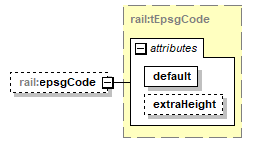 |
||||||||||||||||||
| namespace | https://www.railml.org/schemas/2018 | ||||||||||||||||||
| type | rail:tEpsgCode | ||||||||||||||||||
| properties |
|
||||||||||||||||||
| attributes |
|
||||||||||||||||||
| source | <xs:element name="epsgCode" type="rail:tEpsgCode" minOccurs="0"> <xs:annotation> <xs:documentation source="http://wiki.railml.org/index.php?title=IS:epsgCode"/> </xs:annotation> </xs:element> |
element eInfraAttr/trainRadio
| diagram | 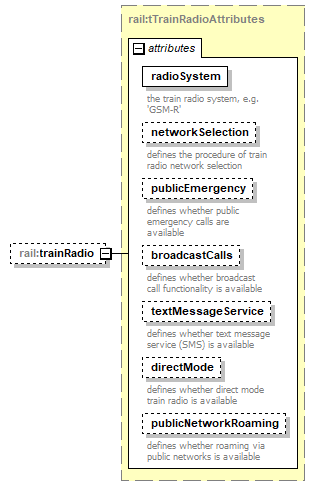 |
||||||||||||||||||||||||||||||||||||||||||||||||||||||||||||||
| namespace | https://www.railml.org/schemas/2018 | ||||||||||||||||||||||||||||||||||||||||||||||||||||||||||||||
| type | rail:tTrainRadioAttributes | ||||||||||||||||||||||||||||||||||||||||||||||||||||||||||||||
| properties |
|
||||||||||||||||||||||||||||||||||||||||||||||||||||||||||||||
| attributes |
|
||||||||||||||||||||||||||||||||||||||||||||||||||||||||||||||
| source | <xs:element name="trainRadio" type="rail:tTrainRadioAttributes" minOccurs="0"> <xs:annotation> <xs:documentation source="http://wiki.railml.org/index.php?title=IS:trainRadio"/> </xs:annotation> </xs:element> |
element eInfraAttr/generalInfraAttributes
| diagram |  |
||||||
| namespace | https://www.railml.org/schemas/2018 | ||||||
| type | rail:eGeneralInfraAttributes | ||||||
| properties |
|
||||||
| children | rail:generalInfraAttribute | ||||||
| source | <xs:element name="generalInfraAttributes" type="rail:eGeneralInfraAttributes" minOccurs="0"> <xs:annotation> <xs:documentation source="http://wiki.railml.org/index.php?title=IS:generalInfraAttributes"/> </xs:annotation> </xs:element> |
complexType eInfraAttrGroup
| diagram |  |
||
| namespace | https://www.railml.org/schemas/2018 | ||
| children | rail:infraAttributes | ||
| used by |
|
||
| source | <xs:complexType name="eInfraAttrGroup"> <xs:sequence> <xs:element name="infraAttributes" type="rail:eInfraAttr" minOccurs="0" maxOccurs="unbounded"> <xs:annotation> <xs:documentation source="http://wiki.railml.org/index.php?title=IS:infraAttributes"/> </xs:annotation> </xs:element> </xs:sequence> </xs:complexType> |
element eInfraAttrGroup/infraAttributes
| diagram | 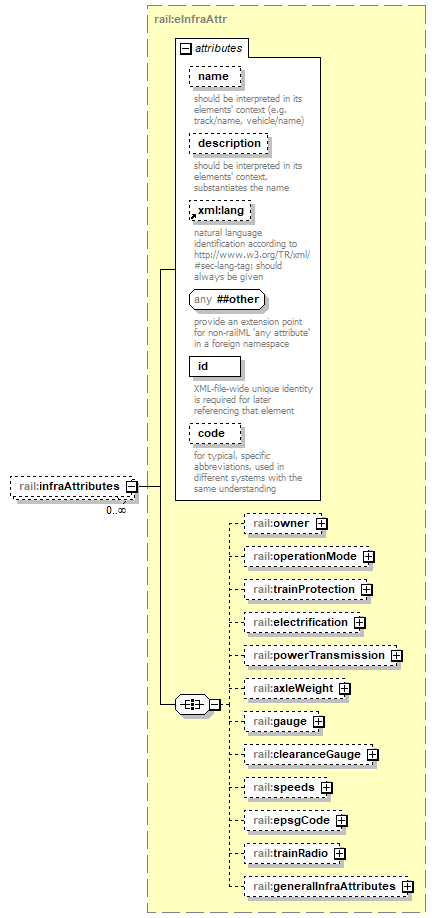 |
||||||||||||||||||||||||||||||||||||||||||||||
| namespace | https://www.railml.org/schemas/2018 | ||||||||||||||||||||||||||||||||||||||||||||||
| type | rail:eInfraAttr | ||||||||||||||||||||||||||||||||||||||||||||||
| properties |
|
||||||||||||||||||||||||||||||||||||||||||||||
| children | rail:owner rail:operationMode rail:trainProtection rail:electrification rail:powerTransmission rail:axleWeight rail:gauge rail:clearanceGauge rail:speeds rail:epsgCode rail:trainRadio rail:generalInfraAttributes | ||||||||||||||||||||||||||||||||||||||||||||||
| attributes |
|
||||||||||||||||||||||||||||||||||||||||||||||
| source | <xs:element name="infraAttributes" type="rail:eInfraAttr" minOccurs="0" maxOccurs="unbounded"> <xs:annotation> <xs:documentation source="http://wiki.railml.org/index.php?title=IS:infraAttributes"/> </xs:annotation> </xs:element> |
complexType eInfraAttrGroupRefs
| diagram |  |
||
| namespace | https://www.railml.org/schemas/2018 | ||
| children | rail:infraAttrGroupRef | ||
| used by |
|
||
| source | <xs:complexType name="eInfraAttrGroupRefs"> <xs:sequence> <xs:element name="infraAttrGroupRef" type="rail:tElementWithReference" minOccurs="0" maxOccurs="unbounded"> <xs:annotation> <xs:documentation>sub-element for a reference to an infraAttributes instance</xs:documentation> <xs:documentation source="http://wiki.railml.org/index.php?title=IS:infraAttributes"/> </xs:annotation> </xs:element> </xs:sequence> </xs:complexType> |
element eInfraAttrGroupRefs/infraAttrGroupRef
| diagram | 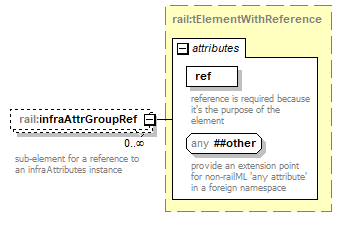 |
||||||||||||||
| namespace | https://www.railml.org/schemas/2018 | ||||||||||||||
| type | rail:tElementWithReference | ||||||||||||||
| properties |
|
||||||||||||||
| attributes |
|
||||||||||||||
| annotation |
|
||||||||||||||
| source | <xs:element name="infraAttrGroupRef" type="rail:tElementWithReference" minOccurs="0" maxOccurs="unbounded"> <xs:annotation> <xs:documentation>sub-element for a reference to an infraAttributes instance</xs:documentation> <xs:documentation source="http://wiki.railml.org/index.php?title=IS:infraAttributes"/> </xs:annotation> </xs:element> |
complexType eInfrastructureVisualization
| diagram | 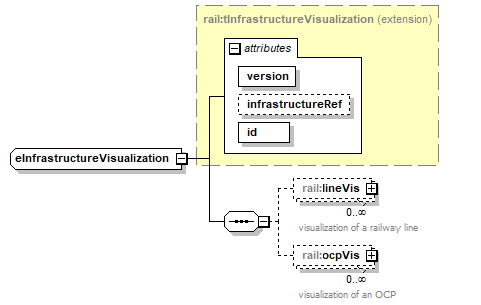 |
||||||||||||||||||||||||
| namespace | https://www.railml.org/schemas/2018 | ||||||||||||||||||||||||
| type | extension of rail:tInfrastructureVisualization | ||||||||||||||||||||||||
| properties |
|
||||||||||||||||||||||||
| children | rail:lineVis rail:ocpVis | ||||||||||||||||||||||||
| used by |
|
||||||||||||||||||||||||
| attributes |
|
||||||||||||||||||||||||
| source | <xs:complexType name="eInfrastructureVisualization"> <xs:complexContent> <xs:extension base="rail:tInfrastructureVisualization"> <xs:sequence> <xs:element name="lineVis" type="rail:eLineVis" minOccurs="0" maxOccurs="unbounded"> <xs:annotation> <xs:documentation>visualization of a railway line</xs:documentation> </xs:annotation> </xs:element> <xs:element name="ocpVis" type="rail:eOcpVis" minOccurs="0" maxOccurs="unbounded"> <xs:annotation> <xs:documentation>visualization of an OCP</xs:documentation> </xs:annotation> </xs:element> </xs:sequence> </xs:extension> </xs:complexContent> </xs:complexType> |
element eInfrastructureVisualization/lineVis
| diagram | 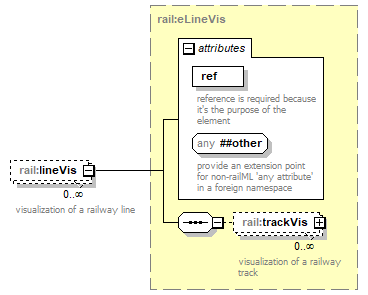 |
||||||||||||||
| namespace | https://www.railml.org/schemas/2018 | ||||||||||||||
| type | rail:eLineVis | ||||||||||||||
| properties |
|
||||||||||||||
| children | rail:trackVis | ||||||||||||||
| attributes |
|
||||||||||||||
| annotation |
|
||||||||||||||
| source | <xs:element name="lineVis" type="rail:eLineVis" minOccurs="0" maxOccurs="unbounded"> <xs:annotation> <xs:documentation>visualization of a railway line</xs:documentation> </xs:annotation> </xs:element> |
element eInfrastructureVisualization/ocpVis
| diagram | 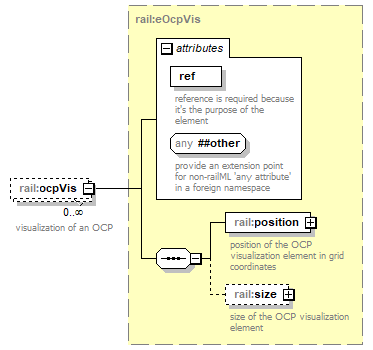 |
||||||||||||||
| namespace | https://www.railml.org/schemas/2018 | ||||||||||||||
| type | rail:eOcpVis | ||||||||||||||
| properties |
|
||||||||||||||
| children | rail:position rail:size | ||||||||||||||
| attributes |
|
||||||||||||||
| annotation |
|
||||||||||||||
| source | <xs:element name="ocpVis" type="rail:eOcpVis" minOccurs="0" maxOccurs="unbounded"> <xs:annotation> <xs:documentation>visualization of an OCP</xs:documentation> </xs:annotation> </xs:element> |
complexType eLevelCrossing
| diagram |  |
||||||||||||||||||||||||||||||||||||||||||||||||||||||||||||||||||||||||||||||||||||||||||||||||||||||||||||||||||
| namespace | https://www.railml.org/schemas/2018 | ||||||||||||||||||||||||||||||||||||||||||||||||||||||||||||||||||||||||||||||||||||||||||||||||||||||||||||||||||
| type | extension of rail:tLevelCrossing | ||||||||||||||||||||||||||||||||||||||||||||||||||||||||||||||||||||||||||||||||||||||||||||||||||||||||||||||||||
| properties |
|
||||||||||||||||||||||||||||||||||||||||||||||||||||||||||||||||||||||||||||||||||||||||||||||||||||||||||||||||||
| children | rail:additionalName rail:geoCoord rail:states rail:crossedElements | ||||||||||||||||||||||||||||||||||||||||||||||||||||||||||||||||||||||||||||||||||||||||||||||||||||||||||||||||||
| used by |
|
||||||||||||||||||||||||||||||||||||||||||||||||||||||||||||||||||||||||||||||||||||||||||||||||||||||||||||||||||
| attributes |
|
||||||||||||||||||||||||||||||||||||||||||||||||||||||||||||||||||||||||||||||||||||||||||||||||||||||||||||||||||
| source | <xs:complexType name="eLevelCrossing"> <xs:complexContent> <xs:extension base="rail:tLevelCrossing"> <xs:sequence> <xs:element name="crossedElements" type="rail:eCrossedElements" minOccurs="0"> <xs:annotation> <xs:documentation>list the elements that are crossed by this element</xs:documentation> </xs:annotation> </xs:element> </xs:sequence> </xs:extension> </xs:complexContent> </xs:complexType> |
element eLevelCrossing/crossedElements
| diagram |  |
||||||
| namespace | https://www.railml.org/schemas/2018 | ||||||
| type | rail:eCrossedElements | ||||||
| properties |
|
||||||
| children | rail:crossedElement | ||||||
| annotation |
|
||||||
| source | <xs:element name="crossedElements" type="rail:eCrossedElements" minOccurs="0"> <xs:annotation> <xs:documentation>list the elements that are crossed by this element</xs:documentation> </xs:annotation> </xs:element> |
complexType eLevelCrossings
| diagram |  |
||
| namespace | https://www.railml.org/schemas/2018 | ||
| children | rail:levelCrossing | ||
| used by |
|
||
| source | <xs:complexType name="eLevelCrossings"> <xs:sequence> <xs:element name="levelCrossing" type="rail:eLevelCrossing" minOccurs="0" maxOccurs="unbounded"> <xs:annotation> <xs:documentation source="http://wiki.railml.org/index.php?title=IS:levelCrossing"/> </xs:annotation> </xs:element> </xs:sequence> </xs:complexType> |
element eLevelCrossings/levelCrossing
| diagram |  |
||||||||||||||||||||||||||||||||||||||||||||||||||||||||||||||||||||||||||||||||||||||||||||||||||||||||||||||||||
| namespace | https://www.railml.org/schemas/2018 | ||||||||||||||||||||||||||||||||||||||||||||||||||||||||||||||||||||||||||||||||||||||||||||||||||||||||||||||||||
| type | rail:eLevelCrossing | ||||||||||||||||||||||||||||||||||||||||||||||||||||||||||||||||||||||||||||||||||||||||||||||||||||||||||||||||||
| properties |
|
||||||||||||||||||||||||||||||||||||||||||||||||||||||||||||||||||||||||||||||||||||||||||||||||||||||||||||||||||
| children | rail:additionalName rail:geoCoord rail:states rail:crossedElements | ||||||||||||||||||||||||||||||||||||||||||||||||||||||||||||||||||||||||||||||||||||||||||||||||||||||||||||||||||
| attributes |
|
||||||||||||||||||||||||||||||||||||||||||||||||||||||||||||||||||||||||||||||||||||||||||||||||||||||||||||||||||
| source | <xs:element name="levelCrossing" type="rail:eLevelCrossing" minOccurs="0" maxOccurs="unbounded"> <xs:annotation> <xs:documentation source="http://wiki.railml.org/index.php?title=IS:levelCrossing"/> </xs:annotation> </xs:element> |
complexType eLine
| diagram |  |
||||||||||||||||||||||||||||||||||||||||||||||||||||||||||||||||||||||
| namespace | https://www.railml.org/schemas/2018 | ||||||||||||||||||||||||||||||||||||||||||||||||||||||||||||||||||||||
| type | extension of rail:tLine | ||||||||||||||||||||||||||||||||||||||||||||||||||||||||||||||||||||||
| properties |
|
||||||||||||||||||||||||||||||||||||||||||||||||||||||||||||||||||||||
| children | rail:additionalName rail:states rail:lineDescr rail:trackRef | ||||||||||||||||||||||||||||||||||||||||||||||||||||||||||||||||||||||
| used by |
|
||||||||||||||||||||||||||||||||||||||||||||||||||||||||||||||||||||||
| attributes |
|
||||||||||||||||||||||||||||||||||||||||||||||||||||||||||||||||||||||
| source | <xs:complexType name="eLine"> <xs:complexContent> <xs:extension base="rail:tLine"> <xs:sequence> <xs:element name="lineDescr" type="xs:string" minOccurs="0" maxOccurs="unbounded"> <xs:annotation> <xs:documentation>DEPRECATED with railML version 2.4</xs:documentation> <xs:documentation source="http://wiki.railml.org/index.php?title=IS:lineDescr"/> </xs:annotation> </xs:element> <xs:element name="trackRef" type="rail:tTrackRefInGroup" maxOccurs="unbounded"> <xs:annotation> <xs:documentation source="http://wiki.railml.org/index.php?title=IS:trackRef_line"/> </xs:annotation> </xs:element> </xs:sequence> </xs:extension> </xs:complexContent> </xs:complexType> |
element eLine/lineDescr
| diagram |  |
||||||
| namespace | https://www.railml.org/schemas/2018 | ||||||
| type | xs:string | ||||||
| properties |
|
||||||
| annotation |
|
||||||
| source | <xs:element name="lineDescr" type="xs:string" minOccurs="0" maxOccurs="unbounded"> <xs:annotation> <xs:documentation>DEPRECATED with railML version 2.4</xs:documentation> <xs:documentation source="http://wiki.railml.org/index.php?title=IS:lineDescr"/> </xs:annotation> </xs:element> |
element eLine/trackRef
| diagram | 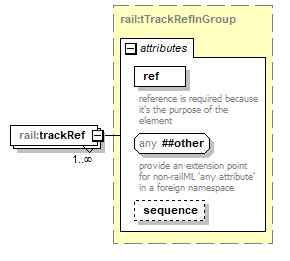 |
||||||||||||||||||||
| namespace | https://www.railml.org/schemas/2018 | ||||||||||||||||||||
| type | rail:tTrackRefInGroup | ||||||||||||||||||||
| properties |
|
||||||||||||||||||||
| attributes |
|
||||||||||||||||||||
| source | <xs:element name="trackRef" type="rail:tTrackRefInGroup" maxOccurs="unbounded"> <xs:annotation> <xs:documentation source="http://wiki.railml.org/index.php?title=IS:trackRef_line"/> </xs:annotation> </xs:element> |
complexType eLineVis
| diagram | 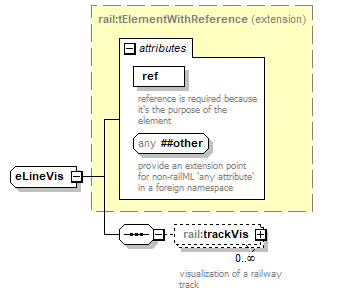 |
||||||||||||||
| namespace | https://www.railml.org/schemas/2018 | ||||||||||||||
| type | extension of rail:tElementWithReference | ||||||||||||||
| properties |
|
||||||||||||||
| children | rail:trackVis | ||||||||||||||
| used by |
|
||||||||||||||
| attributes |
|
||||||||||||||
| source | <xs:complexType name="eLineVis"> <xs:complexContent> <xs:extension base="rail:tElementWithReference"> <xs:sequence> <xs:element name="trackVis" type="rail:eTrackVis" minOccurs="0" maxOccurs="unbounded"> <xs:annotation> <xs:documentation>visualization of a railway track</xs:documentation> </xs:annotation> </xs:element> </xs:sequence> </xs:extension> </xs:complexContent> </xs:complexType> |
element eLineVis/trackVis
| diagram | 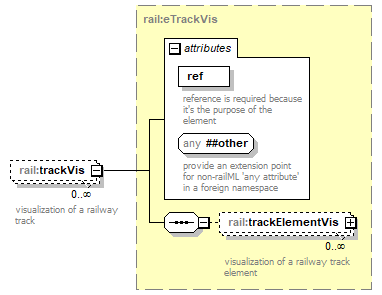 |
||||||||||||||
| namespace | https://www.railml.org/schemas/2018 | ||||||||||||||
| type | rail:eTrackVis | ||||||||||||||
| properties |
|
||||||||||||||
| children | rail:trackElementVis | ||||||||||||||
| attributes |
|
||||||||||||||
| annotation |
|
||||||||||||||
| source | <xs:element name="trackVis" type="rail:eTrackVis" minOccurs="0" maxOccurs="unbounded"> <xs:annotation> <xs:documentation>visualization of a railway track</xs:documentation> </xs:annotation> </xs:element> |
complexType eLocallyControlledArea
| diagram | 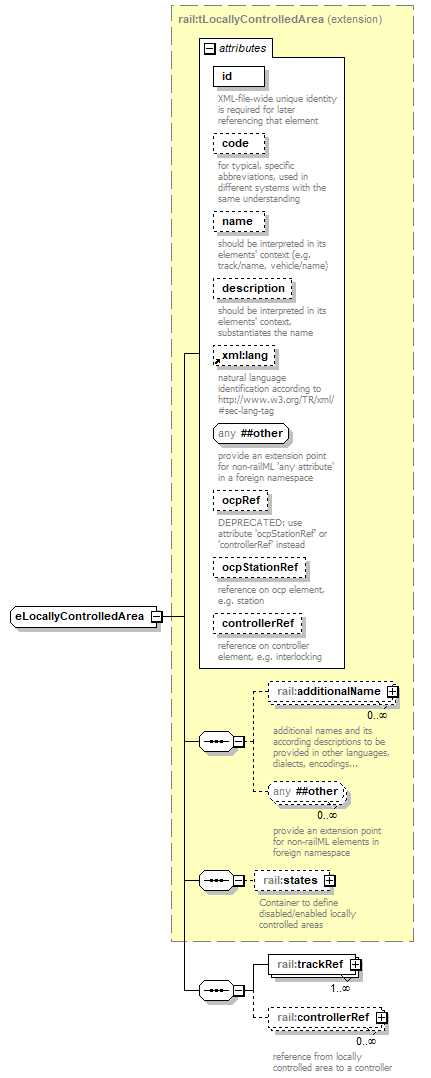 |
||||||||||||||||||||||||||||||||||||||||||||||||||||||||||||||||||||||
| namespace | https://www.railml.org/schemas/2018 | ||||||||||||||||||||||||||||||||||||||||||||||||||||||||||||||||||||||
| type | extension of rail:tLocallyControlledArea | ||||||||||||||||||||||||||||||||||||||||||||||||||||||||||||||||||||||
| properties |
|
||||||||||||||||||||||||||||||||||||||||||||||||||||||||||||||||||||||
| children | rail:additionalName rail:states rail:trackRef rail:controllerRef | ||||||||||||||||||||||||||||||||||||||||||||||||||||||||||||||||||||||
| used by |
|
||||||||||||||||||||||||||||||||||||||||||||||||||||||||||||||||||||||
| attributes |
|
||||||||||||||||||||||||||||||||||||||||||||||||||||||||||||||||||||||
| source | <xs:complexType name="eLocallyControlledArea"> <xs:complexContent> <xs:extension base="rail:tLocallyControlledArea"> <xs:sequence> <xs:element name="trackRef" type="rail:tTrackRefInGroup" maxOccurs="unbounded"> <xs:annotation> <xs:documentation source="http://wiki.railml.org/index.php?title=IS:trackRef_locallyControlledArea"/> </xs:annotation> </xs:element> <xs:element name="controllerRef" type="rail:tElementRefInGroup" minOccurs="0" maxOccurs="unbounded"> <xs:annotation> <xs:documentation>reference from locally controlled area to a controller</xs:documentation> </xs:annotation> </xs:element> </xs:sequence> </xs:extension> </xs:complexContent> </xs:complexType> |
element eLocallyControlledArea/trackRef
| diagram | 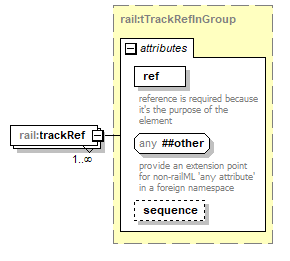 |
||||||||||||||||||||
| namespace | https://www.railml.org/schemas/2018 | ||||||||||||||||||||
| type | rail:tTrackRefInGroup | ||||||||||||||||||||
| properties |
|
||||||||||||||||||||
| attributes |
|
||||||||||||||||||||
| source | <xs:element name="trackRef" type="rail:tTrackRefInGroup" maxOccurs="unbounded"> <xs:annotation> <xs:documentation source="http://wiki.railml.org/index.php?title=IS:trackRef_locallyControlledArea"/> </xs:annotation> </xs:element> |
element eLocallyControlledArea/controllerRef
| diagram | 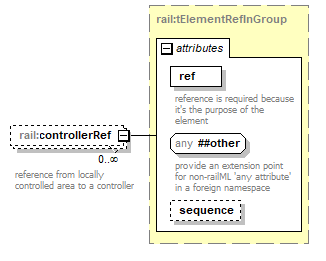 |
||||||||||||||||||||
| namespace | https://www.railml.org/schemas/2018 | ||||||||||||||||||||
| type | rail:tElementRefInGroup | ||||||||||||||||||||
| properties |
|
||||||||||||||||||||
| attributes |
|
||||||||||||||||||||
| annotation |
|
||||||||||||||||||||
| source | <xs:element name="controllerRef" type="rail:tElementRefInGroup" minOccurs="0" maxOccurs="unbounded"> <xs:annotation> <xs:documentation>reference from locally controlled area to a controller</xs:documentation> </xs:annotation> </xs:element> |
complexType eLocks
| diagram | 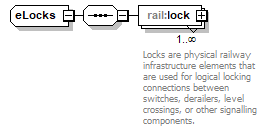 |
||
| namespace | https://www.railml.org/schemas/2018 | ||
| children | rail:lock | ||
| used by |
|
||
| source | <xs:complexType name="eLocks"> <xs:sequence> <xs:element name="lock" type="rail:tLock" maxOccurs="unbounded"> <xs:annotation> <xs:documentation>Locks are physical railway infrastructure elements that are used for logical locking connections between switches, derailers, level crossings, or other signalling components.</xs:documentation> </xs:annotation> </xs:element> </xs:sequence> </xs:complexType> |
element eLocks/lock
| diagram | 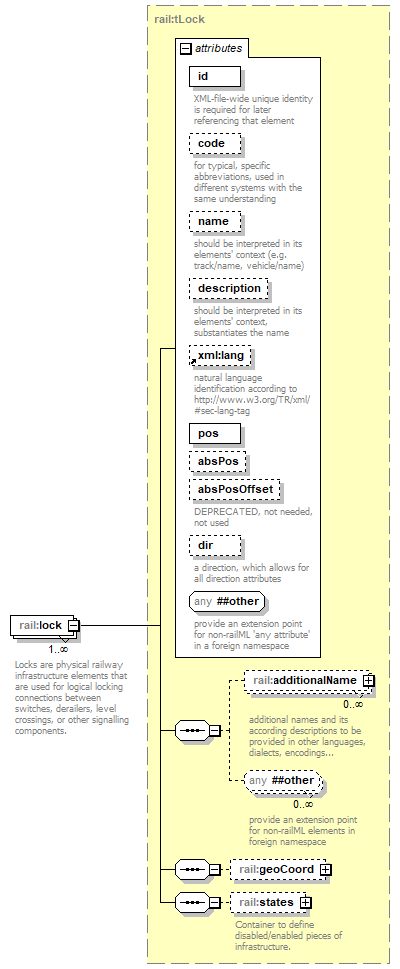 |
||||||||||||||||||||||||||||||||||||||||||||||||||||||||||||||||||||||||||
| namespace | https://www.railml.org/schemas/2018 | ||||||||||||||||||||||||||||||||||||||||||||||||||||||||||||||||||||||||||
| type | rail:tLock | ||||||||||||||||||||||||||||||||||||||||||||||||||||||||||||||||||||||||||
| properties |
|
||||||||||||||||||||||||||||||||||||||||||||||||||||||||||||||||||||||||||
| children | rail:additionalName rail:geoCoord rail:states | ||||||||||||||||||||||||||||||||||||||||||||||||||||||||||||||||||||||||||
| attributes |
|
||||||||||||||||||||||||||||||||||||||||||||||||||||||||||||||||||||||||||
| annotation |
|
||||||||||||||||||||||||||||||||||||||||||||||||||||||||||||||||||||||||||
| source | <xs:element name="lock" type="rail:tLock" maxOccurs="unbounded"> <xs:annotation> <xs:documentation>Locks are physical railway infrastructure elements that are used for logical locking connections between switches, derailers, level crossings, or other signalling components.</xs:documentation> </xs:annotation> </xs:element> |
complexType eMileageChanges
| diagram |  |
||
| namespace | https://www.railml.org/schemas/2018 | ||
| children | rail:mileageChange | ||
| used by |
|
||
| source | <xs:complexType name="eMileageChanges"> <xs:sequence> <xs:element name="mileageChange" type="rail:tMileageChange" minOccurs="0" maxOccurs="unbounded"> <xs:annotation> <xs:documentation source="http://wiki.railml.org/index.php?title=IS:mileageChange"/> </xs:annotation> </xs:element> </xs:sequence> </xs:complexType> |
element eMileageChanges/mileageChange
| diagram | 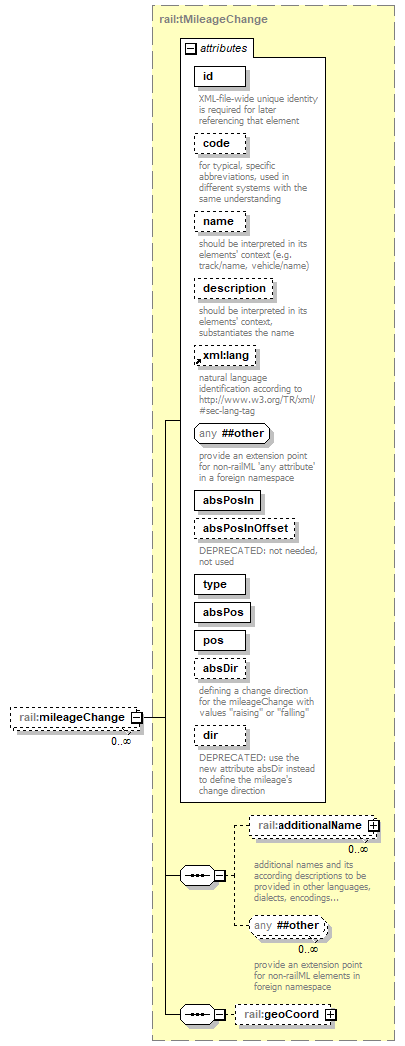 |
||||||||||||||||||||||||||||||||||||||||||||||||||||||||||||||||||||||||||||||||||||||||||||||
| namespace | https://www.railml.org/schemas/2018 | ||||||||||||||||||||||||||||||||||||||||||||||||||||||||||||||||||||||||||||||||||||||||||||||
| type | rail:tMileageChange | ||||||||||||||||||||||||||||||||||||||||||||||||||||||||||||||||||||||||||||||||||||||||||||||
| properties |
|
||||||||||||||||||||||||||||||||||||||||||||||||||||||||||||||||||||||||||||||||||||||||||||||
| children | rail:additionalName rail:geoCoord | ||||||||||||||||||||||||||||||||||||||||||||||||||||||||||||||||||||||||||||||||||||||||||||||
| attributes |
|
||||||||||||||||||||||||||||||||||||||||||||||||||||||||||||||||||||||||||||||||||||||||||||||
| source | <xs:element name="mileageChange" type="rail:tMileageChange" minOccurs="0" maxOccurs="unbounded"> <xs:annotation> <xs:documentation source="http://wiki.railml.org/index.php?title=IS:mileageChange"/> </xs:annotation> </xs:element> |
complexType eOcp
| diagram |  |
||||||||||||||||||||||||||||||||||||||||||||||||||||||||||||||||||||||||||||||||||||
| namespace | https://www.railml.org/schemas/2018 | ||||||||||||||||||||||||||||||||||||||||||||||||||||||||||||||||||||||||||||||||||||
| type | extension of rail:tOperationControlPoint | ||||||||||||||||||||||||||||||||||||||||||||||||||||||||||||||||||||||||||||||||||||
| properties |
|
||||||||||||||||||||||||||||||||||||||||||||||||||||||||||||||||||||||||||||||||||||
| children | rail:additionalName rail:controllerRef rail:propOperational rail:propService rail:propEquipment rail:propOther rail:tsi rail:area rail:geoCoord rail:designator | ||||||||||||||||||||||||||||||||||||||||||||||||||||||||||||||||||||||||||||||||||||
| used by |
|
||||||||||||||||||||||||||||||||||||||||||||||||||||||||||||||||||||||||||||||||||||
| attributes |
|
||||||||||||||||||||||||||||||||||||||||||||||||||||||||||||||||||||||||||||||||||||
| source | <xs:complexType name="eOcp"> <xs:complexContent> <xs:extension base="rail:tOperationControlPoint"> <xs:sequence> <xs:element name="propOperational" type="rail:eOcpPropOperational" minOccurs="0"> <xs:annotation> <xs:documentation source="http://wiki.railml.org/index.php?title=IS:propOperational"/> </xs:annotation> </xs:element> <xs:element name="propService" type="rail:tOcpPropService" minOccurs="0"> <xs:annotation> <xs:documentation source="http://wiki.railml.org/index.php?title=IS:propService"/> </xs:annotation> </xs:element> <xs:element name="propEquipment" type="rail:eOcpPropEquipment" minOccurs="0"> <xs:annotation> <xs:documentation source="http://wiki.railml.org/index.php?title=IS:propEquipment"/> </xs:annotation> </xs:element> <xs:element name="propOther" type="rail:eOcpPropOther" minOccurs="0"> <xs:annotation> <xs:documentation source="http://wiki.railml.org/index.php?title=IS:propOther"/> </xs:annotation> </xs:element> <xs:element name="tsi" type="rail:tOcpTsi" minOccurs="0"> <xs:annotation> <xs:documentation>DEPRECATED. Use register entry "PrimaryLocationCode" instead.</xs:documentation> <xs:documentation source="http://wiki.railml.org/index.php?title=IS:tsi"/> </xs:annotation> </xs:element> <xs:element name="area" type="rail:tOcpArea" minOccurs="0"> <xs:annotation> <xs:documentation source="http://wiki.railml.org/index.php?title=IS:area"/> </xs:annotation> </xs:element> <xs:element name="geoCoord" type="rail:tGeoCoord" minOccurs="0"> <xs:annotation> <xs:documentation source="http://wiki.railml.org/index.php?title=IS:geoCoord_ocp"/> </xs:annotation> </xs:element> <xs:element name="designator" type="rail:tDesignator" minOccurs="0" maxOccurs="unbounded"> <xs:annotation> <xs:documentation source="http://wiki.railml.org/index.php?title=IS:designator"/> </xs:annotation> </xs:element> </xs:sequence> </xs:extension> </xs:complexContent> </xs:complexType> |
element eOcp/propOperational
| diagram | 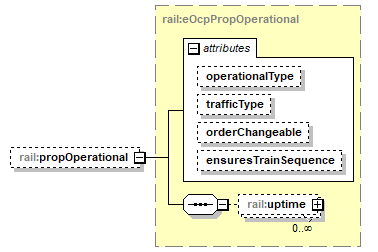 |
||||||||||||||||||||||||||||||
| namespace | https://www.railml.org/schemas/2018 | ||||||||||||||||||||||||||||||
| type | rail:eOcpPropOperational | ||||||||||||||||||||||||||||||
| properties |
|
||||||||||||||||||||||||||||||
| children | rail:uptime | ||||||||||||||||||||||||||||||
| attributes |
|
||||||||||||||||||||||||||||||
| source | <xs:element name="propOperational" type="rail:eOcpPropOperational" minOccurs="0"> <xs:annotation> <xs:documentation source="http://wiki.railml.org/index.php?title=IS:propOperational"/> </xs:annotation> </xs:element> |
element eOcp/propService
| diagram | 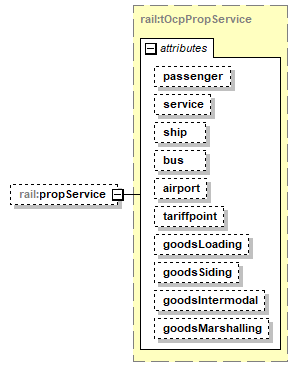 |
||||||||||||||||||||||||||||||||||||||||||||||||||||||||||||||||||
| namespace | https://www.railml.org/schemas/2018 | ||||||||||||||||||||||||||||||||||||||||||||||||||||||||||||||||||
| type | rail:tOcpPropService | ||||||||||||||||||||||||||||||||||||||||||||||||||||||||||||||||||
| properties |
|
||||||||||||||||||||||||||||||||||||||||||||||||||||||||||||||||||
| attributes |
|
||||||||||||||||||||||||||||||||||||||||||||||||||||||||||||||||||
| source | <xs:element name="propService" type="rail:tOcpPropService" minOccurs="0"> <xs:annotation> <xs:documentation source="http://wiki.railml.org/index.php?title=IS:propService"/> </xs:annotation> </xs:element> |
element eOcp/propEquipment
| diagram | 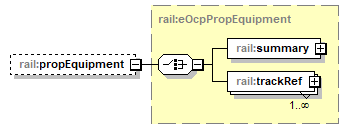 |
||||||
| namespace | https://www.railml.org/schemas/2018 | ||||||
| type | rail:eOcpPropEquipment | ||||||
| properties |
|
||||||
| children | rail:summary rail:trackRef | ||||||
| source | <xs:element name="propEquipment" type="rail:eOcpPropEquipment" minOccurs="0"> <xs:annotation> <xs:documentation source="http://wiki.railml.org/index.php?title=IS:propEquipment"/> </xs:annotation> </xs:element> |
element eOcp/propOther
| diagram | 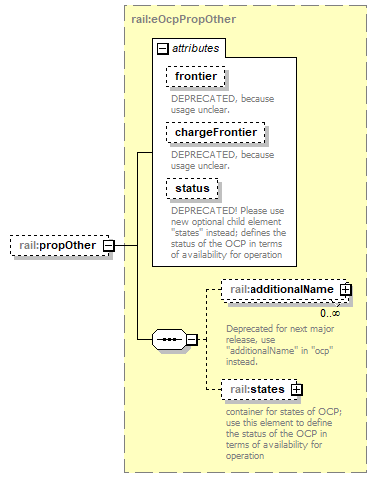 |
||||||||||||||||||||||||||||||
| namespace | https://www.railml.org/schemas/2018 | ||||||||||||||||||||||||||||||
| type | rail:eOcpPropOther | ||||||||||||||||||||||||||||||
| properties |
|
||||||||||||||||||||||||||||||
| children | rail:additionalName rail:states | ||||||||||||||||||||||||||||||
| attributes |
|
||||||||||||||||||||||||||||||
| source | <xs:element name="propOther" type="rail:eOcpPropOther" minOccurs="0"> <xs:annotation> <xs:documentation source="http://wiki.railml.org/index.php?title=IS:propOther"/> </xs:annotation> </xs:element> |
element eOcp/tsi
| diagram | 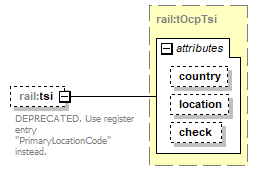 |
||||||||||||||||||||||||
| namespace | https://www.railml.org/schemas/2018 | ||||||||||||||||||||||||
| type | rail:tOcpTsi | ||||||||||||||||||||||||
| properties |
|
||||||||||||||||||||||||
| attributes |
|
||||||||||||||||||||||||
| annotation |
|
||||||||||||||||||||||||
| source | <xs:element name="tsi" type="rail:tOcpTsi" minOccurs="0"> <xs:annotation> <xs:documentation>DEPRECATED. Use register entry "PrimaryLocationCode" instead.</xs:documentation> <xs:documentation source="http://wiki.railml.org/index.php?title=IS:tsi"/> </xs:annotation> </xs:element> |
element eOcp/area
| diagram | 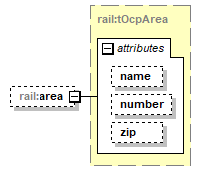 |
||||||||||||||||||||||||
| namespace | https://www.railml.org/schemas/2018 | ||||||||||||||||||||||||
| type | rail:tOcpArea | ||||||||||||||||||||||||
| properties |
|
||||||||||||||||||||||||
| attributes |
|
||||||||||||||||||||||||
| source | <xs:element name="area" type="rail:tOcpArea" minOccurs="0"> <xs:annotation> <xs:documentation source="http://wiki.railml.org/index.php?title=IS:area"/> </xs:annotation> </xs:element> |
element eOcp/geoCoord
| diagram | 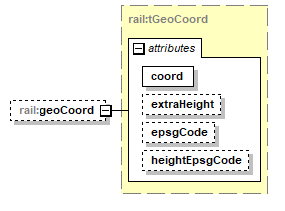 |
||||||||||||||||||||||||||||||
| namespace | https://www.railml.org/schemas/2018 | ||||||||||||||||||||||||||||||
| type | rail:tGeoCoord | ||||||||||||||||||||||||||||||
| properties |
|
||||||||||||||||||||||||||||||
| attributes |
|
||||||||||||||||||||||||||||||
| source | <xs:element name="geoCoord" type="rail:tGeoCoord" minOccurs="0"> <xs:annotation> <xs:documentation source="http://wiki.railml.org/index.php?title=IS:geoCoord_ocp"/> </xs:annotation> </xs:element> |
element eOcp/designator
| diagram | 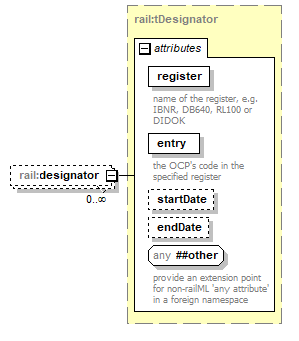 |
||||||||||||||||||||||||||||||||||||
| namespace | https://www.railml.org/schemas/2018 | ||||||||||||||||||||||||||||||||||||
| type | rail:tDesignator | ||||||||||||||||||||||||||||||||||||
| properties |
|
||||||||||||||||||||||||||||||||||||
| attributes |
|
||||||||||||||||||||||||||||||||||||
| source | <xs:element name="designator" type="rail:tDesignator" minOccurs="0" maxOccurs="unbounded"> <xs:annotation> <xs:documentation source="http://wiki.railml.org/index.php?title=IS:designator"/> </xs:annotation> </xs:element> |
complexType eOcpPropEquipment
| diagram |  |
||
| namespace | https://www.railml.org/schemas/2018 | ||
| children | rail:summary rail:trackRef | ||
| used by |
|
||
| source | <xs:complexType name="eOcpPropEquipment"> <xs:choice> <xs:element name="summary" type="rail:tOcpPropEquipmentSummary"> <xs:annotation> <xs:documentation source="http://wiki.railml.org/index.php?title=IS:summary"/> </xs:annotation> </xs:element> <xs:element name="trackRef" type="rail:tTrackRefInGroup" maxOccurs="unbounded"> <xs:annotation> <xs:documentation source="http://wiki.railml.org/index.php?title=IS:trackRef_propEquipment"/> </xs:annotation> </xs:element> </xs:choice> </xs:complexType> |
element eOcpPropEquipment/summary
| diagram | 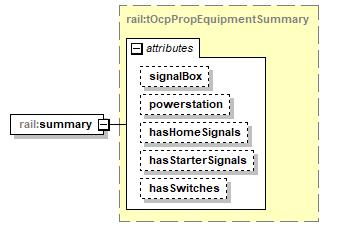 |
||||||||||||||||||||||||||||||||||||
| namespace | https://www.railml.org/schemas/2018 | ||||||||||||||||||||||||||||||||||||
| type | rail:tOcpPropEquipmentSummary | ||||||||||||||||||||||||||||||||||||
| properties |
|
||||||||||||||||||||||||||||||||||||
| attributes |
|
||||||||||||||||||||||||||||||||||||
| source | <xs:element name="summary" type="rail:tOcpPropEquipmentSummary"> <xs:annotation> <xs:documentation source="http://wiki.railml.org/index.php?title=IS:summary"/> </xs:annotation> </xs:element> |
element eOcpPropEquipment/trackRef
| diagram | 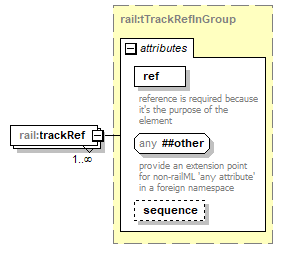 |
||||||||||||||||||||
| namespace | https://www.railml.org/schemas/2018 | ||||||||||||||||||||
| type | rail:tTrackRefInGroup | ||||||||||||||||||||
| properties |
|
||||||||||||||||||||
| attributes |
|
||||||||||||||||||||
| source | <xs:element name="trackRef" type="rail:tTrackRefInGroup" maxOccurs="unbounded"> <xs:annotation> <xs:documentation source="http://wiki.railml.org/index.php?title=IS:trackRef_propEquipment"/> </xs:annotation> </xs:element> |
complexType eOcpPropOperational
| diagram | 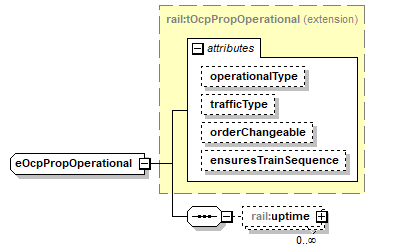 |
||||||||||||||||||||||||||||||
| namespace | https://www.railml.org/schemas/2018 | ||||||||||||||||||||||||||||||
| type | extension of rail:tOcpPropOperational | ||||||||||||||||||||||||||||||
| properties |
|
||||||||||||||||||||||||||||||
| children | rail:uptime | ||||||||||||||||||||||||||||||
| used by |
|
||||||||||||||||||||||||||||||
| attributes |
|
||||||||||||||||||||||||||||||
| source | <xs:complexType name="eOcpPropOperational"> <xs:complexContent> <xs:extension base="rail:tOcpPropOperational"> <xs:sequence> <xs:element name="uptime" type="rail:tOcpUptime" minOccurs="0" maxOccurs="unbounded"> <xs:annotation> <xs:documentation source="http://wiki.railml.org/index.php?title=IS:uptime"/> </xs:annotation> </xs:element> </xs:sequence> </xs:extension> </xs:complexContent> </xs:complexType> |
element eOcpPropOperational/uptime
| diagram | 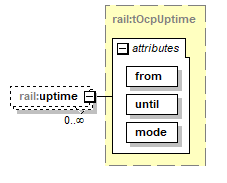 |
||||||||||||||||||||||||
| namespace | https://www.railml.org/schemas/2018 | ||||||||||||||||||||||||
| type | rail:tOcpUptime | ||||||||||||||||||||||||
| properties |
|
||||||||||||||||||||||||
| attributes |
|
||||||||||||||||||||||||
| source | <xs:element name="uptime" type="rail:tOcpUptime" minOccurs="0" maxOccurs="unbounded"> <xs:annotation> <xs:documentation source="http://wiki.railml.org/index.php?title=IS:uptime"/> </xs:annotation> </xs:element> |
complexType eOcpPropOther
| diagram | 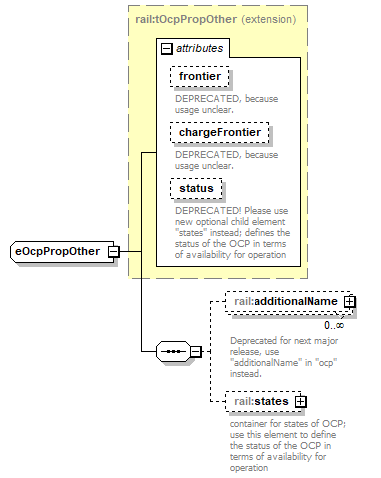 |
||||||||||||||||||||||||||||||
| namespace | https://www.railml.org/schemas/2018 | ||||||||||||||||||||||||||||||
| type | extension of rail:tOcpPropOther | ||||||||||||||||||||||||||||||
| properties |
|
||||||||||||||||||||||||||||||
| children | rail:additionalName rail:states | ||||||||||||||||||||||||||||||
| used by |
|
||||||||||||||||||||||||||||||
| attributes |
|
||||||||||||||||||||||||||||||
| source | <xs:complexType name="eOcpPropOther"> <xs:complexContent> <xs:extension base="rail:tOcpPropOther"> <xs:sequence> <xs:element name="additionalName" type="rail:tOcpAdditionalName" minOccurs="0" maxOccurs="unbounded"> <xs:annotation> <xs:documentation>Deprecated for next major release, use "additionalName" in "ocp" instead.</xs:documentation> </xs:annotation> </xs:element> <xs:element name="states" type="rail:tStates" minOccurs="0"> <xs:annotation> <xs:documentation>container for states of OCP; use this element to define the status of the OCP in terms of availability for operation</xs:documentation> </xs:annotation> </xs:element> </xs:sequence> </xs:extension> </xs:complexContent> </xs:complexType> |
element eOcpPropOther/additionalName
| diagram | 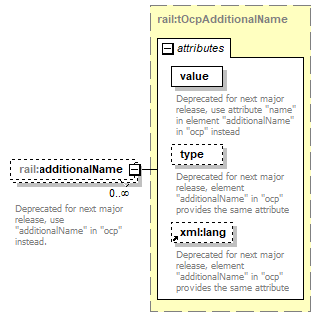 |
||||||||||||||||||||||||||||||
| namespace | https://www.railml.org/schemas/2018 | ||||||||||||||||||||||||||||||
| type | rail:tOcpAdditionalName | ||||||||||||||||||||||||||||||
| properties |
|
||||||||||||||||||||||||||||||
| attributes |
|
||||||||||||||||||||||||||||||
| annotation |
|
||||||||||||||||||||||||||||||
| source | <xs:element name="additionalName" type="rail:tOcpAdditionalName" minOccurs="0" maxOccurs="unbounded"> <xs:annotation> <xs:documentation>Deprecated for next major release, use "additionalName" in "ocp" instead.</xs:documentation> </xs:annotation> </xs:element> |
element eOcpPropOther/states
| diagram | 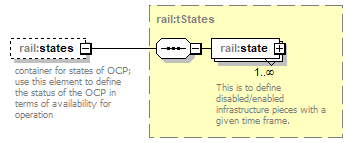 |
||||||
| namespace | https://www.railml.org/schemas/2018 | ||||||
| type | rail:tStates | ||||||
| properties |
|
||||||
| children | rail:state | ||||||
| annotation |
|
||||||
| source | <xs:element name="states" type="rail:tStates" minOccurs="0"> <xs:annotation> <xs:documentation>container for states of OCP; use this element to define the status of the OCP in terms of availability for operation</xs:documentation> </xs:annotation> </xs:element> |
complexType eOcpVis
| diagram | 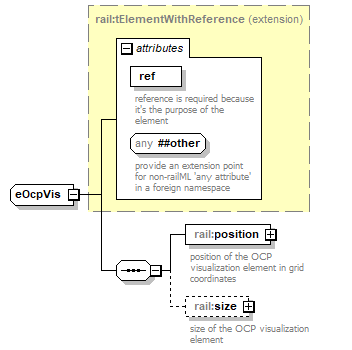 |
||||||||||||||
| namespace | https://www.railml.org/schemas/2018 | ||||||||||||||
| type | extension of rail:tElementWithReference | ||||||||||||||
| properties |
|
||||||||||||||
| children | rail:position rail:size | ||||||||||||||
| used by |
|
||||||||||||||
| attributes |
|
||||||||||||||
| source | <xs:complexType name="eOcpVis"> <xs:complexContent> <xs:extension base="rail:tElementWithReference"> <xs:sequence> <xs:element name="position" type="rail:tPoint"> <xs:annotation> <xs:documentation>position of the OCP visualization element in grid coordinates</xs:documentation> </xs:annotation> </xs:element> <xs:element name="size" type="rail:tSize" minOccurs="0"> <xs:annotation> <xs:documentation>size of the OCP visualization element</xs:documentation> </xs:annotation> </xs:element> </xs:sequence> </xs:extension> </xs:complexContent> </xs:complexType> |
element eOcpVis/position
| diagram | 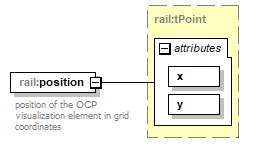 |
||||||||||||||||||
| namespace | https://www.railml.org/schemas/2018 | ||||||||||||||||||
| type | rail:tPoint | ||||||||||||||||||
| properties |
|
||||||||||||||||||
| attributes |
|
||||||||||||||||||
| annotation |
|
||||||||||||||||||
| source | <xs:element name="position" type="rail:tPoint"> <xs:annotation> <xs:documentation>position of the OCP visualization element in grid coordinates</xs:documentation> </xs:annotation> </xs:element> |
element eOcpVis/size
| diagram | 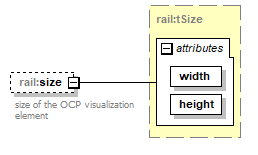 |
||||||||||||||||||
| namespace | https://www.railml.org/schemas/2018 | ||||||||||||||||||
| type | rail:tSize | ||||||||||||||||||
| properties |
|
||||||||||||||||||
| attributes |
|
||||||||||||||||||
| annotation |
|
||||||||||||||||||
| source | <xs:element name="size" type="rail:tSize" minOccurs="0"> <xs:annotation> <xs:documentation>size of the OCP visualization element</xs:documentation> </xs:annotation> </xs:element> |
complexType eOcsElements
| diagram | 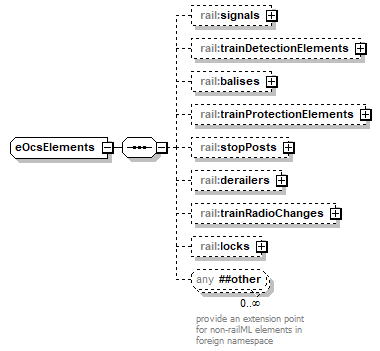 |
||
| namespace | https://www.railml.org/schemas/2018 | ||
| children | rail:signals rail:trainDetectionElements rail:balises rail:trainProtectionElements rail:stopPosts rail:derailers rail:trainRadioChanges rail:locks | ||
| used by |
|
||
| source | <xs:complexType name="eOcsElements"> <xs:sequence> <xs:element name="signals" type="rail:eSignals" minOccurs="0"> <xs:annotation> <xs:documentation source="http://wiki.railml.org/index.php?title=IS:signals"/> </xs:annotation> </xs:element> <xs:element name="trainDetectionElements" type="rail:eTrainDetectionElements" minOccurs="0"> <xs:annotation> <xs:documentation source="http://wiki.railml.org/index.php?title=IS:trainDetectionElements"/> </xs:annotation> </xs:element> <xs:element name="balises" type="rail:eBalises" minOccurs="0"> <xs:annotation> <xs:documentation source="http://wiki.railml.org/index.php?title=IS:balises"/> </xs:annotation> </xs:element> <xs:element name="trainProtectionElements" type="rail:eTrainProtectionElements" minOccurs="0"> <xs:annotation> <xs:documentation source="http://wiki.railml.org/index.php?title=IS:trainProtectionElements"/> </xs:annotation> </xs:element> <xs:element name="stopPosts" type="rail:eStopPosts" minOccurs="0"> <xs:annotation> <xs:documentation source="http://wiki.railml.org/index.php?title=IS:stopPosts"/> </xs:annotation> </xs:element> <xs:element name="derailers" type="rail:eDerailers" minOccurs="0"> <xs:annotation> <xs:documentation source="http://wiki.railml.org/index.php?title=IS:derailers"/> </xs:annotation> </xs:element> <xs:element name="trainRadioChanges" type="rail:eTrainRadioChanges" minOccurs="0"> <xs:annotation> <xs:documentation source="http://wiki.railml.org/index.php?title=IS:trainRadios"/> </xs:annotation> </xs:element> <xs:element name="locks" type="rail:eLocks" minOccurs="0"> <xs:annotation> <xs:documentation source="http://wiki.railml.org/index.php?title=IS:locks"/> </xs:annotation> </xs:element> <xs:any namespace="##other" processContents="strict" minOccurs="0" maxOccurs="unbounded"> <xs:annotation> <xs:documentation>provide an extension point for non-railML elements in foreign namespace</xs:documentation> </xs:annotation> </xs:any> </xs:sequence> </xs:complexType> |
element eOcsElements/signals
| diagram | 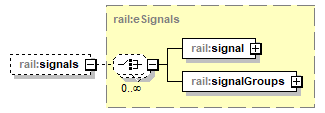 |
||||||
| namespace | https://www.railml.org/schemas/2018 | ||||||
| type | rail:eSignals | ||||||
| properties |
|
||||||
| children | rail:signal rail:signalGroups | ||||||
| source | <xs:element name="signals" type="rail:eSignals" minOccurs="0"> <xs:annotation> <xs:documentation source="http://wiki.railml.org/index.php?title=IS:signals"/> </xs:annotation> </xs:element> |
element eOcsElements/trainDetectionElements
| diagram |  |
||||||
| namespace | https://www.railml.org/schemas/2018 | ||||||
| type | rail:eTrainDetectionElements | ||||||
| properties |
|
||||||
| children | rail:trainDetector rail:trackCircuitBorder | ||||||
| source | <xs:element name="trainDetectionElements" type="rail:eTrainDetectionElements" minOccurs="0"> <xs:annotation> <xs:documentation source="http://wiki.railml.org/index.php?title=IS:trainDetectionElements"/> </xs:annotation> </xs:element> |
element eOcsElements/balises
| diagram | 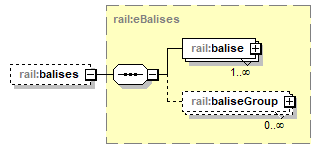 |
||||||
| namespace | https://www.railml.org/schemas/2018 | ||||||
| type | rail:eBalises | ||||||
| properties |
|
||||||
| children | rail:balise rail:baliseGroup | ||||||
| source | <xs:element name="balises" type="rail:eBalises" minOccurs="0"> <xs:annotation> <xs:documentation source="http://wiki.railml.org/index.php?title=IS:balises"/> </xs:annotation> </xs:element> |
element eOcsElements/trainProtectionElements
| diagram |  |
||||||
| namespace | https://www.railml.org/schemas/2018 | ||||||
| type | rail:eTrainProtectionElements | ||||||
| properties |
|
||||||
| children | rail:trainProtectionElement rail:trainProtectionElementGroup | ||||||
| source | <xs:element name="trainProtectionElements" type="rail:eTrainProtectionElements" minOccurs="0"> <xs:annotation> <xs:documentation source="http://wiki.railml.org/index.php?title=IS:trainProtectionElements"/> </xs:annotation> </xs:element> |
element eOcsElements/stopPosts
| diagram |  |
||||||
| namespace | https://www.railml.org/schemas/2018 | ||||||
| type | rail:eStopPosts | ||||||
| properties |
|
||||||
| children | rail:stopPost | ||||||
| source | <xs:element name="stopPosts" type="rail:eStopPosts" minOccurs="0"> <xs:annotation> <xs:documentation source="http://wiki.railml.org/index.php?title=IS:stopPosts"/> </xs:annotation> </xs:element> |
element eOcsElements/derailers
| diagram |  |
||||||
| namespace | https://www.railml.org/schemas/2018 | ||||||
| type | rail:eDerailers | ||||||
| properties |
|
||||||
| children | rail:derailer | ||||||
| source | <xs:element name="derailers" type="rail:eDerailers" minOccurs="0"> <xs:annotation> <xs:documentation source="http://wiki.railml.org/index.php?title=IS:derailers"/> </xs:annotation> </xs:element> |
element eOcsElements/trainRadioChanges
| diagram |  |
||||||
| namespace | https://www.railml.org/schemas/2018 | ||||||
| type | rail:eTrainRadioChanges | ||||||
| properties |
|
||||||
| children | rail:trainRadioChange | ||||||
| source | <xs:element name="trainRadioChanges" type="rail:eTrainRadioChanges" minOccurs="0"> <xs:annotation> <xs:documentation source="http://wiki.railml.org/index.php?title=IS:trainRadios"/> </xs:annotation> </xs:element> |
element eOcsElements/locks
| diagram | 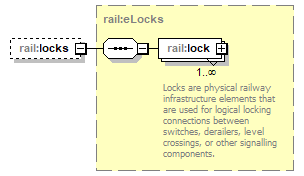 |
||||||
| namespace | https://www.railml.org/schemas/2018 | ||||||
| type | rail:eLocks | ||||||
| properties |
|
||||||
| children | rail:lock | ||||||
| source | <xs:element name="locks" type="rail:eLocks" minOccurs="0"> <xs:annotation> <xs:documentation source="http://wiki.railml.org/index.php?title=IS:locks"/> </xs:annotation> </xs:element> |
complexType eOperationControlPoints
| diagram |  |
||
| namespace | https://www.railml.org/schemas/2018 | ||
| children | rail:ocp | ||
| used by |
|
||
| source | <xs:complexType name="eOperationControlPoints"> <xs:sequence> <xs:element name="ocp" type="rail:eOcp" maxOccurs="unbounded"> <xs:annotation> <xs:documentation source="http://wiki.railml.org/index.php?title=IS:ocp"/> </xs:annotation> </xs:element> </xs:sequence> </xs:complexType> |
element eOperationControlPoints/ocp
| diagram |  |
||||||||||||||||||||||||||||||||||||||||||||||||||||||||||||||||||||||||||||||||||||
| namespace | https://www.railml.org/schemas/2018 | ||||||||||||||||||||||||||||||||||||||||||||||||||||||||||||||||||||||||||||||||||||
| type | rail:eOcp | ||||||||||||||||||||||||||||||||||||||||||||||||||||||||||||||||||||||||||||||||||||
| properties |
|
||||||||||||||||||||||||||||||||||||||||||||||||||||||||||||||||||||||||||||||||||||
| children | rail:additionalName rail:controllerRef rail:propOperational rail:propService rail:propEquipment rail:propOther rail:tsi rail:area rail:geoCoord rail:designator | ||||||||||||||||||||||||||||||||||||||||||||||||||||||||||||||||||||||||||||||||||||
| attributes |
|
||||||||||||||||||||||||||||||||||||||||||||||||||||||||||||||||||||||||||||||||||||
| source | <xs:element name="ocp" type="rail:eOcp" maxOccurs="unbounded"> <xs:annotation> <xs:documentation source="http://wiki.railml.org/index.php?title=IS:ocp"/> </xs:annotation> </xs:element> |
complexType eOperationModeChanges
| diagram |  |
||
| namespace | https://www.railml.org/schemas/2018 | ||
| children | rail:operationModeChange | ||
| used by |
|
||
| source | <xs:complexType name="eOperationModeChanges"> <xs:sequence> <xs:element name="operationModeChange" type="rail:tOperationModeChange" minOccurs="0" maxOccurs="unbounded"> <xs:annotation> <xs:documentation source="http://wiki.railml.org/index.php?title=IS:operationModeChange"/> </xs:annotation> </xs:element> </xs:sequence> </xs:complexType> |
element eOperationModeChanges/operationModeChange
| diagram | 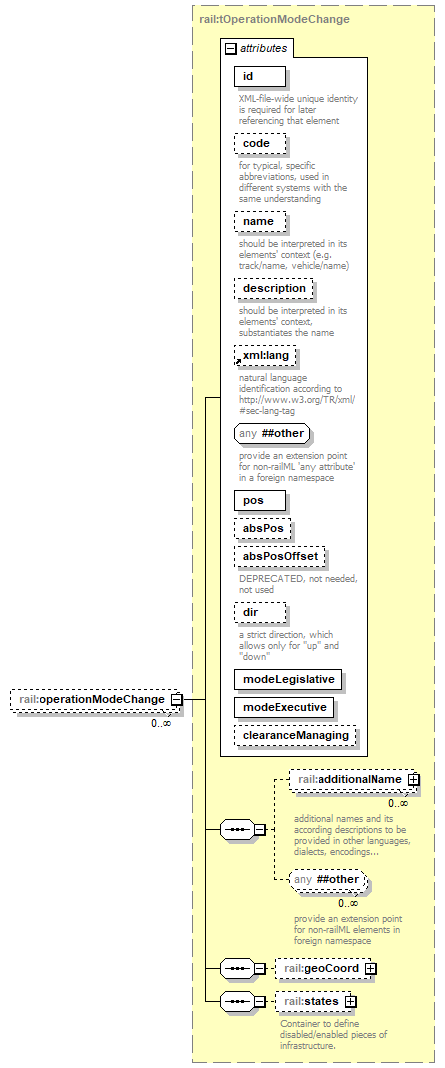 |
||||||||||||||||||||||||||||||||||||||||||||||||||||||||||||||||||||||||||||||||||||||||||||
| namespace | https://www.railml.org/schemas/2018 | ||||||||||||||||||||||||||||||||||||||||||||||||||||||||||||||||||||||||||||||||||||||||||||
| type | rail:tOperationModeChange | ||||||||||||||||||||||||||||||||||||||||||||||||||||||||||||||||||||||||||||||||||||||||||||
| properties |
|
||||||||||||||||||||||||||||||||||||||||||||||||||||||||||||||||||||||||||||||||||||||||||||
| children | rail:additionalName rail:geoCoord rail:states | ||||||||||||||||||||||||||||||||||||||||||||||||||||||||||||||||||||||||||||||||||||||||||||
| attributes |
|
||||||||||||||||||||||||||||||||||||||||||||||||||||||||||||||||||||||||||||||||||||||||||||
| source | <xs:element name="operationModeChange" type="rail:tOperationModeChange" minOccurs="0" maxOccurs="unbounded"> <xs:annotation> <xs:documentation source="http://wiki.railml.org/index.php?title=IS:operationModeChange"/> </xs:annotation> </xs:element> |
complexType eOwnerChanges
| diagram |  |
||
| namespace | https://www.railml.org/schemas/2018 | ||
| children | rail:ownerChange | ||
| used by |
|
||
| source | <xs:complexType name="eOwnerChanges"> <xs:sequence> <xs:element name="ownerChange" type="rail:tOwnerChange" minOccurs="0" maxOccurs="unbounded"> <xs:annotation> <xs:documentation source="http://wiki.railml.org/index.php?title=IS:ownerChange"/> </xs:annotation> </xs:element> </xs:sequence> </xs:complexType> |
element eOwnerChanges/ownerChange
| diagram | 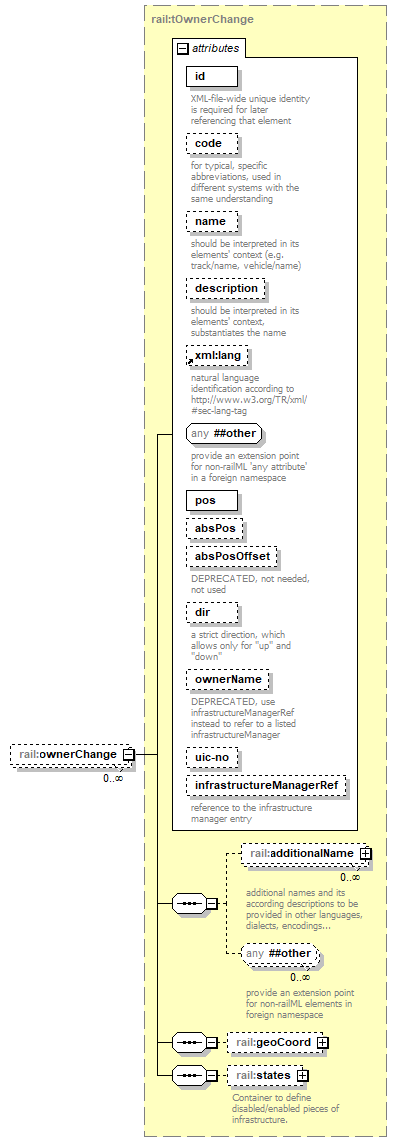 |
||||||||||||||||||||||||||||||||||||||||||||||||||||||||||||||||||||||||||||||||||||||||||||||||
| namespace | https://www.railml.org/schemas/2018 | ||||||||||||||||||||||||||||||||||||||||||||||||||||||||||||||||||||||||||||||||||||||||||||||||
| type | rail:tOwnerChange | ||||||||||||||||||||||||||||||||||||||||||||||||||||||||||||||||||||||||||||||||||||||||||||||||
| properties |
|
||||||||||||||||||||||||||||||||||||||||||||||||||||||||||||||||||||||||||||||||||||||||||||||||
| children | rail:additionalName rail:geoCoord rail:states | ||||||||||||||||||||||||||||||||||||||||||||||||||||||||||||||||||||||||||||||||||||||||||||||||
| attributes |
|
||||||||||||||||||||||||||||||||||||||||||||||||||||||||||||||||||||||||||||||||||||||||||||||||
| source | <xs:element name="ownerChange" type="rail:tOwnerChange" minOccurs="0" maxOccurs="unbounded"> <xs:annotation> <xs:documentation source="http://wiki.railml.org/index.php?title=IS:ownerChange"/> </xs:annotation> </xs:element> |
complexType ePlatformEdges
| diagram |  |
||
| namespace | https://www.railml.org/schemas/2018 | ||
| children | rail:platformEdge | ||
| used by |
|
||
| source | <xs:complexType name="ePlatformEdges"> <xs:sequence> <xs:element name="platformEdge" type="rail:tPlatformEdge" minOccurs="0" maxOccurs="unbounded"> <xs:annotation> <xs:documentation source="http://wiki.railml.org/index.php?title=IS:platformEdge"/> </xs:annotation> </xs:element> </xs:sequence> </xs:complexType> |
element ePlatformEdges/platformEdge
| diagram |  |
||||||||||||||||||||||||||||||||||||||||||||||||||||||||||||||||||||||||||||||||||||||||||||||||||||||||||||||||||
| namespace | https://www.railml.org/schemas/2018 | ||||||||||||||||||||||||||||||||||||||||||||||||||||||||||||||||||||||||||||||||||||||||||||||||||||||||||||||||||
| type | rail:tPlatformEdge | ||||||||||||||||||||||||||||||||||||||||||||||||||||||||||||||||||||||||||||||||||||||||||||||||||||||||||||||||||
| properties |
|
||||||||||||||||||||||||||||||||||||||||||||||||||||||||||||||||||||||||||||||||||||||||||||||||||||||||||||||||||
| children | rail:additionalName rail:geoCoord rail:states | ||||||||||||||||||||||||||||||||||||||||||||||||||||||||||||||||||||||||||||||||||||||||||||||||||||||||||||||||||
| attributes |
|
||||||||||||||||||||||||||||||||||||||||||||||||||||||||||||||||||||||||||||||||||||||||||||||||||||||||||||||||||
| source | <xs:element name="platformEdge" type="rail:tPlatformEdge" minOccurs="0" maxOccurs="unbounded"> <xs:annotation> <xs:documentation source="http://wiki.railml.org/index.php?title=IS:platformEdge"/> </xs:annotation> </xs:element> |
complexType ePowerTransmissionChanges
| diagram |  |
||
| namespace | https://www.railml.org/schemas/2018 | ||
| children | rail:powerTransmissionChange | ||
| used by |
|
||
| source | <xs:complexType name="ePowerTransmissionChanges"> <xs:sequence> <xs:element name="powerTransmissionChange" type="rail:tPowerTransmissionChange" minOccurs="0" maxOccurs="unbounded"> <xs:annotation> <xs:documentation source="http://wiki.railml.org/index.php?title=IS:powerTransmissionChange"/> </xs:annotation> </xs:element> </xs:sequence> </xs:complexType> |
element ePowerTransmissionChanges/powerTransmissionChange
| diagram | 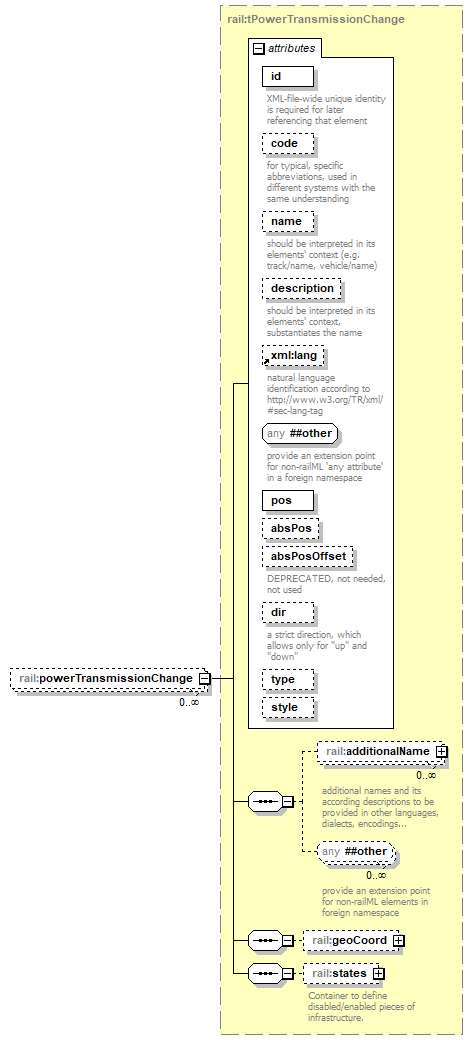 |
||||||||||||||||||||||||||||||||||||||||||||||||||||||||||||||||||||||||||||||||||||||
| namespace | https://www.railml.org/schemas/2018 | ||||||||||||||||||||||||||||||||||||||||||||||||||||||||||||||||||||||||||||||||||||||
| type | rail:tPowerTransmissionChange | ||||||||||||||||||||||||||||||||||||||||||||||||||||||||||||||||||||||||||||||||||||||
| properties |
|
||||||||||||||||||||||||||||||||||||||||||||||||||||||||||||||||||||||||||||||||||||||
| children | rail:additionalName rail:geoCoord rail:states | ||||||||||||||||||||||||||||||||||||||||||||||||||||||||||||||||||||||||||||||||||||||
| attributes |
|
||||||||||||||||||||||||||||||||||||||||||||||||||||||||||||||||||||||||||||||||||||||
| source | <xs:element name="powerTransmissionChange" type="rail:tPowerTransmissionChange" minOccurs="0" maxOccurs="unbounded"> <xs:annotation> <xs:documentation source="http://wiki.railml.org/index.php?title=IS:powerTransmissionChange"/> </xs:annotation> </xs:element> |
complexType eRadiusChanges
| diagram |  |
||
| namespace | https://www.railml.org/schemas/2018 | ||
| children | rail:radiusChange | ||
| used by |
|
||
| source | <xs:complexType name="eRadiusChanges"> <xs:sequence> <xs:element name="radiusChange" type="rail:tRadiusChange" minOccurs="0" maxOccurs="unbounded"> <xs:annotation> <xs:documentation source="http://wiki.railml.org/index.php?title=IS:radiusChange"/> </xs:annotation> </xs:element> </xs:sequence> </xs:complexType> |
element eRadiusChanges/radiusChange
| diagram |  |
||||||||||||||||||||||||||||||||||||||||||||||||||||||||||||||||||||||||||||||||||||||||||||||||||
| namespace | https://www.railml.org/schemas/2018 | ||||||||||||||||||||||||||||||||||||||||||||||||||||||||||||||||||||||||||||||||||||||||||||||||||
| type | rail:tRadiusChange | ||||||||||||||||||||||||||||||||||||||||||||||||||||||||||||||||||||||||||||||||||||||||||||||||||
| properties |
|
||||||||||||||||||||||||||||||||||||||||||||||||||||||||||||||||||||||||||||||||||||||||||||||||||
| children | rail:additionalName rail:geoCoord rail:states | ||||||||||||||||||||||||||||||||||||||||||||||||||||||||||||||||||||||||||||||||||||||||||||||||||
| attributes |
|
||||||||||||||||||||||||||||||||||||||||||||||||||||||||||||||||||||||||||||||||||||||||||||||||||
| source | <xs:element name="radiusChange" type="rail:tRadiusChange" minOccurs="0" maxOccurs="unbounded"> <xs:annotation> <xs:documentation source="http://wiki.railml.org/index.php?title=IS:radiusChange"/> </xs:annotation> </xs:element> |
complexType eServiceSections
| diagram |  |
||
| namespace | https://www.railml.org/schemas/2018 | ||
| children | rail:serviceSection | ||
| used by |
|
||
| source | <xs:complexType name="eServiceSections"> <xs:sequence> <xs:element name="serviceSection" type="rail:tServiceSection" minOccurs="0" maxOccurs="unbounded"> <xs:annotation> <xs:documentation source="http://wiki.railml.org/index.php?title=IS:serviceSection"/> </xs:annotation> </xs:element> </xs:sequence> </xs:complexType> |
element eServiceSections/serviceSection
| diagram |  |
||||||||||||||||||||||||||||||||||||||||||||||||||||||||||||||||||||||||||||||||||||||||||||||||||||||||||||||||||||||||||||||||||||||||||||||||||||||||||||||||||||||||||
| namespace | https://www.railml.org/schemas/2018 | ||||||||||||||||||||||||||||||||||||||||||||||||||||||||||||||||||||||||||||||||||||||||||||||||||||||||||||||||||||||||||||||||||||||||||||||||||||||||||||||||||||||||||
| type | rail:tServiceSection | ||||||||||||||||||||||||||||||||||||||||||||||||||||||||||||||||||||||||||||||||||||||||||||||||||||||||||||||||||||||||||||||||||||||||||||||||||||||||||||||||||||||||||
| properties |
|
||||||||||||||||||||||||||||||||||||||||||||||||||||||||||||||||||||||||||||||||||||||||||||||||||||||||||||||||||||||||||||||||||||||||||||||||||||||||||||||||||||||||||
| children | rail:additionalName rail:geoCoord rail:states | ||||||||||||||||||||||||||||||||||||||||||||||||||||||||||||||||||||||||||||||||||||||||||||||||||||||||||||||||||||||||||||||||||||||||||||||||||||||||||||||||||||||||||
| attributes |
|
||||||||||||||||||||||||||||||||||||||||||||||||||||||||||||||||||||||||||||||||||||||||||||||||||||||||||||||||||||||||||||||||||||||||||||||||||||||||||||||||||||||||||
| source | <xs:element name="serviceSection" type="rail:tServiceSection" minOccurs="0" maxOccurs="unbounded"> <xs:annotation> <xs:documentation source="http://wiki.railml.org/index.php?title=IS:serviceSection"/> </xs:annotation> </xs:element> |
complexType eSignalGroup
| diagram | 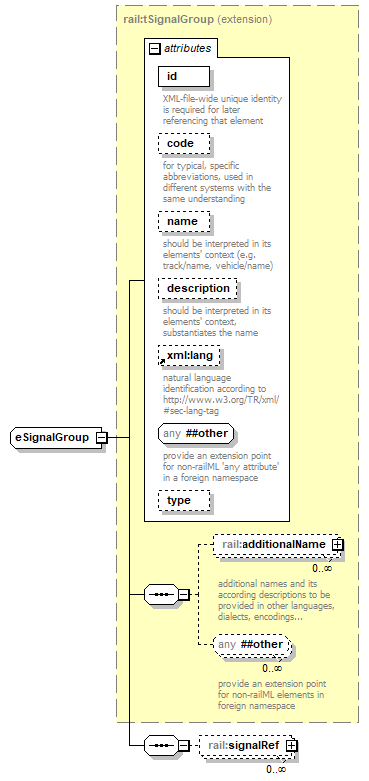 |
||||||||||||||||||||||||||||||||||||||||||||||||||||
| namespace | https://www.railml.org/schemas/2018 | ||||||||||||||||||||||||||||||||||||||||||||||||||||
| type | extension of rail:tSignalGroup | ||||||||||||||||||||||||||||||||||||||||||||||||||||
| properties |
|
||||||||||||||||||||||||||||||||||||||||||||||||||||
| children | rail:additionalName rail:signalRef | ||||||||||||||||||||||||||||||||||||||||||||||||||||
| used by |
|
||||||||||||||||||||||||||||||||||||||||||||||||||||
| attributes |
|
||||||||||||||||||||||||||||||||||||||||||||||||||||
| source | <xs:complexType name="eSignalGroup"> <xs:complexContent> <xs:extension base="rail:tSignalGroup"> <xs:sequence> <xs:element name="signalRef" type="rail:tSignalRefInGroup" minOccurs="0" maxOccurs="unbounded"> <xs:annotation> <xs:documentation source="http://wiki.railml.org/index.php?title=IS:signalRef"/> </xs:annotation> </xs:element> </xs:sequence> </xs:extension> </xs:complexContent> </xs:complexType> |
element eSignalGroup/signalRef
| diagram | 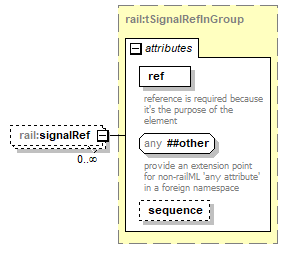 |
||||||||||||||||||||
| namespace | https://www.railml.org/schemas/2018 | ||||||||||||||||||||
| type | rail:tSignalRefInGroup | ||||||||||||||||||||
| properties |
|
||||||||||||||||||||
| attributes |
|
||||||||||||||||||||
| source | <xs:element name="signalRef" type="rail:tSignalRefInGroup" minOccurs="0" maxOccurs="unbounded"> <xs:annotation> <xs:documentation source="http://wiki.railml.org/index.php?title=IS:signalRef"/> </xs:annotation> </xs:element> |
complexType eSignalGroups
| diagram |  |
||
| namespace | https://www.railml.org/schemas/2018 | ||
| children | rail:signalGroup | ||
| used by |
|
||
| source | <xs:complexType name="eSignalGroups"> <xs:sequence> <xs:element name="signalGroup" type="rail:eSignalGroup" minOccurs="0" maxOccurs="unbounded"> <xs:annotation> <xs:documentation source="http://wiki.railml.org/index.php?title=IS:signalGroup"/> </xs:annotation> </xs:element> </xs:sequence> </xs:complexType> |
element eSignalGroups/signalGroup
| diagram | 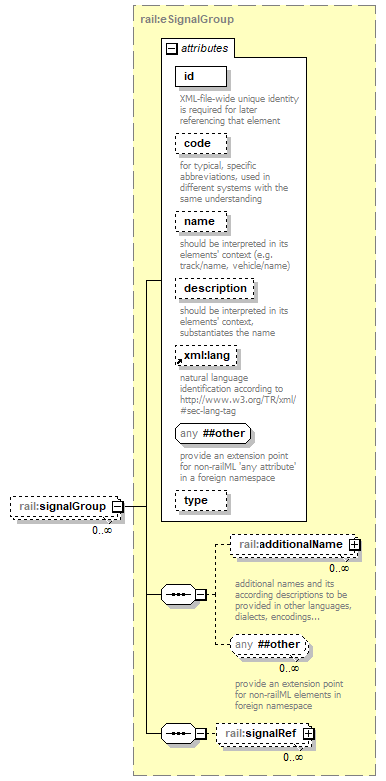 |
||||||||||||||||||||||||||||||||||||||||||||||||||||
| namespace | https://www.railml.org/schemas/2018 | ||||||||||||||||||||||||||||||||||||||||||||||||||||
| type | rail:eSignalGroup | ||||||||||||||||||||||||||||||||||||||||||||||||||||
| properties |
|
||||||||||||||||||||||||||||||||||||||||||||||||||||
| children | rail:additionalName rail:signalRef | ||||||||||||||||||||||||||||||||||||||||||||||||||||
| attributes |
|
||||||||||||||||||||||||||||||||||||||||||||||||||||
| source | <xs:element name="signalGroup" type="rail:eSignalGroup" minOccurs="0" maxOccurs="unbounded"> <xs:annotation> <xs:documentation source="http://wiki.railml.org/index.php?title=IS:signalGroup"/> </xs:annotation> </xs:element> |
complexType eSignals
| diagram |  |
||
| namespace | https://www.railml.org/schemas/2018 | ||
| children | rail:signal rail:signalGroups | ||
| used by |
|
||
| source | <xs:complexType name="eSignals"> <xs:choice minOccurs="0" maxOccurs="unbounded"> <xs:element name="signal" type="rail:tSignal"> <xs:annotation> <xs:documentation source="http://wiki.railml.org/index.php?title=IS:signal"/> </xs:annotation> </xs:element> <xs:element name="signalGroups" type="rail:eSignalGroups"> <xs:annotation> <xs:documentation source="http://wiki.railml.org/index.php?title=IS:signalGroups"/> </xs:annotation> </xs:element> </xs:choice> </xs:complexType> |
element eSignals/signal
| diagram |  |
||||||||||||||||||||||||||||||||||||||||||||||||||||||||||||||||||||||||||||||||||||||||||||||||||||||||||||||||||||||||||||||||||||||||||||||||||||||||||||||||||||||||||||||||||||||||||||||||
| namespace | https://www.railml.org/schemas/2018 | ||||||||||||||||||||||||||||||||||||||||||||||||||||||||||||||||||||||||||||||||||||||||||||||||||||||||||||||||||||||||||||||||||||||||||||||||||||||||||||||||||||||||||||||||||||||||||||||||
| type | rail:tSignal | ||||||||||||||||||||||||||||||||||||||||||||||||||||||||||||||||||||||||||||||||||||||||||||||||||||||||||||||||||||||||||||||||||||||||||||||||||||||||||||||||||||||||||||||||||||||||||||||||
| properties |
|
||||||||||||||||||||||||||||||||||||||||||||||||||||||||||||||||||||||||||||||||||||||||||||||||||||||||||||||||||||||||||||||||||||||||||||||||||||||||||||||||||||||||||||||||||||||||||||||||
| children | rail:additionalName rail:geoCoord rail:states rail:speed rail:etcs rail:levelCrossing rail:trainRadio rail:catenary rail:line rail:milepost rail:braking rail:trainProtectionElementGroupRef rail:baliseGroupRef | ||||||||||||||||||||||||||||||||||||||||||||||||||||||||||||||||||||||||||||||||||||||||||||||||||||||||||||||||||||||||||||||||||||||||||||||||||||||||||||||||||||||||||||||||||||||||||||||||
| attributes |
|
||||||||||||||||||||||||||||||||||||||||||||||||||||||||||||||||||||||||||||||||||||||||||||||||||||||||||||||||||||||||||||||||||||||||||||||||||||||||||||||||||||||||||||||||||||||||||||||||
| source | <xs:element name="signal" type="rail:tSignal"> <xs:annotation> <xs:documentation source="http://wiki.railml.org/index.php?title=IS:signal"/> </xs:annotation> </xs:element> |
element eSignals/signalGroups
| diagram |  |
||
| namespace | https://www.railml.org/schemas/2018 | ||
| type | rail:eSignalGroups | ||
| properties |
|
||
| children | rail:signalGroup | ||
| source | <xs:element name="signalGroups" type="rail:eSignalGroups"> <xs:annotation> <xs:documentation source="http://wiki.railml.org/index.php?title=IS:signalGroups"/> </xs:annotation> </xs:element> |
complexType eSpeedChanges
| diagram |  |
||
| namespace | https://www.railml.org/schemas/2018 | ||
| children | rail:speedChange | ||
| used by |
|
||
| source | <xs:complexType name="eSpeedChanges"> <xs:sequence> <xs:element name="speedChange" type="rail:tSpeedChange" minOccurs="0" maxOccurs="unbounded"> <xs:annotation> <xs:documentation source="http://wiki.railml.org/index.php?title=IS:speedChange"/> </xs:annotation> </xs:element> </xs:sequence> </xs:complexType> |
element eSpeedChanges/speedChange
| diagram |  |
||||||||||||||||||||||||||||||||||||||||||||||||||||||||||||||||||||||||||||||||||||||||||||||||||||||||||||||||||||||||||||||||||||||||||
| namespace | https://www.railml.org/schemas/2018 | ||||||||||||||||||||||||||||||||||||||||||||||||||||||||||||||||||||||||||||||||||||||||||||||||||||||||||||||||||||||||||||||||||||||||||
| type | rail:tSpeedChange | ||||||||||||||||||||||||||||||||||||||||||||||||||||||||||||||||||||||||||||||||||||||||||||||||||||||||||||||||||||||||||||||||||||||||||
| properties |
|
||||||||||||||||||||||||||||||||||||||||||||||||||||||||||||||||||||||||||||||||||||||||||||||||||||||||||||||||||||||||||||||||||||||||||
| children | rail:additionalName rail:geoCoord rail:states | ||||||||||||||||||||||||||||||||||||||||||||||||||||||||||||||||||||||||||||||||||||||||||||||||||||||||||||||||||||||||||||||||||||||||||
| attributes |
|
||||||||||||||||||||||||||||||||||||||||||||||||||||||||||||||||||||||||||||||||||||||||||||||||||||||||||||||||||||||||||||||||||||||||||
| source | <xs:element name="speedChange" type="rail:tSpeedChange" minOccurs="0" maxOccurs="unbounded"> <xs:annotation> <xs:documentation source="http://wiki.railml.org/index.php?title=IS:speedChange"/> </xs:annotation> </xs:element> |
complexType eSpeedProfiles
| diagram |  |
||
| namespace | https://www.railml.org/schemas/2018 | ||
| children | rail:speedProfile | ||
| used by |
|
||
| source | <xs:complexType name="eSpeedProfiles"> <xs:sequence> <xs:element name="speedProfile" type="rail:tSpeedProfile" minOccurs="0" maxOccurs="unbounded"> <xs:annotation> <xs:documentation source="http://wiki.railml.org/index.php?title=IS:speedProfile"/> </xs:annotation> </xs:element> </xs:sequence> </xs:complexType> |
element eSpeedProfiles/speedProfile
| diagram |  |
||||||||||||||||||||||||||||||||||||||||||||||||||||||||||||||||||||||||||||||||||||||||||||||||||||||||||||||||||||
| namespace | https://www.railml.org/schemas/2018 | ||||||||||||||||||||||||||||||||||||||||||||||||||||||||||||||||||||||||||||||||||||||||||||||||||||||||||||||||||||
| type | rail:tSpeedProfile | ||||||||||||||||||||||||||||||||||||||||||||||||||||||||||||||||||||||||||||||||||||||||||||||||||||||||||||||||||||
| properties |
|
||||||||||||||||||||||||||||||||||||||||||||||||||||||||||||||||||||||||||||||||||||||||||||||||||||||||||||||||||||
| children | rail:additionalName rail:tilting rail:braking rail:path | ||||||||||||||||||||||||||||||||||||||||||||||||||||||||||||||||||||||||||||||||||||||||||||||||||||||||||||||||||||
| attributes |
|
||||||||||||||||||||||||||||||||||||||||||||||||||||||||||||||||||||||||||||||||||||||||||||||||||||||||||||||||||||
| source | <xs:element name="speedProfile" type="rail:tSpeedProfile" minOccurs="0" maxOccurs="unbounded"> <xs:annotation> <xs:documentation source="http://wiki.railml.org/index.php?title=IS:speedProfile"/> </xs:annotation> </xs:element> |
complexType eSpeeds
| diagram |  |
||
| namespace | https://www.railml.org/schemas/2018 | ||
| children | rail:speed | ||
| used by |
|
||
| source | <xs:complexType name="eSpeeds"> <xs:sequence> <xs:element name="speed" type="rail:tSpeedInfo" minOccurs="0" maxOccurs="unbounded"> <xs:annotation> <xs:documentation source="http://wiki.railml.org/index.php?title=IS:speed"/> </xs:annotation> </xs:element> </xs:sequence> </xs:complexType> |
element eSpeeds/speed
| diagram | 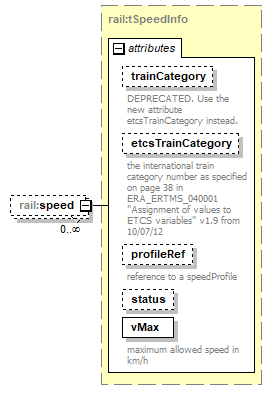 |
||||||||||||||||||||||||||||||||||||||||||||
| namespace | https://www.railml.org/schemas/2018 | ||||||||||||||||||||||||||||||||||||||||||||
| type | rail:tSpeedInfo | ||||||||||||||||||||||||||||||||||||||||||||
| properties |
|
||||||||||||||||||||||||||||||||||||||||||||
| attributes |
|
||||||||||||||||||||||||||||||||||||||||||||
| source | <xs:element name="speed" type="rail:tSpeedInfo" minOccurs="0" maxOccurs="unbounded"> <xs:annotation> <xs:documentation source="http://wiki.railml.org/index.php?title=IS:speed"/> </xs:annotation> </xs:element> |
complexType eStopPosts
| diagram |  |
||
| namespace | https://www.railml.org/schemas/2018 | ||
| children | rail:stopPost | ||
| used by |
|
||
| source | <xs:complexType name="eStopPosts"> <xs:sequence> <xs:element name="stopPost" type="rail:tStopPost" minOccurs="0" maxOccurs="unbounded"> <xs:annotation> <xs:documentation source="http://wiki.railml.org/index.php?title=IS:stopPost"/> </xs:annotation> </xs:element> </xs:sequence> </xs:complexType> |
element eStopPosts/stopPost
| diagram |  |
||||||||||||||||||||||||||||||||||||||||||||||||||||||||||||||||||||||||||||||||||||||||||||||||||||||||||||||||||||||||||||||||||||||||||||||||||
| namespace | https://www.railml.org/schemas/2018 | ||||||||||||||||||||||||||||||||||||||||||||||||||||||||||||||||||||||||||||||||||||||||||||||||||||||||||||||||||||||||||||||||||||||||||||||||||
| type | rail:tStopPost | ||||||||||||||||||||||||||||||||||||||||||||||||||||||||||||||||||||||||||||||||||||||||||||||||||||||||||||||||||||||||||||||||||||||||||||||||||
| properties |
|
||||||||||||||||||||||||||||||||||||||||||||||||||||||||||||||||||||||||||||||||||||||||||||||||||||||||||||||||||||||||||||||||||||||||||||||||||
| children | rail:additionalName rail:geoCoord rail:states rail:validForMovements rail:signalRef | ||||||||||||||||||||||||||||||||||||||||||||||||||||||||||||||||||||||||||||||||||||||||||||||||||||||||||||||||||||||||||||||||||||||||||||||||||
| attributes |
|
||||||||||||||||||||||||||||||||||||||||||||||||||||||||||||||||||||||||||||||||||||||||||||||||||||||||||||||||||||||||||||||||||||||||||||||||||
| source | <xs:element name="stopPost" type="rail:tStopPost" minOccurs="0" maxOccurs="unbounded"> <xs:annotation> <xs:documentation source="http://wiki.railml.org/index.php?title=IS:stopPost"/> </xs:annotation> </xs:element> |
complexType eSwitch
| diagram |  |
||||||||||||||||||||||||||||||||||||||||||||||||||||||||||||||||||||||||||||||||||||||||||||||||||||||||||||||||||||||
| namespace | https://www.railml.org/schemas/2018 | ||||||||||||||||||||||||||||||||||||||||||||||||||||||||||||||||||||||||||||||||||||||||||||||||||||||||||||||||||||||
| type | extension of rail:tSwitch | ||||||||||||||||||||||||||||||||||||||||||||||||||||||||||||||||||||||||||||||||||||||||||||||||||||||||||||||||||||||
| properties |
|
||||||||||||||||||||||||||||||||||||||||||||||||||||||||||||||||||||||||||||||||||||||||||||||||||||||||||||||||||||||
| children | rail:additionalName rail:geoCoord rail:states rail:connection | ||||||||||||||||||||||||||||||||||||||||||||||||||||||||||||||||||||||||||||||||||||||||||||||||||||||||||||||||||||||
| used by |
|
||||||||||||||||||||||||||||||||||||||||||||||||||||||||||||||||||||||||||||||||||||||||||||||||||||||||||||||||||||||
| attributes |
|
||||||||||||||||||||||||||||||||||||||||||||||||||||||||||||||||||||||||||||||||||||||||||||||||||||||||||||||||||||||
| source | <xs:complexType name="eSwitch"> <xs:complexContent> <xs:extension base="rail:tSwitch"> <xs:sequence> <xs:element name="connection" type="rail:tSwitchConnectionData" maxOccurs="3"> <xs:annotation> <xs:documentation source="http://wiki.railml.org/index.php?title=IS:connection_switch"/> </xs:annotation> </xs:element> </xs:sequence> </xs:extension> </xs:complexContent> </xs:complexType> |
element eSwitch/connection
| diagram | 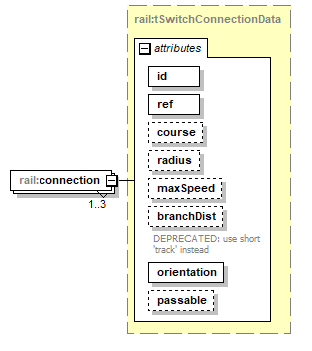 |
||||||||||||||||||||||||||||||||||||||||||||||||||||||||
| namespace | https://www.railml.org/schemas/2018 | ||||||||||||||||||||||||||||||||||||||||||||||||||||||||
| type | rail:tSwitchConnectionData | ||||||||||||||||||||||||||||||||||||||||||||||||||||||||
| properties |
|
||||||||||||||||||||||||||||||||||||||||||||||||||||||||
| attributes |
|
||||||||||||||||||||||||||||||||||||||||||||||||||||||||
| source | <xs:element name="connection" type="rail:tSwitchConnectionData" maxOccurs="3"> <xs:annotation> <xs:documentation source="http://wiki.railml.org/index.php?title=IS:connection_switch"/> </xs:annotation> </xs:element> |
complexType eTrack
| diagram |  |
||||||||||||||||||||||||||||||||||||||||||||||||||||||||||||||||||||
| namespace | https://www.railml.org/schemas/2018 | ||||||||||||||||||||||||||||||||||||||||||||||||||||||||||||||||||||
| type | extension of rail:tTrack | ||||||||||||||||||||||||||||||||||||||||||||||||||||||||||||||||||||
| properties |
|
||||||||||||||||||||||||||||||||||||||||||||||||||||||||||||||||||||
| children | rail:additionalName rail:states rail:trackDescr rail:trackTopology rail:trackElements rail:ocsElements rail:infraAttrGroupRefs | ||||||||||||||||||||||||||||||||||||||||||||||||||||||||||||||||||||
| used by |
|
||||||||||||||||||||||||||||||||||||||||||||||||||||||||||||||||||||
| attributes |
|
||||||||||||||||||||||||||||||||||||||||||||||||||||||||||||||||||||
| source | <xs:complexType name="eTrack"> <xs:complexContent> <xs:extension base="rail:tTrack"> <xs:sequence> <xs:element name="trackDescr" type="xs:string" minOccurs="0" maxOccurs="unbounded"> <xs:annotation> <xs:documentation>DEPRECATED with railML version 2.4</xs:documentation> <xs:documentation source="http://wiki.railml.org/index.php?title=IS:trackDescr"/> </xs:annotation> </xs:element> <xs:element name="trackTopology" type="rail:eTrackTopology"> <xs:annotation> <xs:documentation source="http://wiki.railml.org/index.php?title=IS:trackTopology"/> </xs:annotation> </xs:element> <xs:element name="trackElements" type="rail:eTrackElements" minOccurs="0"> <xs:annotation> <xs:documentation source="http://wiki.railml.org/index.php?title=IS:trackElements"/> </xs:annotation> </xs:element> <xs:element name="ocsElements" type="rail:eOcsElements" minOccurs="0"> <xs:annotation> <xs:documentation source="http://wiki.railml.org/index.php?title=IS:ocsElements"/> </xs:annotation> </xs:element> <xs:element name="infraAttrGroupRefs" type="rail:eInfraAttrGroupRefs" minOccurs="0"> <xs:annotation> <xs:documentation source="http://wiki.railml.org/index.php?title=IS:infraAttrGroupRefs"/> </xs:annotation> </xs:element> <xs:any namespace="##other" processContents="strict" minOccurs="0" maxOccurs="unbounded"> <xs:annotation> <xs:documentation>Deprecated for next major release, use "generic any element" instead.</xs:documentation> </xs:annotation> </xs:any> </xs:sequence> </xs:extension> </xs:complexContent> </xs:complexType> |
element eTrack/trackDescr
| diagram |  |
||||||
| namespace | https://www.railml.org/schemas/2018 | ||||||
| type | xs:string | ||||||
| properties |
|
||||||
| annotation |
|
||||||
| source | <xs:element name="trackDescr" type="xs:string" minOccurs="0" maxOccurs="unbounded"> <xs:annotation> <xs:documentation>DEPRECATED with railML version 2.4</xs:documentation> <xs:documentation source="http://wiki.railml.org/index.php?title=IS:trackDescr"/> </xs:annotation> </xs:element> |
element eTrack/trackTopology
| diagram | 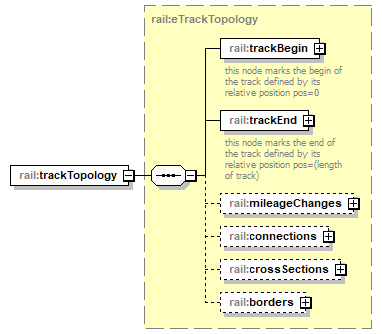 |
||
| namespace | https://www.railml.org/schemas/2018 | ||
| type | rail:eTrackTopology | ||
| properties |
|
||
| children | rail:trackBegin rail:trackEnd rail:mileageChanges rail:connections rail:crossSections rail:borders | ||
| source | <xs:element name="trackTopology" type="rail:eTrackTopology"> <xs:annotation> <xs:documentation source="http://wiki.railml.org/index.php?title=IS:trackTopology"/> </xs:annotation> </xs:element> |
element eTrack/trackElements
| diagram | 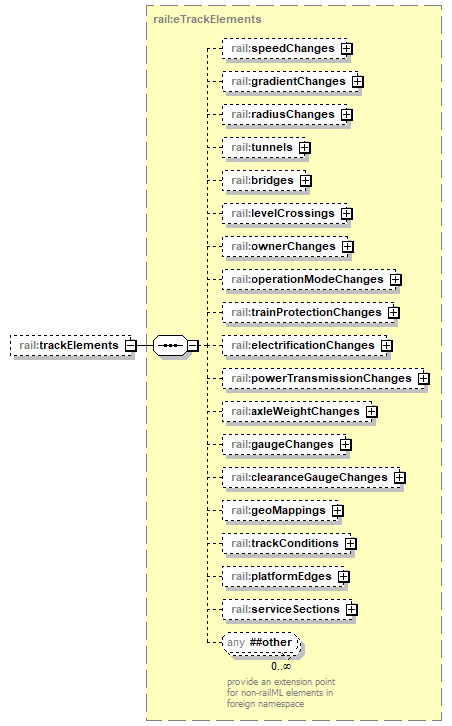 |
||||||
| namespace | https://www.railml.org/schemas/2018 | ||||||
| type | rail:eTrackElements | ||||||
| properties |
|
||||||
| children | rail:speedChanges rail:gradientChanges rail:radiusChanges rail:tunnels rail:bridges rail:levelCrossings rail:ownerChanges rail:operationModeChanges rail:trainProtectionChanges rail:electrificationChanges rail:powerTransmissionChanges rail:axleWeightChanges rail:gaugeChanges rail:clearanceGaugeChanges rail:geoMappings rail:trackConditions rail:platformEdges rail:serviceSections | ||||||
| source | <xs:element name="trackElements" type="rail:eTrackElements" minOccurs="0"> <xs:annotation> <xs:documentation source="http://wiki.railml.org/index.php?title=IS:trackElements"/> </xs:annotation> </xs:element> |
element eTrack/ocsElements
| diagram | 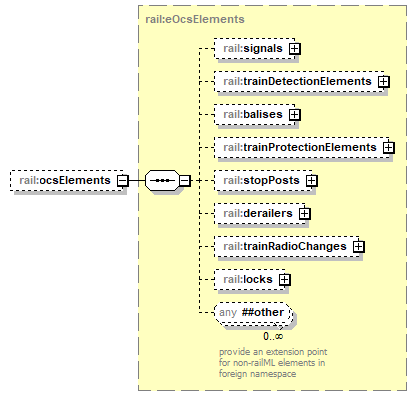 |
||||||
| namespace | https://www.railml.org/schemas/2018 | ||||||
| type | rail:eOcsElements | ||||||
| properties |
|
||||||
| children | rail:signals rail:trainDetectionElements rail:balises rail:trainProtectionElements rail:stopPosts rail:derailers rail:trainRadioChanges rail:locks | ||||||
| source | <xs:element name="ocsElements" type="rail:eOcsElements" minOccurs="0"> <xs:annotation> <xs:documentation source="http://wiki.railml.org/index.php?title=IS:ocsElements"/> </xs:annotation> </xs:element> |
element eTrack/infraAttrGroupRefs
| diagram |  |
||||||
| namespace | https://www.railml.org/schemas/2018 | ||||||
| type | rail:eInfraAttrGroupRefs | ||||||
| properties |
|
||||||
| children | rail:infraAttrGroupRef | ||||||
| source | <xs:element name="infraAttrGroupRefs" type="rail:eInfraAttrGroupRefs" minOccurs="0"> <xs:annotation> <xs:documentation source="http://wiki.railml.org/index.php?title=IS:infraAttrGroupRefs"/> </xs:annotation> </xs:element> |
complexType eTrackBegin
| diagram | 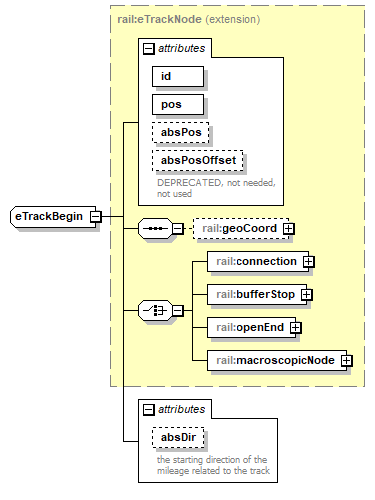 |
||||||||||||||||||||||||||||||||||||||||
| namespace | https://www.railml.org/schemas/2018 | ||||||||||||||||||||||||||||||||||||||||
| type | extension of rail:eTrackNode | ||||||||||||||||||||||||||||||||||||||||
| properties |
|
||||||||||||||||||||||||||||||||||||||||
| children | rail:geoCoord rail:connection rail:bufferStop rail:openEnd rail:macroscopicNode | ||||||||||||||||||||||||||||||||||||||||
| used by |
|
||||||||||||||||||||||||||||||||||||||||
| attributes |
|
||||||||||||||||||||||||||||||||||||||||
| source | <xs:complexType name="eTrackBegin"> <xs:complexContent> <xs:extension base="rail:eTrackNode"> <xs:attribute name="absDir" type="rail:tMileageDirection"> <xs:annotation> <xs:documentation>the starting direction of the mileage related to the track</xs:documentation> </xs:annotation> </xs:attribute> </xs:extension> </xs:complexContent> </xs:complexType> |
attribute eTrackBegin/@absDir
| type | rail:tMileageDirection | |||||||||
| facets |
|
|||||||||
| annotation |
|
|||||||||
| source | <xs:attribute name="absDir" type="rail:tMileageDirection"> <xs:annotation> <xs:documentation>the starting direction of the mileage related to the track</xs:documentation> </xs:annotation> </xs:attribute> |
complexType eTrackConditions
| diagram |  |
||
| namespace | https://www.railml.org/schemas/2018 | ||
| children | rail:trackCondition | ||
| used by |
|
||
| source | <xs:complexType name="eTrackConditions"> <xs:sequence> <xs:element name="trackCondition" type="rail:tTrackCondition" minOccurs="0" maxOccurs="unbounded"> <xs:annotation> <xs:documentation source="http://wiki.railml.org/index.php?title=IS:trackCondition"/> </xs:annotation> </xs:element> </xs:sequence> </xs:complexType> |
element eTrackConditions/trackCondition
| diagram | 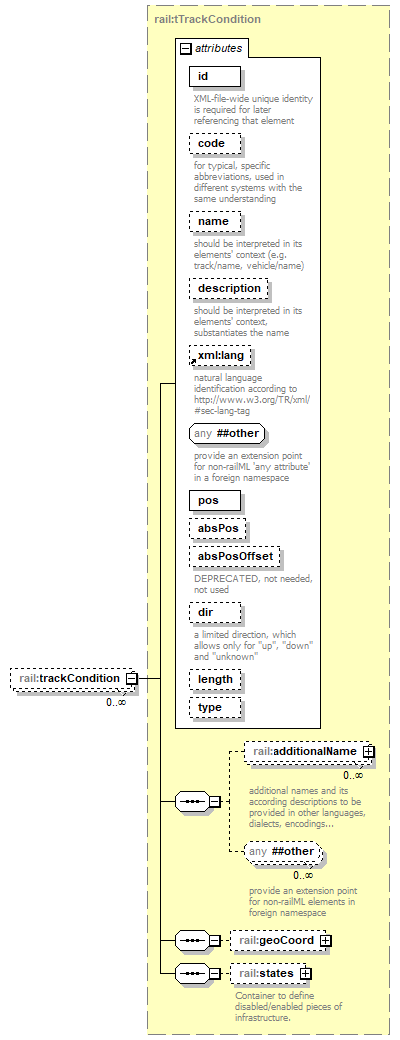 |
||||||||||||||||||||||||||||||||||||||||||||||||||||||||||||||||||||||||||||||||||||||
| namespace | https://www.railml.org/schemas/2018 | ||||||||||||||||||||||||||||||||||||||||||||||||||||||||||||||||||||||||||||||||||||||
| type | rail:tTrackCondition | ||||||||||||||||||||||||||||||||||||||||||||||||||||||||||||||||||||||||||||||||||||||
| properties |
|
||||||||||||||||||||||||||||||||||||||||||||||||||||||||||||||||||||||||||||||||||||||
| children | rail:additionalName rail:geoCoord rail:states | ||||||||||||||||||||||||||||||||||||||||||||||||||||||||||||||||||||||||||||||||||||||
| attributes |
|
||||||||||||||||||||||||||||||||||||||||||||||||||||||||||||||||||||||||||||||||||||||
| source | <xs:element name="trackCondition" type="rail:tTrackCondition" minOccurs="0" maxOccurs="unbounded"> <xs:annotation> <xs:documentation source="http://wiki.railml.org/index.php?title=IS:trackCondition"/> </xs:annotation> </xs:element> |
complexType eTrackElements
| diagram | 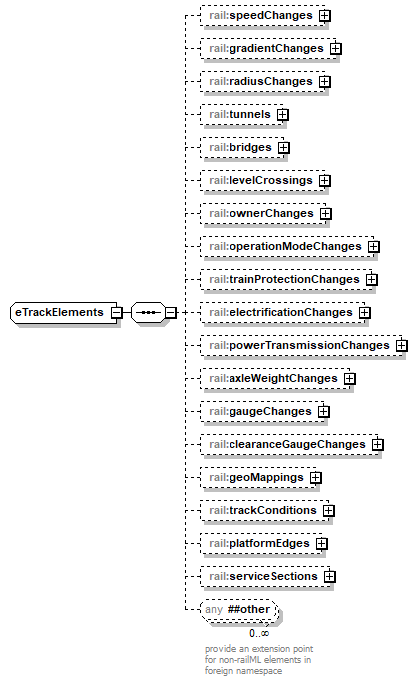 |
||
| namespace | https://www.railml.org/schemas/2018 | ||
| children | rail:speedChanges rail:gradientChanges rail:radiusChanges rail:tunnels rail:bridges rail:levelCrossings rail:ownerChanges rail:operationModeChanges rail:trainProtectionChanges rail:electrificationChanges rail:powerTransmissionChanges rail:axleWeightChanges rail:gaugeChanges rail:clearanceGaugeChanges rail:geoMappings rail:trackConditions rail:platformEdges rail:serviceSections | ||
| used by |
|
||
| source | <xs:complexType name="eTrackElements"> <xs:sequence> <xs:element name="speedChanges" type="rail:eSpeedChanges" minOccurs="0"> <xs:annotation> <xs:documentation source="http://wiki.railml.org/index.php?title=IS:speedChanges"/> </xs:annotation> </xs:element> <xs:element name="gradientChanges" type="rail:eGradientChanges" minOccurs="0"> <xs:annotation> <xs:documentation source="http://wiki.railml.org/index.php?title=IS:gradientChanges"/> </xs:annotation> </xs:element> <xs:element name="radiusChanges" type="rail:eRadiusChanges" minOccurs="0"> <xs:annotation> <xs:documentation source="http://wiki.railml.org/index.php?title=IS:radiusChanges"/> </xs:annotation> </xs:element> <xs:element name="tunnels" type="rail:eTunnels" minOccurs="0"> <xs:annotation> <xs:documentation source="http://wiki.railml.org/index.php?title=IS:tunnels"/> </xs:annotation> </xs:element> <xs:element name="bridges" type="rail:eBridges" minOccurs="0"> <xs:annotation> <xs:documentation source="http://wiki.railml.org/index.php?title=IS:bridges"/> </xs:annotation> </xs:element> <xs:element name="levelCrossings" type="rail:eLevelCrossings" minOccurs="0"> <xs:annotation> <xs:documentation source="http://wiki.railml.org/index.php?title=IS:levelCrossings"/> </xs:annotation> </xs:element> <xs:element name="ownerChanges" type="rail:eOwnerChanges" minOccurs="0"> <xs:annotation> <xs:documentation source="http://wiki.railml.org/index.php?title=IS:ownerChanges"/> </xs:annotation> </xs:element> <xs:element name="operationModeChanges" type="rail:eOperationModeChanges" minOccurs="0"> <xs:annotation> <xs:documentation source="http://wiki.railml.org/index.php?title=IS:operationModeChanges"/> </xs:annotation> </xs:element> <xs:element name="trainProtectionChanges" type="rail:eTrainProtectionChanges" minOccurs="0"> <xs:annotation> <xs:documentation source="http://wiki.railml.org/index.php?title=IS:trainProtectionChanges"/> </xs:annotation> </xs:element> <xs:element name="electrificationChanges" type="rail:eElectrificationChanges" minOccurs="0"> <xs:annotation> <xs:documentation source="http://wiki.railml.org/index.php?title=IS:electrificationChanges"/> </xs:annotation> </xs:element> <xs:element name="powerTransmissionChanges" type="rail:ePowerTransmissionChanges" minOccurs="0"> <xs:annotation> <xs:documentation source="http://wiki.railml.org/index.php?title=IS:powerTransmissionChanges"/> </xs:annotation> </xs:element> <xs:element name="axleWeightChanges" type="rail:eAxleWeightChanges" minOccurs="0"> <xs:annotation> <xs:documentation source="http://wiki.railml.org/index.php?title=IS:axleWeightChanges"/> </xs:annotation> </xs:element> <xs:element name="gaugeChanges" type="rail:eGaugeChanges" minOccurs="0"> <xs:annotation> <xs:documentation source="http://wiki.railml.org/index.php?title=IS:gaugeChanges"/> </xs:annotation> </xs:element> <xs:element name="clearanceGaugeChanges" type="rail:eClearanceGaugeChanges" minOccurs="0"> <xs:annotation> <xs:documentation source="http://wiki.railml.org/index.php?title=IS:clearanceGaugeChanges"/> </xs:annotation> </xs:element> <xs:element name="geoMappings" type="rail:eGeoMappings" minOccurs="0"> <xs:annotation> <xs:documentation source="http://wiki.railml.org/index.php?title=IS:geoMappings"/> </xs:annotation> </xs:element> <xs:element name="trackConditions" type="rail:eTrackConditions" minOccurs="0"> <xs:annotation> <xs:documentation source="http://wiki.railml.org/index.php?title=IS:trackConditions"/> </xs:annotation> </xs:element> <xs:element name="platformEdges" type="rail:ePlatformEdges" minOccurs="0"> <xs:annotation> <xs:documentation source="http://wiki.railml.org/index.php?title=IS:platformEdges"/> </xs:annotation> </xs:element> <xs:element name="serviceSections" type="rail:eServiceSections" minOccurs="0"> <xs:annotation> <xs:documentation source="http://wiki.railml.org/index.php?title=IS:serviceSections"/> </xs:annotation> </xs:element> <xs:any namespace="##other" processContents="strict" minOccurs="0" maxOccurs="unbounded"> <xs:annotation> <xs:documentation>provide an extension point for non-railML elements in foreign namespace</xs:documentation> </xs:annotation> </xs:any> </xs:sequence> </xs:complexType> |
element eTrackElements/speedChanges
| diagram |  |
||||||
| namespace | https://www.railml.org/schemas/2018 | ||||||
| type | rail:eSpeedChanges | ||||||
| properties |
|
||||||
| children | rail:speedChange | ||||||
| source | <xs:element name="speedChanges" type="rail:eSpeedChanges" minOccurs="0"> <xs:annotation> <xs:documentation source="http://wiki.railml.org/index.php?title=IS:speedChanges"/> </xs:annotation> </xs:element> |
element eTrackElements/gradientChanges
| diagram |  |
||||||
| namespace | https://www.railml.org/schemas/2018 | ||||||
| type | rail:eGradientChanges | ||||||
| properties |
|
||||||
| children | rail:gradientChange | ||||||
| source | <xs:element name="gradientChanges" type="rail:eGradientChanges" minOccurs="0"> <xs:annotation> <xs:documentation source="http://wiki.railml.org/index.php?title=IS:gradientChanges"/> </xs:annotation> </xs:element> |
element eTrackElements/radiusChanges
| diagram |  |
||||||
| namespace | https://www.railml.org/schemas/2018 | ||||||
| type | rail:eRadiusChanges | ||||||
| properties |
|
||||||
| children | rail:radiusChange | ||||||
| source | <xs:element name="radiusChanges" type="rail:eRadiusChanges" minOccurs="0"> <xs:annotation> <xs:documentation source="http://wiki.railml.org/index.php?title=IS:radiusChanges"/> </xs:annotation> </xs:element> |
element eTrackElements/tunnels
| diagram |  |
||||||
| namespace | https://www.railml.org/schemas/2018 | ||||||
| type | rail:eTunnels | ||||||
| properties |
|
||||||
| children | rail:tunnel | ||||||
| source | <xs:element name="tunnels" type="rail:eTunnels" minOccurs="0"> <xs:annotation> <xs:documentation source="http://wiki.railml.org/index.php?title=IS:tunnels"/> </xs:annotation> </xs:element> |
element eTrackElements/bridges
| diagram |  |
||||||
| namespace | https://www.railml.org/schemas/2018 | ||||||
| type | rail:eBridges | ||||||
| properties |
|
||||||
| children | rail:brigde | ||||||
| source | <xs:element name="bridges" type="rail:eBridges" minOccurs="0"> <xs:annotation> <xs:documentation source="http://wiki.railml.org/index.php?title=IS:bridges"/> </xs:annotation> </xs:element> |
element eTrackElements/levelCrossings
| diagram |  |
||||||
| namespace | https://www.railml.org/schemas/2018 | ||||||
| type | rail:eLevelCrossings | ||||||
| properties |
|
||||||
| children | rail:levelCrossing | ||||||
| source | <xs:element name="levelCrossings" type="rail:eLevelCrossings" minOccurs="0"> <xs:annotation> <xs:documentation source="http://wiki.railml.org/index.php?title=IS:levelCrossings"/> </xs:annotation> </xs:element> |
element eTrackElements/ownerChanges
| diagram |  |
||||||
| namespace | https://www.railml.org/schemas/2018 | ||||||
| type | rail:eOwnerChanges | ||||||
| properties |
|
||||||
| children | rail:ownerChange | ||||||
| source | <xs:element name="ownerChanges" type="rail:eOwnerChanges" minOccurs="0"> <xs:annotation> <xs:documentation source="http://wiki.railml.org/index.php?title=IS:ownerChanges"/> </xs:annotation> </xs:element> |
element eTrackElements/operationModeChanges
| diagram |  |
||||||
| namespace | https://www.railml.org/schemas/2018 | ||||||
| type | rail:eOperationModeChanges | ||||||
| properties |
|
||||||
| children | rail:operationModeChange | ||||||
| source | <xs:element name="operationModeChanges" type="rail:eOperationModeChanges" minOccurs="0"> <xs:annotation> <xs:documentation source="http://wiki.railml.org/index.php?title=IS:operationModeChanges"/> </xs:annotation> </xs:element> |
element eTrackElements/trainProtectionChanges
| diagram |  |
||||||
| namespace | https://www.railml.org/schemas/2018 | ||||||
| type | rail:eTrainProtectionChanges | ||||||
| properties |
|
||||||
| children | rail:trainProtectionChange | ||||||
| source | <xs:element name="trainProtectionChanges" type="rail:eTrainProtectionChanges" minOccurs="0"> <xs:annotation> <xs:documentation source="http://wiki.railml.org/index.php?title=IS:trainProtectionChanges"/> </xs:annotation> </xs:element> |
element eTrackElements/electrificationChanges
| diagram |  |
||||||
| namespace | https://www.railml.org/schemas/2018 | ||||||
| type | rail:eElectrificationChanges | ||||||
| properties |
|
||||||
| children | rail:electrificationChange | ||||||
| source | <xs:element name="electrificationChanges" type="rail:eElectrificationChanges" minOccurs="0"> <xs:annotation> <xs:documentation source="http://wiki.railml.org/index.php?title=IS:electrificationChanges"/> </xs:annotation> </xs:element> |
element eTrackElements/powerTransmissionChanges
| diagram |  |
||||||
| namespace | https://www.railml.org/schemas/2018 | ||||||
| type | rail:ePowerTransmissionChanges | ||||||
| properties |
|
||||||
| children | rail:powerTransmissionChange | ||||||
| source | <xs:element name="powerTransmissionChanges" type="rail:ePowerTransmissionChanges" minOccurs="0"> <xs:annotation> <xs:documentation source="http://wiki.railml.org/index.php?title=IS:powerTransmissionChanges"/> </xs:annotation> </xs:element> |
element eTrackElements/axleWeightChanges
| diagram |  |
||||||
| namespace | https://www.railml.org/schemas/2018 | ||||||
| type | rail:eAxleWeightChanges | ||||||
| properties |
|
||||||
| children | rail:axleWeightChange | ||||||
| source | <xs:element name="axleWeightChanges" type="rail:eAxleWeightChanges" minOccurs="0"> <xs:annotation> <xs:documentation source="http://wiki.railml.org/index.php?title=IS:axleWeightChanges"/> </xs:annotation> </xs:element> |
element eTrackElements/gaugeChanges
| diagram |  |
||||||
| namespace | https://www.railml.org/schemas/2018 | ||||||
| type | rail:eGaugeChanges | ||||||
| properties |
|
||||||
| children | rail:gaugeChange | ||||||
| source | <xs:element name="gaugeChanges" type="rail:eGaugeChanges" minOccurs="0"> <xs:annotation> <xs:documentation source="http://wiki.railml.org/index.php?title=IS:gaugeChanges"/> </xs:annotation> </xs:element> |
element eTrackElements/clearanceGaugeChanges
| diagram |  |
||||||
| namespace | https://www.railml.org/schemas/2018 | ||||||
| type | rail:eClearanceGaugeChanges | ||||||
| properties |
|
||||||
| children | rail:clearanceGaugeChange | ||||||
| source | <xs:element name="clearanceGaugeChanges" type="rail:eClearanceGaugeChanges" minOccurs="0"> <xs:annotation> <xs:documentation source="http://wiki.railml.org/index.php?title=IS:clearanceGaugeChanges"/> </xs:annotation> </xs:element> |
element eTrackElements/geoMappings
| diagram |  |
||||||
| namespace | https://www.railml.org/schemas/2018 | ||||||
| type | rail:eGeoMappings | ||||||
| properties |
|
||||||
| children | rail:geoMapping | ||||||
| source | <xs:element name="geoMappings" type="rail:eGeoMappings" minOccurs="0"> <xs:annotation> <xs:documentation source="http://wiki.railml.org/index.php?title=IS:geoMappings"/> </xs:annotation> </xs:element> |
element eTrackElements/trackConditions
| diagram |  |
||||||
| namespace | https://www.railml.org/schemas/2018 | ||||||
| type | rail:eTrackConditions | ||||||
| properties |
|
||||||
| children | rail:trackCondition | ||||||
| source | <xs:element name="trackConditions" type="rail:eTrackConditions" minOccurs="0"> <xs:annotation> <xs:documentation source="http://wiki.railml.org/index.php?title=IS:trackConditions"/> </xs:annotation> </xs:element> |
element eTrackElements/platformEdges
| diagram |  |
||||||
| namespace | https://www.railml.org/schemas/2018 | ||||||
| type | rail:ePlatformEdges | ||||||
| properties |
|
||||||
| children | rail:platformEdge | ||||||
| source | <xs:element name="platformEdges" type="rail:ePlatformEdges" minOccurs="0"> <xs:annotation> <xs:documentation source="http://wiki.railml.org/index.php?title=IS:platformEdges"/> </xs:annotation> </xs:element> |
element eTrackElements/serviceSections
| diagram |  |
||||||
| namespace | https://www.railml.org/schemas/2018 | ||||||
| type | rail:eServiceSections | ||||||
| properties |
|
||||||
| children | rail:serviceSection | ||||||
| source | <xs:element name="serviceSections" type="rail:eServiceSections" minOccurs="0"> <xs:annotation> <xs:documentation source="http://wiki.railml.org/index.php?title=IS:serviceSections"/> </xs:annotation> </xs:element> |
complexType eTrackElementVis
| diagram | 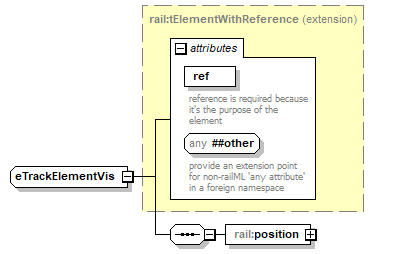 |
||||||||||||||
| namespace | https://www.railml.org/schemas/2018 | ||||||||||||||
| type | extension of rail:tElementWithReference | ||||||||||||||
| properties |
|
||||||||||||||
| children | rail:position | ||||||||||||||
| used by |
|
||||||||||||||
| attributes |
|
||||||||||||||
| source | <xs:complexType name="eTrackElementVis"> <xs:complexContent> <xs:extension base="rail:tElementWithReference"> <xs:sequence> <xs:element name="position" type="rail:tPoint"/> </xs:sequence> </xs:extension> </xs:complexContent> </xs:complexType> |
element eTrackElementVis/position
| diagram | 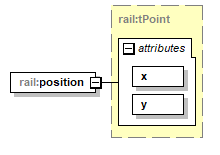 |
||||||||||||||||||
| namespace | https://www.railml.org/schemas/2018 | ||||||||||||||||||
| type | rail:tPoint | ||||||||||||||||||
| properties |
|
||||||||||||||||||
| attributes |
|
||||||||||||||||||
| source | <xs:element name="position" type="rail:tPoint"/> |
complexType eTrackEnd
| diagram | 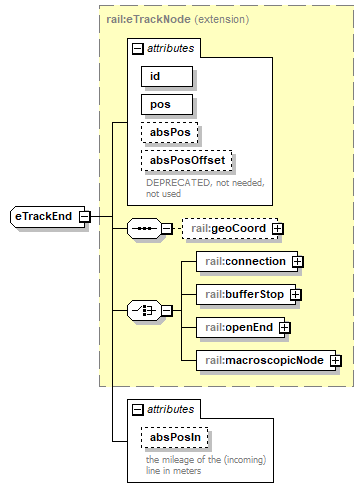 |
||||||||||||||||||||||||||||||||||||||||
| namespace | https://www.railml.org/schemas/2018 | ||||||||||||||||||||||||||||||||||||||||
| type | extension of rail:eTrackNode | ||||||||||||||||||||||||||||||||||||||||
| properties |
|
||||||||||||||||||||||||||||||||||||||||
| children | rail:geoCoord rail:connection rail:bufferStop rail:openEnd rail:macroscopicNode | ||||||||||||||||||||||||||||||||||||||||
| used by |
|
||||||||||||||||||||||||||||||||||||||||
| attributes |
|
||||||||||||||||||||||||||||||||||||||||
| source | <xs:complexType name="eTrackEnd"> <xs:complexContent> <xs:extension base="rail:eTrackNode"> <xs:attribute name="absPosIn" type="rail:tLengthM"> <xs:annotation> <xs:documentation>the mileage of the (incoming) line in meters</xs:documentation> </xs:annotation> </xs:attribute> </xs:extension> </xs:complexContent> </xs:complexType> |
attribute eTrackEnd/@absPosIn
| type | rail:tLengthM | ||||||
| facets |
|
||||||
| annotation |
|
||||||
| source | <xs:attribute name="absPosIn" type="rail:tLengthM"> <xs:annotation> <xs:documentation>the mileage of the (incoming) line in meters</xs:documentation> </xs:annotation> </xs:attribute> |
complexType eTrackGroups
| diagram | 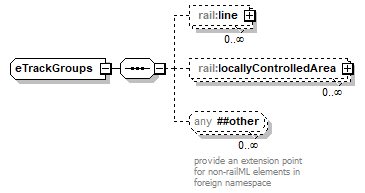 |
||
| namespace | https://www.railml.org/schemas/2018 | ||
| children | rail:line rail:locallyControlledArea | ||
| used by |
|
||
| source | <xs:complexType name="eTrackGroups"> <xs:sequence> <xs:element name="line" type="rail:eLine" minOccurs="0" maxOccurs="unbounded"> <xs:annotation> <xs:documentation source="http://wiki.railml.org/index.php?title=IS:line"/> </xs:annotation> </xs:element> <xs:element name="locallyControlledArea" type="rail:eLocallyControlledArea" minOccurs="0" maxOccurs="unbounded"> <xs:annotation> <xs:documentation source="http://wiki.railml.org/index.php?title=IS:locallyControlledArea"/> </xs:annotation> </xs:element> <xs:any namespace="##other" processContents="strict" minOccurs="0" maxOccurs="unbounded"> <xs:annotation> <xs:documentation>provide an extension point for non-railML elements in foreign namespace</xs:documentation> </xs:annotation> </xs:any> </xs:sequence> </xs:complexType> |
element eTrackGroups/line
| diagram |  |
||||||||||||||||||||||||||||||||||||||||||||||||||||||||||||||||||||||
| namespace | https://www.railml.org/schemas/2018 | ||||||||||||||||||||||||||||||||||||||||||||||||||||||||||||||||||||||
| type | rail:eLine | ||||||||||||||||||||||||||||||||||||||||||||||||||||||||||||||||||||||
| properties |
|
||||||||||||||||||||||||||||||||||||||||||||||||||||||||||||||||||||||
| children | rail:additionalName rail:states rail:lineDescr rail:trackRef | ||||||||||||||||||||||||||||||||||||||||||||||||||||||||||||||||||||||
| attributes |
|
||||||||||||||||||||||||||||||||||||||||||||||||||||||||||||||||||||||
| source | <xs:element name="line" type="rail:eLine" minOccurs="0" maxOccurs="unbounded"> <xs:annotation> <xs:documentation source="http://wiki.railml.org/index.php?title=IS:line"/> </xs:annotation> </xs:element> |
element eTrackGroups/locallyControlledArea
| diagram | 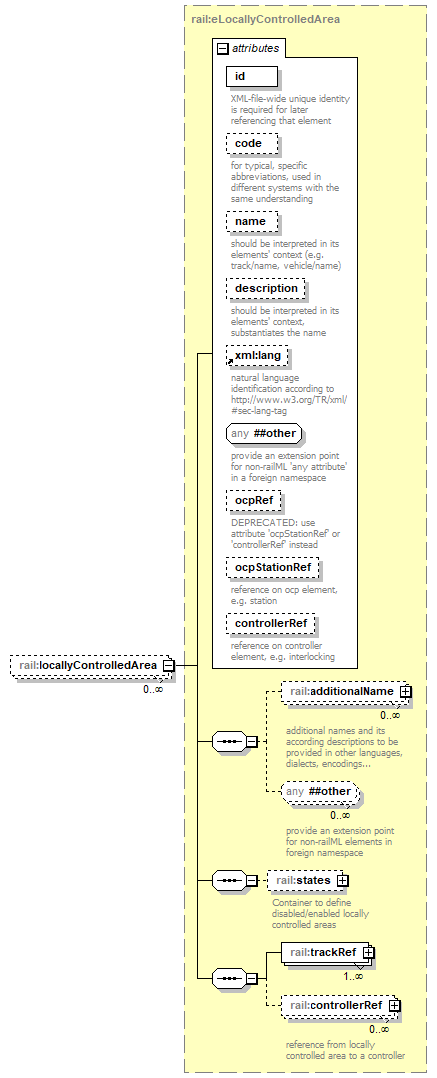 |
||||||||||||||||||||||||||||||||||||||||||||||||||||||||||||||||||||||
| namespace | https://www.railml.org/schemas/2018 | ||||||||||||||||||||||||||||||||||||||||||||||||||||||||||||||||||||||
| type | rail:eLocallyControlledArea | ||||||||||||||||||||||||||||||||||||||||||||||||||||||||||||||||||||||
| properties |
|
||||||||||||||||||||||||||||||||||||||||||||||||||||||||||||||||||||||
| children | rail:additionalName rail:states rail:trackRef rail:controllerRef | ||||||||||||||||||||||||||||||||||||||||||||||||||||||||||||||||||||||
| attributes |
|
||||||||||||||||||||||||||||||||||||||||||||||||||||||||||||||||||||||
| source | <xs:element name="locallyControlledArea" type="rail:eLocallyControlledArea" minOccurs="0" maxOccurs="unbounded"> <xs:annotation> <xs:documentation source="http://wiki.railml.org/index.php?title=IS:locallyControlledArea"/> </xs:annotation> </xs:element> |
complexType eTrackNode
| diagram | 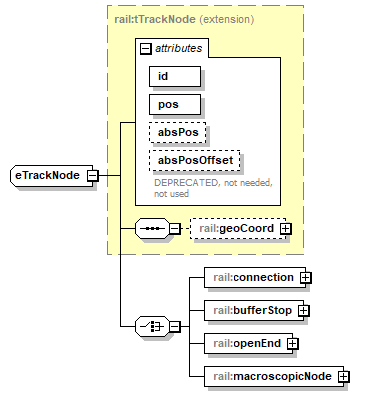 |
||||||||||||||||||||||||||||||||
| namespace | https://www.railml.org/schemas/2018 | ||||||||||||||||||||||||||||||||
| type | extension of rail:tTrackNode | ||||||||||||||||||||||||||||||||
| properties |
|
||||||||||||||||||||||||||||||||
| children | rail:geoCoord rail:connection rail:bufferStop rail:openEnd rail:macroscopicNode | ||||||||||||||||||||||||||||||||
| used by |
|
||||||||||||||||||||||||||||||||
| attributes |
|
||||||||||||||||||||||||||||||||
| source | <xs:complexType name="eTrackNode"> <xs:complexContent> <xs:extension base="rail:tTrackNode"> <xs:choice> <xs:element name="connection" type="rail:tConnectionData"> <xs:annotation> <xs:documentation source="http://wiki.railml.org/index.php?title=IS:connection_trackBegin"/> <xs:documentation source="http://wiki.railml.org/index.php?title=IS:connection_trackEnd"/> </xs:annotation> </xs:element> <xs:element name="bufferStop" type="rail:tBufferStop"> <xs:annotation> <xs:documentation source="http://wiki.railml.org/index.php?title=IS:bufferStop_trackBegin"/> <xs:documentation source="http://wiki.railml.org/index.php?title=IS:bufferStop_trackEnd"/> </xs:annotation> </xs:element> <xs:element name="openEnd" type="rail:tOpenEnd"> <xs:annotation> <xs:documentation source="http://wiki.railml.org/index.php?title=IS:openEnd_trackBegin"/> <xs:documentation source="http://wiki.railml.org/index.php?title=IS:openEnd_trackEnd"/> </xs:annotation> </xs:element> <xs:element name="macroscopicNode" type="rail:tMacroscopicNode"> <xs:annotation> <xs:documentation source="http://wiki.railml.org/index.php?title=IS:macroscopicNode_trackBegin"/> <xs:documentation source="http://wiki.railml.org/index.php?title=IS:macroscopicNode_trackEnd"/> </xs:annotation> </xs:element> </xs:choice> </xs:extension> </xs:complexContent> </xs:complexType> |
element eTrackNode/connection
| diagram | 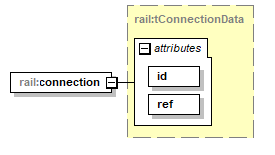 |
||||||||||||||||||
| namespace | https://www.railml.org/schemas/2018 | ||||||||||||||||||
| type | rail:tConnectionData | ||||||||||||||||||
| properties |
|
||||||||||||||||||
| attributes |
|
||||||||||||||||||
| source | <xs:element name="connection" type="rail:tConnectionData"> <xs:annotation> <xs:documentation source="http://wiki.railml.org/index.php?title=IS:connection_trackBegin"/> <xs:documentation source="http://wiki.railml.org/index.php?title=IS:connection_trackEnd"/> </xs:annotation> </xs:element> |
element eTrackNode/bufferStop
| diagram | 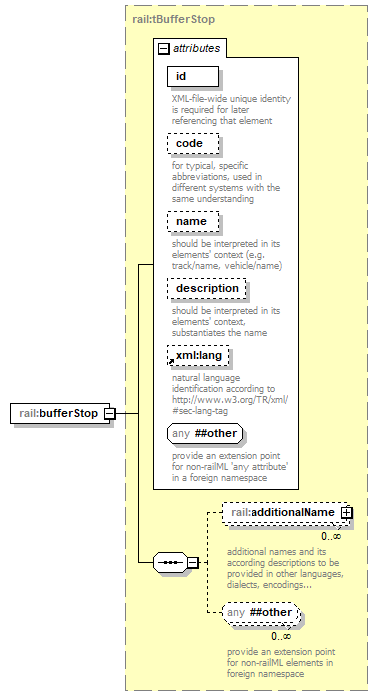 |
||||||||||||||||||||||||||||||||||||||||||||||
| namespace | https://www.railml.org/schemas/2018 | ||||||||||||||||||||||||||||||||||||||||||||||
| type | rail:tBufferStop | ||||||||||||||||||||||||||||||||||||||||||||||
| properties |
|
||||||||||||||||||||||||||||||||||||||||||||||
| children | rail:additionalName | ||||||||||||||||||||||||||||||||||||||||||||||
| attributes |
|
||||||||||||||||||||||||||||||||||||||||||||||
| source | <xs:element name="bufferStop" type="rail:tBufferStop"> <xs:annotation> <xs:documentation source="http://wiki.railml.org/index.php?title=IS:bufferStop_trackBegin"/> <xs:documentation source="http://wiki.railml.org/index.php?title=IS:bufferStop_trackEnd"/> </xs:annotation> </xs:element> |
element eTrackNode/openEnd
| diagram | 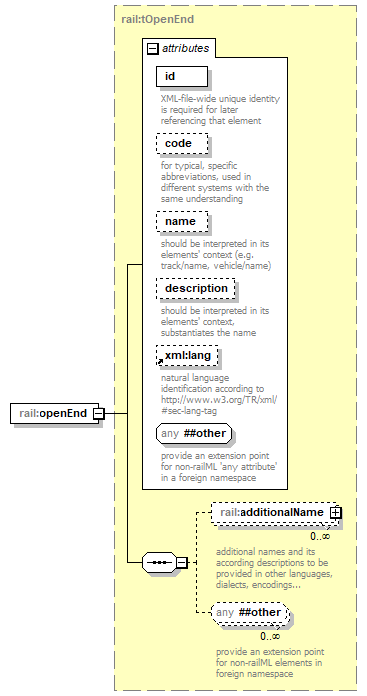 |
||||||||||||||||||||||||||||||||||||||||||||||
| namespace | https://www.railml.org/schemas/2018 | ||||||||||||||||||||||||||||||||||||||||||||||
| type | rail:tOpenEnd | ||||||||||||||||||||||||||||||||||||||||||||||
| properties |
|
||||||||||||||||||||||||||||||||||||||||||||||
| children | rail:additionalName | ||||||||||||||||||||||||||||||||||||||||||||||
| attributes |
|
||||||||||||||||||||||||||||||||||||||||||||||
| source | <xs:element name="openEnd" type="rail:tOpenEnd"> <xs:annotation> <xs:documentation source="http://wiki.railml.org/index.php?title=IS:openEnd_trackBegin"/> <xs:documentation source="http://wiki.railml.org/index.php?title=IS:openEnd_trackEnd"/> </xs:annotation> </xs:element> |
element eTrackNode/macroscopicNode
| diagram | 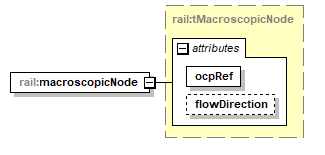 |
||||||||||||||||||
| namespace | https://www.railml.org/schemas/2018 | ||||||||||||||||||
| type | rail:tMacroscopicNode | ||||||||||||||||||
| properties |
|
||||||||||||||||||
| attributes |
|
||||||||||||||||||
| source | <xs:element name="macroscopicNode" type="rail:tMacroscopicNode"> <xs:annotation> <xs:documentation source="http://wiki.railml.org/index.php?title=IS:macroscopicNode_trackBegin"/> <xs:documentation source="http://wiki.railml.org/index.php?title=IS:macroscopicNode_trackEnd"/> </xs:annotation> </xs:element> |
complexType eTracks
| diagram |  |
||
| namespace | https://www.railml.org/schemas/2018 | ||
| children | rail:track | ||
| used by |
|
||
| source | <xs:complexType name="eTracks"> <xs:sequence> <xs:element name="track" type="rail:eTrack" minOccurs="0" maxOccurs="unbounded"> <xs:annotation> <xs:documentation source="http://wiki.railml.org/index.php?title=IS:track"/> </xs:annotation> </xs:element> </xs:sequence> </xs:complexType> |
element eTracks/track
| diagram |  |
||||||||||||||||||||||||||||||||||||||||||||||||||||||||||||||||||||
| namespace | https://www.railml.org/schemas/2018 | ||||||||||||||||||||||||||||||||||||||||||||||||||||||||||||||||||||
| type | rail:eTrack | ||||||||||||||||||||||||||||||||||||||||||||||||||||||||||||||||||||
| properties |
|
||||||||||||||||||||||||||||||||||||||||||||||||||||||||||||||||||||
| children | rail:additionalName rail:states rail:trackDescr rail:trackTopology rail:trackElements rail:ocsElements rail:infraAttrGroupRefs | ||||||||||||||||||||||||||||||||||||||||||||||||||||||||||||||||||||
| attributes |
|
||||||||||||||||||||||||||||||||||||||||||||||||||||||||||||||||||||
| source | <xs:element name="track" type="rail:eTrack" minOccurs="0" maxOccurs="unbounded"> <xs:annotation> <xs:documentation source="http://wiki.railml.org/index.php?title=IS:track"/> </xs:annotation> </xs:element> |
complexType eTrackTopology
| diagram | 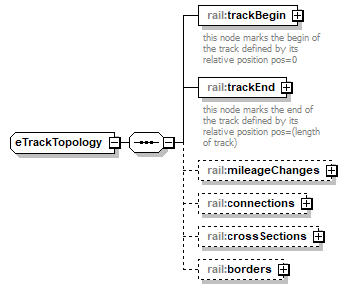 |
||
| namespace | https://www.railml.org/schemas/2018 | ||
| children | rail:trackBegin rail:trackEnd rail:mileageChanges rail:connections rail:crossSections rail:borders | ||
| used by |
|
||
| source | <xs:complexType name="eTrackTopology"> <xs:sequence> <xs:element name="trackBegin" type="rail:eTrackBegin"> <xs:annotation> <xs:documentation>this node marks the begin of the track defined by its relative position pos=0</xs:documentation> <xs:documentation source="http://wiki.railml.org/index.php?title=IS:trackBegin"/> </xs:annotation> </xs:element> <xs:element name="trackEnd" type="rail:eTrackEnd"> <xs:annotation> <xs:documentation>this node marks the end of the track defined by its relative position pos=(length of track)</xs:documentation> <xs:documentation source="http://wiki.railml.org/index.php?title=IS:trackEnd"/> </xs:annotation> </xs:element> <xs:element name="mileageChanges" type="rail:eMileageChanges" minOccurs="0"> <xs:annotation> <xs:documentation source="http://wiki.railml.org/index.php?title=IS:mileageChanges"/> </xs:annotation> </xs:element> <xs:element name="connections" type="rail:eConnections" minOccurs="0"> <xs:annotation> <xs:documentation source="http://wiki.railml.org/index.php?title=IS:connections"/> </xs:annotation> </xs:element> <xs:element name="crossSections" type="rail:eCrossSections" minOccurs="0"> <xs:annotation> <xs:documentation source="http://wiki.railml.org/index.php?title=IS:crossSections"/> </xs:annotation> </xs:element> <xs:element name="borders" type="rail:eBorder" minOccurs="0"> <xs:annotation> <xs:documentation source="http://wiki.railml.org/index.php?title=IS:borders"/> </xs:annotation> </xs:element> </xs:sequence> </xs:complexType> |
element eTrackTopology/trackBegin
| diagram | 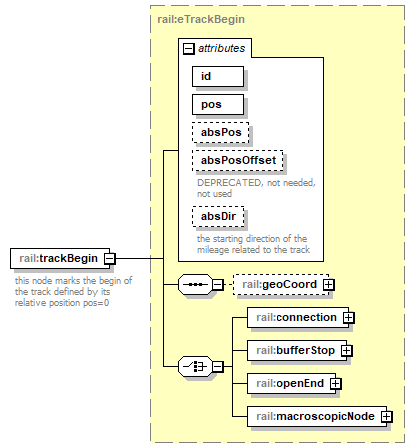 |
||||||||||||||||||||||||||||||||||||||||
| namespace | https://www.railml.org/schemas/2018 | ||||||||||||||||||||||||||||||||||||||||
| type | rail:eTrackBegin | ||||||||||||||||||||||||||||||||||||||||
| properties |
|
||||||||||||||||||||||||||||||||||||||||
| children | rail:geoCoord rail:connection rail:bufferStop rail:openEnd rail:macroscopicNode | ||||||||||||||||||||||||||||||||||||||||
| attributes |
|
||||||||||||||||||||||||||||||||||||||||
| annotation |
|
||||||||||||||||||||||||||||||||||||||||
| source | <xs:element name="trackBegin" type="rail:eTrackBegin"> <xs:annotation> <xs:documentation>this node marks the begin of the track defined by its relative position pos=0</xs:documentation> <xs:documentation source="http://wiki.railml.org/index.php?title=IS:trackBegin"/> </xs:annotation> </xs:element> |
element eTrackTopology/trackEnd
| diagram | 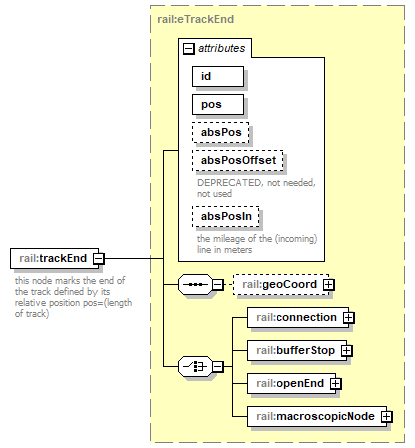 |
||||||||||||||||||||||||||||||||||||||||
| namespace | https://www.railml.org/schemas/2018 | ||||||||||||||||||||||||||||||||||||||||
| type | rail:eTrackEnd | ||||||||||||||||||||||||||||||||||||||||
| properties |
|
||||||||||||||||||||||||||||||||||||||||
| children | rail:geoCoord rail:connection rail:bufferStop rail:openEnd rail:macroscopicNode | ||||||||||||||||||||||||||||||||||||||||
| attributes |
|
||||||||||||||||||||||||||||||||||||||||
| annotation |
|
||||||||||||||||||||||||||||||||||||||||
| source | <xs:element name="trackEnd" type="rail:eTrackEnd"> <xs:annotation> <xs:documentation>this node marks the end of the track defined by its relative position pos=(length of track)</xs:documentation> <xs:documentation source="http://wiki.railml.org/index.php?title=IS:trackEnd"/> </xs:annotation> </xs:element> |
element eTrackTopology/mileageChanges
| diagram |  |
||||||
| namespace | https://www.railml.org/schemas/2018 | ||||||
| type | rail:eMileageChanges | ||||||
| properties |
|
||||||
| children | rail:mileageChange | ||||||
| source | <xs:element name="mileageChanges" type="rail:eMileageChanges" minOccurs="0"> <xs:annotation> <xs:documentation source="http://wiki.railml.org/index.php?title=IS:mileageChanges"/> </xs:annotation> </xs:element> |
element eTrackTopology/connections
| diagram | 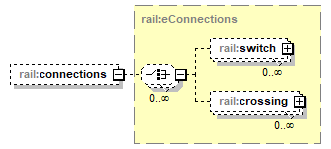 |
||||||
| namespace | https://www.railml.org/schemas/2018 | ||||||
| type | rail:eConnections | ||||||
| properties |
|
||||||
| children | rail:switch rail:crossing | ||||||
| source | <xs:element name="connections" type="rail:eConnections" minOccurs="0"> <xs:annotation> <xs:documentation source="http://wiki.railml.org/index.php?title=IS:connections"/> </xs:annotation> </xs:element> |
element eTrackTopology/crossSections
| diagram |  |
||||||
| namespace | https://www.railml.org/schemas/2018 | ||||||
| type | rail:eCrossSections | ||||||
| properties |
|
||||||
| children | rail:crossSection | ||||||
| source | <xs:element name="crossSections" type="rail:eCrossSections" minOccurs="0"> <xs:annotation> <xs:documentation source="http://wiki.railml.org/index.php?title=IS:crossSections"/> </xs:annotation> </xs:element> |
element eTrackTopology/borders
| diagram |  |
||||||
| namespace | https://www.railml.org/schemas/2018 | ||||||
| type | rail:eBorder | ||||||
| properties |
|
||||||
| children | rail:border | ||||||
| source | <xs:element name="borders" type="rail:eBorder" minOccurs="0"> <xs:annotation> <xs:documentation source="http://wiki.railml.org/index.php?title=IS:borders"/> </xs:annotation> </xs:element> |
complexType eTrackVis
| diagram | 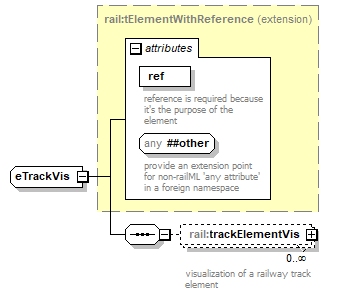 |
||||||||||||||
| namespace | https://www.railml.org/schemas/2018 | ||||||||||||||
| type | extension of rail:tElementWithReference | ||||||||||||||
| properties |
|
||||||||||||||
| children | rail:trackElementVis | ||||||||||||||
| used by |
|
||||||||||||||
| attributes |
|
||||||||||||||
| source | <xs:complexType name="eTrackVis"> <xs:complexContent> <xs:extension base="rail:tElementWithReference"> <xs:sequence> <xs:element name="trackElementVis" type="rail:eTrackElementVis" minOccurs="0" maxOccurs="unbounded"> <xs:annotation> <xs:documentation>visualization of a railway track element</xs:documentation> </xs:annotation> </xs:element> </xs:sequence> </xs:extension> </xs:complexContent> </xs:complexType> |
element eTrackVis/trackElementVis
| diagram | 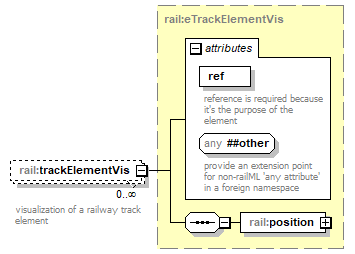 |
||||||||||||||
| namespace | https://www.railml.org/schemas/2018 | ||||||||||||||
| type | rail:eTrackElementVis | ||||||||||||||
| properties |
|
||||||||||||||
| children | rail:position | ||||||||||||||
| attributes |
|
||||||||||||||
| annotation |
|
||||||||||||||
| source | <xs:element name="trackElementVis" type="rail:eTrackElementVis" minOccurs="0" maxOccurs="unbounded"> <xs:annotation> <xs:documentation>visualization of a railway track element</xs:documentation> </xs:annotation> </xs:element> |
complexType eTrainDetectionElements
| diagram |  |
||
| namespace | https://www.railml.org/schemas/2018 | ||
| children | rail:trainDetector rail:trackCircuitBorder | ||
| used by |
|
||
| source | <xs:complexType name="eTrainDetectionElements"> <xs:choice minOccurs="0" maxOccurs="unbounded"> <xs:element name="trainDetector" type="rail:tTrainDetector"> <xs:annotation> <xs:documentation source="http://wiki.railml.org/index.php?title=IS:trainDetector"/> </xs:annotation> </xs:element> <xs:element name="trackCircuitBorder" type="rail:tTrackCircuitBorder"> <xs:annotation> <xs:documentation source="http://wiki.railml.org/index.php?title=IS:trackCircuitBorder"/> </xs:annotation> </xs:element> </xs:choice> </xs:complexType> |
element eTrainDetectionElements/trainDetector
| diagram |  |
||||||||||||||||||||||||||||||||||||||||||||||||||||||||||||||||||||||||||||||||||||||||||||||||||||||||||||||||||||||||||||||
| namespace | https://www.railml.org/schemas/2018 | ||||||||||||||||||||||||||||||||||||||||||||||||||||||||||||||||||||||||||||||||||||||||||||||||||||||||||||||||||||||||||||||
| type | rail:tTrainDetector | ||||||||||||||||||||||||||||||||||||||||||||||||||||||||||||||||||||||||||||||||||||||||||||||||||||||||||||||||||||||||||||||
| properties |
|
||||||||||||||||||||||||||||||||||||||||||||||||||||||||||||||||||||||||||||||||||||||||||||||||||||||||||||||||||||||||||||||
| children | rail:additionalName rail:geoCoord rail:states | ||||||||||||||||||||||||||||||||||||||||||||||||||||||||||||||||||||||||||||||||||||||||||||||||||||||||||||||||||||||||||||||
| attributes |
|
||||||||||||||||||||||||||||||||||||||||||||||||||||||||||||||||||||||||||||||||||||||||||||||||||||||||||||||||||||||||||||||
| source | <xs:element name="trainDetector" type="rail:tTrainDetector"> <xs:annotation> <xs:documentation source="http://wiki.railml.org/index.php?title=IS:trainDetector"/> </xs:annotation> </xs:element> |
element eTrainDetectionElements/trackCircuitBorder
| diagram | 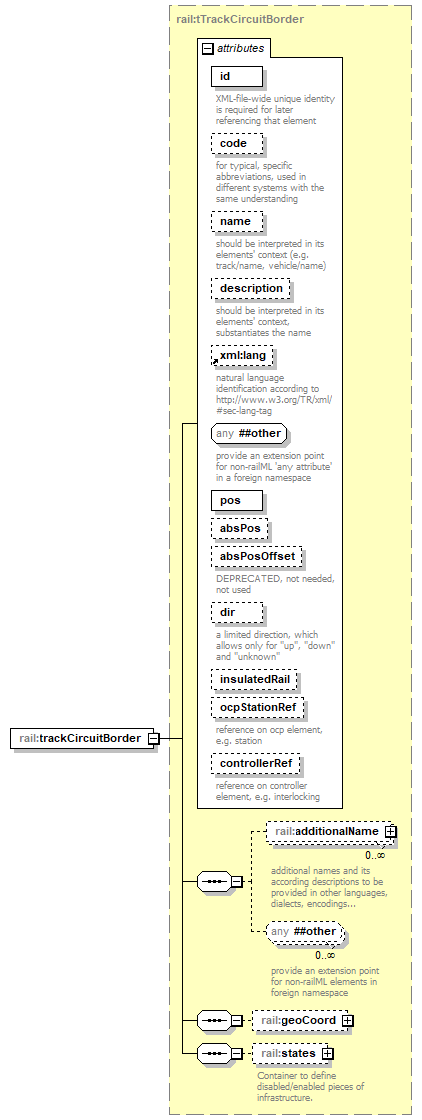 |
||||||||||||||||||||||||||||||||||||||||||||||||||||||||||||||||||||||||||||||||||||||||||||||||
| namespace | https://www.railml.org/schemas/2018 | ||||||||||||||||||||||||||||||||||||||||||||||||||||||||||||||||||||||||||||||||||||||||||||||||
| type | rail:tTrackCircuitBorder | ||||||||||||||||||||||||||||||||||||||||||||||||||||||||||||||||||||||||||||||||||||||||||||||||
| properties |
|
||||||||||||||||||||||||||||||||||||||||||||||||||||||||||||||||||||||||||||||||||||||||||||||||
| children | rail:additionalName rail:geoCoord rail:states | ||||||||||||||||||||||||||||||||||||||||||||||||||||||||||||||||||||||||||||||||||||||||||||||||
| attributes |
|
||||||||||||||||||||||||||||||||||||||||||||||||||||||||||||||||||||||||||||||||||||||||||||||||
| source | <xs:element name="trackCircuitBorder" type="rail:tTrackCircuitBorder"> <xs:annotation> <xs:documentation source="http://wiki.railml.org/index.php?title=IS:trackCircuitBorder"/> </xs:annotation> </xs:element> |
complexType eTrainProtectionChanges
| diagram |  |
||
| namespace | https://www.railml.org/schemas/2018 | ||
| children | rail:trainProtectionChange | ||
| used by |
|
||
| source | <xs:complexType name="eTrainProtectionChanges"> <xs:sequence> <xs:element name="trainProtectionChange" type="rail:tTrainProtectionChange" minOccurs="0" maxOccurs="unbounded"> <xs:annotation> <xs:documentation source="http://wiki.railml.org/index.php?title=IS:trainProtectionChange"/> </xs:annotation> </xs:element> </xs:sequence> </xs:complexType> |
element eTrainProtectionChanges/trainProtectionChange
| diagram | 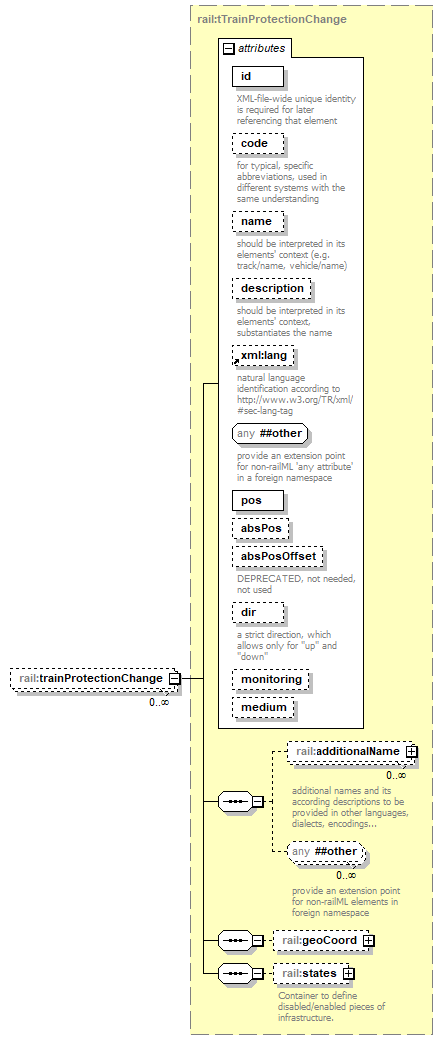 |
||||||||||||||||||||||||||||||||||||||||||||||||||||||||||||||||||||||||||||||||||||||
| namespace | https://www.railml.org/schemas/2018 | ||||||||||||||||||||||||||||||||||||||||||||||||||||||||||||||||||||||||||||||||||||||
| type | rail:tTrainProtectionChange | ||||||||||||||||||||||||||||||||||||||||||||||||||||||||||||||||||||||||||||||||||||||
| properties |
|
||||||||||||||||||||||||||||||||||||||||||||||||||||||||||||||||||||||||||||||||||||||
| children | rail:additionalName rail:geoCoord rail:states | ||||||||||||||||||||||||||||||||||||||||||||||||||||||||||||||||||||||||||||||||||||||
| attributes |
|
||||||||||||||||||||||||||||||||||||||||||||||||||||||||||||||||||||||||||||||||||||||
| source | <xs:element name="trainProtectionChange" type="rail:tTrainProtectionChange" minOccurs="0" maxOccurs="unbounded"> <xs:annotation> <xs:documentation source="http://wiki.railml.org/index.php?title=IS:trainProtectionChange"/> </xs:annotation> </xs:element> |
complexType eTrainProtectionElements
| diagram |  |
||
| namespace | https://www.railml.org/schemas/2018 | ||
| children | rail:trainProtectionElement rail:trainProtectionElementGroup | ||
| used by |
|
||
| source | <xs:complexType name="eTrainProtectionElements"> <xs:sequence> <xs:element name="trainProtectionElement" type="rail:tTrainProtectionElement" minOccurs="0" maxOccurs="unbounded"> <xs:annotation> <xs:documentation source="http://wiki.railml.org/index.php?title=IS:trainProtectionElement"/> </xs:annotation> </xs:element> <xs:element name="trainProtectionElementGroup" type="rail:tTrainProtectionElementGroup" minOccurs="0" maxOccurs="unbounded"> <xs:annotation> <xs:documentation source="http://wiki.railml.org/index.php?title=IS:trainProtectionElementGroup"/> </xs:annotation> </xs:element> </xs:sequence> </xs:complexType> |
element eTrainProtectionElements/trainProtectionElement
| diagram | 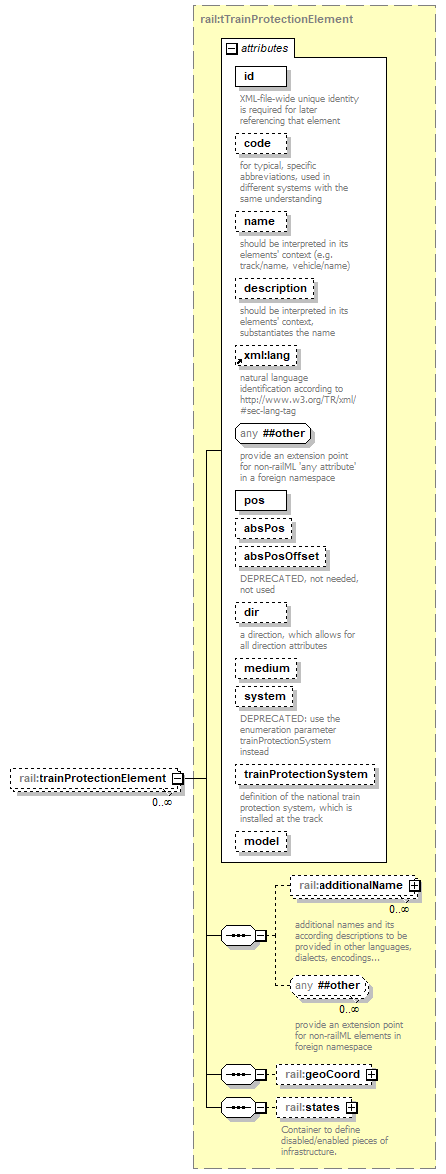 |
||||||||||||||||||||||||||||||||||||||||||||||||||||||||||||||||||||||||||||||||||||||||||||||||||||||||
| namespace | https://www.railml.org/schemas/2018 | ||||||||||||||||||||||||||||||||||||||||||||||||||||||||||||||||||||||||||||||||||||||||||||||||||||||||
| type | rail:tTrainProtectionElement | ||||||||||||||||||||||||||||||||||||||||||||||||||||||||||||||||||||||||||||||||||||||||||||||||||||||||
| properties |
|
||||||||||||||||||||||||||||||||||||||||||||||||||||||||||||||||||||||||||||||||||||||||||||||||||||||||
| children | rail:additionalName rail:geoCoord rail:states | ||||||||||||||||||||||||||||||||||||||||||||||||||||||||||||||||||||||||||||||||||||||||||||||||||||||||
| attributes |
|
||||||||||||||||||||||||||||||||||||||||||||||||||||||||||||||||||||||||||||||||||||||||||||||||||||||||
| source | <xs:element name="trainProtectionElement" type="rail:tTrainProtectionElement" minOccurs="0" maxOccurs="unbounded"> <xs:annotation> <xs:documentation source="http://wiki.railml.org/index.php?title=IS:trainProtectionElement"/> </xs:annotation> </xs:element> |
element eTrainProtectionElements/trainProtectionElementGroup
| diagram | 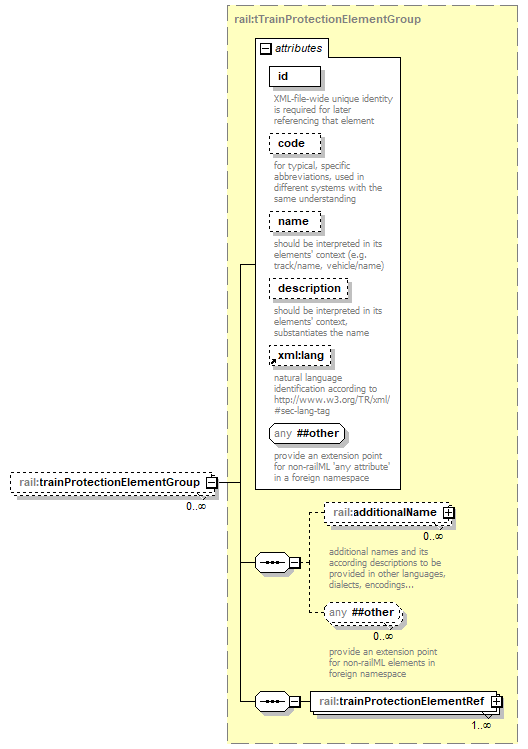 |
||||||||||||||||||||||||||||||||||||||||||||||
| namespace | https://www.railml.org/schemas/2018 | ||||||||||||||||||||||||||||||||||||||||||||||
| type | rail:tTrainProtectionElementGroup | ||||||||||||||||||||||||||||||||||||||||||||||
| properties |
|
||||||||||||||||||||||||||||||||||||||||||||||
| children | rail:additionalName rail:trainProtectionElementRef | ||||||||||||||||||||||||||||||||||||||||||||||
| attributes |
|
||||||||||||||||||||||||||||||||||||||||||||||
| source | <xs:element name="trainProtectionElementGroup" type="rail:tTrainProtectionElementGroup" minOccurs="0" maxOccurs="unbounded"> <xs:annotation> <xs:documentation source="http://wiki.railml.org/index.php?title=IS:trainProtectionElementGroup"/> </xs:annotation> </xs:element> |
complexType eTrainRadioChanges
| diagram |  |
||
| namespace | https://www.railml.org/schemas/2018 | ||
| children | rail:trainRadioChange | ||
| used by |
|
||
| source | <xs:complexType name="eTrainRadioChanges"> <xs:sequence> <xs:element name="trainRadioChange" type="rail:tTrainRadioChange" maxOccurs="unbounded"> <xs:annotation> <xs:documentation>start of section with certain train radio system installed at the infrastructure</xs:documentation> </xs:annotation> </xs:element> </xs:sequence> </xs:complexType> |
element eTrainRadioChanges/trainRadioChange
| diagram |  |
||||||||||||||||||||||||||||||||||||||||||||||||||||||||||||||||||||||||||||||||||||||||||||||||||||||||||||||||||||||||||||||||||
| namespace | https://www.railml.org/schemas/2018 | ||||||||||||||||||||||||||||||||||||||||||||||||||||||||||||||||||||||||||||||||||||||||||||||||||||||||||||||||||||||||||||||||||
| type | rail:tTrainRadioChange | ||||||||||||||||||||||||||||||||||||||||||||||||||||||||||||||||||||||||||||||||||||||||||||||||||||||||||||||||||||||||||||||||||
| properties |
|
||||||||||||||||||||||||||||||||||||||||||||||||||||||||||||||||||||||||||||||||||||||||||||||||||||||||||||||||||||||||||||||||||
| children | rail:additionalName rail:geoCoord rail:states | ||||||||||||||||||||||||||||||||||||||||||||||||||||||||||||||||||||||||||||||||||||||||||||||||||||||||||||||||||||||||||||||||||
| attributes |
|
||||||||||||||||||||||||||||||||||||||||||||||||||||||||||||||||||||||||||||||||||||||||||||||||||||||||||||||||||||||||||||||||||
| annotation |
|
||||||||||||||||||||||||||||||||||||||||||||||||||||||||||||||||||||||||||||||||||||||||||||||||||||||||||||||||||||||||||||||||||
| source | <xs:element name="trainRadioChange" type="rail:tTrainRadioChange" maxOccurs="unbounded"> <xs:annotation> <xs:documentation>start of section with certain train radio system installed at the infrastructure</xs:documentation> </xs:annotation> </xs:element> |
complexType eTunnel
| diagram |  |
||||||||||||||||||||||||||||||||||||||||||||||||||||||||||||||||||||||||||||||||||||||||||||||||||
| namespace | https://www.railml.org/schemas/2018 | ||||||||||||||||||||||||||||||||||||||||||||||||||||||||||||||||||||||||||||||||||||||||||||||||||
| type | extension of rail:tTunnel | ||||||||||||||||||||||||||||||||||||||||||||||||||||||||||||||||||||||||||||||||||||||||||||||||||
| properties |
|
||||||||||||||||||||||||||||||||||||||||||||||||||||||||||||||||||||||||||||||||||||||||||||||||||
| children | rail:additionalName rail:geoCoord rail:states rail:crossedElements | ||||||||||||||||||||||||||||||||||||||||||||||||||||||||||||||||||||||||||||||||||||||||||||||||||
| used by |
|
||||||||||||||||||||||||||||||||||||||||||||||||||||||||||||||||||||||||||||||||||||||||||||||||||
| attributes |
|
||||||||||||||||||||||||||||||||||||||||||||||||||||||||||||||||||||||||||||||||||||||||||||||||||
| source | <xs:complexType name="eTunnel"> <xs:complexContent> <xs:extension base="rail:tTunnel"> <xs:sequence> <xs:element name="crossedElements" type="rail:eCrossedElements" minOccurs="0"> <xs:annotation> <xs:documentation>list the elements that are crossed by this element</xs:documentation> </xs:annotation> </xs:element> </xs:sequence> </xs:extension> </xs:complexContent> </xs:complexType> |
element eTunnel/crossedElements
| diagram |  |
||||||
| namespace | https://www.railml.org/schemas/2018 | ||||||
| type | rail:eCrossedElements | ||||||
| properties |
|
||||||
| children | rail:crossedElement | ||||||
| annotation |
|
||||||
| source | <xs:element name="crossedElements" type="rail:eCrossedElements" minOccurs="0"> <xs:annotation> <xs:documentation>list the elements that are crossed by this element</xs:documentation> </xs:annotation> </xs:element> |
complexType eTunnels
| diagram |  |
||
| namespace | https://www.railml.org/schemas/2018 | ||
| children | rail:tunnel | ||
| used by |
|
||
| source | <xs:complexType name="eTunnels"> <xs:sequence> <xs:element name="tunnel" type="rail:eTunnel" minOccurs="0" maxOccurs="unbounded"> <xs:annotation> <xs:documentation source="http://wiki.railml.org/index.php?title=IS:tunnel"/> </xs:annotation> </xs:element> </xs:sequence> </xs:complexType> |
element eTunnels/tunnel
| diagram |  |
||||||||||||||||||||||||||||||||||||||||||||||||||||||||||||||||||||||||||||||||||||||||||||||||||
| namespace | https://www.railml.org/schemas/2018 | ||||||||||||||||||||||||||||||||||||||||||||||||||||||||||||||||||||||||||||||||||||||||||||||||||
| type | rail:eTunnel | ||||||||||||||||||||||||||||||||||||||||||||||||||||||||||||||||||||||||||||||||||||||||||||||||||
| properties |
|
||||||||||||||||||||||||||||||||||||||||||||||||||||||||||||||||||||||||||||||||||||||||||||||||||
| children | rail:additionalName rail:geoCoord rail:states rail:crossedElements | ||||||||||||||||||||||||||||||||||||||||||||||||||||||||||||||||||||||||||||||||||||||||||||||||||
| attributes |
|
||||||||||||||||||||||||||||||||||||||||||||||||||||||||||||||||||||||||||||||||||||||||||||||||||
| source | <xs:element name="tunnel" type="rail:eTunnel" minOccurs="0" maxOccurs="unbounded"> <xs:annotation> <xs:documentation source="http://wiki.railml.org/index.php?title=IS:tunnel"/> </xs:annotation> </xs:element> |
element rollingstock
| diagram |  |
||||||||||||||||||||||||||||||||||||||||||||||||||||||||||||||||||||||||||||||
| namespace | https://www.railml.org/schemas/2018 | ||||||||||||||||||||||||||||||||||||||||||||||||||||||||||||||||||||||||||||||
| type | extension of rail:tRollingstock | ||||||||||||||||||||||||||||||||||||||||||||||||||||||||||||||||||||||||||||||
| properties |
|
||||||||||||||||||||||||||||||||||||||||||||||||||||||||||||||||||||||||||||||
| children | rail:additionalName rail:metadata rail:vehicles rail:formations | ||||||||||||||||||||||||||||||||||||||||||||||||||||||||||||||||||||||||||||||
| used by |
|
||||||||||||||||||||||||||||||||||||||||||||||||||||||||||||||||||||||||||||||
| attributes |
|
||||||||||||||||||||||||||||||||||||||||||||||||||||||||||||||||||||||||||||||
| identity constraints |
|
||||||||||||||||||||||||||||||||||||||||||||||||||||||||||||||||||||||||||||||
| source | <xs:element name="rollingstock"> <xs:complexType> <xs:annotation> <xs:documentation>container for rolling stock data of single vehicles and train formations</xs:documentation> <xs:documentation source="http://wiki.railml.org/index.php?title=RS:rollingstock"/> </xs:annotation> <xs:complexContent> <xs:extension base="rail:tRollingstock"> <xs:sequence> <xs:element name="vehicles" type="rail:eVehicles" minOccurs="0"> <xs:annotation> <xs:documentation>container for single vehicle data or vehicle family data</xs:documentation> <xs:documentation source="http://wiki.railml.org/index.php?title=RS:vehicles"/> </xs:annotation> </xs:element> <xs:element name="formations" type="rail:eFormations" minOccurs="0"> <xs:annotation> <xs:documentation>container for complete train formations or sets of vehicles</xs:documentation> <xs:documentation source="http://wiki.railml.org/index.php?title=RS:formations"/> </xs:annotation> </xs:element> </xs:sequence> </xs:extension> </xs:complexContent> </xs:complexType> <xs:key name="etcsKey"> <xs:selector xpath=".//rail:vehicles/rail:vehicle/rail:engine/rail:monitoring/rail:etcs"/> <xs:field xpath="@id"/> </xs:key> <xs:key name="specificTransmissionModuleKey"> <xs:selector xpath=".//rail:vehicles/rail:vehicle/rail:engine/rail:monitoring/rail:etcs/rail:specificTransmissionModule"/> <xs:field xpath="@id"/> </xs:key> <xs:key name="nationalSystemKey"> <xs:selector xpath=".//rail:vehicles/rail:vehicle/rail:engine/rail:monitoring/rail:nationalSystem"/> <xs:field xpath="@id"/> </xs:key> <xs:keyref name="nationalSystem-specificTransmissionModuleKeyref" refer="rail:nationalSystemKey"> <xs:selector xpath=".//rail:etcs/rail:specificTransmissionModule"/> <xs:field xpath="@nationalSystemRef"/> </xs:keyref> <xs:key name="trainRadioKey"> <xs:selector xpath=".//rail:vehicles/rail:vehicle/rail:engine/rail:monitoring/rail:trainRadio"/> <xs:field xpath="@id"/> </xs:key> <xs:key name="otherEquipmentKey"> <xs:selector xpath=".//rail:vehicles/rail:vehicle/rail:engine/rail:monitoring/rail:otherEquipment"/> <xs:field xpath="@id"/> </xs:key> <xs:key name="energyStorageKey"> <xs:selector xpath=".//rail:vehicles/rail:vehicle/rail:engine/rail:energyStorage"/> <xs:field xpath="@id"/> </xs:key> <xs:key name="propulsionKey"> <xs:selector xpath=".//rail:vehicles/rail:vehicle/rail:engine/rail:propulsion"/> <xs:field xpath="@id"/> </xs:key> </xs:element> |
element rollingstock/vehicles
| diagram | 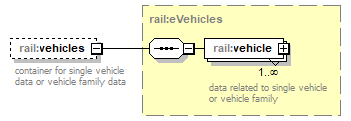 |
||||||
| namespace | https://www.railml.org/schemas/2018 | ||||||
| type | rail:eVehicles | ||||||
| properties |
|
||||||
| children | rail:vehicle | ||||||
| annotation |
|
||||||
| source | <xs:element name="vehicles" type="rail:eVehicles" minOccurs="0"> <xs:annotation> <xs:documentation>container for single vehicle data or vehicle family data</xs:documentation> <xs:documentation source="http://wiki.railml.org/index.php?title=RS:vehicles"/> </xs:annotation> </xs:element> |
element rollingstock/formations
| diagram |  |
||||||
| namespace | https://www.railml.org/schemas/2018 | ||||||
| type | rail:eFormations | ||||||
| properties |
|
||||||
| children | rail:formation | ||||||
| annotation |
|
||||||
| source | <xs:element name="formations" type="rail:eFormations" minOccurs="0"> <xs:annotation> <xs:documentation>container for complete train formations or sets of vehicles</xs:documentation> <xs:documentation source="http://wiki.railml.org/index.php?title=RS:formations"/> </xs:annotation> </xs:element> |
complexType eAuxiliarySupply
| diagram | 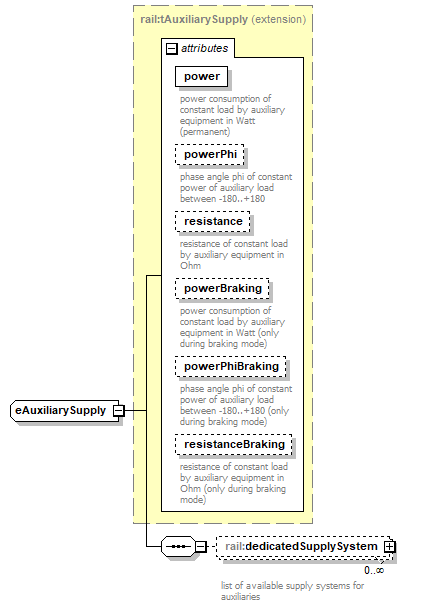 |
||||||||||||||||||||||||||||||||||||||||||||||||||||||
| namespace | https://www.railml.org/schemas/2018 | ||||||||||||||||||||||||||||||||||||||||||||||||||||||
| type | extension of rail:tAuxiliarySupply | ||||||||||||||||||||||||||||||||||||||||||||||||||||||
| properties |
|
||||||||||||||||||||||||||||||||||||||||||||||||||||||
| children | rail:dedicatedSupplySystem | ||||||||||||||||||||||||||||||||||||||||||||||||||||||
| used by |
|
||||||||||||||||||||||||||||||||||||||||||||||||||||||
| attributes |
|
||||||||||||||||||||||||||||||||||||||||||||||||||||||
| source | <xs:complexType name="eAuxiliarySupply"> <xs:complexContent> <xs:extension base="rail:tAuxiliarySupply"> <xs:sequence> <xs:element name="dedicatedSupplySystem" type="rail:tAuxiliarySupplySystem" minOccurs="0" maxOccurs="unbounded"> <xs:annotation> <xs:documentation>list of available supply systems for auxiliaries</xs:documentation> <xs:documentation source="http://wiki.railml.org/index.php?title=RS:dedicatedSupplySystem_auxiliarySupply"/> </xs:annotation> </xs:element> </xs:sequence> </xs:extension> </xs:complexContent> </xs:complexType> |
element eAuxiliarySupply/dedicatedSupplySystem
| diagram | 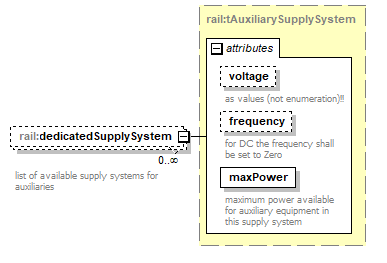 |
||||||||||||||||||||||||||||||
| namespace | https://www.railml.org/schemas/2018 | ||||||||||||||||||||||||||||||
| type | rail:tAuxiliarySupplySystem | ||||||||||||||||||||||||||||||
| properties |
|
||||||||||||||||||||||||||||||
| attributes |
|
||||||||||||||||||||||||||||||
| annotation |
|
||||||||||||||||||||||||||||||
| source | <xs:element name="dedicatedSupplySystem" type="rail:tAuxiliarySupplySystem" minOccurs="0" maxOccurs="unbounded"> <xs:annotation> <xs:documentation>list of available supply systems for auxiliaries</xs:documentation> <xs:documentation source="http://wiki.railml.org/index.php?title=RS:dedicatedSupplySystem_auxiliarySupply"/> </xs:annotation> </xs:element> |
complexType eClassification
| diagram | 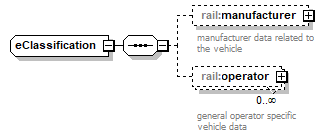 |
||
| namespace | https://www.railml.org/schemas/2018 | ||
| children | rail:manufacturer rail:operator | ||
| used by |
|
||
| source | <xs:complexType name="eClassification"> <xs:sequence> <xs:element name="manufacturer" type="rail:tManufacturer" minOccurs="0"> <xs:annotation> <xs:documentation>manufacturer data related to the vehicle</xs:documentation> <xs:documentation source="http://wiki.railml.org/index.php?title=RS:manufacturer"/> </xs:annotation> </xs:element> <xs:element name="operator" type="rail:eOperator" minOccurs="0" maxOccurs="unbounded"> <xs:annotation> <xs:documentation>general operator specific vehicle data</xs:documentation> <xs:documentation source="http://wiki.railml.org/index.php?title=RS:operator"/> </xs:annotation> </xs:element> </xs:sequence> </xs:complexType> |
element eClassification/manufacturer
| diagram | 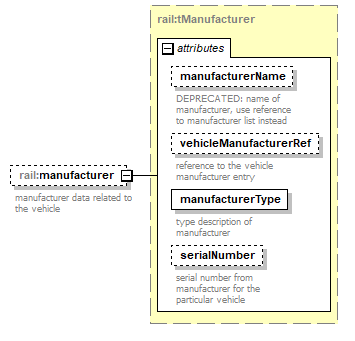 |
||||||||||||||||||||||||||||||||||||||
| namespace | https://www.railml.org/schemas/2018 | ||||||||||||||||||||||||||||||||||||||
| type | rail:tManufacturer | ||||||||||||||||||||||||||||||||||||||
| properties |
|
||||||||||||||||||||||||||||||||||||||
| attributes |
|
||||||||||||||||||||||||||||||||||||||
| annotation |
|
||||||||||||||||||||||||||||||||||||||
| source | <xs:element name="manufacturer" type="rail:tManufacturer" minOccurs="0"> <xs:annotation> <xs:documentation>manufacturer data related to the vehicle</xs:documentation> <xs:documentation source="http://wiki.railml.org/index.php?title=RS:manufacturer"/> </xs:annotation> </xs:element> |
element eClassification/operator
| diagram | 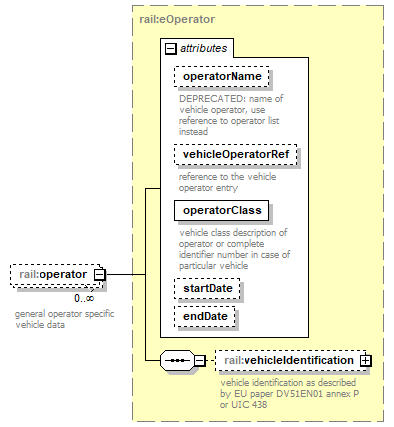 |
||||||||||||||||||||||||||||||||||||||||||
| namespace | https://www.railml.org/schemas/2018 | ||||||||||||||||||||||||||||||||||||||||||
| type | rail:eOperator | ||||||||||||||||||||||||||||||||||||||||||
| properties |
|
||||||||||||||||||||||||||||||||||||||||||
| children | rail:vehicleIdentification | ||||||||||||||||||||||||||||||||||||||||||
| attributes |
|
||||||||||||||||||||||||||||||||||||||||||
| annotation |
|
||||||||||||||||||||||||||||||||||||||||||
| source | <xs:element name="operator" type="rail:eOperator" minOccurs="0" maxOccurs="unbounded"> <xs:annotation> <xs:documentation>general operator specific vehicle data</xs:documentation> <xs:documentation source="http://wiki.railml.org/index.php?title=RS:operator"/> </xs:annotation> </xs:element> |
complexType eCouplers
| diagram | 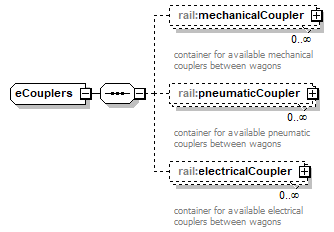 |
||
| namespace | https://www.railml.org/schemas/2018 | ||
| children | rail:mechanicalCoupler rail:pneumaticCoupler rail:electricalCoupler | ||
| used by |
|
||
| source | <xs:complexType name="eCouplers"> <xs:sequence> <xs:element name="mechanicalCoupler" type="rail:eMechanicalCoupler" minOccurs="0" maxOccurs="unbounded"> <xs:annotation> <xs:documentation>container for available mechanical couplers between wagons</xs:documentation> <xs:documentation source="http://wiki.railml.org/index.php?title=RS:mechanicalCoupler"/> </xs:annotation> </xs:element> <xs:element name="pneumaticCoupler" type="rail:ePneumaticCoupler" minOccurs="0" maxOccurs="unbounded"> <xs:annotation> <xs:documentation>container for available pneumatic couplers between wagons</xs:documentation> <xs:documentation source="http://wiki.railml.org/index.php?title=RS:pneumaticCoupler"/> </xs:annotation> </xs:element> <xs:element name="electricalCoupler" type="rail:eElectricalCoupler" minOccurs="0" maxOccurs="unbounded"> <xs:annotation> <xs:documentation>container for available electrical couplers between wagons</xs:documentation> <xs:documentation source="http://wiki.railml.org/index.php?title=RS:electricalCoupler"/> </xs:annotation> </xs:element> </xs:sequence> </xs:complexType> |
element eCouplers/mechanicalCoupler
| diagram | 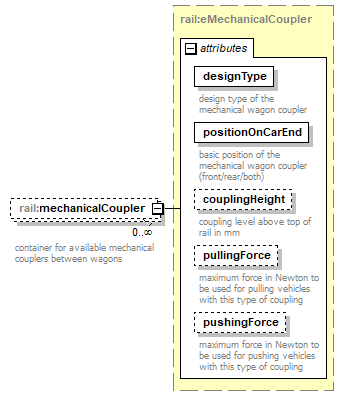 |
||||||||||||||||||||||||||||||||||||||||||||||
| namespace | https://www.railml.org/schemas/2018 | ||||||||||||||||||||||||||||||||||||||||||||||
| type | rail:eMechanicalCoupler | ||||||||||||||||||||||||||||||||||||||||||||||
| properties |
|
||||||||||||||||||||||||||||||||||||||||||||||
| attributes |
|
||||||||||||||||||||||||||||||||||||||||||||||
| annotation |
|
||||||||||||||||||||||||||||||||||||||||||||||
| source | <xs:element name="mechanicalCoupler" type="rail:eMechanicalCoupler" minOccurs="0" maxOccurs="unbounded"> <xs:annotation> <xs:documentation>container for available mechanical couplers between wagons</xs:documentation> <xs:documentation source="http://wiki.railml.org/index.php?title=RS:mechanicalCoupler"/> </xs:annotation> </xs:element> |
element eCouplers/pneumaticCoupler
| diagram | 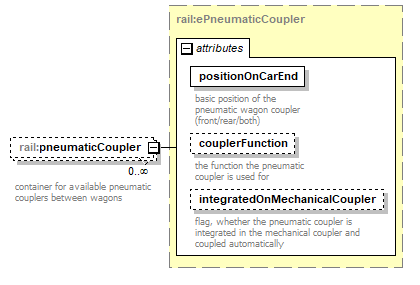 |
||||||||||||||||||||||||||||||
| namespace | https://www.railml.org/schemas/2018 | ||||||||||||||||||||||||||||||
| type | rail:ePneumaticCoupler | ||||||||||||||||||||||||||||||
| properties |
|
||||||||||||||||||||||||||||||
| attributes |
|
||||||||||||||||||||||||||||||
| annotation |
|
||||||||||||||||||||||||||||||
| source | <xs:element name="pneumaticCoupler" type="rail:ePneumaticCoupler" minOccurs="0" maxOccurs="unbounded"> <xs:annotation> <xs:documentation>container for available pneumatic couplers between wagons</xs:documentation> <xs:documentation source="http://wiki.railml.org/index.php?title=RS:pneumaticCoupler"/> </xs:annotation> </xs:element> |
element eCouplers/electricalCoupler
| diagram | 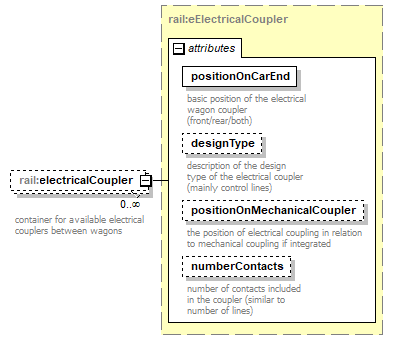 |
||||||||||||||||||||||||||||||||||||||
| namespace | https://www.railml.org/schemas/2018 | ||||||||||||||||||||||||||||||||||||||
| type | rail:eElectricalCoupler | ||||||||||||||||||||||||||||||||||||||
| properties |
|
||||||||||||||||||||||||||||||||||||||
| attributes |
|
||||||||||||||||||||||||||||||||||||||
| annotation |
|
||||||||||||||||||||||||||||||||||||||
| source | <xs:element name="electricalCoupler" type="rail:eElectricalCoupler" minOccurs="0" maxOccurs="unbounded"> <xs:annotation> <xs:documentation>container for available electrical couplers between wagons</xs:documentation> <xs:documentation source="http://wiki.railml.org/index.php?title=RS:electricalCoupler"/> </xs:annotation> </xs:element> |
complexType eCurvingLimitation
| diagram | 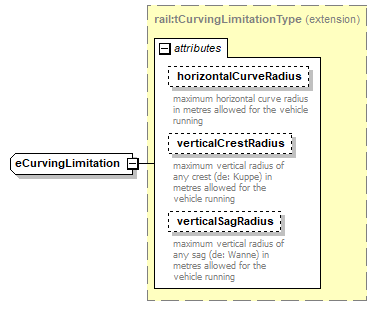 |
||||||||||||||||||||||||||||||
| namespace | https://www.railml.org/schemas/2018 | ||||||||||||||||||||||||||||||
| type | extension of rail:tCurvingLimitationType | ||||||||||||||||||||||||||||||
| properties |
|
||||||||||||||||||||||||||||||
| used by |
|
||||||||||||||||||||||||||||||
| attributes |
|
||||||||||||||||||||||||||||||
| source | <xs:complexType name="eCurvingLimitation"> <xs:complexContent> <xs:extension base="rail:tCurvingLimitationType"> <xs:annotation> <xs:documentation source="http://wiki.railml.org/index.php?title=RS:curvingLimitation"/> </xs:annotation> </xs:extension> </xs:complexContent> </xs:complexType> |
complexType eDoors
| diagram | 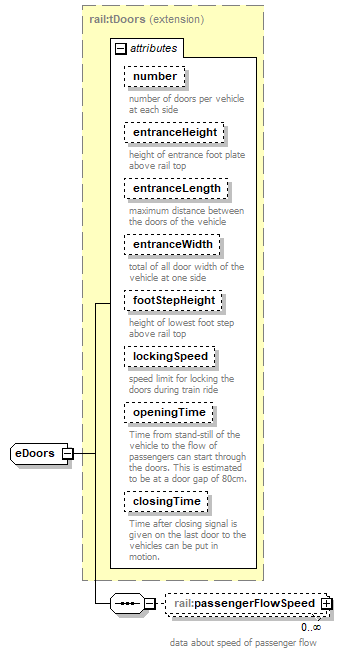 |
||||||||||||||||||||||||||||||||||||||||||||||||||||||||||||||||||||||
| namespace | https://www.railml.org/schemas/2018 | ||||||||||||||||||||||||||||||||||||||||||||||||||||||||||||||||||||||
| type | extension of rail:tDoors | ||||||||||||||||||||||||||||||||||||||||||||||||||||||||||||||||||||||
| properties |
|
||||||||||||||||||||||||||||||||||||||||||||||||||||||||||||||||||||||
| children | rail:passengerFlowSpeed | ||||||||||||||||||||||||||||||||||||||||||||||||||||||||||||||||||||||
| used by |
|
||||||||||||||||||||||||||||||||||||||||||||||||||||||||||||||||||||||
| attributes |
|
||||||||||||||||||||||||||||||||||||||||||||||||||||||||||||||||||||||
| source | <xs:complexType name="eDoors"> <xs:complexContent> <xs:extension base="rail:tDoors"> <xs:sequence> <xs:element name="passengerFlowSpeed" type="rail:tPassengerFlowSpeed" minOccurs="0" maxOccurs="unbounded"> <xs:annotation> <xs:documentation>data about speed of passenger flow</xs:documentation> <xs:documentation source="http://wiki.railml.org/index.php?title=RS:passengerFlowSpeed"/> </xs:annotation> </xs:element> </xs:sequence> </xs:extension> </xs:complexContent> </xs:complexType> |
element eDoors/passengerFlowSpeed
| diagram | 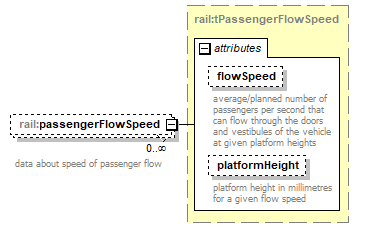 |
||||||||||||||||||||||
| namespace | https://www.railml.org/schemas/2018 | ||||||||||||||||||||||
| type | rail:tPassengerFlowSpeed | ||||||||||||||||||||||
| properties |
|
||||||||||||||||||||||
| attributes |
|
||||||||||||||||||||||
| annotation |
|
||||||||||||||||||||||
| source | <xs:element name="passengerFlowSpeed" type="rail:tPassengerFlowSpeed" minOccurs="0" maxOccurs="unbounded"> <xs:annotation> <xs:documentation>data about speed of passenger flow</xs:documentation> <xs:documentation source="http://wiki.railml.org/index.php?title=RS:passengerFlowSpeed"/> </xs:annotation> </xs:element> |
complexType eElectricalCoupler
| diagram | 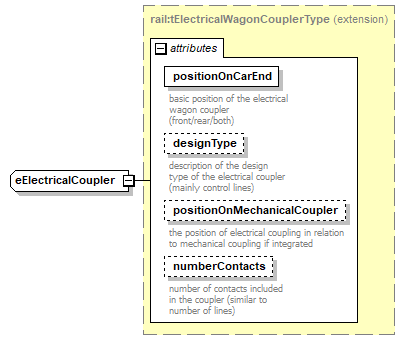 |
||||||||||||||||||||||||||||||||||||||
| namespace | https://www.railml.org/schemas/2018 | ||||||||||||||||||||||||||||||||||||||
| type | extension of rail:tElectricalWagonCouplerType | ||||||||||||||||||||||||||||||||||||||
| properties |
|
||||||||||||||||||||||||||||||||||||||
| used by |
|
||||||||||||||||||||||||||||||||||||||
| attributes |
|
||||||||||||||||||||||||||||||||||||||
| source | <xs:complexType name="eElectricalCoupler"> <xs:complexContent> <xs:extension base="rail:tElectricalWagonCouplerType"> <xs:annotation> <xs:documentation source="http://wiki.railml.org/index.php?title=RS:electricalCoupler"/> </xs:annotation> </xs:extension> </xs:complexContent> </xs:complexType> |
complexType eEngine
| diagram | 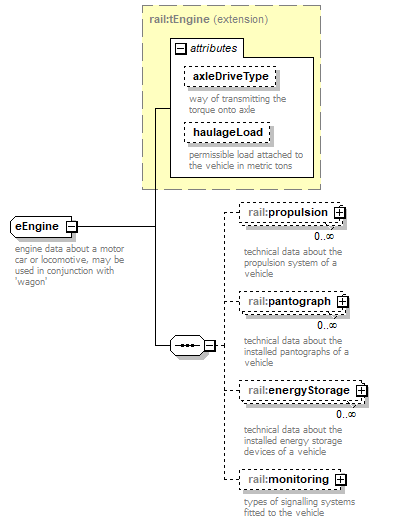 |
||||||||||||||||||||||
| namespace | https://www.railml.org/schemas/2018 | ||||||||||||||||||||||
| type | extension of rail:tEngine | ||||||||||||||||||||||
| properties |
|
||||||||||||||||||||||
| children | rail:propulsion rail:pantograph rail:energyStorage rail:monitoring | ||||||||||||||||||||||
| used by |
|
||||||||||||||||||||||
| attributes |
|
||||||||||||||||||||||
| annotation |
|
||||||||||||||||||||||
| source | <xs:complexType name="eEngine"> <xs:annotation> <xs:documentation>engine data about a motor car or locomotive, may be used in conjunction with 'wagon'</xs:documentation> <xs:documentation source="http://wiki.railml.org/index.php?title=RS:engine"/> </xs:annotation> <xs:complexContent> <xs:extension base="rail:tEngine"> <xs:sequence> <xs:element name="propulsion" type="rail:ePropulsion" minOccurs="0" maxOccurs="unbounded"> <xs:annotation> <xs:documentation>technical data about the propulsion system of a vehicle</xs:documentation> <xs:documentation source="http://wiki.railml.org/index.php?title=RS:propulsion"/> </xs:annotation> </xs:element> <xs:element name="pantograph" type="rail:ePantograph" minOccurs="0" maxOccurs="unbounded"> <xs:annotation> <xs:documentation>technical data about the installed pantographs of a vehicle</xs:documentation> <xs:documentation source="http://wiki.railml.org/index.php?title=RS:pantograph"/> </xs:annotation> </xs:element> <xs:element name="energyStorage" type="rail:eStorage" minOccurs="0" maxOccurs="unbounded"> <xs:annotation> <xs:documentation>technical data about the installed energy storage devices of a vehicle</xs:documentation> <xs:documentation source="http://wiki.railml.org/index.php?title=RS:energyStorage"/> </xs:annotation> </xs:element> <xs:element name="monitoring" type="rail:eMonitoring" minOccurs="0"> <xs:annotation> <xs:documentation>types of signalling systems fitted to the vehicle</xs:documentation> <xs:documentation source="http://wiki.railml.org/index.php?title=RS:monitoring"/> </xs:annotation> </xs:element> </xs:sequence> </xs:extension> </xs:complexContent> </xs:complexType> |
element eEngine/propulsion
| diagram |  |
||||||||||||||||||||||||||||||||||||||||||||||||||||||||||||||||||||||||||||||||||||||||||||||||||||||||||||||||||||||||||||||||||||||||||||||||||||||||||||||||||||||||||||||||||||||||||||||||||||||||||||||||||||||||||||||||||||||||||||||
| namespace | https://www.railml.org/schemas/2018 | ||||||||||||||||||||||||||||||||||||||||||||||||||||||||||||||||||||||||||||||||||||||||||||||||||||||||||||||||||||||||||||||||||||||||||||||||||||||||||||||||||||||||||||||||||||||||||||||||||||||||||||||||||||||||||||||||||||||||||||||
| type | rail:ePropulsion | ||||||||||||||||||||||||||||||||||||||||||||||||||||||||||||||||||||||||||||||||||||||||||||||||||||||||||||||||||||||||||||||||||||||||||||||||||||||||||||||||||||||||||||||||||||||||||||||||||||||||||||||||||||||||||||||||||||||||||||||
| properties |
|
||||||||||||||||||||||||||||||||||||||||||||||||||||||||||||||||||||||||||||||||||||||||||||||||||||||||||||||||||||||||||||||||||||||||||||||||||||||||||||||||||||||||||||||||||||||||||||||||||||||||||||||||||||||||||||||||||||||||||||||
| children | rail:additionalName rail:transformer rail:fourQuadrantChopper rail:link rail:tractionInverter rail:tractionMotor rail:diesel rail:gear rail:auxiliarySupply rail:tractiveEffort rail:brakeEffort rail:tractiveCurrent rail:brakeCurrent rail:tractiveCurrentLimitation rail:brakeCurrentLimitation rail:tractiveVehicleEfficiency rail:brakeVehicleEfficiency rail:rackTraction | ||||||||||||||||||||||||||||||||||||||||||||||||||||||||||||||||||||||||||||||||||||||||||||||||||||||||||||||||||||||||||||||||||||||||||||||||||||||||||||||||||||||||||||||||||||||||||||||||||||||||||||||||||||||||||||||||||||||||||||||
| attributes |
|
||||||||||||||||||||||||||||||||||||||||||||||||||||||||||||||||||||||||||||||||||||||||||||||||||||||||||||||||||||||||||||||||||||||||||||||||||||||||||||||||||||||||||||||||||||||||||||||||||||||||||||||||||||||||||||||||||||||||||||||
| annotation |
|
||||||||||||||||||||||||||||||||||||||||||||||||||||||||||||||||||||||||||||||||||||||||||||||||||||||||||||||||||||||||||||||||||||||||||||||||||||||||||||||||||||||||||||||||||||||||||||||||||||||||||||||||||||||||||||||||||||||||||||||
| source | <xs:element name="propulsion" type="rail:ePropulsion" minOccurs="0" maxOccurs="unbounded"> <xs:annotation> <xs:documentation>technical data about the propulsion system of a vehicle</xs:documentation> <xs:documentation source="http://wiki.railml.org/index.php?title=RS:propulsion"/> </xs:annotation> </xs:element> |
element eEngine/pantograph
| diagram | 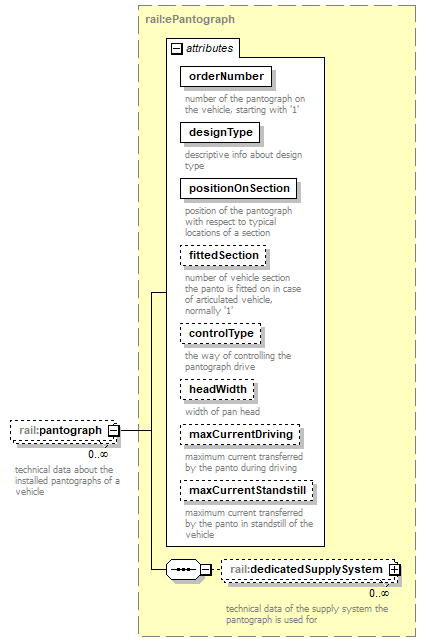 |
||||||||||||||||||||||||||||||||||||||||||||||||||||||||||||||||||||||
| namespace | https://www.railml.org/schemas/2018 | ||||||||||||||||||||||||||||||||||||||||||||||||||||||||||||||||||||||
| type | rail:ePantograph | ||||||||||||||||||||||||||||||||||||||||||||||||||||||||||||||||||||||
| properties |
|
||||||||||||||||||||||||||||||||||||||||||||||||||||||||||||||||||||||
| children | rail:dedicatedSupplySystem | ||||||||||||||||||||||||||||||||||||||||||||||||||||||||||||||||||||||
| attributes |
|
||||||||||||||||||||||||||||||||||||||||||||||||||||||||||||||||||||||
| annotation |
|
||||||||||||||||||||||||||||||||||||||||||||||||||||||||||||||||||||||
| source | <xs:element name="pantograph" type="rail:ePantograph" minOccurs="0" maxOccurs="unbounded"> <xs:annotation> <xs:documentation>technical data about the installed pantographs of a vehicle</xs:documentation> <xs:documentation source="http://wiki.railml.org/index.php?title=RS:pantograph"/> </xs:annotation> </xs:element> |
element eEngine/energyStorage
| diagram |  |
||||||||||||||||||||||||||||||||||||||||||||||||||||||||||||||||||||||||||||||||||||||||||||||||||||||||||||||
| namespace | https://www.railml.org/schemas/2018 | ||||||||||||||||||||||||||||||||||||||||||||||||||||||||||||||||||||||||||||||||||||||||||||||||||||||||||||||
| type | rail:eStorage | ||||||||||||||||||||||||||||||||||||||||||||||||||||||||||||||||||||||||||||||||||||||||||||||||||||||||||||||
| properties |
|
||||||||||||||||||||||||||||||||||||||||||||||||||||||||||||||||||||||||||||||||||||||||||||||||||||||||||||||
| children | rail:additionalName rail:efficiency | ||||||||||||||||||||||||||||||||||||||||||||||||||||||||||||||||||||||||||||||||||||||||||||||||||||||||||||||
| attributes |
|
||||||||||||||||||||||||||||||||||||||||||||||||||||||||||||||||||||||||||||||||||||||||||||||||||||||||||||||
| annotation |
|
||||||||||||||||||||||||||||||||||||||||||||||||||||||||||||||||||||||||||||||||||||||||||||||||||||||||||||||
| source | <xs:element name="energyStorage" type="rail:eStorage" minOccurs="0" maxOccurs="unbounded"> <xs:annotation> <xs:documentation>technical data about the installed energy storage devices of a vehicle</xs:documentation> <xs:documentation source="http://wiki.railml.org/index.php?title=RS:energyStorage"/> </xs:annotation> </xs:element> |
element eEngine/monitoring
| diagram | 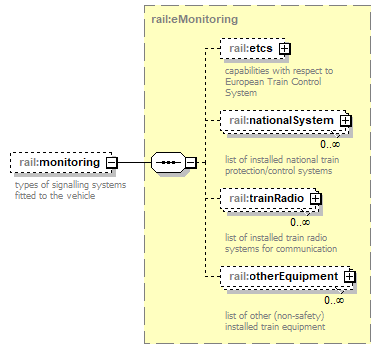 |
||||||
| namespace | https://www.railml.org/schemas/2018 | ||||||
| type | rail:eMonitoring | ||||||
| properties |
|
||||||
| children | rail:etcs rail:nationalSystem rail:trainRadio rail:otherEquipment | ||||||
| annotation |
|
||||||
| source | <xs:element name="monitoring" type="rail:eMonitoring" minOccurs="0"> <xs:annotation> <xs:documentation>types of signalling systems fitted to the vehicle</xs:documentation> <xs:documentation source="http://wiki.railml.org/index.php?title=RS:monitoring"/> </xs:annotation> </xs:element> |
complexType eETCS
| diagram | 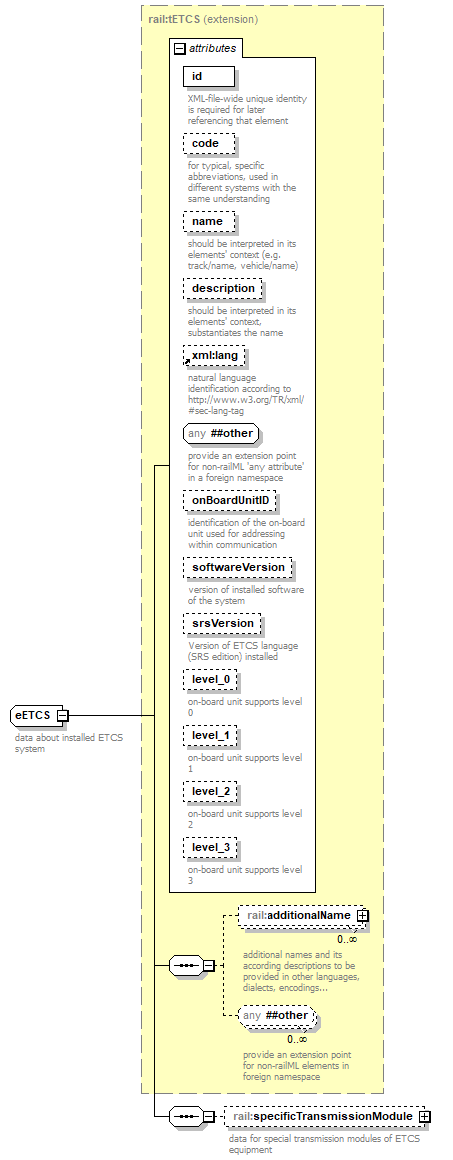 |
||||||||||||||||||||||||||||||||||||||||||||||||||||||||||||||||||||||||||||||||||||||||||||||||||||||
| namespace | https://www.railml.org/schemas/2018 | ||||||||||||||||||||||||||||||||||||||||||||||||||||||||||||||||||||||||||||||||||||||||||||||||||||||
| type | extension of rail:tETCS | ||||||||||||||||||||||||||||||||||||||||||||||||||||||||||||||||||||||||||||||||||||||||||||||||||||||
| properties |
|
||||||||||||||||||||||||||||||||||||||||||||||||||||||||||||||||||||||||||||||||||||||||||||||||||||||
| children | rail:additionalName rail:specificTransmissionModule | ||||||||||||||||||||||||||||||||||||||||||||||||||||||||||||||||||||||||||||||||||||||||||||||||||||||
| used by |
|
||||||||||||||||||||||||||||||||||||||||||||||||||||||||||||||||||||||||||||||||||||||||||||||||||||||
| attributes |
|
||||||||||||||||||||||||||||||||||||||||||||||||||||||||||||||||||||||||||||||||||||||||||||||||||||||
| annotation |
|
||||||||||||||||||||||||||||||||||||||||||||||||||||||||||||||||||||||||||||||||||||||||||||||||||||||
| source | <xs:complexType name="eETCS"> <xs:annotation> <xs:documentation>data about installed ETCS system</xs:documentation> <xs:documentation source="http://wiki.railml.org/index.php?title=RS:etcs"/> </xs:annotation> <xs:complexContent> <xs:extension base="rail:tETCS"> <xs:sequence> <xs:element name="specificTransmissionModule" type="rail:tSpecificTransmissionModule" minOccurs="0"> <xs:annotation> <xs:documentation>data for special transmission modules of ETCS equipment</xs:documentation> <xs:documentation source="http://wiki.railml.org/index.php?title=RS:specificTransmissionModule"/> </xs:annotation> </xs:element> </xs:sequence> </xs:extension> </xs:complexContent> </xs:complexType> |
element eETCS/specificTransmissionModule
| diagram | 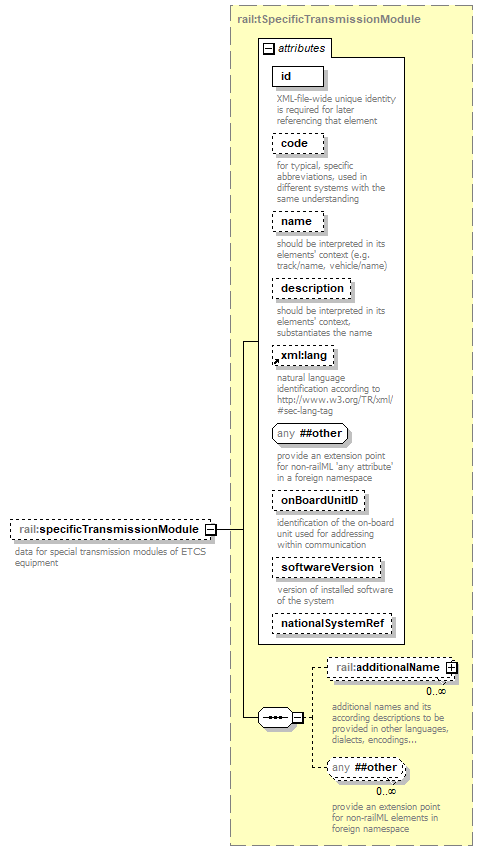 |
||||||||||||||||||||||||||||||||||||||||||||||||||||||||||||||||||||
| namespace | https://www.railml.org/schemas/2018 | ||||||||||||||||||||||||||||||||||||||||||||||||||||||||||||||||||||
| type | rail:tSpecificTransmissionModule | ||||||||||||||||||||||||||||||||||||||||||||||||||||||||||||||||||||
| properties |
|
||||||||||||||||||||||||||||||||||||||||||||||||||||||||||||||||||||
| children | rail:additionalName | ||||||||||||||||||||||||||||||||||||||||||||||||||||||||||||||||||||
| attributes |
|
||||||||||||||||||||||||||||||||||||||||||||||||||||||||||||||||||||
| annotation |
|
||||||||||||||||||||||||||||||||||||||||||||||||||||||||||||||||||||
| source | <xs:element name="specificTransmissionModule" type="rail:tSpecificTransmissionModule" minOccurs="0"> <xs:annotation> <xs:documentation>data for special transmission modules of ETCS equipment</xs:documentation> <xs:documentation source="http://wiki.railml.org/index.php?title=RS:specificTransmissionModule"/> </xs:annotation> </xs:element> |
complexType eFormation
| diagram |  |
||||||||||||||||||||||||||||||||||||||||||||||||||||||||||||||||||||||||||||||||||||||||||||||||||||||||||||||
| namespace | https://www.railml.org/schemas/2018 | ||||||||||||||||||||||||||||||||||||||||||||||||||||||||||||||||||||||||||||||||||||||||||||||||||||||||||||||
| type | extension of rail:tFormation | ||||||||||||||||||||||||||||||||||||||||||||||||||||||||||||||||||||||||||||||||||||||||||||||||||||||||||||||
| properties |
|
||||||||||||||||||||||||||||||||||||||||||||||||||||||||||||||||||||||||||||||||||||||||||||||||||||||||||||||
| children | rail:additionalName rail:trainOrder rail:categoryRef rail:trainEngine rail:trainBrakes rail:trainBrakeOperation rail:trainResistance rail:speedProfileRef rail:technicalStopActivity | ||||||||||||||||||||||||||||||||||||||||||||||||||||||||||||||||||||||||||||||||||||||||||||||||||||||||||||||
| used by |
|
||||||||||||||||||||||||||||||||||||||||||||||||||||||||||||||||||||||||||||||||||||||||||||||||||||||||||||||
| attributes |
|
||||||||||||||||||||||||||||||||||||||||||||||||||||||||||||||||||||||||||||||||||||||||||||||||||||||||||||||
| annotation |
|
||||||||||||||||||||||||||||||||||||||||||||||||||||||||||||||||||||||||||||||||||||||||||||||||||||||||||||||
| source | <xs:complexType name="eFormation"> <xs:annotation> <xs:documentation>data for train composition or vehicle formation</xs:documentation> <xs:documentation source="http://wiki.railml.org/index.php?title=RS:formation"/> </xs:annotation> <xs:complexContent> <xs:extension base="rail:tFormation"> <xs:sequence> <xs:annotation> <xs:documentation>contain formation data</xs:documentation> </xs:annotation> <xs:element name="trainOrder" type="rail:eTrainOrder" minOccurs="0"> <xs:annotation> <xs:documentation>car order for a formation</xs:documentation> <xs:documentation source="http://wiki.railml.org/index.php?title=RS:trainOrder"/> </xs:annotation> </xs:element> <xs:element name="categoryRef" type="rail:tElementWithReference" minOccurs="0" maxOccurs="unbounded"> <xs:annotation> <xs:documentation>reference to train categories in TimeTable part, e.g. ltd. Express, the formation can run as in service</xs:documentation> <xs:documentation source="http://wiki.railml.org/index.php?title=RS:categoryRef"/> </xs:annotation> </xs:element> <xs:element name="trainEngine" type="rail:tTrainEngine" minOccurs="0"> <xs:annotation> <xs:documentation>acceleration value for whole formation</xs:documentation> <xs:documentation source="http://wiki.railml.org/index.php?title=RS:trainEngine"/> </xs:annotation> </xs:element> <xs:element name="trainBrakes" type="rail:tBasicBrakeType" minOccurs="0"> <xs:annotation> <xs:documentation>for whole formation deceleration</xs:documentation> <xs:documentation source="http://wiki.railml.org/index.php?title=RS:trainBrakes"/> </xs:annotation> </xs:element> <xs:element name="trainBrakeOperation" type="rail:tBasicBrakeOperation" minOccurs="0" maxOccurs="unbounded"> <xs:annotation> <xs:documentation>operational braking rules according to specific supervision regime for entire formation</xs:documentation> <xs:documentation source="http://wiki.railml.org/index.php?title=RS:trainBrakeOperation"/> </xs:annotation> </xs:element> <xs:element name="trainResistance" type="rail:tTrainResistance" minOccurs="0"> <xs:annotation> <xs:documentation>mechanical train resistance vs. speed</xs:documentation> <xs:documentation source="http://wiki.railml.org/index.php?title=RS:trainResistance"/> </xs:annotation> </xs:element> <xs:element name="speedProfileRef" type="rail:tSpeedProfileRefRS" minOccurs="0" maxOccurs="unbounded"> <xs:annotation> <xs:documentation>reference to permissible speed profiles for entire formation</xs:documentation> <xs:documentation source="http://wiki.railml.org/index.php?title=RS:speedProfileRefRS"/> </xs:annotation> </xs:element> <xs:element name="technicalStopActivity" type="rail:tTechnicalStopActivity" minOccurs="0" maxOccurs="unbounded"> <xs:annotation> <xs:documentation>list of stop activities with their related technical times</xs:documentation> </xs:annotation> </xs:element> </xs:sequence> </xs:extension> </xs:complexContent> </xs:complexType> |
element eFormation/trainOrder
| diagram | 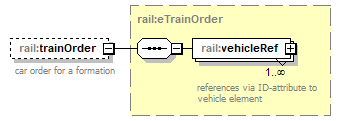 |
||||||
| namespace | https://www.railml.org/schemas/2018 | ||||||
| type | rail:eTrainOrder | ||||||
| properties |
|
||||||
| children | rail:vehicleRef | ||||||
| annotation |
|
||||||
| source | <xs:element name="trainOrder" type="rail:eTrainOrder" minOccurs="0"> <xs:annotation> <xs:documentation>car order for a formation</xs:documentation> <xs:documentation source="http://wiki.railml.org/index.php?title=RS:trainOrder"/> </xs:annotation> </xs:element> |
element eFormation/categoryRef
| diagram | 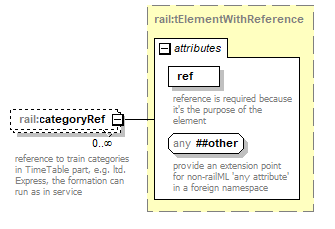 |
||||||||||||||
| namespace | https://www.railml.org/schemas/2018 | ||||||||||||||
| type | rail:tElementWithReference | ||||||||||||||
| properties |
|
||||||||||||||
| attributes |
|
||||||||||||||
| annotation |
|
||||||||||||||
| source | <xs:element name="categoryRef" type="rail:tElementWithReference" minOccurs="0" maxOccurs="unbounded"> <xs:annotation> <xs:documentation>reference to train categories in TimeTable part, e.g. ltd. Express, the formation can run as in service</xs:documentation> <xs:documentation source="http://wiki.railml.org/index.php?title=RS:categoryRef"/> </xs:annotation> </xs:element> |
element eFormation/trainEngine
| diagram | 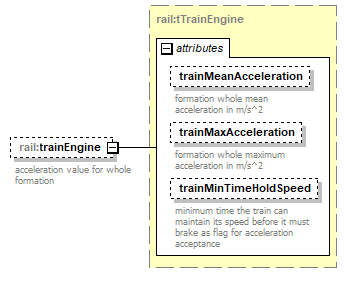 |
||||||||||||||||||||||||||||||
| namespace | https://www.railml.org/schemas/2018 | ||||||||||||||||||||||||||||||
| type | rail:tTrainEngine | ||||||||||||||||||||||||||||||
| properties |
|
||||||||||||||||||||||||||||||
| attributes |
|
||||||||||||||||||||||||||||||
| annotation |
|
||||||||||||||||||||||||||||||
| source | <xs:element name="trainEngine" type="rail:tTrainEngine" minOccurs="0"> <xs:annotation> <xs:documentation>acceleration value for whole formation</xs:documentation> <xs:documentation source="http://wiki.railml.org/index.php?title=RS:trainEngine"/> </xs:annotation> </xs:element> |
element eFormation/trainBrakes
| diagram | 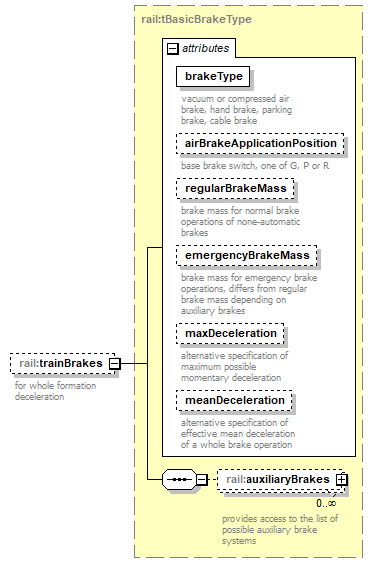 |
||||||||||||||||||||||||||||||||||||||||||||||||||||||
| namespace | https://www.railml.org/schemas/2018 | ||||||||||||||||||||||||||||||||||||||||||||||||||||||
| type | rail:tBasicBrakeType | ||||||||||||||||||||||||||||||||||||||||||||||||||||||
| properties |
|
||||||||||||||||||||||||||||||||||||||||||||||||||||||
| children | rail:auxiliaryBrakes | ||||||||||||||||||||||||||||||||||||||||||||||||||||||
| attributes |
|
||||||||||||||||||||||||||||||||||||||||||||||||||||||
| annotation |
|
||||||||||||||||||||||||||||||||||||||||||||||||||||||
| source | <xs:element name="trainBrakes" type="rail:tBasicBrakeType" minOccurs="0"> <xs:annotation> <xs:documentation>for whole formation deceleration</xs:documentation> <xs:documentation source="http://wiki.railml.org/index.php?title=RS:trainBrakes"/> </xs:annotation> </xs:element> |
element eFormation/trainBrakeOperation
| diagram | 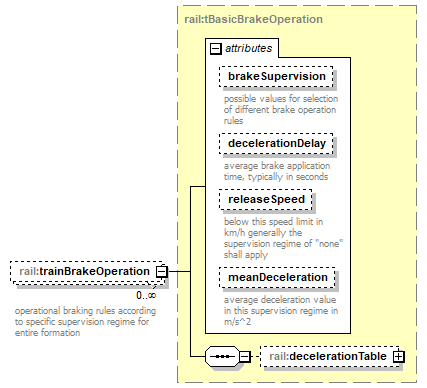 |
||||||||||||||||||||||||||||||||||||||
| namespace | https://www.railml.org/schemas/2018 | ||||||||||||||||||||||||||||||||||||||
| type | rail:tBasicBrakeOperation | ||||||||||||||||||||||||||||||||||||||
| properties |
|
||||||||||||||||||||||||||||||||||||||
| children | rail:decelerationTable | ||||||||||||||||||||||||||||||||||||||
| attributes |
|
||||||||||||||||||||||||||||||||||||||
| annotation |
|
||||||||||||||||||||||||||||||||||||||
| source | <xs:element name="trainBrakeOperation" type="rail:tBasicBrakeOperation" minOccurs="0" maxOccurs="unbounded"> <xs:annotation> <xs:documentation>operational braking rules according to specific supervision regime for entire formation</xs:documentation> <xs:documentation source="http://wiki.railml.org/index.php?title=RS:trainBrakeOperation"/> </xs:annotation> </xs:element> |
element eFormation/trainResistance
| diagram | 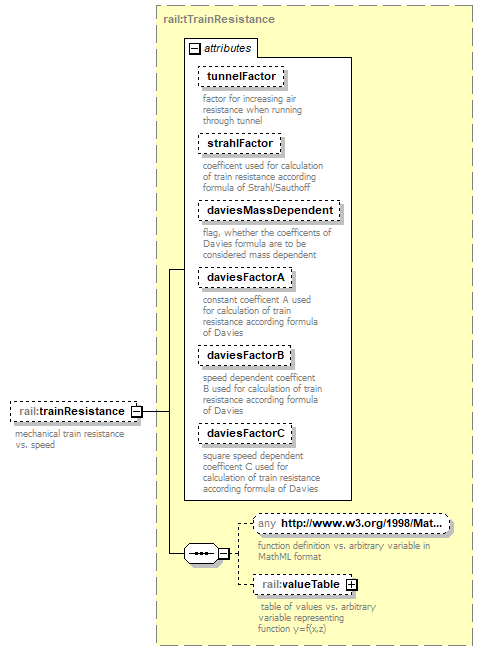 |
||||||||||||||||||||||||||||||||||||||||||||||||||||||
| namespace | https://www.railml.org/schemas/2018 | ||||||||||||||||||||||||||||||||||||||||||||||||||||||
| type | rail:tTrainResistance | ||||||||||||||||||||||||||||||||||||||||||||||||||||||
| properties |
|
||||||||||||||||||||||||||||||||||||||||||||||||||||||
| children | rail:valueTable | ||||||||||||||||||||||||||||||||||||||||||||||||||||||
| attributes |
|
||||||||||||||||||||||||||||||||||||||||||||||||||||||
| annotation |
|
||||||||||||||||||||||||||||||||||||||||||||||||||||||
| source | <xs:element name="trainResistance" type="rail:tTrainResistance" minOccurs="0"> <xs:annotation> <xs:documentation>mechanical train resistance vs. speed</xs:documentation> <xs:documentation source="http://wiki.railml.org/index.php?title=RS:trainResistance"/> </xs:annotation> </xs:element> |
element eFormation/speedProfileRef
| diagram | 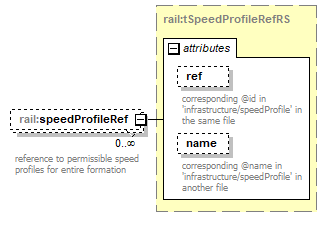 |
||||||||||||||||||||||
| namespace | https://www.railml.org/schemas/2018 | ||||||||||||||||||||||
| type | rail:tSpeedProfileRefRS | ||||||||||||||||||||||
| properties |
|
||||||||||||||||||||||
| attributes |
|
||||||||||||||||||||||
| annotation |
|
||||||||||||||||||||||
| source | <xs:element name="speedProfileRef" type="rail:tSpeedProfileRefRS" minOccurs="0" maxOccurs="unbounded"> <xs:annotation> <xs:documentation>reference to permissible speed profiles for entire formation</xs:documentation> <xs:documentation source="http://wiki.railml.org/index.php?title=RS:speedProfileRefRS"/> </xs:annotation> </xs:element> |
element eFormation/technicalStopActivity
| diagram | 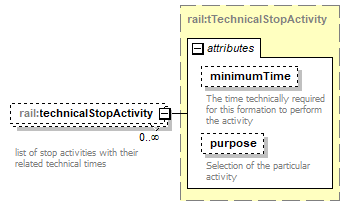 |
||||||||||||||||||||||
| namespace | https://www.railml.org/schemas/2018 | ||||||||||||||||||||||
| type | rail:tTechnicalStopActivity | ||||||||||||||||||||||
| properties |
|
||||||||||||||||||||||
| attributes |
|
||||||||||||||||||||||
| annotation |
|
||||||||||||||||||||||
| source | <xs:element name="technicalStopActivity" type="rail:tTechnicalStopActivity" minOccurs="0" maxOccurs="unbounded"> <xs:annotation> <xs:documentation>list of stop activities with their related technical times</xs:documentation> </xs:annotation> </xs:element> |
complexType eFormations
| diagram |  |
||
| namespace | https://www.railml.org/schemas/2018 | ||
| children | rail:formation | ||
| used by |
|
||
| source | <xs:complexType name="eFormations"> <xs:sequence> <xs:annotation> <xs:documentation>contain formation data</xs:documentation> <xs:documentation source="http://wiki.railml.org/index.php?title=RS:formations"/> </xs:annotation> <xs:element name="formation" type="rail:eFormation" maxOccurs="unbounded"> <xs:annotation> <xs:documentation>data for train composition or vehicle formation</xs:documentation> <xs:documentation source="http://wiki.railml.org/index.php?title=RS:formation"/> </xs:annotation> </xs:element> </xs:sequence> </xs:complexType> |
element eFormations/formation
| diagram |  |
||||||||||||||||||||||||||||||||||||||||||||||||||||||||||||||||||||||||||||||||||||||||||||||||||||||||||||||
| namespace | https://www.railml.org/schemas/2018 | ||||||||||||||||||||||||||||||||||||||||||||||||||||||||||||||||||||||||||||||||||||||||||||||||||||||||||||||
| type | rail:eFormation | ||||||||||||||||||||||||||||||||||||||||||||||||||||||||||||||||||||||||||||||||||||||||||||||||||||||||||||||
| properties |
|
||||||||||||||||||||||||||||||||||||||||||||||||||||||||||||||||||||||||||||||||||||||||||||||||||||||||||||||
| children | rail:additionalName rail:trainOrder rail:categoryRef rail:trainEngine rail:trainBrakes rail:trainBrakeOperation rail:trainResistance rail:speedProfileRef rail:technicalStopActivity | ||||||||||||||||||||||||||||||||||||||||||||||||||||||||||||||||||||||||||||||||||||||||||||||||||||||||||||||
| attributes |
|
||||||||||||||||||||||||||||||||||||||||||||||||||||||||||||||||||||||||||||||||||||||||||||||||||||||||||||||
| annotation |
|
||||||||||||||||||||||||||||||||||||||||||||||||||||||||||||||||||||||||||||||||||||||||||||||||||||||||||||||
| source | <xs:element name="formation" type="rail:eFormation" maxOccurs="unbounded"> <xs:annotation> <xs:documentation>data for train composition or vehicle formation</xs:documentation> <xs:documentation source="http://wiki.railml.org/index.php?title=RS:formation"/> </xs:annotation> </xs:element> |
complexType eFourQuadrantChopper
| diagram | 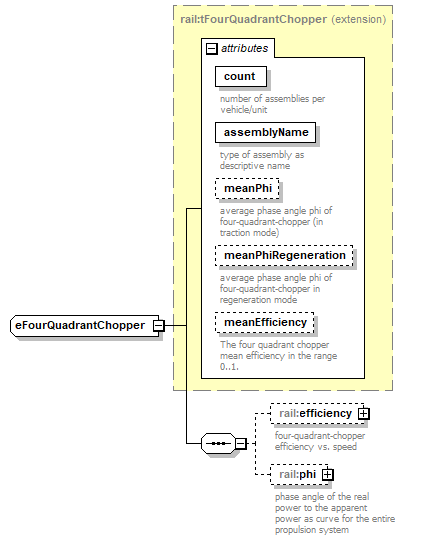 |
||||||||||||||||||||||||||||||||||||||||||||||
| namespace | https://www.railml.org/schemas/2018 | ||||||||||||||||||||||||||||||||||||||||||||||
| type | extension of rail:tFourQuadrantChopper | ||||||||||||||||||||||||||||||||||||||||||||||
| properties |
|
||||||||||||||||||||||||||||||||||||||||||||||
| children | rail:efficiency rail:phi | ||||||||||||||||||||||||||||||||||||||||||||||
| used by |
|
||||||||||||||||||||||||||||||||||||||||||||||
| attributes |
|
||||||||||||||||||||||||||||||||||||||||||||||
| source | <xs:complexType name="eFourQuadrantChopper"> <xs:complexContent> <xs:extension base="rail:tFourQuadrantChopper"> <xs:sequence> <xs:element name="efficiency" type="rail:tEfficiencyCurve" minOccurs="0"> <xs:annotation> <xs:documentation>four-quadrant-chopper efficiency vs. speed</xs:documentation> <xs:documentation source="http://wiki.railml.org/index.php?title=RS:efficiency_fourQuadratChopper"/> </xs:annotation> </xs:element> <xs:element name="phi" type="rail:tCurve" minOccurs="0"> <xs:annotation> <xs:documentation>phase angle of the real power to the apparent power as curve for the entire propulsion system</xs:documentation> <xs:documentation source="http://wiki.railml.org/index.php?title=RS:phi"/> </xs:annotation> </xs:element> </xs:sequence> </xs:extension> </xs:complexContent> </xs:complexType> |
element eFourQuadrantChopper/efficiency
| diagram | 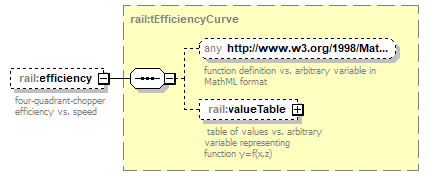 |
||||||
| namespace | https://www.railml.org/schemas/2018 | ||||||
| type | rail:tEfficiencyCurve | ||||||
| properties |
|
||||||
| children | rail:valueTable | ||||||
| annotation |
|
||||||
| source | <xs:element name="efficiency" type="rail:tEfficiencyCurve" minOccurs="0"> <xs:annotation> <xs:documentation>four-quadrant-chopper efficiency vs. speed</xs:documentation> <xs:documentation source="http://wiki.railml.org/index.php?title=RS:efficiency_fourQuadratChopper"/> </xs:annotation> </xs:element> |
element eFourQuadrantChopper/phi
| diagram | 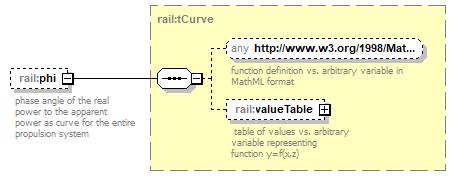 |
||||||
| namespace | https://www.railml.org/schemas/2018 | ||||||
| type | rail:tCurve | ||||||
| properties |
|
||||||
| children | rail:valueTable | ||||||
| annotation |
|
||||||
| source | <xs:element name="phi" type="rail:tCurve" minOccurs="0"> <xs:annotation> <xs:documentation>phase angle of the real power to the apparent power as curve for the entire propulsion system</xs:documentation> <xs:documentation source="http://wiki.railml.org/index.php?title=RS:phi"/> </xs:annotation> </xs:element> |
complexType eGear
| diagram | 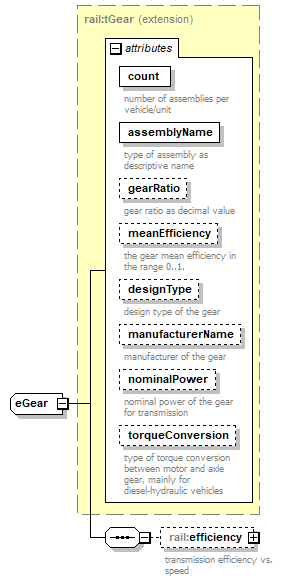 |
||||||||||||||||||||||||||||||||||||||||||||||||||||||||||||||||||||||
| namespace | https://www.railml.org/schemas/2018 | ||||||||||||||||||||||||||||||||||||||||||||||||||||||||||||||||||||||
| type | extension of rail:tGear | ||||||||||||||||||||||||||||||||||||||||||||||||||||||||||||||||||||||
| properties |
|
||||||||||||||||||||||||||||||||||||||||||||||||||||||||||||||||||||||
| children | rail:efficiency | ||||||||||||||||||||||||||||||||||||||||||||||||||||||||||||||||||||||
| used by |
|
||||||||||||||||||||||||||||||||||||||||||||||||||||||||||||||||||||||
| attributes |
|
||||||||||||||||||||||||||||||||||||||||||||||||||||||||||||||||||||||
| source | <xs:complexType name="eGear"> <xs:complexContent> <xs:extension base="rail:tGear"> <xs:sequence> <xs:element name="efficiency" type="rail:tEfficiencyCurve" minOccurs="0"> <xs:annotation> <xs:documentation>transmission efficiency vs. speed</xs:documentation> <xs:documentation source="http://wiki.railml.org/index.php?title=RS:efficiency_gear"/> </xs:annotation> </xs:element> </xs:sequence> </xs:extension> </xs:complexContent> </xs:complexType> |
element eGear/efficiency
| diagram | 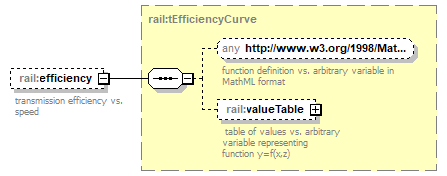 |
||||||
| namespace | https://www.railml.org/schemas/2018 | ||||||
| type | rail:tEfficiencyCurve | ||||||
| properties |
|
||||||
| children | rail:valueTable | ||||||
| annotation |
|
||||||
| source | <xs:element name="efficiency" type="rail:tEfficiencyCurve" minOccurs="0"> <xs:annotation> <xs:documentation>transmission efficiency vs. speed</xs:documentation> <xs:documentation source="http://wiki.railml.org/index.php?title=RS:efficiency_gear"/> </xs:annotation> </xs:element> |
complexType eGoods
| diagram | 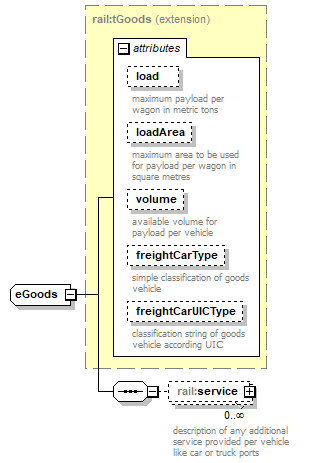 |
||||||||||||||||||||||||||||||||||||||||||||||
| namespace | https://www.railml.org/schemas/2018 | ||||||||||||||||||||||||||||||||||||||||||||||
| type | extension of rail:tGoods | ||||||||||||||||||||||||||||||||||||||||||||||
| properties |
|
||||||||||||||||||||||||||||||||||||||||||||||
| children | rail:service | ||||||||||||||||||||||||||||||||||||||||||||||
| used by |
|
||||||||||||||||||||||||||||||||||||||||||||||
| attributes |
|
||||||||||||||||||||||||||||||||||||||||||||||
| source | <xs:complexType name="eGoods"> <xs:complexContent> <xs:extension base="rail:tGoods"> <xs:sequence> <xs:element name="service" type="rail:tService" minOccurs="0" maxOccurs="unbounded"> <xs:annotation> <xs:documentation>description of any additional service provided per vehicle like car or truck ports</xs:documentation> <xs:documentation source="http://wiki.railml.org/index.php?title=RS:service_goods"/> </xs:annotation> </xs:element> </xs:sequence> </xs:extension> </xs:complexContent> </xs:complexType> |
element eGoods/service
| diagram | 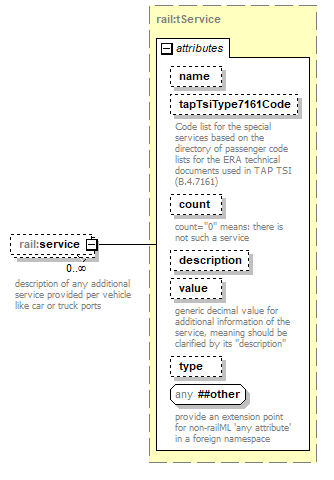 |
||||||||||||||||||||||||||||||||||||||||||||||||||
| namespace | https://www.railml.org/schemas/2018 | ||||||||||||||||||||||||||||||||||||||||||||||||||
| type | rail:tService | ||||||||||||||||||||||||||||||||||||||||||||||||||
| properties |
|
||||||||||||||||||||||||||||||||||||||||||||||||||
| attributes |
|
||||||||||||||||||||||||||||||||||||||||||||||||||
| annotation |
|
||||||||||||||||||||||||||||||||||||||||||||||||||
| source | <xs:element name="service" type="rail:tService" minOccurs="0" maxOccurs="unbounded"> <xs:annotation> <xs:documentation>description of any additional service provided per vehicle like car or truck ports</xs:documentation> <xs:documentation source="http://wiki.railml.org/index.php?title=RS:service_goods"/> </xs:annotation> </xs:element> |
complexType eLoadLimit
| diagram | 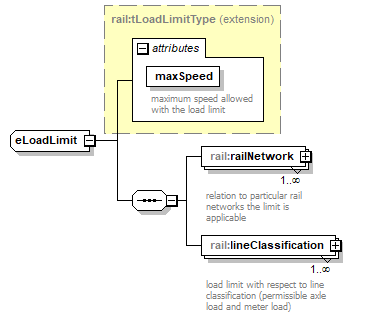 |
||||||||||||||
| namespace | https://www.railml.org/schemas/2018 | ||||||||||||||
| type | extension of rail:tLoadLimitType | ||||||||||||||
| properties |
|
||||||||||||||
| children | rail:railNetwork rail:lineClassification | ||||||||||||||
| used by |
|
||||||||||||||
| attributes |
|
||||||||||||||
| source | <xs:complexType name="eLoadLimit"> <xs:complexContent> <xs:extension base="rail:tLoadLimitType"> <xs:annotation> <xs:documentation source="http://wiki.railml.org/index.php?title=RS:loadLimit"/> </xs:annotation> <xs:sequence> <xs:element name="railNetwork" type="rail:tRailNetwork" maxOccurs="unbounded"> <xs:annotation> <xs:documentation>relation to particular rail networks the limit is applicable</xs:documentation> <xs:documentation source="http://wiki.railml.org/index.php?title=RS:railNetwork"/> </xs:annotation> </xs:element> <xs:element name="lineClassification" type="rail:tLineClassification" maxOccurs="unbounded"> <xs:annotation> <xs:documentation>load limit with respect to line classification (permissible axle load and meter load)</xs:documentation> <xs:documentation source="http://wiki.railml.org/index.php?title=RS:lineClassification"/> </xs:annotation> </xs:element> </xs:sequence> </xs:extension> </xs:complexContent> </xs:complexType> |
element eLoadLimit/railNetwork
| diagram | 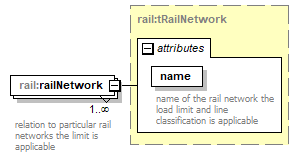 |
||||||||||||||
| namespace | https://www.railml.org/schemas/2018 | ||||||||||||||
| type | rail:tRailNetwork | ||||||||||||||
| properties |
|
||||||||||||||
| attributes |
|
||||||||||||||
| annotation |
|
||||||||||||||
| source | <xs:element name="railNetwork" type="rail:tRailNetwork" maxOccurs="unbounded"> <xs:annotation> <xs:documentation>relation to particular rail networks the limit is applicable</xs:documentation> <xs:documentation source="http://wiki.railml.org/index.php?title=RS:railNetwork"/> </xs:annotation> </xs:element> |
element eLoadLimit/lineClassification
| diagram | 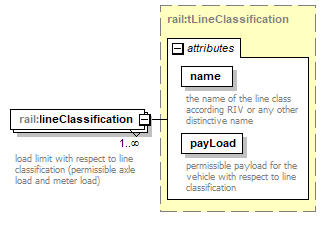 |
||||||||||||||||||||||
| namespace | https://www.railml.org/schemas/2018 | ||||||||||||||||||||||
| type | rail:tLineClassification | ||||||||||||||||||||||
| properties |
|
||||||||||||||||||||||
| attributes |
|
||||||||||||||||||||||
| annotation |
|
||||||||||||||||||||||
| source | <xs:element name="lineClassification" type="rail:tLineClassification" maxOccurs="unbounded"> <xs:annotation> <xs:documentation>load limit with respect to line classification (permissible axle load and meter load)</xs:documentation> <xs:documentation source="http://wiki.railml.org/index.php?title=RS:lineClassification"/> </xs:annotation> </xs:element> |
complexType eLoadLimitMatrix
| diagram | 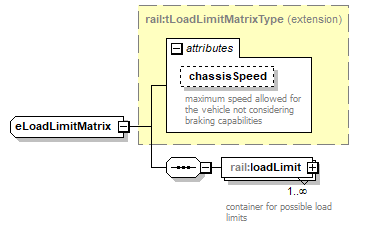 |
||||||||||||||
| namespace | https://www.railml.org/schemas/2018 | ||||||||||||||
| type | extension of rail:tLoadLimitMatrixType | ||||||||||||||
| properties |
|
||||||||||||||
| children | rail:loadLimit | ||||||||||||||
| used by |
|
||||||||||||||
| attributes |
|
||||||||||||||
| source | <xs:complexType name="eLoadLimitMatrix"> <xs:complexContent> <xs:extension base="rail:tLoadLimitMatrixType"> <xs:annotation> <xs:documentation source="http://wiki.railml.org/index.php?title=RS:loadLimitMatrix"/> </xs:annotation> <xs:sequence> <xs:element name="loadLimit" type="rail:eLoadLimit" maxOccurs="unbounded"> <xs:annotation> <xs:documentation>container for possible load limits</xs:documentation> <xs:documentation source="http://wiki.railml.org/index.php?title=RS:loadLimit"/> </xs:annotation> </xs:element> </xs:sequence> </xs:extension> </xs:complexContent> </xs:complexType> |
element eLoadLimitMatrix/loadLimit
| diagram | 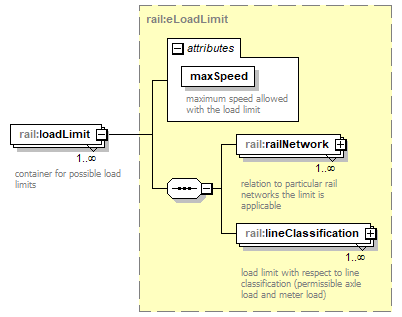 |
||||||||||||||
| namespace | https://www.railml.org/schemas/2018 | ||||||||||||||
| type | rail:eLoadLimit | ||||||||||||||
| properties |
|
||||||||||||||
| children | rail:railNetwork rail:lineClassification | ||||||||||||||
| attributes |
|
||||||||||||||
| annotation |
|
||||||||||||||
| source | <xs:element name="loadLimit" type="rail:eLoadLimit" maxOccurs="unbounded"> <xs:annotation> <xs:documentation>container for possible load limits</xs:documentation> <xs:documentation source="http://wiki.railml.org/index.php?title=RS:loadLimit"/> </xs:annotation> </xs:element> |
complexType eMaintenanceIntervals
| diagram |  |
||
| namespace | https://www.railml.org/schemas/2018 | ||
| children | rail:maintenanceInterval | ||
| used by |
|
||
| source | <xs:complexType name="eMaintenanceIntervals"> <xs:sequence> <xs:element name="maintenanceInterval" type="rail:tMaintenanceInterval" minOccurs="0"/> </xs:sequence> </xs:complexType> |
element eMaintenanceIntervals/maintenanceInterval
| diagram | 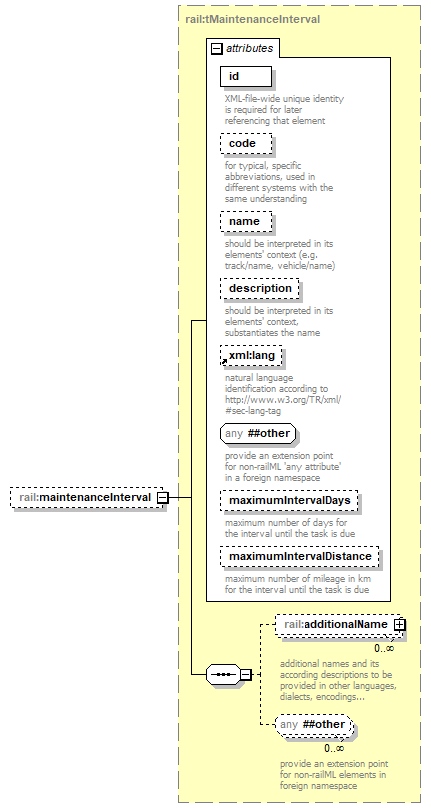 |
||||||||||||||||||||||||||||||||||||||||||||||||||||||||||||||
| namespace | https://www.railml.org/schemas/2018 | ||||||||||||||||||||||||||||||||||||||||||||||||||||||||||||||
| type | rail:tMaintenanceInterval | ||||||||||||||||||||||||||||||||||||||||||||||||||||||||||||||
| properties |
|
||||||||||||||||||||||||||||||||||||||||||||||||||||||||||||||
| children | rail:additionalName | ||||||||||||||||||||||||||||||||||||||||||||||||||||||||||||||
| attributes |
|
||||||||||||||||||||||||||||||||||||||||||||||||||||||||||||||
| source | <xs:element name="maintenanceInterval" type="rail:tMaintenanceInterval" minOccurs="0"/> |
complexType eMechanicalCoupler
| diagram | 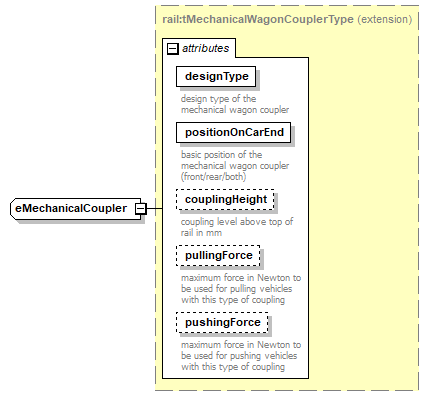 |
||||||||||||||||||||||||||||||||||||||||||||||
| namespace | https://www.railml.org/schemas/2018 | ||||||||||||||||||||||||||||||||||||||||||||||
| type | extension of rail:tMechanicalWagonCouplerType | ||||||||||||||||||||||||||||||||||||||||||||||
| properties |
|
||||||||||||||||||||||||||||||||||||||||||||||
| used by |
|
||||||||||||||||||||||||||||||||||||||||||||||
| attributes |
|
||||||||||||||||||||||||||||||||||||||||||||||
| source | <xs:complexType name="eMechanicalCoupler"> <xs:complexContent> <xs:extension base="rail:tMechanicalWagonCouplerType"> <xs:annotation> <xs:documentation source="http://wiki.railml.org/index.php?title=RS:mechanicalCoupler"/> </xs:annotation> </xs:extension> </xs:complexContent> </xs:complexType> |
complexType eMonitoring
| diagram | 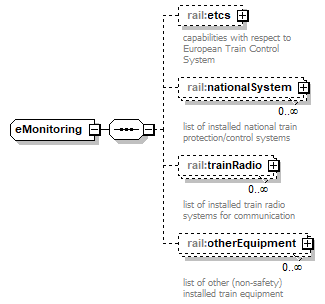 |
||
| namespace | https://www.railml.org/schemas/2018 | ||
| type | extension of rail:tMonitoring | ||
| properties |
|
||
| children | rail:etcs rail:nationalSystem rail:trainRadio rail:otherEquipment | ||
| used by |
|
||
| source | <xs:complexType name="eMonitoring"> <xs:complexContent> <xs:extension base="rail:tMonitoring"> <xs:sequence> <xs:element name="etcs" type="rail:eETCS" minOccurs="0"> <xs:annotation> <xs:documentation>capabilities with respect to European Train Control System</xs:documentation> <xs:documentation source="http://wiki.railml.org/index.php?title=RS:etcs"/> </xs:annotation> </xs:element> <xs:element name="nationalSystem" type="rail:tNationalSystem" minOccurs="0" maxOccurs="unbounded"> <xs:annotation> <xs:documentation>list of installed national train protection/control systems</xs:documentation> <xs:documentation source="http://wiki.railml.org/index.php?title=RS:nationalSystem"/> </xs:annotation> </xs:element> <xs:element name="trainRadio" type="rail:eTrainRadio" minOccurs="0" maxOccurs="unbounded"> <xs:annotation> <xs:documentation>list of installed train radio systems for communication</xs:documentation> <xs:documentation source="http://wiki.railml.org/index.php?title=RS:trainRadio"/> </xs:annotation> </xs:element> <xs:element name="otherEquipment" type="rail:tOtherEquipment" minOccurs="0" maxOccurs="unbounded"> <xs:annotation> <xs:documentation>list of other (non-safety) installed train equipment</xs:documentation> <xs:documentation source="http://wiki.railml.org/index.php?title=RS:otherEquipment"/> </xs:annotation> </xs:element> </xs:sequence> </xs:extension> </xs:complexContent> </xs:complexType> |
element eMonitoring/etcs
| diagram | 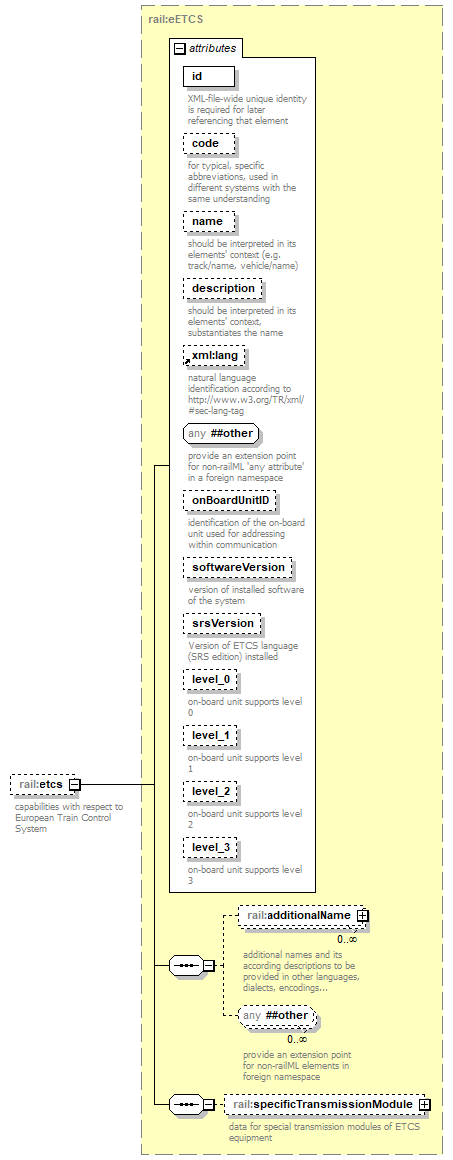 |
||||||||||||||||||||||||||||||||||||||||||||||||||||||||||||||||||||||||||||||||||||||||||||||||||||||
| namespace | https://www.railml.org/schemas/2018 | ||||||||||||||||||||||||||||||||||||||||||||||||||||||||||||||||||||||||||||||||||||||||||||||||||||||
| type | rail:eETCS | ||||||||||||||||||||||||||||||||||||||||||||||||||||||||||||||||||||||||||||||||||||||||||||||||||||||
| properties |
|
||||||||||||||||||||||||||||||||||||||||||||||||||||||||||||||||||||||||||||||||||||||||||||||||||||||
| children | rail:additionalName rail:specificTransmissionModule | ||||||||||||||||||||||||||||||||||||||||||||||||||||||||||||||||||||||||||||||||||||||||||||||||||||||
| attributes |
|
||||||||||||||||||||||||||||||||||||||||||||||||||||||||||||||||||||||||||||||||||||||||||||||||||||||
| annotation |
|
||||||||||||||||||||||||||||||||||||||||||||||||||||||||||||||||||||||||||||||||||||||||||||||||||||||
| source | <xs:element name="etcs" type="rail:eETCS" minOccurs="0"> <xs:annotation> <xs:documentation>capabilities with respect to European Train Control System</xs:documentation> <xs:documentation source="http://wiki.railml.org/index.php?title=RS:etcs"/> </xs:annotation> </xs:element> |
element eMonitoring/nationalSystem
| diagram | 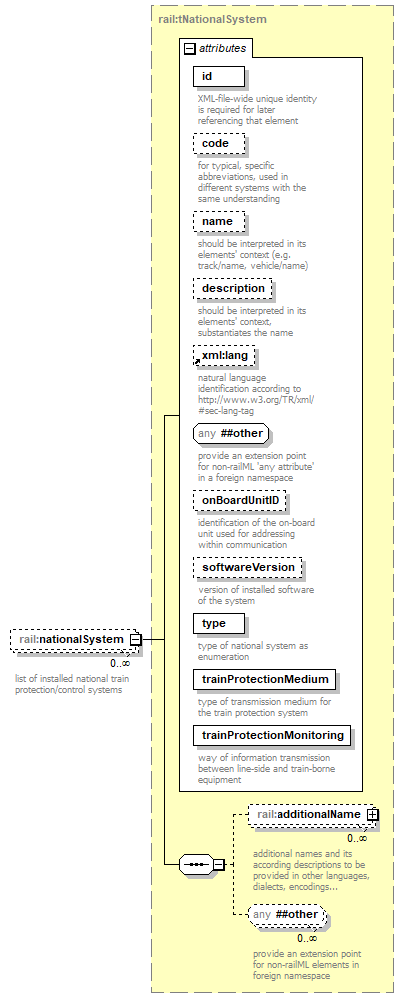 |
||||||||||||||||||||||||||||||||||||||||||||||||||||||||||||||||||||||||||||||||||||||||
| namespace | https://www.railml.org/schemas/2018 | ||||||||||||||||||||||||||||||||||||||||||||||||||||||||||||||||||||||||||||||||||||||||
| type | rail:tNationalSystem | ||||||||||||||||||||||||||||||||||||||||||||||||||||||||||||||||||||||||||||||||||||||||
| properties |
|
||||||||||||||||||||||||||||||||||||||||||||||||||||||||||||||||||||||||||||||||||||||||
| children | rail:additionalName | ||||||||||||||||||||||||||||||||||||||||||||||||||||||||||||||||||||||||||||||||||||||||
| attributes |
|
||||||||||||||||||||||||||||||||||||||||||||||||||||||||||||||||||||||||||||||||||||||||
| annotation |
|
||||||||||||||||||||||||||||||||||||||||||||||||||||||||||||||||||||||||||||||||||||||||
| source | <xs:element name="nationalSystem" type="rail:tNationalSystem" minOccurs="0" maxOccurs="unbounded"> <xs:annotation> <xs:documentation>list of installed national train protection/control systems</xs:documentation> <xs:documentation source="http://wiki.railml.org/index.php?title=RS:nationalSystem"/> </xs:annotation> </xs:element> |
element eMonitoring/trainRadio
| diagram | 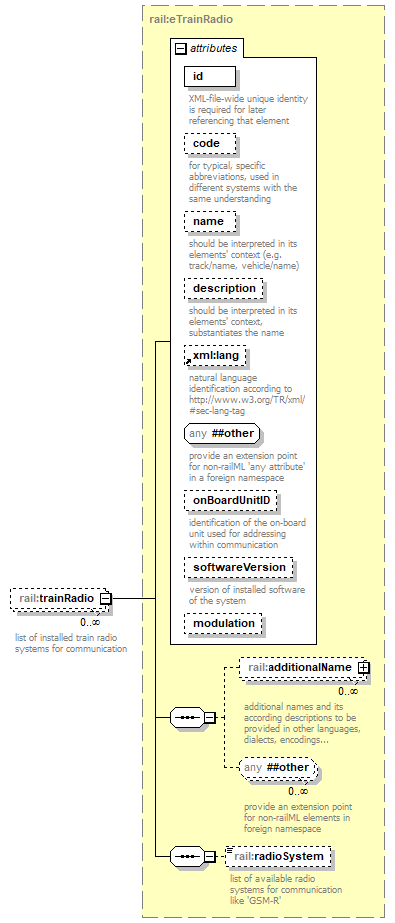 |
||||||||||||||||||||||||||||||||||||||||||||||||||||||||||||||||||||
| namespace | https://www.railml.org/schemas/2018 | ||||||||||||||||||||||||||||||||||||||||||||||||||||||||||||||||||||
| type | rail:eTrainRadio | ||||||||||||||||||||||||||||||||||||||||||||||||||||||||||||||||||||
| properties |
|
||||||||||||||||||||||||||||||||||||||||||||||||||||||||||||||||||||
| children | rail:additionalName rail:radioSystem | ||||||||||||||||||||||||||||||||||||||||||||||||||||||||||||||||||||
| attributes |
|
||||||||||||||||||||||||||||||||||||||||||||||||||||||||||||||||||||
| annotation |
|
||||||||||||||||||||||||||||||||||||||||||||||||||||||||||||||||||||
| source | <xs:element name="trainRadio" type="rail:eTrainRadio" minOccurs="0" maxOccurs="unbounded"> <xs:annotation> <xs:documentation>list of installed train radio systems for communication</xs:documentation> <xs:documentation source="http://wiki.railml.org/index.php?title=RS:trainRadio"/> </xs:annotation> </xs:element> |
element eMonitoring/otherEquipment
| diagram | 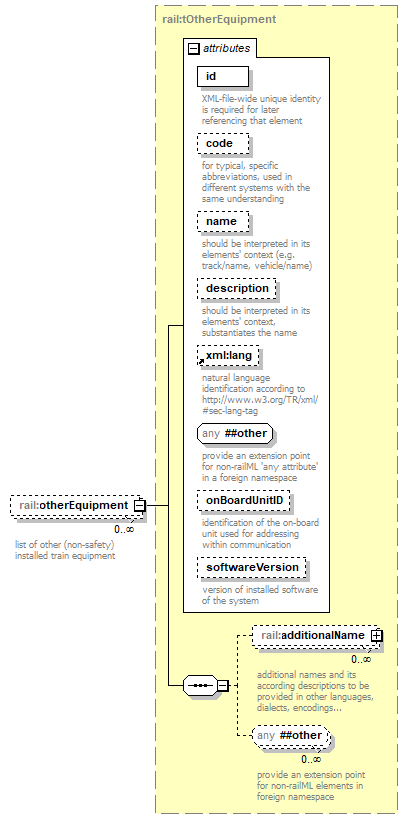 |
||||||||||||||||||||||||||||||||||||||||||||||||||||||||||||||
| namespace | https://www.railml.org/schemas/2018 | ||||||||||||||||||||||||||||||||||||||||||||||||||||||||||||||
| type | rail:tOtherEquipment | ||||||||||||||||||||||||||||||||||||||||||||||||||||||||||||||
| properties |
|
||||||||||||||||||||||||||||||||||||||||||||||||||||||||||||||
| children | rail:additionalName | ||||||||||||||||||||||||||||||||||||||||||||||||||||||||||||||
| attributes |
|
||||||||||||||||||||||||||||||||||||||||||||||||||||||||||||||
| annotation |
|
||||||||||||||||||||||||||||||||||||||||||||||||||||||||||||||
| source | <xs:element name="otherEquipment" type="rail:tOtherEquipment" minOccurs="0" maxOccurs="unbounded"> <xs:annotation> <xs:documentation>list of other (non-safety) installed train equipment</xs:documentation> <xs:documentation source="http://wiki.railml.org/index.php?title=RS:otherEquipment"/> </xs:annotation> </xs:element> |
complexType eOperator
| diagram | 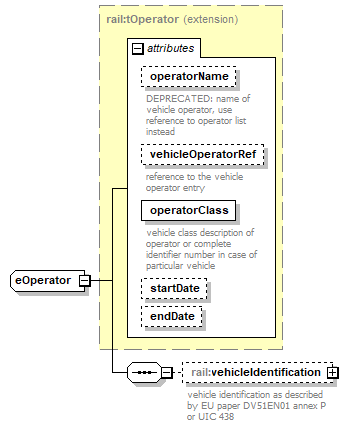 |
||||||||||||||||||||||||||||||||||||||||||
| namespace | https://www.railml.org/schemas/2018 | ||||||||||||||||||||||||||||||||||||||||||
| type | extension of rail:tOperator | ||||||||||||||||||||||||||||||||||||||||||
| properties |
|
||||||||||||||||||||||||||||||||||||||||||
| children | rail:vehicleIdentification | ||||||||||||||||||||||||||||||||||||||||||
| used by |
|
||||||||||||||||||||||||||||||||||||||||||
| attributes |
|
||||||||||||||||||||||||||||||||||||||||||
| source | <xs:complexType name="eOperator"> <xs:complexContent> <xs:extension base="rail:tOperator"> <xs:sequence> <xs:element name="vehicleIdentification" type="rail:tVehicleIdentification" minOccurs="0"> <xs:annotation> <xs:documentation>vehicle identification as described by EU paper DV51EN01 annex P or UIC 438</xs:documentation> <xs:documentation source="http://wiki.railml.org/index.php?title=RS:vehicleIdentification"/> </xs:annotation> </xs:element> </xs:sequence> </xs:extension> </xs:complexContent> </xs:complexType> |
element eOperator/vehicleIdentification
| diagram | 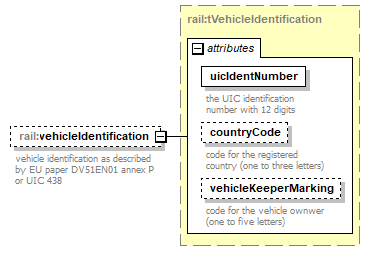 |
||||||||||||||||||||||||||||||
| namespace | https://www.railml.org/schemas/2018 | ||||||||||||||||||||||||||||||
| type | rail:tVehicleIdentification | ||||||||||||||||||||||||||||||
| properties |
|
||||||||||||||||||||||||||||||
| attributes |
|
||||||||||||||||||||||||||||||
| annotation |
|
||||||||||||||||||||||||||||||
| source | <xs:element name="vehicleIdentification" type="rail:tVehicleIdentification" minOccurs="0"> <xs:annotation> <xs:documentation>vehicle identification as described by EU paper DV51EN01 annex P or UIC 438</xs:documentation> <xs:documentation source="http://wiki.railml.org/index.php?title=RS:vehicleIdentification"/> </xs:annotation> </xs:element> |
complexType ePantograph
| diagram | 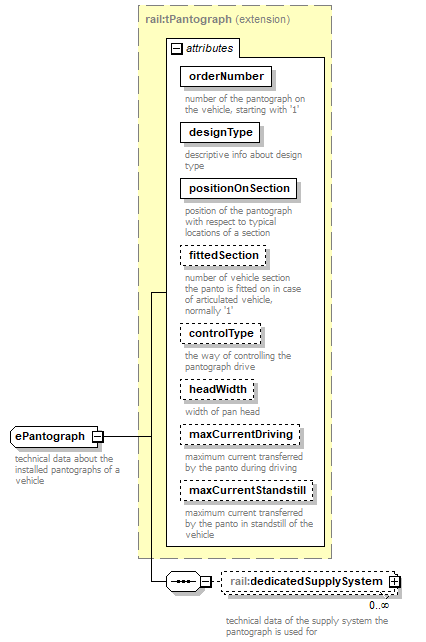 |
||||||||||||||||||||||||||||||||||||||||||||||||||||||||||||||||||||||
| namespace | https://www.railml.org/schemas/2018 | ||||||||||||||||||||||||||||||||||||||||||||||||||||||||||||||||||||||
| type | extension of rail:tPantograph | ||||||||||||||||||||||||||||||||||||||||||||||||||||||||||||||||||||||
| properties |
|
||||||||||||||||||||||||||||||||||||||||||||||||||||||||||||||||||||||
| children | rail:dedicatedSupplySystem | ||||||||||||||||||||||||||||||||||||||||||||||||||||||||||||||||||||||
| used by |
|
||||||||||||||||||||||||||||||||||||||||||||||||||||||||||||||||||||||
| attributes |
|
||||||||||||||||||||||||||||||||||||||||||||||||||||||||||||||||||||||
| annotation |
|
||||||||||||||||||||||||||||||||||||||||||||||||||||||||||||||||||||||
| source | <xs:complexType name="ePantograph"> <xs:annotation> <xs:documentation>technical data about the installed pantographs of a vehicle</xs:documentation> <xs:documentation source="http://wiki.railml.org/index.php?title=RS:pantograph"/> </xs:annotation> <xs:complexContent> <xs:extension base="rail:tPantograph"> <xs:sequence> <xs:element name="dedicatedSupplySystem" type="rail:tElectrificationSystem" minOccurs="0" maxOccurs="unbounded"> <xs:annotation> <xs:documentation>technical data of the supply system the pantograph is used for</xs:documentation> <xs:documentation source="http://wiki.railml.org/index.php?title=RS:dedicatedSupplySystem_pantograph"/> </xs:annotation> </xs:element> </xs:sequence> </xs:extension> </xs:complexContent> </xs:complexType> |
element ePantograph/dedicatedSupplySystem
| diagram | 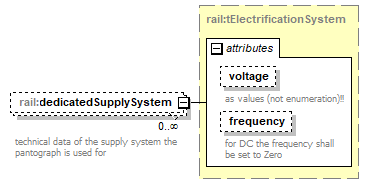 |
||||||||||||||||||||||
| namespace | https://www.railml.org/schemas/2018 | ||||||||||||||||||||||
| type | rail:tElectrificationSystem | ||||||||||||||||||||||
| properties |
|
||||||||||||||||||||||
| attributes |
|
||||||||||||||||||||||
| annotation |
|
||||||||||||||||||||||
| source | <xs:element name="dedicatedSupplySystem" type="rail:tElectrificationSystem" minOccurs="0" maxOccurs="unbounded"> <xs:annotation> <xs:documentation>technical data of the supply system the pantograph is used for</xs:documentation> <xs:documentation source="http://wiki.railml.org/index.php?title=RS:dedicatedSupplySystem_pantograph"/> </xs:annotation> </xs:element> |
complexType ePassenger
| diagram | 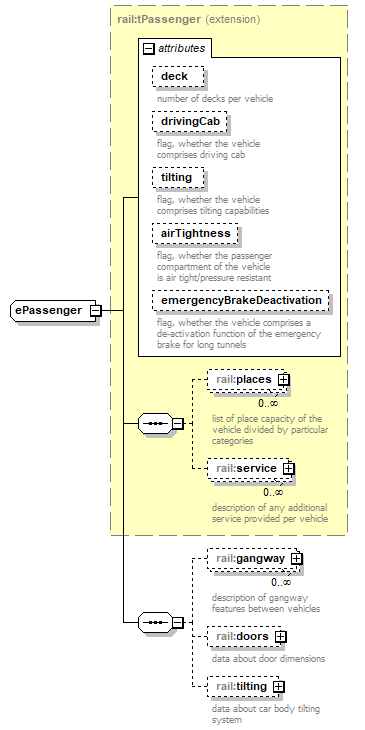 |
||||||||||||||||||||||||||||||||||||||||||||||
| namespace | https://www.railml.org/schemas/2018 | ||||||||||||||||||||||||||||||||||||||||||||||
| type | extension of rail:tPassenger | ||||||||||||||||||||||||||||||||||||||||||||||
| properties |
|
||||||||||||||||||||||||||||||||||||||||||||||
| children | rail:places rail:service rail:gangway rail:doors rail:tilting | ||||||||||||||||||||||||||||||||||||||||||||||
| used by |
|
||||||||||||||||||||||||||||||||||||||||||||||
| attributes |
|
||||||||||||||||||||||||||||||||||||||||||||||
| source | <xs:complexType name="ePassenger"> <xs:complexContent> <xs:extension base="rail:tPassenger"> <xs:sequence> <xs:element name="gangway" type="rail:tGangway" minOccurs="0" maxOccurs="unbounded"> <xs:annotation> <xs:documentation>description of gangway features between vehicles</xs:documentation> <xs:documentation source="http://wiki.railml.org/index.php?title=RS:gangway"/> </xs:annotation> </xs:element> <xs:element name="doors" type="rail:eDoors" minOccurs="0"> <xs:annotation> <xs:documentation>data about door dimensions</xs:documentation> <xs:documentation source="http://wiki.railml.org/index.php?title=RS:doors"/> </xs:annotation> </xs:element> <xs:element name="tilting" type="rail:tTilting" minOccurs="0"> <xs:annotation> <xs:documentation>data about car body tilting system</xs:documentation> <xs:documentation source="http://wiki.railml.org/index.php?title=RS:tilting"/> </xs:annotation> </xs:element> </xs:sequence> </xs:extension> </xs:complexContent> </xs:complexType> |
element ePassenger/gangway
| diagram | 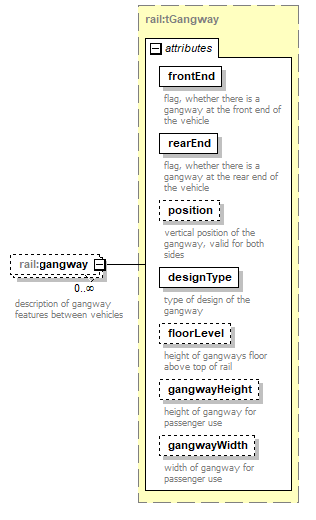 |
||||||||||||||||||||||||||||||||||||||||||||||||||||||||||||||
| namespace | https://www.railml.org/schemas/2018 | ||||||||||||||||||||||||||||||||||||||||||||||||||||||||||||||
| type | rail:tGangway | ||||||||||||||||||||||||||||||||||||||||||||||||||||||||||||||
| properties |
|
||||||||||||||||||||||||||||||||||||||||||||||||||||||||||||||
| attributes |
|
||||||||||||||||||||||||||||||||||||||||||||||||||||||||||||||
| annotation |
|
||||||||||||||||||||||||||||||||||||||||||||||||||||||||||||||
| source | <xs:element name="gangway" type="rail:tGangway" minOccurs="0" maxOccurs="unbounded"> <xs:annotation> <xs:documentation>description of gangway features between vehicles</xs:documentation> <xs:documentation source="http://wiki.railml.org/index.php?title=RS:gangway"/> </xs:annotation> </xs:element> |
element ePassenger/doors
| diagram | 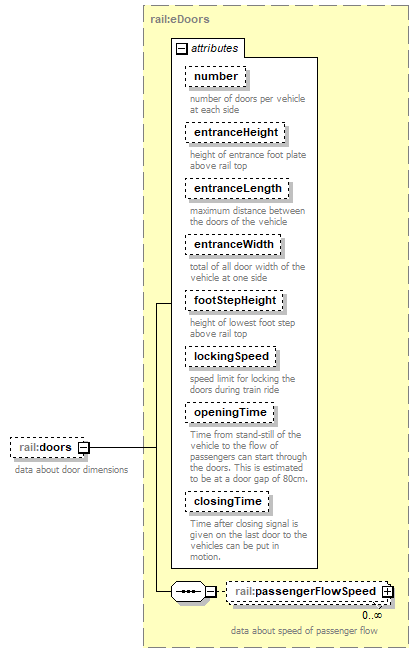 |
||||||||||||||||||||||||||||||||||||||||||||||||||||||||||||||||||||||
| namespace | https://www.railml.org/schemas/2018 | ||||||||||||||||||||||||||||||||||||||||||||||||||||||||||||||||||||||
| type | rail:eDoors | ||||||||||||||||||||||||||||||||||||||||||||||||||||||||||||||||||||||
| properties |
|
||||||||||||||||||||||||||||||||||||||||||||||||||||||||||||||||||||||
| children | rail:passengerFlowSpeed | ||||||||||||||||||||||||||||||||||||||||||||||||||||||||||||||||||||||
| attributes |
|
||||||||||||||||||||||||||||||||||||||||||||||||||||||||||||||||||||||
| annotation |
|
||||||||||||||||||||||||||||||||||||||||||||||||||||||||||||||||||||||
| source | <xs:element name="doors" type="rail:eDoors" minOccurs="0"> <xs:annotation> <xs:documentation>data about door dimensions</xs:documentation> <xs:documentation source="http://wiki.railml.org/index.php?title=RS:doors"/> </xs:annotation> </xs:element> |
element ePassenger/tilting
| diagram | 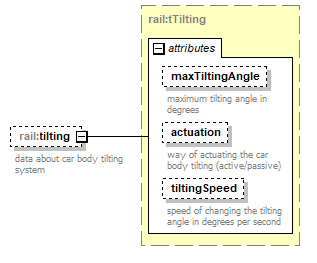 |
||||||||||||||||||||||||||||||
| namespace | https://www.railml.org/schemas/2018 | ||||||||||||||||||||||||||||||
| type | rail:tTilting | ||||||||||||||||||||||||||||||
| properties |
|
||||||||||||||||||||||||||||||
| attributes |
|
||||||||||||||||||||||||||||||
| annotation |
|
||||||||||||||||||||||||||||||
| source | <xs:element name="tilting" type="rail:tTilting" minOccurs="0"> <xs:annotation> <xs:documentation>data about car body tilting system</xs:documentation> <xs:documentation source="http://wiki.railml.org/index.php?title=RS:tilting"/> </xs:annotation> </xs:element> |
complexType ePneumaticCoupler
| diagram | 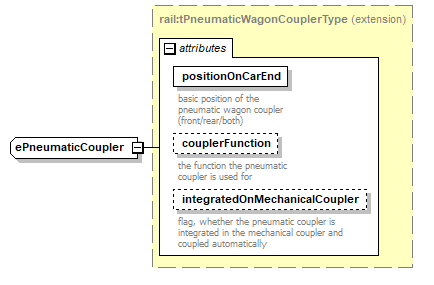 |
||||||||||||||||||||||||||||||
| namespace | https://www.railml.org/schemas/2018 | ||||||||||||||||||||||||||||||
| type | extension of rail:tPneumaticWagonCouplerType | ||||||||||||||||||||||||||||||
| properties |
|
||||||||||||||||||||||||||||||
| used by |
|
||||||||||||||||||||||||||||||
| attributes |
|
||||||||||||||||||||||||||||||
| source | <xs:complexType name="ePneumaticCoupler"> <xs:complexContent> <xs:extension base="rail:tPneumaticWagonCouplerType"> <xs:annotation> <xs:documentation source="http://wiki.railml.org/index.php?title=RS:pneumaticCoupler"/> </xs:annotation> </xs:extension> </xs:complexContent> </xs:complexType> |
complexType ePropulsion
| diagram |  |
||||||||||||||||||||||||||||||||||||||||||||||||||||||||||||||||||||||||||||||||||||||||||||||||||||||||||||||||||||||||||||||||||||||||||||||||||||||||||||||||||||||||||||||||||||||||||||||||||||||||||||||||||||||||||||||||||||||||||||||
| namespace | https://www.railml.org/schemas/2018 | ||||||||||||||||||||||||||||||||||||||||||||||||||||||||||||||||||||||||||||||||||||||||||||||||||||||||||||||||||||||||||||||||||||||||||||||||||||||||||||||||||||||||||||||||||||||||||||||||||||||||||||||||||||||||||||||||||||||||||||||
| type | extension of rail:tPropulsion | ||||||||||||||||||||||||||||||||||||||||||||||||||||||||||||||||||||||||||||||||||||||||||||||||||||||||||||||||||||||||||||||||||||||||||||||||||||||||||||||||||||||||||||||||||||||||||||||||||||||||||||||||||||||||||||||||||||||||||||||
| properties |
|
||||||||||||||||||||||||||||||||||||||||||||||||||||||||||||||||||||||||||||||||||||||||||||||||||||||||||||||||||||||||||||||||||||||||||||||||||||||||||||||||||||||||||||||||||||||||||||||||||||||||||||||||||||||||||||||||||||||||||||||
| children | rail:additionalName rail:transformer rail:fourQuadrantChopper rail:link rail:tractionInverter rail:tractionMotor rail:diesel rail:gear rail:auxiliarySupply rail:tractiveEffort rail:brakeEffort rail:tractiveCurrent rail:brakeCurrent rail:tractiveCurrentLimitation rail:brakeCurrentLimitation rail:tractiveVehicleEfficiency rail:brakeVehicleEfficiency rail:rackTraction | ||||||||||||||||||||||||||||||||||||||||||||||||||||||||||||||||||||||||||||||||||||||||||||||||||||||||||||||||||||||||||||||||||||||||||||||||||||||||||||||||||||||||||||||||||||||||||||||||||||||||||||||||||||||||||||||||||||||||||||||
| used by |
|
||||||||||||||||||||||||||||||||||||||||||||||||||||||||||||||||||||||||||||||||||||||||||||||||||||||||||||||||||||||||||||||||||||||||||||||||||||||||||||||||||||||||||||||||||||||||||||||||||||||||||||||||||||||||||||||||||||||||||||||
| attributes |
|
||||||||||||||||||||||||||||||||||||||||||||||||||||||||||||||||||||||||||||||||||||||||||||||||||||||||||||||||||||||||||||||||||||||||||||||||||||||||||||||||||||||||||||||||||||||||||||||||||||||||||||||||||||||||||||||||||||||||||||||
| annotation |
|
||||||||||||||||||||||||||||||||||||||||||||||||||||||||||||||||||||||||||||||||||||||||||||||||||||||||||||||||||||||||||||||||||||||||||||||||||||||||||||||||||||||||||||||||||||||||||||||||||||||||||||||||||||||||||||||||||||||||||||||
| source | <xs:complexType name="ePropulsion"> <xs:annotation> <xs:documentation>technical data about the propulsion system of a vehicle</xs:documentation> <xs:documentation source="http://wiki.railml.org/index.php?title=RS:propulsion"/> </xs:annotation> <xs:complexContent> <xs:extension base="rail:tPropulsion"> <xs:sequence> <xs:element name="transformer" type="rail:eTransformer" minOccurs="0"> <xs:annotation> <xs:documentation>technical data of main transformer</xs:documentation> <xs:documentation source="http://wiki.railml.org/index.php?title=RS:transformer"/> </xs:annotation> </xs:element> <xs:element name="fourQuadrantChopper" type="rail:eFourQuadrantChopper" minOccurs="0"> <xs:annotation> <xs:documentation>technical data of inverter between OHL/transformer and link circuit</xs:documentation> <xs:documentation source="http://wiki.railml.org/index.php?title=RS:fourQuadrantChopper"/> </xs:annotation> </xs:element> <xs:element name="link" type="rail:tLink" minOccurs="0"> <xs:annotation> <xs:documentation>nominal values of link circuit between input inverter and motor inverter</xs:documentation> <xs:documentation source="http://wiki.railml.org/index.php?title=RS:link"/> </xs:annotation> </xs:element> <xs:element name="tractionInverter" type="rail:eTractionInverter" minOccurs="0"> <xs:annotation> <xs:documentation>technical data of inverter between link circuit and motors</xs:documentation> <xs:documentation source="http://wiki.railml.org/index.php?title=RS:tractionInverter"/> </xs:annotation> </xs:element> <xs:element name="tractionMotor" type="rail:eTractionMotor" minOccurs="0"> <xs:annotation> <xs:documentation>technical data of traction motor</xs:documentation> <xs:documentation source="http://wiki.railml.org/index.php?title=RS:tractionMotor"/> </xs:annotation> </xs:element> <xs:element name="diesel" type="rail:tDieselEngine" minOccurs="0"> <xs:annotation> <xs:documentation>technical data of diesel engine</xs:documentation> <xs:documentation source="http://wiki.railml.org/index.php?title=RS:diesel"/> </xs:annotation> </xs:element> <xs:element name="gear" type="rail:eGear" minOccurs="0"> <xs:annotation> <xs:documentation>technical data of transmission system between motor and wheel</xs:documentation> <xs:documentation source="http://wiki.railml.org/index.php?title=RS:gear"/> </xs:annotation> </xs:element> <xs:element name="auxiliarySupply" type="rail:eAuxiliarySupply" minOccurs="0" maxOccurs="unbounded"> <xs:annotation> <xs:documentation>technical data of auxiliary systems (supply and consumption)</xs:documentation> <xs:documentation source="http://wiki.railml.org/index.php?title=RS:auxiliarySupply"/> </xs:annotation> </xs:element> <xs:element name="tractiveEffort" type="rail:tEffortCurve" minOccurs="0"> <xs:annotation> <xs:documentation>mechanical tractive effort at wheel vs. speed by propulsion system</xs:documentation> <xs:documentation source="http://wiki.railml.org/index.php?title=RS:tractiveEffort"/> </xs:annotation> </xs:element> <xs:element name="brakeEffort" type="rail:tEffortCurve" minOccurs="0"> <xs:annotation> <xs:documentation>mechanical brake effort at wheel vs. speed by propulsion system</xs:documentation> <xs:documentation source="http://wiki.railml.org/index.php?title=RS:brakeEffort"/> </xs:annotation> </xs:element> <xs:element name="tractiveCurrent" type="rail:tCurrentCurve" minOccurs="0"> <xs:annotation> <xs:documentation>net current of the entire propulsion system as curve vs. speed for traction mode</xs:documentation> <xs:documentation source="http://wiki.railml.org/index.php?title=RS:tractiveCurrent"/> </xs:annotation> </xs:element> <xs:element name="brakeCurrent" type="rail:tCurrentCurve" minOccurs="0"> <xs:annotation> <xs:documentation>net current of the entire propulsion system as curve vs. speed for braking mode</xs:documentation> <xs:documentation source="http://wiki.railml.org/index.php?title=RS:brakeCurrent"/> </xs:annotation> </xs:element> <xs:element name="tractiveCurrentLimitation" type="rail:tCurrentLimitation" minOccurs="0"> <xs:annotation> <xs:documentation>limitation curve of net current of the entire propulsion system vs. net voltage for traction mode</xs:documentation> <xs:documentation source="http://wiki.railml.org/index.php?title=RS:tractiveCurrentLimitation"/> </xs:annotation> </xs:element> <xs:element name="brakeCurrentLimitation" type="rail:tCurrentLimitation" minOccurs="0"> <xs:annotation> <xs:documentation>limitation curve of net current of the entire propulsion system vs. net voltage for braking mode</xs:documentation> <xs:documentation source="http://wiki.railml.org/index.php?title=RS:brakeCurrentLimitation"/> </xs:annotation> </xs:element> <xs:element name="tractiveVehicleEfficiency" type="rail:tEfficiencyCurve" minOccurs="0"> <xs:annotation> <xs:documentation>efficiency of the entire propulsion system as curve vs. speed or effort for traction mode</xs:documentation> <xs:documentation source="http://wiki.railml.org/index.php?title=RS:tractiveVehicleEfficiency"/> </xs:annotation> </xs:element> <xs:element name="brakeVehicleEfficiency" type="rail:tEfficiencyCurve" minOccurs="0"> <xs:annotation> <xs:documentation>efficiency of the entire propulsion system as curve vs. speed or effort for braking mode</xs:documentation> <xs:documentation source="http://wiki.railml.org/index.php?title=RS:brakeVehicleEfficiency"/> </xs:annotation> </xs:element> <xs:element name="rackTraction" type="rail:tRackTractionType" minOccurs="0"> <xs:annotation> <xs:documentation>data about rack traction equipment of the vehicle used for propulsion</xs:documentation> <xs:documentation source="http://wiki.railml.org/index.php?title=RS:rackTraction_propulsion"/> </xs:annotation> </xs:element> </xs:sequence> </xs:extension> </xs:complexContent> </xs:complexType> |
element ePropulsion/transformer
| diagram | 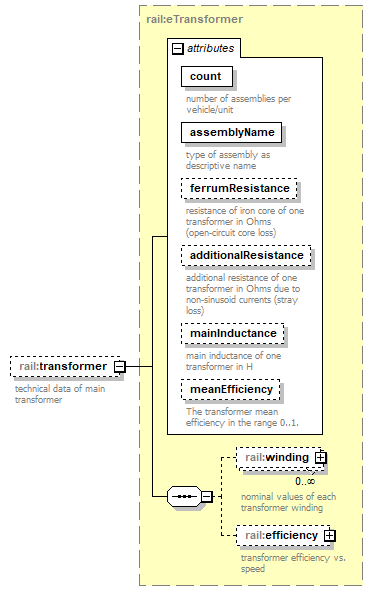 |
||||||||||||||||||||||||||||||||||||||||||||||||||||||
| namespace | https://www.railml.org/schemas/2018 | ||||||||||||||||||||||||||||||||||||||||||||||||||||||
| type | rail:eTransformer | ||||||||||||||||||||||||||||||||||||||||||||||||||||||
| properties |
|
||||||||||||||||||||||||||||||||||||||||||||||||||||||
| children | rail:winding rail:efficiency | ||||||||||||||||||||||||||||||||||||||||||||||||||||||
| attributes |
|
||||||||||||||||||||||||||||||||||||||||||||||||||||||
| annotation |
|
||||||||||||||||||||||||||||||||||||||||||||||||||||||
| source | <xs:element name="transformer" type="rail:eTransformer" minOccurs="0"> <xs:annotation> <xs:documentation>technical data of main transformer</xs:documentation> <xs:documentation source="http://wiki.railml.org/index.php?title=RS:transformer"/> </xs:annotation> </xs:element> |
element ePropulsion/fourQuadrantChopper
| diagram | 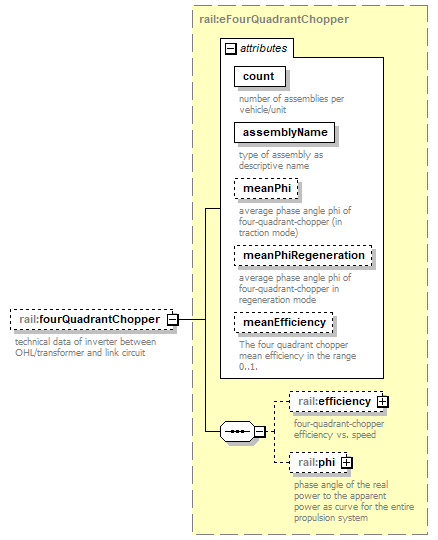 |
||||||||||||||||||||||||||||||||||||||||||||||
| namespace | https://www.railml.org/schemas/2018 | ||||||||||||||||||||||||||||||||||||||||||||||
| type | rail:eFourQuadrantChopper | ||||||||||||||||||||||||||||||||||||||||||||||
| properties |
|
||||||||||||||||||||||||||||||||||||||||||||||
| children | rail:efficiency rail:phi | ||||||||||||||||||||||||||||||||||||||||||||||
| attributes |
|
||||||||||||||||||||||||||||||||||||||||||||||
| annotation |
|
||||||||||||||||||||||||||||||||||||||||||||||
| source | <xs:element name="fourQuadrantChopper" type="rail:eFourQuadrantChopper" minOccurs="0"> <xs:annotation> <xs:documentation>technical data of inverter between OHL/transformer and link circuit</xs:documentation> <xs:documentation source="http://wiki.railml.org/index.php?title=RS:fourQuadrantChopper"/> </xs:annotation> </xs:element> |
element ePropulsion/link
| diagram | 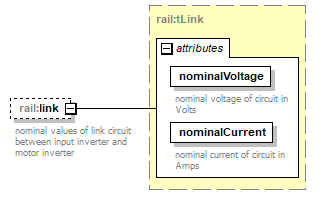 |
||||||||||||||||||||||
| namespace | https://www.railml.org/schemas/2018 | ||||||||||||||||||||||
| type | rail:tLink | ||||||||||||||||||||||
| properties |
|
||||||||||||||||||||||
| attributes |
|
||||||||||||||||||||||
| annotation |
|
||||||||||||||||||||||
| source | <xs:element name="link" type="rail:tLink" minOccurs="0"> <xs:annotation> <xs:documentation>nominal values of link circuit between input inverter and motor inverter</xs:documentation> <xs:documentation source="http://wiki.railml.org/index.php?title=RS:link"/> </xs:annotation> </xs:element> |
element ePropulsion/tractionInverter
| diagram | 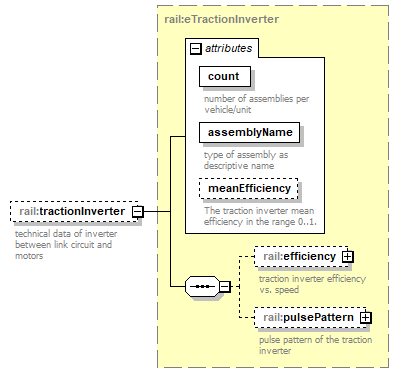 |
||||||||||||||||||||||||||||||
| namespace | https://www.railml.org/schemas/2018 | ||||||||||||||||||||||||||||||
| type | rail:eTractionInverter | ||||||||||||||||||||||||||||||
| properties |
|
||||||||||||||||||||||||||||||
| children | rail:efficiency rail:pulsePattern | ||||||||||||||||||||||||||||||
| attributes |
|
||||||||||||||||||||||||||||||
| annotation |
|
||||||||||||||||||||||||||||||
| source | <xs:element name="tractionInverter" type="rail:eTractionInverter" minOccurs="0"> <xs:annotation> <xs:documentation>technical data of inverter between link circuit and motors</xs:documentation> <xs:documentation source="http://wiki.railml.org/index.php?title=RS:tractionInverter"/> </xs:annotation> </xs:element> |
element ePropulsion/tractionMotor
| diagram |  |
||||||||||||||||||||||||||||||||||||||||||||||||||||||||||||||||||||||||||||||||||||||||||||||||||||||||||||||||||||||||||||||||||||||||||||||||||||||
| namespace | https://www.railml.org/schemas/2018 | ||||||||||||||||||||||||||||||||||||||||||||||||||||||||||||||||||||||||||||||||||||||||||||||||||||||||||||||||||||||||||||||||||||||||||||||||||||||
| type | rail:eTractionMotor | ||||||||||||||||||||||||||||||||||||||||||||||||||||||||||||||||||||||||||||||||||||||||||||||||||||||||||||||||||||||||||||||||||||||||||||||||||||||
| properties |
|
||||||||||||||||||||||||||||||||||||||||||||||||||||||||||||||||||||||||||||||||||||||||||||||||||||||||||||||||||||||||||||||||||||||||||||||||||||||
| children | rail:efficiency rail:mechanicalLosses | ||||||||||||||||||||||||||||||||||||||||||||||||||||||||||||||||||||||||||||||||||||||||||||||||||||||||||||||||||||||||||||||||||||||||||||||||||||||
| attributes |
|
||||||||||||||||||||||||||||||||||||||||||||||||||||||||||||||||||||||||||||||||||||||||||||||||||||||||||||||||||||||||||||||||||||||||||||||||||||||
| annotation |
|
||||||||||||||||||||||||||||||||||||||||||||||||||||||||||||||||||||||||||||||||||||||||||||||||||||||||||||||||||||||||||||||||||||||||||||||||||||||
| source | <xs:element name="tractionMotor" type="rail:eTractionMotor" minOccurs="0"> <xs:annotation> <xs:documentation>technical data of traction motor</xs:documentation> <xs:documentation source="http://wiki.railml.org/index.php?title=RS:tractionMotor"/> </xs:annotation> </xs:element> |
element ePropulsion/diesel
| diagram | 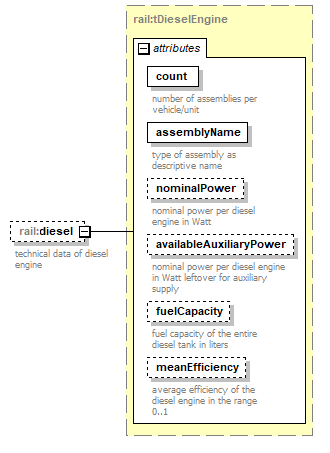 |
||||||||||||||||||||||||||||||||||||||||||||||||||||||
| namespace | https://www.railml.org/schemas/2018 | ||||||||||||||||||||||||||||||||||||||||||||||||||||||
| type | rail:tDieselEngine | ||||||||||||||||||||||||||||||||||||||||||||||||||||||
| properties |
|
||||||||||||||||||||||||||||||||||||||||||||||||||||||
| attributes |
|
||||||||||||||||||||||||||||||||||||||||||||||||||||||
| annotation |
|
||||||||||||||||||||||||||||||||||||||||||||||||||||||
| source | <xs:element name="diesel" type="rail:tDieselEngine" minOccurs="0"> <xs:annotation> <xs:documentation>technical data of diesel engine</xs:documentation> <xs:documentation source="http://wiki.railml.org/index.php?title=RS:diesel"/> </xs:annotation> </xs:element> |
element ePropulsion/gear
| diagram | 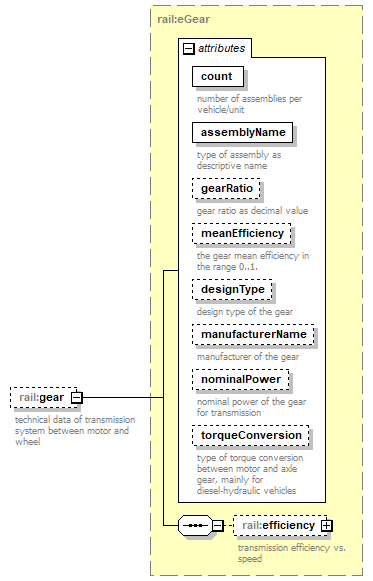 |
||||||||||||||||||||||||||||||||||||||||||||||||||||||||||||||||||||||
| namespace | https://www.railml.org/schemas/2018 | ||||||||||||||||||||||||||||||||||||||||||||||||||||||||||||||||||||||
| type | rail:eGear | ||||||||||||||||||||||||||||||||||||||||||||||||||||||||||||||||||||||
| properties |
|
||||||||||||||||||||||||||||||||||||||||||||||||||||||||||||||||||||||
| children | rail:efficiency | ||||||||||||||||||||||||||||||||||||||||||||||||||||||||||||||||||||||
| attributes |
|
||||||||||||||||||||||||||||||||||||||||||||||||||||||||||||||||||||||
| annotation |
|
||||||||||||||||||||||||||||||||||||||||||||||||||||||||||||||||||||||
| source | <xs:element name="gear" type="rail:eGear" minOccurs="0"> <xs:annotation> <xs:documentation>technical data of transmission system between motor and wheel</xs:documentation> <xs:documentation source="http://wiki.railml.org/index.php?title=RS:gear"/> </xs:annotation> </xs:element> |
element ePropulsion/auxiliarySupply
| diagram | 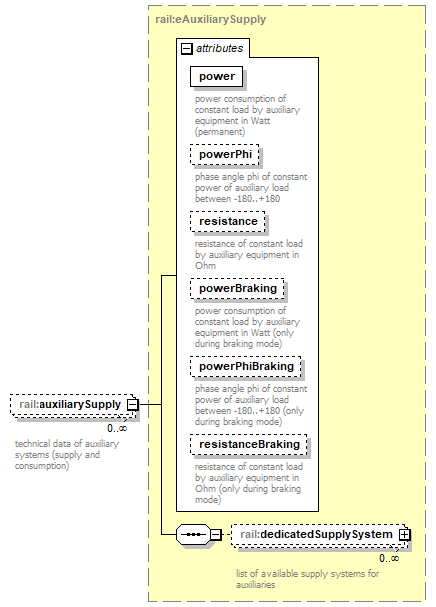 |
||||||||||||||||||||||||||||||||||||||||||||||||||||||
| namespace | https://www.railml.org/schemas/2018 | ||||||||||||||||||||||||||||||||||||||||||||||||||||||
| type | rail:eAuxiliarySupply | ||||||||||||||||||||||||||||||||||||||||||||||||||||||
| properties |
|
||||||||||||||||||||||||||||||||||||||||||||||||||||||
| children | rail:dedicatedSupplySystem | ||||||||||||||||||||||||||||||||||||||||||||||||||||||
| attributes |
|
||||||||||||||||||||||||||||||||||||||||||||||||||||||
| annotation |
|
||||||||||||||||||||||||||||||||||||||||||||||||||||||
| source | <xs:element name="auxiliarySupply" type="rail:eAuxiliarySupply" minOccurs="0" maxOccurs="unbounded"> <xs:annotation> <xs:documentation>technical data of auxiliary systems (supply and consumption)</xs:documentation> <xs:documentation source="http://wiki.railml.org/index.php?title=RS:auxiliarySupply"/> </xs:annotation> </xs:element> |
element ePropulsion/tractiveEffort
| diagram | 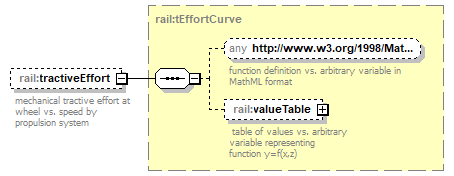 |
||||||
| namespace | https://www.railml.org/schemas/2018 | ||||||
| type | rail:tEffortCurve | ||||||
| properties |
|
||||||
| children | rail:valueTable | ||||||
| annotation |
|
||||||
| source | <xs:element name="tractiveEffort" type="rail:tEffortCurve" minOccurs="0"> <xs:annotation> <xs:documentation>mechanical tractive effort at wheel vs. speed by propulsion system</xs:documentation> <xs:documentation source="http://wiki.railml.org/index.php?title=RS:tractiveEffort"/> </xs:annotation> </xs:element> |
element ePropulsion/brakeEffort
| diagram | 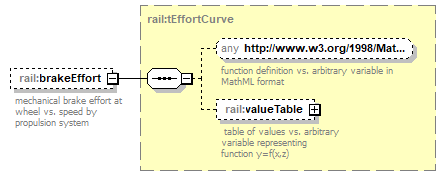 |
||||||
| namespace | https://www.railml.org/schemas/2018 | ||||||
| type | rail:tEffortCurve | ||||||
| properties |
|
||||||
| children | rail:valueTable | ||||||
| annotation |
|
||||||
| source | <xs:element name="brakeEffort" type="rail:tEffortCurve" minOccurs="0"> <xs:annotation> <xs:documentation>mechanical brake effort at wheel vs. speed by propulsion system</xs:documentation> <xs:documentation source="http://wiki.railml.org/index.php?title=RS:brakeEffort"/> </xs:annotation> </xs:element> |
element ePropulsion/tractiveCurrent
| diagram | 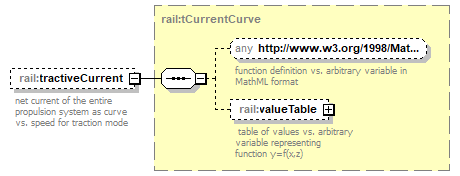 |
||||||
| namespace | https://www.railml.org/schemas/2018 | ||||||
| type | rail:tCurrentCurve | ||||||
| properties |
|
||||||
| children | rail:valueTable | ||||||
| annotation |
|
||||||
| source | <xs:element name="tractiveCurrent" type="rail:tCurrentCurve" minOccurs="0"> <xs:annotation> <xs:documentation>net current of the entire propulsion system as curve vs. speed for traction mode</xs:documentation> <xs:documentation source="http://wiki.railml.org/index.php?title=RS:tractiveCurrent"/> </xs:annotation> </xs:element> |
element ePropulsion/brakeCurrent
| diagram | 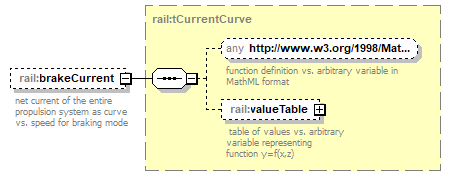 |
||||||
| namespace | https://www.railml.org/schemas/2018 | ||||||
| type | rail:tCurrentCurve | ||||||
| properties |
|
||||||
| children | rail:valueTable | ||||||
| annotation |
|
||||||
| source | <xs:element name="brakeCurrent" type="rail:tCurrentCurve" minOccurs="0"> <xs:annotation> <xs:documentation>net current of the entire propulsion system as curve vs. speed for braking mode</xs:documentation> <xs:documentation source="http://wiki.railml.org/index.php?title=RS:brakeCurrent"/> </xs:annotation> </xs:element> |
element ePropulsion/tractiveCurrentLimitation
| diagram | 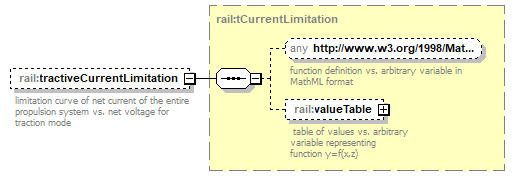 |
||||||
| namespace | https://www.railml.org/schemas/2018 | ||||||
| type | rail:tCurrentLimitation | ||||||
| properties |
|
||||||
| children | rail:valueTable | ||||||
| annotation |
|
||||||
| source | <xs:element name="tractiveCurrentLimitation" type="rail:tCurrentLimitation" minOccurs="0"> <xs:annotation> <xs:documentation>limitation curve of net current of the entire propulsion system vs. net voltage for traction mode</xs:documentation> <xs:documentation source="http://wiki.railml.org/index.php?title=RS:tractiveCurrentLimitation"/> </xs:annotation> </xs:element> |
element ePropulsion/brakeCurrentLimitation
| diagram | 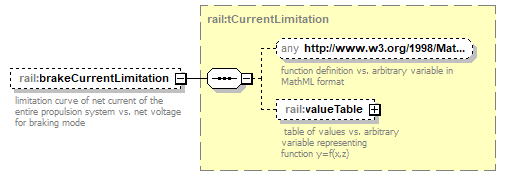 |
||||||
| namespace | https://www.railml.org/schemas/2018 | ||||||
| type | rail:tCurrentLimitation | ||||||
| properties |
|
||||||
| children | rail:valueTable | ||||||
| annotation |
|
||||||
| source | <xs:element name="brakeCurrentLimitation" type="rail:tCurrentLimitation" minOccurs="0"> <xs:annotation> <xs:documentation>limitation curve of net current of the entire propulsion system vs. net voltage for braking mode</xs:documentation> <xs:documentation source="http://wiki.railml.org/index.php?title=RS:brakeCurrentLimitation"/> </xs:annotation> </xs:element> |
element ePropulsion/tractiveVehicleEfficiency
| diagram | 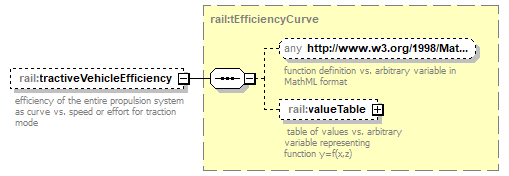 |
||||||
| namespace | https://www.railml.org/schemas/2018 | ||||||
| type | rail:tEfficiencyCurve | ||||||
| properties |
|
||||||
| children | rail:valueTable | ||||||
| annotation |
|
||||||
| source | <xs:element name="tractiveVehicleEfficiency" type="rail:tEfficiencyCurve" minOccurs="0"> <xs:annotation> <xs:documentation>efficiency of the entire propulsion system as curve vs. speed or effort for traction mode</xs:documentation> <xs:documentation source="http://wiki.railml.org/index.php?title=RS:tractiveVehicleEfficiency"/> </xs:annotation> </xs:element> |
element ePropulsion/brakeVehicleEfficiency
| diagram | 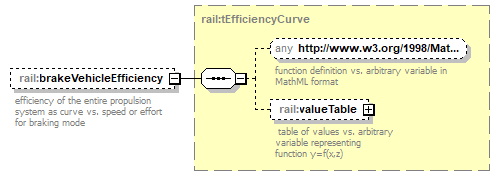 |
||||||
| namespace | https://www.railml.org/schemas/2018 | ||||||
| type | rail:tEfficiencyCurve | ||||||
| properties |
|
||||||
| children | rail:valueTable | ||||||
| annotation |
|
||||||
| source | <xs:element name="brakeVehicleEfficiency" type="rail:tEfficiencyCurve" minOccurs="0"> <xs:annotation> <xs:documentation>efficiency of the entire propulsion system as curve vs. speed or effort for braking mode</xs:documentation> <xs:documentation source="http://wiki.railml.org/index.php?title=RS:brakeVehicleEfficiency"/> </xs:annotation> </xs:element> |
element ePropulsion/rackTraction
| diagram | 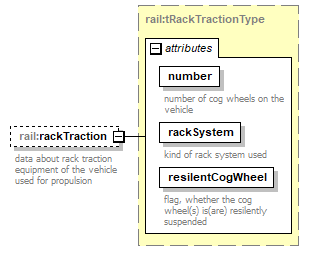 |
||||||||||||||||||||||||||||||
| namespace | https://www.railml.org/schemas/2018 | ||||||||||||||||||||||||||||||
| type | rail:tRackTractionType | ||||||||||||||||||||||||||||||
| properties |
|
||||||||||||||||||||||||||||||
| attributes |
|
||||||||||||||||||||||||||||||
| annotation |
|
||||||||||||||||||||||||||||||
| source | <xs:element name="rackTraction" type="rail:tRackTractionType" minOccurs="0"> <xs:annotation> <xs:documentation>data about rack traction equipment of the vehicle used for propulsion</xs:documentation> <xs:documentation source="http://wiki.railml.org/index.php?title=RS:rackTraction_propulsion"/> </xs:annotation> </xs:element> |
complexType ePulsePattern
| diagram |  |
||
| namespace | https://www.railml.org/schemas/2018 | ||
| children | rail:valueTable | ||
| used by |
|
||
| source | <xs:complexType name="ePulsePattern"> <xs:sequence> <xs:element name="valueTable"> <xs:annotation> <xs:documentation>table of values vs. arbitrary variable</xs:documentation> <xs:documentation source="http://wiki.railml.org/index.php?title=RS:valueTable_pulsePattern"/> </xs:annotation> <xs:complexType> <xs:complexContent> <xs:extension base="rail:tValueTable"/> </xs:complexContent> </xs:complexType> </xs:element> </xs:sequence> </xs:complexType> |
element ePulsePattern/valueTable
| diagram | 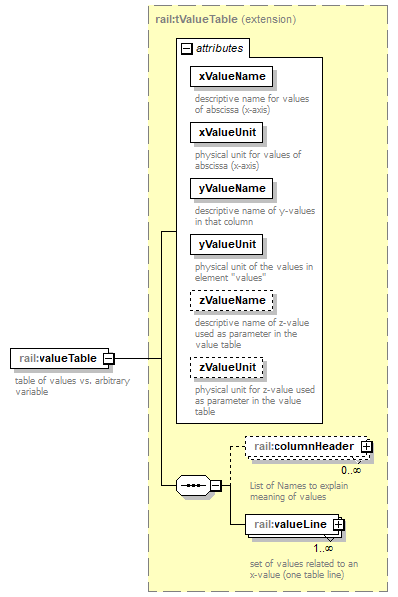 |
||||||||||||||||||||||||||||||||||||||||||||||||||||||
| namespace | https://www.railml.org/schemas/2018 | ||||||||||||||||||||||||||||||||||||||||||||||||||||||
| type | extension of rail:tValueTable | ||||||||||||||||||||||||||||||||||||||||||||||||||||||
| properties |
|
||||||||||||||||||||||||||||||||||||||||||||||||||||||
| children | rail:columnHeader rail:valueLine | ||||||||||||||||||||||||||||||||||||||||||||||||||||||
| attributes |
|
||||||||||||||||||||||||||||||||||||||||||||||||||||||
| annotation |
|
||||||||||||||||||||||||||||||||||||||||||||||||||||||
| source | <xs:element name="valueTable"> <xs:annotation> <xs:documentation>table of values vs. arbitrary variable</xs:documentation> <xs:documentation source="http://wiki.railml.org/index.php?title=RS:valueTable_pulsePattern"/> </xs:annotation> <xs:complexType> <xs:complexContent> <xs:extension base="rail:tValueTable"/> </xs:complexContent> </xs:complexType> </xs:element> |
complexType eStorage
| diagram |  |
||||||||||||||||||||||||||||||||||||||||||||||||||||||||||||||||||||||||||||||||||||||||||||||||||||||||||||||
| namespace | https://www.railml.org/schemas/2018 | ||||||||||||||||||||||||||||||||||||||||||||||||||||||||||||||||||||||||||||||||||||||||||||||||||||||||||||||
| type | extension of rail:tStorage | ||||||||||||||||||||||||||||||||||||||||||||||||||||||||||||||||||||||||||||||||||||||||||||||||||||||||||||||
| properties |
|
||||||||||||||||||||||||||||||||||||||||||||||||||||||||||||||||||||||||||||||||||||||||||||||||||||||||||||||
| children | rail:additionalName rail:efficiency | ||||||||||||||||||||||||||||||||||||||||||||||||||||||||||||||||||||||||||||||||||||||||||||||||||||||||||||||
| used by |
|
||||||||||||||||||||||||||||||||||||||||||||||||||||||||||||||||||||||||||||||||||||||||||||||||||||||||||||||
| attributes |
|
||||||||||||||||||||||||||||||||||||||||||||||||||||||||||||||||||||||||||||||||||||||||||||||||||||||||||||||
| source | <xs:complexType name="eStorage"> <xs:complexContent> <xs:extension base="rail:tStorage"> <xs:sequence> <xs:element name="efficiency" type="rail:tEfficiencyCurve" minOccurs="0"> <xs:annotation> <xs:documentation>detailed efficiency of energy storage device</xs:documentation> <xs:documentation source="http://wiki.railml.org/index.php?title=RS:efficiency_energyStorage"/> </xs:annotation> </xs:element> </xs:sequence> </xs:extension> </xs:complexContent> </xs:complexType> |
element eStorage/efficiency
| diagram | 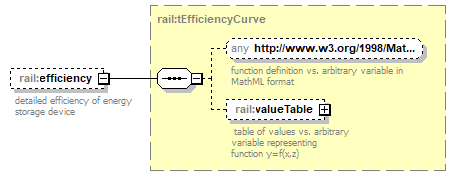 |
||||||
| namespace | https://www.railml.org/schemas/2018 | ||||||
| type | rail:tEfficiencyCurve | ||||||
| properties |
|
||||||
| children | rail:valueTable | ||||||
| annotation |
|
||||||
| source | <xs:element name="efficiency" type="rail:tEfficiencyCurve" minOccurs="0"> <xs:annotation> <xs:documentation>detailed efficiency of energy storage device</xs:documentation> <xs:documentation source="http://wiki.railml.org/index.php?title=RS:efficiency_energyStorage"/> </xs:annotation> </xs:element> |
complexType eTractionInverter
| diagram | 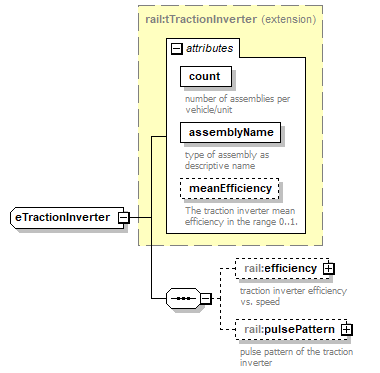 |
||||||||||||||||||||||||||||||
| namespace | https://www.railml.org/schemas/2018 | ||||||||||||||||||||||||||||||
| type | extension of rail:tTractionInverter | ||||||||||||||||||||||||||||||
| properties |
|
||||||||||||||||||||||||||||||
| children | rail:efficiency rail:pulsePattern | ||||||||||||||||||||||||||||||
| used by |
|
||||||||||||||||||||||||||||||
| attributes |
|
||||||||||||||||||||||||||||||
| source | <xs:complexType name="eTractionInverter"> <xs:complexContent> <xs:extension base="rail:tTractionInverter"> <xs:sequence> <xs:element name="efficiency" type="rail:tEfficiencyCurve" minOccurs="0"> <xs:annotation> <xs:documentation>traction inverter efficiency vs. speed</xs:documentation> <xs:documentation source="http://wiki.railml.org/index.php?title=RS:efficiency_tractionInverter"/> </xs:annotation> </xs:element> <xs:element name="pulsePattern" type="rail:ePulsePattern" minOccurs="0"> <xs:annotation> <xs:documentation>pulse pattern of the traction inverter</xs:documentation> <xs:documentation source="http://wiki.railml.org/index.php?title=RS:pulsePattern"/> </xs:annotation> </xs:element> </xs:sequence> </xs:extension> </xs:complexContent> </xs:complexType> |
element eTractionInverter/efficiency
| diagram | 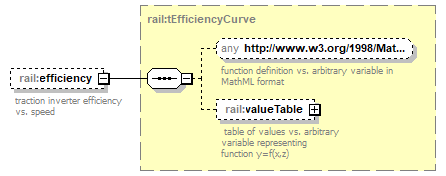 |
||||||
| namespace | https://www.railml.org/schemas/2018 | ||||||
| type | rail:tEfficiencyCurve | ||||||
| properties |
|
||||||
| children | rail:valueTable | ||||||
| annotation |
|
||||||
| source | <xs:element name="efficiency" type="rail:tEfficiencyCurve" minOccurs="0"> <xs:annotation> <xs:documentation>traction inverter efficiency vs. speed</xs:documentation> <xs:documentation source="http://wiki.railml.org/index.php?title=RS:efficiency_tractionInverter"/> </xs:annotation> </xs:element> |
element eTractionInverter/pulsePattern
| diagram |  |
||||||
| namespace | https://www.railml.org/schemas/2018 | ||||||
| type | rail:ePulsePattern | ||||||
| properties |
|
||||||
| children | rail:valueTable | ||||||
| annotation |
|
||||||
| source | <xs:element name="pulsePattern" type="rail:ePulsePattern" minOccurs="0"> <xs:annotation> <xs:documentation>pulse pattern of the traction inverter</xs:documentation> <xs:documentation source="http://wiki.railml.org/index.php?title=RS:pulsePattern"/> </xs:annotation> </xs:element> |
complexType eTractionMotor
| diagram |  |
||||||||||||||||||||||||||||||||||||||||||||||||||||||||||||||||||||||||||||||||||||||||||||||||||||||||||||||||||||||||||||||||||||||||||||||||||||||
| namespace | https://www.railml.org/schemas/2018 | ||||||||||||||||||||||||||||||||||||||||||||||||||||||||||||||||||||||||||||||||||||||||||||||||||||||||||||||||||||||||||||||||||||||||||||||||||||||
| type | extension of rail:tTractionMotor | ||||||||||||||||||||||||||||||||||||||||||||||||||||||||||||||||||||||||||||||||||||||||||||||||||||||||||||||||||||||||||||||||||||||||||||||||||||||
| properties |
|
||||||||||||||||||||||||||||||||||||||||||||||||||||||||||||||||||||||||||||||||||||||||||||||||||||||||||||||||||||||||||||||||||||||||||||||||||||||
| children | rail:efficiency rail:mechanicalLosses | ||||||||||||||||||||||||||||||||||||||||||||||||||||||||||||||||||||||||||||||||||||||||||||||||||||||||||||||||||||||||||||||||||||||||||||||||||||||
| used by |
|
||||||||||||||||||||||||||||||||||||||||||||||||||||||||||||||||||||||||||||||||||||||||||||||||||||||||||||||||||||||||||||||||||||||||||||||||||||||
| attributes |
|
||||||||||||||||||||||||||||||||||||||||||||||||||||||||||||||||||||||||||||||||||||||||||||||||||||||||||||||||||||||||||||||||||||||||||||||||||||||
| source | <xs:complexType name="eTractionMotor"> <xs:complexContent> <xs:extension base="rail:tTractionMotor"> <xs:sequence> <xs:element name="efficiency" type="rail:tEfficiencyCurve" minOccurs="0"> <xs:annotation> <xs:documentation>traction motor efficiency vs. speed</xs:documentation> <xs:documentation source="http://wiki.railml.org/index.php?title=RS:efficiency_tractionMotor"/> </xs:annotation> </xs:element> <xs:element name="mechanicalLosses" type="rail:tLosses" minOccurs="0"> <xs:annotation> <xs:documentation>traction motor mechanical losses vs. speed</xs:documentation> <xs:documentation source="http://wiki.railml.org/index.php?title=RS:mechanicalLosses"/> </xs:annotation> </xs:element> </xs:sequence> </xs:extension> </xs:complexContent> </xs:complexType> |
element eTractionMotor/efficiency
| diagram | 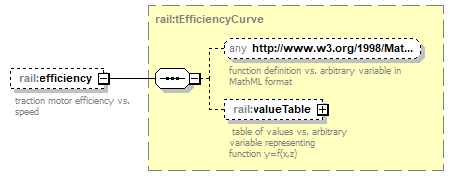 |
||||||
| namespace | https://www.railml.org/schemas/2018 | ||||||
| type | rail:tEfficiencyCurve | ||||||
| properties |
|
||||||
| children | rail:valueTable | ||||||
| annotation |
|
||||||
| source | <xs:element name="efficiency" type="rail:tEfficiencyCurve" minOccurs="0"> <xs:annotation> <xs:documentation>traction motor efficiency vs. speed</xs:documentation> <xs:documentation source="http://wiki.railml.org/index.php?title=RS:efficiency_tractionMotor"/> </xs:annotation> </xs:element> |
element eTractionMotor/mechanicalLosses
| diagram | 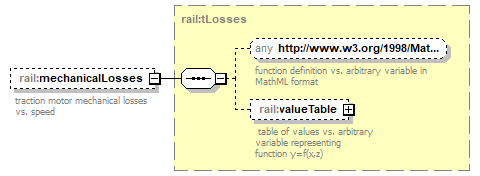 |
||||||
| namespace | https://www.railml.org/schemas/2018 | ||||||
| type | rail:tLosses | ||||||
| properties |
|
||||||
| children | rail:valueTable | ||||||
| annotation |
|
||||||
| source | <xs:element name="mechanicalLosses" type="rail:tLosses" minOccurs="0"> <xs:annotation> <xs:documentation>traction motor mechanical losses vs. speed</xs:documentation> <xs:documentation source="http://wiki.railml.org/index.php?title=RS:mechanicalLosses"/> </xs:annotation> </xs:element> |
complexType eTrainOrder
| diagram |  |
||
| namespace | https://www.railml.org/schemas/2018 | ||
| children | rail:vehicleRef | ||
| used by |
|
||
| source | <xs:complexType name="eTrainOrder"> <xs:sequence> <xs:element name="vehicleRef" type="rail:tVehicleRef" maxOccurs="unbounded"> <xs:annotation> <xs:documentation>references via ID-attribute to vehicle element</xs:documentation> <xs:documentation source="http://wiki.railml.org/index.php?title=RS:vehicleRef"/> </xs:annotation> </xs:element> </xs:sequence> </xs:complexType> |
element eTrainOrder/vehicleRef
| diagram | 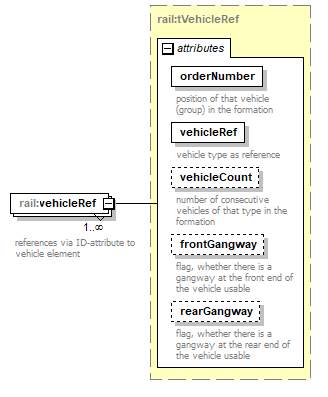 |
||||||||||||||||||||||||||||||||||||||||||||||
| namespace | https://www.railml.org/schemas/2018 | ||||||||||||||||||||||||||||||||||||||||||||||
| type | rail:tVehicleRef | ||||||||||||||||||||||||||||||||||||||||||||||
| properties |
|
||||||||||||||||||||||||||||||||||||||||||||||
| attributes |
|
||||||||||||||||||||||||||||||||||||||||||||||
| annotation |
|
||||||||||||||||||||||||||||||||||||||||||||||
| source | <xs:element name="vehicleRef" type="rail:tVehicleRef" maxOccurs="unbounded"> <xs:annotation> <xs:documentation>references via ID-attribute to vehicle element</xs:documentation> <xs:documentation source="http://wiki.railml.org/index.php?title=RS:vehicleRef"/> </xs:annotation> </xs:element> |
complexType eTrainRadio
| diagram | 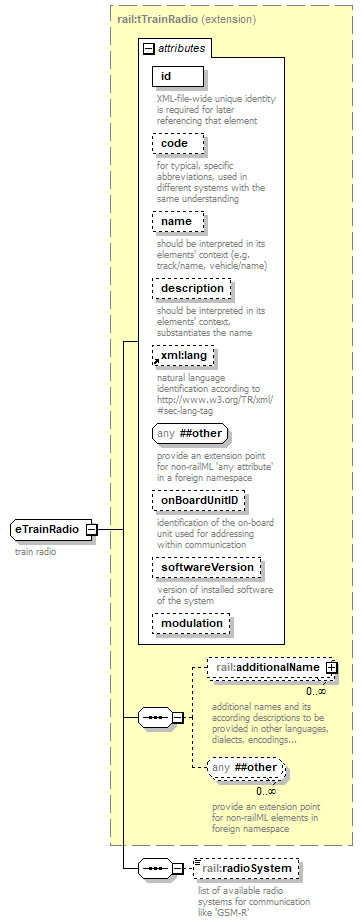 |
||||||||||||||||||||||||||||||||||||||||||||||||||||||||||||||||||||
| namespace | https://www.railml.org/schemas/2018 | ||||||||||||||||||||||||||||||||||||||||||||||||||||||||||||||||||||
| type | extension of rail:tTrainRadio | ||||||||||||||||||||||||||||||||||||||||||||||||||||||||||||||||||||
| properties |
|
||||||||||||||||||||||||||||||||||||||||||||||||||||||||||||||||||||
| children | rail:additionalName rail:radioSystem | ||||||||||||||||||||||||||||||||||||||||||||||||||||||||||||||||||||
| used by |
|
||||||||||||||||||||||||||||||||||||||||||||||||||||||||||||||||||||
| attributes |
|
||||||||||||||||||||||||||||||||||||||||||||||||||||||||||||||||||||
| annotation |
|
||||||||||||||||||||||||||||||||||||||||||||||||||||||||||||||||||||
| source | <xs:complexType name="eTrainRadio"> <xs:annotation> <xs:documentation>train radio</xs:documentation> <xs:documentation source="http://wiki.railml.org/index.php?title=RS:trainRadio"/> </xs:annotation> <xs:complexContent> <xs:extension base="rail:tTrainRadio"> <xs:sequence> <xs:element name="radioSystem" type="rail:tRadioSystem" minOccurs="0"> <xs:annotation> <xs:documentation>list of available radio systems for communication like 'GSM-R'</xs:documentation> <xs:documentation source="http://wiki.railml.org/index.php?title=RS:radioSystem"/> </xs:annotation> </xs:element> </xs:sequence> </xs:extension> </xs:complexContent> </xs:complexType> |
element eTrainRadio/radioSystem
| diagram |  |
||||||
| namespace | https://www.railml.org/schemas/2018 | ||||||
| type | rail:tRadioSystem | ||||||
| properties |
|
||||||
| annotation |
|
||||||
| source | <xs:element name="radioSystem" type="rail:tRadioSystem" minOccurs="0"> <xs:annotation> <xs:documentation>list of available radio systems for communication like 'GSM-R'</xs:documentation> <xs:documentation source="http://wiki.railml.org/index.php?title=RS:radioSystem"/> </xs:annotation> </xs:element> |
complexType eTransformer
| diagram | 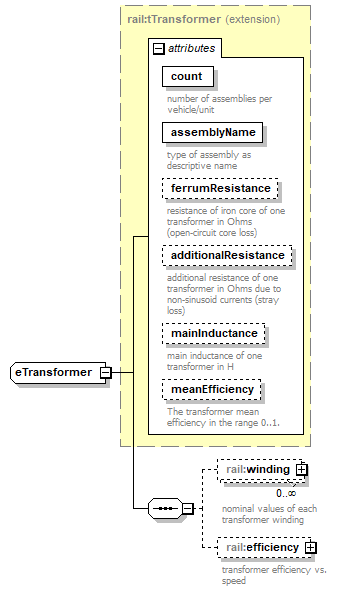 |
||||||||||||||||||||||||||||||||||||||||||||||||||||||
| namespace | https://www.railml.org/schemas/2018 | ||||||||||||||||||||||||||||||||||||||||||||||||||||||
| type | extension of rail:tTransformer | ||||||||||||||||||||||||||||||||||||||||||||||||||||||
| properties |
|
||||||||||||||||||||||||||||||||||||||||||||||||||||||
| children | rail:winding rail:efficiency | ||||||||||||||||||||||||||||||||||||||||||||||||||||||
| used by |
|
||||||||||||||||||||||||||||||||||||||||||||||||||||||
| attributes |
|
||||||||||||||||||||||||||||||||||||||||||||||||||||||
| source | <xs:complexType name="eTransformer"> <xs:complexContent> <xs:extension base="rail:tTransformer"> <xs:sequence> <xs:element name="winding" type="rail:tWinding" minOccurs="0" maxOccurs="unbounded"> <xs:annotation> <xs:documentation>nominal values of each transformer winding</xs:documentation> <xs:documentation source="http://wiki.railml.org/index.php?title=RS:winding"/> </xs:annotation> </xs:element> <xs:element name="efficiency" type="rail:tEfficiencyCurve" minOccurs="0"> <xs:annotation> <xs:documentation>transformer efficiency vs. speed</xs:documentation> <xs:documentation source="http://wiki.railml.org/index.php?title=RS:efficiency_transformer"/> </xs:annotation> </xs:element> </xs:sequence> </xs:extension> </xs:complexContent> </xs:complexType> |
element eTransformer/winding
| diagram | 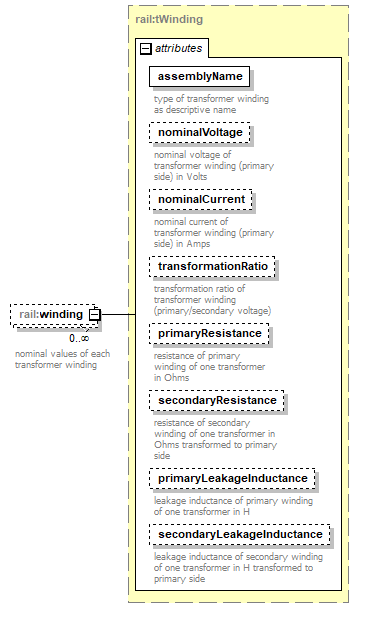 |
||||||||||||||||||||||||||||||||||||||||||||||||||||||||||||||||||||||
| namespace | https://www.railml.org/schemas/2018 | ||||||||||||||||||||||||||||||||||||||||||||||||||||||||||||||||||||||
| type | rail:tWinding | ||||||||||||||||||||||||||||||||||||||||||||||||||||||||||||||||||||||
| properties |
|
||||||||||||||||||||||||||||||||||||||||||||||||||||||||||||||||||||||
| attributes |
|
||||||||||||||||||||||||||||||||||||||||||||||||||||||||||||||||||||||
| annotation |
|
||||||||||||||||||||||||||||||||||||||||||||||||||||||||||||||||||||||
| source | <xs:element name="winding" type="rail:tWinding" minOccurs="0" maxOccurs="unbounded"> <xs:annotation> <xs:documentation>nominal values of each transformer winding</xs:documentation> <xs:documentation source="http://wiki.railml.org/index.php?title=RS:winding"/> </xs:annotation> </xs:element> |
element eTransformer/efficiency
| diagram | 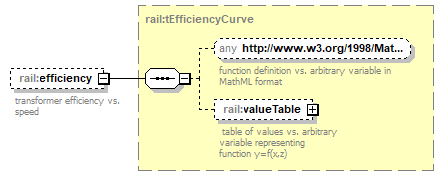 |
||||||
| namespace | https://www.railml.org/schemas/2018 | ||||||
| type | rail:tEfficiencyCurve | ||||||
| properties |
|
||||||
| children | rail:valueTable | ||||||
| annotation |
|
||||||
| source | <xs:element name="efficiency" type="rail:tEfficiencyCurve" minOccurs="0"> <xs:annotation> <xs:documentation>transformer efficiency vs. speed</xs:documentation> <xs:documentation source="http://wiki.railml.org/index.php?title=RS:efficiency_transformer"/> </xs:annotation> </xs:element> |
complexType eVehicle
| diagram |  |
||||||||||||||||||||||||||||||||||||||||||||||||||||||||||||||||||||||||||||||||||||||||||||||||||||||||||||||||||||||||||||||||||||||||||||||||||||||||||||||||||||||||||||||||||||||||||||||||||||||||||||||||||||||
| namespace | https://www.railml.org/schemas/2018 | ||||||||||||||||||||||||||||||||||||||||||||||||||||||||||||||||||||||||||||||||||||||||||||||||||||||||||||||||||||||||||||||||||||||||||||||||||||||||||||||||||||||||||||||||||||||||||||||||||||||||||||||||||||||
| type | extension of rail:tVehicle | ||||||||||||||||||||||||||||||||||||||||||||||||||||||||||||||||||||||||||||||||||||||||||||||||||||||||||||||||||||||||||||||||||||||||||||||||||||||||||||||||||||||||||||||||||||||||||||||||||||||||||||||||||||||
| properties |
|
||||||||||||||||||||||||||||||||||||||||||||||||||||||||||||||||||||||||||||||||||||||||||||||||||||||||||||||||||||||||||||||||||||||||||||||||||||||||||||||||||||||||||||||||||||||||||||||||||||||||||||||||||||||
| children | rail:additionalName rail:classification rail:engine rail:wagon rail:vehicleBrakes rail:loadLimitMatrix rail:curvingLimitation rail:maintenanceIntervals | ||||||||||||||||||||||||||||||||||||||||||||||||||||||||||||||||||||||||||||||||||||||||||||||||||||||||||||||||||||||||||||||||||||||||||||||||||||||||||||||||||||||||||||||||||||||||||||||||||||||||||||||||||||||
| used by |
|
||||||||||||||||||||||||||||||||||||||||||||||||||||||||||||||||||||||||||||||||||||||||||||||||||||||||||||||||||||||||||||||||||||||||||||||||||||||||||||||||||||||||||||||||||||||||||||||||||||||||||||||||||||||
| attributes |
|
||||||||||||||||||||||||||||||||||||||||||||||||||||||||||||||||||||||||||||||||||||||||||||||||||||||||||||||||||||||||||||||||||||||||||||||||||||||||||||||||||||||||||||||||||||||||||||||||||||||||||||||||||||||
| source | <xs:complexType name="eVehicle"> <xs:complexContent> <xs:extension base="rail:tVehicle"> <xs:sequence> <xs:element name="classification" type="rail:eClassification" minOccurs="0"> <xs:annotation> <xs:documentation>general management and classification data of vehicle</xs:documentation> <xs:documentation source="http://wiki.railml.org/index.php?title=RS:classification"/> </xs:annotation> </xs:element> <xs:element name="engine" type="rail:eEngine" minOccurs="0"> <xs:annotation> <xs:documentation>engine data about a motor car or locomotive</xs:documentation> <xs:documentation source="http://wiki.railml.org/index.php?title=RS:engine"/> </xs:annotation> </xs:element> <xs:element name="wagon" type="rail:eWagon" minOccurs="0"> <xs:annotation> <xs:documentation>technical and payload data about a (motor) car or locomotive</xs:documentation> <xs:documentation source="http://wiki.railml.org/index.php?title=RS:wagon"/> </xs:annotation> </xs:element> <xs:element name="vehicleBrakes" type="rail:eVehicleBrakes" minOccurs="0"> <xs:annotation> <xs:documentation>data about brake systems independent from propulsion</xs:documentation> <xs:documentation source="http://wiki.railml.org/index.php?title=RS:vehicleBrakes"/> </xs:annotation> </xs:element> <xs:element name="loadLimitMatrix" type="rail:eLoadLimitMatrix" minOccurs="0"> <xs:annotation> <xs:documentation>matrix of permissible speed, line classification and payload</xs:documentation> <xs:documentation source="http://wiki.railml.org/index.php?title=RS:loadLimitMatrix"/> </xs:annotation> </xs:element> <xs:element name="curvingLimitation" type="rail:eCurvingLimitation" minOccurs="0"> <xs:annotation> <xs:documentation>list of permissible curve radius in horizontal and vertical direction</xs:documentation> <xs:documentation source="http://wiki.railml.org/index.php?title=RS:curvingLimitation"/> </xs:annotation> </xs:element> <xs:element name="maintenanceIntervals" type="rail:eMaintenanceIntervals" minOccurs="0"/> </xs:sequence> </xs:extension> </xs:complexContent> </xs:complexType> |
element eVehicle/classification
| diagram | 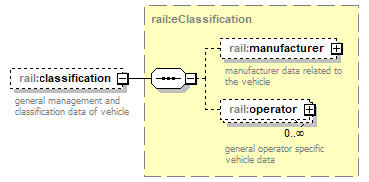 |
||||||
| namespace | https://www.railml.org/schemas/2018 | ||||||
| type | rail:eClassification | ||||||
| properties |
|
||||||
| children | rail:manufacturer rail:operator | ||||||
| annotation |
|
||||||
| source | <xs:element name="classification" type="rail:eClassification" minOccurs="0"> <xs:annotation> <xs:documentation>general management and classification data of vehicle</xs:documentation> <xs:documentation source="http://wiki.railml.org/index.php?title=RS:classification"/> </xs:annotation> </xs:element> |
element eVehicle/engine
| diagram | 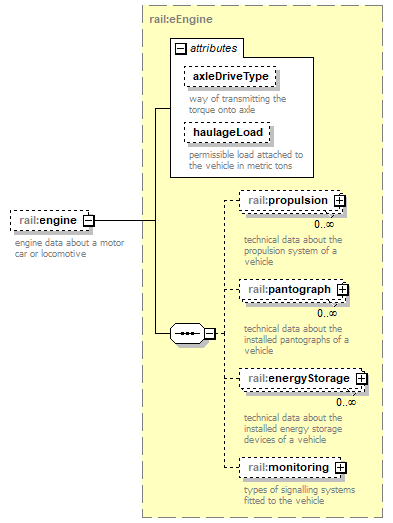 |
||||||||||||||||||||||
| namespace | https://www.railml.org/schemas/2018 | ||||||||||||||||||||||
| type | rail:eEngine | ||||||||||||||||||||||
| properties |
|
||||||||||||||||||||||
| children | rail:propulsion rail:pantograph rail:energyStorage rail:monitoring | ||||||||||||||||||||||
| attributes |
|
||||||||||||||||||||||
| annotation |
|
||||||||||||||||||||||
| source | <xs:element name="engine" type="rail:eEngine" minOccurs="0"> <xs:annotation> <xs:documentation>engine data about a motor car or locomotive</xs:documentation> <xs:documentation source="http://wiki.railml.org/index.php?title=RS:engine"/> </xs:annotation> </xs:element> |
element eVehicle/wagon
| diagram | 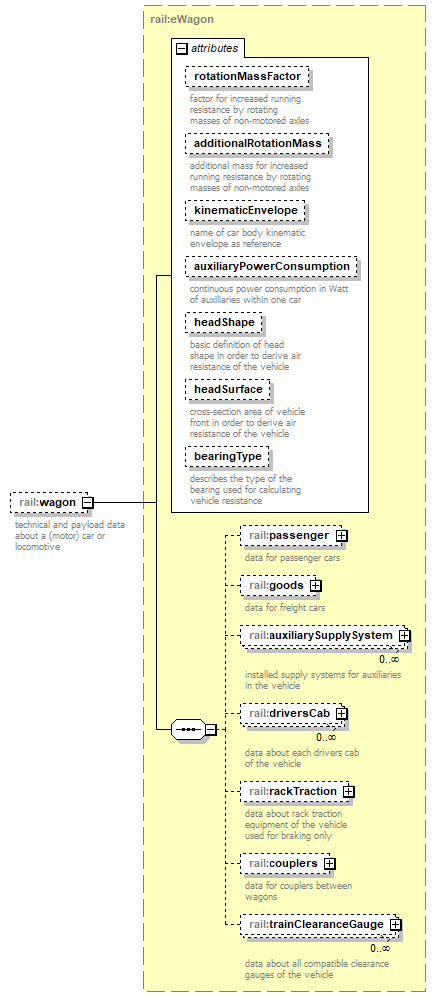 |
||||||||||||||||||||||||||||||||||||||||||||||||||||||||||||||
| namespace | https://www.railml.org/schemas/2018 | ||||||||||||||||||||||||||||||||||||||||||||||||||||||||||||||
| type | rail:eWagon | ||||||||||||||||||||||||||||||||||||||||||||||||||||||||||||||
| properties |
|
||||||||||||||||||||||||||||||||||||||||||||||||||||||||||||||
| children | rail:passenger rail:goods rail:auxiliarySupplySystem rail:driversCab rail:rackTraction rail:couplers rail:trainClearanceGauge | ||||||||||||||||||||||||||||||||||||||||||||||||||||||||||||||
| attributes |
|
||||||||||||||||||||||||||||||||||||||||||||||||||||||||||||||
| annotation |
|
||||||||||||||||||||||||||||||||||||||||||||||||||||||||||||||
| source | <xs:element name="wagon" type="rail:eWagon" minOccurs="0"> <xs:annotation> <xs:documentation>technical and payload data about a (motor) car or locomotive</xs:documentation> <xs:documentation source="http://wiki.railml.org/index.php?title=RS:wagon"/> </xs:annotation> </xs:element> |
element eVehicle/vehicleBrakes
| diagram | 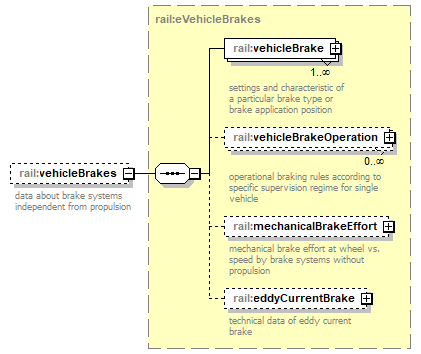 |
||||||
| namespace | https://www.railml.org/schemas/2018 | ||||||
| type | rail:eVehicleBrakes | ||||||
| properties |
|
||||||
| children | rail:vehicleBrake rail:vehicleBrakeOperation rail:mechanicalBrakeEffort rail:eddyCurrentBrake | ||||||
| annotation |
|
||||||
| source | <xs:element name="vehicleBrakes" type="rail:eVehicleBrakes" minOccurs="0"> <xs:annotation> <xs:documentation>data about brake systems independent from propulsion</xs:documentation> <xs:documentation source="http://wiki.railml.org/index.php?title=RS:vehicleBrakes"/> </xs:annotation> </xs:element> |
element eVehicle/loadLimitMatrix
| diagram | 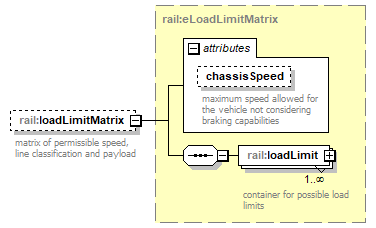 |
||||||||||||||
| namespace | https://www.railml.org/schemas/2018 | ||||||||||||||
| type | rail:eLoadLimitMatrix | ||||||||||||||
| properties |
|
||||||||||||||
| children | rail:loadLimit | ||||||||||||||
| attributes |
|
||||||||||||||
| annotation |
|
||||||||||||||
| source | <xs:element name="loadLimitMatrix" type="rail:eLoadLimitMatrix" minOccurs="0"> <xs:annotation> <xs:documentation>matrix of permissible speed, line classification and payload</xs:documentation> <xs:documentation source="http://wiki.railml.org/index.php?title=RS:loadLimitMatrix"/> </xs:annotation> </xs:element> |
element eVehicle/curvingLimitation
| diagram | 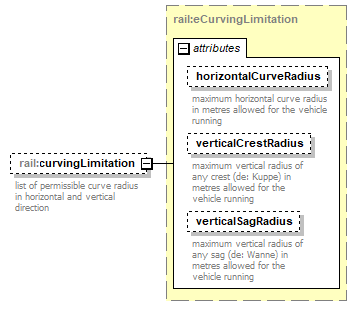 |
||||||||||||||||||||||||||||||
| namespace | https://www.railml.org/schemas/2018 | ||||||||||||||||||||||||||||||
| type | rail:eCurvingLimitation | ||||||||||||||||||||||||||||||
| properties |
|
||||||||||||||||||||||||||||||
| attributes |
|
||||||||||||||||||||||||||||||
| annotation |
|
||||||||||||||||||||||||||||||
| source | <xs:element name="curvingLimitation" type="rail:eCurvingLimitation" minOccurs="0"> <xs:annotation> <xs:documentation>list of permissible curve radius in horizontal and vertical direction</xs:documentation> <xs:documentation source="http://wiki.railml.org/index.php?title=RS:curvingLimitation"/> </xs:annotation> </xs:element> |
element eVehicle/maintenanceIntervals
| diagram |  |
||||||
| namespace | https://www.railml.org/schemas/2018 | ||||||
| type | rail:eMaintenanceIntervals | ||||||
| properties |
|
||||||
| children | rail:maintenanceInterval | ||||||
| source | <xs:element name="maintenanceIntervals" type="rail:eMaintenanceIntervals" minOccurs="0"/> |
complexType eVehicleBrake
| diagram | 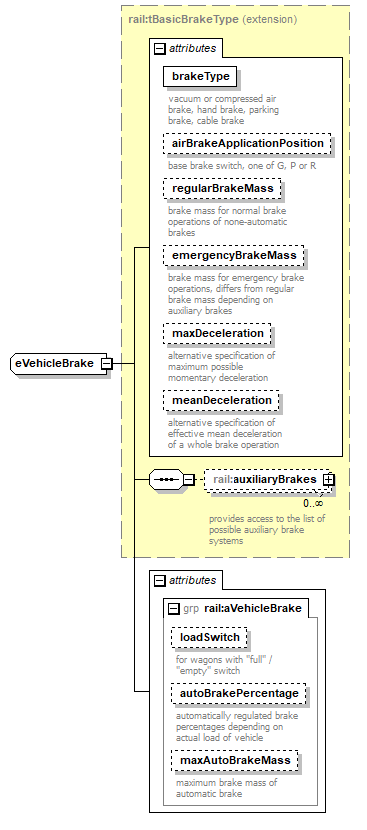 |
||||||||||||||||||||||||||||||||||||||||||||||||||||||||||||||||||||||||||||||
| namespace | https://www.railml.org/schemas/2018 | ||||||||||||||||||||||||||||||||||||||||||||||||||||||||||||||||||||||||||||||
| type | extension of rail:tBasicBrakeType | ||||||||||||||||||||||||||||||||||||||||||||||||||||||||||||||||||||||||||||||
| properties |
|
||||||||||||||||||||||||||||||||||||||||||||||||||||||||||||||||||||||||||||||
| children | rail:auxiliaryBrakes | ||||||||||||||||||||||||||||||||||||||||||||||||||||||||||||||||||||||||||||||
| used by |
|
||||||||||||||||||||||||||||||||||||||||||||||||||||||||||||||||||||||||||||||
| attributes |
|
||||||||||||||||||||||||||||||||||||||||||||||||||||||||||||||||||||||||||||||
| source | <xs:complexType name="eVehicleBrake"> <xs:complexContent> <xs:extension base="rail:tBasicBrakeType"> <xs:annotation> <xs:documentation source="http://wiki.railml.org/index.php?title=RS:vehicleBrake"/> </xs:annotation> <xs:attributeGroup ref="rail:aVehicleBrake"/> </xs:extension> </xs:complexContent> </xs:complexType> |
complexType eVehicleBrakes
| diagram | 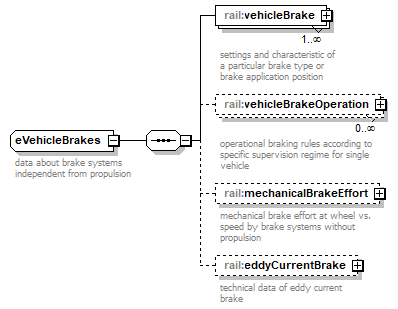 |
||
| namespace | https://www.railml.org/schemas/2018 | ||
| children | rail:vehicleBrake rail:vehicleBrakeOperation rail:mechanicalBrakeEffort rail:eddyCurrentBrake | ||
| used by |
|
||
| annotation |
|
||
| source | <xs:complexType name="eVehicleBrakes"> <xs:annotation> <xs:documentation>data about brake systems independent from propulsion</xs:documentation> <xs:documentation source="http://wiki.railml.org/index.php?title=RS:vehicleBrakes"/> </xs:annotation> <xs:sequence> <xs:element name="vehicleBrake" type="rail:eVehicleBrake" maxOccurs="unbounded"> <xs:annotation> <xs:documentation>settings and characteristic of a particular brake type or brake application position</xs:documentation> <xs:documentation source="http://wiki.railml.org/index.php?title=RS:vehicleBrake"/> </xs:annotation> </xs:element> <xs:element name="vehicleBrakeOperation" type="rail:tBasicBrakeOperation" minOccurs="0" maxOccurs="unbounded"> <xs:annotation> <xs:documentation>operational braking rules according to specific supervision regime for single vehicle</xs:documentation> <xs:documentation source="http://wiki.railml.org/index.php?title=RS:vehicleBrakeOperation"/> </xs:annotation> </xs:element> <xs:element name="mechanicalBrakeEffort" type="rail:tEffortCurve" minOccurs="0"> <xs:annotation> <xs:documentation>mechanical brake effort at wheel vs. speed by brake systems without propulsion</xs:documentation> <xs:documentation source="http://wiki.railml.org/index.php?title=RS:mechanicalBrakeEffort"/> </xs:annotation> </xs:element> <xs:element name="eddyCurrentBrake" type="rail:tEddyCurrentBrake" minOccurs="0"> <xs:annotation> <xs:documentation>technical data of eddy current brake</xs:documentation> <xs:documentation source="http://wiki.railml.org/index.php?title=RS:eddyCurrentBrake"/> </xs:annotation> </xs:element> </xs:sequence> </xs:complexType> |
element eVehicleBrakes/vehicleBrake
| diagram | 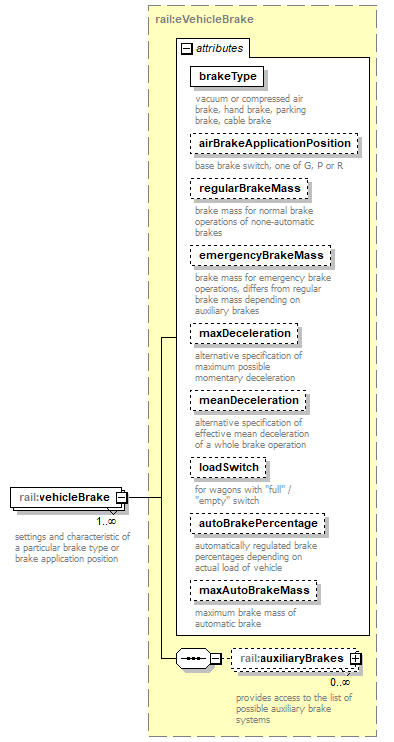 |
||||||||||||||||||||||||||||||||||||||||||||||||||||||||||||||||||||||||||||||
| namespace | https://www.railml.org/schemas/2018 | ||||||||||||||||||||||||||||||||||||||||||||||||||||||||||||||||||||||||||||||
| type | rail:eVehicleBrake | ||||||||||||||||||||||||||||||||||||||||||||||||||||||||||||||||||||||||||||||
| properties |
|
||||||||||||||||||||||||||||||||||||||||||||||||||||||||||||||||||||||||||||||
| children | rail:auxiliaryBrakes | ||||||||||||||||||||||||||||||||||||||||||||||||||||||||||||||||||||||||||||||
| attributes |
|
||||||||||||||||||||||||||||||||||||||||||||||||||||||||||||||||||||||||||||||
| annotation |
|
||||||||||||||||||||||||||||||||||||||||||||||||||||||||||||||||||||||||||||||
| source | <xs:element name="vehicleBrake" type="rail:eVehicleBrake" maxOccurs="unbounded"> <xs:annotation> <xs:documentation>settings and characteristic of a particular brake type or brake application position</xs:documentation> <xs:documentation source="http://wiki.railml.org/index.php?title=RS:vehicleBrake"/> </xs:annotation> </xs:element> |
element eVehicleBrakes/vehicleBrakeOperation
| diagram | 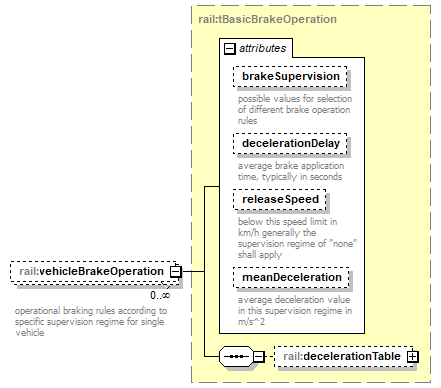 |
||||||||||||||||||||||||||||||||||||||
| namespace | https://www.railml.org/schemas/2018 | ||||||||||||||||||||||||||||||||||||||
| type | rail:tBasicBrakeOperation | ||||||||||||||||||||||||||||||||||||||
| properties |
|
||||||||||||||||||||||||||||||||||||||
| children | rail:decelerationTable | ||||||||||||||||||||||||||||||||||||||
| attributes |
|
||||||||||||||||||||||||||||||||||||||
| annotation |
|
||||||||||||||||||||||||||||||||||||||
| source | <xs:element name="vehicleBrakeOperation" type="rail:tBasicBrakeOperation" minOccurs="0" maxOccurs="unbounded"> <xs:annotation> <xs:documentation>operational braking rules according to specific supervision regime for single vehicle</xs:documentation> <xs:documentation source="http://wiki.railml.org/index.php?title=RS:vehicleBrakeOperation"/> </xs:annotation> </xs:element> |
element eVehicleBrakes/mechanicalBrakeEffort
| diagram | 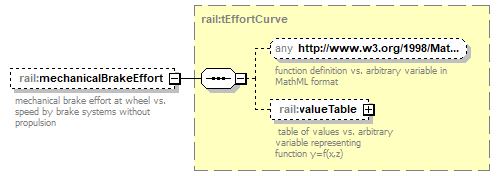 |
||||||
| namespace | https://www.railml.org/schemas/2018 | ||||||
| type | rail:tEffortCurve | ||||||
| properties |
|
||||||
| children | rail:valueTable | ||||||
| annotation |
|
||||||
| source | <xs:element name="mechanicalBrakeEffort" type="rail:tEffortCurve" minOccurs="0"> <xs:annotation> <xs:documentation>mechanical brake effort at wheel vs. speed by brake systems without propulsion</xs:documentation> <xs:documentation source="http://wiki.railml.org/index.php?title=RS:mechanicalBrakeEffort"/> </xs:annotation> </xs:element> |
element eVehicleBrakes/eddyCurrentBrake
| diagram | 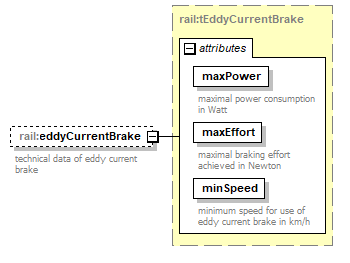 |
||||||||||||||||||||||||||||||
| namespace | https://www.railml.org/schemas/2018 | ||||||||||||||||||||||||||||||
| type | rail:tEddyCurrentBrake | ||||||||||||||||||||||||||||||
| properties |
|
||||||||||||||||||||||||||||||
| attributes |
|
||||||||||||||||||||||||||||||
| annotation |
|
||||||||||||||||||||||||||||||
| source | <xs:element name="eddyCurrentBrake" type="rail:tEddyCurrentBrake" minOccurs="0"> <xs:annotation> <xs:documentation>technical data of eddy current brake</xs:documentation> <xs:documentation source="http://wiki.railml.org/index.php?title=RS:eddyCurrentBrake"/> </xs:annotation> </xs:element> |
complexType eVehicles
| diagram |  |
||
| namespace | https://www.railml.org/schemas/2018 | ||
| children | rail:vehicle | ||
| used by |
|
||
| source | <xs:complexType name="eVehicles"> <xs:sequence> <xs:element name="vehicle" type="rail:eVehicle" maxOccurs="unbounded"> <xs:annotation> <xs:documentation>data related to single vehicle or vehicle family</xs:documentation> <xs:documentation source="http://wiki.railml.org/index.php?title=RS:vehicle"/> </xs:annotation> </xs:element> </xs:sequence> </xs:complexType> |
element eVehicles/vehicle
| diagram |  |
||||||||||||||||||||||||||||||||||||||||||||||||||||||||||||||||||||||||||||||||||||||||||||||||||||||||||||||||||||||||||||||||||||||||||||||||||||||||||||||||||||||||||||||||||||||||||||||||||||||||||||||||||||||
| namespace | https://www.railml.org/schemas/2018 | ||||||||||||||||||||||||||||||||||||||||||||||||||||||||||||||||||||||||||||||||||||||||||||||||||||||||||||||||||||||||||||||||||||||||||||||||||||||||||||||||||||||||||||||||||||||||||||||||||||||||||||||||||||||
| type | rail:eVehicle | ||||||||||||||||||||||||||||||||||||||||||||||||||||||||||||||||||||||||||||||||||||||||||||||||||||||||||||||||||||||||||||||||||||||||||||||||||||||||||||||||||||||||||||||||||||||||||||||||||||||||||||||||||||||
| properties |
|
||||||||||||||||||||||||||||||||||||||||||||||||||||||||||||||||||||||||||||||||||||||||||||||||||||||||||||||||||||||||||||||||||||||||||||||||||||||||||||||||||||||||||||||||||||||||||||||||||||||||||||||||||||||
| children | rail:additionalName rail:classification rail:engine rail:wagon rail:vehicleBrakes rail:loadLimitMatrix rail:curvingLimitation rail:maintenanceIntervals | ||||||||||||||||||||||||||||||||||||||||||||||||||||||||||||||||||||||||||||||||||||||||||||||||||||||||||||||||||||||||||||||||||||||||||||||||||||||||||||||||||||||||||||||||||||||||||||||||||||||||||||||||||||||
| attributes |
|
||||||||||||||||||||||||||||||||||||||||||||||||||||||||||||||||||||||||||||||||||||||||||||||||||||||||||||||||||||||||||||||||||||||||||||||||||||||||||||||||||||||||||||||||||||||||||||||||||||||||||||||||||||||
| annotation |
|
||||||||||||||||||||||||||||||||||||||||||||||||||||||||||||||||||||||||||||||||||||||||||||||||||||||||||||||||||||||||||||||||||||||||||||||||||||||||||||||||||||||||||||||||||||||||||||||||||||||||||||||||||||||
| source | <xs:element name="vehicle" type="rail:eVehicle" maxOccurs="unbounded"> <xs:annotation> <xs:documentation>data related to single vehicle or vehicle family</xs:documentation> <xs:documentation source="http://wiki.railml.org/index.php?title=RS:vehicle"/> </xs:annotation> </xs:element> |
complexType eWagon
| diagram | 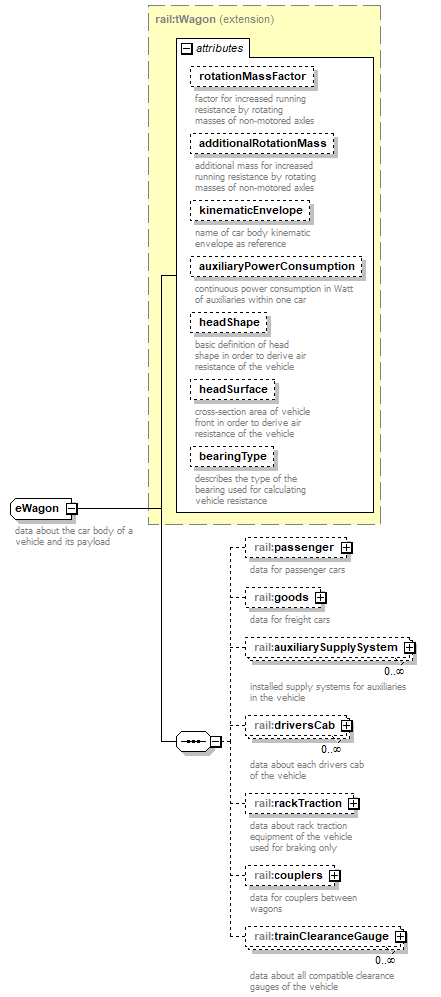 |
||||||||||||||||||||||||||||||||||||||||||||||||||||||||||||||
| namespace | https://www.railml.org/schemas/2018 | ||||||||||||||||||||||||||||||||||||||||||||||||||||||||||||||
| type | extension of rail:tWagon | ||||||||||||||||||||||||||||||||||||||||||||||||||||||||||||||
| properties |
|
||||||||||||||||||||||||||||||||||||||||||||||||||||||||||||||
| children | rail:passenger rail:goods rail:auxiliarySupplySystem rail:driversCab rail:rackTraction rail:couplers rail:trainClearanceGauge | ||||||||||||||||||||||||||||||||||||||||||||||||||||||||||||||
| used by |
|
||||||||||||||||||||||||||||||||||||||||||||||||||||||||||||||
| attributes |
|
||||||||||||||||||||||||||||||||||||||||||||||||||||||||||||||
| annotation |
|
||||||||||||||||||||||||||||||||||||||||||||||||||||||||||||||
| source | <xs:complexType name="eWagon"> <xs:annotation> <xs:documentation>data about the car body of a vehicle and its payload</xs:documentation> <xs:documentation source="http://wiki.railml.org/index.php?title=RS:wagon"/> </xs:annotation> <xs:complexContent> <xs:extension base="rail:tWagon"> <xs:sequence> <xs:element name="passenger" type="rail:ePassenger" minOccurs="0"> <xs:annotation> <xs:documentation>data for passenger cars</xs:documentation> <xs:documentation source="http://wiki.railml.org/index.php?title=RS:passenger"/> </xs:annotation> </xs:element> <xs:element name="goods" type="rail:eGoods" minOccurs="0"> <xs:annotation> <xs:documentation>data for freight cars</xs:documentation> <xs:documentation source="http://wiki.railml.org/index.php?title=RS:goods"/> </xs:annotation> </xs:element> <xs:element name="auxiliarySupplySystem" type="rail:tElectrificationSystem" minOccurs="0" maxOccurs="unbounded"> <xs:annotation> <xs:documentation>installed supply systems for auxiliaries in the vehicle</xs:documentation> <xs:documentation source="http://wiki.railml.org/index.php?title=RS:auxiliarySupplySystem"/> </xs:annotation> </xs:element> <xs:element name="driversCab" type="rail:tDriversCabType" minOccurs="0" maxOccurs="unbounded"> <xs:annotation> <xs:documentation>data about each drivers cab of the vehicle</xs:documentation> <xs:documentation source="http://wiki.railml.org/index.php?title=RS:driversCab"/> </xs:annotation> </xs:element> <xs:element name="rackTraction" type="rail:tRackTractionType" minOccurs="0"> <xs:annotation> <xs:documentation>data about rack traction equipment of the vehicle used for braking only</xs:documentation> <xs:documentation source="http://wiki.railml.org/index.php?title=RS:rackTraction_wagon"/> </xs:annotation> </xs:element> <xs:element name="couplers" type="rail:eCouplers" minOccurs="0"> <xs:annotation> <xs:documentation>data for couplers between wagons</xs:documentation> <xs:documentation source="http://wiki.railml.org/index.php?title=RS:couplers"/> </xs:annotation> </xs:element> <xs:element name="trainClearanceGauge" type="rail:tClearanceGaugeType" minOccurs="0" maxOccurs="unbounded"> <xs:annotation> <xs:documentation>data about all compatible clearance gauges of the vehicle</xs:documentation> <xs:documentation source="http://wiki.railml.org/index.php?title=RS:trainClearanceGauge"/> </xs:annotation> </xs:element> </xs:sequence> </xs:extension> </xs:complexContent> </xs:complexType> |
element eWagon/passenger
| diagram | 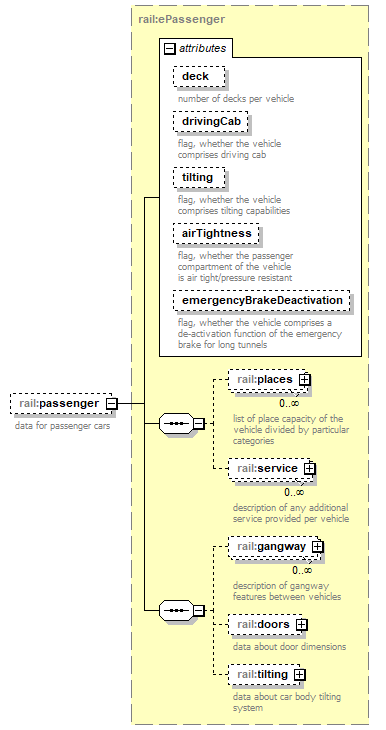 |
||||||||||||||||||||||||||||||||||||||||||||||
| namespace | https://www.railml.org/schemas/2018 | ||||||||||||||||||||||||||||||||||||||||||||||
| type | rail:ePassenger | ||||||||||||||||||||||||||||||||||||||||||||||
| properties |
|
||||||||||||||||||||||||||||||||||||||||||||||
| children | rail:places rail:service rail:gangway rail:doors rail:tilting | ||||||||||||||||||||||||||||||||||||||||||||||
| attributes |
|
||||||||||||||||||||||||||||||||||||||||||||||
| annotation |
|
||||||||||||||||||||||||||||||||||||||||||||||
| source | <xs:element name="passenger" type="rail:ePassenger" minOccurs="0"> <xs:annotation> <xs:documentation>data for passenger cars</xs:documentation> <xs:documentation source="http://wiki.railml.org/index.php?title=RS:passenger"/> </xs:annotation> </xs:element> |
element eWagon/goods
| diagram | 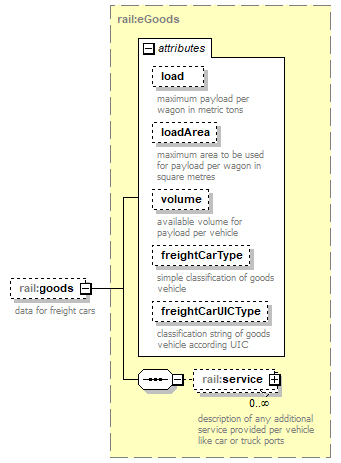 |
||||||||||||||||||||||||||||||||||||||||||||||
| namespace | https://www.railml.org/schemas/2018 | ||||||||||||||||||||||||||||||||||||||||||||||
| type | rail:eGoods | ||||||||||||||||||||||||||||||||||||||||||||||
| properties |
|
||||||||||||||||||||||||||||||||||||||||||||||
| children | rail:service | ||||||||||||||||||||||||||||||||||||||||||||||
| attributes |
|
||||||||||||||||||||||||||||||||||||||||||||||
| annotation |
|
||||||||||||||||||||||||||||||||||||||||||||||
| source | <xs:element name="goods" type="rail:eGoods" minOccurs="0"> <xs:annotation> <xs:documentation>data for freight cars</xs:documentation> <xs:documentation source="http://wiki.railml.org/index.php?title=RS:goods"/> </xs:annotation> </xs:element> |
element eWagon/auxiliarySupplySystem
| diagram | 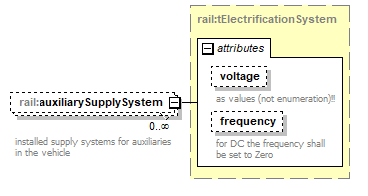 |
||||||||||||||||||||||
| namespace | https://www.railml.org/schemas/2018 | ||||||||||||||||||||||
| type | rail:tElectrificationSystem | ||||||||||||||||||||||
| properties |
|
||||||||||||||||||||||
| attributes |
|
||||||||||||||||||||||
| annotation |
|
||||||||||||||||||||||
| source | <xs:element name="auxiliarySupplySystem" type="rail:tElectrificationSystem" minOccurs="0" maxOccurs="unbounded"> <xs:annotation> <xs:documentation>installed supply systems for auxiliaries in the vehicle</xs:documentation> <xs:documentation source="http://wiki.railml.org/index.php?title=RS:auxiliarySupplySystem"/> </xs:annotation> </xs:element> |
element eWagon/driversCab
| diagram | 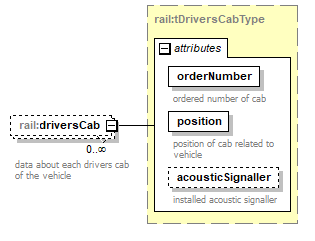 |
||||||||||||||||||||||||||||||
| namespace | https://www.railml.org/schemas/2018 | ||||||||||||||||||||||||||||||
| type | rail:tDriversCabType | ||||||||||||||||||||||||||||||
| properties |
|
||||||||||||||||||||||||||||||
| attributes |
|
||||||||||||||||||||||||||||||
| annotation |
|
||||||||||||||||||||||||||||||
| source | <xs:element name="driversCab" type="rail:tDriversCabType" minOccurs="0" maxOccurs="unbounded"> <xs:annotation> <xs:documentation>data about each drivers cab of the vehicle</xs:documentation> <xs:documentation source="http://wiki.railml.org/index.php?title=RS:driversCab"/> </xs:annotation> </xs:element> |
element eWagon/rackTraction
| diagram | 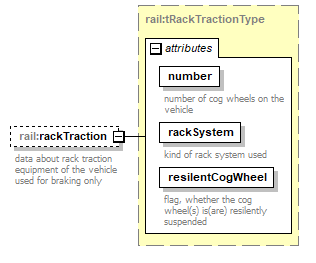 |
||||||||||||||||||||||||||||||
| namespace | https://www.railml.org/schemas/2018 | ||||||||||||||||||||||||||||||
| type | rail:tRackTractionType | ||||||||||||||||||||||||||||||
| properties |
|
||||||||||||||||||||||||||||||
| attributes |
|
||||||||||||||||||||||||||||||
| annotation |
|
||||||||||||||||||||||||||||||
| source | <xs:element name="rackTraction" type="rail:tRackTractionType" minOccurs="0"> <xs:annotation> <xs:documentation>data about rack traction equipment of the vehicle used for braking only</xs:documentation> <xs:documentation source="http://wiki.railml.org/index.php?title=RS:rackTraction_wagon"/> </xs:annotation> </xs:element> |
element eWagon/couplers
| diagram | 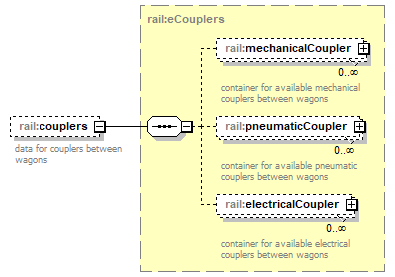 |
||||||
| namespace | https://www.railml.org/schemas/2018 | ||||||
| type | rail:eCouplers | ||||||
| properties |
|
||||||
| children | rail:mechanicalCoupler rail:pneumaticCoupler rail:electricalCoupler | ||||||
| annotation |
|
||||||
| source | <xs:element name="couplers" type="rail:eCouplers" minOccurs="0"> <xs:annotation> <xs:documentation>data for couplers between wagons</xs:documentation> <xs:documentation source="http://wiki.railml.org/index.php?title=RS:couplers"/> </xs:annotation> </xs:element> |
element eWagon/trainClearanceGauge
| diagram | 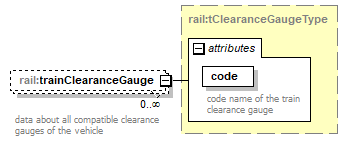 |
||||||||||||||||
| namespace | https://www.railml.org/schemas/2018 | ||||||||||||||||
| type | rail:tClearanceGaugeType | ||||||||||||||||
| properties |
|
||||||||||||||||
| attributes |
|
||||||||||||||||
| annotation |
|
||||||||||||||||
| source | <xs:element name="trainClearanceGauge" type="rail:tClearanceGaugeType" minOccurs="0" maxOccurs="unbounded"> <xs:annotation> <xs:documentation>data about all compatible clearance gauges of the vehicle</xs:documentation> <xs:documentation source="http://wiki.railml.org/index.php?title=RS:trainClearanceGauge"/> </xs:annotation> </xs:element> |
element timetable
| diagram |  |
||||||||||||||||||||||||||||||||||||||||||||||||||||||||||||||||||||||||||||||||||||||||||||||||||||||||||||||||||||||||||||||
| namespace | https://www.railml.org/schemas/2018 | ||||||||||||||||||||||||||||||||||||||||||||||||||||||||||||||||||||||||||||||||||||||||||||||||||||||||||||||||||||||||||||||
| type | extension of rail:tTimetable | ||||||||||||||||||||||||||||||||||||||||||||||||||||||||||||||||||||||||||||||||||||||||||||||||||||||||||||||||||||||||||||||
| properties |
|
||||||||||||||||||||||||||||||||||||||||||||||||||||||||||||||||||||||||||||||||||||||||||||||||||||||||||||||||||||||||||||||
| children | rail:additionalName rail:metadata rail:timetablePeriods rail:operatingPeriods rail:categories rail:annotations rail:trainParts rail:trains rail:trainGroups rail:rosterings | ||||||||||||||||||||||||||||||||||||||||||||||||||||||||||||||||||||||||||||||||||||||||||||||||||||||||||||||||||||||||||||||
| used by |
|
||||||||||||||||||||||||||||||||||||||||||||||||||||||||||||||||||||||||||||||||||||||||||||||||||||||||||||||||||||||||||||||
| attributes |
|
||||||||||||||||||||||||||||||||||||||||||||||||||||||||||||||||||||||||||||||||||||||||||||||||||||||||||||||||||||||||||||||
| identity constraints |
|
||||||||||||||||||||||||||||||||||||||||||||||||||||||||||||||||||||||||||||||||||||||||||||||||||||||||||||||||||||||||||||||
| source | <xs:element name="timetable"> <xs:complexType> <xs:annotation> <xs:documentation source="http://wiki.railml.org/index.php?title=TT:timetable"/> </xs:annotation> <xs:complexContent> <xs:extension base="rail:tTimetable"> <xs:sequence> <xs:element name="timetablePeriods" type="rail:eTimetablePeriods" minOccurs="0"> <xs:annotation> <xs:documentation source="http://wiki.railml.org/index.php?title=TT:timetablePeriods"/> </xs:annotation> </xs:element> <xs:element name="operatingPeriods" type="rail:eOperatingPeriods" minOccurs="0"> <xs:annotation> <xs:documentation source="http://wiki.railml.org/index.php?title=TT:operatingPeriods"/> </xs:annotation> </xs:element> <xs:element name="categories" type="rail:eCategories" minOccurs="0"> <xs:annotation> <xs:documentation source="http://wiki.railml.org/index.php?title=TT:categories"/> </xs:annotation> </xs:element> <xs:element name="annotations" type="rail:eAnnotations" minOccurs="0"> <xs:annotation> <xs:documentation source="http://wiki.railml.org/index.php?title=TT:annotations"/> </xs:annotation> </xs:element> <xs:element name="trainParts" type="rail:eTrainParts" minOccurs="0"> <xs:annotation> <xs:documentation source="http://wiki.railml.org/index.php?title=TT:trainParts"/> </xs:annotation> </xs:element> <xs:element name="trains" type="rail:eTrains" minOccurs="0"> <xs:annotation> <xs:documentation source="http://wiki.railml.org/index.php?title=TT:trains"/> </xs:annotation> </xs:element> <xs:element name="trainGroups" type="rail:eTrainGroups" minOccurs="0"> <xs:annotation> <xs:documentation source="http://wiki.railml.org/index.php?title=TT:trainGroups"/> </xs:annotation> </xs:element> <xs:element name="rosterings" type="rail:eRosterings" minOccurs="0"> <xs:annotation> <xs:documentation source="http://wiki.railml.org/index.php?title=TT:rosterings"/> </xs:annotation> </xs:element> </xs:sequence> </xs:extension> </xs:complexContent> </xs:complexType> <xs:key name="timetablePeriodKey"> <xs:selector xpath=".//rail:timetablePeriods/rail:timetablePeriod"/> <xs:field xpath="@id"/> </xs:key> <xs:keyref name="timetablePeriod-operatingPeriodKeyref" refer="rail:timetablePeriodKey"> <xs:selector xpath=".//rail:operatingPeriods/rail:operatingPeriod"/> <xs:field xpath="@timetablePeriodRef"/> </xs:keyref> <xs:keyref name="timetablePeriod-trainPartKeyref" refer="rail:timetablePeriodKey"> <xs:selector xpath=".//rail:trainParts/rail:trainPart"/> <xs:field xpath="@timetablePeriodRef"/> </xs:keyref> <xs:key name="trainPartKey"> <xs:selector xpath=".//rail:trainParts/rail:trainPart"/> <xs:field xpath="@id"/> </xs:key> <xs:keyref name="trainPart-trainPartSequenceKeyref" refer="rail:trainPartKey"> <xs:selector xpath=".//rail:trains/rail:train/rail:trainPartSequence/rail:trainPartRef"/> <xs:field xpath="@ref"/> </xs:keyref> <xs:keyref name="trainPart-blockPartKeyref" refer="rail:trainPartKey"> <xs:selector xpath=".//rail:blockParts/rail:blockPart"/> <xs:field xpath="@trainPartRef"/> </xs:keyref> <xs:keyref name="trainPart-connectionKeyref" refer="rail:trainPartKey"> <xs:selector xpath=".//rail:connections/rail:connection"/> <xs:field xpath="@trainPartRef"/> </xs:keyref> <xs:key name="trainKey"> <xs:selector xpath=".//rail:trains/rail:train"/> <xs:field xpath="@id"/> </xs:key> <xs:keyref name="train-trainGroupKeyref" refer="rail:trainKey"> <xs:selector xpath=".//rail:trainGroups/rail:trainGroup/rail:trainRef"/> <xs:field xpath="@ref"/> </xs:keyref> <xs:keyref name="train-connectionKeyref" refer="rail:trainKey"> <xs:selector xpath=".//rail:connections/rail:connection"/> <xs:field xpath="@trainRef"/> </xs:keyref> <xs:key name="blockPartKey"> <xs:selector xpath=".//rail:blockParts/rail:blockPart"/> <xs:field xpath="@id"/> </xs:key> <xs:keyref name="blockPart-blockPartSequenceKeyref" refer="rail:blockPartKey"> <xs:selector xpath=".//rail:blocks/rail:block/rail:blockPartSequence/rail:blockPartRef"/> <xs:field xpath="@ref"/> </xs:keyref> <xs:key name="blockKey"> <xs:selector xpath=".//rail:blocks/rail:block"/> <xs:field xpath="@id"/> </xs:key> <xs:keyref name="block-blockPartSequenceKeyref" refer="rail:blockKey"> <xs:selector xpath=".//rail:blocks/rail:block/rail:blockPartSequence"/> <xs:field xpath="@basicBlockRef"/> </xs:keyref> <xs:keyref name="block-circulationKeyref" refer="rail:blockKey"> <xs:selector xpath=".//rail:circulations/rail:circulation"/> <xs:field xpath="@blockRef"/> </xs:keyref> <xs:keyref name="block-circulationNextKeyref" refer="rail:blockKey"> <xs:selector xpath=".//rail:circulations/rail:circulation"/> <xs:field xpath="@nextBlockRef"/> </xs:keyref> <!-- annotation identity in timetable subschema --> <xs:key name="annotationKey"> <xs:selector xpath=".//rail:annotations/rail:annotation"/> <xs:field xpath="@id"/> </xs:key> <!-- annotation reference in timetable subschema --> <xs:keyref name="annotation-trainPartKeyref" refer="rail:annotationKey"> <xs:selector xpath=".//rail:trainParts/rail:trainPart/rail:annotationRef"/> <xs:field xpath="@ref"/> </xs:keyref> <xs:keyref name="annotation-stopDescriptionKeyref" refer="rail:annotationKey"> <xs:selector xpath=".//rail:ocpsTT/rail:ocpTT/rail:stopDescription/rail:annotationRef"/> <xs:field xpath="@ref"/> </xs:keyref> <xs:keyref name="annotation-connectionKeyref" refer="rail:annotationKey"> <xs:selector xpath=".//rail:ocpsTT/rail:ocpTT/rail:connections/rail:connection/rail:annotationRef"/> <xs:field xpath="@ref"/> </xs:keyref> </xs:element> |
element timetable/timetablePeriods
| diagram |  |
||||||
| namespace | https://www.railml.org/schemas/2018 | ||||||
| type | rail:eTimetablePeriods | ||||||
| properties |
|
||||||
| children | rail:timetablePeriod | ||||||
| source | <xs:element name="timetablePeriods" type="rail:eTimetablePeriods" minOccurs="0"> <xs:annotation> <xs:documentation source="http://wiki.railml.org/index.php?title=TT:timetablePeriods"/> </xs:annotation> </xs:element> |
element timetable/operatingPeriods
| diagram |  |
||||||
| namespace | https://www.railml.org/schemas/2018 | ||||||
| type | rail:eOperatingPeriods | ||||||
| properties |
|
||||||
| children | rail:operatingPeriod | ||||||
| source | <xs:element name="operatingPeriods" type="rail:eOperatingPeriods" minOccurs="0"> <xs:annotation> <xs:documentation source="http://wiki.railml.org/index.php?title=TT:operatingPeriods"/> </xs:annotation> </xs:element> |
element timetable/categories
| diagram |  |
||||||
| namespace | https://www.railml.org/schemas/2018 | ||||||
| type | rail:eCategories | ||||||
| properties |
|
||||||
| children | rail:category | ||||||
| source | <xs:element name="categories" type="rail:eCategories" minOccurs="0"> <xs:annotation> <xs:documentation source="http://wiki.railml.org/index.php?title=TT:categories"/> </xs:annotation> </xs:element> |
element timetable/annotations
| diagram |  |
||||||
| namespace | https://www.railml.org/schemas/2018 | ||||||
| type | rail:eAnnotations | ||||||
| properties |
|
||||||
| children | rail:annotation | ||||||
| source | <xs:element name="annotations" type="rail:eAnnotations" minOccurs="0"> <xs:annotation> <xs:documentation source="http://wiki.railml.org/index.php?title=TT:annotations"/> </xs:annotation> </xs:element> |
element timetable/trainParts
| diagram |  |
||||||
| namespace | https://www.railml.org/schemas/2018 | ||||||
| type | rail:eTrainParts | ||||||
| properties |
|
||||||
| children | rail:trainPart | ||||||
| source | <xs:element name="trainParts" type="rail:eTrainParts" minOccurs="0"> <xs:annotation> <xs:documentation source="http://wiki.railml.org/index.php?title=TT:trainParts"/> </xs:annotation> </xs:element> |
element timetable/trains
| diagram |  |
||||||
| namespace | https://www.railml.org/schemas/2018 | ||||||
| type | rail:eTrains | ||||||
| properties |
|
||||||
| children | rail:train | ||||||
| source | <xs:element name="trains" type="rail:eTrains" minOccurs="0"> <xs:annotation> <xs:documentation source="http://wiki.railml.org/index.php?title=TT:trains"/> </xs:annotation> </xs:element> |
element timetable/trainGroups
| diagram |  |
||||||
| namespace | https://www.railml.org/schemas/2018 | ||||||
| type | rail:eTrainGroups | ||||||
| properties |
|
||||||
| children | rail:trainGroup | ||||||
| source | <xs:element name="trainGroups" type="rail:eTrainGroups" minOccurs="0"> <xs:annotation> <xs:documentation source="http://wiki.railml.org/index.php?title=TT:trainGroups"/> </xs:annotation> </xs:element> |
element timetable/rosterings
| diagram |  |
||||||
| namespace | https://www.railml.org/schemas/2018 | ||||||
| type | rail:eRosterings | ||||||
| properties |
|
||||||
| children | rail:rostering | ||||||
| source | <xs:element name="rosterings" type="rail:eRosterings" minOccurs="0"> <xs:annotation> <xs:documentation source="http://wiki.railml.org/index.php?title=TT:rosterings"/> </xs:annotation> </xs:element> |
complexType eAnnotation
| diagram | 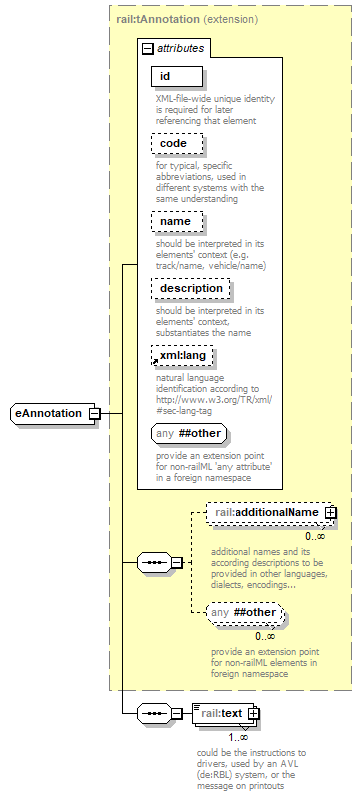 |
||||||||||||||||||||||||||||||||||||||||||||||
| namespace | https://www.railml.org/schemas/2018 | ||||||||||||||||||||||||||||||||||||||||||||||
| type | extension of rail:tAnnotation | ||||||||||||||||||||||||||||||||||||||||||||||
| properties |
|
||||||||||||||||||||||||||||||||||||||||||||||
| children | rail:additionalName rail:text | ||||||||||||||||||||||||||||||||||||||||||||||
| used by |
|
||||||||||||||||||||||||||||||||||||||||||||||
| attributes |
|
||||||||||||||||||||||||||||||||||||||||||||||
| source | <xs:complexType name="eAnnotation"> <xs:complexContent> <xs:extension base="rail:tAnnotation"> <xs:sequence> <xs:element name="text" type="rail:tAnnotationText" maxOccurs="unbounded"> <xs:annotation> <xs:documentation>could be the instructions to drivers, used by an AVL (de:RBL) system, or the message on printouts</xs:documentation> <xs:documentation source="http://wiki.railml.org/index.php?title=TT:text_annotation"/> </xs:annotation> </xs:element> </xs:sequence> </xs:extension> </xs:complexContent> </xs:complexType> |
element eAnnotation/text
| diagram | 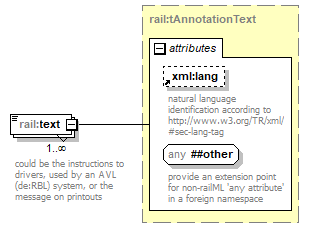 |
||||||||||||||
| namespace | https://www.railml.org/schemas/2018 | ||||||||||||||
| type | rail:tAnnotationText | ||||||||||||||
| properties |
|
||||||||||||||
| attributes |
|
||||||||||||||
| annotation |
|
||||||||||||||
| source | <xs:element name="text" type="rail:tAnnotationText" maxOccurs="unbounded"> <xs:annotation> <xs:documentation>could be the instructions to drivers, used by an AVL (de:RBL) system, or the message on printouts</xs:documentation> <xs:documentation source="http://wiki.railml.org/index.php?title=TT:text_annotation"/> </xs:annotation> </xs:element> |
complexType eAnnotations
| diagram |  |
||
| namespace | https://www.railml.org/schemas/2018 | ||
| children | rail:annotation | ||
| used by |
|
||
| source | <xs:complexType name="eAnnotations"> <xs:sequence> <xs:element name="annotation" type="rail:eAnnotation" maxOccurs="unbounded"> <xs:annotation> <xs:documentation source="http://wiki.railml.org/index.php?title=TT:annotation"/> </xs:annotation> </xs:element> </xs:sequence> </xs:complexType> |
element eAnnotations/annotation
| diagram | 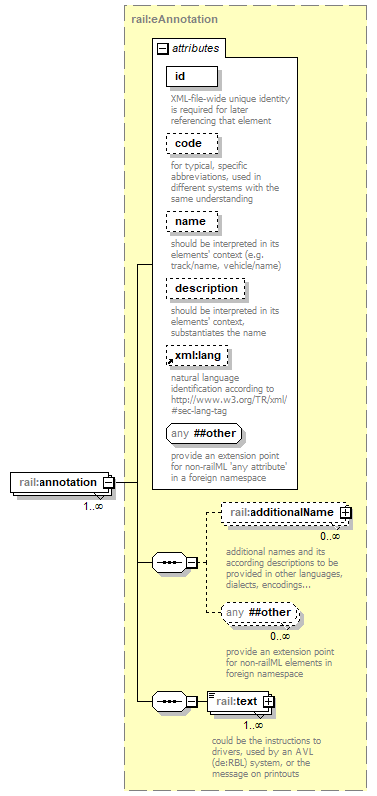 |
||||||||||||||||||||||||||||||||||||||||||||||
| namespace | https://www.railml.org/schemas/2018 | ||||||||||||||||||||||||||||||||||||||||||||||
| type | rail:eAnnotation | ||||||||||||||||||||||||||||||||||||||||||||||
| properties |
|
||||||||||||||||||||||||||||||||||||||||||||||
| children | rail:additionalName rail:text | ||||||||||||||||||||||||||||||||||||||||||||||
| attributes |
|
||||||||||||||||||||||||||||||||||||||||||||||
| source | <xs:element name="annotation" type="rail:eAnnotation" maxOccurs="unbounded"> <xs:annotation> <xs:documentation source="http://wiki.railml.org/index.php?title=TT:annotation"/> </xs:annotation> </xs:element> |
complexType eArrivalDepartureTimes
| diagram | 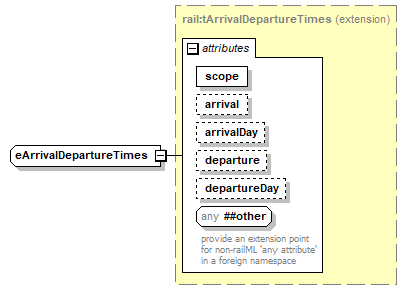 |
||||||||||||||||||||||||||||||||||||
| namespace | https://www.railml.org/schemas/2018 | ||||||||||||||||||||||||||||||||||||
| type | extension of rail:tArrivalDepartureTimes | ||||||||||||||||||||||||||||||||||||
| properties |
|
||||||||||||||||||||||||||||||||||||
| used by |
|
||||||||||||||||||||||||||||||||||||
| attributes |
|
||||||||||||||||||||||||||||||||||||
| source | <xs:complexType name="eArrivalDepartureTimes"> <xs:complexContent> <xs:extension base="rail:tArrivalDepartureTimes"/> </xs:complexContent> </xs:complexType> |
complexType eBlock
| diagram | 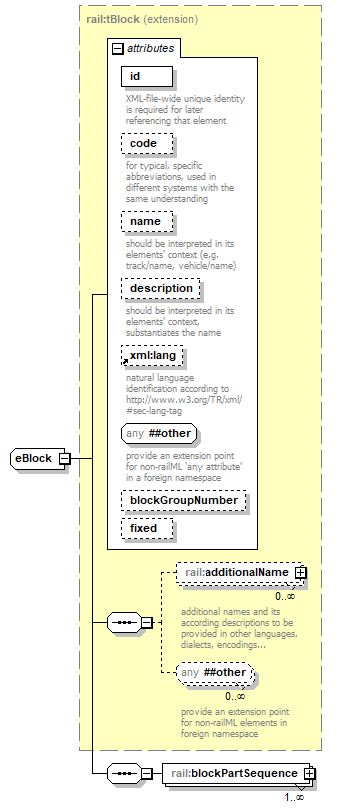 |
||||||||||||||||||||||||||||||||||||||||||||||||||||||||||
| namespace | https://www.railml.org/schemas/2018 | ||||||||||||||||||||||||||||||||||||||||||||||||||||||||||
| type | extension of rail:tBlock | ||||||||||||||||||||||||||||||||||||||||||||||||||||||||||
| properties |
|
||||||||||||||||||||||||||||||||||||||||||||||||||||||||||
| children | rail:additionalName rail:blockPartSequence | ||||||||||||||||||||||||||||||||||||||||||||||||||||||||||
| used by |
|
||||||||||||||||||||||||||||||||||||||||||||||||||||||||||
| attributes |
|
||||||||||||||||||||||||||||||||||||||||||||||||||||||||||
| source | <xs:complexType name="eBlock"> <xs:complexContent> <xs:extension base="rail:tBlock"> <xs:sequence> <xs:element name="blockPartSequence" type="rail:eBlockPartSequence" maxOccurs="unbounded"> <xs:annotation> <xs:documentation source="http://wiki.railml.org/index.php?title=TT:blockPartSequence"/> </xs:annotation> </xs:element> </xs:sequence> </xs:extension> </xs:complexContent> </xs:complexType> |
element eBlock/blockPartSequence
| diagram | 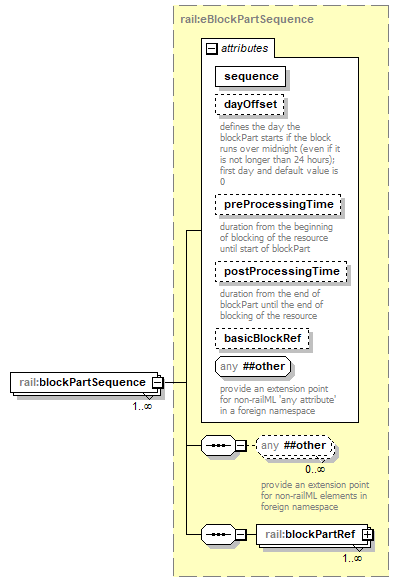 |
||||||||||||||||||||||||||||||||||||||||||
| namespace | https://www.railml.org/schemas/2018 | ||||||||||||||||||||||||||||||||||||||||||
| type | rail:eBlockPartSequence | ||||||||||||||||||||||||||||||||||||||||||
| properties |
|
||||||||||||||||||||||||||||||||||||||||||
| children | rail:blockPartRef | ||||||||||||||||||||||||||||||||||||||||||
| attributes |
|
||||||||||||||||||||||||||||||||||||||||||
| source | <xs:element name="blockPartSequence" type="rail:eBlockPartSequence" maxOccurs="unbounded"> <xs:annotation> <xs:documentation source="http://wiki.railml.org/index.php?title=TT:blockPartSequence"/> </xs:annotation> </xs:element> |
complexType eBlockParts
| diagram | 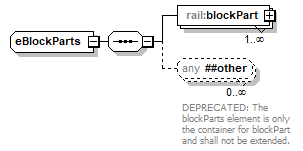 |
||
| namespace | https://www.railml.org/schemas/2018 | ||
| children | rail:blockPart | ||
| used by |
|
||
| source | <xs:complexType name="eBlockParts"> <xs:sequence> <xs:element name="blockPart" type="rail:tBlockPart" maxOccurs="unbounded"> <xs:annotation> <xs:documentation source="http://wiki.railml.org/index.php?title=TT:blockPart"/> </xs:annotation> </xs:element> <xs:any namespace="##other" processContents="strict" minOccurs="0" maxOccurs="unbounded"> <xs:annotation> <xs:documentation>DEPRECATED: The blockParts element is only the container for blockPart and shall not be extended.</xs:documentation> </xs:annotation> </xs:any> </xs:sequence> </xs:complexType> |
element eBlockParts/blockPart
| diagram | 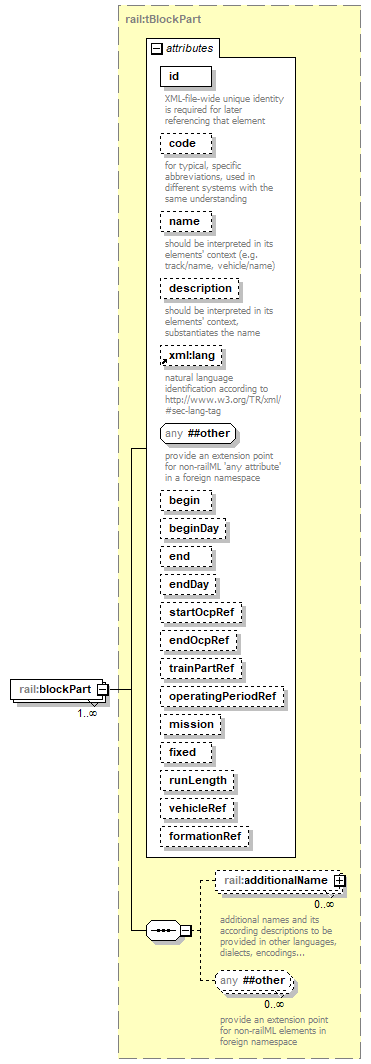 |
||||||||||||||||||||||||||||||||||||||||||||||||||||||||||||||||||||||||||||||||||||||||||||||||||||||||||||||||||||||||||||
| namespace | https://www.railml.org/schemas/2018 | ||||||||||||||||||||||||||||||||||||||||||||||||||||||||||||||||||||||||||||||||||||||||||||||||||||||||||||||||||||||||||||
| type | rail:tBlockPart | ||||||||||||||||||||||||||||||||||||||||||||||||||||||||||||||||||||||||||||||||||||||||||||||||||||||||||||||||||||||||||||
| properties |
|
||||||||||||||||||||||||||||||||||||||||||||||||||||||||||||||||||||||||||||||||||||||||||||||||||||||||||||||||||||||||||||
| children | rail:additionalName | ||||||||||||||||||||||||||||||||||||||||||||||||||||||||||||||||||||||||||||||||||||||||||||||||||||||||||||||||||||||||||||
| attributes |
|
||||||||||||||||||||||||||||||||||||||||||||||||||||||||||||||||||||||||||||||||||||||||||||||||||||||||||||||||||||||||||||
| source | <xs:element name="blockPart" type="rail:tBlockPart" maxOccurs="unbounded"> <xs:annotation> <xs:documentation source="http://wiki.railml.org/index.php?title=TT:blockPart"/> </xs:annotation> </xs:element> |
complexType eBlockPartSequence
| diagram | 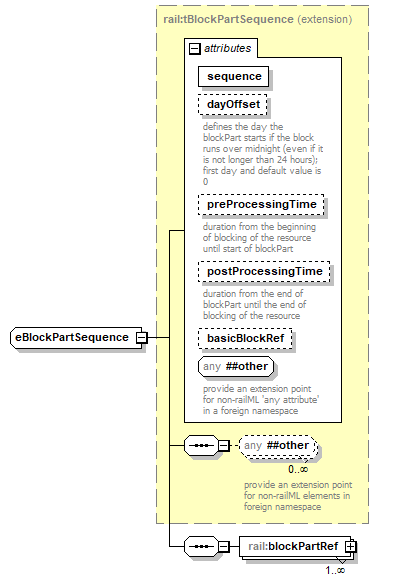 |
||||||||||||||||||||||||||||||||||||||||||
| namespace | https://www.railml.org/schemas/2018 | ||||||||||||||||||||||||||||||||||||||||||
| type | extension of rail:tBlockPartSequence | ||||||||||||||||||||||||||||||||||||||||||
| properties |
|
||||||||||||||||||||||||||||||||||||||||||
| children | rail:blockPartRef | ||||||||||||||||||||||||||||||||||||||||||
| used by |
|
||||||||||||||||||||||||||||||||||||||||||
| attributes |
|
||||||||||||||||||||||||||||||||||||||||||
| source | <xs:complexType name="eBlockPartSequence"> <xs:complexContent> <xs:extension base="rail:tBlockPartSequence"> <xs:sequence> <xs:element name="blockPartRef" type="rail:tBlockPartRef" maxOccurs="unbounded"> <xs:annotation> <xs:documentation source="http://wiki.railml.org/index.php?title=TT:blockPartRef"/> </xs:annotation> </xs:element> </xs:sequence> </xs:extension> </xs:complexContent> </xs:complexType> |
element eBlockPartSequence/blockPartRef
| diagram | 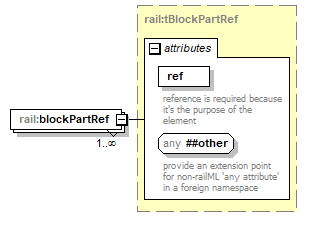 |
||||||||||||||
| namespace | https://www.railml.org/schemas/2018 | ||||||||||||||
| type | rail:tBlockPartRef | ||||||||||||||
| properties |
|
||||||||||||||
| attributes |
|
||||||||||||||
| source | <xs:element name="blockPartRef" type="rail:tBlockPartRef" maxOccurs="unbounded"> <xs:annotation> <xs:documentation source="http://wiki.railml.org/index.php?title=TT:blockPartRef"/> </xs:annotation> </xs:element> |
complexType eBlocks
| diagram |  |
||
| namespace | https://www.railml.org/schemas/2018 | ||
| children | rail:block | ||
| used by |
|
||
| source | <xs:complexType name="eBlocks"> <xs:sequence> <xs:element name="block" type="rail:eBlock" maxOccurs="unbounded"> <xs:annotation> <xs:documentation source="http://wiki.railml.org/index.php?title=TT:block"/> </xs:annotation> </xs:element> </xs:sequence> </xs:complexType> |
element eBlocks/block
| diagram | 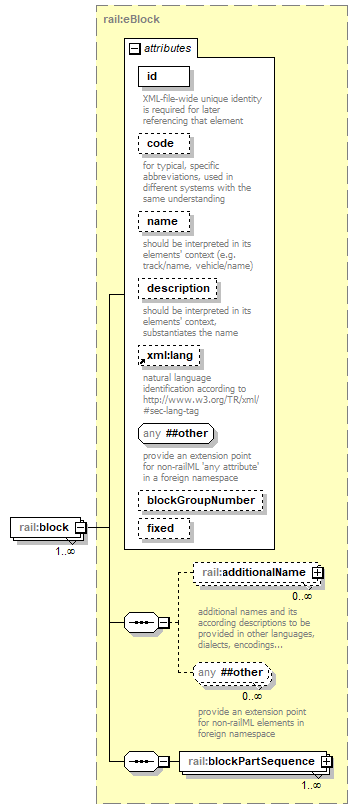 |
||||||||||||||||||||||||||||||||||||||||||||||||||||||||||
| namespace | https://www.railml.org/schemas/2018 | ||||||||||||||||||||||||||||||||||||||||||||||||||||||||||
| type | rail:eBlock | ||||||||||||||||||||||||||||||||||||||||||||||||||||||||||
| properties |
|
||||||||||||||||||||||||||||||||||||||||||||||||||||||||||
| children | rail:additionalName rail:blockPartSequence | ||||||||||||||||||||||||||||||||||||||||||||||||||||||||||
| attributes |
|
||||||||||||||||||||||||||||||||||||||||||||||||||||||||||
| source | <xs:element name="block" type="rail:eBlock" maxOccurs="unbounded"> <xs:annotation> <xs:documentation source="http://wiki.railml.org/index.php?title=TT:block"/> </xs:annotation> </xs:element> |
complexType eBrakeUsage
| diagram | 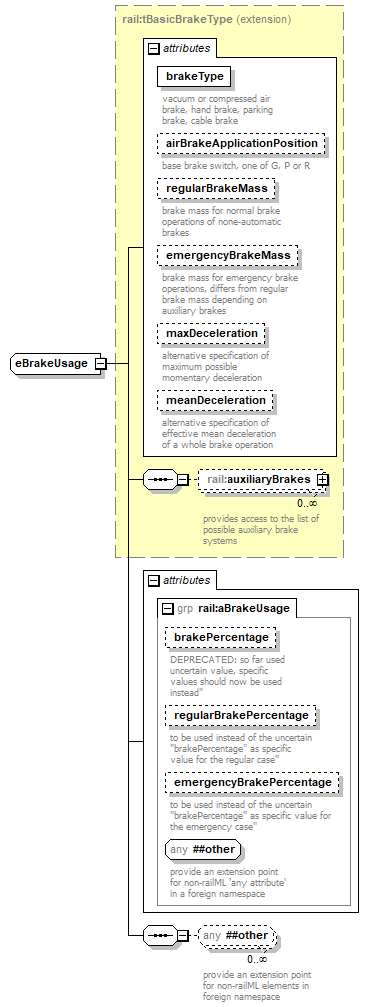 |
||||||||||||||||||||||||||||||||||||||||||||||||||||||||||||||||||||||||||||||
| namespace | https://www.railml.org/schemas/2018 | ||||||||||||||||||||||||||||||||||||||||||||||||||||||||||||||||||||||||||||||
| type | extension of rail:tBasicBrakeType | ||||||||||||||||||||||||||||||||||||||||||||||||||||||||||||||||||||||||||||||
| properties |
|
||||||||||||||||||||||||||||||||||||||||||||||||||||||||||||||||||||||||||||||
| children | rail:auxiliaryBrakes | ||||||||||||||||||||||||||||||||||||||||||||||||||||||||||||||||||||||||||||||
| used by |
|
||||||||||||||||||||||||||||||||||||||||||||||||||||||||||||||||||||||||||||||
| attributes |
|
||||||||||||||||||||||||||||||||||||||||||||||||||||||||||||||||||||||||||||||
| source | <xs:complexType name="eBrakeUsage"> <xs:complexContent> <xs:extension base="rail:tBasicBrakeType"> <xs:sequence> <xs:any namespace="##other" processContents="strict" minOccurs="0" maxOccurs="unbounded"> <xs:annotation> <xs:documentation>provide an extension point for non-railML elements in foreign namespace</xs:documentation> </xs:annotation> </xs:any> </xs:sequence> <xs:attributeGroup ref="rail:aBrakeUsage"/> </xs:extension> </xs:complexContent> </xs:complexType> |
complexType eCategories
| diagram |  |
||
| namespace | https://www.railml.org/schemas/2018 | ||
| children | rail:category | ||
| used by |
|
||
| source | <xs:complexType name="eCategories"> <xs:sequence> <xs:element name="category" type="rail:eCategory" maxOccurs="unbounded"> <xs:annotation> <xs:documentation source="http://wiki.railml.org/index.php?title=TT:category"/> </xs:annotation> </xs:element> </xs:sequence> </xs:complexType> |
element eCategories/category
| diagram | 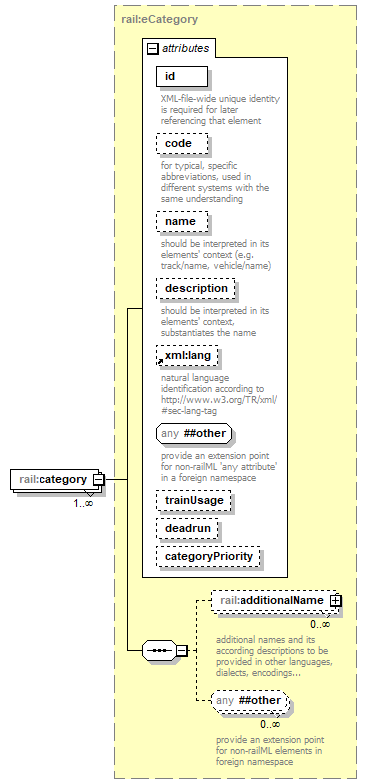 |
||||||||||||||||||||||||||||||||||||||||||||||||||||||||||||||||
| namespace | https://www.railml.org/schemas/2018 | ||||||||||||||||||||||||||||||||||||||||||||||||||||||||||||||||
| type | rail:eCategory | ||||||||||||||||||||||||||||||||||||||||||||||||||||||||||||||||
| properties |
|
||||||||||||||||||||||||||||||||||||||||||||||||||||||||||||||||
| children | rail:additionalName | ||||||||||||||||||||||||||||||||||||||||||||||||||||||||||||||||
| attributes |
|
||||||||||||||||||||||||||||||||||||||||||||||||||||||||||||||||
| source | <xs:element name="category" type="rail:eCategory" maxOccurs="unbounded"> <xs:annotation> <xs:documentation source="http://wiki.railml.org/index.php?title=TT:category"/> </xs:annotation> </xs:element> |
complexType eCategory
| diagram | 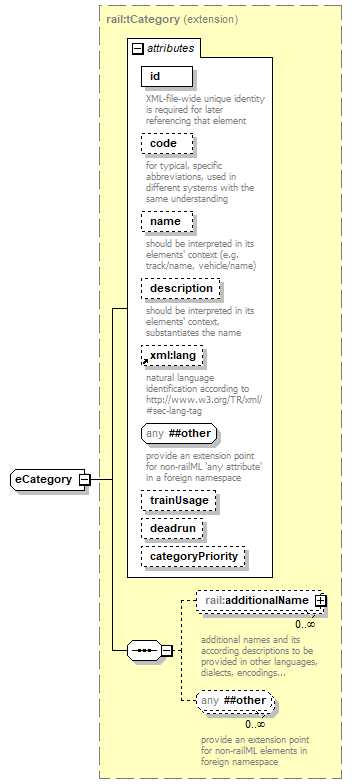 |
||||||||||||||||||||||||||||||||||||||||||||||||||||||||||||||||
| namespace | https://www.railml.org/schemas/2018 | ||||||||||||||||||||||||||||||||||||||||||||||||||||||||||||||||
| type | extension of rail:tCategory | ||||||||||||||||||||||||||||||||||||||||||||||||||||||||||||||||
| properties |
|
||||||||||||||||||||||||||||||||||||||||||||||||||||||||||||||||
| children | rail:additionalName | ||||||||||||||||||||||||||||||||||||||||||||||||||||||||||||||||
| used by |
|
||||||||||||||||||||||||||||||||||||||||||||||||||||||||||||||||
| attributes |
|
||||||||||||||||||||||||||||||||||||||||||||||||||||||||||||||||
| source | <xs:complexType name="eCategory"> <xs:complexContent> <xs:extension base="rail:tCategory"/> </xs:complexContent> </xs:complexType> |
complexType eCirculations
| diagram |  |
||
| namespace | https://www.railml.org/schemas/2018 | ||
| children | rail:circulation | ||
| used by |
|
||
| source | <xs:complexType name="eCirculations"> <xs:sequence> <xs:element name="circulation" type="rail:tCirculation" maxOccurs="unbounded"> <xs:annotation> <xs:documentation source="http://wiki.railml.org/index.php?title=TT:circulation"/> </xs:annotation> </xs:element> </xs:sequence> </xs:complexType> |
element eCirculations/circulation
| diagram | 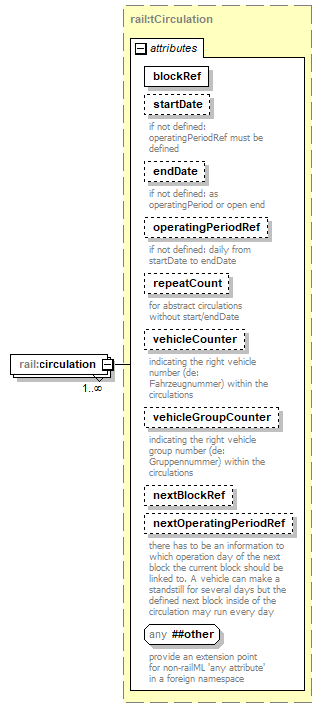 |
||||||||||||||||||||||||||||||||||||||||||||||||||||||||||||||||||||||||||
| namespace | https://www.railml.org/schemas/2018 | ||||||||||||||||||||||||||||||||||||||||||||||||||||||||||||||||||||||||||
| type | rail:tCirculation | ||||||||||||||||||||||||||||||||||||||||||||||||||||||||||||||||||||||||||
| properties |
|
||||||||||||||||||||||||||||||||||||||||||||||||||||||||||||||||||||||||||
| attributes |
|
||||||||||||||||||||||||||||||||||||||||||||||||||||||||||||||||||||||||||
| source | <xs:element name="circulation" type="rail:tCirculation" maxOccurs="unbounded"> <xs:annotation> <xs:documentation source="http://wiki.railml.org/index.php?title=TT:circulation"/> </xs:annotation> </xs:element> |
complexType eConnectionsTT
| diagram |  |
||
| namespace | https://www.railml.org/schemas/2018 | ||
| children | rail:connection | ||
| used by |
|
||
| source | <xs:complexType name="eConnectionsTT"> <xs:sequence> <xs:element name="connection" type="rail:eConnectionTT" minOccurs="0" maxOccurs="unbounded"> <xs:annotation> <xs:documentation source="http://wiki.railml.org/index.php?title=TT:connection"/> </xs:annotation> </xs:element> </xs:sequence> </xs:complexType> |
element eConnectionsTT/connection
| diagram | 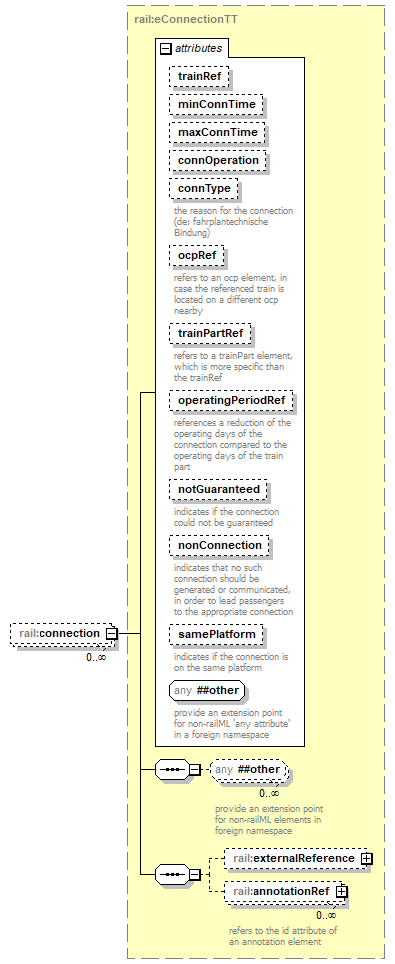 |
||||||||||||||||||||||||||||||||||||||||||||||||||||||||||||||||||||||||||||||||||||||
| namespace | https://www.railml.org/schemas/2018 | ||||||||||||||||||||||||||||||||||||||||||||||||||||||||||||||||||||||||||||||||||||||
| type | rail:eConnectionTT | ||||||||||||||||||||||||||||||||||||||||||||||||||||||||||||||||||||||||||||||||||||||
| properties |
|
||||||||||||||||||||||||||||||||||||||||||||||||||||||||||||||||||||||||||||||||||||||
| children | rail:externalReference rail:annotationRef | ||||||||||||||||||||||||||||||||||||||||||||||||||||||||||||||||||||||||||||||||||||||
| attributes |
|
||||||||||||||||||||||||||||||||||||||||||||||||||||||||||||||||||||||||||||||||||||||
| source | <xs:element name="connection" type="rail:eConnectionTT" minOccurs="0" maxOccurs="unbounded"> <xs:annotation> <xs:documentation source="http://wiki.railml.org/index.php?title=TT:connection"/> </xs:annotation> </xs:element> |
complexType eConnectionTT
| diagram | 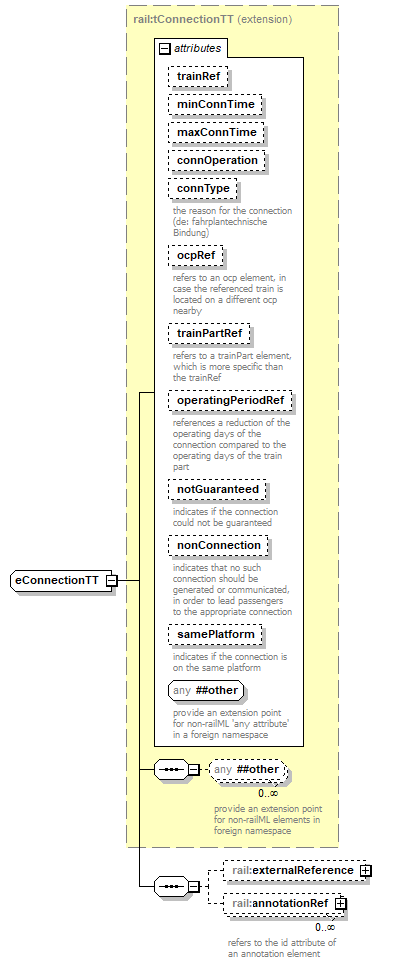 |
||||||||||||||||||||||||||||||||||||||||||||||||||||||||||||||||||||||||||||||||||||||
| namespace | https://www.railml.org/schemas/2018 | ||||||||||||||||||||||||||||||||||||||||||||||||||||||||||||||||||||||||||||||||||||||
| type | extension of rail:tConnectionTT | ||||||||||||||||||||||||||||||||||||||||||||||||||||||||||||||||||||||||||||||||||||||
| properties |
|
||||||||||||||||||||||||||||||||||||||||||||||||||||||||||||||||||||||||||||||||||||||
| children | rail:externalReference rail:annotationRef | ||||||||||||||||||||||||||||||||||||||||||||||||||||||||||||||||||||||||||||||||||||||
| used by |
|
||||||||||||||||||||||||||||||||||||||||||||||||||||||||||||||||||||||||||||||||||||||
| attributes |
|
||||||||||||||||||||||||||||||||||||||||||||||||||||||||||||||||||||||||||||||||||||||
| source | <xs:complexType name="eConnectionTT"> <xs:complexContent> <xs:extension base="rail:tConnectionTT"> <xs:sequence> <xs:element name="externalReference" type="rail:eExternalReference" minOccurs="0"/> <xs:element name="annotationRef" type="rail:tAnnotationRef" minOccurs="0" maxOccurs="unbounded"> <xs:annotation> <xs:documentation>refers to the id attribute of an annotation element</xs:documentation> <xs:documentation source="http://wiki.railml.org/index.php?title=TT:annotationRef_connection"/> </xs:annotation> </xs:element> </xs:sequence> </xs:extension> </xs:complexContent> </xs:complexType> |
element eConnectionTT/externalReference
| diagram | 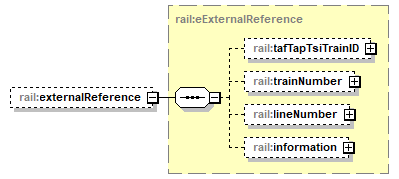 |
||||||
| namespace | https://www.railml.org/schemas/2018 | ||||||
| type | rail:eExternalReference | ||||||
| properties |
|
||||||
| children | rail:tafTapTsiTrainID rail:trainNumber rail:lineNumber rail:information | ||||||
| source | <xs:element name="externalReference" type="rail:eExternalReference" minOccurs="0"/> |
element eConnectionTT/annotationRef
| diagram | 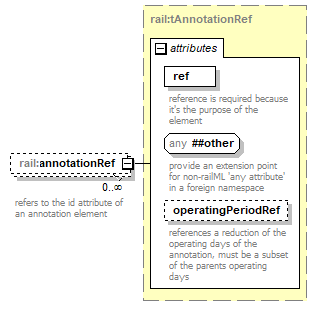 |
||||||||||||||||||||||
| namespace | https://www.railml.org/schemas/2018 | ||||||||||||||||||||||
| type | rail:tAnnotationRef | ||||||||||||||||||||||
| properties |
|
||||||||||||||||||||||
| attributes |
|
||||||||||||||||||||||
| annotation |
|
||||||||||||||||||||||
| source | <xs:element name="annotationRef" type="rail:tAnnotationRef" minOccurs="0" maxOccurs="unbounded"> <xs:annotation> <xs:documentation>refers to the id attribute of an annotation element</xs:documentation> <xs:documentation source="http://wiki.railml.org/index.php?title=TT:annotationRef_connection"/> </xs:annotation> </xs:element> |
complexType eEquipment
| diagram | 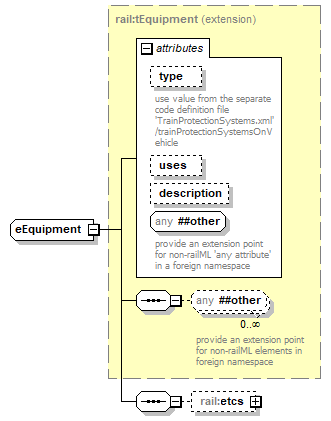 |
||||||||||||||||||||||||||
| namespace | https://www.railml.org/schemas/2018 | ||||||||||||||||||||||||||
| type | extension of rail:tEquipment | ||||||||||||||||||||||||||
| properties |
|
||||||||||||||||||||||||||
| children | rail:etcs | ||||||||||||||||||||||||||
| used by |
|
||||||||||||||||||||||||||
| attributes |
|
||||||||||||||||||||||||||
| source | <xs:complexType name="eEquipment"> <xs:complexContent> <xs:extension base="rail:tEquipment"> <xs:sequence> <xs:element name="etcs" type="rail:tEtcsTT" minOccurs="0"> <xs:annotation> <xs:documentation source="http://wiki.railml.org/index.php?title=TT:etcs"/> </xs:annotation> </xs:element> </xs:sequence> </xs:extension> </xs:complexContent> </xs:complexType> |
element eEquipment/etcs
| diagram | 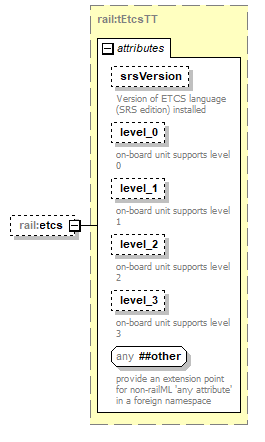 |
||||||||||||||||||||||||||||||||||||||||||||||
| namespace | https://www.railml.org/schemas/2018 | ||||||||||||||||||||||||||||||||||||||||||||||
| type | rail:tEtcsTT | ||||||||||||||||||||||||||||||||||||||||||||||
| properties |
|
||||||||||||||||||||||||||||||||||||||||||||||
| attributes |
|
||||||||||||||||||||||||||||||||||||||||||||||
| source | <xs:element name="etcs" type="rail:tEtcsTT" minOccurs="0"> <xs:annotation> <xs:documentation source="http://wiki.railml.org/index.php?title=TT:etcs"/> </xs:annotation> </xs:element> |
complexType eEquipmentUsage
| diagram |  |
||
| namespace | https://www.railml.org/schemas/2018 | ||
| children | rail:equipment | ||
| used by |
|
||
| source | <xs:complexType name="eEquipmentUsage"> <xs:sequence> <xs:element name="equipment" type="rail:eEquipment" minOccurs="0" maxOccurs="unbounded"> <xs:annotation> <xs:documentation source="http://wiki.railml.org/index.php?title=TT:equipment"/> </xs:annotation> </xs:element> </xs:sequence> </xs:complexType> |
element eEquipmentUsage/equipment
| diagram | 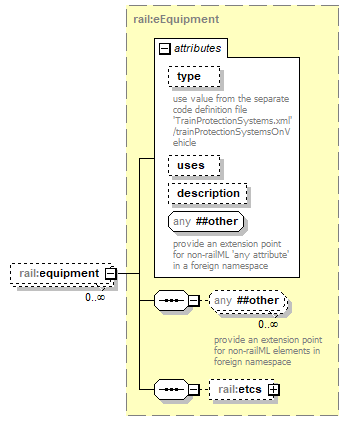 |
||||||||||||||||||||||||||
| namespace | https://www.railml.org/schemas/2018 | ||||||||||||||||||||||||||
| type | rail:eEquipment | ||||||||||||||||||||||||||
| properties |
|
||||||||||||||||||||||||||
| children | rail:etcs | ||||||||||||||||||||||||||
| attributes |
|
||||||||||||||||||||||||||
| source | <xs:element name="equipment" type="rail:eEquipment" minOccurs="0" maxOccurs="unbounded"> <xs:annotation> <xs:documentation source="http://wiki.railml.org/index.php?title=TT:equipment"/> </xs:annotation> </xs:element> |
complexType eExternalReference
| diagram | 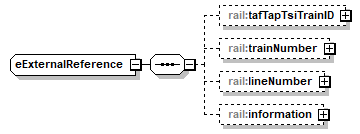 |
||
| namespace | https://www.railml.org/schemas/2018 | ||
| children | rail:tafTapTsiTrainID rail:trainNumber rail:lineNumber rail:information | ||
| used by |
|
||
| source | <xs:complexType name="eExternalReference"> <xs:sequence> <xs:element name="tafTapTsiTrainID" type="rail:eTapTsiTransportOperationalIdentifier" minOccurs="0"/> <xs:element name="trainNumber" minOccurs="0"> <xs:complexType> <xs:sequence> <xs:element name="organizationalUnitBinding" type="rail:eOrganizationalUnitBinding" minOccurs="0"> <xs:annotation> <xs:documentation source="http://wiki.railml.org/index.php?title=TT:organizationalUnitBinding"/> </xs:annotation> </xs:element> </xs:sequence> <xs:attribute name="trainNumber" type="xs:string"/> </xs:complexType> </xs:element> <xs:element name="lineNumber" minOccurs="0"> <xs:complexType> <xs:attribute name="lineNumber" type="xs:string"/> </xs:complexType> </xs:element> <xs:element name="information" minOccurs="0"> <xs:complexType> <xs:attribute name="description" type="xs:string"> <xs:annotation> <xs:documentation>Enter the description of the connection - e.g. 'Connection to Berlin via Wolfsburg'</xs:documentation> </xs:annotation> </xs:attribute> </xs:complexType> </xs:element> </xs:sequence> </xs:complexType> |
element eExternalReference/tafTapTsiTrainID
| diagram | 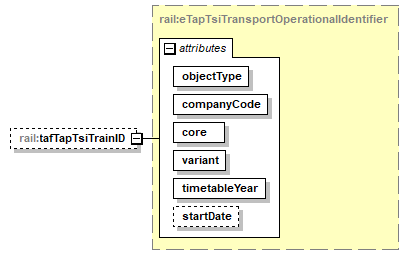 |
||||||||||||||||||||||||||||||||||||||||||
| namespace | https://www.railml.org/schemas/2018 | ||||||||||||||||||||||||||||||||||||||||||
| type | rail:eTapTsiTransportOperationalIdentifier | ||||||||||||||||||||||||||||||||||||||||||
| properties |
|
||||||||||||||||||||||||||||||||||||||||||
| attributes |
|
||||||||||||||||||||||||||||||||||||||||||
| source | <xs:element name="tafTapTsiTrainID" type="rail:eTapTsiTransportOperationalIdentifier" minOccurs="0"/> |
element eExternalReference/trainNumber
| diagram |  |
||||||||||||
| namespace | https://www.railml.org/schemas/2018 | ||||||||||||
| properties |
|
||||||||||||
| children | rail:organizationalUnitBinding | ||||||||||||
| attributes |
|
||||||||||||
| source | <xs:element name="trainNumber" minOccurs="0"> <xs:complexType> <xs:sequence> <xs:element name="organizationalUnitBinding" type="rail:eOrganizationalUnitBinding" minOccurs="0"> <xs:annotation> <xs:documentation source="http://wiki.railml.org/index.php?title=TT:organizationalUnitBinding"/> </xs:annotation> </xs:element> </xs:sequence> <xs:attribute name="trainNumber" type="xs:string"/> </xs:complexType> </xs:element> |
attribute eExternalReference/trainNumber/@trainNumber
| type | xs:string |
| source | <xs:attribute name="trainNumber" type="xs:string"/> |
element eExternalReference/trainNumber/organizationalUnitBinding
| diagram | 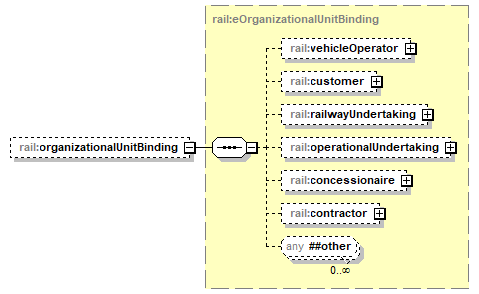 |
||||||
| namespace | https://www.railml.org/schemas/2018 | ||||||
| type | rail:eOrganizationalUnitBinding | ||||||
| properties |
|
||||||
| children | rail:vehicleOperator rail:customer rail:railwayUndertaking rail:operationalUndertaking rail:concessionaire rail:contractor | ||||||
| source | <xs:element name="organizationalUnitBinding" type="rail:eOrganizationalUnitBinding" minOccurs="0"> <xs:annotation> <xs:documentation source="http://wiki.railml.org/index.php?title=TT:organizationalUnitBinding"/> </xs:annotation> </xs:element> |
element eExternalReference/lineNumber
| diagram |  |
||||||||||||
| namespace | https://www.railml.org/schemas/2018 | ||||||||||||
| properties |
|
||||||||||||
| attributes |
|
||||||||||||
| source | <xs:element name="lineNumber" minOccurs="0"> <xs:complexType> <xs:attribute name="lineNumber" type="xs:string"/> </xs:complexType> </xs:element> |
attribute eExternalReference/lineNumber/@lineNumber
| type | xs:string |
| source | <xs:attribute name="lineNumber" type="xs:string"/> |
element eExternalReference/information
| diagram | 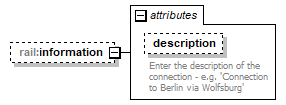 |
||||||||||||||
| namespace | https://www.railml.org/schemas/2018 | ||||||||||||||
| properties |
|
||||||||||||||
| attributes |
|
||||||||||||||
| source | <xs:element name="information" minOccurs="0"> <xs:complexType> <xs:attribute name="description" type="xs:string"> <xs:annotation> <xs:documentation>Enter the description of the connection - e.g. 'Connection to Berlin via Wolfsburg'</xs:documentation> </xs:annotation> </xs:attribute> </xs:complexType> </xs:element> |
attribute eExternalReference/information/@description
| type | xs:string | ||
| annotation |
|
||
| source | <xs:attribute name="description" type="xs:string"> <xs:annotation> <xs:documentation>Enter the description of the connection - e.g. 'Connection to Berlin via Wolfsburg'</xs:documentation> </xs:annotation> </xs:attribute> |
complexType eFormationTT
| diagram | 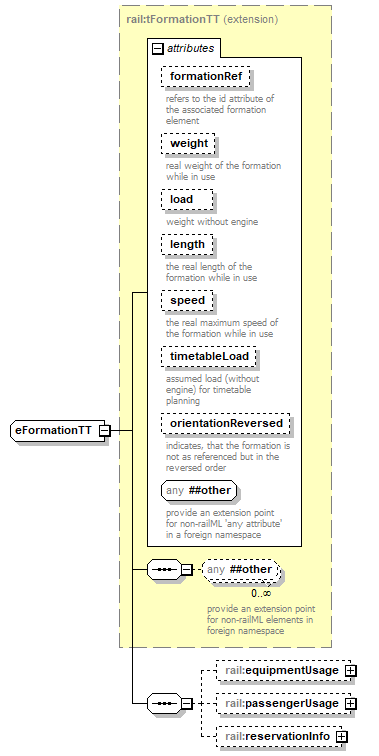 |
||||||||||||||||||||||||||||||||||||||||||||||||||||||||||||||
| namespace | https://www.railml.org/schemas/2018 | ||||||||||||||||||||||||||||||||||||||||||||||||||||||||||||||
| type | extension of rail:tFormationTT | ||||||||||||||||||||||||||||||||||||||||||||||||||||||||||||||
| properties |
|
||||||||||||||||||||||||||||||||||||||||||||||||||||||||||||||
| children | rail:equipmentUsage rail:passengerUsage rail:reservationInfo | ||||||||||||||||||||||||||||||||||||||||||||||||||||||||||||||
| used by |
|
||||||||||||||||||||||||||||||||||||||||||||||||||||||||||||||
| attributes |
|
||||||||||||||||||||||||||||||||||||||||||||||||||||||||||||||
| source | <xs:complexType name="eFormationTT"> <xs:complexContent> <xs:extension base="rail:tFormationTT"> <xs:sequence> <xs:element name="equipmentUsage" type="rail:eEquipmentUsage" minOccurs="0"> <xs:annotation> <xs:documentation source="http://wiki.railml.org/index.php?title=TT:equipmentUsage_formationTT"/> </xs:annotation> </xs:element> <xs:element name="passengerUsage" type="rail:ePassengerFacilityTT" minOccurs="0"> <xs:annotation> <xs:documentation source="http://wiki.railml.org/index.php?title=TT:passengerUsage"/> </xs:annotation> </xs:element> <xs:element name="reservationInfo" type="rail:eReservationInfo" minOccurs="0"> <xs:annotation> <xs:documentation source="http://wiki.railml.org/index.php?title=TT:reservationInfo"/> </xs:annotation> </xs:element> </xs:sequence> </xs:extension> </xs:complexContent> </xs:complexType> |
element eFormationTT/equipmentUsage
| diagram |  |
||||||
| namespace | https://www.railml.org/schemas/2018 | ||||||
| type | rail:eEquipmentUsage | ||||||
| properties |
|
||||||
| children | rail:equipment | ||||||
| source | <xs:element name="equipmentUsage" type="rail:eEquipmentUsage" minOccurs="0"> <xs:annotation> <xs:documentation source="http://wiki.railml.org/index.php?title=TT:equipmentUsage_formationTT"/> </xs:annotation> </xs:element> |
element eFormationTT/passengerUsage
| diagram | 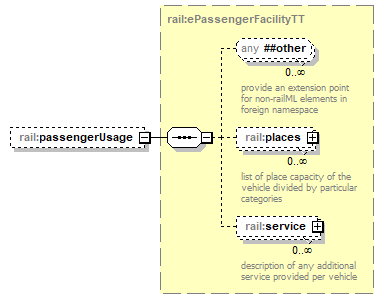 |
||||||
| namespace | https://www.railml.org/schemas/2018 | ||||||
| type | rail:ePassengerFacilityTT | ||||||
| properties |
|
||||||
| children | rail:places rail:service | ||||||
| source | <xs:element name="passengerUsage" type="rail:ePassengerFacilityTT" minOccurs="0"> <xs:annotation> <xs:documentation source="http://wiki.railml.org/index.php?title=TT:passengerUsage"/> </xs:annotation> </xs:element> |
element eFormationTT/reservationInfo
| diagram |  |
||||||
| namespace | https://www.railml.org/schemas/2018 | ||||||
| type | rail:eReservationInfo | ||||||
| properties |
|
||||||
| children | rail:booking | ||||||
| source | <xs:element name="reservationInfo" type="rail:eReservationInfo" minOccurs="0"> <xs:annotation> <xs:documentation source="http://wiki.railml.org/index.php?title=TT:reservationInfo"/> </xs:annotation> </xs:element> |
complexType eHolidays
| diagram |  |
||
| namespace | https://www.railml.org/schemas/2018 | ||
| children | rail:holiday | ||
| used by |
|
||
| source | <xs:complexType name="eHolidays"> <xs:sequence> <xs:element name="holiday" type="rail:tHoliday" maxOccurs="unbounded"> <xs:annotation> <xs:documentation source="http://wiki.railml.org/index.php?title=TT:holiday"/> </xs:annotation> </xs:element> </xs:sequence> </xs:complexType> |
element eHolidays/holiday
| diagram | 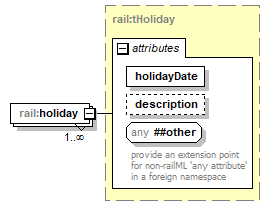 |
||||||||||||||||||
| namespace | https://www.railml.org/schemas/2018 | ||||||||||||||||||
| type | rail:tHoliday | ||||||||||||||||||
| properties |
|
||||||||||||||||||
| attributes |
|
||||||||||||||||||
| source | <xs:element name="holiday" type="rail:tHoliday" maxOccurs="unbounded"> <xs:annotation> <xs:documentation source="http://wiki.railml.org/index.php?title=TT:holiday"/> </xs:annotation> </xs:element> |
complexType eOcpsTT
| diagram |  |
||
| namespace | https://www.railml.org/schemas/2018 | ||
| children | rail:ocpTT | ||
| used by |
|
||
| source | <xs:complexType name="eOcpsTT"> <xs:sequence> <xs:element name="ocpTT" type="rail:eOcpTT" maxOccurs="unbounded"> <xs:annotation> <xs:documentation source="http://wiki.railml.org/index.php?title=TT:ocpTT"/> </xs:annotation> </xs:element> </xs:sequence> </xs:complexType> |
element eOcpsTT/ocpTT
| diagram |  |
||||||||||||||||||||||||||||||||||||||||||||||||||||||||||||||||||||||||||||||||||||||
| namespace | https://www.railml.org/schemas/2018 | ||||||||||||||||||||||||||||||||||||||||||||||||||||||||||||||||||||||||||||||||||||||
| type | rail:eOcpTT | ||||||||||||||||||||||||||||||||||||||||||||||||||||||||||||||||||||||||||||||||||||||
| properties |
|
||||||||||||||||||||||||||||||||||||||||||||||||||||||||||||||||||||||||||||||||||||||
| children | rail:times rail:connections rail:statistics rail:sectionTT rail:stopDescription | ||||||||||||||||||||||||||||||||||||||||||||||||||||||||||||||||||||||||||||||||||||||
| attributes |
|
||||||||||||||||||||||||||||||||||||||||||||||||||||||||||||||||||||||||||||||||||||||
| source | <xs:element name="ocpTT" type="rail:eOcpTT" maxOccurs="unbounded"> <xs:annotation> <xs:documentation source="http://wiki.railml.org/index.php?title=TT:ocpTT"/> </xs:annotation> </xs:element> |
complexType eOcpTT
| diagram |  |
||||||||||||||||||||||||||||||||||||||||||||||||||||||||||||||||||||||||||||||||||||||
| namespace | https://www.railml.org/schemas/2018 | ||||||||||||||||||||||||||||||||||||||||||||||||||||||||||||||||||||||||||||||||||||||
| type | extension of rail:tOcpTT | ||||||||||||||||||||||||||||||||||||||||||||||||||||||||||||||||||||||||||||||||||||||
| properties |
|
||||||||||||||||||||||||||||||||||||||||||||||||||||||||||||||||||||||||||||||||||||||
| children | rail:times rail:connections rail:statistics rail:sectionTT rail:stopDescription | ||||||||||||||||||||||||||||||||||||||||||||||||||||||||||||||||||||||||||||||||||||||
| used by |
|
||||||||||||||||||||||||||||||||||||||||||||||||||||||||||||||||||||||||||||||||||||||
| attributes |
|
||||||||||||||||||||||||||||||||||||||||||||||||||||||||||||||||||||||||||||||||||||||
| source | <xs:complexType name="eOcpTT"> <xs:complexContent> <xs:extension base="rail:tOcpTT"> <xs:sequence> <xs:element name="times" type="rail:eArrivalDepartureTimes" minOccurs="0" maxOccurs="unbounded"> <xs:annotation> <xs:documentation source="http://wiki.railml.org/index.php?title=TT:times"/> </xs:annotation> </xs:element> <xs:element name="connections" type="rail:eConnectionsTT" minOccurs="0"> <xs:annotation> <xs:documentation source="http://wiki.railml.org/index.php?title=TT:connections"/> </xs:annotation> </xs:element> <xs:element name="statistics" type="rail:eStatistics" minOccurs="0"> <xs:annotation> <xs:documentation source="http://wiki.railml.org/index.php?title=TT:statistics"/> </xs:annotation> </xs:element> <xs:element name="sectionTT" type="rail:eSectionTT" minOccurs="0"> <xs:annotation> <xs:documentation source="http://wiki.railml.org/index.php?title=TT:sectionTT"/> </xs:annotation> </xs:element> <xs:element name="stopDescription" type="rail:eStopDescription" minOccurs="0"> <xs:annotation> <xs:documentation source="http://wiki.railml.org/index.php?title=TT:stopDescription"/> </xs:annotation> </xs:element> <xs:any namespace="##other" processContents="strict" minOccurs="0" maxOccurs="unbounded"/> </xs:sequence> </xs:extension> </xs:complexContent> </xs:complexType> |
element eOcpTT/times
| diagram | 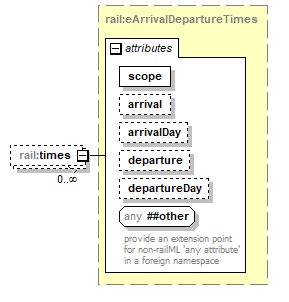 |
||||||||||||||||||||||||||||||||||||
| namespace | https://www.railml.org/schemas/2018 | ||||||||||||||||||||||||||||||||||||
| type | rail:eArrivalDepartureTimes | ||||||||||||||||||||||||||||||||||||
| properties |
|
||||||||||||||||||||||||||||||||||||
| attributes |
|
||||||||||||||||||||||||||||||||||||
| source | <xs:element name="times" type="rail:eArrivalDepartureTimes" minOccurs="0" maxOccurs="unbounded"> <xs:annotation> <xs:documentation source="http://wiki.railml.org/index.php?title=TT:times"/> </xs:annotation> </xs:element> |
element eOcpTT/connections
| diagram |  |
||||||
| namespace | https://www.railml.org/schemas/2018 | ||||||
| type | rail:eConnectionsTT | ||||||
| properties |
|
||||||
| children | rail:connection | ||||||
| source | <xs:element name="connections" type="rail:eConnectionsTT" minOccurs="0"> <xs:annotation> <xs:documentation source="http://wiki.railml.org/index.php?title=TT:connections"/> </xs:annotation> </xs:element> |
element eOcpTT/statistics
| diagram |  |
||||||
| namespace | https://www.railml.org/schemas/2018 | ||||||
| type | rail:eStatistics | ||||||
| properties |
|
||||||
| children | rail:statistic | ||||||
| source | <xs:element name="statistics" type="rail:eStatistics" minOccurs="0"> <xs:annotation> <xs:documentation source="http://wiki.railml.org/index.php?title=TT:statistics"/> </xs:annotation> </xs:element> |
element eOcpTT/sectionTT
| diagram | 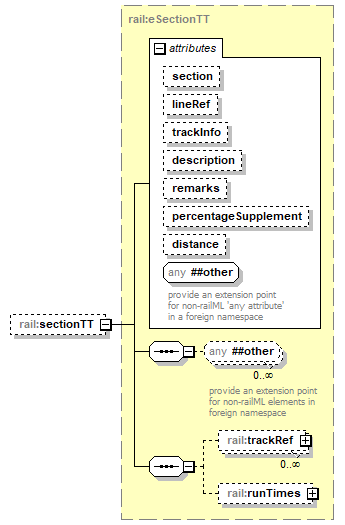 |
||||||||||||||||||||||||||||||||||||||||||||||||
| namespace | https://www.railml.org/schemas/2018 | ||||||||||||||||||||||||||||||||||||||||||||||||
| type | rail:eSectionTT | ||||||||||||||||||||||||||||||||||||||||||||||||
| properties |
|
||||||||||||||||||||||||||||||||||||||||||||||||
| children | rail:trackRef rail:runTimes | ||||||||||||||||||||||||||||||||||||||||||||||||
| attributes |
|
||||||||||||||||||||||||||||||||||||||||||||||||
| source | <xs:element name="sectionTT" type="rail:eSectionTT" minOccurs="0"> <xs:annotation> <xs:documentation source="http://wiki.railml.org/index.php?title=TT:sectionTT"/> </xs:annotation> </xs:element> |
element eOcpTT/stopDescription
| diagram | 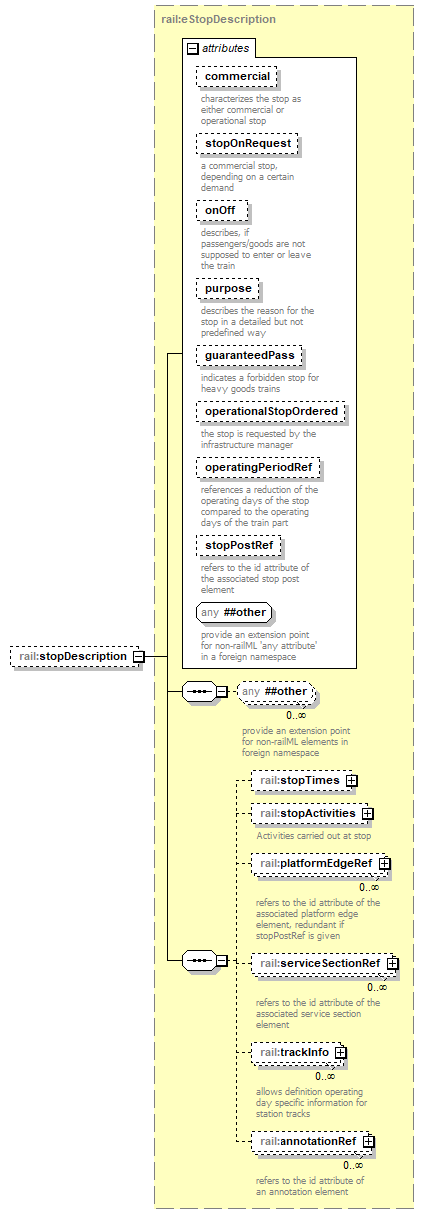 |
||||||||||||||||||||||||||||||||||||||||||||||||||||||||||||||||||||||
| namespace | https://www.railml.org/schemas/2018 | ||||||||||||||||||||||||||||||||||||||||||||||||||||||||||||||||||||||
| type | rail:eStopDescription | ||||||||||||||||||||||||||||||||||||||||||||||||||||||||||||||||||||||
| properties |
|
||||||||||||||||||||||||||||||||||||||||||||||||||||||||||||||||||||||
| children | rail:stopTimes rail:stopActivities rail:platformEdgeRef rail:serviceSectionRef rail:trackInfo rail:annotationRef | ||||||||||||||||||||||||||||||||||||||||||||||||||||||||||||||||||||||
| attributes |
|
||||||||||||||||||||||||||||||||||||||||||||||||||||||||||||||||||||||
| source | <xs:element name="stopDescription" type="rail:eStopDescription" minOccurs="0"> <xs:annotation> <xs:documentation source="http://wiki.railml.org/index.php?title=TT:stopDescription"/> </xs:annotation> </xs:element> |
complexType eOperatingDay
| diagram | 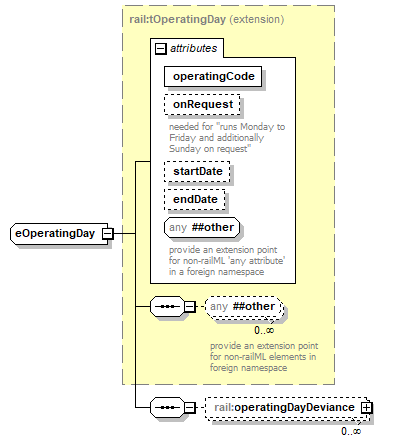 |
||||||||||||||||||||||||||||||||
| namespace | https://www.railml.org/schemas/2018 | ||||||||||||||||||||||||||||||||
| type | extension of rail:tOperatingDay | ||||||||||||||||||||||||||||||||
| properties |
|
||||||||||||||||||||||||||||||||
| children | rail:operatingDayDeviance | ||||||||||||||||||||||||||||||||
| used by |
|
||||||||||||||||||||||||||||||||
| attributes |
|
||||||||||||||||||||||||||||||||
| source | <xs:complexType name="eOperatingDay"> <xs:complexContent> <xs:extension base="rail:tOperatingDay"> <xs:sequence> <xs:element name="operatingDayDeviance" type="rail:tOperatingDayDeviance" minOccurs="0" maxOccurs="unbounded"> <xs:annotation> <xs:documentation source="http://wiki.railml.org/index.php?title=TT:operatingDayDeviance"/> </xs:annotation> </xs:element> </xs:sequence> </xs:extension> </xs:complexContent> </xs:complexType> |
element eOperatingDay/operatingDayDeviance
| diagram | 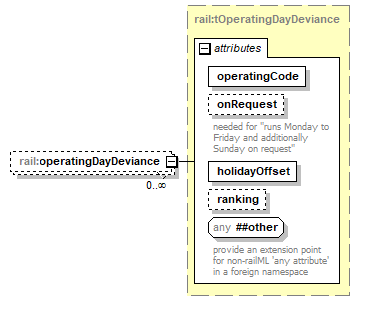 |
||||||||||||||||||||||||||||||||
| namespace | https://www.railml.org/schemas/2018 | ||||||||||||||||||||||||||||||||
| type | rail:tOperatingDayDeviance | ||||||||||||||||||||||||||||||||
| properties |
|
||||||||||||||||||||||||||||||||
| attributes |
|
||||||||||||||||||||||||||||||||
| source | <xs:element name="operatingDayDeviance" type="rail:tOperatingDayDeviance" minOccurs="0" maxOccurs="unbounded"> <xs:annotation> <xs:documentation source="http://wiki.railml.org/index.php?title=TT:operatingDayDeviance"/> </xs:annotation> </xs:element> |
complexType eOperatingPeriod
| diagram | 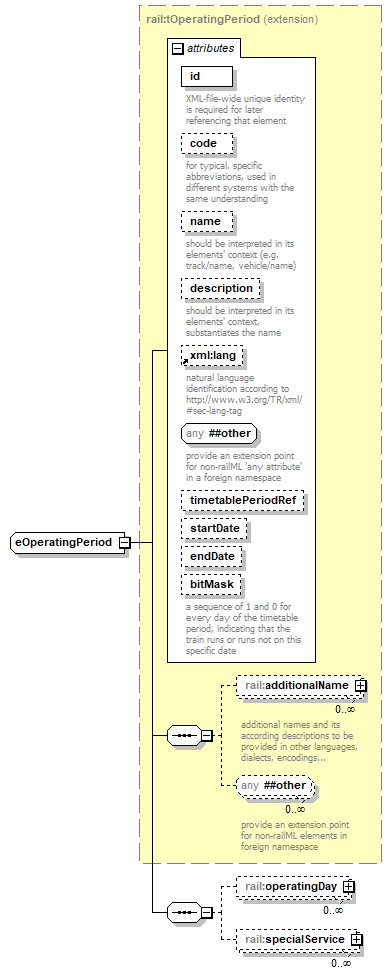 |
||||||||||||||||||||||||||||||||||||||||||||||||||||||||||||||||||||||||
| namespace | https://www.railml.org/schemas/2018 | ||||||||||||||||||||||||||||||||||||||||||||||||||||||||||||||||||||||||
| type | extension of rail:tOperatingPeriod | ||||||||||||||||||||||||||||||||||||||||||||||||||||||||||||||||||||||||
| properties |
|
||||||||||||||||||||||||||||||||||||||||||||||||||||||||||||||||||||||||
| children | rail:additionalName rail:operatingDay rail:specialService | ||||||||||||||||||||||||||||||||||||||||||||||||||||||||||||||||||||||||
| used by |
|
||||||||||||||||||||||||||||||||||||||||||||||||||||||||||||||||||||||||
| attributes |
|
||||||||||||||||||||||||||||||||||||||||||||||||||||||||||||||||||||||||
| source | <xs:complexType name="eOperatingPeriod"> <xs:complexContent> <xs:extension base="rail:tOperatingPeriod"> <xs:sequence> <xs:element name="operatingDay" type="rail:eOperatingDay" minOccurs="0" maxOccurs="unbounded"> <xs:annotation> <xs:documentation source="http://wiki.railml.org/index.php?title=TT:operatingDay"/> </xs:annotation> </xs:element> <xs:element name="specialService" type="rail:tSpecialService" minOccurs="0" maxOccurs="unbounded"> <xs:annotation> <xs:documentation source="http://wiki.railml.org/index.php?title=TT:specialService_operatingPeriod"/> </xs:annotation> </xs:element> </xs:sequence> </xs:extension> </xs:complexContent> </xs:complexType> |
element eOperatingPeriod/operatingDay
| diagram | 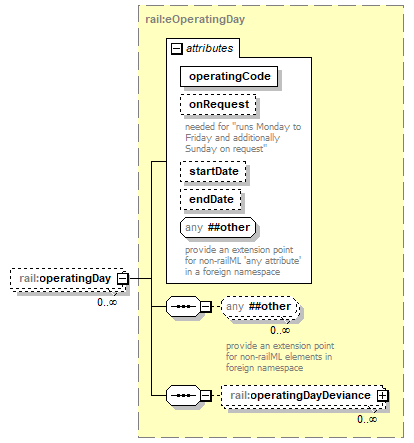 |
||||||||||||||||||||||||||||||||
| namespace | https://www.railml.org/schemas/2018 | ||||||||||||||||||||||||||||||||
| type | rail:eOperatingDay | ||||||||||||||||||||||||||||||||
| properties |
|
||||||||||||||||||||||||||||||||
| children | rail:operatingDayDeviance | ||||||||||||||||||||||||||||||||
| attributes |
|
||||||||||||||||||||||||||||||||
| source | <xs:element name="operatingDay" type="rail:eOperatingDay" minOccurs="0" maxOccurs="unbounded"> <xs:annotation> <xs:documentation source="http://wiki.railml.org/index.php?title=TT:operatingDay"/> </xs:annotation> </xs:element> |
element eOperatingPeriod/specialService
| diagram | 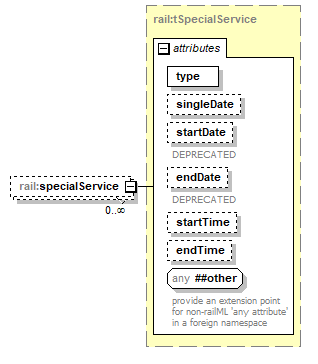 |
||||||||||||||||||||||||||||||||||||||||||||||
| namespace | https://www.railml.org/schemas/2018 | ||||||||||||||||||||||||||||||||||||||||||||||
| type | rail:tSpecialService | ||||||||||||||||||||||||||||||||||||||||||||||
| properties |
|
||||||||||||||||||||||||||||||||||||||||||||||
| attributes |
|
||||||||||||||||||||||||||||||||||||||||||||||
| source | <xs:element name="specialService" type="rail:tSpecialService" minOccurs="0" maxOccurs="unbounded"> <xs:annotation> <xs:documentation source="http://wiki.railml.org/index.php?title=TT:specialService_operatingPeriod"/> </xs:annotation> </xs:element> |
complexType eOperatingPeriodRef
| diagram | 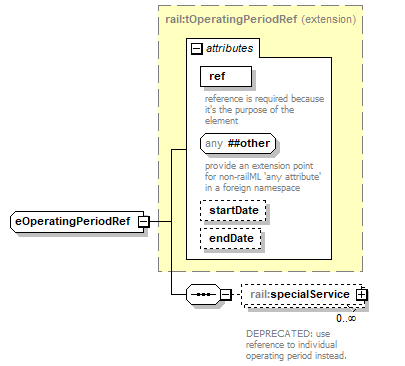 |
||||||||||||||||||||||||||
| namespace | https://www.railml.org/schemas/2018 | ||||||||||||||||||||||||||
| type | extension of rail:tOperatingPeriodRef | ||||||||||||||||||||||||||
| properties |
|
||||||||||||||||||||||||||
| children | rail:specialService | ||||||||||||||||||||||||||
| used by |
|
||||||||||||||||||||||||||
| attributes |
|
||||||||||||||||||||||||||
| source | <xs:complexType name="eOperatingPeriodRef"> <xs:complexContent> <xs:extension base="rail:tOperatingPeriodRef"> <xs:sequence> <xs:element name="specialService" type="rail:tSpecialService" minOccurs="0" maxOccurs="unbounded"> <xs:annotation> <xs:documentation>DEPRECATED: use reference to individual operating period instead.</xs:documentation> <xs:documentation source="http://wiki.railml.org/index.php?title=TT:specialService_operatingPeriodRef"/> </xs:annotation> </xs:element> </xs:sequence> </xs:extension> </xs:complexContent> </xs:complexType> |
element eOperatingPeriodRef/specialService
| diagram | 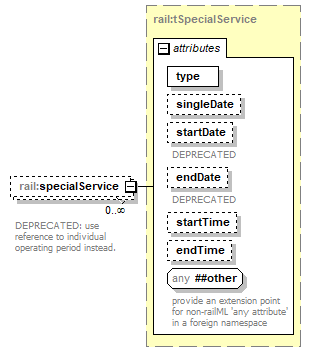 |
||||||||||||||||||||||||||||||||||||||||||||||
| namespace | https://www.railml.org/schemas/2018 | ||||||||||||||||||||||||||||||||||||||||||||||
| type | rail:tSpecialService | ||||||||||||||||||||||||||||||||||||||||||||||
| properties |
|
||||||||||||||||||||||||||||||||||||||||||||||
| attributes |
|
||||||||||||||||||||||||||||||||||||||||||||||
| annotation |
|
||||||||||||||||||||||||||||||||||||||||||||||
| source | <xs:element name="specialService" type="rail:tSpecialService" minOccurs="0" maxOccurs="unbounded"> <xs:annotation> <xs:documentation>DEPRECATED: use reference to individual operating period instead.</xs:documentation> <xs:documentation source="http://wiki.railml.org/index.php?title=TT:specialService_operatingPeriodRef"/> </xs:annotation> </xs:element> |
complexType eOperatingPeriods
| diagram |  |
||
| namespace | https://www.railml.org/schemas/2018 | ||
| children | rail:operatingPeriod | ||
| used by |
|
||
| source | <xs:complexType name="eOperatingPeriods"> <xs:sequence> <xs:element name="operatingPeriod" type="rail:eOperatingPeriod" maxOccurs="unbounded"> <xs:annotation> <xs:documentation source="http://wiki.railml.org/index.php?title=TT:operatingPeriod"/> </xs:annotation> </xs:element> </xs:sequence> </xs:complexType> |
element eOperatingPeriods/operatingPeriod
| diagram | 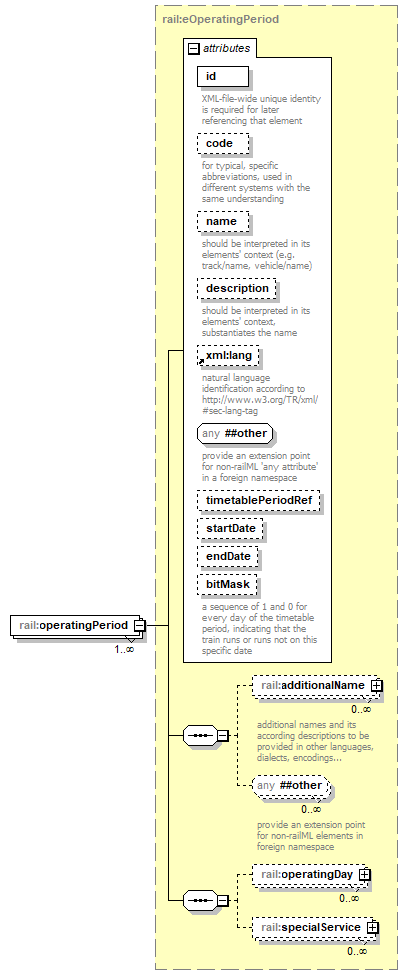 |
||||||||||||||||||||||||||||||||||||||||||||||||||||||||||||||||||||||||
| namespace | https://www.railml.org/schemas/2018 | ||||||||||||||||||||||||||||||||||||||||||||||||||||||||||||||||||||||||
| type | rail:eOperatingPeriod | ||||||||||||||||||||||||||||||||||||||||||||||||||||||||||||||||||||||||
| properties |
|
||||||||||||||||||||||||||||||||||||||||||||||||||||||||||||||||||||||||
| children | rail:additionalName rail:operatingDay rail:specialService | ||||||||||||||||||||||||||||||||||||||||||||||||||||||||||||||||||||||||
| attributes |
|
||||||||||||||||||||||||||||||||||||||||||||||||||||||||||||||||||||||||
| source | <xs:element name="operatingPeriod" type="rail:eOperatingPeriod" maxOccurs="unbounded"> <xs:annotation> <xs:documentation source="http://wiki.railml.org/index.php?title=TT:operatingPeriod"/> </xs:annotation> </xs:element> |
complexType eOrganizationalUnitBinding
| diagram | 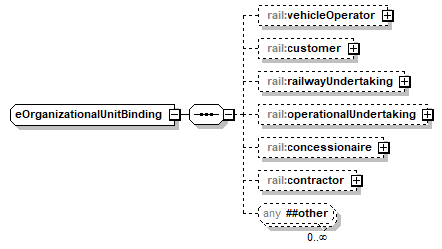 |
||
| namespace | https://www.railml.org/schemas/2018 | ||
| children | rail:vehicleOperator rail:customer rail:railwayUndertaking rail:operationalUndertaking rail:concessionaire rail:contractor | ||
| used by |
|
||
| source | <xs:complexType name="eOrganizationalUnitBinding"> <xs:sequence> <xs:element name="vehicleOperator" type="rail:tElementWithReference" minOccurs="0"> <xs:annotation> <xs:documentation source="http://wiki.railml.org/index.php?title=TT:vehicleOperator"/> </xs:annotation> </xs:element> <xs:element name="customer" type="rail:tElementWithReference" minOccurs="0"> <xs:annotation> <xs:documentation source="http://wiki.railml.org/index.php?title=TT:customer"/> </xs:annotation> </xs:element> <xs:element name="railwayUndertaking" type="rail:tElementWithReference" minOccurs="0"> <xs:annotation> <xs:documentation source="http://wiki.railml.org/index.php?title=TT:railwayUndertaking"/> </xs:annotation> </xs:element> <xs:element name="operationalUndertaking" type="rail:tElementWithReference" minOccurs="0"> <xs:annotation> <xs:documentation source="http://wiki.railml.org/index.php?title=TT:operationalUndertaking"/> </xs:annotation> </xs:element> <xs:element name="concessionaire" type="rail:tElementWithReference" minOccurs="0"> <xs:annotation> <xs:documentation source="http://wiki.railml.org/index.php?title=TT:concessionaire"/> </xs:annotation> </xs:element> <xs:element name="contractor" type="rail:tElementWithReference" minOccurs="0"> <xs:annotation> <xs:documentation source="http://wiki.railml.org/index.php?title=TT:contractor"/> </xs:annotation> </xs:element> <xs:any namespace="##other" processContents="strict" minOccurs="0" maxOccurs="unbounded"/> </xs:sequence> </xs:complexType> |
element eOrganizationalUnitBinding/vehicleOperator
| diagram | 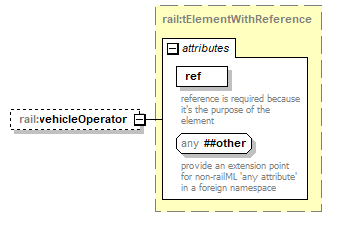 |
||||||||||||||
| namespace | https://www.railml.org/schemas/2018 | ||||||||||||||
| type | rail:tElementWithReference | ||||||||||||||
| properties |
|
||||||||||||||
| attributes |
|
||||||||||||||
| source | <xs:element name="vehicleOperator" type="rail:tElementWithReference" minOccurs="0"> <xs:annotation> <xs:documentation source="http://wiki.railml.org/index.php?title=TT:vehicleOperator"/> </xs:annotation> </xs:element> |
element eOrganizationalUnitBinding/customer
| diagram | 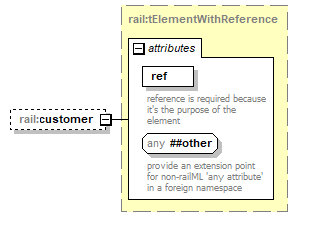 |
||||||||||||||
| namespace | https://www.railml.org/schemas/2018 | ||||||||||||||
| type | rail:tElementWithReference | ||||||||||||||
| properties |
|
||||||||||||||
| attributes |
|
||||||||||||||
| source | <xs:element name="customer" type="rail:tElementWithReference" minOccurs="0"> <xs:annotation> <xs:documentation source="http://wiki.railml.org/index.php?title=TT:customer"/> </xs:annotation> </xs:element> |
element eOrganizationalUnitBinding/railwayUndertaking
| diagram | 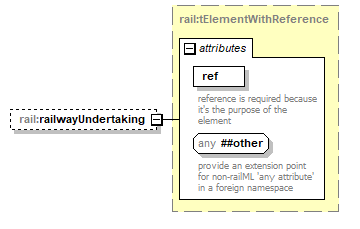 |
||||||||||||||
| namespace | https://www.railml.org/schemas/2018 | ||||||||||||||
| type | rail:tElementWithReference | ||||||||||||||
| properties |
|
||||||||||||||
| attributes |
|
||||||||||||||
| source | <xs:element name="railwayUndertaking" type="rail:tElementWithReference" minOccurs="0"> <xs:annotation> <xs:documentation source="http://wiki.railml.org/index.php?title=TT:railwayUndertaking"/> </xs:annotation> </xs:element> |
element eOrganizationalUnitBinding/operationalUndertaking
| diagram | 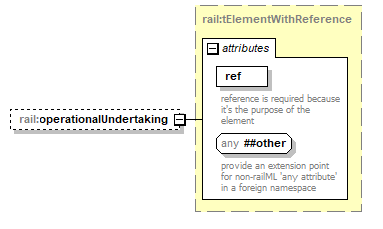 |
||||||||||||||
| namespace | https://www.railml.org/schemas/2018 | ||||||||||||||
| type | rail:tElementWithReference | ||||||||||||||
| properties |
|
||||||||||||||
| attributes |
|
||||||||||||||
| source | <xs:element name="operationalUndertaking" type="rail:tElementWithReference" minOccurs="0"> <xs:annotation> <xs:documentation source="http://wiki.railml.org/index.php?title=TT:operationalUndertaking"/> </xs:annotation> </xs:element> |
element eOrganizationalUnitBinding/concessionaire
| diagram | 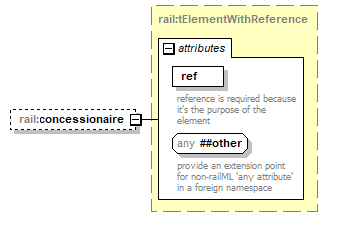 |
||||||||||||||
| namespace | https://www.railml.org/schemas/2018 | ||||||||||||||
| type | rail:tElementWithReference | ||||||||||||||
| properties |
|
||||||||||||||
| attributes |
|
||||||||||||||
| source | <xs:element name="concessionaire" type="rail:tElementWithReference" minOccurs="0"> <xs:annotation> <xs:documentation source="http://wiki.railml.org/index.php?title=TT:concessionaire"/> </xs:annotation> </xs:element> |
element eOrganizationalUnitBinding/contractor
| diagram | 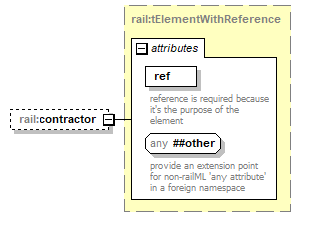 |
||||||||||||||
| namespace | https://www.railml.org/schemas/2018 | ||||||||||||||
| type | rail:tElementWithReference | ||||||||||||||
| properties |
|
||||||||||||||
| attributes |
|
||||||||||||||
| source | <xs:element name="contractor" type="rail:tElementWithReference" minOccurs="0"> <xs:annotation> <xs:documentation source="http://wiki.railml.org/index.php?title=TT:contractor"/> </xs:annotation> </xs:element> |
complexType ePassengerFacilityTT
| diagram | 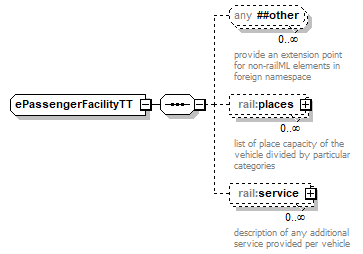 |
||
| namespace | https://www.railml.org/schemas/2018 | ||
| children | rail:places rail:service | ||
| used by |
|
||
| source | <xs:complexType name="ePassengerFacilityTT"> <xs:sequence> <xs:any namespace="##other" processContents="strict" minOccurs="0" maxOccurs="unbounded"> <xs:annotation> <xs:documentation>provide an extension point for non-railML elements in foreign namespace</xs:documentation> </xs:annotation> </xs:any> <xs:element name="places" type="rail:tPlacesTT" minOccurs="0" maxOccurs="unbounded"> <xs:annotation> <xs:documentation>list of place capacity of the vehicle divided by particular categories</xs:documentation> <xs:documentation source="http://wiki.railml.org/index.php?title=TT:places"/> </xs:annotation> </xs:element> <xs:element name="service" type="rail:tService" minOccurs="0" maxOccurs="unbounded"> <xs:annotation> <xs:documentation>description of any additional service provided per vehicle</xs:documentation> <xs:documentation source="http://wiki.railml.org/index.php?title=TT:service"/> </xs:annotation> </xs:element> </xs:sequence> </xs:complexType> |
element ePassengerFacilityTT/places
| diagram | 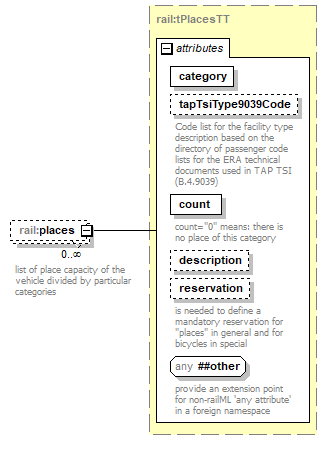 |
||||||||||||||||||||||||||||||||||||||||||||
| namespace | https://www.railml.org/schemas/2018 | ||||||||||||||||||||||||||||||||||||||||||||
| type | rail:tPlacesTT | ||||||||||||||||||||||||||||||||||||||||||||
| properties |
|
||||||||||||||||||||||||||||||||||||||||||||
| attributes |
|
||||||||||||||||||||||||||||||||||||||||||||
| annotation |
|
||||||||||||||||||||||||||||||||||||||||||||
| source | <xs:element name="places" type="rail:tPlacesTT" minOccurs="0" maxOccurs="unbounded"> <xs:annotation> <xs:documentation>list of place capacity of the vehicle divided by particular categories</xs:documentation> <xs:documentation source="http://wiki.railml.org/index.php?title=TT:places"/> </xs:annotation> </xs:element> |
element ePassengerFacilityTT/service
| diagram | 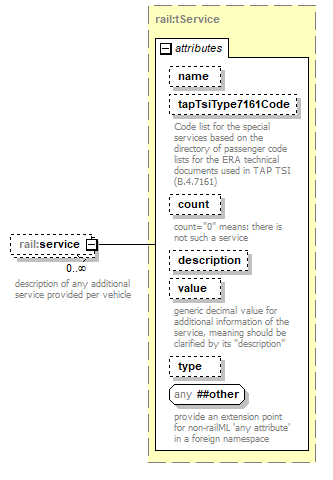 |
||||||||||||||||||||||||||||||||||||||||||||||||||
| namespace | https://www.railml.org/schemas/2018 | ||||||||||||||||||||||||||||||||||||||||||||||||||
| type | rail:tService | ||||||||||||||||||||||||||||||||||||||||||||||||||
| properties |
|
||||||||||||||||||||||||||||||||||||||||||||||||||
| attributes |
|
||||||||||||||||||||||||||||||||||||||||||||||||||
| annotation |
|
||||||||||||||||||||||||||||||||||||||||||||||||||
| source | <xs:element name="service" type="rail:tService" minOccurs="0" maxOccurs="unbounded"> <xs:annotation> <xs:documentation>description of any additional service provided per vehicle</xs:documentation> <xs:documentation source="http://wiki.railml.org/index.php?title=TT:service"/> </xs:annotation> </xs:element> |
complexType eReplacedTrains
| diagram |  |
||
| namespace | https://www.railml.org/schemas/2018 | ||
| children | rail:replacementOf | ||
| used by |
|
||
| source | <xs:complexType name="eReplacedTrains"> <xs:sequence> <xs:element name="replacementOf" type="rail:eReplacementOf" minOccurs="0" maxOccurs="unbounded"/> </xs:sequence> </xs:complexType> |
element eReplacedTrains/replacementOf
| diagram |  |
||||||
| namespace | https://www.railml.org/schemas/2018 | ||||||
| type | rail:eReplacementOf | ||||||
| properties |
|
||||||
| children | rail:operatingPeriodRef rail:tafTapTsiTrainID rail:uniqueTrainKey | ||||||
| source | <xs:element name="replacementOf" type="rail:eReplacementOf" minOccurs="0" maxOccurs="unbounded"/> |
complexType eReplacementOf
| diagram |  |
||
| namespace | https://www.railml.org/schemas/2018 | ||
| children | rail:operatingPeriodRef rail:tafTapTsiTrainID rail:uniqueTrainKey | ||
| used by |
|
||
| source | <xs:complexType name="eReplacementOf"> <xs:sequence> <xs:element name="operatingPeriodRef" type="rail:tOperatingPeriodRef"/> <xs:choice> <xs:element name="tafTapTsiTrainID" type="rail:eTapTsiTransportOperationalIdentifier"/> <xs:element name="uniqueTrainKey" type="rail:tUniqueTrainKey"/> </xs:choice> </xs:sequence> </xs:complexType> |
element eReplacementOf/operatingPeriodRef
| diagram | 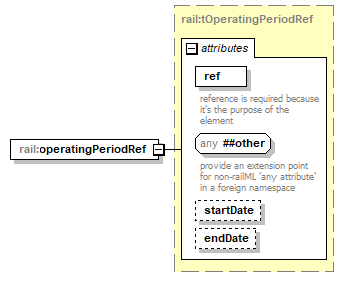 |
||||||||||||||||||||||||||
| namespace | https://www.railml.org/schemas/2018 | ||||||||||||||||||||||||||
| type | rail:tOperatingPeriodRef | ||||||||||||||||||||||||||
| properties |
|
||||||||||||||||||||||||||
| attributes |
|
||||||||||||||||||||||||||
| source | <xs:element name="operatingPeriodRef" type="rail:tOperatingPeriodRef"/> |
element eReplacementOf/tafTapTsiTrainID
| diagram | 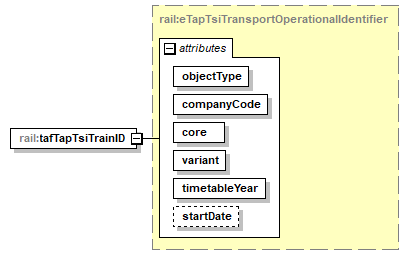 |
||||||||||||||||||||||||||||||||||||||||||
| namespace | https://www.railml.org/schemas/2018 | ||||||||||||||||||||||||||||||||||||||||||
| type | rail:eTapTsiTransportOperationalIdentifier | ||||||||||||||||||||||||||||||||||||||||||
| properties |
|
||||||||||||||||||||||||||||||||||||||||||
| attributes |
|
||||||||||||||||||||||||||||||||||||||||||
| source | <xs:element name="tafTapTsiTrainID" type="rail:eTapTsiTransportOperationalIdentifier"/> |
element eReplacementOf/uniqueTrainKey
| diagram | 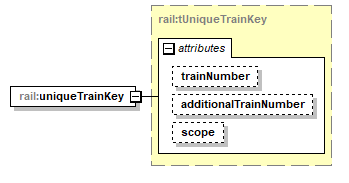 |
||||||||||||||||||||||||
| namespace | https://www.railml.org/schemas/2018 | ||||||||||||||||||||||||
| type | rail:tUniqueTrainKey | ||||||||||||||||||||||||
| properties |
|
||||||||||||||||||||||||
| attributes |
|
||||||||||||||||||||||||
| source | <xs:element name="uniqueTrainKey" type="rail:tUniqueTrainKey"/> |
complexType eReservationInfo
| diagram |  |
||
| namespace | https://www.railml.org/schemas/2018 | ||
| children | rail:booking | ||
| used by |
|
||
| source | <xs:complexType name="eReservationInfo"> <xs:sequence> <xs:element name="booking" type="rail:tBooking" maxOccurs="unbounded"> <xs:annotation> <xs:documentation source="http://wiki.railml.org/index.php?title=TT:booking"/> </xs:annotation> </xs:element> </xs:sequence> </xs:complexType> |
element eReservationInfo/booking
| diagram | 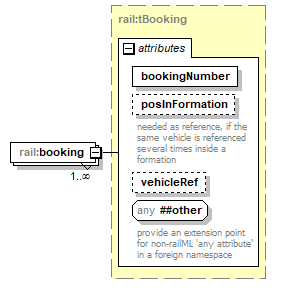 |
||||||||||||||||||||||||||
| namespace | https://www.railml.org/schemas/2018 | ||||||||||||||||||||||||||
| type | rail:tBooking | ||||||||||||||||||||||||||
| properties |
|
||||||||||||||||||||||||||
| attributes |
|
||||||||||||||||||||||||||
| source | <xs:element name="booking" type="rail:tBooking" maxOccurs="unbounded"> <xs:annotation> <xs:documentation source="http://wiki.railml.org/index.php?title=TT:booking"/> </xs:annotation> </xs:element> |
complexType eRostering
| diagram |  |
||||||||||||||||||||||||||||||||||||||||||||||||||||||||||||||||||||||||||||||||||||||||||||||
| namespace | https://www.railml.org/schemas/2018 | ||||||||||||||||||||||||||||||||||||||||||||||||||||||||||||||||||||||||||||||||||||||||||||||
| type | extension of rail:tRostering | ||||||||||||||||||||||||||||||||||||||||||||||||||||||||||||||||||||||||||||||||||||||||||||||
| properties |
|
||||||||||||||||||||||||||||||||||||||||||||||||||||||||||||||||||||||||||||||||||||||||||||||
| children | rail:additionalName rail:blockParts rail:blocks rail:circulations | ||||||||||||||||||||||||||||||||||||||||||||||||||||||||||||||||||||||||||||||||||||||||||||||
| used by |
|
||||||||||||||||||||||||||||||||||||||||||||||||||||||||||||||||||||||||||||||||||||||||||||||
| attributes |
|
||||||||||||||||||||||||||||||||||||||||||||||||||||||||||||||||||||||||||||||||||||||||||||||
| source | <xs:complexType name="eRostering"> <xs:complexContent> <xs:extension base="rail:tRostering"> <xs:sequence> <xs:element name="blockParts" type="rail:eBlockParts"> <xs:annotation> <xs:documentation source="http://wiki.railml.org/index.php?title=TT:blockParts"/> </xs:annotation> </xs:element> <xs:element name="blocks" type="rail:eBlocks" minOccurs="0"> <xs:annotation> <xs:documentation source="http://wiki.railml.org/index.php?title=TT:blocks"/> </xs:annotation> </xs:element> <xs:element name="circulations" type="rail:eCirculations" minOccurs="0"> <xs:annotation> <xs:documentation source="http://wiki.railml.org/index.php?title=TT:circulations"/> </xs:annotation> </xs:element> </xs:sequence> </xs:extension> </xs:complexContent> </xs:complexType> |
element eRostering/blockParts
| diagram | 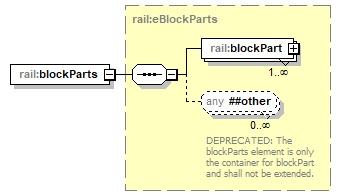 |
||
| namespace | https://www.railml.org/schemas/2018 | ||
| type | rail:eBlockParts | ||
| properties |
|
||
| children | rail:blockPart | ||
| source | <xs:element name="blockParts" type="rail:eBlockParts"> <xs:annotation> <xs:documentation source="http://wiki.railml.org/index.php?title=TT:blockParts"/> </xs:annotation> </xs:element> |
element eRostering/blocks
| diagram |  |
||||||
| namespace | https://www.railml.org/schemas/2018 | ||||||
| type | rail:eBlocks | ||||||
| properties |
|
||||||
| children | rail:block | ||||||
| source | <xs:element name="blocks" type="rail:eBlocks" minOccurs="0"> <xs:annotation> <xs:documentation source="http://wiki.railml.org/index.php?title=TT:blocks"/> </xs:annotation> </xs:element> |
element eRostering/circulations
| diagram |  |
||||||
| namespace | https://www.railml.org/schemas/2018 | ||||||
| type | rail:eCirculations | ||||||
| properties |
|
||||||
| children | rail:circulation | ||||||
| source | <xs:element name="circulations" type="rail:eCirculations" minOccurs="0"> <xs:annotation> <xs:documentation source="http://wiki.railml.org/index.php?title=TT:circulations"/> </xs:annotation> </xs:element> |
complexType eRosterings
| diagram |  |
||
| namespace | https://www.railml.org/schemas/2018 | ||
| children | rail:rostering | ||
| used by |
|
||
| source | <xs:complexType name="eRosterings"> <xs:sequence> <xs:element name="rostering" type="rail:eRostering" maxOccurs="unbounded"> <xs:annotation> <xs:documentation source="http://wiki.railml.org/index.php?title=TT:rostering"/> </xs:annotation> </xs:element> </xs:sequence> </xs:complexType> |
element eRosterings/rostering
| diagram |  |
||||||||||||||||||||||||||||||||||||||||||||||||||||||||||||||||||||||||||||||||||||||||||||||
| namespace | https://www.railml.org/schemas/2018 | ||||||||||||||||||||||||||||||||||||||||||||||||||||||||||||||||||||||||||||||||||||||||||||||
| type | rail:eRostering | ||||||||||||||||||||||||||||||||||||||||||||||||||||||||||||||||||||||||||||||||||||||||||||||
| properties |
|
||||||||||||||||||||||||||||||||||||||||||||||||||||||||||||||||||||||||||||||||||||||||||||||
| children | rail:additionalName rail:blockParts rail:blocks rail:circulations | ||||||||||||||||||||||||||||||||||||||||||||||||||||||||||||||||||||||||||||||||||||||||||||||
| attributes |
|
||||||||||||||||||||||||||||||||||||||||||||||||||||||||||||||||||||||||||||||||||||||||||||||
| source | <xs:element name="rostering" type="rail:eRostering" maxOccurs="unbounded"> <xs:annotation> <xs:documentation source="http://wiki.railml.org/index.php?title=TT:rostering"/> </xs:annotation> </xs:element> |
complexType eSectionTT
| diagram | 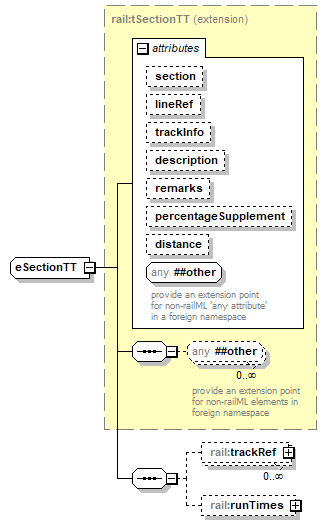 |
||||||||||||||||||||||||||||||||||||||||||||||||
| namespace | https://www.railml.org/schemas/2018 | ||||||||||||||||||||||||||||||||||||||||||||||||
| type | extension of rail:tSectionTT | ||||||||||||||||||||||||||||||||||||||||||||||||
| properties |
|
||||||||||||||||||||||||||||||||||||||||||||||||
| children | rail:trackRef rail:runTimes | ||||||||||||||||||||||||||||||||||||||||||||||||
| used by |
|
||||||||||||||||||||||||||||||||||||||||||||||||
| attributes |
|
||||||||||||||||||||||||||||||||||||||||||||||||
| source | <xs:complexType name="eSectionTT"> <xs:complexContent> <xs:extension base="rail:tSectionTT"> <xs:sequence> <xs:element name="trackRef" type="rail:tTrackRef" minOccurs="0" maxOccurs="unbounded"> <xs:annotation> <xs:documentation source="http://wiki.railml.org/index.php?title=TT:trackRef"/> </xs:annotation> </xs:element> <xs:element name="runTimes" type="rail:tRunTimes" minOccurs="0"> <xs:annotation> <xs:documentation source="http://wiki.railml.org/index.php?title=TT:runTimes"/> </xs:annotation> </xs:element> </xs:sequence> </xs:extension> </xs:complexContent> </xs:complexType> |
element eSectionTT/trackRef
| diagram | 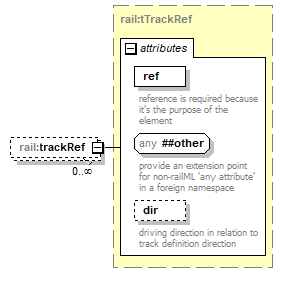 |
||||||||||||||||||||||
| namespace | https://www.railml.org/schemas/2018 | ||||||||||||||||||||||
| type | rail:tTrackRef | ||||||||||||||||||||||
| properties |
|
||||||||||||||||||||||
| attributes |
|
||||||||||||||||||||||
| source | <xs:element name="trackRef" type="rail:tTrackRef" minOccurs="0" maxOccurs="unbounded"> <xs:annotation> <xs:documentation source="http://wiki.railml.org/index.php?title=TT:trackRef"/> </xs:annotation> </xs:element> |
element eSectionTT/runTimes
| diagram | 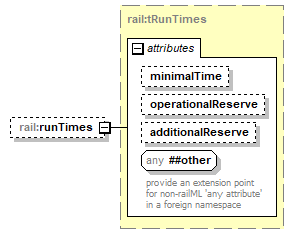 |
||||||||||||||||||||||||
| namespace | https://www.railml.org/schemas/2018 | ||||||||||||||||||||||||
| type | rail:tRunTimes | ||||||||||||||||||||||||
| properties |
|
||||||||||||||||||||||||
| attributes |
|
||||||||||||||||||||||||
| source | <xs:element name="runTimes" type="rail:tRunTimes" minOccurs="0"> <xs:annotation> <xs:documentation source="http://wiki.railml.org/index.php?title=TT:runTimes"/> </xs:annotation> </xs:element> |
complexType eStatistic
| diagram | 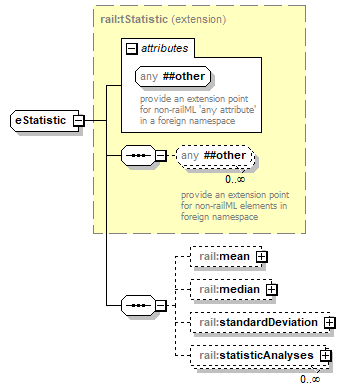 |
||||||
| namespace | https://www.railml.org/schemas/2018 | ||||||
| type | extension of rail:tStatistic | ||||||
| properties |
|
||||||
| children | rail:mean rail:median rail:standardDeviation rail:statisticAnalyses | ||||||
| used by |
|
||||||
| attributes |
|
||||||
| source | <xs:complexType name="eStatistic"> <xs:complexContent> <xs:extension base="rail:tStatistic"> <xs:sequence> <xs:element name="mean" type="rail:tStatisticTimes" minOccurs="0"> <xs:annotation> <xs:documentation source="http://wiki.railml.org/index.php?title=TT:mean"/> </xs:annotation> </xs:element> <xs:element name="median" type="rail:tStatisticTimes" minOccurs="0"> <xs:annotation> <xs:documentation source="http://wiki.railml.org/index.php?title=TT:median"/> </xs:annotation> </xs:element> <xs:element name="standardDeviation" type="rail:tStandardDeviationTimes" minOccurs="0"> <xs:annotation> <xs:documentation source="http://wiki.railml.org/index.php?title=TT:standardDeviation"/> </xs:annotation> </xs:element> <xs:element name="statisticAnalyses" type="rail:tStatisticAnalyses" minOccurs="0" maxOccurs="unbounded"> <xs:annotation> <xs:documentation source="http://wiki.railml.org/index.php?title=TT:statisticAnalyses"/> </xs:annotation> </xs:element> </xs:sequence> </xs:extension> </xs:complexContent> </xs:complexType> |
element eStatistic/mean
| diagram | 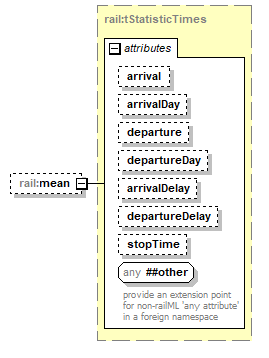 |
||||||||||||||||||||||||||||||||||||||||||||||||
| namespace | https://www.railml.org/schemas/2018 | ||||||||||||||||||||||||||||||||||||||||||||||||
| type | rail:tStatisticTimes | ||||||||||||||||||||||||||||||||||||||||||||||||
| properties |
|
||||||||||||||||||||||||||||||||||||||||||||||||
| attributes |
|
||||||||||||||||||||||||||||||||||||||||||||||||
| source | <xs:element name="mean" type="rail:tStatisticTimes" minOccurs="0"> <xs:annotation> <xs:documentation source="http://wiki.railml.org/index.php?title=TT:mean"/> </xs:annotation> </xs:element> |
element eStatistic/median
| diagram | 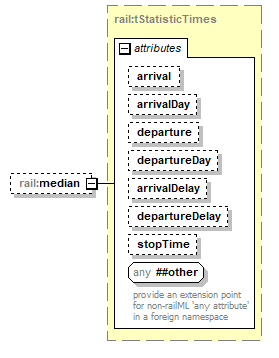 |
||||||||||||||||||||||||||||||||||||||||||||||||
| namespace | https://www.railml.org/schemas/2018 | ||||||||||||||||||||||||||||||||||||||||||||||||
| type | rail:tStatisticTimes | ||||||||||||||||||||||||||||||||||||||||||||||||
| properties |
|
||||||||||||||||||||||||||||||||||||||||||||||||
| attributes |
|
||||||||||||||||||||||||||||||||||||||||||||||||
| source | <xs:element name="median" type="rail:tStatisticTimes" minOccurs="0"> <xs:annotation> <xs:documentation source="http://wiki.railml.org/index.php?title=TT:median"/> </xs:annotation> </xs:element> |
element eStatistic/standardDeviation
| diagram | 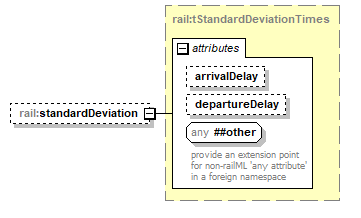 |
||||||||||||||||||
| namespace | https://www.railml.org/schemas/2018 | ||||||||||||||||||
| type | rail:tStandardDeviationTimes | ||||||||||||||||||
| properties |
|
||||||||||||||||||
| attributes |
|
||||||||||||||||||
| source | <xs:element name="standardDeviation" type="rail:tStandardDeviationTimes" minOccurs="0"> <xs:annotation> <xs:documentation source="http://wiki.railml.org/index.php?title=TT:standardDeviation"/> </xs:annotation> </xs:element> |
element eStatistic/statisticAnalyses
| diagram | 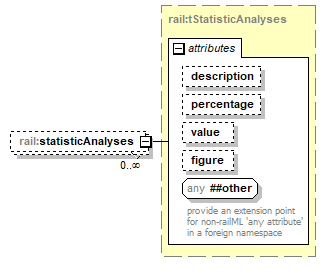 |
||||||||||||||||||||||||||||||
| namespace | https://www.railml.org/schemas/2018 | ||||||||||||||||||||||||||||||
| type | rail:tStatisticAnalyses | ||||||||||||||||||||||||||||||
| properties |
|
||||||||||||||||||||||||||||||
| attributes |
|
||||||||||||||||||||||||||||||
| source | <xs:element name="statisticAnalyses" type="rail:tStatisticAnalyses" minOccurs="0" maxOccurs="unbounded"> <xs:annotation> <xs:documentation source="http://wiki.railml.org/index.php?title=TT:statisticAnalyses"/> </xs:annotation> </xs:element> |
complexType eStatistics
| diagram |  |
||
| namespace | https://www.railml.org/schemas/2018 | ||
| children | rail:statistic | ||
| used by |
|
||
| source | <xs:complexType name="eStatistics"> <xs:sequence> <xs:element name="statistic" type="rail:eStatistic" minOccurs="0" maxOccurs="unbounded"> <xs:annotation> <xs:documentation source="http://wiki.railml.org/index.php?title=TT:statistic"/> </xs:annotation> </xs:element> </xs:sequence> </xs:complexType> |
element eStatistics/statistic
| diagram | 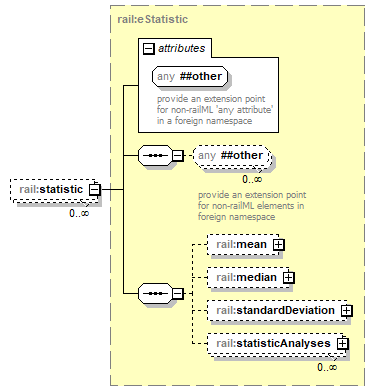 |
||||||
| namespace | https://www.railml.org/schemas/2018 | ||||||
| type | rail:eStatistic | ||||||
| properties |
|
||||||
| children | rail:mean rail:median rail:standardDeviation rail:statisticAnalyses | ||||||
| attributes |
|
||||||
| source | <xs:element name="statistic" type="rail:eStatistic" minOccurs="0" maxOccurs="unbounded"> <xs:annotation> <xs:documentation source="http://wiki.railml.org/index.php?title=TT:statistic"/> </xs:annotation> </xs:element> |
complexType eStopActivities
| diagram |  |
||
| namespace | https://www.railml.org/schemas/2018 | ||
| children | rail:stopActivity | ||
| used by |
|
||
| source | <xs:complexType name="eStopActivities"> <xs:sequence> <xs:element name="stopActivity" type="rail:tStopActivity" maxOccurs="unbounded"> <xs:annotation> <xs:documentation source="http://wiki.railml.org/index.php?title=TT:stopActivity"/> </xs:annotation> </xs:element> </xs:sequence> </xs:complexType> |
element eStopActivities/stopActivity
| diagram | 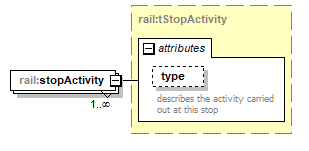 |
||||||||||||||
| namespace | https://www.railml.org/schemas/2018 | ||||||||||||||
| type | rail:tStopActivity | ||||||||||||||
| properties |
|
||||||||||||||
| attributes |
|
||||||||||||||
| source | <xs:element name="stopActivity" type="rail:tStopActivity" maxOccurs="unbounded"> <xs:annotation> <xs:documentation source="http://wiki.railml.org/index.php?title=TT:stopActivity"/> </xs:annotation> </xs:element> |
complexType eStopDescription
| diagram | 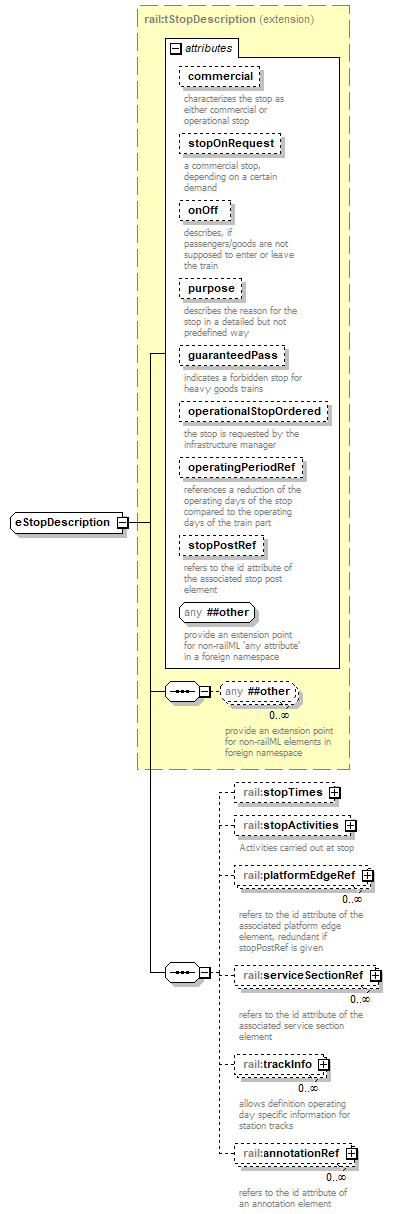 |
||||||||||||||||||||||||||||||||||||||||||||||||||||||||||||||||||||||
| namespace | https://www.railml.org/schemas/2018 | ||||||||||||||||||||||||||||||||||||||||||||||||||||||||||||||||||||||
| type | extension of rail:tStopDescription | ||||||||||||||||||||||||||||||||||||||||||||||||||||||||||||||||||||||
| properties |
|
||||||||||||||||||||||||||||||||||||||||||||||||||||||||||||||||||||||
| children | rail:stopTimes rail:stopActivities rail:platformEdgeRef rail:serviceSectionRef rail:trackInfo rail:annotationRef | ||||||||||||||||||||||||||||||||||||||||||||||||||||||||||||||||||||||
| used by |
|
||||||||||||||||||||||||||||||||||||||||||||||||||||||||||||||||||||||
| attributes |
|
||||||||||||||||||||||||||||||||||||||||||||||||||||||||||||||||||||||
| source | <xs:complexType name="eStopDescription"> <xs:complexContent> <xs:extension base="rail:tStopDescription"> <xs:sequence> <xs:element name="stopTimes" type="rail:tStopTimes" minOccurs="0"> <xs:annotation> <xs:documentation source="http://wiki.railml.org/index.php?title=TT:stopTimes"/> </xs:annotation> </xs:element> <xs:element name="stopActivities" type="rail:eStopActivities" minOccurs="0"> <xs:annotation> <xs:documentation>Activities carried out at stop</xs:documentation> <xs:documentation source="http://wiki.railml.org/index.php?title=TT:stopActivities"/> </xs:annotation> </xs:element> <xs:element name="platformEdgeRef" type="rail:tPlatformEdgeRef" minOccurs="0" maxOccurs="unbounded"> <xs:annotation> <xs:documentation>refers to the id attribute of the associated platform edge element, redundant if stopPostRef is given</xs:documentation> <xs:documentation source="http://wiki.railml.org/index.php?title=TT:platformEdgeRef"/> </xs:annotation> </xs:element> <xs:element name="serviceSectionRef" type="rail:tServiceSectionRef" minOccurs="0" maxOccurs="unbounded"> <xs:annotation> <xs:documentation>refers to the id attribute of the associated service section element</xs:documentation> <xs:documentation source="http://wiki.railml.org/index.php?title=TT:serviceSectionRef"/> </xs:annotation> </xs:element> <xs:element name="trackInfo" type="rail:tStationTrackInfo" minOccurs="0" maxOccurs="unbounded"> <xs:annotation> <xs:documentation>allows definition operating day specific information for station tracks</xs:documentation> <xs:documentation source="http://wiki.railml.org/index.php?title=TT:trackInfo"/> </xs:annotation> </xs:element> <xs:element name="annotationRef" type="rail:tAnnotationRef" minOccurs="0" maxOccurs="unbounded"> <xs:annotation> <xs:documentation>refers to the id attribute of an annotation element</xs:documentation> <xs:documentation source="http://wiki.railml.org/index.php?title=TT:annotationRef_stopDescription"/> </xs:annotation> </xs:element> </xs:sequence> </xs:extension> </xs:complexContent> </xs:complexType> |
element eStopDescription/stopTimes
| diagram | 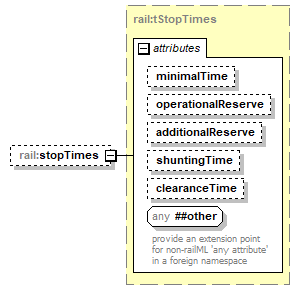 |
||||||||||||||||||||||||||||||||||||
| namespace | https://www.railml.org/schemas/2018 | ||||||||||||||||||||||||||||||||||||
| type | rail:tStopTimes | ||||||||||||||||||||||||||||||||||||
| properties |
|
||||||||||||||||||||||||||||||||||||
| attributes |
|
||||||||||||||||||||||||||||||||||||
| source | <xs:element name="stopTimes" type="rail:tStopTimes" minOccurs="0"> <xs:annotation> <xs:documentation source="http://wiki.railml.org/index.php?title=TT:stopTimes"/> </xs:annotation> </xs:element> |
element eStopDescription/stopActivities
| diagram |  |
||||||
| namespace | https://www.railml.org/schemas/2018 | ||||||
| type | rail:eStopActivities | ||||||
| properties |
|
||||||
| children | rail:stopActivity | ||||||
| annotation |
|
||||||
| source | <xs:element name="stopActivities" type="rail:eStopActivities" minOccurs="0"> <xs:annotation> <xs:documentation>Activities carried out at stop</xs:documentation> <xs:documentation source="http://wiki.railml.org/index.php?title=TT:stopActivities"/> </xs:annotation> </xs:element> |
element eStopDescription/platformEdgeRef
| diagram | 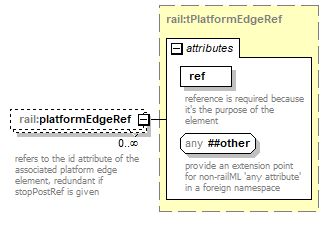 |
||||||||||||||
| namespace | https://www.railml.org/schemas/2018 | ||||||||||||||
| type | rail:tPlatformEdgeRef | ||||||||||||||
| properties |
|
||||||||||||||
| attributes |
|
||||||||||||||
| annotation |
|
||||||||||||||
| source | <xs:element name="platformEdgeRef" type="rail:tPlatformEdgeRef" minOccurs="0" maxOccurs="unbounded"> <xs:annotation> <xs:documentation>refers to the id attribute of the associated platform edge element, redundant if stopPostRef is given</xs:documentation> <xs:documentation source="http://wiki.railml.org/index.php?title=TT:platformEdgeRef"/> </xs:annotation> </xs:element> |
element eStopDescription/serviceSectionRef
| diagram | 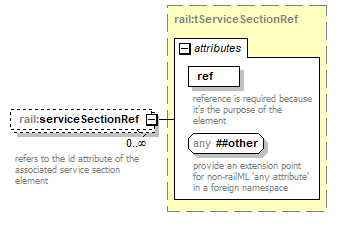 |
||||||||||||||
| namespace | https://www.railml.org/schemas/2018 | ||||||||||||||
| type | rail:tServiceSectionRef | ||||||||||||||
| properties |
|
||||||||||||||
| attributes |
|
||||||||||||||
| annotation |
|
||||||||||||||
| source | <xs:element name="serviceSectionRef" type="rail:tServiceSectionRef" minOccurs="0" maxOccurs="unbounded"> <xs:annotation> <xs:documentation>refers to the id attribute of the associated service section element</xs:documentation> <xs:documentation source="http://wiki.railml.org/index.php?title=TT:serviceSectionRef"/> </xs:annotation> </xs:element> |
element eStopDescription/trackInfo
| diagram | 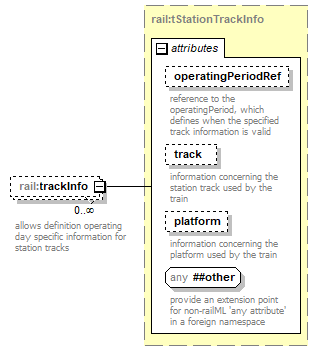 |
||||||||||||||||||||||||||||||
| namespace | https://www.railml.org/schemas/2018 | ||||||||||||||||||||||||||||||
| type | rail:tStationTrackInfo | ||||||||||||||||||||||||||||||
| properties |
|
||||||||||||||||||||||||||||||
| attributes |
|
||||||||||||||||||||||||||||||
| annotation |
|
||||||||||||||||||||||||||||||
| source | <xs:element name="trackInfo" type="rail:tStationTrackInfo" minOccurs="0" maxOccurs="unbounded"> <xs:annotation> <xs:documentation>allows definition operating day specific information for station tracks</xs:documentation> <xs:documentation source="http://wiki.railml.org/index.php?title=TT:trackInfo"/> </xs:annotation> </xs:element> |
element eStopDescription/annotationRef
| diagram | 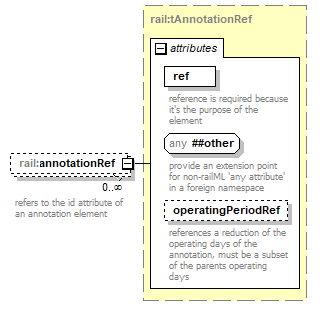 |
||||||||||||||||||||||
| namespace | https://www.railml.org/schemas/2018 | ||||||||||||||||||||||
| type | rail:tAnnotationRef | ||||||||||||||||||||||
| properties |
|
||||||||||||||||||||||
| attributes |
|
||||||||||||||||||||||
| annotation |
|
||||||||||||||||||||||
| source | <xs:element name="annotationRef" type="rail:tAnnotationRef" minOccurs="0" maxOccurs="unbounded"> <xs:annotation> <xs:documentation>refers to the id attribute of an annotation element</xs:documentation> <xs:documentation source="http://wiki.railml.org/index.php?title=TT:annotationRef_stopDescription"/> </xs:annotation> </xs:element> |
complexType eTapTsiTransportOperationalIdentifier
| diagram | 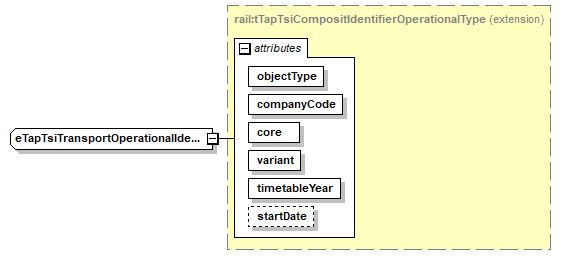 |
||||||||||||||||||||||||||||||||||||||||||
| namespace | https://www.railml.org/schemas/2018 | ||||||||||||||||||||||||||||||||||||||||||
| type | extension of rail:tTapTsiCompositIdentifierOperationalType | ||||||||||||||||||||||||||||||||||||||||||
| properties |
|
||||||||||||||||||||||||||||||||||||||||||
| used by |
|
||||||||||||||||||||||||||||||||||||||||||
| attributes |
|
||||||||||||||||||||||||||||||||||||||||||
| source | <xs:complexType name="eTapTsiTransportOperationalIdentifier"> <xs:complexContent> <xs:extension base="rail:tTapTsiCompositIdentifierOperationalType"/> </xs:complexContent> </xs:complexType> |
complexType eTimetablePeriod
| diagram | 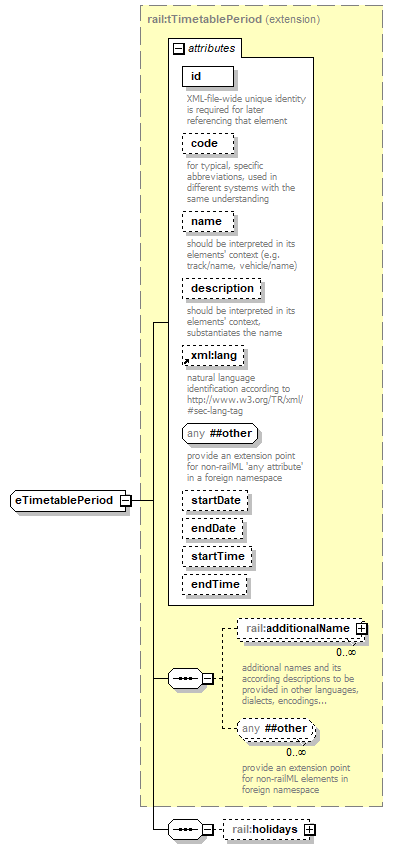 |
||||||||||||||||||||||||||||||||||||||||||||||||||||||||||||||||||||||
| namespace | https://www.railml.org/schemas/2018 | ||||||||||||||||||||||||||||||||||||||||||||||||||||||||||||||||||||||
| type | extension of rail:tTimetablePeriod | ||||||||||||||||||||||||||||||||||||||||||||||||||||||||||||||||||||||
| properties |
|
||||||||||||||||||||||||||||||||||||||||||||||||||||||||||||||||||||||
| children | rail:additionalName rail:holidays | ||||||||||||||||||||||||||||||||||||||||||||||||||||||||||||||||||||||
| used by |
|
||||||||||||||||||||||||||||||||||||||||||||||||||||||||||||||||||||||
| attributes |
|
||||||||||||||||||||||||||||||||||||||||||||||||||||||||||||||||||||||
| source | <xs:complexType name="eTimetablePeriod"> <xs:complexContent> <xs:extension base="rail:tTimetablePeriod"> <xs:sequence> <xs:element name="holidays" type="rail:eHolidays" minOccurs="0"> <xs:annotation> <xs:documentation source="http://wiki.railml.org/index.php?title=TT:holidays"/> </xs:annotation> </xs:element> </xs:sequence> </xs:extension> </xs:complexContent> </xs:complexType> |
element eTimetablePeriod/holidays
| diagram |  |
||||||
| namespace | https://www.railml.org/schemas/2018 | ||||||
| type | rail:eHolidays | ||||||
| properties |
|
||||||
| children | rail:holiday | ||||||
| source | <xs:element name="holidays" type="rail:eHolidays" minOccurs="0"> <xs:annotation> <xs:documentation source="http://wiki.railml.org/index.php?title=TT:holidays"/> </xs:annotation> </xs:element> |
complexType eTimetablePeriods
| diagram |  |
||
| namespace | https://www.railml.org/schemas/2018 | ||
| children | rail:timetablePeriod | ||
| used by |
|
||
| source | <xs:complexType name="eTimetablePeriods"> <xs:sequence> <xs:element name="timetablePeriod" type="rail:eTimetablePeriod" maxOccurs="unbounded"> <xs:annotation> <xs:documentation source="http://wiki.railml.org/index.php?title=TT:timetablePeriod"/> </xs:annotation> </xs:element> </xs:sequence> </xs:complexType> |
element eTimetablePeriods/timetablePeriod
| diagram | 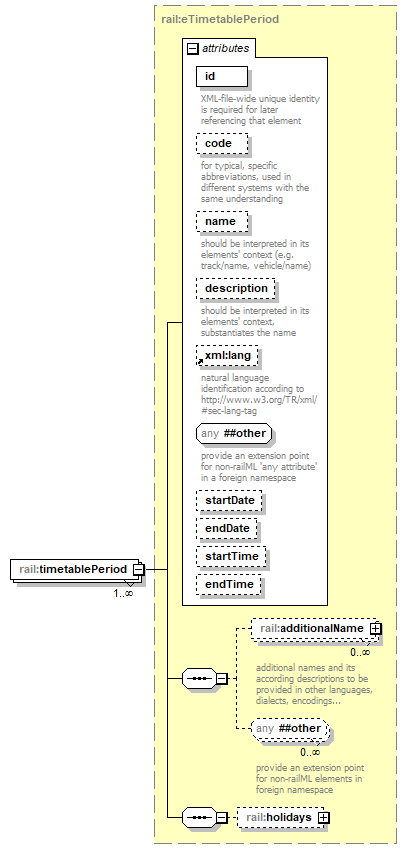 |
||||||||||||||||||||||||||||||||||||||||||||||||||||||||||||||||||||||
| namespace | https://www.railml.org/schemas/2018 | ||||||||||||||||||||||||||||||||||||||||||||||||||||||||||||||||||||||
| type | rail:eTimetablePeriod | ||||||||||||||||||||||||||||||||||||||||||||||||||||||||||||||||||||||
| properties |
|
||||||||||||||||||||||||||||||||||||||||||||||||||||||||||||||||||||||
| children | rail:additionalName rail:holidays | ||||||||||||||||||||||||||||||||||||||||||||||||||||||||||||||||||||||
| attributes |
|
||||||||||||||||||||||||||||||||||||||||||||||||||||||||||||||||||||||
| source | <xs:element name="timetablePeriod" type="rail:eTimetablePeriod" maxOccurs="unbounded"> <xs:annotation> <xs:documentation source="http://wiki.railml.org/index.php?title=TT:timetablePeriod"/> </xs:annotation> </xs:element> |
complexType eTrain
| diagram |  |
||||||||||||||||||||||||||||||||||||||||||||||||||||||||||||||||||||||||||||||||||||||||||||
| namespace | https://www.railml.org/schemas/2018 | ||||||||||||||||||||||||||||||||||||||||||||||||||||||||||||||||||||||||||||||||||||||||||||
| type | extension of rail:tTrain | ||||||||||||||||||||||||||||||||||||||||||||||||||||||||||||||||||||||||||||||||||||||||||||
| properties |
|
||||||||||||||||||||||||||||||||||||||||||||||||||||||||||||||||||||||||||||||||||||||||||||
| children | rail:additionalName rail:trainPartSequence rail:tafTapTsiTrainID rail:replacements | ||||||||||||||||||||||||||||||||||||||||||||||||||||||||||||||||||||||||||||||||||||||||||||
| used by |
|
||||||||||||||||||||||||||||||||||||||||||||||||||||||||||||||||||||||||||||||||||||||||||||
| attributes |
|
||||||||||||||||||||||||||||||||||||||||||||||||||||||||||||||||||||||||||||||||||||||||||||
| source | <xs:complexType name="eTrain"> <xs:complexContent> <xs:extension base="rail:tTrain"> <xs:sequence> <xs:element name="trainPartSequence" type="rail:eTrainPartSequence" maxOccurs="unbounded"> <xs:annotation> <xs:documentation source="http://wiki.railml.org/index.php?title=TT:trainPartSequence"/> </xs:annotation> </xs:element> <xs:element name="tafTapTsiTrainID" type="rail:eTapTsiTransportOperationalIdentifier" minOccurs="0"> <xs:annotation> <xs:documentation>Optional information corresponding to the TAF/TAP TSI train ID.</xs:documentation> <xs:documentation source="https://wiki.railml.org/index.php?title=TT:tafTapTsiTrainID"/> </xs:annotation> </xs:element> <xs:element name="replacements" type="rail:eReplacedTrains" minOccurs="0"/> </xs:sequence> </xs:extension> </xs:complexContent> </xs:complexType> |
element eTrain/trainPartSequence
| diagram | 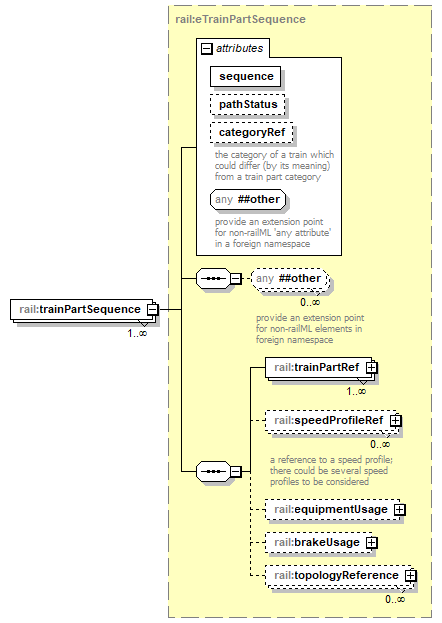 |
||||||||||||||||||||||||||
| namespace | https://www.railml.org/schemas/2018 | ||||||||||||||||||||||||||
| type | rail:eTrainPartSequence | ||||||||||||||||||||||||||
| properties |
|
||||||||||||||||||||||||||
| children | rail:trainPartRef rail:speedProfileRef rail:equipmentUsage rail:brakeUsage rail:topologyReference | ||||||||||||||||||||||||||
| attributes |
|
||||||||||||||||||||||||||
| source | <xs:element name="trainPartSequence" type="rail:eTrainPartSequence" maxOccurs="unbounded"> <xs:annotation> <xs:documentation source="http://wiki.railml.org/index.php?title=TT:trainPartSequence"/> </xs:annotation> </xs:element> |
element eTrain/tafTapTsiTrainID
| diagram | 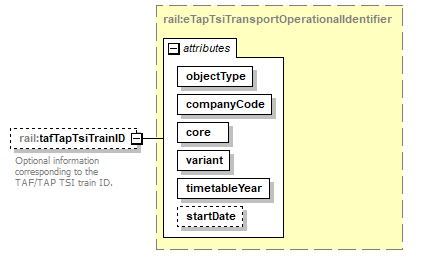 |
||||||||||||||||||||||||||||||||||||||||||
| namespace | https://www.railml.org/schemas/2018 | ||||||||||||||||||||||||||||||||||||||||||
| type | rail:eTapTsiTransportOperationalIdentifier | ||||||||||||||||||||||||||||||||||||||||||
| properties |
|
||||||||||||||||||||||||||||||||||||||||||
| attributes |
|
||||||||||||||||||||||||||||||||||||||||||
| annotation |
|
||||||||||||||||||||||||||||||||||||||||||
| source | <xs:element name="tafTapTsiTrainID" type="rail:eTapTsiTransportOperationalIdentifier" minOccurs="0"> <xs:annotation> <xs:documentation>Optional information corresponding to the TAF/TAP TSI train ID.</xs:documentation> <xs:documentation source="https://wiki.railml.org/index.php?title=TT:tafTapTsiTrainID"/> </xs:annotation> </xs:element> |
element eTrain/replacements
| diagram |  |
||||||
| namespace | https://www.railml.org/schemas/2018 | ||||||
| type | rail:eReplacedTrains | ||||||
| properties |
|
||||||
| children | rail:replacementOf | ||||||
| source | <xs:element name="replacements" type="rail:eReplacedTrains" minOccurs="0"/> |
complexType eTrainGroup
| diagram | 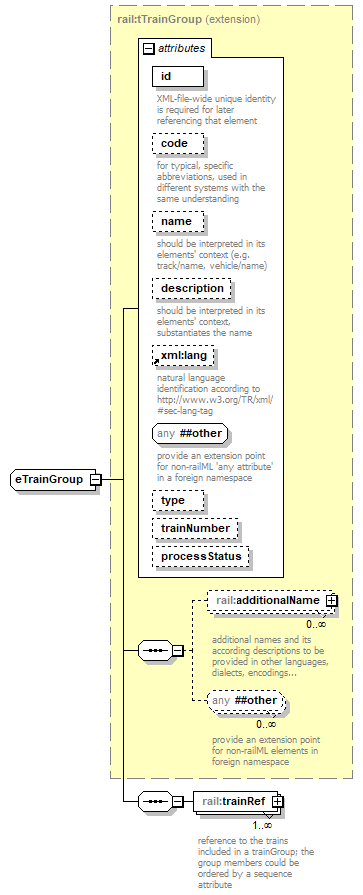 |
||||||||||||||||||||||||||||||||||||||||||||||||||||||||||||||||
| namespace | https://www.railml.org/schemas/2018 | ||||||||||||||||||||||||||||||||||||||||||||||||||||||||||||||||
| type | extension of rail:tTrainGroup | ||||||||||||||||||||||||||||||||||||||||||||||||||||||||||||||||
| properties |
|
||||||||||||||||||||||||||||||||||||||||||||||||||||||||||||||||
| children | rail:additionalName rail:trainRef | ||||||||||||||||||||||||||||||||||||||||||||||||||||||||||||||||
| used by |
|
||||||||||||||||||||||||||||||||||||||||||||||||||||||||||||||||
| attributes |
|
||||||||||||||||||||||||||||||||||||||||||||||||||||||||||||||||
| source | <xs:complexType name="eTrainGroup"> <xs:complexContent> <xs:extension base="rail:tTrainGroup"> <xs:sequence> <xs:element name="trainRef" type="rail:tElementRefInGroup" maxOccurs="unbounded"> <xs:annotation> <xs:documentation>reference to the trains included in a trainGroup; the group members could be ordered by a sequence attribute</xs:documentation> <xs:documentation source="http://wiki.railml.org/index.php?title=TT:trainRef"/> </xs:annotation> </xs:element> </xs:sequence> </xs:extension> </xs:complexContent> </xs:complexType> |
element eTrainGroup/trainRef
| diagram | 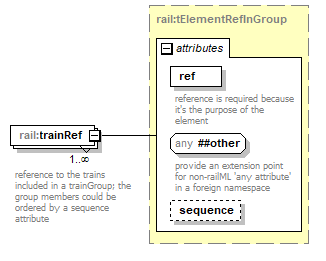 |
||||||||||||||||||||
| namespace | https://www.railml.org/schemas/2018 | ||||||||||||||||||||
| type | rail:tElementRefInGroup | ||||||||||||||||||||
| properties |
|
||||||||||||||||||||
| attributes |
|
||||||||||||||||||||
| annotation |
|
||||||||||||||||||||
| source | <xs:element name="trainRef" type="rail:tElementRefInGroup" maxOccurs="unbounded"> <xs:annotation> <xs:documentation>reference to the trains included in a trainGroup; the group members could be ordered by a sequence attribute</xs:documentation> <xs:documentation source="http://wiki.railml.org/index.php?title=TT:trainRef"/> </xs:annotation> </xs:element> |
complexType eTrainGroups
| diagram |  |
||
| namespace | https://www.railml.org/schemas/2018 | ||
| children | rail:trainGroup | ||
| used by |
|
||
| source | <xs:complexType name="eTrainGroups"> <xs:sequence> <xs:element name="trainGroup" type="rail:eTrainGroup" maxOccurs="unbounded"> <xs:annotation> <xs:documentation source="http://wiki.railml.org/index.php?title=TT:trainGroup"/> </xs:annotation> </xs:element> </xs:sequence> </xs:complexType> |
element eTrainGroups/trainGroup
| diagram | 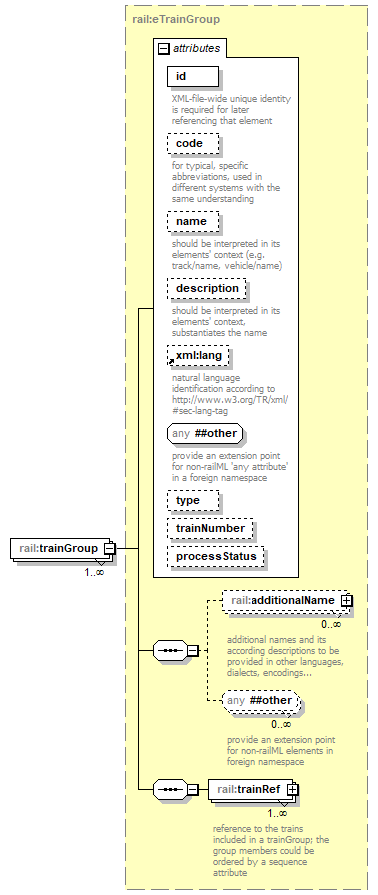 |
||||||||||||||||||||||||||||||||||||||||||||||||||||||||||||||||
| namespace | https://www.railml.org/schemas/2018 | ||||||||||||||||||||||||||||||||||||||||||||||||||||||||||||||||
| type | rail:eTrainGroup | ||||||||||||||||||||||||||||||||||||||||||||||||||||||||||||||||
| properties |
|
||||||||||||||||||||||||||||||||||||||||||||||||||||||||||||||||
| children | rail:additionalName rail:trainRef | ||||||||||||||||||||||||||||||||||||||||||||||||||||||||||||||||
| attributes |
|
||||||||||||||||||||||||||||||||||||||||||||||||||||||||||||||||
| source | <xs:element name="trainGroup" type="rail:eTrainGroup" maxOccurs="unbounded"> <xs:annotation> <xs:documentation source="http://wiki.railml.org/index.php?title=TT:trainGroup"/> </xs:annotation> </xs:element> |
complexType eTrainPart
| diagram |  |
||||||||||||||||||||||||||||||||||||||||||||||||||||||||||||||||||||||||||||||||||||||||||||||||||||||||||||||||||||||||
| namespace | https://www.railml.org/schemas/2018 | ||||||||||||||||||||||||||||||||||||||||||||||||||||||||||||||||||||||||||||||||||||||||||||||||||||||||||||||||||||||||
| type | extension of rail:tTrainPart | ||||||||||||||||||||||||||||||||||||||||||||||||||||||||||||||||||||||||||||||||||||||||||||||||||||||||||||||||||||||||
| properties |
|
||||||||||||||||||||||||||||||||||||||||||||||||||||||||||||||||||||||||||||||||||||||||||||||||||||||||||||||||||||||||
| children | rail:additionalName rail:formationTT rail:operatingPeriodRef rail:ocpsTT rail:organizationalUnitBinding rail:annotationRef | ||||||||||||||||||||||||||||||||||||||||||||||||||||||||||||||||||||||||||||||||||||||||||||||||||||||||||||||||||||||||
| used by |
|
||||||||||||||||||||||||||||||||||||||||||||||||||||||||||||||||||||||||||||||||||||||||||||||||||||||||||||||||||||||||
| attributes |
|
||||||||||||||||||||||||||||||||||||||||||||||||||||||||||||||||||||||||||||||||||||||||||||||||||||||||||||||||||||||||
| source | <xs:complexType name="eTrainPart"> <xs:complexContent> <xs:extension base="rail:tTrainPart"> <xs:sequence> <xs:element name="formationTT" type="rail:eFormationTT" minOccurs="0"> <xs:annotation> <xs:documentation source="http://wiki.railml.org/index.php?title=TT:formationTT"/> </xs:annotation> </xs:element> <xs:element name="operatingPeriodRef" type="rail:eOperatingPeriodRef" minOccurs="0"> <xs:annotation> <xs:documentation source="http://wiki.railml.org/index.php?title=TT:operatingPeriodRef"/> </xs:annotation> </xs:element> <xs:element name="ocpsTT" type="rail:eOcpsTT"> <xs:annotation> <xs:documentation source="http://wiki.railml.org/index.php?title=TT:ocpsTT"/> </xs:annotation> </xs:element> <xs:element name="organizationalUnitBinding" type="rail:eOrganizationalUnitBinding" minOccurs="0"> <xs:annotation> <xs:documentation source="http://wiki.railml.org/index.php?title=TT:organizationalUnitBinding"/> </xs:annotation> </xs:element> <xs:element name="annotationRef" type="rail:tAnnotationRef" minOccurs="0" maxOccurs="unbounded"> <xs:annotation> <xs:documentation>refers to the id attribute of an annotation element</xs:documentation> <xs:documentation source="http://wiki.railml.org/index.php?title=TT:annotationRef_trainPart"/> </xs:annotation> </xs:element> <xs:any namespace="##other" processContents="strict" minOccurs="0" maxOccurs="unbounded"> <xs:annotation> <xs:documentation>Deprecated for next major release, use "generic any element" instead.</xs:documentation> </xs:annotation> </xs:any> </xs:sequence> </xs:extension> </xs:complexContent> </xs:complexType> |
element eTrainPart/formationTT
| diagram | 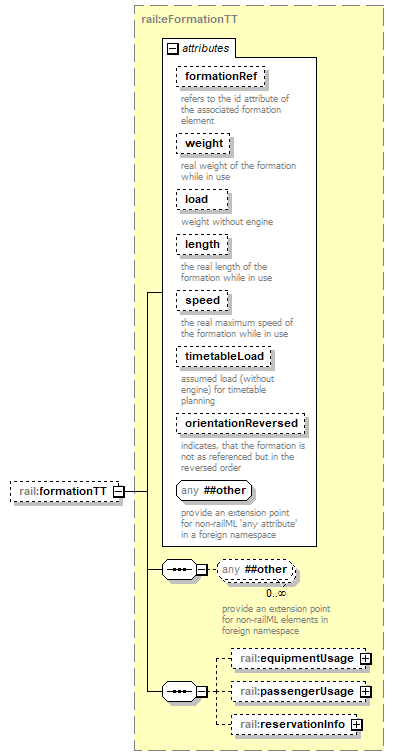 |
||||||||||||||||||||||||||||||||||||||||||||||||||||||||||||||
| namespace | https://www.railml.org/schemas/2018 | ||||||||||||||||||||||||||||||||||||||||||||||||||||||||||||||
| type | rail:eFormationTT | ||||||||||||||||||||||||||||||||||||||||||||||||||||||||||||||
| properties |
|
||||||||||||||||||||||||||||||||||||||||||||||||||||||||||||||
| children | rail:equipmentUsage rail:passengerUsage rail:reservationInfo | ||||||||||||||||||||||||||||||||||||||||||||||||||||||||||||||
| attributes |
|
||||||||||||||||||||||||||||||||||||||||||||||||||||||||||||||
| source | <xs:element name="formationTT" type="rail:eFormationTT" minOccurs="0"> <xs:annotation> <xs:documentation source="http://wiki.railml.org/index.php?title=TT:formationTT"/> </xs:annotation> </xs:element> |
element eTrainPart/operatingPeriodRef
| diagram | 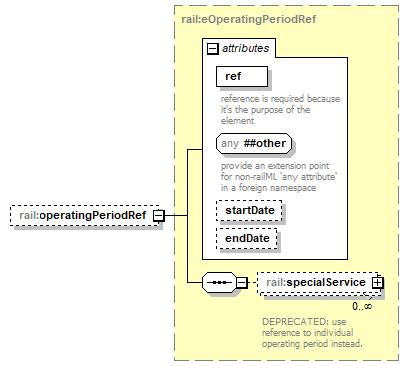 |
||||||||||||||||||||||||||
| namespace | https://www.railml.org/schemas/2018 | ||||||||||||||||||||||||||
| type | rail:eOperatingPeriodRef | ||||||||||||||||||||||||||
| properties |
|
||||||||||||||||||||||||||
| children | rail:specialService | ||||||||||||||||||||||||||
| attributes |
|
||||||||||||||||||||||||||
| source | <xs:element name="operatingPeriodRef" type="rail:eOperatingPeriodRef" minOccurs="0"> <xs:annotation> <xs:documentation source="http://wiki.railml.org/index.php?title=TT:operatingPeriodRef"/> </xs:annotation> </xs:element> |
element eTrainPart/ocpsTT
| diagram |  |
||
| namespace | https://www.railml.org/schemas/2018 | ||
| type | rail:eOcpsTT | ||
| properties |
|
||
| children | rail:ocpTT | ||
| source | <xs:element name="ocpsTT" type="rail:eOcpsTT"> <xs:annotation> <xs:documentation source="http://wiki.railml.org/index.php?title=TT:ocpsTT"/> </xs:annotation> </xs:element> |
element eTrainPart/organizationalUnitBinding
| diagram | 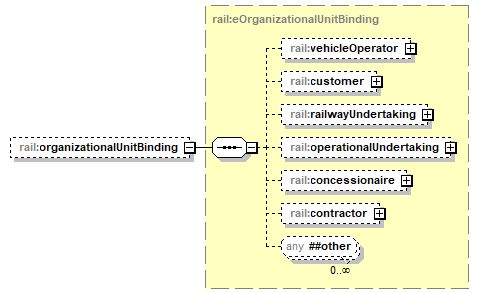 |
||||||
| namespace | https://www.railml.org/schemas/2018 | ||||||
| type | rail:eOrganizationalUnitBinding | ||||||
| properties |
|
||||||
| children | rail:vehicleOperator rail:customer rail:railwayUndertaking rail:operationalUndertaking rail:concessionaire rail:contractor | ||||||
| source | <xs:element name="organizationalUnitBinding" type="rail:eOrganizationalUnitBinding" minOccurs="0"> <xs:annotation> <xs:documentation source="http://wiki.railml.org/index.php?title=TT:organizationalUnitBinding"/> </xs:annotation> </xs:element> |
element eTrainPart/annotationRef
| diagram | 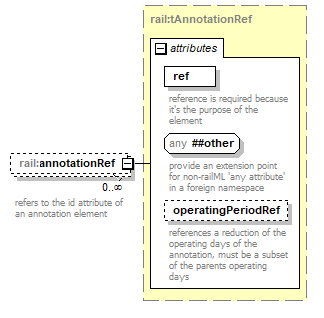 |
||||||||||||||||||||||
| namespace | https://www.railml.org/schemas/2018 | ||||||||||||||||||||||
| type | rail:tAnnotationRef | ||||||||||||||||||||||
| properties |
|
||||||||||||||||||||||
| attributes |
|
||||||||||||||||||||||
| annotation |
|
||||||||||||||||||||||
| source | <xs:element name="annotationRef" type="rail:tAnnotationRef" minOccurs="0" maxOccurs="unbounded"> <xs:annotation> <xs:documentation>refers to the id attribute of an annotation element</xs:documentation> <xs:documentation source="http://wiki.railml.org/index.php?title=TT:annotationRef_trainPart"/> </xs:annotation> </xs:element> |
complexType eTrainParts
| diagram |  |
||
| namespace | https://www.railml.org/schemas/2018 | ||
| children | rail:trainPart | ||
| used by |
|
||
| source | <xs:complexType name="eTrainParts"> <xs:sequence> <xs:element name="trainPart" type="rail:eTrainPart" maxOccurs="unbounded"> <xs:annotation> <xs:documentation source="http://wiki.railml.org/index.php?title=TT:trainPart"/> </xs:annotation> </xs:element> </xs:sequence> </xs:complexType> |
element eTrainParts/trainPart
| diagram |  |
||||||||||||||||||||||||||||||||||||||||||||||||||||||||||||||||||||||||||||||||||||||||||||||||||||||||||||||||||||||||
| namespace | https://www.railml.org/schemas/2018 | ||||||||||||||||||||||||||||||||||||||||||||||||||||||||||||||||||||||||||||||||||||||||||||||||||||||||||||||||||||||||
| type | rail:eTrainPart | ||||||||||||||||||||||||||||||||||||||||||||||||||||||||||||||||||||||||||||||||||||||||||||||||||||||||||||||||||||||||
| properties |
|
||||||||||||||||||||||||||||||||||||||||||||||||||||||||||||||||||||||||||||||||||||||||||||||||||||||||||||||||||||||||
| children | rail:additionalName rail:formationTT rail:operatingPeriodRef rail:ocpsTT rail:organizationalUnitBinding rail:annotationRef | ||||||||||||||||||||||||||||||||||||||||||||||||||||||||||||||||||||||||||||||||||||||||||||||||||||||||||||||||||||||||
| attributes |
|
||||||||||||||||||||||||||||||||||||||||||||||||||||||||||||||||||||||||||||||||||||||||||||||||||||||||||||||||||||||||
| source | <xs:element name="trainPart" type="rail:eTrainPart" maxOccurs="unbounded"> <xs:annotation> <xs:documentation source="http://wiki.railml.org/index.php?title=TT:trainPart"/> </xs:annotation> </xs:element> |
complexType eTrainPartSequence
| diagram | 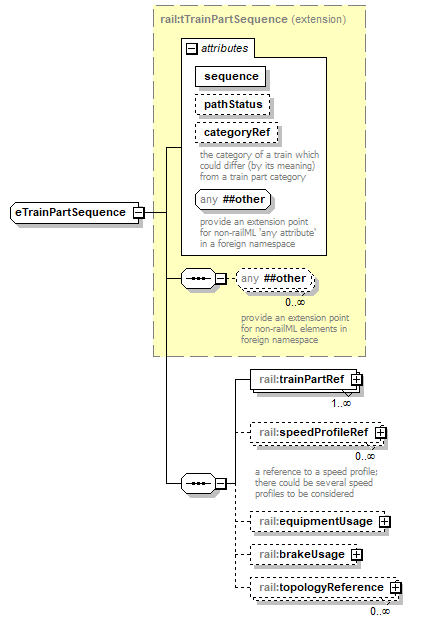 |
||||||||||||||||||||||||||
| namespace | https://www.railml.org/schemas/2018 | ||||||||||||||||||||||||||
| type | extension of rail:tTrainPartSequence | ||||||||||||||||||||||||||
| properties |
|
||||||||||||||||||||||||||
| children | rail:trainPartRef rail:speedProfileRef rail:equipmentUsage rail:brakeUsage rail:topologyReference | ||||||||||||||||||||||||||
| used by |
|
||||||||||||||||||||||||||
| attributes |
|
||||||||||||||||||||||||||
| source | <xs:complexType name="eTrainPartSequence"> <xs:complexContent> <xs:extension base="rail:tTrainPartSequence"> <xs:sequence> <xs:element name="trainPartRef" type="rail:tTrainPartRef" maxOccurs="unbounded"> <xs:annotation> <xs:documentation source="http://wiki.railml.org/index.php?title=TT:trainPartRef"/> </xs:annotation> </xs:element> <xs:element name="speedProfileRef" type="rail:tSpeedProfileRef" minOccurs="0" maxOccurs="unbounded"> <xs:annotation> <xs:documentation>a reference to a speed profile; there could be several speed profiles to be considered</xs:documentation> <xs:documentation source="http://wiki.railml.org/index.php?title=TT:speedProfileRef"/> </xs:annotation> </xs:element> <xs:element name="equipmentUsage" type="rail:eEquipmentUsage" minOccurs="0"> <xs:annotation> <xs:documentation source="http://wiki.railml.org/index.php?title=TT:equipmentUsage_trainPartSequence"/> </xs:annotation> </xs:element> <xs:element name="brakeUsage" type="rail:eBrakeUsage" minOccurs="0"> <xs:annotation> <xs:documentation source="http://wiki.railml.org/index.php?title=TT:brakeUsage"/> </xs:annotation> </xs:element> <xs:element name="topologyReference" type="rail:tTopologyReference" minOccurs="0" maxOccurs="unbounded"> <xs:annotation> <xs:documentation source="http://wiki.railml.org/index.php?title=TT:topologyReference"/> </xs:annotation> </xs:element> </xs:sequence> </xs:extension> </xs:complexContent> </xs:complexType> |
element eTrainPartSequence/trainPartRef
| diagram | 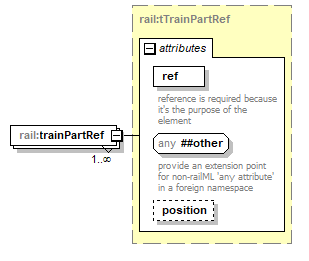 |
||||||||||||||||||||
| namespace | https://www.railml.org/schemas/2018 | ||||||||||||||||||||
| type | rail:tTrainPartRef | ||||||||||||||||||||
| properties |
|
||||||||||||||||||||
| attributes |
|
||||||||||||||||||||
| source | <xs:element name="trainPartRef" type="rail:tTrainPartRef" maxOccurs="unbounded"> <xs:annotation> <xs:documentation source="http://wiki.railml.org/index.php?title=TT:trainPartRef"/> </xs:annotation> </xs:element> |
element eTrainPartSequence/speedProfileRef
| diagram | 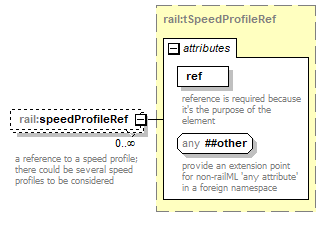 |
||||||||||||||
| namespace | https://www.railml.org/schemas/2018 | ||||||||||||||
| type | rail:tSpeedProfileRef | ||||||||||||||
| properties |
|
||||||||||||||
| attributes |
|
||||||||||||||
| annotation |
|
||||||||||||||
| source | <xs:element name="speedProfileRef" type="rail:tSpeedProfileRef" minOccurs="0" maxOccurs="unbounded"> <xs:annotation> <xs:documentation>a reference to a speed profile; there could be several speed profiles to be considered</xs:documentation> <xs:documentation source="http://wiki.railml.org/index.php?title=TT:speedProfileRef"/> </xs:annotation> </xs:element> |
element eTrainPartSequence/equipmentUsage
| diagram |  |
||||||
| namespace | https://www.railml.org/schemas/2018 | ||||||
| type | rail:eEquipmentUsage | ||||||
| properties |
|
||||||
| children | rail:equipment | ||||||
| source | <xs:element name="equipmentUsage" type="rail:eEquipmentUsage" minOccurs="0"> <xs:annotation> <xs:documentation source="http://wiki.railml.org/index.php?title=TT:equipmentUsage_trainPartSequence"/> </xs:annotation> </xs:element> |
element eTrainPartSequence/brakeUsage
| diagram | 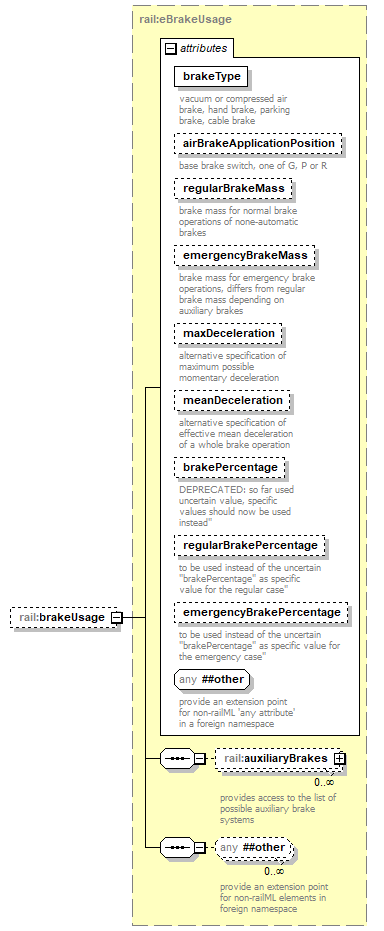 |
||||||||||||||||||||||||||||||||||||||||||||||||||||||||||||||||||||||||||||||
| namespace | https://www.railml.org/schemas/2018 | ||||||||||||||||||||||||||||||||||||||||||||||||||||||||||||||||||||||||||||||
| type | rail:eBrakeUsage | ||||||||||||||||||||||||||||||||||||||||||||||||||||||||||||||||||||||||||||||
| properties |
|
||||||||||||||||||||||||||||||||||||||||||||||||||||||||||||||||||||||||||||||
| children | rail:auxiliaryBrakes | ||||||||||||||||||||||||||||||||||||||||||||||||||||||||||||||||||||||||||||||
| attributes |
|
||||||||||||||||||||||||||||||||||||||||||||||||||||||||||||||||||||||||||||||
| source | <xs:element name="brakeUsage" type="rail:eBrakeUsage" minOccurs="0"> <xs:annotation> <xs:documentation source="http://wiki.railml.org/index.php?title=TT:brakeUsage"/> </xs:annotation> </xs:element> |
element eTrainPartSequence/topologyReference
| diagram | 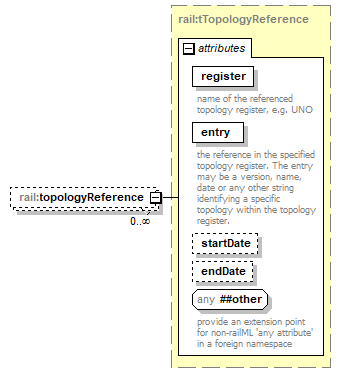 |
||||||||||||||||||||||||||||||||||
| namespace | https://www.railml.org/schemas/2018 | ||||||||||||||||||||||||||||||||||
| type | rail:tTopologyReference | ||||||||||||||||||||||||||||||||||
| properties |
|
||||||||||||||||||||||||||||||||||
| attributes |
|
||||||||||||||||||||||||||||||||||
| source | <xs:element name="topologyReference" type="rail:tTopologyReference" minOccurs="0" maxOccurs="unbounded"> <xs:annotation> <xs:documentation source="http://wiki.railml.org/index.php?title=TT:topologyReference"/> </xs:annotation> </xs:element> |
complexType eTrains
| diagram |  |
||
| namespace | https://www.railml.org/schemas/2018 | ||
| children | rail:train | ||
| used by |
|
||
| source | <xs:complexType name="eTrains"> <xs:sequence> <xs:element name="train" type="rail:eTrain" maxOccurs="unbounded"> <xs:annotation> <xs:documentation source="http://wiki.railml.org/index.php?title=TT:train"/> </xs:annotation> </xs:element> </xs:sequence> </xs:complexType> |
element eTrains/train
| diagram |  |
||||||||||||||||||||||||||||||||||||||||||||||||||||||||||||||||||||||||||||||||||||||||||||
| namespace | https://www.railml.org/schemas/2018 | ||||||||||||||||||||||||||||||||||||||||||||||||||||||||||||||||||||||||||||||||||||||||||||
| type | rail:eTrain | ||||||||||||||||||||||||||||||||||||||||||||||||||||||||||||||||||||||||||||||||||||||||||||
| properties |
|
||||||||||||||||||||||||||||||||||||||||||||||||||||||||||||||||||||||||||||||||||||||||||||
| children | rail:additionalName rail:trainPartSequence rail:tafTapTsiTrainID rail:replacements | ||||||||||||||||||||||||||||||||||||||||||||||||||||||||||||||||||||||||||||||||||||||||||||
| attributes |
|
||||||||||||||||||||||||||||||||||||||||||||||||||||||||||||||||||||||||||||||||||||||||||||
| source | <xs:element name="train" type="rail:eTrain" maxOccurs="unbounded"> <xs:annotation> <xs:documentation source="http://wiki.railml.org/index.php?title=TT:train"/> </xs:annotation> </xs:element> |
complexType tAdditionalOcpName
| diagram | 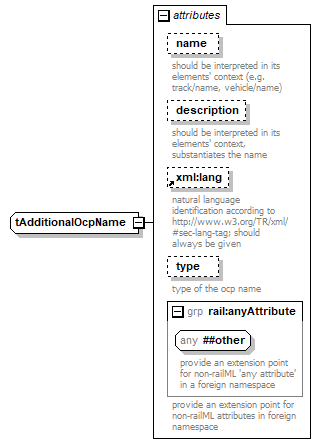 |
||||||||||||||||||||||||||||||||||||||
| namespace | https://www.railml.org/schemas/2018 | ||||||||||||||||||||||||||||||||||||||
| used by |
|
||||||||||||||||||||||||||||||||||||||
| attributes |
|
||||||||||||||||||||||||||||||||||||||
| source | <xs:complexType name="tAdditionalOcpName"> <xs:attribute name="name" type="rail:tGenericName"> <xs:annotation> <xs:documentation>should be interpreted in its elements' context (e.g. track/name, vehicle/name)</xs:documentation> </xs:annotation> </xs:attribute> <xs:attribute name="description" type="rail:tElementDescription"> <xs:annotation> <xs:documentation>should be interpreted in its elements' context, substantiates the name</xs:documentation> </xs:annotation> </xs:attribute> <xs:attribute ref="xml:lang"> <xs:annotation> <xs:documentation>natural language identification according to http://www.w3.org/TR/xml/#sec-lang-tag; should always be given</xs:documentation> </xs:annotation> </xs:attribute> <xs:attribute name="type" type="rail:tOcpNameType"> <xs:annotation> <xs:documentation>type of the ocp name</xs:documentation> </xs:annotation> </xs:attribute> <xs:attributeGroup ref="rail:anyAttribute"> <xs:annotation> <xs:documentation>provide an extension point for non-railML attributes in foreign namespace</xs:documentation> </xs:annotation> </xs:attributeGroup> </xs:complexType> |
attribute tAdditionalOcpName/@name
| type | rail:tGenericName | ||
| annotation |
|
||
| source | <xs:attribute name="name" type="rail:tGenericName"> <xs:annotation> <xs:documentation>should be interpreted in its elements' context (e.g. track/name, vehicle/name)</xs:documentation> </xs:annotation> </xs:attribute> |
attribute tAdditionalOcpName/@description
| type | rail:tElementDescription | ||
| annotation |
|
||
| source | <xs:attribute name="description" type="rail:tElementDescription"> <xs:annotation> <xs:documentation>should be interpreted in its elements' context, substantiates the name</xs:documentation> </xs:annotation> </xs:attribute> |
attribute tAdditionalOcpName/@type
| type | rail:tOcpNameType | ||
| annotation |
|
||
| source | <xs:attribute name="type" type="rail:tOcpNameType"> <xs:annotation> <xs:documentation>type of the ocp name</xs:documentation> </xs:annotation> </xs:attribute> |
complexType tAttribute
| diagram |  |
||||||||||||||||||
| namespace | https://www.railml.org/schemas/2018 | ||||||||||||||||||
| used by |
|
||||||||||||||||||
| attributes |
|
||||||||||||||||||
| source | <xs:complexType name="tAttribute"> <xs:attribute name="name" type="xs:string" use="required"/> <xs:attribute name="value" type="xs:string" use="required"/> </xs:complexType> |
attribute tAttribute/@name
| type | xs:string | ||
| properties |
|
||
| source | <xs:attribute name="name" type="xs:string" use="required"/> |
attribute tAttribute/@value
| type | xs:string | ||
| properties |
|
||
| source | <xs:attribute name="value" type="xs:string" use="required"/> |
complexType tAxleWeight
| diagram | 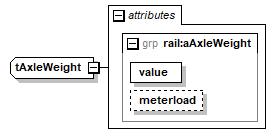 |
||||||||||||||||||
| namespace | https://www.railml.org/schemas/2018 | ||||||||||||||||||
| used by |
|
||||||||||||||||||
| attributes |
|
||||||||||||||||||
| source | <xs:complexType name="tAxleWeight"> <xs:attributeGroup ref="rail:aAxleWeight"/> </xs:complexType> |
complexType tAxleWeightChange
| diagram | 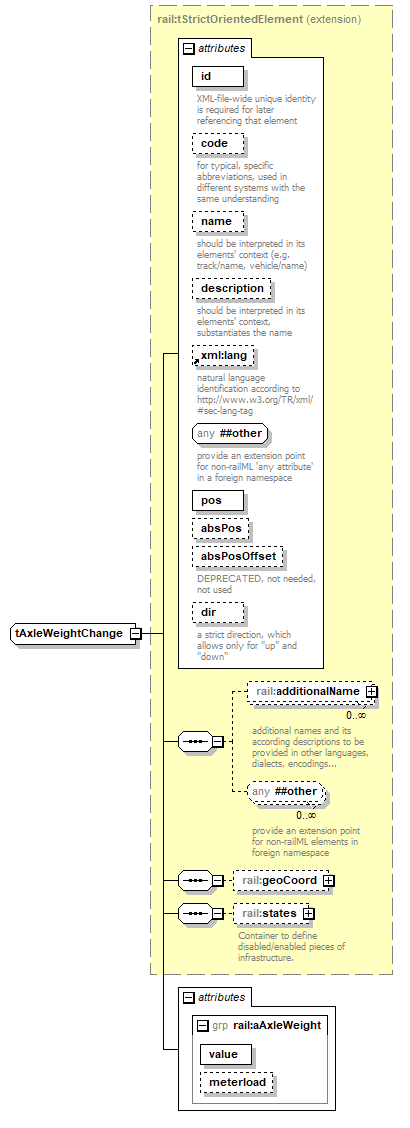 |
||||||||||||||||||||||||||||||||||||||||||||||||||||||||||||||||||||||||||||||||||||||
| namespace | https://www.railml.org/schemas/2018 | ||||||||||||||||||||||||||||||||||||||||||||||||||||||||||||||||||||||||||||||||||||||
| type | extension of rail:tStrictOrientedElement | ||||||||||||||||||||||||||||||||||||||||||||||||||||||||||||||||||||||||||||||||||||||
| properties |
|
||||||||||||||||||||||||||||||||||||||||||||||||||||||||||||||||||||||||||||||||||||||
| children | rail:additionalName rail:geoCoord rail:states | ||||||||||||||||||||||||||||||||||||||||||||||||||||||||||||||||||||||||||||||||||||||
| used by |
|
||||||||||||||||||||||||||||||||||||||||||||||||||||||||||||||||||||||||||||||||||||||
| attributes |
|
||||||||||||||||||||||||||||||||||||||||||||||||||||||||||||||||||||||||||||||||||||||
| source | <xs:complexType name="tAxleWeightChange"> <xs:complexContent> <xs:extension base="rail:tStrictOrientedElement"> <xs:attributeGroup ref="rail:aAxleWeight"/> </xs:extension> </xs:complexContent> </xs:complexType> |
complexType tBalise
| diagram |  |
||||||||||||||||||||||||||||||||||||||||||||||||||||||||||||||||||||||||||||||||||||||||||||||||||||||||||||||||||||||
| namespace | https://www.railml.org/schemas/2018 | ||||||||||||||||||||||||||||||||||||||||||||||||||||||||||||||||||||||||||||||||||||||||||||||||||||||||||||||||||||||
| type | extension of rail:tOrientedElement | ||||||||||||||||||||||||||||||||||||||||||||||||||||||||||||||||||||||||||||||||||||||||||||||||||||||||||||||||||||||
| properties |
|
||||||||||||||||||||||||||||||||||||||||||||||||||||||||||||||||||||||||||||||||||||||||||||||||||||||||||||||||||||||
| children | rail:additionalName rail:geoCoord rail:states | ||||||||||||||||||||||||||||||||||||||||||||||||||||||||||||||||||||||||||||||||||||||||||||||||||||||||||||||||||||||
| used by |
|
||||||||||||||||||||||||||||||||||||||||||||||||||||||||||||||||||||||||||||||||||||||||||||||||||||||||||||||||||||||
| attributes |
|
||||||||||||||||||||||||||||||||||||||||||||||||||||||||||||||||||||||||||||||||||||||||||||||||||||||||||||||||||||||
| source | <xs:complexType name="tBalise"> <xs:complexContent> <xs:extension base="rail:tOrientedElement"> <xs:attributeGroup ref="rail:aBalise"/> <xs:attribute name="ndx" type="rail:tPIG"/> </xs:extension> </xs:complexContent> </xs:complexType> |
attribute tBalise/@ndx
| type | rail:tPIG | |||||||||
| facets |
|
|||||||||
| source | <xs:attribute name="ndx" type="rail:tPIG"/> |
complexType tBaliseGroup
| diagram | 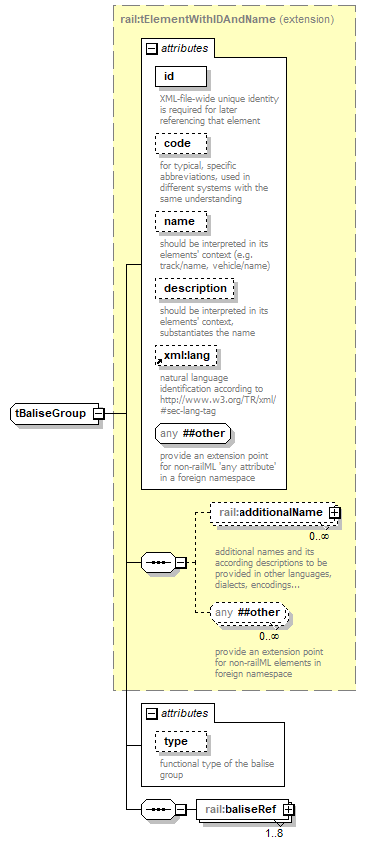 |
||||||||||||||||||||||||||||||||||||||||||||||||||||||
| namespace | https://www.railml.org/schemas/2018 | ||||||||||||||||||||||||||||||||||||||||||||||||||||||
| type | extension of rail:tElementWithIDAndName | ||||||||||||||||||||||||||||||||||||||||||||||||||||||
| properties |
|
||||||||||||||||||||||||||||||||||||||||||||||||||||||
| children | rail:additionalName rail:baliseRef | ||||||||||||||||||||||||||||||||||||||||||||||||||||||
| used by |
|
||||||||||||||||||||||||||||||||||||||||||||||||||||||
| attributes |
|
||||||||||||||||||||||||||||||||||||||||||||||||||||||
| source | <xs:complexType name="tBaliseGroup"> <xs:complexContent> <xs:extension base="rail:tElementWithIDAndName"> <xs:sequence> <xs:element name="baliseRef" type="rail:tBaliseRefInGroup" maxOccurs="8"> <xs:annotation> <xs:documentation source="http://wiki.railml.org/index.php?title=IS:baliseRef"/> </xs:annotation> </xs:element> </xs:sequence> <xs:attribute name="type" type="rail:tBaliseGroupType"> <xs:annotation> <xs:documentation>functional type of the balise group</xs:documentation> </xs:annotation> </xs:attribute> </xs:extension> </xs:complexContent> </xs:complexType> |
attribute tBaliseGroup/@type
| type | rail:tBaliseGroupType | ||
| annotation |
|
||
| source | <xs:attribute name="type" type="rail:tBaliseGroupType"> <xs:annotation> <xs:documentation>functional type of the balise group</xs:documentation> </xs:annotation> </xs:attribute> |
element tBaliseGroup/baliseRef
| diagram | 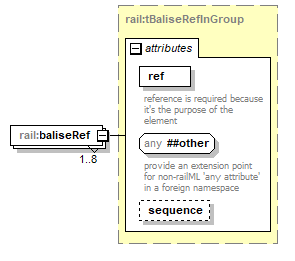 |
||||||||||||||||||||
| namespace | https://www.railml.org/schemas/2018 | ||||||||||||||||||||
| type | rail:tBaliseRefInGroup | ||||||||||||||||||||
| properties |
|
||||||||||||||||||||
| attributes |
|
||||||||||||||||||||
| source | <xs:element name="baliseRef" type="rail:tBaliseRefInGroup" maxOccurs="8"> <xs:annotation> <xs:documentation source="http://wiki.railml.org/index.php?title=IS:baliseRef"/> </xs:annotation> </xs:element> |
complexType tBaliseRefInGroup
| diagram | 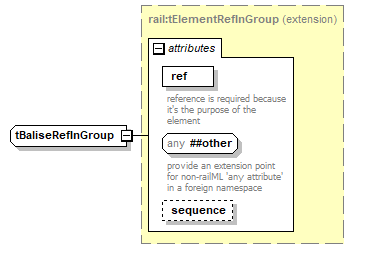 |
||||||||||||||||||||
| namespace | https://www.railml.org/schemas/2018 | ||||||||||||||||||||
| type | extension of rail:tElementRefInGroup | ||||||||||||||||||||
| properties |
|
||||||||||||||||||||
| used by |
|
||||||||||||||||||||
| attributes |
|
||||||||||||||||||||
| source | <xs:complexType name="tBaliseRefInGroup"> <xs:complexContent> <xs:extension base="rail:tElementRefInGroup"/> <!-- Possible baliseGroup-specific attributes to be added here later --> </xs:complexContent> </xs:complexType> |
complexType tBasePlacedElement
| diagram | 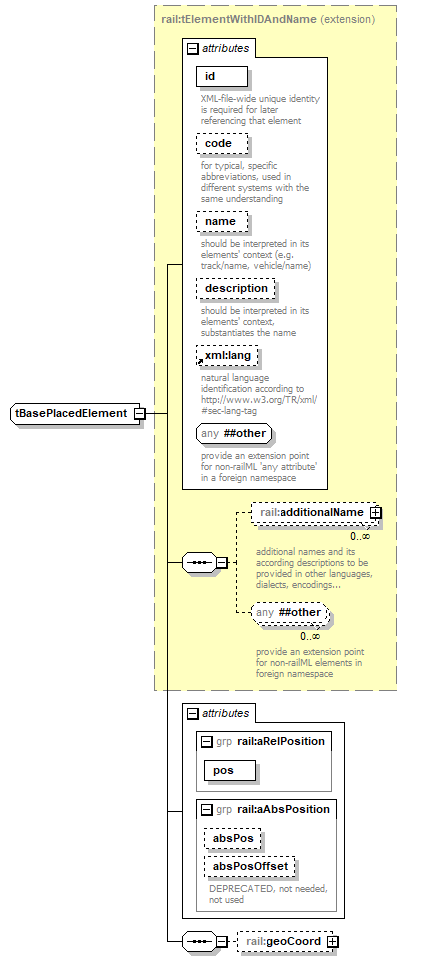 |
||||||||||||||||||||||||||||||||||||||||||||||||||||||||||||||||||
| namespace | https://www.railml.org/schemas/2018 | ||||||||||||||||||||||||||||||||||||||||||||||||||||||||||||||||||
| type | extension of rail:tElementWithIDAndName | ||||||||||||||||||||||||||||||||||||||||||||||||||||||||||||||||||
| properties |
|
||||||||||||||||||||||||||||||||||||||||||||||||||||||||||||||||||
| children | rail:additionalName rail:geoCoord | ||||||||||||||||||||||||||||||||||||||||||||||||||||||||||||||||||
| used by |
|
||||||||||||||||||||||||||||||||||||||||||||||||||||||||||||||||||
| attributes |
|
||||||||||||||||||||||||||||||||||||||||||||||||||||||||||||||||||
| source | <xs:complexType name="tBasePlacedElement"> <xs:complexContent> <xs:extension base="rail:tElementWithIDAndName"> <xs:sequence> <xs:element name="geoCoord" type="rail:tGeoCoord" minOccurs="0"> <xs:annotation> <xs:documentation source="http://wiki.railml.org/index.php?title=IS:geoCoord_switch"/> <xs:documentation source="http://wiki.railml.org/index.php?title=IS:geoCoord_crossing"/> <xs:documentation source="http://wiki.railml.org/index.php?title=IS:geoCoord_crossSection"/> <xs:documentation source="http://wiki.railml.org/index.php?title=IS:geoCoord_border"/> <xs:documentation source="http://wiki.railml.org/index.php?title=IS:geoCoord_speedChange"/> <xs:documentation source="http://wiki.railml.org/index.php?title=IS:geoCoord_gradientChange"/> <xs:documentation source="http://wiki.railml.org/index.php?title=IS:geoCoord_radiusChange"/> <xs:documentation source="http://wiki.railml.org/index.php?title=IS:geoCoord_levelCrossing"/> <xs:documentation source="http://wiki.railml.org/index.php?title=IS:geoCoord_ownerChange"/> <xs:documentation source="http://wiki.railml.org/index.php?title=IS:geoCoord_operationModeChange"/> <xs:documentation source="http://wiki.railml.org/index.php?title=IS:geoCoord_trainProtectionChange"/> <xs:documentation source="http://wiki.railml.org/index.php?title=IS:geoCoord_electrificationChange"/> <xs:documentation source="http://wiki.railml.org/index.php?title=IS:geoCoord_powerTransmissionChange"/> <xs:documentation source="http://wiki.railml.org/index.php?title=IS:geoCoord_axleWeightChange"/> <xs:documentation source="http://wiki.railml.org/index.php?title=IS:geoCoord_gaugeChange"/> <xs:documentation source="http://wiki.railml.org/index.php?title=IS:geoCoord_geoMapping"/> <xs:documentation source="http://wiki.railml.org/index.php?title=IS:geoCoord_trackCondition"/> <xs:documentation source="http://wiki.railml.org/index.php?title=IS:geoCoord_signal"/> <xs:documentation source="http://wiki.railml.org/index.php?title=IS:geoCoord_trainDetector"/> <xs:documentation source="http://wiki.railml.org/index.php?title=IS:geoCoord_trackCircuitBorder"/> <xs:documentation source="http://wiki.railml.org/index.php?title=IS:geoCoord_balise"/> <xs:documentation source="http://wiki.railml.org/index.php?title=IS:geoCoord_trainProtectionElement"/> <xs:documentation source="http://wiki.railml.org/index.php?title=IS:geoCoord_tunnel"/> <xs:documentation source="http://wiki.railml.org/index.php?title=IS:geoCoord_brigde"/> <xs:documentation source="http://wiki.railml.org/index.php?title=IS:geoCoord_platformEdge"/> <xs:documentation source="http://wiki.railml.org/index.php?title=IS:geoCoord_serviceSection"/> </xs:annotation> </xs:element> </xs:sequence> <xs:attributeGroup ref="rail:aRelPosition"/> <xs:attributeGroup ref="rail:aAbsPosition"/> </xs:extension> </xs:complexContent> </xs:complexType> |
element tBasePlacedElement/geoCoord
| diagram | 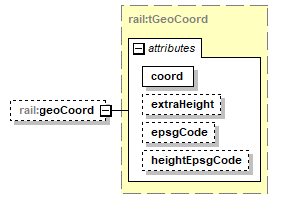 |
||||||||||||||||||||||||||||||
| namespace | https://www.railml.org/schemas/2018 | ||||||||||||||||||||||||||||||
| type | rail:tGeoCoord | ||||||||||||||||||||||||||||||
| properties |
|
||||||||||||||||||||||||||||||
| attributes |
|
||||||||||||||||||||||||||||||
| source | <xs:element name="geoCoord" type="rail:tGeoCoord" minOccurs="0"> <xs:annotation> <xs:documentation source="http://wiki.railml.org/index.php?title=IS:geoCoord_switch"/> <xs:documentation source="http://wiki.railml.org/index.php?title=IS:geoCoord_crossing"/> <xs:documentation source="http://wiki.railml.org/index.php?title=IS:geoCoord_crossSection"/> <xs:documentation source="http://wiki.railml.org/index.php?title=IS:geoCoord_border"/> <xs:documentation source="http://wiki.railml.org/index.php?title=IS:geoCoord_speedChange"/> <xs:documentation source="http://wiki.railml.org/index.php?title=IS:geoCoord_gradientChange"/> <xs:documentation source="http://wiki.railml.org/index.php?title=IS:geoCoord_radiusChange"/> <xs:documentation source="http://wiki.railml.org/index.php?title=IS:geoCoord_levelCrossing"/> <xs:documentation source="http://wiki.railml.org/index.php?title=IS:geoCoord_ownerChange"/> <xs:documentation source="http://wiki.railml.org/index.php?title=IS:geoCoord_operationModeChange"/> <xs:documentation source="http://wiki.railml.org/index.php?title=IS:geoCoord_trainProtectionChange"/> <xs:documentation source="http://wiki.railml.org/index.php?title=IS:geoCoord_electrificationChange"/> <xs:documentation source="http://wiki.railml.org/index.php?title=IS:geoCoord_powerTransmissionChange"/> <xs:documentation source="http://wiki.railml.org/index.php?title=IS:geoCoord_axleWeightChange"/> <xs:documentation source="http://wiki.railml.org/index.php?title=IS:geoCoord_gaugeChange"/> <xs:documentation source="http://wiki.railml.org/index.php?title=IS:geoCoord_geoMapping"/> <xs:documentation source="http://wiki.railml.org/index.php?title=IS:geoCoord_trackCondition"/> <xs:documentation source="http://wiki.railml.org/index.php?title=IS:geoCoord_signal"/> <xs:documentation source="http://wiki.railml.org/index.php?title=IS:geoCoord_trainDetector"/> <xs:documentation source="http://wiki.railml.org/index.php?title=IS:geoCoord_trackCircuitBorder"/> <xs:documentation source="http://wiki.railml.org/index.php?title=IS:geoCoord_balise"/> <xs:documentation source="http://wiki.railml.org/index.php?title=IS:geoCoord_trainProtectionElement"/> <xs:documentation source="http://wiki.railml.org/index.php?title=IS:geoCoord_tunnel"/> <xs:documentation source="http://wiki.railml.org/index.php?title=IS:geoCoord_brigde"/> <xs:documentation source="http://wiki.railml.org/index.php?title=IS:geoCoord_platformEdge"/> <xs:documentation source="http://wiki.railml.org/index.php?title=IS:geoCoord_serviceSection"/> </xs:annotation> </xs:element> |
complexType tBaseServiceSection
| diagram | 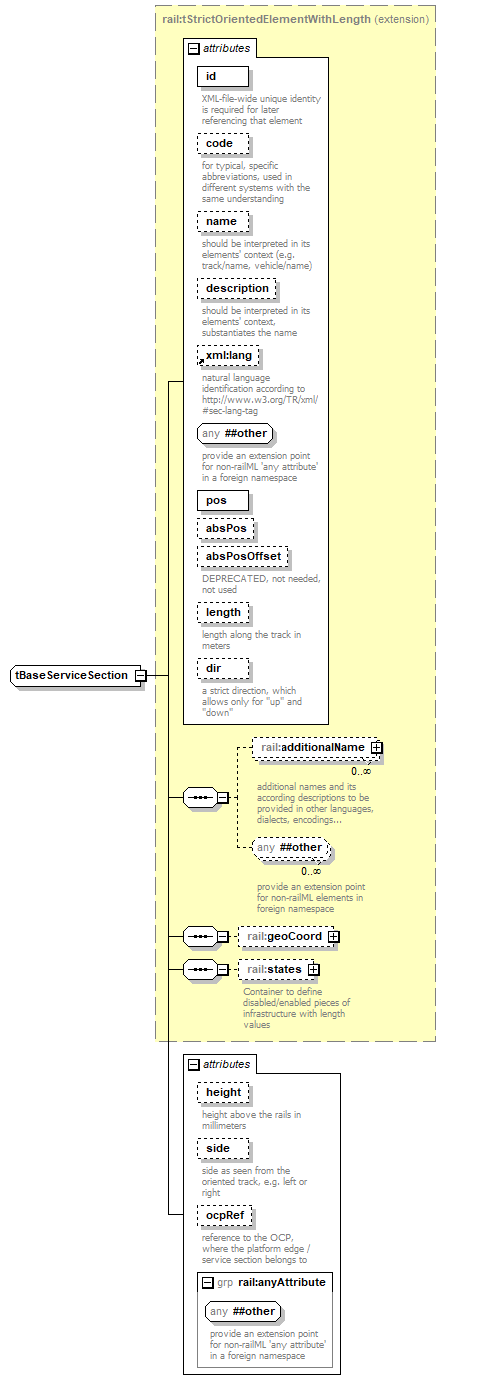 |
||||||||||||||||||||||||||||||||||||||||||||||||||||||||||||||||||||||||||||||||||||||||||||||||||||||||||
| namespace | https://www.railml.org/schemas/2018 | ||||||||||||||||||||||||||||||||||||||||||||||||||||||||||||||||||||||||||||||||||||||||||||||||||||||||||
| type | extension of rail:tStrictOrientedElementWithLength | ||||||||||||||||||||||||||||||||||||||||||||||||||||||||||||||||||||||||||||||||||||||||||||||||||||||||||
| properties |
|
||||||||||||||||||||||||||||||||||||||||||||||||||||||||||||||||||||||||||||||||||||||||||||||||||||||||||
| children | rail:additionalName rail:geoCoord rail:states | ||||||||||||||||||||||||||||||||||||||||||||||||||||||||||||||||||||||||||||||||||||||||||||||||||||||||||
| used by |
|
||||||||||||||||||||||||||||||||||||||||||||||||||||||||||||||||||||||||||||||||||||||||||||||||||||||||||
| attributes |
|
||||||||||||||||||||||||||||||||||||||||||||||||||||||||||||||||||||||||||||||||||||||||||||||||||||||||||
| source | <xs:complexType name="tBaseServiceSection"> <xs:complexContent> <xs:extension base="rail:tStrictOrientedElementWithLength"> <xs:attribute name="height" type="rail:tLengthMM"> <xs:annotation> <xs:documentation>height above the rails in millimeters</xs:documentation> </xs:annotation> </xs:attribute> <xs:attribute name="side" type="rail:tSide"> <xs:annotation> <xs:documentation>side as seen from the oriented track, e.g. left or right</xs:documentation> </xs:annotation> </xs:attribute> <xs:attribute name="ocpRef" type="rail:tGenericRef"> <xs:annotation> <xs:documentation>reference to the OCP, where the platform edge / service section belongs to</xs:documentation> </xs:annotation> </xs:attribute> <xs:attributeGroup ref="rail:anyAttribute"/> </xs:extension> </xs:complexContent> </xs:complexType> |
attribute tBaseServiceSection/@height
| type | rail:tLengthMM | ||||||
| facets |
|
||||||
| annotation |
|
||||||
| source | <xs:attribute name="height" type="rail:tLengthMM"> <xs:annotation> <xs:documentation>height above the rails in millimeters</xs:documentation> </xs:annotation> </xs:attribute> |
attribute tBaseServiceSection/@side
| type | rail:tSide | |||||||||||||
| facets |
|
|||||||||||||
| annotation |
|
|||||||||||||
| source | <xs:attribute name="side" type="rail:tSide"> <xs:annotation> <xs:documentation>side as seen from the oriented track, e.g. left or right</xs:documentation> </xs:annotation> </xs:attribute> |
attribute tBaseServiceSection/@ocpRef
| type | rail:tGenericRef | ||
| annotation |
|
||
| source | <xs:attribute name="ocpRef" type="rail:tGenericRef"> <xs:annotation> <xs:documentation>reference to the OCP, where the platform edge / service section belongs to</xs:documentation> </xs:annotation> </xs:attribute> |
complexType tBorder
| diagram | 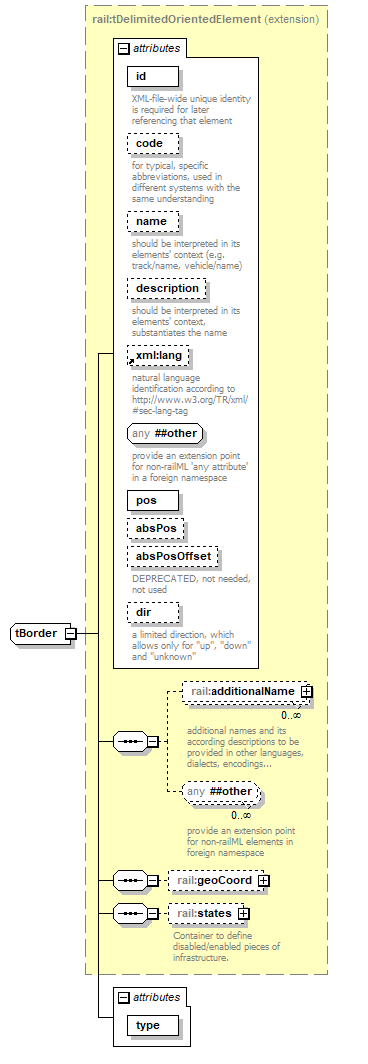 |
||||||||||||||||||||||||||||||||||||||||||||||||||||||||||||||||||||||||||||||||
| namespace | https://www.railml.org/schemas/2018 | ||||||||||||||||||||||||||||||||||||||||||||||||||||||||||||||||||||||||||||||||
| type | extension of rail:tDelimitedOrientedElement | ||||||||||||||||||||||||||||||||||||||||||||||||||||||||||||||||||||||||||||||||
| properties |
|
||||||||||||||||||||||||||||||||||||||||||||||||||||||||||||||||||||||||||||||||
| children | rail:additionalName rail:geoCoord rail:states | ||||||||||||||||||||||||||||||||||||||||||||||||||||||||||||||||||||||||||||||||
| used by |
|
||||||||||||||||||||||||||||||||||||||||||||||||||||||||||||||||||||||||||||||||
| attributes |
|
||||||||||||||||||||||||||||||||||||||||||||||||||||||||||||||||||||||||||||||||
| source | <xs:complexType name="tBorder"> <xs:complexContent> <xs:extension base="rail:tDelimitedOrientedElement"> <xs:attribute name="type" type="rail:tBorderType" use="required"/> </xs:extension> </xs:complexContent> </xs:complexType> |
attribute tBorder/@type
| type | rail:tBorderType | ||
| properties |
|
||
| source | <xs:attribute name="type" type="rail:tBorderType" use="required"/> |
complexType tBraking
| diagram | 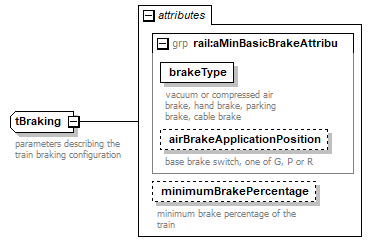 |
||||||||||||||||||||||||||||||
| namespace | https://www.railml.org/schemas/2018 | ||||||||||||||||||||||||||||||
| used by |
|
||||||||||||||||||||||||||||||
| attributes |
|
||||||||||||||||||||||||||||||
| annotation |
|
||||||||||||||||||||||||||||||
| source | <xs:complexType name="tBraking"> <xs:annotation> <xs:documentation>parameters describing the train braking configuration</xs:documentation> </xs:annotation> <xs:attributeGroup ref="rail:aMinBasicBrakeAttributes"/> <xs:attribute name="minimumBrakePercentage" type="rail:tBrakePercentage"> <xs:annotation> <xs:documentation>minimum brake percentage of the train</xs:documentation> </xs:annotation> </xs:attribute> </xs:complexType> |
attribute tBraking/@minimumBrakePercentage
| type | rail:tBrakePercentage | |||||||||
| facets |
|
|||||||||
| annotation |
|
|||||||||
| source | <xs:attribute name="minimumBrakePercentage" type="rail:tBrakePercentage"> <xs:annotation> <xs:documentation>minimum brake percentage of the train</xs:documentation> </xs:annotation> </xs:attribute> |
complexType tBridge
| diagram | 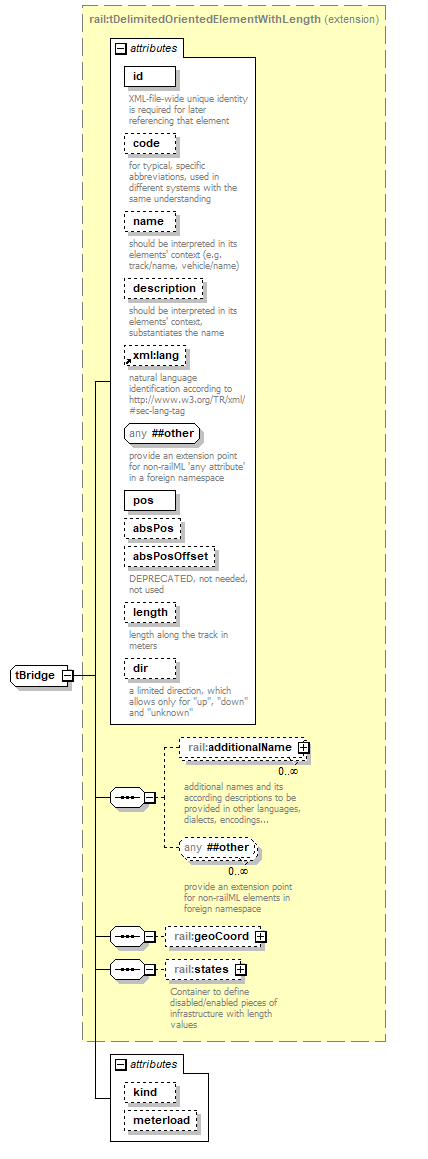 |
||||||||||||||||||||||||||||||||||||||||||||||||||||||||||||||||||||||||||||||||||||||||||||||
| namespace | https://www.railml.org/schemas/2018 | ||||||||||||||||||||||||||||||||||||||||||||||||||||||||||||||||||||||||||||||||||||||||||||||
| type | extension of rail:tDelimitedOrientedElementWithLength | ||||||||||||||||||||||||||||||||||||||||||||||||||||||||||||||||||||||||||||||||||||||||||||||
| properties |
|
||||||||||||||||||||||||||||||||||||||||||||||||||||||||||||||||||||||||||||||||||||||||||||||
| children | rail:additionalName rail:geoCoord rail:states | ||||||||||||||||||||||||||||||||||||||||||||||||||||||||||||||||||||||||||||||||||||||||||||||
| used by |
|
||||||||||||||||||||||||||||||||||||||||||||||||||||||||||||||||||||||||||||||||||||||||||||||
| attributes |
|
||||||||||||||||||||||||||||||||||||||||||||||||||||||||||||||||||||||||||||||||||||||||||||||
| source | <xs:complexType name="tBridge"> <xs:complexContent> <xs:extension base="rail:tDelimitedOrientedElementWithLength"> <xs:attribute name="kind" type="xs:string"/> <xs:attribute name="meterload" type="rail:tMeterloadTonsPerMeter"/> </xs:extension> </xs:complexContent> </xs:complexType> |
attribute tBridge/@kind
| type | xs:string |
| source | <xs:attribute name="kind" type="xs:string"/> |
attribute tBridge/@meterload
| type | rail:tMeterloadTonsPerMeter | ||||||
| facets |
|
||||||
| source | <xs:attribute name="meterload" type="rail:tMeterloadTonsPerMeter"/> |
complexType tBufferStop
| diagram | 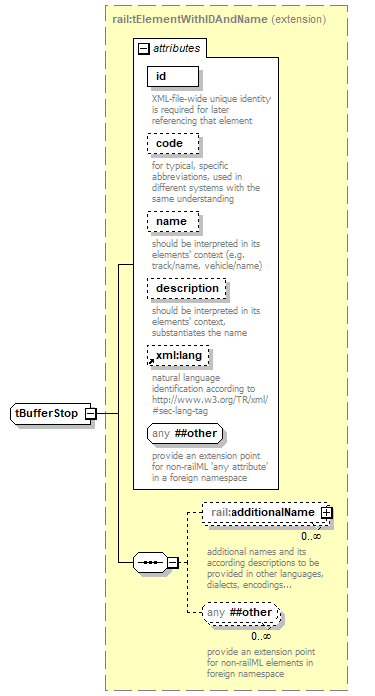 |
||||||||||||||||||||||||||||||||||||||||||||||
| namespace | https://www.railml.org/schemas/2018 | ||||||||||||||||||||||||||||||||||||||||||||||
| type | extension of rail:tElementWithIDAndName | ||||||||||||||||||||||||||||||||||||||||||||||
| properties |
|
||||||||||||||||||||||||||||||||||||||||||||||
| children | rail:additionalName | ||||||||||||||||||||||||||||||||||||||||||||||
| used by |
|
||||||||||||||||||||||||||||||||||||||||||||||
| attributes |
|
||||||||||||||||||||||||||||||||||||||||||||||
| source | <xs:complexType name="tBufferStop"> <xs:complexContent> <xs:extension base="rail:tElementWithIDAndName"/> </xs:complexContent> </xs:complexType> |
complexType tClearanceGaugeChange
| diagram | 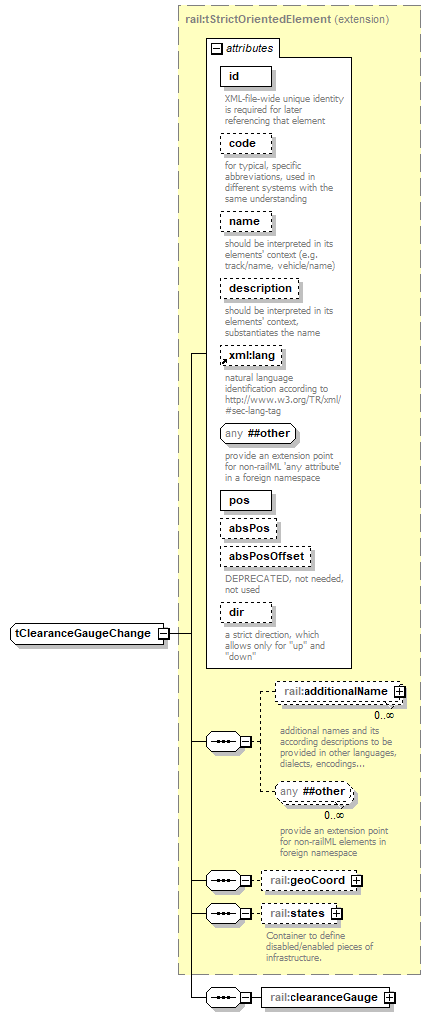 |
||||||||||||||||||||||||||||||||||||||||||||||||||||||||||||||||||||||||||
| namespace | https://www.railml.org/schemas/2018 | ||||||||||||||||||||||||||||||||||||||||||||||||||||||||||||||||||||||||||
| type | extension of rail:tStrictOrientedElement | ||||||||||||||||||||||||||||||||||||||||||||||||||||||||||||||||||||||||||
| properties |
|
||||||||||||||||||||||||||||||||||||||||||||||||||||||||||||||||||||||||||
| children | rail:additionalName rail:geoCoord rail:states rail:clearanceGauge | ||||||||||||||||||||||||||||||||||||||||||||||||||||||||||||||||||||||||||
| used by |
|
||||||||||||||||||||||||||||||||||||||||||||||||||||||||||||||||||||||||||
| attributes |
|
||||||||||||||||||||||||||||||||||||||||||||||||||||||||||||||||||||||||||
| source | <xs:complexType name="tClearanceGaugeChange"> <xs:complexContent> <xs:extension base="rail:tStrictOrientedElement"> <xs:sequence> <xs:element name="clearanceGauge" type="rail:tClearanceGaugeType"/> </xs:sequence> </xs:extension> </xs:complexContent> </xs:complexType> |
element tClearanceGaugeChange/clearanceGauge
| diagram | 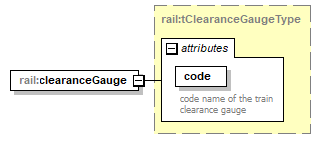 |
||||||||||||||||
| namespace | https://www.railml.org/schemas/2018 | ||||||||||||||||
| type | rail:tClearanceGaugeType | ||||||||||||||||
| properties |
|
||||||||||||||||
| attributes |
|
||||||||||||||||
| source | <xs:element name="clearanceGauge" type="rail:tClearanceGaugeType"/> |
complexType tCommonSwitchAndCrossingData
| diagram | 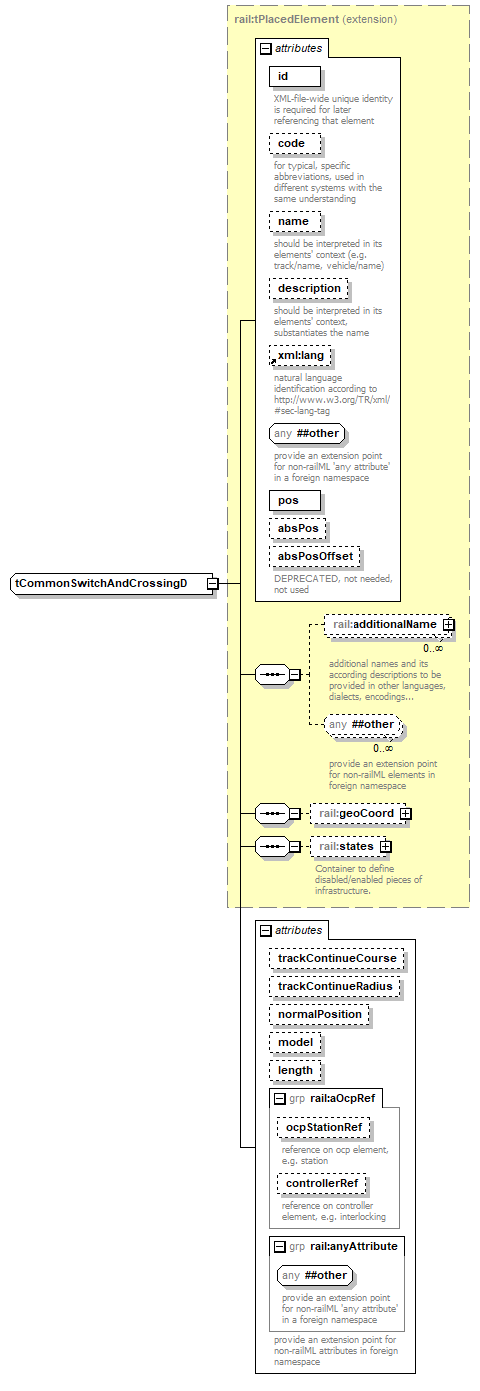 |
||||||||||||||||||||||||||||||||||||||||||||||||||||||||||||||||||||||||||||||||||||||||||||||||||||||||||||||||
| namespace | https://www.railml.org/schemas/2018 | ||||||||||||||||||||||||||||||||||||||||||||||||||||||||||||||||||||||||||||||||||||||||||||||||||||||||||||||||
| type | extension of rail:tPlacedElement | ||||||||||||||||||||||||||||||||||||||||||||||||||||||||||||||||||||||||||||||||||||||||||||||||||||||||||||||||
| properties |
|
||||||||||||||||||||||||||||||||||||||||||||||||||||||||||||||||||||||||||||||||||||||||||||||||||||||||||||||||
| children | rail:additionalName rail:geoCoord rail:states | ||||||||||||||||||||||||||||||||||||||||||||||||||||||||||||||||||||||||||||||||||||||||||||||||||||||||||||||||
| used by |
|
||||||||||||||||||||||||||||||||||||||||||||||||||||||||||||||||||||||||||||||||||||||||||||||||||||||||||||||||
| attributes |
|
||||||||||||||||||||||||||||||||||||||||||||||||||||||||||||||||||||||||||||||||||||||||||||||||||||||||||||||||
| source | <xs:complexType name="tCommonSwitchAndCrossingData"> <xs:complexContent> <xs:extension base="rail:tPlacedElement"> <xs:attribute name="trackContinueCourse" type="rail:tCourse"/> <xs:attribute name="trackContinueRadius" type="rail:tRadiusM"/> <xs:attribute name="normalPosition" type="rail:tCourse"/> <xs:attribute name="model" type="xs:string"/> <xs:attribute name="length" type="rail:tLengthM"/> <xs:attributeGroup ref="rail:aOcpRef"/> <xs:attributeGroup ref="rail:anyAttribute"> <xs:annotation> <xs:documentation>provide an extension point for non-railML attributes in foreign namespace</xs:documentation> </xs:annotation> </xs:attributeGroup> </xs:extension> </xs:complexContent> </xs:complexType> |
attribute tCommonSwitchAndCrossingData/@trackContinueCourse
| type | rail:tCourse |
| source | <xs:attribute name="trackContinueCourse" type="rail:tCourse"/> |
attribute tCommonSwitchAndCrossingData/@trackContinueRadius
| type | rail:tRadiusM | ||||||
| facets |
|
||||||
| source | <xs:attribute name="trackContinueRadius" type="rail:tRadiusM"/> |
attribute tCommonSwitchAndCrossingData/@normalPosition
| type | rail:tCourse |
| source | <xs:attribute name="normalPosition" type="rail:tCourse"/> |
attribute tCommonSwitchAndCrossingData/@model
| type | xs:string |
| source | <xs:attribute name="model" type="xs:string"/> |
attribute tCommonSwitchAndCrossingData/@length
| type | rail:tLengthM | ||||||
| facets |
|
||||||
| source | <xs:attribute name="length" type="rail:tLengthM"/> |
complexType tConnectionData
| diagram |  |
||||||||||||||||||
| namespace | https://www.railml.org/schemas/2018 | ||||||||||||||||||
| used by |
|
||||||||||||||||||
| attributes |
|
||||||||||||||||||
| source | <xs:complexType name="tConnectionData"> <xs:attribute name="id" type="rail:tGenericID" use="required"/> <xs:attribute name="ref" type="rail:tGenericRef" use="required"/> </xs:complexType> |
attribute tConnectionData/@id
| type | rail:tGenericID | ||
| properties |
|
||
| source | <xs:attribute name="id" type="rail:tGenericID" use="required"/> |
attribute tConnectionData/@ref
| type | rail:tGenericRef | ||
| properties |
|
||
| source | <xs:attribute name="ref" type="rail:tGenericRef" use="required"/> |
complexType tController
| diagram |  |
||||||||||||||||||||||||||||||||||||||||||||||||||||||||||||||||||||||||||||||||||||||
| namespace | https://www.railml.org/schemas/2018 | ||||||||||||||||||||||||||||||||||||||||||||||||||||||||||||||||||||||||||||||||||||||
| type | extension of rail:tElementWithIDAndName | ||||||||||||||||||||||||||||||||||||||||||||||||||||||||||||||||||||||||||||||||||||||
| properties |
|
||||||||||||||||||||||||||||||||||||||||||||||||||||||||||||||||||||||||||||||||||||||
| children | rail:additionalName rail:states rail:ocpRef | ||||||||||||||||||||||||||||||||||||||||||||||||||||||||||||||||||||||||||||||||||||||
| used by |
|
||||||||||||||||||||||||||||||||||||||||||||||||||||||||||||||||||||||||||||||||||||||
| attributes |
|
||||||||||||||||||||||||||||||||||||||||||||||||||||||||||||||||||||||||||||||||||||||
| source | <xs:complexType name="tController"> <xs:complexContent> <xs:extension base="rail:tElementWithIDAndName"> <xs:annotation> <xs:documentation>controller element, e.g. interlocking</xs:documentation> </xs:annotation> <xs:sequence> <xs:element name="states" type="rail:tStates" minOccurs="0"> <xs:annotation> <xs:documentation>Container to define disabled/enabled controllers</xs:documentation> <xs:documentation source="http://wiki.railml.org/index.php?title=IS:states_controller"/> </xs:annotation> </xs:element> <xs:element name="ocpRef" type="rail:tElementRefInGroup" minOccurs="0" maxOccurs="unbounded"> <xs:annotation> <xs:documentation>reference from a controller to an OCP</xs:documentation> </xs:annotation> </xs:element> </xs:sequence> <xs:attributeGroup ref="rail:aController"/> </xs:extension> </xs:complexContent> </xs:complexType> |
element tController/states
| diagram | 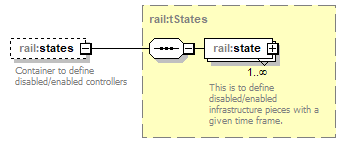 |
||||||
| namespace | https://www.railml.org/schemas/2018 | ||||||
| type | rail:tStates | ||||||
| properties |
|
||||||
| children | rail:state | ||||||
| annotation |
|
||||||
| source | <xs:element name="states" type="rail:tStates" minOccurs="0"> <xs:annotation> <xs:documentation>Container to define disabled/enabled controllers</xs:documentation> <xs:documentation source="http://wiki.railml.org/index.php?title=IS:states_controller"/> </xs:annotation> </xs:element> |
element tController/ocpRef
| diagram | 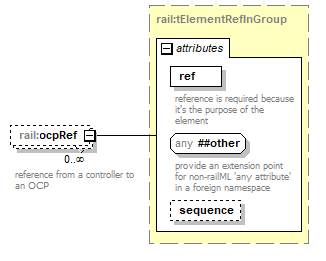 |
||||||||||||||||||||
| namespace | https://www.railml.org/schemas/2018 | ||||||||||||||||||||
| type | rail:tElementRefInGroup | ||||||||||||||||||||
| properties |
|
||||||||||||||||||||
| attributes |
|
||||||||||||||||||||
| annotation |
|
||||||||||||||||||||
| source | <xs:element name="ocpRef" type="rail:tElementRefInGroup" minOccurs="0" maxOccurs="unbounded"> <xs:annotation> <xs:documentation>reference from a controller to an OCP</xs:documentation> </xs:annotation> </xs:element> |
complexType tCrossedElement
| diagram | 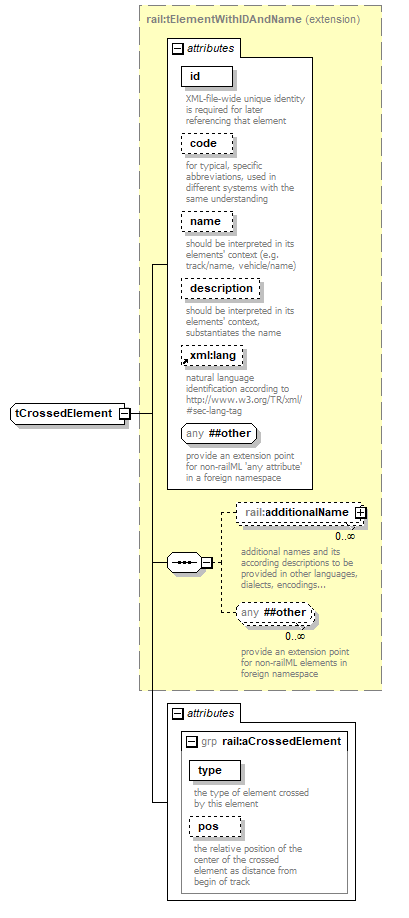 |
||||||||||||||||||||||||||||||||||||||||||||||||||||||||||||||||
| namespace | https://www.railml.org/schemas/2018 | ||||||||||||||||||||||||||||||||||||||||||||||||||||||||||||||||
| type | extension of rail:tElementWithIDAndName | ||||||||||||||||||||||||||||||||||||||||||||||||||||||||||||||||
| properties |
|
||||||||||||||||||||||||||||||||||||||||||||||||||||||||||||||||
| children | rail:additionalName | ||||||||||||||||||||||||||||||||||||||||||||||||||||||||||||||||
| used by |
|
||||||||||||||||||||||||||||||||||||||||||||||||||||||||||||||||
| attributes |
|
||||||||||||||||||||||||||||||||||||||||||||||||||||||||||||||||
| source | <xs:complexType name="tCrossedElement"> <xs:complexContent> <xs:extension base="rail:tElementWithIDAndName"> <xs:attributeGroup ref="rail:aCrossedElement"/> </xs:extension> </xs:complexContent> </xs:complexType> |
complexType tCrossing
| diagram | 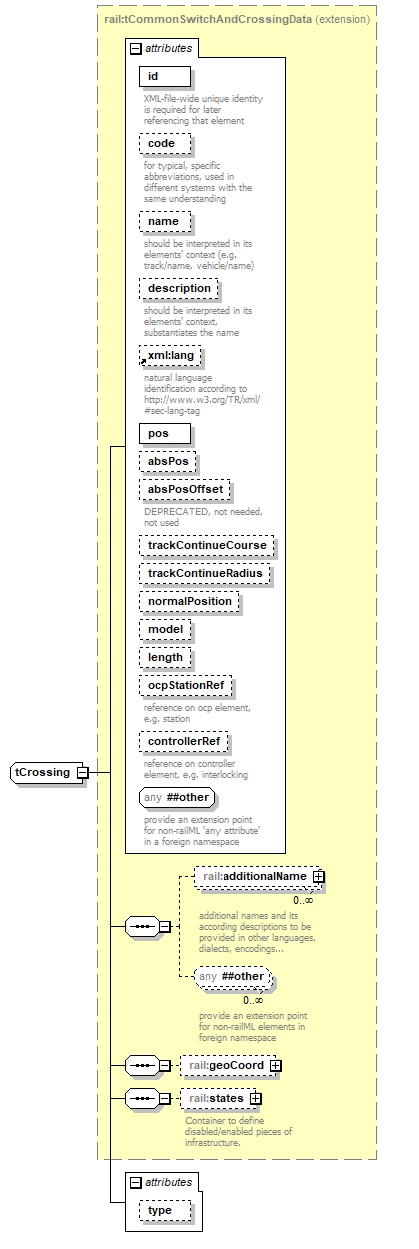 |
||||||||||||||||||||||||||||||||||||||||||||||||||||||||||||||||||||||||||||||||||||||||||||||||||||||||||||||||||||||
| namespace | https://www.railml.org/schemas/2018 | ||||||||||||||||||||||||||||||||||||||||||||||||||||||||||||||||||||||||||||||||||||||||||||||||||||||||||||||||||||||
| type | extension of rail:tCommonSwitchAndCrossingData | ||||||||||||||||||||||||||||||||||||||||||||||||||||||||||||||||||||||||||||||||||||||||||||||||||||||||||||||||||||||
| properties |
|
||||||||||||||||||||||||||||||||||||||||||||||||||||||||||||||||||||||||||||||||||||||||||||||||||||||||||||||||||||||
| children | rail:additionalName rail:geoCoord rail:states | ||||||||||||||||||||||||||||||||||||||||||||||||||||||||||||||||||||||||||||||||||||||||||||||||||||||||||||||||||||||
| used by |
|
||||||||||||||||||||||||||||||||||||||||||||||||||||||||||||||||||||||||||||||||||||||||||||||||||||||||||||||||||||||
| attributes |
|
||||||||||||||||||||||||||||||||||||||||||||||||||||||||||||||||||||||||||||||||||||||||||||||||||||||||||||||||||||||
| source | <xs:complexType name="tCrossing"> <xs:complexContent> <xs:extension base="rail:tCommonSwitchAndCrossingData"> <xs:attribute name="type" type="rail:tCrossingType"/> </xs:extension> </xs:complexContent> </xs:complexType> |
attribute tCrossing/@type
| type | rail:tCrossingType |
| source | <xs:attribute name="type" type="rail:tCrossingType"/> |
complexType tCrossSection
| diagram |  |
||||||||||||||||||||||||||||||||||||||||||||||||||||||||||||||||||||||||||||||||||||||||||||||||||||||
| namespace | https://www.railml.org/schemas/2018 | ||||||||||||||||||||||||||||||||||||||||||||||||||||||||||||||||||||||||||||||||||||||||||||||||||||||
| type | extension of rail:tPlacedElement | ||||||||||||||||||||||||||||||||||||||||||||||||||||||||||||||||||||||||||||||||||||||||||||||||||||||
| properties |
|
||||||||||||||||||||||||||||||||||||||||||||||||||||||||||||||||||||||||||||||||||||||||||||||||||||||
| children | rail:additionalName rail:geoCoord rail:states | ||||||||||||||||||||||||||||||||||||||||||||||||||||||||||||||||||||||||||||||||||||||||||||||||||||||
| used by |
|
||||||||||||||||||||||||||||||||||||||||||||||||||||||||||||||||||||||||||||||||||||||||||||||||||||||
| attributes |
|
||||||||||||||||||||||||||||||||||||||||||||||||||||||||||||||||||||||||||||||||||||||||||||||||||||||
| source | <xs:complexType name="tCrossSection"> <xs:complexContent> <xs:extension base="rail:tPlacedElement"> <xs:attribute name="type" type="rail:tCrossSectionBlockType"/> <xs:attribute name="ocpRef" type="rail:tGenericRef" use="required"/> <xs:attribute name="ocpTrackID" type="xs:unsignedByte"> <xs:annotation> <xs:documentation>DEPRECATED since it is not needed anymore (for defining platforms, please use the platform element instead)</xs:documentation> </xs:annotation> </xs:attribute> <xs:attribute name="dir" type="rail:tLaxDirection"> <xs:annotation> <xs:documentation>DEPRECATED since it is not needed here.</xs:documentation> </xs:annotation> </xs:attribute> <xs:attribute name="ocpCenterSide" type="rail:tOcpCenterSide"> <xs:annotation> <xs:documentation>relative direction starting from the relevant track towards the "operational center" of the OCP</xs:documentation> </xs:annotation> </xs:attribute> </xs:extension> </xs:complexContent> </xs:complexType> |
attribute tCrossSection/@type
| type | rail:tCrossSectionBlockType |
| source | <xs:attribute name="type" type="rail:tCrossSectionBlockType"/> |
attribute tCrossSection/@ocpRef
| type | rail:tGenericRef | ||
| properties |
|
||
| source | <xs:attribute name="ocpRef" type="rail:tGenericRef" use="required"/> |
attribute tCrossSection/@ocpTrackID
| type | xs:unsignedByte | ||
| annotation |
|
||
| source | <xs:attribute name="ocpTrackID" type="xs:unsignedByte"> <xs:annotation> <xs:documentation>DEPRECATED since it is not needed anymore (for defining platforms, please use the platform element instead)</xs:documentation> </xs:annotation> </xs:attribute> |
attribute tCrossSection/@dir
| type | rail:tLaxDirection | ||||||||||||||||||
| facets |
|
||||||||||||||||||
| annotation |
|
||||||||||||||||||
| source | <xs:attribute name="dir" type="rail:tLaxDirection"> <xs:annotation> <xs:documentation>DEPRECATED since it is not needed here.</xs:documentation> </xs:annotation> </xs:attribute> |
attribute tCrossSection/@ocpCenterSide
| type | rail:tOcpCenterSide | ||||||||||||||||||||||||
| facets |
|
||||||||||||||||||||||||
| annotation |
|
||||||||||||||||||||||||
| source | <xs:attribute name="ocpCenterSide" type="rail:tOcpCenterSide"> <xs:annotation> <xs:documentation>relative direction starting from the relevant track towards the "operational center" of the OCP</xs:documentation> </xs:annotation> </xs:attribute> |
complexType tDelimitedOrientedElement
| diagram | 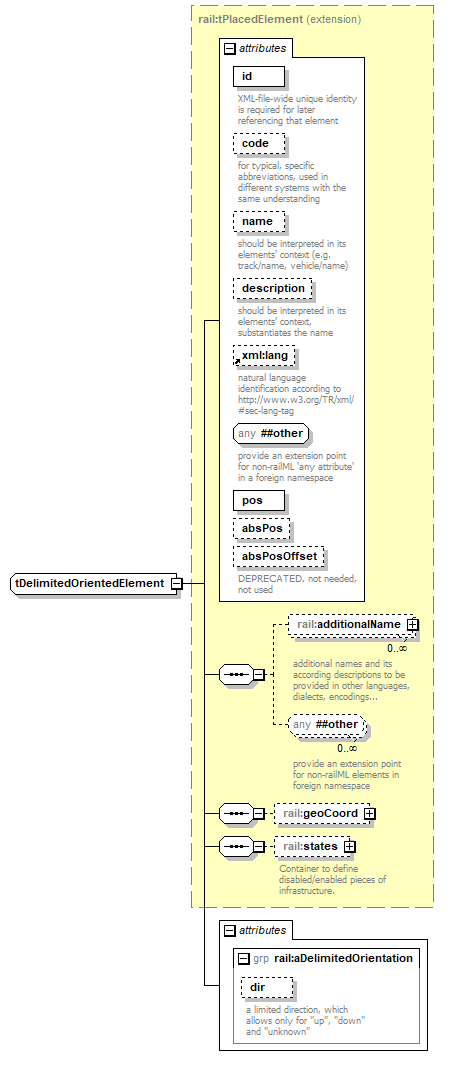 |
||||||||||||||||||||||||||||||||||||||||||||||||||||||||||||||||||||||||||
| namespace | https://www.railml.org/schemas/2018 | ||||||||||||||||||||||||||||||||||||||||||||||||||||||||||||||||||||||||||
| type | extension of rail:tPlacedElement | ||||||||||||||||||||||||||||||||||||||||||||||||||||||||||||||||||||||||||
| properties |
|
||||||||||||||||||||||||||||||||||||||||||||||||||||||||||||||||||||||||||
| children | rail:additionalName rail:geoCoord rail:states | ||||||||||||||||||||||||||||||||||||||||||||||||||||||||||||||||||||||||||
| used by |
|
||||||||||||||||||||||||||||||||||||||||||||||||||||||||||||||||||||||||||
| attributes |
|
||||||||||||||||||||||||||||||||||||||||||||||||||||||||||||||||||||||||||
| source | <xs:complexType name="tDelimitedOrientedElement"> <xs:complexContent> <xs:extension base="rail:tPlacedElement"> <xs:attributeGroup ref="rail:aDelimitedOrientation"/> </xs:extension> </xs:complexContent> </xs:complexType> |
complexType tDelimitedOrientedElementWithLength
| diagram | 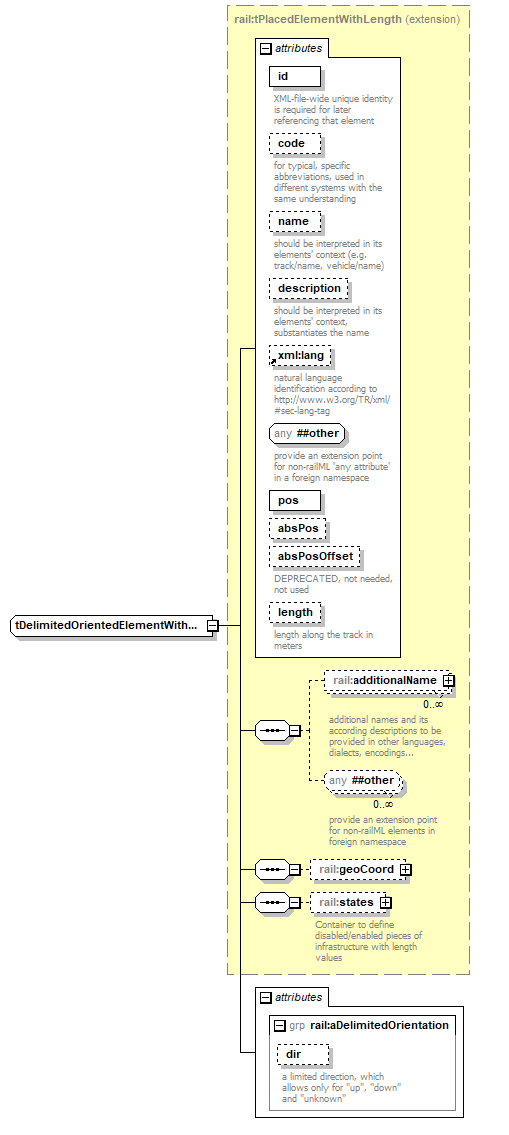 |
||||||||||||||||||||||||||||||||||||||||||||||||||||||||||||||||||||||||||||||||||
| namespace | https://www.railml.org/schemas/2018 | ||||||||||||||||||||||||||||||||||||||||||||||||||||||||||||||||||||||||||||||||||
| type | extension of rail:tPlacedElementWithLength | ||||||||||||||||||||||||||||||||||||||||||||||||||||||||||||||||||||||||||||||||||
| properties |
|
||||||||||||||||||||||||||||||||||||||||||||||||||||||||||||||||||||||||||||||||||
| children | rail:additionalName rail:geoCoord rail:states | ||||||||||||||||||||||||||||||||||||||||||||||||||||||||||||||||||||||||||||||||||
| used by |
|
||||||||||||||||||||||||||||||||||||||||||||||||||||||||||||||||||||||||||||||||||
| attributes |
|
||||||||||||||||||||||||||||||||||||||||||||||||||||||||||||||||||||||||||||||||||
| source | <xs:complexType name="tDelimitedOrientedElementWithLength"> <xs:complexContent> <xs:extension base="rail:tPlacedElementWithLength"> <xs:attributeGroup ref="rail:aDelimitedOrientation"/> </xs:extension> </xs:complexContent> </xs:complexType> |
complexType tDerailer
| diagram |  |
||||||||||||||||||||||||||||||||||||||||||||||||||||||||||||||||||||||||||||||||||||||||||||||||||||||||||
| namespace | https://www.railml.org/schemas/2018 | ||||||||||||||||||||||||||||||||||||||||||||||||||||||||||||||||||||||||||||||||||||||||||||||||||||||||||
| type | extension of rail:tRuleCodeElement | ||||||||||||||||||||||||||||||||||||||||||||||||||||||||||||||||||||||||||||||||||||||||||||||||||||||||||
| properties |
|
||||||||||||||||||||||||||||||||||||||||||||||||||||||||||||||||||||||||||||||||||||||||||||||||||||||||||
| children | rail:additionalName rail:geoCoord rail:states | ||||||||||||||||||||||||||||||||||||||||||||||||||||||||||||||||||||||||||||||||||||||||||||||||||||||||||
| used by |
|
||||||||||||||||||||||||||||||||||||||||||||||||||||||||||||||||||||||||||||||||||||||||||||||||||||||||||
| attributes |
|
||||||||||||||||||||||||||||||||||||||||||||||||||||||||||||||||||||||||||||||||||||||||||||||||||||||||||
| source | <xs:complexType name="tDerailer"> <xs:complexContent> <xs:extension base="rail:tRuleCodeElement"> <xs:attribute name="derailSide" type="rail:tSide"> <xs:annotation> <xs:documentation>Side, to which the vehicle will be derailed (left or right) considering the orientation of the track.</xs:documentation> </xs:annotation> </xs:attribute> <xs:attribute name="kind" type="rail:tDerailKind"> <xs:annotation> <xs:documentation>kind of derail device (cp. book "Railway Signalling and Interlocking" by Gregor Theeg and Sergej Vlasenko (Editors), p. 155)</xs:documentation> </xs:annotation> </xs:attribute> <xs:attribute name="model" type="xs:string"> <xs:annotation> <xs:documentation>specification of the derailer</xs:documentation> </xs:annotation> </xs:attribute> </xs:extension> </xs:complexContent> </xs:complexType> |
attribute tDerailer/@derailSide
| type | rail:tSide | |||||||||||||
| facets |
|
|||||||||||||
| annotation |
|
|||||||||||||
| source | <xs:attribute name="derailSide" type="rail:tSide"> <xs:annotation> <xs:documentation>Side, to which the vehicle will be derailed (left or right) considering the orientation of the track.</xs:documentation> </xs:annotation> </xs:attribute> |
attribute tDerailer/@kind
| type | rail:tDerailKind | ||||||||||||||||||
| facets |
|
||||||||||||||||||
| annotation |
|
||||||||||||||||||
| source | <xs:attribute name="kind" type="rail:tDerailKind"> <xs:annotation> <xs:documentation>kind of derail device (cp. book "Railway Signalling and Interlocking" by Gregor Theeg and Sergej Vlasenko (Editors), p. 155)</xs:documentation> </xs:annotation> </xs:attribute> |
attribute tDerailer/@model
| type | xs:string | ||
| annotation |
|
||
| source | <xs:attribute name="model" type="xs:string"> <xs:annotation> <xs:documentation>specification of the derailer</xs:documentation> </xs:annotation> </xs:attribute> |
complexType tDesignator
| diagram | 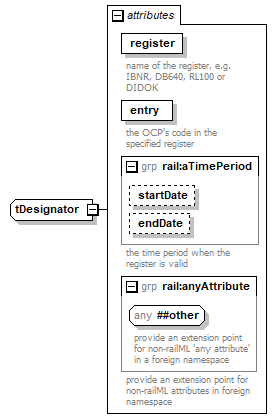 |
||||||||||||||||||||||||||||||||||||
| namespace | https://www.railml.org/schemas/2018 | ||||||||||||||||||||||||||||||||||||
| used by |
|
||||||||||||||||||||||||||||||||||||
| attributes |
|
||||||||||||||||||||||||||||||||||||
| source | <xs:complexType name="tDesignator"> <xs:attribute name="register" type="xs:string" use="required"> <xs:annotation> <xs:documentation>name of the register, e.g. IBNR, DB640, RL100 or DIDOK</xs:documentation> <xs:documentation>choose a value from the railML codelist Registers.xml</xs:documentation> </xs:annotation> </xs:attribute> <xs:attribute name="entry" type="xs:string" use="required"> <xs:annotation> <xs:documentation>the OCP's code in the specified register</xs:documentation> </xs:annotation> </xs:attribute> <xs:attributeGroup ref="rail:aTimePeriod"> <xs:annotation> <xs:documentation>the time period when the register is valid</xs:documentation> </xs:annotation> </xs:attributeGroup> <xs:attributeGroup ref="rail:anyAttribute"> <xs:annotation> <xs:documentation>provide an extension point for non-railML attributes in foreign namespace</xs:documentation> </xs:annotation> </xs:attributeGroup> </xs:complexType> |
attribute tDesignator/@register
| type | xs:string | ||||
| properties |
|
||||
| annotation |
|
||||
| source | <xs:attribute name="register" type="xs:string" use="required"> <xs:annotation> <xs:documentation>name of the register, e.g. IBNR, DB640, RL100 or DIDOK</xs:documentation> <xs:documentation>choose a value from the railML codelist Registers.xml</xs:documentation> </xs:annotation> </xs:attribute> |
attribute tDesignator/@entry
| type | xs:string | ||
| properties |
|
||
| annotation |
|
||
| source | <xs:attribute name="entry" type="xs:string" use="required"> <xs:annotation> <xs:documentation>the OCP's code in the specified register</xs:documentation> </xs:annotation> </xs:attribute> |
complexType tElectrification
| diagram | 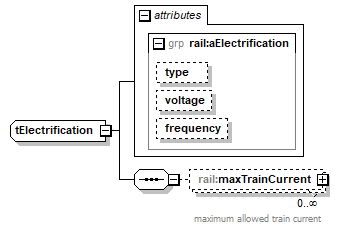 |
||||||||||||||||||||||||
| namespace | https://www.railml.org/schemas/2018 | ||||||||||||||||||||||||
| children | rail:maxTrainCurrent | ||||||||||||||||||||||||
| used by |
|
||||||||||||||||||||||||
| attributes |
|
||||||||||||||||||||||||
| source | <xs:complexType name="tElectrification"> <xs:sequence> <xs:element name="maxTrainCurrent" type="rail:tMaxTrainCurrent" minOccurs="0" maxOccurs="unbounded"> <xs:annotation> <xs:documentation>maximum allowed train current</xs:documentation> </xs:annotation> </xs:element> </xs:sequence> <xs:attributeGroup ref="rail:aElectrification"/> </xs:complexType> |
element tElectrification/maxTrainCurrent
| diagram | 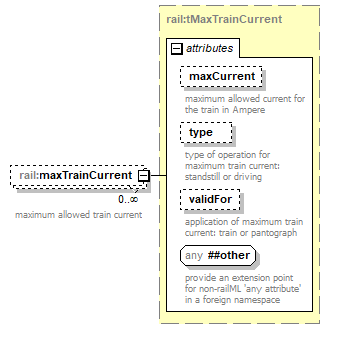 |
||||||||||||||||||||||||||||||
| namespace | https://www.railml.org/schemas/2018 | ||||||||||||||||||||||||||||||
| type | rail:tMaxTrainCurrent | ||||||||||||||||||||||||||||||
| properties |
|
||||||||||||||||||||||||||||||
| attributes |
|
||||||||||||||||||||||||||||||
| annotation |
|
||||||||||||||||||||||||||||||
| source | <xs:element name="maxTrainCurrent" type="rail:tMaxTrainCurrent" minOccurs="0" maxOccurs="unbounded"> <xs:annotation> <xs:documentation>maximum allowed train current</xs:documentation> </xs:annotation> </xs:element> |
complexType tElectrificationChange
| diagram |  |
||||||||||||||||||||||||||||||||||||||||||||||||||||||||||||||||||||||||||||||||||||||||||||||||||||||||
| namespace | https://www.railml.org/schemas/2018 | ||||||||||||||||||||||||||||||||||||||||||||||||||||||||||||||||||||||||||||||||||||||||||||||||||||||||
| type | extension of rail:tStrictOrientedElement | ||||||||||||||||||||||||||||||||||||||||||||||||||||||||||||||||||||||||||||||||||||||||||||||||||||||||
| properties |
|
||||||||||||||||||||||||||||||||||||||||||||||||||||||||||||||||||||||||||||||||||||||||||||||||||||||||
| children | rail:additionalName rail:geoCoord rail:states rail:maxTrainCurrent | ||||||||||||||||||||||||||||||||||||||||||||||||||||||||||||||||||||||||||||||||||||||||||||||||||||||||
| used by |
|
||||||||||||||||||||||||||||||||||||||||||||||||||||||||||||||||||||||||||||||||||||||||||||||||||||||||
| attributes |
|
||||||||||||||||||||||||||||||||||||||||||||||||||||||||||||||||||||||||||||||||||||||||||||||||||||||||
| source | <xs:complexType name="tElectrificationChange"> <xs:complexContent> <xs:extension base="rail:tStrictOrientedElement"> <xs:sequence> <xs:element name="maxTrainCurrent" type="rail:tMaxTrainCurrent" minOccurs="0" maxOccurs="unbounded"> <xs:annotation> <xs:documentation>maximum allowed train current</xs:documentation> </xs:annotation> </xs:element> </xs:sequence> <xs:attributeGroup ref="rail:aElectrification"/> <xs:attribute name="vMax" type="rail:tSpeedKmPerHour"/> <xs:attribute name="isolatedSection" type="xs:boolean" default="false"/> </xs:extension> </xs:complexContent> </xs:complexType> |
attribute tElectrificationChange/@vMax
| type | rail:tSpeedKmPerHour | ||||||||||||
| facets |
|
||||||||||||
| source | <xs:attribute name="vMax" type="rail:tSpeedKmPerHour"/> |
attribute tElectrificationChange/@isolatedSection
| type | xs:boolean | ||
| properties |
|
||
| source | <xs:attribute name="isolatedSection" type="xs:boolean" default="false"/> |
element tElectrificationChange/maxTrainCurrent
| diagram | 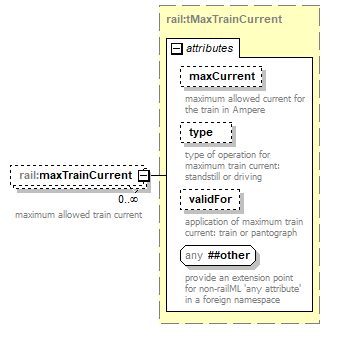 |
||||||||||||||||||||||||||||||
| namespace | https://www.railml.org/schemas/2018 | ||||||||||||||||||||||||||||||
| type | rail:tMaxTrainCurrent | ||||||||||||||||||||||||||||||
| properties |
|
||||||||||||||||||||||||||||||
| attributes |
|
||||||||||||||||||||||||||||||
| annotation |
|
||||||||||||||||||||||||||||||
| source | <xs:element name="maxTrainCurrent" type="rail:tMaxTrainCurrent" minOccurs="0" maxOccurs="unbounded"> <xs:annotation> <xs:documentation>maximum allowed train current</xs:documentation> </xs:annotation> </xs:element> |
complexType tEpsgCode
| diagram | 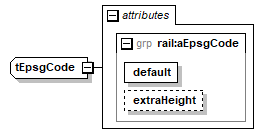 |
||||||||||||||||||
| namespace | https://www.railml.org/schemas/2018 | ||||||||||||||||||
| used by |
|
||||||||||||||||||
| attributes |
|
||||||||||||||||||
| source | <xs:complexType name="tEpsgCode"> <xs:attributeGroup ref="rail:aEpsgCode"/> </xs:complexType> |
complexType tGauge
| diagram | 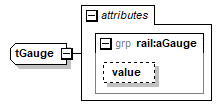 |
||||||||||||
| namespace | https://www.railml.org/schemas/2018 | ||||||||||||
| used by |
|
||||||||||||
| attributes |
|
||||||||||||
| source | <xs:complexType name="tGauge"> <xs:attributeGroup ref="rail:aGauge"/> </xs:complexType> |
complexType tGaugeChange
| diagram | 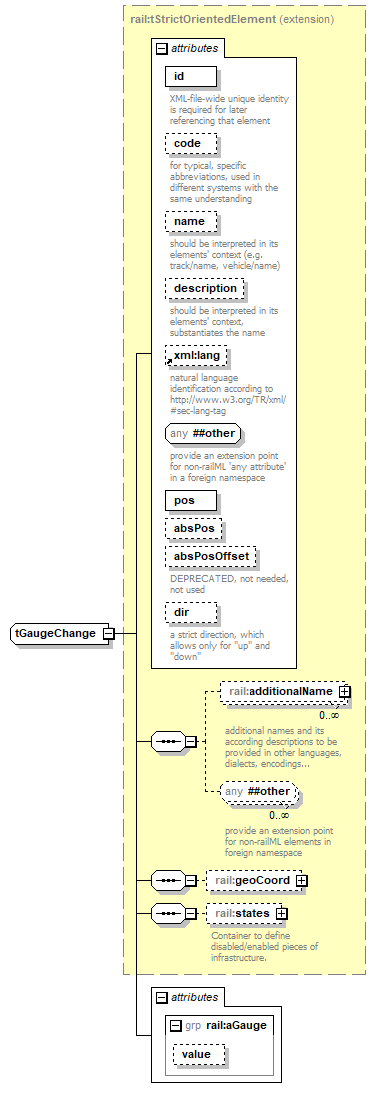 |
||||||||||||||||||||||||||||||||||||||||||||||||||||||||||||||||||||||||||||||||
| namespace | https://www.railml.org/schemas/2018 | ||||||||||||||||||||||||||||||||||||||||||||||||||||||||||||||||||||||||||||||||
| type | extension of rail:tStrictOrientedElement | ||||||||||||||||||||||||||||||||||||||||||||||||||||||||||||||||||||||||||||||||
| properties |
|
||||||||||||||||||||||||||||||||||||||||||||||||||||||||||||||||||||||||||||||||
| children | rail:additionalName rail:geoCoord rail:states | ||||||||||||||||||||||||||||||||||||||||||||||||||||||||||||||||||||||||||||||||
| used by |
|
||||||||||||||||||||||||||||||||||||||||||||||||||||||||||||||||||||||||||||||||
| attributes |
|
||||||||||||||||||||||||||||||||||||||||||||||||||||||||||||||||||||||||||||||||
| source | <xs:complexType name="tGaugeChange"> <xs:complexContent> <xs:extension base="rail:tStrictOrientedElement"> <xs:attributeGroup ref="rail:aGauge"/> </xs:extension> </xs:complexContent> </xs:complexType> |
complexType tGeoCoord
| diagram | 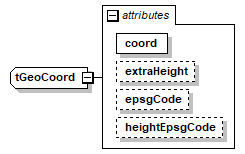 |
||||||||||||||||||||||||||||||
| namespace | https://www.railml.org/schemas/2018 | ||||||||||||||||||||||||||||||
| used by |
|
||||||||||||||||||||||||||||||
| attributes |
|
||||||||||||||||||||||||||||||
| source | <xs:complexType name="tGeoCoord"> <xs:attribute name="coord" type="rail:tCoordinateList" use="required"/> <xs:attribute name="extraHeight" type="xs:double"/> <xs:attribute name="epsgCode" type="xs:anyURI"/> <xs:attribute name="heightEpsgCode" type="xs:anyURI"/> </xs:complexType> |
attribute tGeoCoord/@coord
| type | rail:tCoordinateList | |||||||||
| properties |
|
|||||||||
| facets |
|
|||||||||
| source | <xs:attribute name="coord" type="rail:tCoordinateList" use="required"/> |
attribute tGeoCoord/@extraHeight
| type | xs:double |
| source | <xs:attribute name="extraHeight" type="xs:double"/> |
attribute tGeoCoord/@epsgCode
| type | xs:anyURI |
| source | <xs:attribute name="epsgCode" type="xs:anyURI"/> |
attribute tGeoCoord/@heightEpsgCode
| type | xs:anyURI |
| source | <xs:attribute name="heightEpsgCode" type="xs:anyURI"/> |
complexType tGradientChange
| diagram | 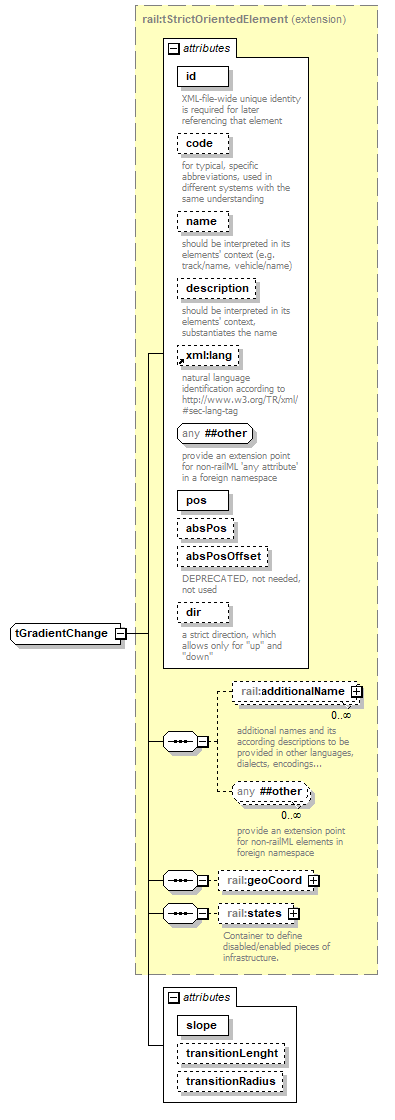 |
||||||||||||||||||||||||||||||||||||||||||||||||||||||||||||||||||||||||||||||||||||||||||||
| namespace | https://www.railml.org/schemas/2018 | ||||||||||||||||||||||||||||||||||||||||||||||||||||||||||||||||||||||||||||||||||||||||||||
| type | extension of rail:tStrictOrientedElement | ||||||||||||||||||||||||||||||||||||||||||||||||||||||||||||||||||||||||||||||||||||||||||||
| properties |
|
||||||||||||||||||||||||||||||||||||||||||||||||||||||||||||||||||||||||||||||||||||||||||||
| children | rail:additionalName rail:geoCoord rail:states | ||||||||||||||||||||||||||||||||||||||||||||||||||||||||||||||||||||||||||||||||||||||||||||
| used by |
|
||||||||||||||||||||||||||||||||||||||||||||||||||||||||||||||||||||||||||||||||||||||||||||
| attributes |
|
||||||||||||||||||||||||||||||||||||||||||||||||||||||||||||||||||||||||||||||||||||||||||||
| source | <xs:complexType name="tGradientChange"> <xs:complexContent> <xs:extension base="rail:tStrictOrientedElement"> <xs:attribute name="slope" type="rail:tGradientPromille" use="required"/> <xs:attribute name="transitionLenght" type="rail:tLengthM"/> <xs:attribute name="transitionRadius" type="rail:tRadiusM"/> </xs:extension> </xs:complexContent> </xs:complexType> |
attribute tGradientChange/@slope
| type | rail:tGradientPromille | ||||||
| properties |
|
||||||
| facets |
|
||||||
| source | <xs:attribute name="slope" type="rail:tGradientPromille" use="required"/> |
attribute tGradientChange/@transitionLenght
| type | rail:tLengthM | ||||||
| facets |
|
||||||
| source | <xs:attribute name="transitionLenght" type="rail:tLengthM"/> |
attribute tGradientChange/@transitionRadius
| type | rail:tRadiusM | ||||||
| facets |
|
||||||
| source | <xs:attribute name="transitionRadius" type="rail:tRadiusM"/> |
complexType tInfrastructure
| diagram | 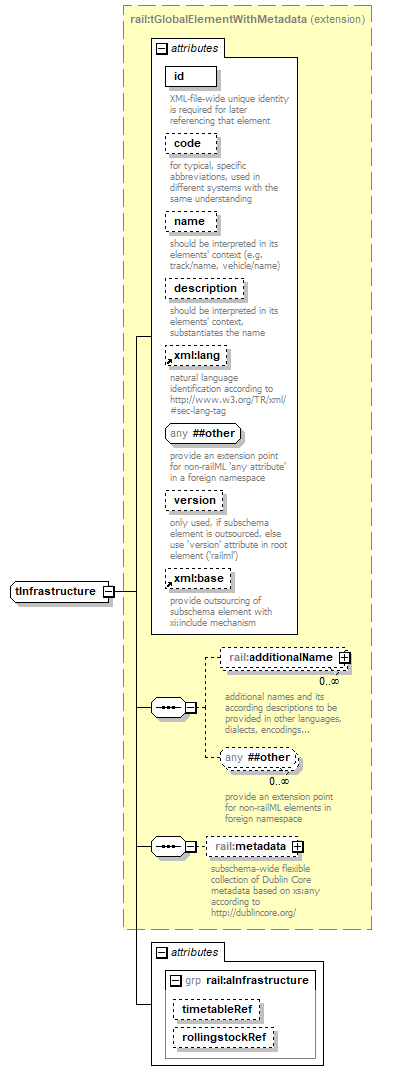 |
||||||||||||||||||||||||||||||||||||||||||||||||||||||||||||||||||||||||||
| namespace | https://www.railml.org/schemas/2018 | ||||||||||||||||||||||||||||||||||||||||||||||||||||||||||||||||||||||||||
| type | extension of rail:tGlobalElementWithMetadata | ||||||||||||||||||||||||||||||||||||||||||||||||||||||||||||||||||||||||||
| properties |
|
||||||||||||||||||||||||||||||||||||||||||||||||||||||||||||||||||||||||||
| children | rail:additionalName rail:metadata | ||||||||||||||||||||||||||||||||||||||||||||||||||||||||||||||||||||||||||
| used by |
|
||||||||||||||||||||||||||||||||||||||||||||||||||||||||||||||||||||||||||
| attributes |
|
||||||||||||||||||||||||||||||||||||||||||||||||||||||||||||||||||||||||||
| source | <xs:complexType name="tInfrastructure"> <xs:complexContent> <xs:extension base="rail:tGlobalElementWithMetadata"> <xs:attributeGroup ref="rail:aInfrastructure"/> </xs:extension> </xs:complexContent> </xs:complexType> |
complexType tInfrastructureVisualization
| diagram | 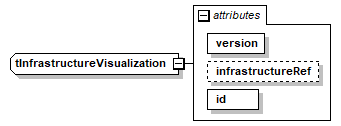 |
||||||||||||||||||||||||
| namespace | https://www.railml.org/schemas/2018 | ||||||||||||||||||||||||
| used by |
|
||||||||||||||||||||||||
| attributes |
|
||||||||||||||||||||||||
| source | <xs:complexType name="tInfrastructureVisualization"> <xs:attribute name="version" type="rail:tRailMLVersion" use="required"/> <xs:attribute name="infrastructureRef" type="rail:tGenericRef"/> <xs:attribute name="id" type="rail:tGenericID" use="required"/> </xs:complexType> |
attribute tInfrastructureVisualization/@version
| type | rail:tRailMLVersion | ||||||
| properties |
|
||||||
| facets |
|
||||||
| source | <xs:attribute name="version" type="rail:tRailMLVersion" use="required"/> |
attribute tInfrastructureVisualization/@infrastructureRef
| type | rail:tGenericRef |
| source | <xs:attribute name="infrastructureRef" type="rail:tGenericRef"/> |
attribute tInfrastructureVisualization/@id
| type | rail:tGenericID | ||
| properties |
|
||
| source | <xs:attribute name="id" type="rail:tGenericID" use="required"/> |
complexType tLevelCrossing
| diagram |  |
||||||||||||||||||||||||||||||||||||||||||||||||||||||||||||||||||||||||||||||||||||||||||||||||||||||||||||||||||
| namespace | https://www.railml.org/schemas/2018 | ||||||||||||||||||||||||||||||||||||||||||||||||||||||||||||||||||||||||||||||||||||||||||||||||||||||||||||||||||
| type | extension of rail:tDelimitedOrientedElement | ||||||||||||||||||||||||||||||||||||||||||||||||||||||||||||||||||||||||||||||||||||||||||||||||||||||||||||||||||
| properties |
|
||||||||||||||||||||||||||||||||||||||||||||||||||||||||||||||||||||||||||||||||||||||||||||||||||||||||||||||||||
| children | rail:additionalName rail:geoCoord rail:states | ||||||||||||||||||||||||||||||||||||||||||||||||||||||||||||||||||||||||||||||||||||||||||||||||||||||||||||||||||
| used by |
|
||||||||||||||||||||||||||||||||||||||||||||||||||||||||||||||||||||||||||||||||||||||||||||||||||||||||||||||||||
| attributes |
|
||||||||||||||||||||||||||||||||||||||||||||||||||||||||||||||||||||||||||||||||||||||||||||||||||||||||||||||||||
| source | <xs:complexType name="tLevelCrossing"> <xs:complexContent> <xs:extension base="rail:tDelimitedOrientedElement"> <xs:attribute name="length" type="rail:tLengthM"> <xs:annotation> <xs:documentation>length of the level crossing from railway point of view</xs:documentation> </xs:annotation> </xs:attribute> <xs:attribute name="angle" type="rail:tAngleDegQuadrant"> <xs:annotation> <xs:documentation>crossing angle between road and railway in degrees</xs:documentation> </xs:annotation> </xs:attribute> <xs:attribute name="protection" type="xs:string"> <xs:annotation> <xs:documentation>technical protection equipment at the level crossing</xs:documentation> </xs:annotation> </xs:attribute> <xs:attributeGroup ref="rail:aOcpRef"/> </xs:extension> </xs:complexContent> </xs:complexType> |
attribute tLevelCrossing/@length
| type | rail:tLengthM | ||||||
| facets |
|
||||||
| annotation |
|
||||||
| source | <xs:attribute name="length" type="rail:tLengthM"> <xs:annotation> <xs:documentation>length of the level crossing from railway point of view</xs:documentation> </xs:annotation> </xs:attribute> |
attribute tLevelCrossing/@angle
| type | rail:tAngleDegQuadrant | ||||||||||||||||||
| facets |
|
||||||||||||||||||
| annotation |
|
||||||||||||||||||
| source | <xs:attribute name="angle" type="rail:tAngleDegQuadrant"> <xs:annotation> <xs:documentation>crossing angle between road and railway in degrees</xs:documentation> </xs:annotation> </xs:attribute> |
attribute tLevelCrossing/@protection
| type | xs:string | ||
| annotation |
|
||
| source | <xs:attribute name="protection" type="xs:string"> <xs:annotation> <xs:documentation>technical protection equipment at the level crossing</xs:documentation> </xs:annotation> </xs:attribute> |
complexType tLine
| diagram |  |
||||||||||||||||||||||||||||||||||||||||||||||||||||||||||||||||||||||
| namespace | https://www.railml.org/schemas/2018 | ||||||||||||||||||||||||||||||||||||||||||||||||||||||||||||||||||||||
| type | extension of rail:tElementWithIDAndName | ||||||||||||||||||||||||||||||||||||||||||||||||||||||||||||||||||||||
| properties |
|
||||||||||||||||||||||||||||||||||||||||||||||||||||||||||||||||||||||
| children | rail:additionalName rail:states | ||||||||||||||||||||||||||||||||||||||||||||||||||||||||||||||||||||||
| used by |
|
||||||||||||||||||||||||||||||||||||||||||||||||||||||||||||||||||||||
| attributes |
|
||||||||||||||||||||||||||||||||||||||||||||||||||||||||||||||||||||||
| source | <xs:complexType name="tLine"> <xs:complexContent> <xs:extension base="rail:tElementWithIDAndName"> <xs:sequence> <xs:element name="states" type="rail:tStates" minOccurs="0"> <xs:annotation> <xs:documentation>Container to define disabled/enabled lines</xs:documentation> <xs:documentation source="http://wiki.railml.org/index.php?title=IS:states_line"/> </xs:annotation> </xs:element> </xs:sequence> <xs:attributeGroup ref="rail:aLine"/> </xs:extension> </xs:complexContent> </xs:complexType> |
element tLine/states
| diagram | 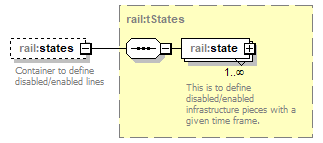 |
||||||
| namespace | https://www.railml.org/schemas/2018 | ||||||
| type | rail:tStates | ||||||
| properties |
|
||||||
| children | rail:state | ||||||
| annotation |
|
||||||
| source | <xs:element name="states" type="rail:tStates" minOccurs="0"> <xs:annotation> <xs:documentation>Container to define disabled/enabled lines</xs:documentation> <xs:documentation source="http://wiki.railml.org/index.php?title=IS:states_line"/> </xs:annotation> </xs:element> |
complexType tLocallyControlledArea
| diagram | 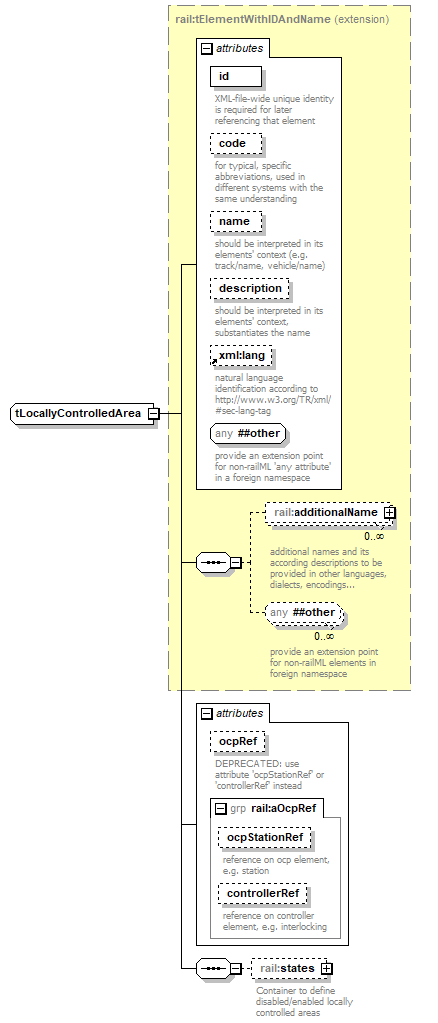 |
||||||||||||||||||||||||||||||||||||||||||||||||||||||||||||||||||||||
| namespace | https://www.railml.org/schemas/2018 | ||||||||||||||||||||||||||||||||||||||||||||||||||||||||||||||||||||||
| type | extension of rail:tElementWithIDAndName | ||||||||||||||||||||||||||||||||||||||||||||||||||||||||||||||||||||||
| properties |
|
||||||||||||||||||||||||||||||||||||||||||||||||||||||||||||||||||||||
| children | rail:additionalName rail:states | ||||||||||||||||||||||||||||||||||||||||||||||||||||||||||||||||||||||
| used by |
|
||||||||||||||||||||||||||||||||||||||||||||||||||||||||||||||||||||||
| attributes |
|
||||||||||||||||||||||||||||||||||||||||||||||||||||||||||||||||||||||
| source | <xs:complexType name="tLocallyControlledArea"> <xs:complexContent> <xs:extension base="rail:tElementWithIDAndName"> <xs:sequence> <xs:element name="states" type="rail:tStates" minOccurs="0"> <xs:annotation> <xs:documentation>Container to define disabled/enabled locally controlled areas</xs:documentation> <xs:documentation source="http://wiki.railml.org/index.php?title=IS:states_locallyControlledArea"/> </xs:annotation> </xs:element> </xs:sequence> <xs:attribute name="ocpRef" type="rail:tGenericRef"> <xs:annotation> <xs:documentation>DEPRECATED: use attribute 'ocpStationRef' or 'controllerRef' instead</xs:documentation> </xs:annotation> </xs:attribute> <xs:attributeGroup ref="rail:aOcpRef"/> </xs:extension> </xs:complexContent> </xs:complexType> |
attribute tLocallyControlledArea/@ocpRef
| type | rail:tGenericRef | ||
| annotation |
|
||
| source | <xs:attribute name="ocpRef" type="rail:tGenericRef"> <xs:annotation> <xs:documentation>DEPRECATED: use attribute 'ocpStationRef' or 'controllerRef' instead</xs:documentation> </xs:annotation> </xs:attribute> |
element tLocallyControlledArea/states
| diagram | 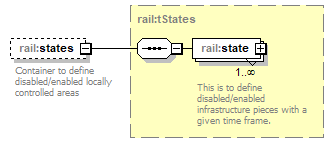 |
||||||
| namespace | https://www.railml.org/schemas/2018 | ||||||
| type | rail:tStates | ||||||
| properties |
|
||||||
| children | rail:state | ||||||
| annotation |
|
||||||
| source | <xs:element name="states" type="rail:tStates" minOccurs="0"> <xs:annotation> <xs:documentation>Container to define disabled/enabled locally controlled areas</xs:documentation> <xs:documentation source="http://wiki.railml.org/index.php?title=IS:states_locallyControlledArea"/> </xs:annotation> </xs:element> |
complexType tLocation
| diagram | 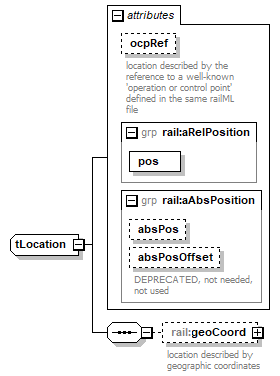 |
||||||||||||||||||||||||||||||||||
| namespace | https://www.railml.org/schemas/2018 | ||||||||||||||||||||||||||||||||||
| children | rail:geoCoord | ||||||||||||||||||||||||||||||||||
| used by |
|
||||||||||||||||||||||||||||||||||
| attributes |
|
||||||||||||||||||||||||||||||||||
| source | <xs:complexType name="tLocation"> <xs:sequence> <xs:element name="geoCoord" type="rail:tGeoCoord" minOccurs="0"> <xs:annotation> <xs:documentation>location described by geographic coordinates</xs:documentation> <xs:documentation source="http://wiki.railml.org/index.php?title=IS:geoCoord_from"/> <xs:documentation source="http://wiki.railml.org/index.php?title=IS:geoCoord_to"/> </xs:annotation> </xs:element> </xs:sequence> <xs:attribute name="ocpRef" type="rail:tGenericRef"> <xs:annotation> <xs:documentation>location described by the reference to a well-known 'operation or control point' defined in the same railML file</xs:documentation> </xs:annotation> </xs:attribute> <xs:attributeGroup ref="rail:aRelPosition"/> <xs:attributeGroup ref="rail:aAbsPosition"/> </xs:complexType> |
attribute tLocation/@ocpRef
| type | rail:tGenericRef | ||
| annotation |
|
||
| source | <xs:attribute name="ocpRef" type="rail:tGenericRef"> <xs:annotation> <xs:documentation>location described by the reference to a well-known 'operation or control point' defined in the same railML file</xs:documentation> </xs:annotation> </xs:attribute> |
element tLocation/geoCoord
| diagram | 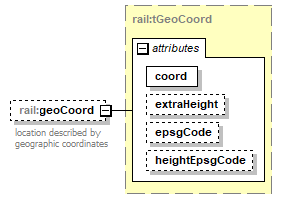 |
||||||||||||||||||||||||||||||
| namespace | https://www.railml.org/schemas/2018 | ||||||||||||||||||||||||||||||
| type | rail:tGeoCoord | ||||||||||||||||||||||||||||||
| properties |
|
||||||||||||||||||||||||||||||
| attributes |
|
||||||||||||||||||||||||||||||
| annotation |
|
||||||||||||||||||||||||||||||
| source | <xs:element name="geoCoord" type="rail:tGeoCoord" minOccurs="0"> <xs:annotation> <xs:documentation>location described by geographic coordinates</xs:documentation> <xs:documentation source="http://wiki.railml.org/index.php?title=IS:geoCoord_from"/> <xs:documentation source="http://wiki.railml.org/index.php?title=IS:geoCoord_to"/> </xs:annotation> </xs:element> |
complexType tLock
| diagram |  |
||||||||||||||||||||||||||||||||||||||||||||||||||||||||||||||||||||||||||
| namespace | https://www.railml.org/schemas/2018 | ||||||||||||||||||||||||||||||||||||||||||||||||||||||||||||||||||||||||||
| type | extension of rail:tOrientedElement | ||||||||||||||||||||||||||||||||||||||||||||||||||||||||||||||||||||||||||
| properties |
|
||||||||||||||||||||||||||||||||||||||||||||||||||||||||||||||||||||||||||
| children | rail:additionalName rail:geoCoord rail:states | ||||||||||||||||||||||||||||||||||||||||||||||||||||||||||||||||||||||||||
| used by |
|
||||||||||||||||||||||||||||||||||||||||||||||||||||||||||||||||||||||||||
| attributes |
|
||||||||||||||||||||||||||||||||||||||||||||||||||||||||||||||||||||||||||
| source | <xs:complexType name="tLock"> <xs:complexContent> <xs:extension base="rail:tOrientedElement"> <xs:attributeGroup ref="rail:anyAttribute"> <xs:annotation> <xs:documentation>provide an extension point for non-railML attributes in foreign namespace</xs:documentation> </xs:annotation> </xs:attributeGroup> </xs:extension> </xs:complexContent> </xs:complexType> |
complexType tMacroscopicNode
| diagram |  |
||||||||||||||||||
| namespace | https://www.railml.org/schemas/2018 | ||||||||||||||||||
| used by |
|
||||||||||||||||||
| attributes |
|
||||||||||||||||||
| annotation |
|
||||||||||||||||||
| source | <xs:complexType name="tMacroscopicNode"> <xs:annotation> <xs:documentation>also "Star" or "Hub"</xs:documentation> </xs:annotation> <xs:attribute name="ocpRef" type="rail:tGenericRef" use="required"/> <xs:attribute name="flowDirection" type="rail:tFlowDirection" default="both"/> </xs:complexType> |
attribute tMacroscopicNode/@ocpRef
| type | rail:tGenericRef | ||
| properties |
|
||
| source | <xs:attribute name="ocpRef" type="rail:tGenericRef" use="required"/> |
attribute tMacroscopicNode/@flowDirection
| type | rail:tFlowDirection | ||
| properties |
|
||
| source | <xs:attribute name="flowDirection" type="rail:tFlowDirection" default="both"/> |
complexType tMaxTrainCurrent
| diagram | 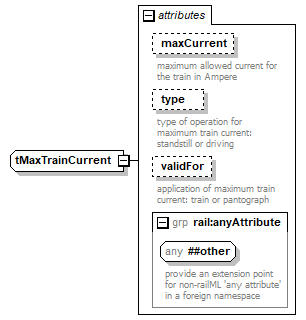 |
||||||||||||||||||||||||||||||
| namespace | https://www.railml.org/schemas/2018 | ||||||||||||||||||||||||||||||
| used by |
|
||||||||||||||||||||||||||||||
| attributes |
|
||||||||||||||||||||||||||||||
| source | <xs:complexType name="tMaxTrainCurrent"> <xs:attribute name="maxCurrent" type="rail:tCurrentAmpere"> <xs:annotation> <xs:documentation>maximum allowed current for the train in Ampere</xs:documentation> </xs:annotation> </xs:attribute> <xs:attribute name="type" type="rail:tMaxTrainCurrentType"> <xs:annotation> <xs:documentation>type of operation for maximum train current: standstill or driving</xs:documentation> </xs:annotation> </xs:attribute> <xs:attribute name="validFor" type="rail:tMaxTrainCurrentValidFor"> <xs:annotation> <xs:documentation>application of maximum train current: train or pantograph</xs:documentation> </xs:annotation> </xs:attribute> <xs:attributeGroup ref="rail:anyAttribute"/> </xs:complexType> |
attribute tMaxTrainCurrent/@maxCurrent
| type | rail:tCurrentAmpere | ||||||
| facets |
|
||||||
| annotation |
|
||||||
| source | <xs:attribute name="maxCurrent" type="rail:tCurrentAmpere"> <xs:annotation> <xs:documentation>maximum allowed current for the train in Ampere</xs:documentation> </xs:annotation> </xs:attribute> |
attribute tMaxTrainCurrent/@type
| type | rail:tMaxTrainCurrentType | |||||||||
| facets |
|
|||||||||
| annotation |
|
|||||||||
| source | <xs:attribute name="type" type="rail:tMaxTrainCurrentType"> <xs:annotation> <xs:documentation>type of operation for maximum train current: standstill or driving</xs:documentation> </xs:annotation> </xs:attribute> |
attribute tMaxTrainCurrent/@validFor
| type | rail:tMaxTrainCurrentValidFor | |||||||||
| facets |
|
|||||||||
| annotation |
|
|||||||||
| source | <xs:attribute name="validFor" type="rail:tMaxTrainCurrentValidFor"> <xs:annotation> <xs:documentation>application of maximum train current: train or pantograph</xs:documentation> </xs:annotation> </xs:attribute> |
complexType tMileageChange
| diagram | 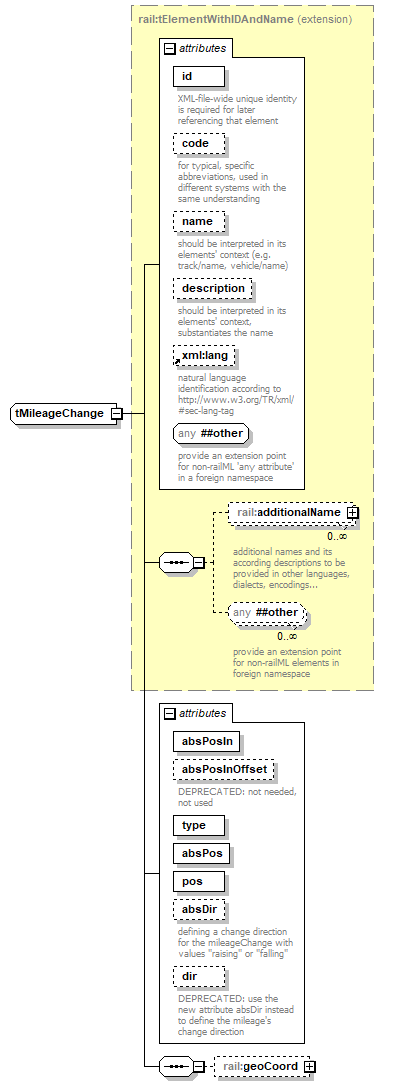 |
||||||||||||||||||||||||||||||||||||||||||||||||||||||||||||||||||||||||||||||||||||||||||||||
| namespace | https://www.railml.org/schemas/2018 | ||||||||||||||||||||||||||||||||||||||||||||||||||||||||||||||||||||||||||||||||||||||||||||||
| type | extension of rail:tElementWithIDAndName | ||||||||||||||||||||||||||||||||||||||||||||||||||||||||||||||||||||||||||||||||||||||||||||||
| properties |
|
||||||||||||||||||||||||||||||||||||||||||||||||||||||||||||||||||||||||||||||||||||||||||||||
| children | rail:additionalName rail:geoCoord | ||||||||||||||||||||||||||||||||||||||||||||||||||||||||||||||||||||||||||||||||||||||||||||||
| used by |
|
||||||||||||||||||||||||||||||||||||||||||||||||||||||||||||||||||||||||||||||||||||||||||||||
| attributes |
|
||||||||||||||||||||||||||||||||||||||||||||||||||||||||||||||||||||||||||||||||||||||||||||||
| source | <xs:complexType name="tMileageChange"> <xs:complexContent> <xs:extension base="rail:tElementWithIDAndName"> <xs:sequence> <xs:element name="geoCoord" type="rail:tGeoCoord" minOccurs="0"> <xs:annotation> <xs:documentation source="http://wiki.railml.org/index.php?title=IS:geoCoord_mileageChange"/> </xs:annotation> </xs:element> </xs:sequence> <xs:attribute name="absPosIn" type="rail:tLengthM" use="required"/> <xs:attribute name="absPosInOffset" type="rail:tLengthM"> <xs:annotation> <xs:documentation>DEPRECATED: not needed, not used</xs:documentation> </xs:annotation> </xs:attribute> <xs:attribute name="type" type="rail:tMileageChangeDescr" use="required"/> <xs:attribute name="absPos" type="rail:tLengthM" use="required"/> <xs:attribute name="pos" type="rail:tLengthM" use="required"/> <xs:attribute name="absDir" type="rail:tMileageDirection"> <xs:annotation> <xs:documentation>defining a change direction for the mileageChange with values "raising" or "falling"</xs:documentation> </xs:annotation> </xs:attribute> <xs:attribute name="dir" type="rail:tStrictDirection"> <xs:annotation> <xs:documentation>DEPRECATED: use the new attribute absDir instead to define the mileage's change direction</xs:documentation> </xs:annotation> </xs:attribute> </xs:extension> </xs:complexContent> </xs:complexType> |
attribute tMileageChange/@absPosIn
| type | rail:tLengthM | ||||||
| properties |
|
||||||
| facets |
|
||||||
| source | <xs:attribute name="absPosIn" type="rail:tLengthM" use="required"/> |
attribute tMileageChange/@absPosInOffset
| type | rail:tLengthM | ||||||
| facets |
|
||||||
| annotation |
|
||||||
| source | <xs:attribute name="absPosInOffset" type="rail:tLengthM"> <xs:annotation> <xs:documentation>DEPRECATED: not needed, not used</xs:documentation> </xs:annotation> </xs:attribute> |
attribute tMileageChange/@type
| type | rail:tMileageChangeDescr | |||||||||
| properties |
|
|||||||||
| facets |
|
|||||||||
| source | <xs:attribute name="type" type="rail:tMileageChangeDescr" use="required"/> |
attribute tMileageChange/@absPos
| type | rail:tLengthM | ||||||
| properties |
|
||||||
| facets |
|
||||||
| source | <xs:attribute name="absPos" type="rail:tLengthM" use="required"/> |
attribute tMileageChange/@pos
| type | rail:tLengthM | ||||||
| properties |
|
||||||
| facets |
|
||||||
| source | <xs:attribute name="pos" type="rail:tLengthM" use="required"/> |
attribute tMileageChange/@absDir
| type | rail:tMileageDirection | |||||||||
| facets |
|
|||||||||
| annotation |
|
|||||||||
| source | <xs:attribute name="absDir" type="rail:tMileageDirection"> <xs:annotation> <xs:documentation>defining a change direction for the mileageChange with values "raising" or "falling"</xs:documentation> </xs:annotation> </xs:attribute> |
attribute tMileageChange/@dir
| type | rail:tStrictDirection | |||||||||
| facets |
|
|||||||||
| annotation |
|
|||||||||
| source | <xs:attribute name="dir" type="rail:tStrictDirection"> <xs:annotation> <xs:documentation>DEPRECATED: use the new attribute absDir instead to define the mileage's change direction</xs:documentation> </xs:annotation> </xs:attribute> |
element tMileageChange/geoCoord
| diagram | 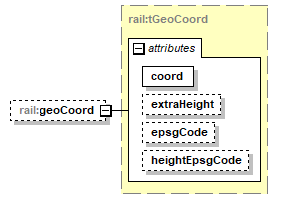 |
||||||||||||||||||||||||||||||
| namespace | https://www.railml.org/schemas/2018 | ||||||||||||||||||||||||||||||
| type | rail:tGeoCoord | ||||||||||||||||||||||||||||||
| properties |
|
||||||||||||||||||||||||||||||
| attributes |
|
||||||||||||||||||||||||||||||
| source | <xs:element name="geoCoord" type="rail:tGeoCoord" minOccurs="0"> <xs:annotation> <xs:documentation source="http://wiki.railml.org/index.php?title=IS:geoCoord_mileageChange"/> </xs:annotation> </xs:element> |
complexType tOcpAdditionalName
| diagram | 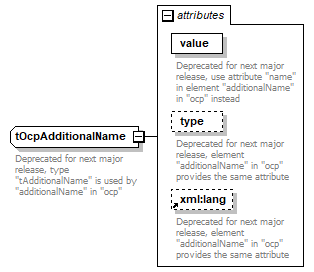 |
||||||||||||||||||||||||||||||
| namespace | https://www.railml.org/schemas/2018 | ||||||||||||||||||||||||||||||
| used by |
|
||||||||||||||||||||||||||||||
| attributes |
|
||||||||||||||||||||||||||||||
| annotation |
|
||||||||||||||||||||||||||||||
| source | <xs:complexType name="tOcpAdditionalName"> <xs:annotation> <xs:documentation>Deprecated for next major release, type "tAdditionalName" is used by "additionalName" in "ocp"</xs:documentation> </xs:annotation> <xs:attribute name="value" type="xs:string" use="required"> <xs:annotation> <xs:documentation>Deprecated for next major release, use attribute "name" in element "additionalName" in "ocp" instead</xs:documentation> </xs:annotation> </xs:attribute> <xs:attribute name="type" type="rail:tOcpNameType"> <xs:annotation> <xs:documentation>Deprecated for next major release, element "additionalName" in "ocp" provides the same attribute</xs:documentation> </xs:annotation> </xs:attribute> <xs:attribute ref="xml:lang"> <xs:annotation> <xs:documentation>Deprecated for next major release, element "additionalName" in "ocp" provides the same attribute</xs:documentation> </xs:annotation> </xs:attribute> </xs:complexType> |
attribute tOcpAdditionalName/@value
| type | xs:string | ||
| properties |
|
||
| annotation |
|
||
| source | <xs:attribute name="value" type="xs:string" use="required"> <xs:annotation> <xs:documentation>Deprecated for next major release, use attribute "name" in element "additionalName" in "ocp" instead</xs:documentation> </xs:annotation> </xs:attribute> |
attribute tOcpAdditionalName/@type
| type | rail:tOcpNameType | ||
| annotation |
|
||
| source | <xs:attribute name="type" type="rail:tOcpNameType"> <xs:annotation> <xs:documentation>Deprecated for next major release, element "additionalName" in "ocp" provides the same attribute</xs:documentation> </xs:annotation> </xs:attribute> |
complexType tOcpArea
| diagram | 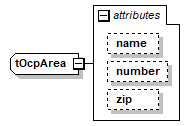 |
||||||||||||||||||||||||
| namespace | https://www.railml.org/schemas/2018 | ||||||||||||||||||||||||
| used by |
|
||||||||||||||||||||||||
| attributes |
|
||||||||||||||||||||||||
| source | <xs:complexType name="tOcpArea"> <xs:attribute name="name" type="rail:tGenericName"/> <xs:attribute name="number" type="rail:tPositiveCounter"/> <xs:attribute name="zip" type="xs:string"/> </xs:complexType> |
attribute tOcpArea/@name
| type | rail:tGenericName |
| source | <xs:attribute name="name" type="rail:tGenericName"/> |
attribute tOcpArea/@number
| type | rail:tPositiveCounter |
| source | <xs:attribute name="number" type="rail:tPositiveCounter"/> |
attribute tOcpArea/@zip
| type | xs:string |
| source | <xs:attribute name="zip" type="xs:string"/> |
complexType tOcpPropEquipmentSummary
| diagram | 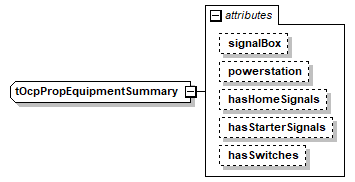 |
||||||||||||||||||||||||||||||||||||
| namespace | https://www.railml.org/schemas/2018 | ||||||||||||||||||||||||||||||||||||
| used by |
|
||||||||||||||||||||||||||||||||||||
| attributes |
|
||||||||||||||||||||||||||||||||||||
| source | <xs:complexType name="tOcpPropEquipmentSummary"> <xs:attribute name="signalBox" type="rail:tInterlockingTypes"/> <xs:attribute name="powerstation" type="xs:boolean" default="false"/> <xs:attribute name="hasHomeSignals" type="xs:boolean" default="false"/> <xs:attribute name="hasStarterSignals" type="xs:boolean" default="false"/> <xs:attribute name="hasSwitches" type="xs:boolean" default="false"/> </xs:complexType> |
attribute tOcpPropEquipmentSummary/@signalBox
| type | rail:tInterlockingTypes | ||||||||||||||||||||||
| facets |
|
||||||||||||||||||||||
| source | <xs:attribute name="signalBox" type="rail:tInterlockingTypes"/> |
attribute tOcpPropEquipmentSummary/@powerstation
| type | xs:boolean | ||
| properties |
|
||
| source | <xs:attribute name="powerstation" type="xs:boolean" default="false"/> |
attribute tOcpPropEquipmentSummary/@hasHomeSignals
| type | xs:boolean | ||
| properties |
|
||
| source | <xs:attribute name="hasHomeSignals" type="xs:boolean" default="false"/> |
attribute tOcpPropEquipmentSummary/@hasStarterSignals
| type | xs:boolean | ||
| properties |
|
||
| source | <xs:attribute name="hasStarterSignals" type="xs:boolean" default="false"/> |
attribute tOcpPropEquipmentSummary/@hasSwitches
| type | xs:boolean | ||
| properties |
|
||
| source | <xs:attribute name="hasSwitches" type="xs:boolean" default="false"/> |
complexType tOcpPropOperational
| diagram | 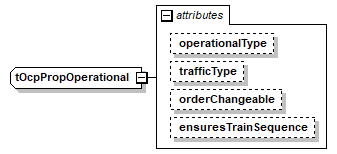 |
||||||||||||||||||||||||||||||
| namespace | https://www.railml.org/schemas/2018 | ||||||||||||||||||||||||||||||
| used by |
|
||||||||||||||||||||||||||||||
| attributes |
|
||||||||||||||||||||||||||||||
| source | <xs:complexType name="tOcpPropOperational"> <xs:attribute name="operationalType" type="rail:tOcpOperationalType"/> <xs:attribute name="trafficType" type="rail:tOcpTrafficType"/> <xs:attribute name="orderChangeable" type="xs:boolean" default="false"/> <xs:attribute name="ensuresTrainSequence" type="xs:boolean" default="true"/> </xs:complexType> |
attribute tOcpPropOperational/@operationalType
| type | rail:tOcpOperationalType |
| source | <xs:attribute name="operationalType" type="rail:tOcpOperationalType"/> |
attribute tOcpPropOperational/@trafficType
| type | rail:tOcpTrafficType |
| source | <xs:attribute name="trafficType" type="rail:tOcpTrafficType"/> |
attribute tOcpPropOperational/@orderChangeable
| type | xs:boolean | ||
| properties |
|
||
| source | <xs:attribute name="orderChangeable" type="xs:boolean" default="false"/> |
attribute tOcpPropOperational/@ensuresTrainSequence
| type | xs:boolean | ||
| properties |
|
||
| source | <xs:attribute name="ensuresTrainSequence" type="xs:boolean" default="true"/> |
complexType tOcpPropOther
| diagram | 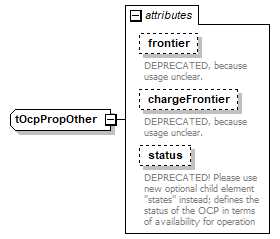 |
||||||||||||||||||||||||||||||
| namespace | https://www.railml.org/schemas/2018 | ||||||||||||||||||||||||||||||
| used by |
|
||||||||||||||||||||||||||||||
| attributes |
|
||||||||||||||||||||||||||||||
| source | <xs:complexType name="tOcpPropOther"> <xs:attribute name="frontier" type="xs:boolean" default="false"> <xs:annotation> <xs:documentation>DEPRECATED, because usage unclear.</xs:documentation> </xs:annotation> </xs:attribute> <xs:attribute name="chargeFrontier" type="xs:boolean" default="false"> <xs:annotation> <xs:documentation>DEPRECATED, because usage unclear.</xs:documentation> </xs:annotation> </xs:attribute> <xs:attribute name="status" type="rail:tInfrastructureStatus" default="operational"> <xs:annotation> <xs:documentation>DEPRECATED! Please use new optional child element "states" instead; defines the status of the OCP in terms of availability for operation</xs:documentation> </xs:annotation> </xs:attribute> </xs:complexType> |
attribute tOcpPropOther/@frontier
| type | xs:boolean | ||
| properties |
|
||
| annotation |
|
||
| source | <xs:attribute name="frontier" type="xs:boolean" default="false"> <xs:annotation> <xs:documentation>DEPRECATED, because usage unclear.</xs:documentation> </xs:annotation> </xs:attribute> |
attribute tOcpPropOther/@chargeFrontier
| type | xs:boolean | ||
| properties |
|
||
| annotation |
|
||
| source | <xs:attribute name="chargeFrontier" type="xs:boolean" default="false"> <xs:annotation> <xs:documentation>DEPRECATED, because usage unclear.</xs:documentation> </xs:annotation> </xs:attribute> |
attribute tOcpPropOther/@status
| type | rail:tInfrastructureStatus | ||
| properties |
|
||
| annotation |
|
||
| source | <xs:attribute name="status" type="rail:tInfrastructureStatus" default="operational"> <xs:annotation> <xs:documentation>DEPRECATED! Please use new optional child element "states" instead; defines the status of the OCP in terms of availability for operation</xs:documentation> </xs:annotation> </xs:attribute> |
complexType tOcpPropService
| diagram | 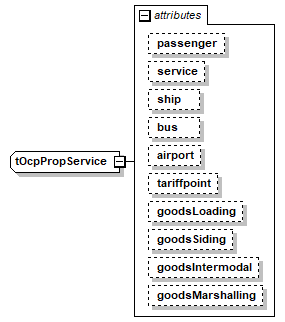 |
||||||||||||||||||||||||||||||||||||||||||||||||||||||||||||||||||
| namespace | https://www.railml.org/schemas/2018 | ||||||||||||||||||||||||||||||||||||||||||||||||||||||||||||||||||
| used by |
|
||||||||||||||||||||||||||||||||||||||||||||||||||||||||||||||||||
| attributes |
|
||||||||||||||||||||||||||||||||||||||||||||||||||||||||||||||||||
| source | <xs:complexType name="tOcpPropService"> <xs:attribute name="passenger" type="xs:boolean" default="false"/> <xs:attribute name="service" type="xs:boolean" default="false"/> <xs:attribute name="ship" type="xs:boolean" default="false"/> <xs:attribute name="bus" type="xs:boolean" default="false"/> <xs:attribute name="airport" type="xs:boolean" default="false"/> <xs:attribute name="tariffpoint" type="xs:boolean" default="false"/> <xs:attribute name="goodsLoading" type="xs:boolean" default="false"/> <xs:attribute name="goodsSiding" type="xs:boolean" default="false"/> <xs:attribute name="goodsIntermodal" type="xs:boolean" default="false"/> <xs:attribute name="goodsMarshalling" type="xs:boolean" default="false"/> </xs:complexType> |
attribute tOcpPropService/@passenger
| type | xs:boolean | ||
| properties |
|
||
| source | <xs:attribute name="passenger" type="xs:boolean" default="false"/> |
attribute tOcpPropService/@service
| type | xs:boolean | ||
| properties |
|
||
| source | <xs:attribute name="service" type="xs:boolean" default="false"/> |
attribute tOcpPropService/@ship
| type | xs:boolean | ||
| properties |
|
||
| source | <xs:attribute name="ship" type="xs:boolean" default="false"/> |
attribute tOcpPropService/@bus
| type | xs:boolean | ||
| properties |
|
||
| source | <xs:attribute name="bus" type="xs:boolean" default="false"/> |
attribute tOcpPropService/@airport
| type | xs:boolean | ||
| properties |
|
||
| source | <xs:attribute name="airport" type="xs:boolean" default="false"/> |
attribute tOcpPropService/@tariffpoint
| type | xs:boolean | ||
| properties |
|
||
| source | <xs:attribute name="tariffpoint" type="xs:boolean" default="false"/> |
attribute tOcpPropService/@goodsLoading
| type | xs:boolean | ||
| properties |
|
||
| source | <xs:attribute name="goodsLoading" type="xs:boolean" default="false"/> |
attribute tOcpPropService/@goodsSiding
| type | xs:boolean | ||
| properties |
|
||
| source | <xs:attribute name="goodsSiding" type="xs:boolean" default="false"/> |
attribute tOcpPropService/@goodsIntermodal
| type | xs:boolean | ||
| properties |
|
||
| source | <xs:attribute name="goodsIntermodal" type="xs:boolean" default="false"/> |
attribute tOcpPropService/@goodsMarshalling
| type | xs:boolean | ||
| properties |
|
||
| source | <xs:attribute name="goodsMarshalling" type="xs:boolean" default="false"/> |
complexType tOcpRefInGroup
| diagram | 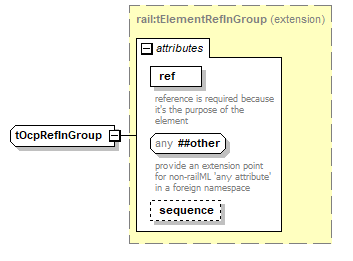 |
||||||||||||||||||||
| namespace | https://www.railml.org/schemas/2018 | ||||||||||||||||||||
| type | extension of rail:tElementRefInGroup | ||||||||||||||||||||
| properties |
|
||||||||||||||||||||
| used by |
|
||||||||||||||||||||
| attributes |
|
||||||||||||||||||||
| source | <xs:complexType name="tOcpRefInGroup"> <xs:complexContent> <xs:extension base="rail:tElementRefInGroup"/> <!-- Possible ocpGroup-specific attributes to be added here later --> </xs:complexContent> </xs:complexType> |
complexType tOcpTsi
| diagram | 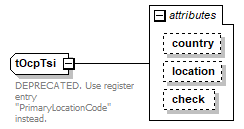 |
||||||||||||||||||||||||
| namespace | https://www.railml.org/schemas/2018 | ||||||||||||||||||||||||
| used by |
|
||||||||||||||||||||||||
| attributes |
|
||||||||||||||||||||||||
| annotation |
|
||||||||||||||||||||||||
| source | <xs:complexType name="tOcpTsi"> <xs:annotation> <xs:documentation>DEPRECATED. Use register entry "PrimaryLocationCode" instead.</xs:documentation> </xs:annotation> <xs:attribute name="country" type="rail:tTwoDigits"/> <xs:attribute name="location" type="rail:tFiveDigits"/> <xs:attribute name="check" type="rail:tOneDigit"/> <!-- more attributes can be added here later --> </xs:complexType> |
attribute tOcpTsi/@country
| type | rail:tTwoDigits | |||||||||
| facets |
|
|||||||||
| source | <xs:attribute name="country" type="rail:tTwoDigits"/> |
attribute tOcpTsi/@location
| type | rail:tFiveDigits | |||||||||
| facets |
|
|||||||||
| source | <xs:attribute name="location" type="rail:tFiveDigits"/> |
attribute tOcpTsi/@check
| type | rail:tOneDigit | |||||||||
| facets |
|
|||||||||
| source | <xs:attribute name="check" type="rail:tOneDigit"/> |
complexType tOcpUptime
| diagram | 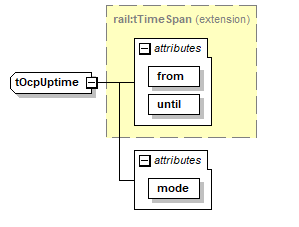 |
||||||||||||||||||||||||
| namespace | https://www.railml.org/schemas/2018 | ||||||||||||||||||||||||
| type | extension of rail:tTimeSpan | ||||||||||||||||||||||||
| properties |
|
||||||||||||||||||||||||
| used by |
|
||||||||||||||||||||||||
| attributes |
|
||||||||||||||||||||||||
| source | <xs:complexType name="tOcpUptime"> <xs:complexContent> <xs:extension base="rail:tTimeSpan"> <xs:attribute name="mode" type="rail:tOcpManMode" use="required"/> </xs:extension> </xs:complexContent> </xs:complexType> |
attribute tOcpUptime/@mode
| type | rail:tOcpManMode | ||
| properties |
|
||
| source | <xs:attribute name="mode" type="rail:tOcpManMode" use="required"/> |
complexType tOcpWithIDAndName
| diagram | 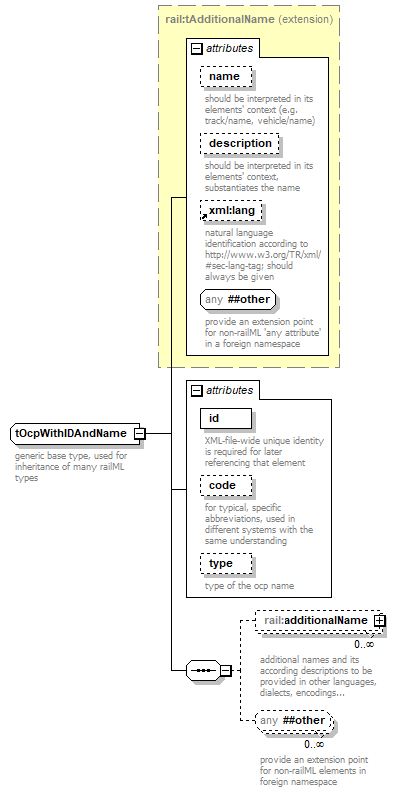 |
||||||||||||||||||||||||||||||||||||||||||||||||||||||
| namespace | https://www.railml.org/schemas/2018 | ||||||||||||||||||||||||||||||||||||||||||||||||||||||
| type | extension of rail:tAdditionalName | ||||||||||||||||||||||||||||||||||||||||||||||||||||||
| properties |
|
||||||||||||||||||||||||||||||||||||||||||||||||||||||
| children | rail:additionalName | ||||||||||||||||||||||||||||||||||||||||||||||||||||||
| used by |
|
||||||||||||||||||||||||||||||||||||||||||||||||||||||
| attributes |
|
||||||||||||||||||||||||||||||||||||||||||||||||||||||
| annotation |
|
||||||||||||||||||||||||||||||||||||||||||||||||||||||
| source | <xs:complexType name="tOcpWithIDAndName"> <xs:annotation> <xs:documentation>generic base type, used for inheritance of many railML types</xs:documentation> </xs:annotation> <xs:complexContent> <xs:extension base="rail:tAdditionalName"> <xs:sequence> <xs:element name="additionalName" type="rail:tAdditionalOcpName" minOccurs="0" maxOccurs="unbounded"> <xs:annotation> <xs:documentation>additional names and its according descriptions to be provided in other languages, dialects, encodings...</xs:documentation> <xs:documentation source="http://wiki.railml.org/index.php?title=IS:additionalName_ocp"/> </xs:annotation> </xs:element> <xs:any namespace="##other" processContents="strict" minOccurs="0" maxOccurs="unbounded"> <xs:annotation> <xs:documentation>provide an extension point for non-railML elements in foreign namespace</xs:documentation> </xs:annotation> </xs:any> </xs:sequence> <xs:attribute name="id" type="rail:tGenericID" use="required"> <xs:annotation> <xs:documentation>XML-file-wide unique identity is required for later referencing that element</xs:documentation> </xs:annotation> </xs:attribute> <xs:attribute name="code" type="rail:tGenericName"> <xs:annotation> <xs:documentation>for typical, specific abbreviations, used in different systems with the same understanding</xs:documentation> </xs:annotation> </xs:attribute> <xs:attribute name="type" type="rail:tOcpNameType"> <xs:annotation> <xs:documentation>type of the ocp name</xs:documentation> </xs:annotation> </xs:attribute> </xs:extension> </xs:complexContent> </xs:complexType> |
attribute tOcpWithIDAndName/@id
| type | rail:tGenericID | ||
| properties |
|
||
| annotation |
|
||
| source | <xs:attribute name="id" type="rail:tGenericID" use="required"> <xs:annotation> <xs:documentation>XML-file-wide unique identity is required for later referencing that element</xs:documentation> </xs:annotation> </xs:attribute> |
attribute tOcpWithIDAndName/@code
| type | rail:tGenericName | ||
| annotation |
|
||
| source | <xs:attribute name="code" type="rail:tGenericName"> <xs:annotation> <xs:documentation>for typical, specific abbreviations, used in different systems with the same understanding</xs:documentation> </xs:annotation> </xs:attribute> |
attribute tOcpWithIDAndName/@type
| type | rail:tOcpNameType | ||
| annotation |
|
||
| source | <xs:attribute name="type" type="rail:tOcpNameType"> <xs:annotation> <xs:documentation>type of the ocp name</xs:documentation> </xs:annotation> </xs:attribute> |
element tOcpWithIDAndName/additionalName
| diagram | 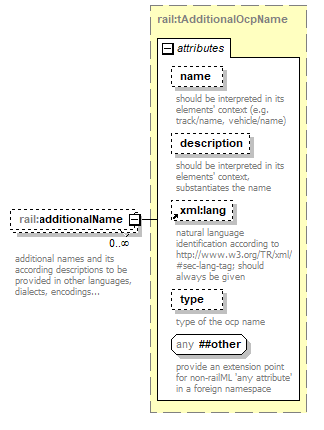 |
||||||||||||||||||||||||||||||||||||||
| namespace | https://www.railml.org/schemas/2018 | ||||||||||||||||||||||||||||||||||||||
| type | rail:tAdditionalOcpName | ||||||||||||||||||||||||||||||||||||||
| properties |
|
||||||||||||||||||||||||||||||||||||||
| attributes |
|
||||||||||||||||||||||||||||||||||||||
| annotation |
|
||||||||||||||||||||||||||||||||||||||
| source | <xs:element name="additionalName" type="rail:tAdditionalOcpName" minOccurs="0" maxOccurs="unbounded"> <xs:annotation> <xs:documentation>additional names and its according descriptions to be provided in other languages, dialects, encodings...</xs:documentation> <xs:documentation source="http://wiki.railml.org/index.php?title=IS:additionalName_ocp"/> </xs:annotation> </xs:element> |
complexType tOpenEnd
| diagram | 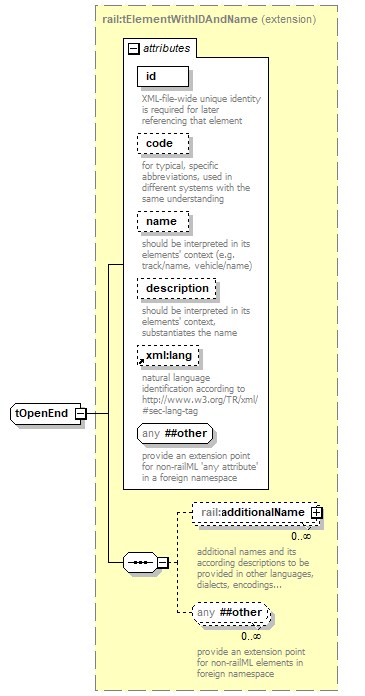 |
||||||||||||||||||||||||||||||||||||||||||||||
| namespace | https://www.railml.org/schemas/2018 | ||||||||||||||||||||||||||||||||||||||||||||||
| type | extension of rail:tElementWithIDAndName | ||||||||||||||||||||||||||||||||||||||||||||||
| properties |
|
||||||||||||||||||||||||||||||||||||||||||||||
| children | rail:additionalName | ||||||||||||||||||||||||||||||||||||||||||||||
| used by |
|
||||||||||||||||||||||||||||||||||||||||||||||
| attributes |
|
||||||||||||||||||||||||||||||||||||||||||||||
| source | <xs:complexType name="tOpenEnd"> <xs:complexContent> <xs:extension base="rail:tElementWithIDAndName"/> </xs:complexContent> </xs:complexType> |
complexType tOperationControlPoint
| diagram | 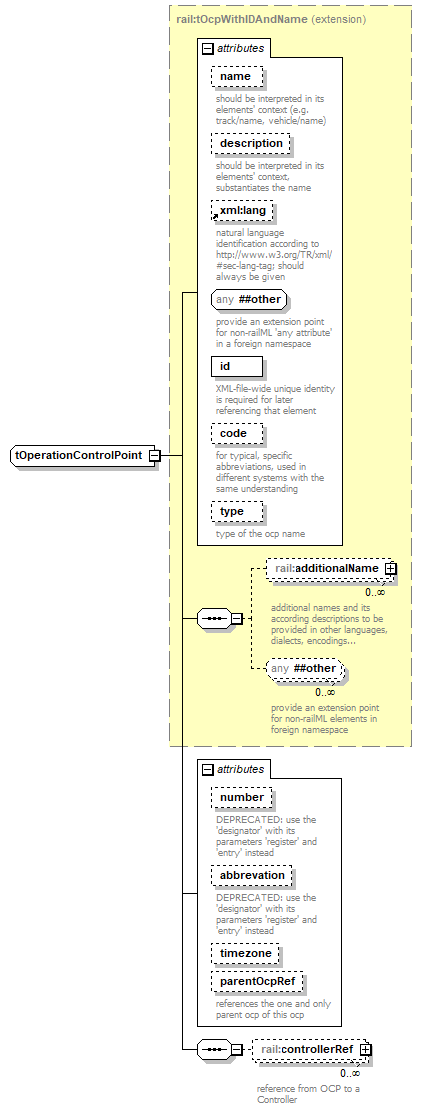 |
||||||||||||||||||||||||||||||||||||||||||||||||||||||||||||||||||||||||||||||||||||
| namespace | https://www.railml.org/schemas/2018 | ||||||||||||||||||||||||||||||||||||||||||||||||||||||||||||||||||||||||||||||||||||
| type | extension of rail:tOcpWithIDAndName | ||||||||||||||||||||||||||||||||||||||||||||||||||||||||||||||||||||||||||||||||||||
| properties |
|
||||||||||||||||||||||||||||||||||||||||||||||||||||||||||||||||||||||||||||||||||||
| children | rail:additionalName rail:controllerRef | ||||||||||||||||||||||||||||||||||||||||||||||||||||||||||||||||||||||||||||||||||||
| used by |
|
||||||||||||||||||||||||||||||||||||||||||||||||||||||||||||||||||||||||||||||||||||
| attributes |
|
||||||||||||||||||||||||||||||||||||||||||||||||||||||||||||||||||||||||||||||||||||
| source | <xs:complexType name="tOperationControlPoint"> <xs:complexContent> <xs:extension base="rail:tOcpWithIDAndName"> <xs:sequence> <xs:element name="controllerRef" type="rail:tElementRefInGroup" minOccurs="0" maxOccurs="unbounded"> <xs:annotation> <xs:documentation>reference from OCP to a Controller</xs:documentation> </xs:annotation> </xs:element> </xs:sequence> <xs:attribute name="number" type="xs:string"> <xs:annotation> <xs:documentation>DEPRECATED: use the 'designator' with its parameters 'register' and 'entry' instead</xs:documentation> </xs:annotation> </xs:attribute> <xs:attribute name="abbrevation" type="xs:string"> <xs:annotation> <xs:documentation>DEPRECATED: use the 'designator' with its parameters 'register' and 'entry' instead</xs:documentation> </xs:annotation> </xs:attribute> <xs:attribute name="timezone" type="rail:tTimeZone"/> <xs:attribute name="parentOcpRef" type="rail:tGenericRef"> <xs:annotation> <xs:documentation>references the one and only parent ocp of this ocp</xs:documentation> </xs:annotation> </xs:attribute> </xs:extension> </xs:complexContent> </xs:complexType> |
attribute tOperationControlPoint/@number
| type | xs:string | ||
| annotation |
|
||
| source | <xs:attribute name="number" type="xs:string"> <xs:annotation> <xs:documentation>DEPRECATED: use the 'designator' with its parameters 'register' and 'entry' instead</xs:documentation> </xs:annotation> </xs:attribute> |
attribute tOperationControlPoint/@abbrevation
| type | xs:string | ||
| annotation |
|
||
| source | <xs:attribute name="abbrevation" type="xs:string"> <xs:annotation> <xs:documentation>DEPRECATED: use the 'designator' with its parameters 'register' and 'entry' instead</xs:documentation> </xs:annotation> </xs:attribute> |
attribute tOperationControlPoint/@timezone
| type | rail:tTimeZone |
| source | <xs:attribute name="timezone" type="rail:tTimeZone"/> |
attribute tOperationControlPoint/@parentOcpRef
| type | rail:tGenericRef | ||
| annotation |
|
||
| source | <xs:attribute name="parentOcpRef" type="rail:tGenericRef"> <xs:annotation> <xs:documentation>references the one and only parent ocp of this ocp</xs:documentation> </xs:annotation> </xs:attribute> |
element tOperationControlPoint/controllerRef
| diagram | 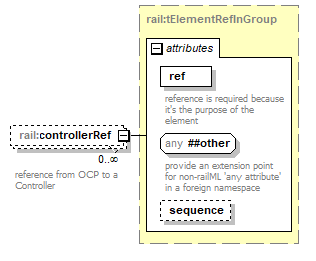 |
||||||||||||||||||||
| namespace | https://www.railml.org/schemas/2018 | ||||||||||||||||||||
| type | rail:tElementRefInGroup | ||||||||||||||||||||
| properties |
|
||||||||||||||||||||
| attributes |
|
||||||||||||||||||||
| annotation |
|
||||||||||||||||||||
| source | <xs:element name="controllerRef" type="rail:tElementRefInGroup" minOccurs="0" maxOccurs="unbounded"> <xs:annotation> <xs:documentation>reference from OCP to a Controller</xs:documentation> </xs:annotation> </xs:element> |
complexType tOperationMode
| diagram | 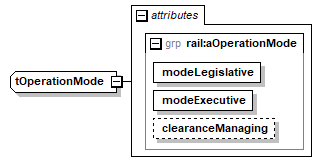 |
||||||||||||||||||||||||
| namespace | https://www.railml.org/schemas/2018 | ||||||||||||||||||||||||
| used by |
|
||||||||||||||||||||||||
| attributes |
|
||||||||||||||||||||||||
| source | <xs:complexType name="tOperationMode"> <xs:attributeGroup ref="rail:aOperationMode"/> </xs:complexType> |
complexType tOperationModeChange
| diagram | 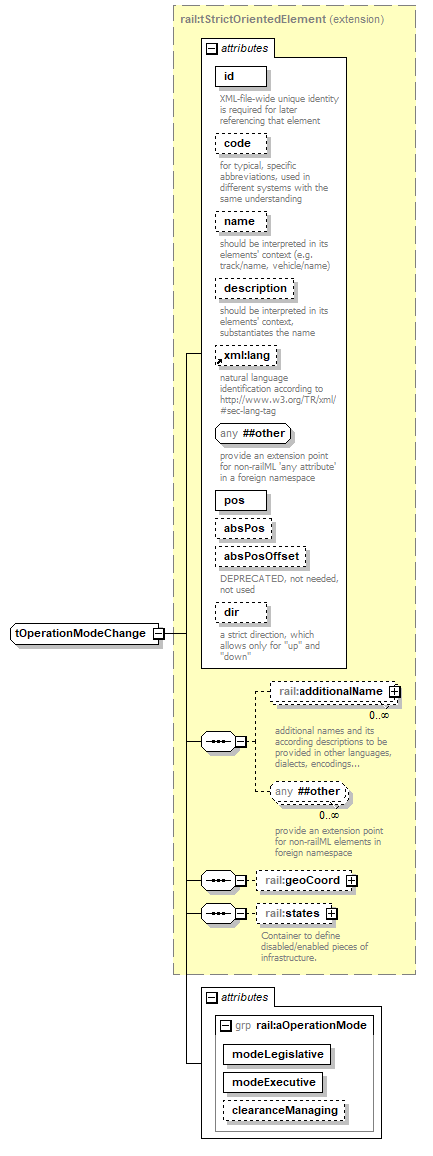 |
||||||||||||||||||||||||||||||||||||||||||||||||||||||||||||||||||||||||||||||||||||||||||||
| namespace | https://www.railml.org/schemas/2018 | ||||||||||||||||||||||||||||||||||||||||||||||||||||||||||||||||||||||||||||||||||||||||||||
| type | extension of rail:tStrictOrientedElement | ||||||||||||||||||||||||||||||||||||||||||||||||||||||||||||||||||||||||||||||||||||||||||||
| properties |
|
||||||||||||||||||||||||||||||||||||||||||||||||||||||||||||||||||||||||||||||||||||||||||||
| children | rail:additionalName rail:geoCoord rail:states | ||||||||||||||||||||||||||||||||||||||||||||||||||||||||||||||||||||||||||||||||||||||||||||
| used by |
|
||||||||||||||||||||||||||||||||||||||||||||||||||||||||||||||||||||||||||||||||||||||||||||
| attributes |
|
||||||||||||||||||||||||||||||||||||||||||||||||||||||||||||||||||||||||||||||||||||||||||||
| source | <xs:complexType name="tOperationModeChange"> <xs:complexContent> <xs:extension base="rail:tStrictOrientedElement"> <xs:attributeGroup ref="rail:aOperationMode"/> </xs:extension> </xs:complexContent> </xs:complexType> |
complexType tOrientedElement
| diagram | 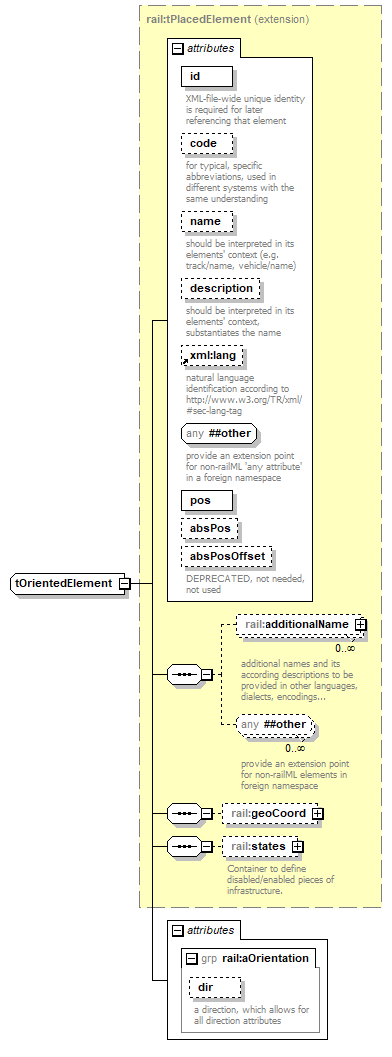 |
||||||||||||||||||||||||||||||||||||||||||||||||||||||||||||||||||||||||||
| namespace | https://www.railml.org/schemas/2018 | ||||||||||||||||||||||||||||||||||||||||||||||||||||||||||||||||||||||||||
| type | extension of rail:tPlacedElement | ||||||||||||||||||||||||||||||||||||||||||||||||||||||||||||||||||||||||||
| properties |
|
||||||||||||||||||||||||||||||||||||||||||||||||||||||||||||||||||||||||||
| children | rail:additionalName rail:geoCoord rail:states | ||||||||||||||||||||||||||||||||||||||||||||||||||||||||||||||||||||||||||
| used by |
|
||||||||||||||||||||||||||||||||||||||||||||||||||||||||||||||||||||||||||
| attributes |
|
||||||||||||||||||||||||||||||||||||||||||||||||||||||||||||||||||||||||||
| source | <xs:complexType name="tOrientedElement"> <xs:complexContent> <xs:extension base="rail:tPlacedElement"> <xs:attributeGroup ref="rail:aOrientation"/> </xs:extension> </xs:complexContent> </xs:complexType> |
complexType tOrientedElementWithLength
| diagram | 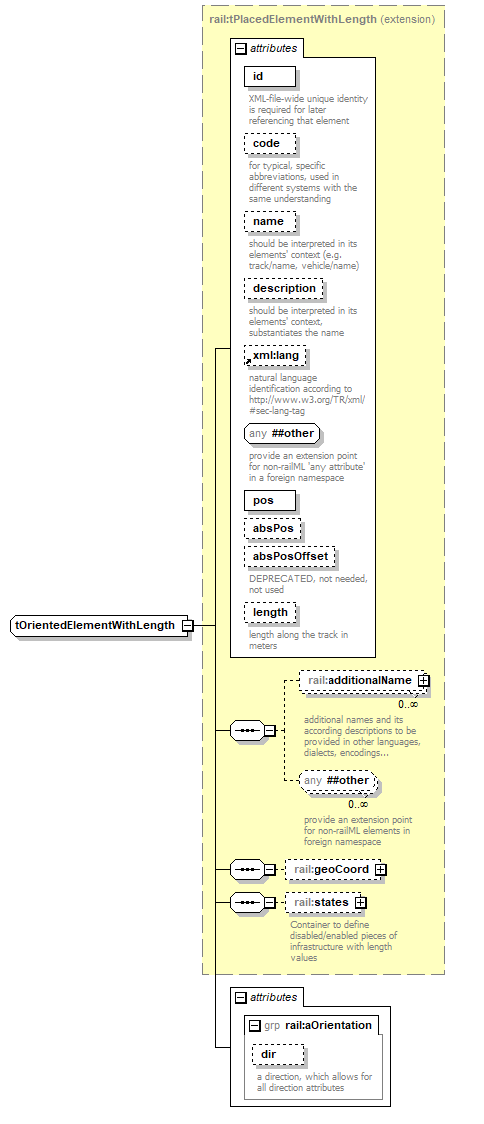 |
||||||||||||||||||||||||||||||||||||||||||||||||||||||||||||||||||||||||||||||||||
| namespace | https://www.railml.org/schemas/2018 | ||||||||||||||||||||||||||||||||||||||||||||||||||||||||||||||||||||||||||||||||||
| type | extension of rail:tPlacedElementWithLength | ||||||||||||||||||||||||||||||||||||||||||||||||||||||||||||||||||||||||||||||||||
| properties |
|
||||||||||||||||||||||||||||||||||||||||||||||||||||||||||||||||||||||||||||||||||
| children | rail:additionalName rail:geoCoord rail:states | ||||||||||||||||||||||||||||||||||||||||||||||||||||||||||||||||||||||||||||||||||
| attributes |
|
||||||||||||||||||||||||||||||||||||||||||||||||||||||||||||||||||||||||||||||||||
| source | <xs:complexType name="tOrientedElementWithLength"> <xs:complexContent> <xs:extension base="rail:tPlacedElementWithLength"> <xs:attributeGroup ref="rail:aOrientation"/> </xs:extension> </xs:complexContent> </xs:complexType> |
complexType tOwner
| diagram | 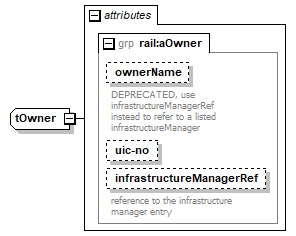 |
||||||||||||||||||||||||||||
| namespace | https://www.railml.org/schemas/2018 | ||||||||||||||||||||||||||||
| used by |
|
||||||||||||||||||||||||||||
| attributes |
|
||||||||||||||||||||||||||||
| source | <xs:complexType name="tOwner"> <xs:attributeGroup ref="rail:aOwner"/> </xs:complexType> |
complexType tOwnerChange
| diagram |  |
||||||||||||||||||||||||||||||||||||||||||||||||||||||||||||||||||||||||||||||||||||||||||||||||
| namespace | https://www.railml.org/schemas/2018 | ||||||||||||||||||||||||||||||||||||||||||||||||||||||||||||||||||||||||||||||||||||||||||||||||
| type | extension of rail:tStrictOrientedElement | ||||||||||||||||||||||||||||||||||||||||||||||||||||||||||||||||||||||||||||||||||||||||||||||||
| properties |
|
||||||||||||||||||||||||||||||||||||||||||||||||||||||||||||||||||||||||||||||||||||||||||||||||
| children | rail:additionalName rail:geoCoord rail:states | ||||||||||||||||||||||||||||||||||||||||||||||||||||||||||||||||||||||||||||||||||||||||||||||||
| used by |
|
||||||||||||||||||||||||||||||||||||||||||||||||||||||||||||||||||||||||||||||||||||||||||||||||
| attributes |
|
||||||||||||||||||||||||||||||||||||||||||||||||||||||||||||||||||||||||||||||||||||||||||||||||
| source | <xs:complexType name="tOwnerChange"> <xs:complexContent> <xs:extension base="rail:tStrictOrientedElement"> <xs:attributeGroup ref="rail:aOwner"/> </xs:extension> </xs:complexContent> </xs:complexType> |
complexType tPath
| diagram |  |
||
| namespace | https://www.railml.org/schemas/2018 | ||
| children | rail:ocpRef | ||
| used by |
|
||
| source | <xs:complexType name="tPath"> <xs:sequence> <xs:element name="ocpRef" type="rail:tOcpRefInGroup" minOccurs="2" maxOccurs="2"> <xs:annotation> <xs:documentation source="http://wiki.railml.org/index.php?title=IS:ocpRef"/> </xs:annotation> </xs:element> </xs:sequence> </xs:complexType> |
element tPath/ocpRef
| diagram | 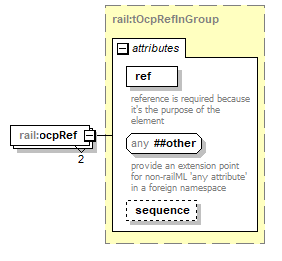 |
||||||||||||||||||||
| namespace | https://www.railml.org/schemas/2018 | ||||||||||||||||||||
| type | rail:tOcpRefInGroup | ||||||||||||||||||||
| properties |
|
||||||||||||||||||||
| attributes |
|
||||||||||||||||||||
| source | <xs:element name="ocpRef" type="rail:tOcpRefInGroup" minOccurs="2" maxOccurs="2"> <xs:annotation> <xs:documentation source="http://wiki.railml.org/index.php?title=IS:ocpRef"/> </xs:annotation> </xs:element> |
complexType tPlacedElement
| diagram | 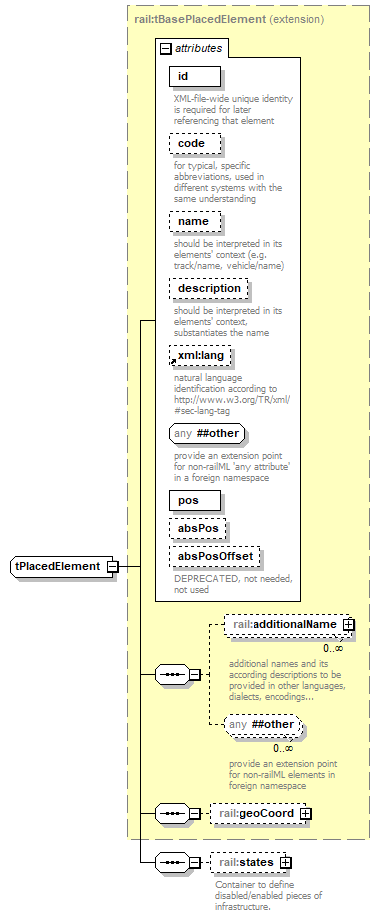 |
||||||||||||||||||||||||||||||||||||||||||||||||||||||||||||||||||
| namespace | https://www.railml.org/schemas/2018 | ||||||||||||||||||||||||||||||||||||||||||||||||||||||||||||||||||
| type | extension of rail:tBasePlacedElement | ||||||||||||||||||||||||||||||||||||||||||||||||||||||||||||||||||
| properties |
|
||||||||||||||||||||||||||||||||||||||||||||||||||||||||||||||||||
| children | rail:additionalName rail:geoCoord rail:states | ||||||||||||||||||||||||||||||||||||||||||||||||||||||||||||||||||
| used by |
|
||||||||||||||||||||||||||||||||||||||||||||||||||||||||||||||||||
| attributes |
|
||||||||||||||||||||||||||||||||||||||||||||||||||||||||||||||||||
| source | <xs:complexType name="tPlacedElement"> <xs:complexContent> <xs:extension base="rail:tBasePlacedElement"> <xs:sequence> <xs:element name="states" type="rail:tStates" minOccurs="0"> <xs:annotation> <xs:documentation>Container to define disabled/enabled pieces of infrastructure.</xs:documentation> <xs:documentation source="https://wiki.railml.org/index.php?title=IS:states"/> </xs:annotation> </xs:element> </xs:sequence> </xs:extension> </xs:complexContent> </xs:complexType> |
element tPlacedElement/states
| diagram | 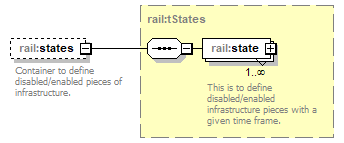 |
||||||
| namespace | https://www.railml.org/schemas/2018 | ||||||
| type | rail:tStates | ||||||
| properties |
|
||||||
| children | rail:state | ||||||
| annotation |
|
||||||
| source | <xs:element name="states" type="rail:tStates" minOccurs="0"> <xs:annotation> <xs:documentation>Container to define disabled/enabled pieces of infrastructure.</xs:documentation> <xs:documentation source="https://wiki.railml.org/index.php?title=IS:states"/> </xs:annotation> </xs:element> |
complexType tPlacedElementWithLength
| diagram | 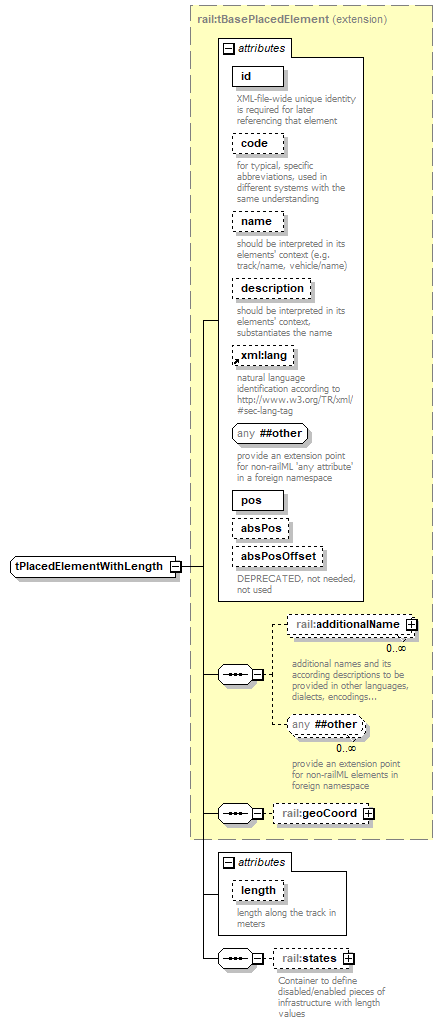 |
||||||||||||||||||||||||||||||||||||||||||||||||||||||||||||||||||||||||||
| namespace | https://www.railml.org/schemas/2018 | ||||||||||||||||||||||||||||||||||||||||||||||||||||||||||||||||||||||||||
| type | extension of rail:tBasePlacedElement | ||||||||||||||||||||||||||||||||||||||||||||||||||||||||||||||||||||||||||
| properties |
|
||||||||||||||||||||||||||||||||||||||||||||||||||||||||||||||||||||||||||
| children | rail:additionalName rail:geoCoord rail:states | ||||||||||||||||||||||||||||||||||||||||||||||||||||||||||||||||||||||||||
| used by |
|
||||||||||||||||||||||||||||||||||||||||||||||||||||||||||||||||||||||||||
| attributes |
|
||||||||||||||||||||||||||||||||||||||||||||||||||||||||||||||||||||||||||
| source | <xs:complexType name="tPlacedElementWithLength"> <xs:complexContent> <xs:extension base="rail:tBasePlacedElement"> <xs:sequence> <xs:element name="states" type="rail:tStatesWithLength" minOccurs="0"> <xs:annotation> <xs:documentation>Container to define disabled/enabled pieces of infrastructure with length values</xs:documentation> <xs:documentation source="https://wiki.railml.org/index.php?title=IS:states"/> </xs:annotation> </xs:element> </xs:sequence> <xs:attribute name="length" type="rail:tLengthM"> <xs:annotation> <xs:documentation>length along the track in meters</xs:documentation> </xs:annotation> </xs:attribute> </xs:extension> </xs:complexContent> </xs:complexType> |
attribute tPlacedElementWithLength/@length
| type | rail:tLengthM | ||||||
| facets |
|
||||||
| annotation |
|
||||||
| source | <xs:attribute name="length" type="rail:tLengthM"> <xs:annotation> <xs:documentation>length along the track in meters</xs:documentation> </xs:annotation> </xs:attribute> |
element tPlacedElementWithLength/states
| diagram | 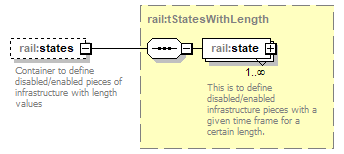 |
||||||
| namespace | https://www.railml.org/schemas/2018 | ||||||
| type | rail:tStatesWithLength | ||||||
| properties |
|
||||||
| children | rail:state | ||||||
| annotation |
|
||||||
| source | <xs:element name="states" type="rail:tStatesWithLength" minOccurs="0"> <xs:annotation> <xs:documentation>Container to define disabled/enabled pieces of infrastructure with length values</xs:documentation> <xs:documentation source="https://wiki.railml.org/index.php?title=IS:states"/> </xs:annotation> </xs:element> |
complexType tPlatformEdge
| diagram |  |
||||||||||||||||||||||||||||||||||||||||||||||||||||||||||||||||||||||||||||||||||||||||||||||||||||||||||||||||||
| namespace | https://www.railml.org/schemas/2018 | ||||||||||||||||||||||||||||||||||||||||||||||||||||||||||||||||||||||||||||||||||||||||||||||||||||||||||||||||||
| type | extension of rail:tBaseServiceSection | ||||||||||||||||||||||||||||||||||||||||||||||||||||||||||||||||||||||||||||||||||||||||||||||||||||||||||||||||||
| properties |
|
||||||||||||||||||||||||||||||||||||||||||||||||||||||||||||||||||||||||||||||||||||||||||||||||||||||||||||||||||
| children | rail:additionalName rail:geoCoord rail:states | ||||||||||||||||||||||||||||||||||||||||||||||||||||||||||||||||||||||||||||||||||||||||||||||||||||||||||||||||||
| used by |
|
||||||||||||||||||||||||||||||||||||||||||||||||||||||||||||||||||||||||||||||||||||||||||||||||||||||||||||||||||
| attributes |
|
||||||||||||||||||||||||||||||||||||||||||||||||||||||||||||||||||||||||||||||||||||||||||||||||||||||||||||||||||
| source | <xs:complexType name="tPlatformEdge"> <xs:complexContent> <xs:extension base="rail:tBaseServiceSection"> <xs:attribute name="parentPlatformEdgeRef" type="rail:tGenericRef"> <xs:annotation> <xs:documentation>reference to a parent platform edge for grouping platform edge parts together</xs:documentation> </xs:annotation> </xs:attribute> </xs:extension> </xs:complexContent> </xs:complexType> |
attribute tPlatformEdge/@parentPlatformEdgeRef
| type | rail:tGenericRef | ||
| annotation |
|
||
| source | <xs:attribute name="parentPlatformEdgeRef" type="rail:tGenericRef"> <xs:annotation> <xs:documentation>reference to a parent platform edge for grouping platform edge parts together</xs:documentation> </xs:annotation> </xs:attribute> |
complexType tPoint
| diagram |  |
||||||||||||||||||
| namespace | https://www.railml.org/schemas/2018 | ||||||||||||||||||
| used by |
|
||||||||||||||||||
| attributes |
|
||||||||||||||||||
| source | <xs:complexType name="tPoint"> <xs:attribute name="x" type="xs:double" use="required"/> <xs:attribute name="y" type="xs:double" use="required"/> </xs:complexType> |
attribute tPoint/@x
| type | xs:double | ||
| properties |
|
||
| source | <xs:attribute name="x" type="xs:double" use="required"/> |
attribute tPoint/@y
| type | xs:double | ||
| properties |
|
||
| source | <xs:attribute name="y" type="xs:double" use="required"/> |
complexType tPowerTransmission
| diagram | 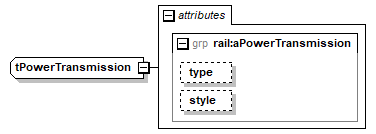 |
||||||||||||||||||
| namespace | https://www.railml.org/schemas/2018 | ||||||||||||||||||
| used by |
|
||||||||||||||||||
| attributes |
|
||||||||||||||||||
| source | <xs:complexType name="tPowerTransmission"> <xs:attributeGroup ref="rail:aPowerTransmission"/> </xs:complexType> |
complexType tPowerTransmissionChange
| diagram | 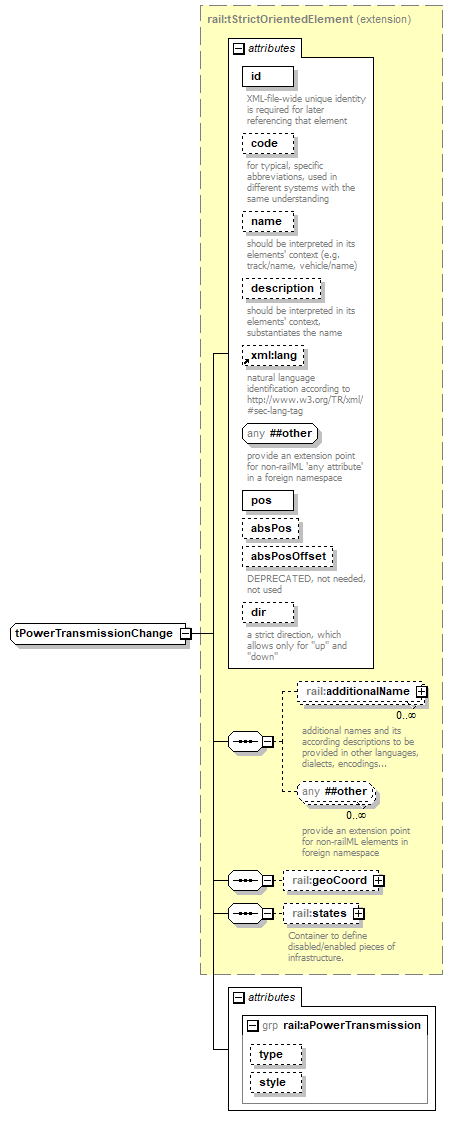 |
||||||||||||||||||||||||||||||||||||||||||||||||||||||||||||||||||||||||||||||||||||||
| namespace | https://www.railml.org/schemas/2018 | ||||||||||||||||||||||||||||||||||||||||||||||||||||||||||||||||||||||||||||||||||||||
| type | extension of rail:tStrictOrientedElement | ||||||||||||||||||||||||||||||||||||||||||||||||||||||||||||||||||||||||||||||||||||||
| properties |
|
||||||||||||||||||||||||||||||||||||||||||||||||||||||||||||||||||||||||||||||||||||||
| children | rail:additionalName rail:geoCoord rail:states | ||||||||||||||||||||||||||||||||||||||||||||||||||||||||||||||||||||||||||||||||||||||
| used by |
|
||||||||||||||||||||||||||||||||||||||||||||||||||||||||||||||||||||||||||||||||||||||
| attributes |
|
||||||||||||||||||||||||||||||||||||||||||||||||||||||||||||||||||||||||||||||||||||||
| source | <xs:complexType name="tPowerTransmissionChange"> <xs:complexContent> <xs:extension base="rail:tStrictOrientedElement"> <xs:attributeGroup ref="rail:aPowerTransmission"/> </xs:extension> </xs:complexContent> </xs:complexType> |
complexType tRadiusChange
| diagram |  |
||||||||||||||||||||||||||||||||||||||||||||||||||||||||||||||||||||||||||||||||||||||||||||||||||
| namespace | https://www.railml.org/schemas/2018 | ||||||||||||||||||||||||||||||||||||||||||||||||||||||||||||||||||||||||||||||||||||||||||||||||||
| type | extension of rail:tStrictOrientedElement | ||||||||||||||||||||||||||||||||||||||||||||||||||||||||||||||||||||||||||||||||||||||||||||||||||
| properties |
|
||||||||||||||||||||||||||||||||||||||||||||||||||||||||||||||||||||||||||||||||||||||||||||||||||
| children | rail:additionalName rail:geoCoord rail:states | ||||||||||||||||||||||||||||||||||||||||||||||||||||||||||||||||||||||||||||||||||||||||||||||||||
| used by |
|
||||||||||||||||||||||||||||||||||||||||||||||||||||||||||||||||||||||||||||||||||||||||||||||||||
| attributes |
|
||||||||||||||||||||||||||||||||||||||||||||||||||||||||||||||||||||||||||||||||||||||||||||||||||
| source | <xs:complexType name="tRadiusChange"> <xs:complexContent> <xs:extension base="rail:tStrictOrientedElement"> <xs:attributeGroup ref="rail:aRadiusChange"/> </xs:extension> </xs:complexContent> </xs:complexType> |
complexType tRuleCodeElement
| diagram | 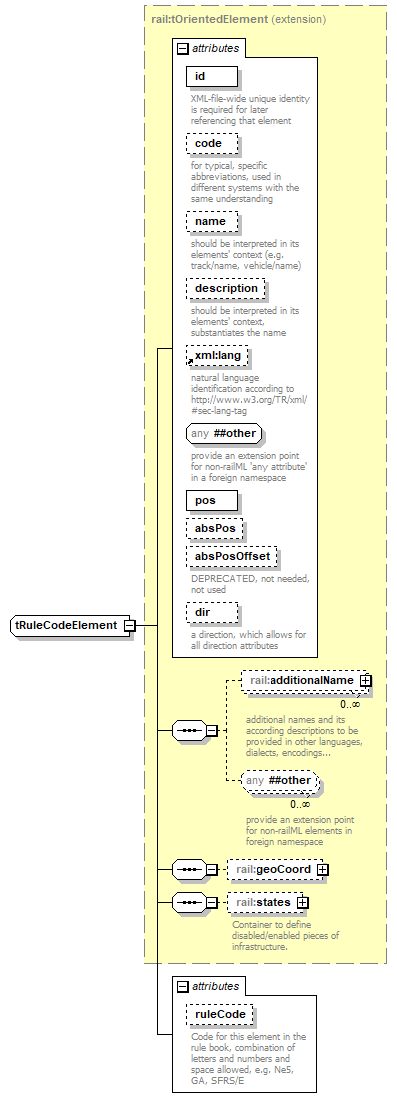 |
||||||||||||||||||||||||||||||||||||||||||||||||||||||||||||||||||||||||||||||||||
| namespace | https://www.railml.org/schemas/2018 | ||||||||||||||||||||||||||||||||||||||||||||||||||||||||||||||||||||||||||||||||||
| type | extension of rail:tOrientedElement | ||||||||||||||||||||||||||||||||||||||||||||||||||||||||||||||||||||||||||||||||||
| properties |
|
||||||||||||||||||||||||||||||||||||||||||||||||||||||||||||||||||||||||||||||||||
| children | rail:additionalName rail:geoCoord rail:states | ||||||||||||||||||||||||||||||||||||||||||||||||||||||||||||||||||||||||||||||||||
| used by |
|
||||||||||||||||||||||||||||||||||||||||||||||||||||||||||||||||||||||||||||||||||
| attributes |
|
||||||||||||||||||||||||||||||||||||||||||||||||||||||||||||||||||||||||||||||||||
| source | <xs:complexType name="tRuleCodeElement"> <xs:complexContent> <xs:extension base="rail:tOrientedElement"> <xs:attribute name="ruleCode" type="rail:tElementDescription"> <xs:annotation> <xs:documentation>Code for this element in the rule book, combination of letters and numbers and space allowed, e.g. Ne5, GA, SFRS/E</xs:documentation> </xs:annotation> </xs:attribute> </xs:extension> </xs:complexContent> </xs:complexType> |
attribute tRuleCodeElement/@ruleCode
| type | rail:tElementDescription | ||
| annotation |
|
||
| source | <xs:attribute name="ruleCode" type="rail:tElementDescription"> <xs:annotation> <xs:documentation>Code for this element in the rule book, combination of letters and numbers and space allowed, e.g. Ne5, GA, SFRS/E</xs:documentation> </xs:annotation> </xs:attribute> |
complexType tServiceSection
| diagram |  |
||||||||||||||||||||||||||||||||||||||||||||||||||||||||||||||||||||||||||||||||||||||||||||||||||||||||||||||||||||||||||||||||||||||||||||||||||||||||||||||||||||||||||
| namespace | https://www.railml.org/schemas/2018 | ||||||||||||||||||||||||||||||||||||||||||||||||||||||||||||||||||||||||||||||||||||||||||||||||||||||||||||||||||||||||||||||||||||||||||||||||||||||||||||||||||||||||||
| type | extension of rail:tBaseServiceSection | ||||||||||||||||||||||||||||||||||||||||||||||||||||||||||||||||||||||||||||||||||||||||||||||||||||||||||||||||||||||||||||||||||||||||||||||||||||||||||||||||||||||||||
| properties |
|
||||||||||||||||||||||||||||||||||||||||||||||||||||||||||||||||||||||||||||||||||||||||||||||||||||||||||||||||||||||||||||||||||||||||||||||||||||||||||||||||||||||||||
| children | rail:additionalName rail:geoCoord rail:states | ||||||||||||||||||||||||||||||||||||||||||||||||||||||||||||||||||||||||||||||||||||||||||||||||||||||||||||||||||||||||||||||||||||||||||||||||||||||||||||||||||||||||||
| used by |
|
||||||||||||||||||||||||||||||||||||||||||||||||||||||||||||||||||||||||||||||||||||||||||||||||||||||||||||||||||||||||||||||||||||||||||||||||||||||||||||||||||||||||||
| attributes |
|
||||||||||||||||||||||||||||||||||||||||||||||||||||||||||||||||||||||||||||||||||||||||||||||||||||||||||||||||||||||||||||||||||||||||||||||||||||||||||||||||||||||||||
| source | <xs:complexType name="tServiceSection"> <xs:complexContent> <xs:extension base="rail:tBaseServiceSection"> <xs:attribute name="parentServiceSectionRef" type="rail:tGenericRef"> <xs:annotation> <xs:documentation>reference to a parent service section for grouping service section parts together</xs:documentation> </xs:annotation> </xs:attribute> <xs:attribute name="ramp" type="xs:boolean"> <xs:annotation> <xs:documentation>defining the service section as being a ramp</xs:documentation> </xs:annotation> </xs:attribute> <xs:attribute name="maintenance" type="xs:boolean"> <xs:annotation> <xs:documentation>defining the service section as being a maintenance area</xs:documentation> </xs:annotation> </xs:attribute> <xs:attribute name="loadingFacility" type="xs:boolean"> <xs:annotation> <xs:documentation>defining the service section as being equipped with loading facilities</xs:documentation> </xs:annotation> </xs:attribute> <xs:attribute name="cleaning" type="xs:boolean"> <xs:annotation> <xs:documentation>defining the service section as being a cleaning area</xs:documentation> </xs:annotation> </xs:attribute> <xs:attribute name="fueling" type="xs:boolean"> <xs:annotation> <xs:documentation>defining the service section as being a fueling area</xs:documentation> </xs:annotation> </xs:attribute> <xs:attribute name="parking" type="xs:boolean"> <xs:annotation> <xs:documentation>defining the service section as being a parking area</xs:documentation> </xs:annotation> </xs:attribute> <xs:attribute name="preheating" type="xs:boolean"> <xs:annotation> <xs:documentation>defining the service section as being a preheating area</xs:documentation> </xs:annotation> </xs:attribute> </xs:extension> </xs:complexContent> </xs:complexType> |
attribute tServiceSection/@parentServiceSectionRef
| type | rail:tGenericRef | ||
| annotation |
|
||
| source | <xs:attribute name="parentServiceSectionRef" type="rail:tGenericRef"> <xs:annotation> <xs:documentation>reference to a parent service section for grouping service section parts together</xs:documentation> </xs:annotation> </xs:attribute> |
attribute tServiceSection/@ramp
| type | xs:boolean | ||
| annotation |
|
||
| source | <xs:attribute name="ramp" type="xs:boolean"> <xs:annotation> <xs:documentation>defining the service section as being a ramp</xs:documentation> </xs:annotation> </xs:attribute> |
attribute tServiceSection/@maintenance
| type | xs:boolean | ||
| annotation |
|
||
| source | <xs:attribute name="maintenance" type="xs:boolean"> <xs:annotation> <xs:documentation>defining the service section as being a maintenance area</xs:documentation> </xs:annotation> </xs:attribute> |
attribute tServiceSection/@loadingFacility
| type | xs:boolean | ||
| annotation |
|
||
| source | <xs:attribute name="loadingFacility" type="xs:boolean"> <xs:annotation> <xs:documentation>defining the service section as being equipped with loading facilities</xs:documentation> </xs:annotation> </xs:attribute> |
attribute tServiceSection/@cleaning
| type | xs:boolean | ||
| annotation |
|
||
| source | <xs:attribute name="cleaning" type="xs:boolean"> <xs:annotation> <xs:documentation>defining the service section as being a cleaning area</xs:documentation> </xs:annotation> </xs:attribute> |
attribute tServiceSection/@fueling
| type | xs:boolean | ||
| annotation |
|
||
| source | <xs:attribute name="fueling" type="xs:boolean"> <xs:annotation> <xs:documentation>defining the service section as being a fueling area</xs:documentation> </xs:annotation> </xs:attribute> |
attribute tServiceSection/@parking
| type | xs:boolean | ||
| annotation |
|
||
| source | <xs:attribute name="parking" type="xs:boolean"> <xs:annotation> <xs:documentation>defining the service section as being a parking area</xs:documentation> </xs:annotation> </xs:attribute> |
attribute tServiceSection/@preheating
| type | xs:boolean | ||
| annotation |
|
||
| source | <xs:attribute name="preheating" type="xs:boolean"> <xs:annotation> <xs:documentation>defining the service section as being a preheating area</xs:documentation> </xs:annotation> </xs:attribute> |
complexType tSignal
| diagram |  |
||||||||||||||||||||||||||||||||||||||||||||||||||||||||||||||||||||||||||||||||||||||||||||||||||||||||||||||||||||||||||||||||||||||||||||||||||||||||||||||||||||||||||||||||||||||||||||||||
| namespace | https://www.railml.org/schemas/2018 | ||||||||||||||||||||||||||||||||||||||||||||||||||||||||||||||||||||||||||||||||||||||||||||||||||||||||||||||||||||||||||||||||||||||||||||||||||||||||||||||||||||||||||||||||||||||||||||||||
| type | extension of rail:tRuleCodeElement | ||||||||||||||||||||||||||||||||||||||||||||||||||||||||||||||||||||||||||||||||||||||||||||||||||||||||||||||||||||||||||||||||||||||||||||||||||||||||||||||||||||||||||||||||||||||||||||||||
| properties |
|
||||||||||||||||||||||||||||||||||||||||||||||||||||||||||||||||||||||||||||||||||||||||||||||||||||||||||||||||||||||||||||||||||||||||||||||||||||||||||||||||||||||||||||||||||||||||||||||||
| children | rail:additionalName rail:geoCoord rail:states rail:speed rail:etcs rail:levelCrossing rail:trainRadio rail:catenary rail:line rail:milepost rail:braking rail:trainProtectionElementGroupRef rail:baliseGroupRef | ||||||||||||||||||||||||||||||||||||||||||||||||||||||||||||||||||||||||||||||||||||||||||||||||||||||||||||||||||||||||||||||||||||||||||||||||||||||||||||||||||||||||||||||||||||||||||||||||
| used by |
|
||||||||||||||||||||||||||||||||||||||||||||||||||||||||||||||||||||||||||||||||||||||||||||||||||||||||||||||||||||||||||||||||||||||||||||||||||||||||||||||||||||||||||||||||||||||||||||||||
| attributes |
|
||||||||||||||||||||||||||||||||||||||||||||||||||||||||||||||||||||||||||||||||||||||||||||||||||||||||||||||||||||||||||||||||||||||||||||||||||||||||||||||||||||||||||||||||||||||||||||||||
| source | <xs:complexType name="tSignal"> <xs:complexContent> <xs:extension base="rail:tRuleCodeElement"> <xs:sequence> <xs:element name="speed" type="rail:tSignalSpeed" minOccurs="0"> <xs:annotation> <xs:documentation>sub-element for defining a speed signal or panel</xs:documentation> <xs:documentation source="http://wiki.railml.org/index.php?title=IS:speed_signal"/> </xs:annotation> </xs:element> <xs:element name="etcs" type="rail:tSignalEtcs" minOccurs="0"> <xs:annotation> <xs:documentation>sub-element for defining an ETCS panel</xs:documentation> <xs:documentation source="http://wiki.railml.org/index.php?title=IS:etcs"/> </xs:annotation> </xs:element> <xs:element name="levelCrossing" type="rail:tSignalLevelCrossing" minOccurs="0"> <xs:annotation> <xs:documentation>sub-element for defining a level crossing signal or panel</xs:documentation> <xs:documentation source="http://wiki.railml.org/index.php?title=IS:levelCrossing_signal"/> </xs:annotation> </xs:element> <xs:element name="trainRadio" type="rail:tSignalTrainRadio" minOccurs="0"> <xs:annotation> <xs:documentation>sub-element for defining a train radio signal or panel</xs:documentation> <xs:documentation source="http://wiki.railml.org/index.php?title=IS:trainRadio"/> </xs:annotation> </xs:element> <xs:element name="catenary" type="rail:tSignalCatenary" minOccurs="0"> <xs:annotation> <xs:documentation>sub-element for defining a catenary signal or panel</xs:documentation> <xs:documentation source="http://wiki.railml.org/index.php?title=IS:catenary"/> </xs:annotation> </xs:element> <xs:element name="line" type="rail:tSignalLine" minOccurs="0"> <xs:annotation> <xs:documentation>sub-element for defining a line signal or panel</xs:documentation> <xs:documentation source="http://wiki.railml.org/index.php?title=IS:line_signal"/> </xs:annotation> </xs:element> <xs:element name="milepost" type="rail:tSignalMilepost" minOccurs="0"> <xs:annotation> <xs:documentation>sub-element for defining a mileage signpost</xs:documentation> <xs:documentation source="http://wiki.railml.org/index.php?title=IS:milepost"/> </xs:annotation> </xs:element> <xs:element name="braking" type="rail:tSignalBraking" minOccurs="0"> <xs:annotation> <xs:documentation>sub-element for defining a braking signal or panel</xs:documentation> <xs:documentation source="http://wiki.railml.org/index.php?title=IS:braking"/> </xs:annotation> </xs:element> <xs:element name="trainProtectionElementGroupRef" type="rail:tElementWithReference" minOccurs="0" maxOccurs="unbounded"> <xs:annotation> <xs:documentation>sub-element for a reference to a trainProtectionElementGroup, which is connected to the signal's aspect</xs:documentation> <xs:documentation source="http://wiki.railml.org/index.php?title=IS:trainProtectionElementGroupRef"/> </xs:annotation> </xs:element> <xs:element name="baliseGroupRef" type="rail:tElementWithReference" minOccurs="0" maxOccurs="unbounded"> <xs:annotation> <xs:documentation>sub-element for a reference to a baliseGroup, which is connected to the signal's aspect</xs:documentation> <xs:documentation source="http://wiki.railml.org/index.php?title=IS:baliseGroupRef"/> </xs:annotation> </xs:element> </xs:sequence> <xs:attributeGroup ref="rail:aSignal"/> <xs:attributeGroup ref="rail:aOcpRef"/> </xs:extension> </xs:complexContent> </xs:complexType> |
element tSignal/speed
| diagram | 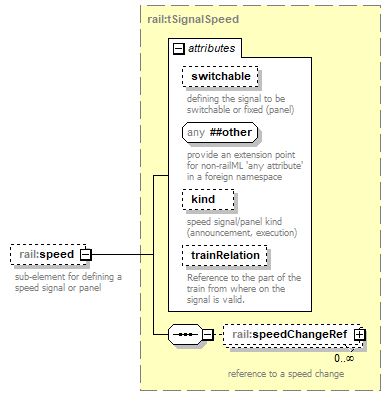 |
||||||||||||||||||||||||||||||
| namespace | https://www.railml.org/schemas/2018 | ||||||||||||||||||||||||||||||
| type | rail:tSignalSpeed | ||||||||||||||||||||||||||||||
| properties |
|
||||||||||||||||||||||||||||||
| children | rail:speedChangeRef | ||||||||||||||||||||||||||||||
| attributes |
|
||||||||||||||||||||||||||||||
| annotation |
|
||||||||||||||||||||||||||||||
| source | <xs:element name="speed" type="rail:tSignalSpeed" minOccurs="0"> <xs:annotation> <xs:documentation>sub-element for defining a speed signal or panel</xs:documentation> <xs:documentation source="http://wiki.railml.org/index.php?title=IS:speed_signal"/> </xs:annotation> </xs:element> |
element tSignal/etcs
| diagram | 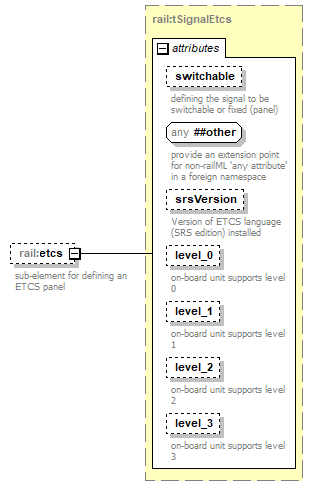 |
||||||||||||||||||||||||||||||||||||||||||||||||||||||
| namespace | https://www.railml.org/schemas/2018 | ||||||||||||||||||||||||||||||||||||||||||||||||||||||
| type | rail:tSignalEtcs | ||||||||||||||||||||||||||||||||||||||||||||||||||||||
| properties |
|
||||||||||||||||||||||||||||||||||||||||||||||||||||||
| attributes |
|
||||||||||||||||||||||||||||||||||||||||||||||||||||||
| annotation |
|
||||||||||||||||||||||||||||||||||||||||||||||||||||||
| source | <xs:element name="etcs" type="rail:tSignalEtcs" minOccurs="0"> <xs:annotation> <xs:documentation>sub-element for defining an ETCS panel</xs:documentation> <xs:documentation source="http://wiki.railml.org/index.php?title=IS:etcs"/> </xs:annotation> </xs:element> |
element tSignal/levelCrossing
| diagram | 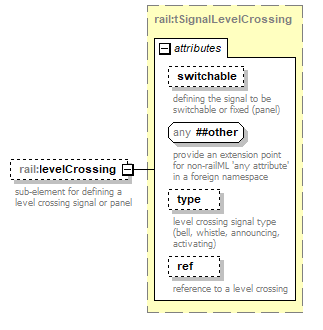 |
||||||||||||||||||||||||||||||
| namespace | https://www.railml.org/schemas/2018 | ||||||||||||||||||||||||||||||
| type | rail:tSignalLevelCrossing | ||||||||||||||||||||||||||||||
| properties |
|
||||||||||||||||||||||||||||||
| attributes |
|
||||||||||||||||||||||||||||||
| annotation |
|
||||||||||||||||||||||||||||||
| source | <xs:element name="levelCrossing" type="rail:tSignalLevelCrossing" minOccurs="0"> <xs:annotation> <xs:documentation>sub-element for defining a level crossing signal or panel</xs:documentation> <xs:documentation source="http://wiki.railml.org/index.php?title=IS:levelCrossing_signal"/> </xs:annotation> </xs:element> |
element tSignal/trainRadio
| diagram | 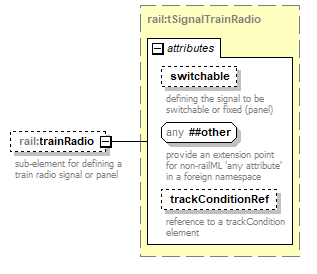 |
||||||||||||||||||||||
| namespace | https://www.railml.org/schemas/2018 | ||||||||||||||||||||||
| type | rail:tSignalTrainRadio | ||||||||||||||||||||||
| properties |
|
||||||||||||||||||||||
| attributes |
|
||||||||||||||||||||||
| annotation |
|
||||||||||||||||||||||
| source | <xs:element name="trainRadio" type="rail:tSignalTrainRadio" minOccurs="0"> <xs:annotation> <xs:documentation>sub-element for defining a train radio signal or panel</xs:documentation> <xs:documentation source="http://wiki.railml.org/index.php?title=IS:trainRadio"/> </xs:annotation> </xs:element> |
element tSignal/catenary
| diagram | 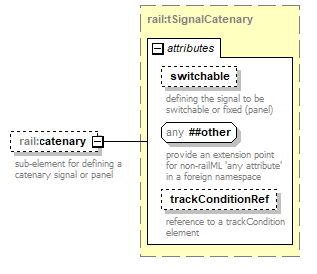 |
||||||||||||||||||||||
| namespace | https://www.railml.org/schemas/2018 | ||||||||||||||||||||||
| type | rail:tSignalCatenary | ||||||||||||||||||||||
| properties |
|
||||||||||||||||||||||
| attributes |
|
||||||||||||||||||||||
| annotation |
|
||||||||||||||||||||||
| source | <xs:element name="catenary" type="rail:tSignalCatenary" minOccurs="0"> <xs:annotation> <xs:documentation>sub-element for defining a catenary signal or panel</xs:documentation> <xs:documentation source="http://wiki.railml.org/index.php?title=IS:catenary"/> </xs:annotation> </xs:element> |
element tSignal/line
| diagram | 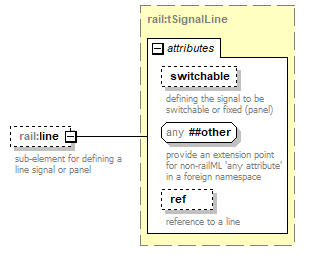 |
||||||||||||||||||||||
| namespace | https://www.railml.org/schemas/2018 | ||||||||||||||||||||||
| type | rail:tSignalLine | ||||||||||||||||||||||
| properties |
|
||||||||||||||||||||||
| attributes |
|
||||||||||||||||||||||
| annotation |
|
||||||||||||||||||||||
| source | <xs:element name="line" type="rail:tSignalLine" minOccurs="0"> <xs:annotation> <xs:documentation>sub-element for defining a line signal or panel</xs:documentation> <xs:documentation source="http://wiki.railml.org/index.php?title=IS:line_signal"/> </xs:annotation> </xs:element> |
element tSignal/milepost
| diagram | 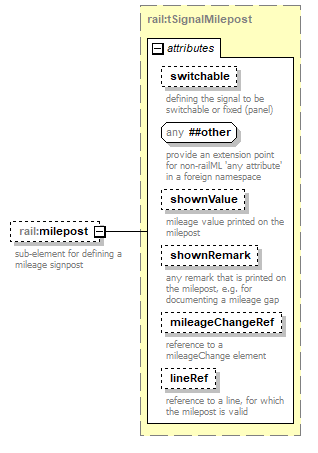 |
||||||||||||||||||||||||||||||||||||||||||||||
| namespace | https://www.railml.org/schemas/2018 | ||||||||||||||||||||||||||||||||||||||||||||||
| type | rail:tSignalMilepost | ||||||||||||||||||||||||||||||||||||||||||||||
| properties |
|
||||||||||||||||||||||||||||||||||||||||||||||
| attributes |
|
||||||||||||||||||||||||||||||||||||||||||||||
| annotation |
|
||||||||||||||||||||||||||||||||||||||||||||||
| source | <xs:element name="milepost" type="rail:tSignalMilepost" minOccurs="0"> <xs:annotation> <xs:documentation>sub-element for defining a mileage signpost</xs:documentation> <xs:documentation source="http://wiki.railml.org/index.php?title=IS:milepost"/> </xs:annotation> </xs:element> |
element tSignal/braking
| diagram | 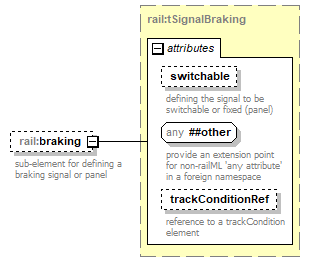 |
||||||||||||||||||||||
| namespace | https://www.railml.org/schemas/2018 | ||||||||||||||||||||||
| type | rail:tSignalBraking | ||||||||||||||||||||||
| properties |
|
||||||||||||||||||||||
| attributes |
|
||||||||||||||||||||||
| annotation |
|
||||||||||||||||||||||
| source | <xs:element name="braking" type="rail:tSignalBraking" minOccurs="0"> <xs:annotation> <xs:documentation>sub-element for defining a braking signal or panel</xs:documentation> <xs:documentation source="http://wiki.railml.org/index.php?title=IS:braking"/> </xs:annotation> </xs:element> |
element tSignal/trainProtectionElementGroupRef
| diagram | 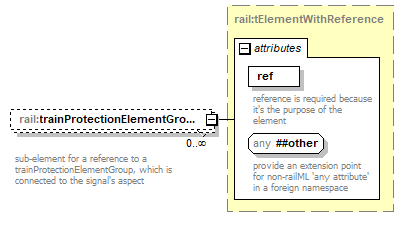 |
||||||||||||||
| namespace | https://www.railml.org/schemas/2018 | ||||||||||||||
| type | rail:tElementWithReference | ||||||||||||||
| properties |
|
||||||||||||||
| attributes |
|
||||||||||||||
| annotation |
|
||||||||||||||
| source | <xs:element name="trainProtectionElementGroupRef" type="rail:tElementWithReference" minOccurs="0" maxOccurs="unbounded"> <xs:annotation> <xs:documentation>sub-element for a reference to a trainProtectionElementGroup, which is connected to the signal's aspect</xs:documentation> <xs:documentation source="http://wiki.railml.org/index.php?title=IS:trainProtectionElementGroupRef"/> </xs:annotation> </xs:element> |
element tSignal/baliseGroupRef
| diagram | 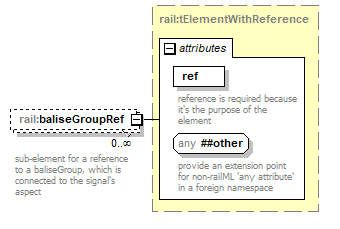 |
||||||||||||||
| namespace | https://www.railml.org/schemas/2018 | ||||||||||||||
| type | rail:tElementWithReference | ||||||||||||||
| properties |
|
||||||||||||||
| attributes |
|
||||||||||||||
| annotation |
|
||||||||||||||
| source | <xs:element name="baliseGroupRef" type="rail:tElementWithReference" minOccurs="0" maxOccurs="unbounded"> <xs:annotation> <xs:documentation>sub-element for a reference to a baliseGroup, which is connected to the signal's aspect</xs:documentation> <xs:documentation source="http://wiki.railml.org/index.php?title=IS:baliseGroupRef"/> </xs:annotation> </xs:element> |
complexType tSignalBase
| diagram | 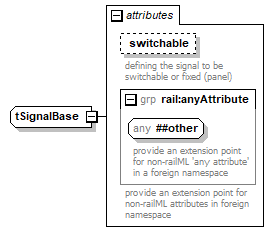 |
||||||||||||||
| namespace | https://www.railml.org/schemas/2018 | ||||||||||||||
| used by |
|
||||||||||||||
| attributes |
|
||||||||||||||
| source | <xs:complexType name="tSignalBase"> <xs:attribute name="switchable" type="xs:boolean"> <xs:annotation> <xs:documentation>defining the signal to be switchable or fixed (panel)</xs:documentation> </xs:annotation> </xs:attribute> <xs:attributeGroup ref="rail:anyAttribute"> <xs:annotation> <xs:documentation>provide an extension point for non-railML attributes in foreign namespace</xs:documentation> </xs:annotation> </xs:attributeGroup> </xs:complexType> |
attribute tSignalBase/@switchable
| type | xs:boolean | ||
| annotation |
|
||
| source | <xs:attribute name="switchable" type="xs:boolean"> <xs:annotation> <xs:documentation>defining the signal to be switchable or fixed (panel)</xs:documentation> </xs:annotation> </xs:attribute> |
complexType tSignalBraking
| diagram | 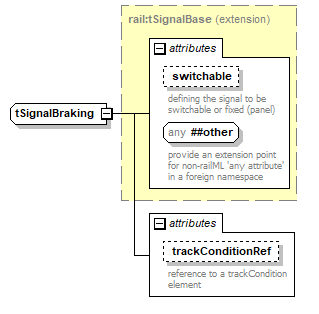 |
||||||||||||||||||||||
| namespace | https://www.railml.org/schemas/2018 | ||||||||||||||||||||||
| type | extension of rail:tSignalBase | ||||||||||||||||||||||
| properties |
|
||||||||||||||||||||||
| used by |
|
||||||||||||||||||||||
| attributes |
|
||||||||||||||||||||||
| source | <xs:complexType name="tSignalBraking"> <xs:complexContent> <xs:extension base="rail:tSignalBase"> <xs:attribute name="trackConditionRef" type="rail:tGenericRef"> <xs:annotation> <xs:documentation>reference to a trackCondition element</xs:documentation> </xs:annotation> </xs:attribute> </xs:extension> </xs:complexContent> </xs:complexType> |
attribute tSignalBraking/@trackConditionRef
| type | rail:tGenericRef | ||
| annotation |
|
||
| source | <xs:attribute name="trackConditionRef" type="rail:tGenericRef"> <xs:annotation> <xs:documentation>reference to a trackCondition element</xs:documentation> </xs:annotation> </xs:attribute> |
complexType tSignalCatenary
| diagram | 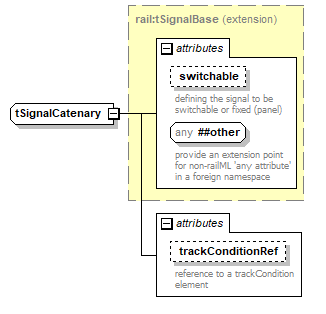 |
||||||||||||||||||||||
| namespace | https://www.railml.org/schemas/2018 | ||||||||||||||||||||||
| type | extension of rail:tSignalBase | ||||||||||||||||||||||
| properties |
|
||||||||||||||||||||||
| used by |
|
||||||||||||||||||||||
| attributes |
|
||||||||||||||||||||||
| source | <xs:complexType name="tSignalCatenary"> <xs:complexContent> <xs:extension base="rail:tSignalBase"> <xs:attribute name="trackConditionRef" type="rail:tGenericRef"> <xs:annotation> <xs:documentation>reference to a trackCondition element</xs:documentation> </xs:annotation> </xs:attribute> </xs:extension> </xs:complexContent> </xs:complexType> |
attribute tSignalCatenary/@trackConditionRef
| type | rail:tGenericRef | ||
| annotation |
|
||
| source | <xs:attribute name="trackConditionRef" type="rail:tGenericRef"> <xs:annotation> <xs:documentation>reference to a trackCondition element</xs:documentation> </xs:annotation> </xs:attribute> |
complexType tSignalEtcs
| diagram | 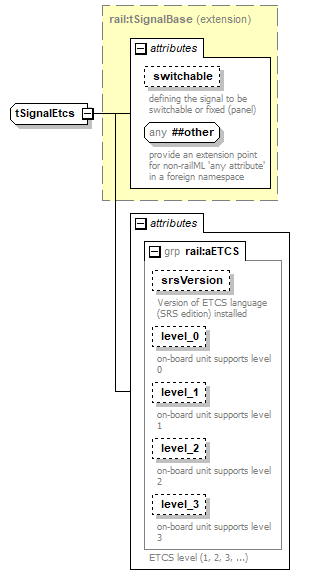 |
||||||||||||||||||||||||||||||||||||||||||||||||||||||
| namespace | https://www.railml.org/schemas/2018 | ||||||||||||||||||||||||||||||||||||||||||||||||||||||
| type | extension of rail:tSignalBase | ||||||||||||||||||||||||||||||||||||||||||||||||||||||
| properties |
|
||||||||||||||||||||||||||||||||||||||||||||||||||||||
| used by |
|
||||||||||||||||||||||||||||||||||||||||||||||||||||||
| attributes |
|
||||||||||||||||||||||||||||||||||||||||||||||||||||||
| source | <xs:complexType name="tSignalEtcs"> <xs:complexContent> <xs:extension base="rail:tSignalBase"> <xs:attributeGroup ref="rail:aETCS"> <xs:annotation> <xs:documentation>ETCS level (1, 2, 3, ...)</xs:documentation> </xs:annotation> </xs:attributeGroup> </xs:extension> </xs:complexContent> </xs:complexType> |
complexType tSignalGroup
| diagram | 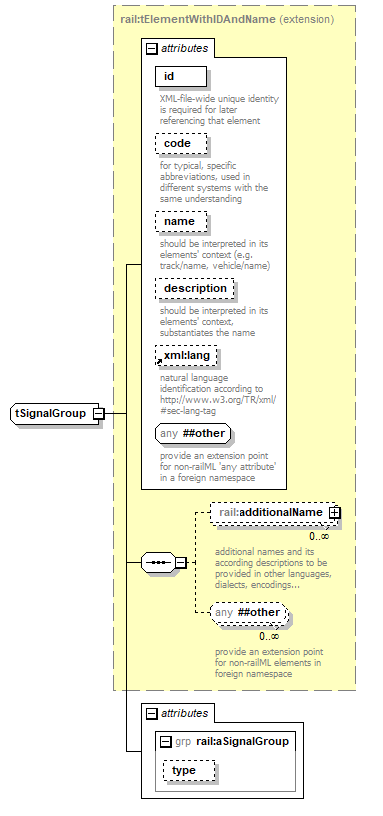 |
||||||||||||||||||||||||||||||||||||||||||||||||||||
| namespace | https://www.railml.org/schemas/2018 | ||||||||||||||||||||||||||||||||||||||||||||||||||||
| type | extension of rail:tElementWithIDAndName | ||||||||||||||||||||||||||||||||||||||||||||||||||||
| properties |
|
||||||||||||||||||||||||||||||||||||||||||||||||||||
| children | rail:additionalName | ||||||||||||||||||||||||||||||||||||||||||||||||||||
| used by |
|
||||||||||||||||||||||||||||||||||||||||||||||||||||
| attributes |
|
||||||||||||||||||||||||||||||||||||||||||||||||||||
| source | <xs:complexType name="tSignalGroup"> <xs:complexContent> <xs:extension base="rail:tElementWithIDAndName"> <xs:attributeGroup ref="rail:aSignalGroup"/> </xs:extension> </xs:complexContent> </xs:complexType> |
complexType tSignalLevelCrossing
| diagram | 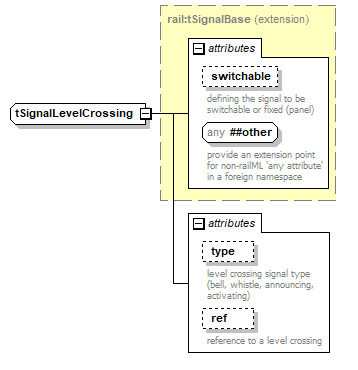 |
||||||||||||||||||||||||||||||
| namespace | https://www.railml.org/schemas/2018 | ||||||||||||||||||||||||||||||
| type | extension of rail:tSignalBase | ||||||||||||||||||||||||||||||
| properties |
|
||||||||||||||||||||||||||||||
| used by |
|
||||||||||||||||||||||||||||||
| attributes |
|
||||||||||||||||||||||||||||||
| source | <xs:complexType name="tSignalLevelCrossing"> <xs:complexContent> <xs:extension base="rail:tSignalBase"> <xs:attribute name="type" type="rail:tLevelCrossingSignalType"> <xs:annotation> <xs:documentation>level crossing signal type (bell, whistle, announcing, activating)</xs:documentation> </xs:annotation> </xs:attribute> <xs:attribute name="ref" type="rail:tGenericRef"> <xs:annotation> <xs:documentation>reference to a level crossing</xs:documentation> </xs:annotation> </xs:attribute> </xs:extension> </xs:complexContent> </xs:complexType> |
attribute tSignalLevelCrossing/@type
| type | rail:tLevelCrossingSignalType | ||
| annotation |
|
||
| source | <xs:attribute name="type" type="rail:tLevelCrossingSignalType"> <xs:annotation> <xs:documentation>level crossing signal type (bell, whistle, announcing, activating)</xs:documentation> </xs:annotation> </xs:attribute> |
attribute tSignalLevelCrossing/@ref
| type | rail:tGenericRef | ||
| annotation |
|
||
| source | <xs:attribute name="ref" type="rail:tGenericRef"> <xs:annotation> <xs:documentation>reference to a level crossing</xs:documentation> </xs:annotation> </xs:attribute> |
complexType tSignalLine
| diagram | 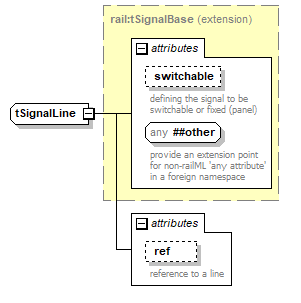 |
||||||||||||||||||||||
| namespace | https://www.railml.org/schemas/2018 | ||||||||||||||||||||||
| type | extension of rail:tSignalBase | ||||||||||||||||||||||
| properties |
|
||||||||||||||||||||||
| used by |
|
||||||||||||||||||||||
| attributes |
|
||||||||||||||||||||||
| source | <xs:complexType name="tSignalLine"> <xs:complexContent> <xs:extension base="rail:tSignalBase"> <xs:attribute name="ref" type="rail:tGenericRef"> <xs:annotation> <xs:documentation>reference to a line</xs:documentation> </xs:annotation> </xs:attribute> </xs:extension> </xs:complexContent> </xs:complexType> |
attribute tSignalLine/@ref
| type | rail:tGenericRef | ||
| annotation |
|
||
| source | <xs:attribute name="ref" type="rail:tGenericRef"> <xs:annotation> <xs:documentation>reference to a line</xs:documentation> </xs:annotation> </xs:attribute> |
complexType tSignalMilepost
| diagram | 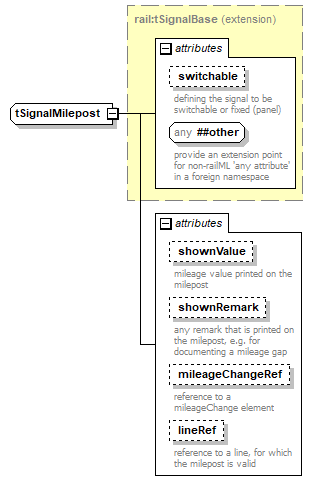 |
||||||||||||||||||||||||||||||||||||||||||||||
| namespace | https://www.railml.org/schemas/2018 | ||||||||||||||||||||||||||||||||||||||||||||||
| type | extension of rail:tSignalBase | ||||||||||||||||||||||||||||||||||||||||||||||
| properties |
|
||||||||||||||||||||||||||||||||||||||||||||||
| used by |
|
||||||||||||||||||||||||||||||||||||||||||||||
| attributes |
|
||||||||||||||||||||||||||||||||||||||||||||||
| source | <xs:complexType name="tSignalMilepost"> <xs:complexContent> <xs:extension base="rail:tSignalBase"> <xs:attribute name="shownValue" type="rail:tLength"> <xs:annotation> <xs:documentation>mileage value printed on the milepost</xs:documentation> </xs:annotation> </xs:attribute> <xs:attribute name="shownRemark" type="xs:string"> <xs:annotation> <xs:documentation>any remark that is printed on the milepost, e.g. for documenting a mileage gap</xs:documentation> </xs:annotation> </xs:attribute> <xs:attribute name="mileageChangeRef" type="rail:tGenericRef"> <xs:annotation> <xs:documentation>reference to a mileageChange element</xs:documentation> </xs:annotation> </xs:attribute> <xs:attribute name="lineRef" type="rail:tGenericRef"> <xs:annotation> <xs:documentation>reference to a line, for which the milepost is valid</xs:documentation> </xs:annotation> </xs:attribute> </xs:extension> </xs:complexContent> </xs:complexType> |
attribute tSignalMilepost/@shownValue
| type | rail:tLength | ||||||
| facets |
|
||||||
| annotation |
|
||||||
| source | <xs:attribute name="shownValue" type="rail:tLength"> <xs:annotation> <xs:documentation>mileage value printed on the milepost</xs:documentation> </xs:annotation> </xs:attribute> |
attribute tSignalMilepost/@shownRemark
| type | xs:string | ||
| annotation |
|
||
| source | <xs:attribute name="shownRemark" type="xs:string"> <xs:annotation> <xs:documentation>any remark that is printed on the milepost, e.g. for documenting a mileage gap</xs:documentation> </xs:annotation> </xs:attribute> |
attribute tSignalMilepost/@mileageChangeRef
| type | rail:tGenericRef | ||
| annotation |
|
||
| source | <xs:attribute name="mileageChangeRef" type="rail:tGenericRef"> <xs:annotation> <xs:documentation>reference to a mileageChange element</xs:documentation> </xs:annotation> </xs:attribute> |
attribute tSignalMilepost/@lineRef
| type | rail:tGenericRef | ||
| annotation |
|
||
| source | <xs:attribute name="lineRef" type="rail:tGenericRef"> <xs:annotation> <xs:documentation>reference to a line, for which the milepost is valid</xs:documentation> </xs:annotation> </xs:attribute> |
complexType tSignalRefInGroup
| diagram | 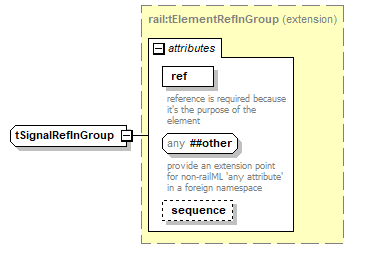 |
||||||||||||||||||||
| namespace | https://www.railml.org/schemas/2018 | ||||||||||||||||||||
| type | extension of rail:tElementRefInGroup | ||||||||||||||||||||
| properties |
|
||||||||||||||||||||
| used by |
|
||||||||||||||||||||
| attributes |
|
||||||||||||||||||||
| source | <xs:complexType name="tSignalRefInGroup"> <xs:complexContent> <xs:extension base="rail:tElementRefInGroup"/> <!-- Possible signalGroup-specific attributes to be added here later --> </xs:complexContent> </xs:complexType> |
complexType tSignalSpeed
| diagram | 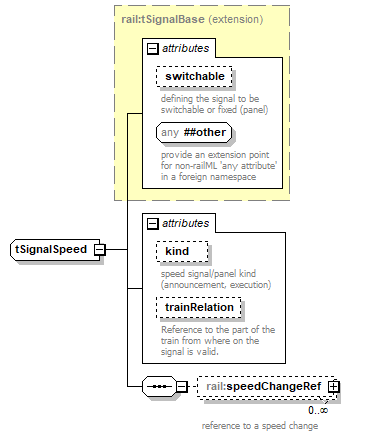 |
||||||||||||||||||||||||||||||
| namespace | https://www.railml.org/schemas/2018 | ||||||||||||||||||||||||||||||
| type | extension of rail:tSignalBase | ||||||||||||||||||||||||||||||
| properties |
|
||||||||||||||||||||||||||||||
| children | rail:speedChangeRef | ||||||||||||||||||||||||||||||
| used by |
|
||||||||||||||||||||||||||||||
| attributes |
|
||||||||||||||||||||||||||||||
| source | <xs:complexType name="tSignalSpeed"> <xs:complexContent> <xs:extension base="rail:tSignalBase"> <xs:sequence> <xs:element name="speedChangeRef" type="rail:tElementWithReference" minOccurs="0" maxOccurs="unbounded"> <xs:annotation> <xs:documentation>reference to a speed change</xs:documentation> <xs:documentation source="http://wiki.railml.org/index.php?title=IS:speedChangeRef"/> </xs:annotation> </xs:element> </xs:sequence> <xs:attribute name="kind" type="rail:tSignalKind"> <xs:annotation> <xs:documentation>speed signal/panel kind (announcement, execution)</xs:documentation> </xs:annotation> </xs:attribute> <xs:attribute name="trainRelation" type="rail:tTrainRelation"> <xs:annotation> <xs:documentation>Reference to the part of the train from where on the signal is valid.</xs:documentation> </xs:annotation> </xs:attribute> </xs:extension> </xs:complexContent> </xs:complexType> |
attribute tSignalSpeed/@kind
| type | rail:tSignalKind | ||
| annotation |
|
||
| source | <xs:attribute name="kind" type="rail:tSignalKind"> <xs:annotation> <xs:documentation>speed signal/panel kind (announcement, execution)</xs:documentation> </xs:annotation> </xs:attribute> |
attribute tSignalSpeed/@trainRelation
| type | rail:tTrainRelation | ||
| annotation |
|
||
| source | <xs:attribute name="trainRelation" type="rail:tTrainRelation"> <xs:annotation> <xs:documentation>Reference to the part of the train from where on the signal is valid.</xs:documentation> </xs:annotation> </xs:attribute> |
element tSignalSpeed/speedChangeRef
| diagram | 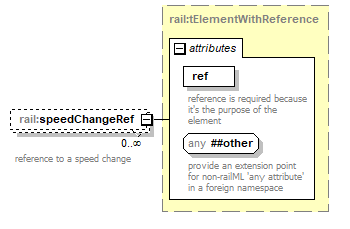 |
||||||||||||||
| namespace | https://www.railml.org/schemas/2018 | ||||||||||||||
| type | rail:tElementWithReference | ||||||||||||||
| properties |
|
||||||||||||||
| attributes |
|
||||||||||||||
| annotation |
|
||||||||||||||
| source | <xs:element name="speedChangeRef" type="rail:tElementWithReference" minOccurs="0" maxOccurs="unbounded"> <xs:annotation> <xs:documentation>reference to a speed change</xs:documentation> <xs:documentation source="http://wiki.railml.org/index.php?title=IS:speedChangeRef"/> </xs:annotation> </xs:element> |
complexType tSignalTrainRadio
| diagram | 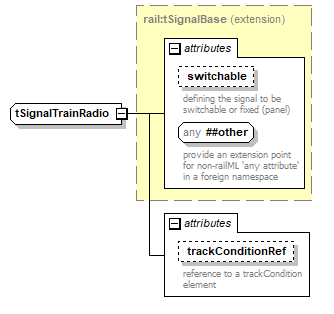 |
||||||||||||||||||||||
| namespace | https://www.railml.org/schemas/2018 | ||||||||||||||||||||||
| type | extension of rail:tSignalBase | ||||||||||||||||||||||
| properties |
|
||||||||||||||||||||||
| used by |
|
||||||||||||||||||||||
| attributes |
|
||||||||||||||||||||||
| source | <xs:complexType name="tSignalTrainRadio"> <xs:complexContent> <xs:extension base="rail:tSignalBase"> <xs:attribute name="trackConditionRef" type="rail:tGenericRef"> <xs:annotation> <xs:documentation>reference to a trackCondition element</xs:documentation> </xs:annotation> </xs:attribute> </xs:extension> </xs:complexContent> </xs:complexType> |
attribute tSignalTrainRadio/@trackConditionRef
| type | rail:tGenericRef | ||
| annotation |
|
||
| source | <xs:attribute name="trackConditionRef" type="rail:tGenericRef"> <xs:annotation> <xs:documentation>reference to a trackCondition element</xs:documentation> </xs:annotation> </xs:attribute> |
complexType tSize
| diagram |  |
||||||||||||||||||
| namespace | https://www.railml.org/schemas/2018 | ||||||||||||||||||
| used by |
|
||||||||||||||||||
| attributes |
|
||||||||||||||||||
| source | <xs:complexType name="tSize"> <xs:attribute name="width" type="xs:double" use="required"/> <xs:attribute name="height" type="xs:double" use="required"/> </xs:complexType> |
attribute tSize/@width
| type | xs:double | ||
| properties |
|
||
| source | <xs:attribute name="width" type="xs:double" use="required"/> |
attribute tSize/@height
| type | xs:double | ||
| properties |
|
||
| source | <xs:attribute name="height" type="xs:double" use="required"/> |
complexType tSpeedChange
| diagram |  |
||||||||||||||||||||||||||||||||||||||||||||||||||||||||||||||||||||||||||||||||||||||||||||||||||||||||||||||||||||||||||||||||||||||||||
| namespace | https://www.railml.org/schemas/2018 | ||||||||||||||||||||||||||||||||||||||||||||||||||||||||||||||||||||||||||||||||||||||||||||||||||||||||||||||||||||||||||||||||||||||||||
| type | extension of rail:tStrictOrientedElement | ||||||||||||||||||||||||||||||||||||||||||||||||||||||||||||||||||||||||||||||||||||||||||||||||||||||||||||||||||||||||||||||||||||||||||
| properties |
|
||||||||||||||||||||||||||||||||||||||||||||||||||||||||||||||||||||||||||||||||||||||||||||||||||||||||||||||||||||||||||||||||||||||||||
| children | rail:additionalName rail:geoCoord rail:states | ||||||||||||||||||||||||||||||||||||||||||||||||||||||||||||||||||||||||||||||||||||||||||||||||||||||||||||||||||||||||||||||||||||||||||
| used by |
|
||||||||||||||||||||||||||||||||||||||||||||||||||||||||||||||||||||||||||||||||||||||||||||||||||||||||||||||||||||||||||||||||||||||||||
| attributes |
|
||||||||||||||||||||||||||||||||||||||||||||||||||||||||||||||||||||||||||||||||||||||||||||||||||||||||||||||||||||||||||||||||||||||||||
| source | <xs:complexType name="tSpeedChange"> <xs:complexContent> <xs:extension base="rail:tStrictOrientedElement"> <xs:attributeGroup ref="rail:aSpeed"/> <xs:attribute name="trainRelation" type="rail:tTrainRelation"> <xs:annotation> <xs:documentation>Reference to the part of the train from where on the speed change is valid. Normally, a speed restriction that is higher than the train's current speed will be valid when the end of the train has passed the speed change while a speed restriction that is lower than the train's current speed will be valid already when the head of train passes the speedChange.</xs:documentation> <xs:documentation>If the attribute is not given, it means that the information is not known.</xs:documentation> </xs:annotation> </xs:attribute> <xs:attribute name="mandatoryStop" type="xs:boolean"> <xs:annotation> <xs:documentation>specifying the speedChange as a mandatory stop point, e.g. in front of a level crossing</xs:documentation> </xs:annotation> </xs:attribute> <xs:attribute name="signalised" type="xs:boolean"> <xs:annotation> <xs:documentation>indicates whether the speed aspect is shown next to the track by a signal or panel (true) or only in the "driver's timetable" (false)</xs:documentation> </xs:annotation> </xs:attribute> </xs:extension> </xs:complexContent> </xs:complexType> |
attribute tSpeedChange/@trainRelation
| type | rail:tTrainRelation | ||||
| annotation |
|
||||
| source | <xs:attribute name="trainRelation" type="rail:tTrainRelation"> <xs:annotation> <xs:documentation>Reference to the part of the train from where on the speed change is valid. Normally, a speed restriction that is higher than the train's current speed will be valid when the end of the train has passed the speed change while a speed restriction that is lower than the train's current speed will be valid already when the head of train passes the speedChange.</xs:documentation> <xs:documentation>If the attribute is not given, it means that the information is not known.</xs:documentation> </xs:annotation> </xs:attribute> |
attribute tSpeedChange/@mandatoryStop
| type | xs:boolean | ||
| annotation |
|
||
| source | <xs:attribute name="mandatoryStop" type="xs:boolean"> <xs:annotation> <xs:documentation>specifying the speedChange as a mandatory stop point, e.g. in front of a level crossing</xs:documentation> </xs:annotation> </xs:attribute> |
attribute tSpeedChange/@signalised
| type | xs:boolean | ||
| annotation |
|
||
| source | <xs:attribute name="signalised" type="xs:boolean"> <xs:annotation> <xs:documentation>indicates whether the speed aspect is shown next to the track by a signal or panel (true) or only in the "driver's timetable" (false)</xs:documentation> </xs:annotation> </xs:attribute> |
complexType tSpeedInfo
| diagram | 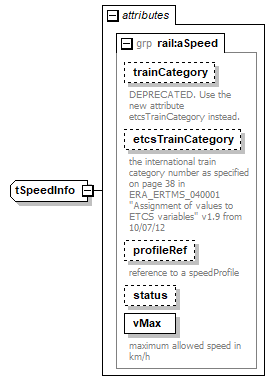 |
||||||||||||||||||||||||||||||||||||||||||||
| namespace | https://www.railml.org/schemas/2018 | ||||||||||||||||||||||||||||||||||||||||||||
| used by |
|
||||||||||||||||||||||||||||||||||||||||||||
| attributes |
|
||||||||||||||||||||||||||||||||||||||||||||
| source | <xs:complexType name="tSpeedInfo"> <xs:attributeGroup ref="rail:aSpeed"/> </xs:complexType> |
complexType tSpeedProfile
| diagram |  |
||||||||||||||||||||||||||||||||||||||||||||||||||||||||||||||||||||||||||||||||||||||||||||||||||||||||||||||||||||
| namespace | https://www.railml.org/schemas/2018 | ||||||||||||||||||||||||||||||||||||||||||||||||||||||||||||||||||||||||||||||||||||||||||||||||||||||||||||||||||||
| type | extension of rail:tElementWithIDAndName | ||||||||||||||||||||||||||||||||||||||||||||||||||||||||||||||||||||||||||||||||||||||||||||||||||||||||||||||||||||
| properties |
|
||||||||||||||||||||||||||||||||||||||||||||||||||||||||||||||||||||||||||||||||||||||||||||||||||||||||||||||||||||
| children | rail:additionalName rail:tilting rail:braking rail:path | ||||||||||||||||||||||||||||||||||||||||||||||||||||||||||||||||||||||||||||||||||||||||||||||||||||||||||||||||||||
| used by |
|
||||||||||||||||||||||||||||||||||||||||||||||||||||||||||||||||||||||||||||||||||||||||||||||||||||||||||||||||||||
| attributes |
|
||||||||||||||||||||||||||||||||||||||||||||||||||||||||||||||||||||||||||||||||||||||||||||||||||||||||||||||||||||
| source | <xs:complexType name="tSpeedProfile"> <xs:complexContent> <xs:extension base="rail:tElementWithIDAndName"> <xs:annotation> <xs:documentation>speed profile element that is referenced by speedChange elements</xs:documentation> </xs:annotation> <xs:sequence> <xs:element name="tilting" type="rail:tTilting" minOccurs="0"> <xs:annotation> <xs:documentation>the tilting element contains parameters describing the required train tilting characteristics</xs:documentation> <xs:documentation source="http://wiki.railml.org/index.php?title=IS:tilting"/> </xs:annotation> </xs:element> <xs:element name="braking" type="rail:tBraking" minOccurs="0"> <xs:annotation> <xs:documentation>the braking element contains parameters describing the required train braking configuration</xs:documentation> <xs:documentation source="http://wiki.railml.org/index.php?title=IS:braking"/> </xs:annotation> </xs:element> <xs:element name="path" type="rail:tPath" minOccurs="0"> <xs:annotation> <xs:documentation>the path element indicates a train run between two neighbouring OCPs</xs:documentation> <xs:documentation source="http://wiki.railml.org/index.php?title=IS:path"/> </xs:annotation> </xs:element> </xs:sequence> <xs:attribute name="influence" type="rail:tInfluence" use="required"> <xs:annotation> <xs:documentation>allows for overlaying speed profiles</xs:documentation> </xs:annotation> </xs:attribute> <xs:attribute name="maxAxleLoad" type="rail:tWeightTons"> <xs:annotation> <xs:documentation>maximum axle load of the train in tons</xs:documentation> </xs:annotation> </xs:attribute> <xs:attribute name="maxMeterLoad" type="rail:tMeterloadTonsPerMeter"> <xs:annotation> <xs:documentation>maximum meter load of the train in tons per meter</xs:documentation> </xs:annotation> </xs:attribute> <xs:attribute name="operatingPeriodRef" type="rail:tGenericRef"> <xs:annotation> <xs:documentation>reference to an operatingPeriod element from the timetable sub-schema</xs:documentation> </xs:annotation> </xs:attribute> <xs:attributeGroup ref="rail:aPeriodTimeSpan"> <xs:annotation> <xs:documentation>Start and end time of the validity of the speed profile.</xs:documentation> </xs:annotation> </xs:attributeGroup> <xs:attribute name="endDayOffset" type="xs:nonNegativeInteger"> <xs:annotation> <xs:documentation>The number of midnight overruns over which the speed profile is valid.</xs:documentation> </xs:annotation> </xs:attribute> <xs:attribute name="trainProtectionSystem" type="xs:string"> <xs:annotation> <xs:documentation>defining the train protection system</xs:documentation> <xs:documentation>use value from the separate code definition file 'TrainProtectionSystems.xml'/trainProtectionSystemsAtTrack</xs:documentation> </xs:annotation> </xs:attribute> <xs:attribute name="verbalConstraint" type="xs:string"> <xs:annotation> <xs:documentation>defining additional verbal constraints like certain train types</xs:documentation> </xs:annotation> </xs:attribute> </xs:extension> </xs:complexContent> </xs:complexType> |
attribute tSpeedProfile/@influence
| type | rail:tInfluence | ||
| properties |
|
||
| annotation |
|
||
| source | <xs:attribute name="influence" type="rail:tInfluence" use="required"> <xs:annotation> <xs:documentation>allows for overlaying speed profiles</xs:documentation> </xs:annotation> </xs:attribute> |
attribute tSpeedProfile/@maxAxleLoad
| type | rail:tWeightTons | ||||||
| facets |
|
||||||
| annotation |
|
||||||
| source | <xs:attribute name="maxAxleLoad" type="rail:tWeightTons"> <xs:annotation> <xs:documentation>maximum axle load of the train in tons</xs:documentation> </xs:annotation> </xs:attribute> |
attribute tSpeedProfile/@maxMeterLoad
| type | rail:tMeterloadTonsPerMeter | ||||||
| facets |
|
||||||
| annotation |
|
||||||
| source | <xs:attribute name="maxMeterLoad" type="rail:tMeterloadTonsPerMeter"> <xs:annotation> <xs:documentation>maximum meter load of the train in tons per meter</xs:documentation> </xs:annotation> </xs:attribute> |
attribute tSpeedProfile/@operatingPeriodRef
| type | rail:tGenericRef | ||
| annotation |
|
||
| source | <xs:attribute name="operatingPeriodRef" type="rail:tGenericRef"> <xs:annotation> <xs:documentation>reference to an operatingPeriod element from the timetable sub-schema</xs:documentation> </xs:annotation> </xs:attribute> |
attribute tSpeedProfile/@endDayOffset
| type | xs:nonNegativeInteger | ||
| annotation |
|
||
| source | <xs:attribute name="endDayOffset" type="xs:nonNegativeInteger"> <xs:annotation> <xs:documentation>The number of midnight overruns over which the speed profile is valid.</xs:documentation> </xs:annotation> </xs:attribute> |
attribute tSpeedProfile/@trainProtectionSystem
| type | xs:string | ||||
| annotation |
|
||||
| source | <xs:attribute name="trainProtectionSystem" type="xs:string"> <xs:annotation> <xs:documentation>defining the train protection system</xs:documentation> <xs:documentation>use value from the separate code definition file 'TrainProtectionSystems.xml'/trainProtectionSystemsAtTrack</xs:documentation> </xs:annotation> </xs:attribute> |
attribute tSpeedProfile/@verbalConstraint
| type | xs:string | ||
| annotation |
|
||
| source | <xs:attribute name="verbalConstraint" type="xs:string"> <xs:annotation> <xs:documentation>defining additional verbal constraints like certain train types</xs:documentation> </xs:annotation> </xs:attribute> |
element tSpeedProfile/tilting
| diagram | 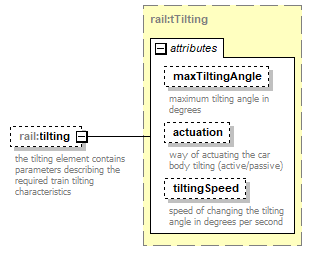 |
||||||||||||||||||||||||||||||
| namespace | https://www.railml.org/schemas/2018 | ||||||||||||||||||||||||||||||
| type | rail:tTilting | ||||||||||||||||||||||||||||||
| properties |
|
||||||||||||||||||||||||||||||
| attributes |
|
||||||||||||||||||||||||||||||
| annotation |
|
||||||||||||||||||||||||||||||
| source | <xs:element name="tilting" type="rail:tTilting" minOccurs="0"> <xs:annotation> <xs:documentation>the tilting element contains parameters describing the required train tilting characteristics</xs:documentation> <xs:documentation source="http://wiki.railml.org/index.php?title=IS:tilting"/> </xs:annotation> </xs:element> |
element tSpeedProfile/braking
| diagram | 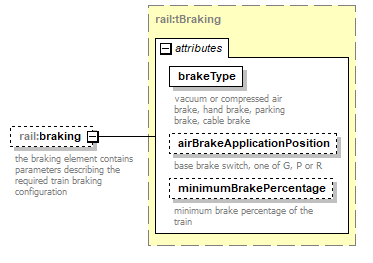 |
||||||||||||||||||||||||||||||
| namespace | https://www.railml.org/schemas/2018 | ||||||||||||||||||||||||||||||
| type | rail:tBraking | ||||||||||||||||||||||||||||||
| properties |
|
||||||||||||||||||||||||||||||
| attributes |
|
||||||||||||||||||||||||||||||
| annotation |
|
||||||||||||||||||||||||||||||
| source | <xs:element name="braking" type="rail:tBraking" minOccurs="0"> <xs:annotation> <xs:documentation>the braking element contains parameters describing the required train braking configuration</xs:documentation> <xs:documentation source="http://wiki.railml.org/index.php?title=IS:braking"/> </xs:annotation> </xs:element> |
element tSpeedProfile/path
| diagram |  |
||||||
| namespace | https://www.railml.org/schemas/2018 | ||||||
| type | rail:tPath | ||||||
| properties |
|
||||||
| children | rail:ocpRef | ||||||
| annotation |
|
||||||
| source | <xs:element name="path" type="rail:tPath" minOccurs="0"> <xs:annotation> <xs:documentation>the path element indicates a train run between two neighbouring OCPs</xs:documentation> <xs:documentation source="http://wiki.railml.org/index.php?title=IS:path"/> </xs:annotation> </xs:element> |
complexType tState
| diagram | 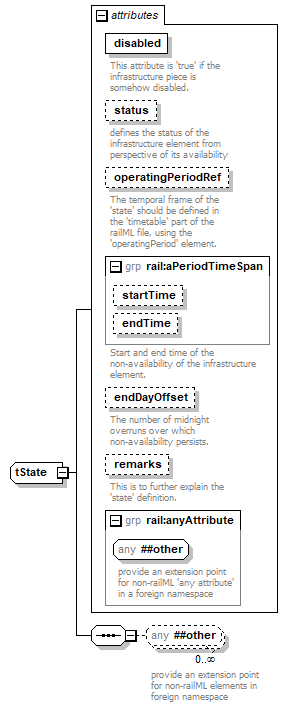 |
||||||||||||||||||||||||||||||||||||||||||||||||||||||||||
| namespace | https://www.railml.org/schemas/2018 | ||||||||||||||||||||||||||||||||||||||||||||||||||||||||||
| used by |
|
||||||||||||||||||||||||||||||||||||||||||||||||||||||||||
| attributes |
|
||||||||||||||||||||||||||||||||||||||||||||||||||||||||||
| source | <xs:complexType name="tState"> <xs:sequence> <xs:any namespace="##other" processContents="strict" minOccurs="0" maxOccurs="unbounded"> <xs:annotation> <xs:documentation>provide an extension point for non-railML elements in foreign namespace</xs:documentation> </xs:annotation> </xs:any> </xs:sequence> <xs:attribute name="disabled" type="xs:boolean" use="required"> <xs:annotation> <xs:documentation>This attribute is 'true' if the infrastructure piece is somehow disabled.</xs:documentation> </xs:annotation> </xs:attribute> <xs:attribute name="status" type="rail:tInfrastructureStatus"> <xs:annotation> <xs:documentation>defines the status of the infrastructure element from perspective of its availability</xs:documentation> </xs:annotation> </xs:attribute> <xs:attribute name="operatingPeriodRef" type="rail:tGenericRef"> <xs:annotation> <xs:documentation>The temporal frame of the 'state' should be defined in the 'timetable' part of the railML file, using the 'operatingPeriod' element.</xs:documentation> </xs:annotation> </xs:attribute> <xs:attributeGroup ref="rail:aPeriodTimeSpan"> <xs:annotation> <xs:documentation>Start and end time of the non-availability of the infrastructure element.</xs:documentation> </xs:annotation> </xs:attributeGroup> <xs:attribute name="endDayOffset" type="xs:nonNegativeInteger"> <xs:annotation> <xs:documentation>The number of midnight overruns over which non-availability persists.</xs:documentation> </xs:annotation> </xs:attribute> <xs:attribute name="remarks" type="rail:tElementDescription"> <xs:annotation> <xs:documentation>This is to further explain the 'state' definition.</xs:documentation> </xs:annotation> </xs:attribute> <xs:attributeGroup ref="rail:anyAttribute"/> </xs:complexType> |
attribute tState/@disabled
| type | xs:boolean | ||
| properties |
|
||
| annotation |
|
||
| source | <xs:attribute name="disabled" type="xs:boolean" use="required"> <xs:annotation> <xs:documentation>This attribute is 'true' if the infrastructure piece is somehow disabled.</xs:documentation> </xs:annotation> </xs:attribute> |
attribute tState/@status
| type | rail:tInfrastructureStatus | ||
| annotation |
|
||
| source | <xs:attribute name="status" type="rail:tInfrastructureStatus"> <xs:annotation> <xs:documentation>defines the status of the infrastructure element from perspective of its availability</xs:documentation> </xs:annotation> </xs:attribute> |
attribute tState/@operatingPeriodRef
| type | rail:tGenericRef | ||
| annotation |
|
||
| source | <xs:attribute name="operatingPeriodRef" type="rail:tGenericRef"> <xs:annotation> <xs:documentation>The temporal frame of the 'state' should be defined in the 'timetable' part of the railML file, using the 'operatingPeriod' element.</xs:documentation> </xs:annotation> </xs:attribute> |
attribute tState/@endDayOffset
| type | xs:nonNegativeInteger | ||
| annotation |
|
||
| source | <xs:attribute name="endDayOffset" type="xs:nonNegativeInteger"> <xs:annotation> <xs:documentation>The number of midnight overruns over which non-availability persists.</xs:documentation> </xs:annotation> </xs:attribute> |
attribute tState/@remarks
| type | rail:tElementDescription | ||
| annotation |
|
||
| source | <xs:attribute name="remarks" type="rail:tElementDescription"> <xs:annotation> <xs:documentation>This is to further explain the 'state' definition.</xs:documentation> </xs:annotation> </xs:attribute> |
complexType tStates
| diagram |  |
||
| namespace | https://www.railml.org/schemas/2018 | ||
| children | rail:state | ||
| used by |
|
||
| source | <xs:complexType name="tStates"> <xs:sequence> <xs:element name="state" type="rail:tState" maxOccurs="unbounded"> <xs:annotation> <xs:documentation>This is to define disabled/enabled infrastructure pieces with a given time frame.</xs:documentation> <xs:documentation source="https://wiki.railml.org/index.php?title=IS:state"/> </xs:annotation> </xs:element> </xs:sequence> </xs:complexType> |
element tStates/state
| diagram | 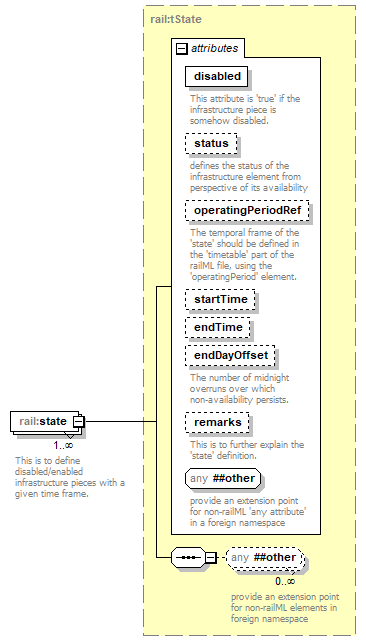 |
||||||||||||||||||||||||||||||||||||||||||||||||||||||||||
| namespace | https://www.railml.org/schemas/2018 | ||||||||||||||||||||||||||||||||||||||||||||||||||||||||||
| type | rail:tState | ||||||||||||||||||||||||||||||||||||||||||||||||||||||||||
| properties |
|
||||||||||||||||||||||||||||||||||||||||||||||||||||||||||
| attributes |
|
||||||||||||||||||||||||||||||||||||||||||||||||||||||||||
| annotation |
|
||||||||||||||||||||||||||||||||||||||||||||||||||||||||||
| source | <xs:element name="state" type="rail:tState" maxOccurs="unbounded"> <xs:annotation> <xs:documentation>This is to define disabled/enabled infrastructure pieces with a given time frame.</xs:documentation> <xs:documentation source="https://wiki.railml.org/index.php?title=IS:state"/> </xs:annotation> </xs:element> |
complexType tStatesWithLength
| diagram | 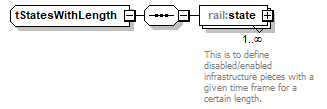 |
||
| namespace | https://www.railml.org/schemas/2018 | ||
| children | rail:state | ||
| used by |
|
||
| source | <xs:complexType name="tStatesWithLength"> <xs:sequence> <xs:element name="state" type="rail:tStateWithLength" maxOccurs="unbounded"> <xs:annotation> <xs:documentation>This is to define disabled/enabled infrastructure pieces with a given time frame for a certain length.</xs:documentation> <xs:documentation source="http://wiki.railml.org/index.php?title=IS:state_tunnel"/> <xs:documentation source="http://wiki.railml.org/index.php?title=IS:state_brigde"/> <xs:documentation source="http://wiki.railml.org/index.php?title=IS:state_platformEdge"/> <xs:documentation source="http://wiki.railml.org/index.php?title=IS:state_serviceSection"/> <xs:documentation source="http://wiki.railml.org/index.php?title=IS:state_track"/> </xs:annotation> </xs:element> </xs:sequence> </xs:complexType> |
element tStatesWithLength/state
| diagram | 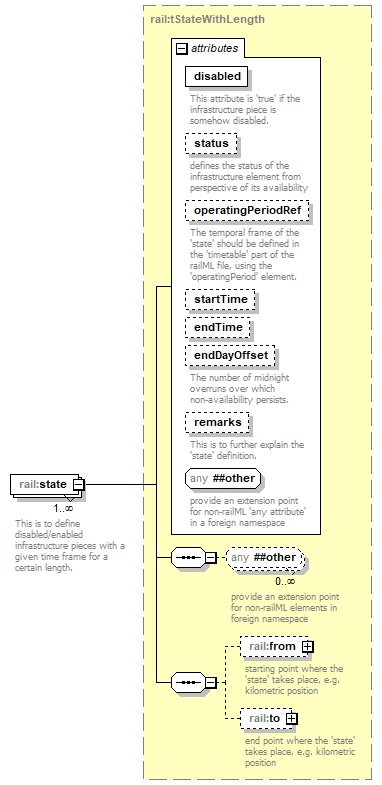 |
||||||||||||||||||||||||||||||||||||||||||||||||||||||||||
| namespace | https://www.railml.org/schemas/2018 | ||||||||||||||||||||||||||||||||||||||||||||||||||||||||||
| type | rail:tStateWithLength | ||||||||||||||||||||||||||||||||||||||||||||||||||||||||||
| properties |
|
||||||||||||||||||||||||||||||||||||||||||||||||||||||||||
| children | rail:from rail:to | ||||||||||||||||||||||||||||||||||||||||||||||||||||||||||
| attributes |
|
||||||||||||||||||||||||||||||||||||||||||||||||||||||||||
| annotation |
|
||||||||||||||||||||||||||||||||||||||||||||||||||||||||||
| source | <xs:element name="state" type="rail:tStateWithLength" maxOccurs="unbounded"> <xs:annotation> <xs:documentation>This is to define disabled/enabled infrastructure pieces with a given time frame for a certain length.</xs:documentation> <xs:documentation source="http://wiki.railml.org/index.php?title=IS:state_tunnel"/> <xs:documentation source="http://wiki.railml.org/index.php?title=IS:state_brigde"/> <xs:documentation source="http://wiki.railml.org/index.php?title=IS:state_platformEdge"/> <xs:documentation source="http://wiki.railml.org/index.php?title=IS:state_serviceSection"/> <xs:documentation source="http://wiki.railml.org/index.php?title=IS:state_track"/> </xs:annotation> </xs:element> |
complexType tStateWithLength
| diagram | 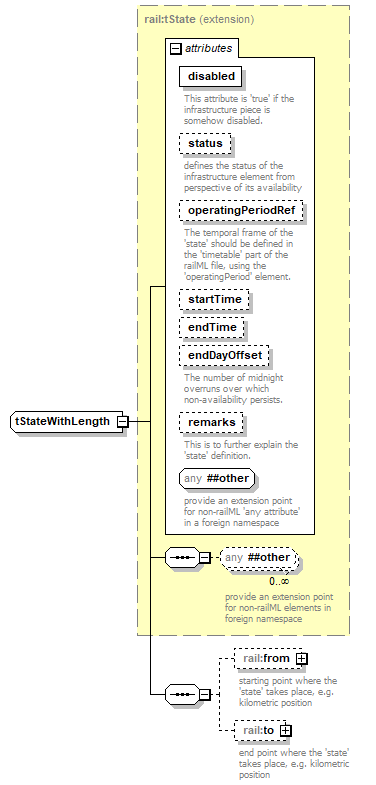 |
||||||||||||||||||||||||||||||||||||||||||||||||||||||||||
| namespace | https://www.railml.org/schemas/2018 | ||||||||||||||||||||||||||||||||||||||||||||||||||||||||||
| type | extension of rail:tState | ||||||||||||||||||||||||||||||||||||||||||||||||||||||||||
| properties |
|
||||||||||||||||||||||||||||||||||||||||||||||||||||||||||
| children | rail:from rail:to | ||||||||||||||||||||||||||||||||||||||||||||||||||||||||||
| used by |
|
||||||||||||||||||||||||||||||||||||||||||||||||||||||||||
| attributes |
|
||||||||||||||||||||||||||||||||||||||||||||||||||||||||||
| source | <xs:complexType name="tStateWithLength"> <xs:complexContent> <xs:extension base="rail:tState"> <xs:sequence> <xs:element name="from" type="rail:tLocation" minOccurs="0"> <xs:annotation> <xs:documentation>starting point where the 'state' takes place, e.g. kilometric position</xs:documentation> <xs:documentation source="http://wiki.railml.org/index.php?title=IS:from"/> </xs:annotation> </xs:element> <xs:element name="to" type="rail:tLocation" minOccurs="0"> <xs:annotation> <xs:documentation>end point where the 'state' takes place, e.g. kilometric position</xs:documentation> <xs:documentation source="http://wiki.railml.org/index.php?title=IS:to"/> </xs:annotation> </xs:element> </xs:sequence> </xs:extension> </xs:complexContent> </xs:complexType> |
element tStateWithLength/from
| diagram | 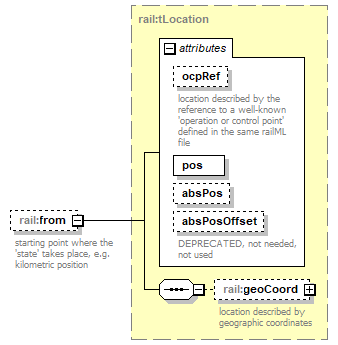 |
||||||||||||||||||||||||||||||||||
| namespace | https://www.railml.org/schemas/2018 | ||||||||||||||||||||||||||||||||||
| type | rail:tLocation | ||||||||||||||||||||||||||||||||||
| properties |
|
||||||||||||||||||||||||||||||||||
| children | rail:geoCoord | ||||||||||||||||||||||||||||||||||
| attributes |
|
||||||||||||||||||||||||||||||||||
| annotation |
|
||||||||||||||||||||||||||||||||||
| source | <xs:element name="from" type="rail:tLocation" minOccurs="0"> <xs:annotation> <xs:documentation>starting point where the 'state' takes place, e.g. kilometric position</xs:documentation> <xs:documentation source="http://wiki.railml.org/index.php?title=IS:from"/> </xs:annotation> </xs:element> |
element tStateWithLength/to
| diagram | 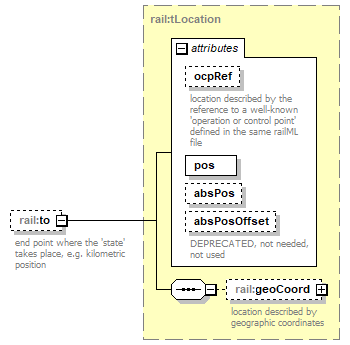 |
||||||||||||||||||||||||||||||||||
| namespace | https://www.railml.org/schemas/2018 | ||||||||||||||||||||||||||||||||||
| type | rail:tLocation | ||||||||||||||||||||||||||||||||||
| properties |
|
||||||||||||||||||||||||||||||||||
| children | rail:geoCoord | ||||||||||||||||||||||||||||||||||
| attributes |
|
||||||||||||||||||||||||||||||||||
| annotation |
|
||||||||||||||||||||||||||||||||||
| source | <xs:element name="to" type="rail:tLocation" minOccurs="0"> <xs:annotation> <xs:documentation>end point where the 'state' takes place, e.g. kilometric position</xs:documentation> <xs:documentation source="http://wiki.railml.org/index.php?title=IS:to"/> </xs:annotation> </xs:element> |
complexType tStopPost
| diagram |  |
||||||||||||||||||||||||||||||||||||||||||||||||||||||||||||||||||||||||||||||||||||||||||||||||||||||||||||||||||||||||||||||||||||||||||||||||||
| namespace | https://www.railml.org/schemas/2018 | ||||||||||||||||||||||||||||||||||||||||||||||||||||||||||||||||||||||||||||||||||||||||||||||||||||||||||||||||||||||||||||||||||||||||||||||||||
| type | extension of rail:tRuleCodeElement | ||||||||||||||||||||||||||||||||||||||||||||||||||||||||||||||||||||||||||||||||||||||||||||||||||||||||||||||||||||||||||||||||||||||||||||||||||
| properties |
|
||||||||||||||||||||||||||||||||||||||||||||||||||||||||||||||||||||||||||||||||||||||||||||||||||||||||||||||||||||||||||||||||||||||||||||||||||
| children | rail:additionalName rail:geoCoord rail:states rail:validForMovements rail:signalRef | ||||||||||||||||||||||||||||||||||||||||||||||||||||||||||||||||||||||||||||||||||||||||||||||||||||||||||||||||||||||||||||||||||||||||||||||||||
| used by |
|
||||||||||||||||||||||||||||||||||||||||||||||||||||||||||||||||||||||||||||||||||||||||||||||||||||||||||||||||||||||||||||||||||||||||||||||||||
| attributes |
|
||||||||||||||||||||||||||||||||||||||||||||||||||||||||||||||||||||||||||||||||||||||||||||||||||||||||||||||||||||||||||||||||||||||||||||||||||
| source | <xs:complexType name="tStopPost"> <xs:complexContent> <xs:extension base="rail:tRuleCodeElement"> <xs:sequence> <xs:element name="validForMovements" type="rail:tValidForMovements" minOccurs="0" maxOccurs="unbounded"> <xs:annotation> <xs:documentation>specification of the train types for which the stop post is relevant</xs:documentation> <xs:documentation source="http://wiki.railml.org/index.php?title=IS:validForMovements"/> </xs:annotation> </xs:element> <xs:element name="signalRef" type="rail:tElementWithReference" minOccurs="0" maxOccurs="unbounded"> <xs:annotation> <xs:documentation>reference to a (main) signal that is valid for a train waiting at the stop post</xs:documentation> <xs:documentation source="http://wiki.railml.org/index.php?title=IS:signalRef_stopPost"/> </xs:annotation> </xs:element> </xs:sequence> <xs:attributeGroup ref="rail:aStopPost"/> <xs:attributeGroup ref="rail:anyAttribute"> <xs:annotation> <xs:documentation>provide an extension point for non-railML attributes in foreign namespace</xs:documentation> </xs:annotation> </xs:attributeGroup> </xs:extension> </xs:complexContent> </xs:complexType> |
element tStopPost/validForMovements
| diagram | 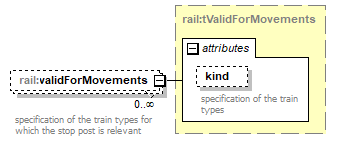 |
||||||||||||||
| namespace | https://www.railml.org/schemas/2018 | ||||||||||||||
| type | rail:tValidForMovements | ||||||||||||||
| properties |
|
||||||||||||||
| attributes |
|
||||||||||||||
| annotation |
|
||||||||||||||
| source | <xs:element name="validForMovements" type="rail:tValidForMovements" minOccurs="0" maxOccurs="unbounded"> <xs:annotation> <xs:documentation>specification of the train types for which the stop post is relevant</xs:documentation> <xs:documentation source="http://wiki.railml.org/index.php?title=IS:validForMovements"/> </xs:annotation> </xs:element> |
element tStopPost/signalRef
| diagram | 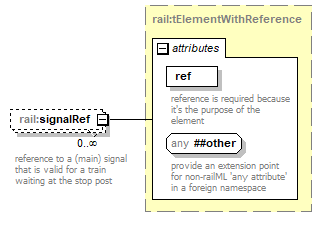 |
||||||||||||||
| namespace | https://www.railml.org/schemas/2018 | ||||||||||||||
| type | rail:tElementWithReference | ||||||||||||||
| properties |
|
||||||||||||||
| attributes |
|
||||||||||||||
| annotation |
|
||||||||||||||
| source | <xs:element name="signalRef" type="rail:tElementWithReference" minOccurs="0" maxOccurs="unbounded"> <xs:annotation> <xs:documentation>reference to a (main) signal that is valid for a train waiting at the stop post</xs:documentation> <xs:documentation source="http://wiki.railml.org/index.php?title=IS:signalRef_stopPost"/> </xs:annotation> </xs:element> |
complexType tStrictOrientedElement
| diagram | 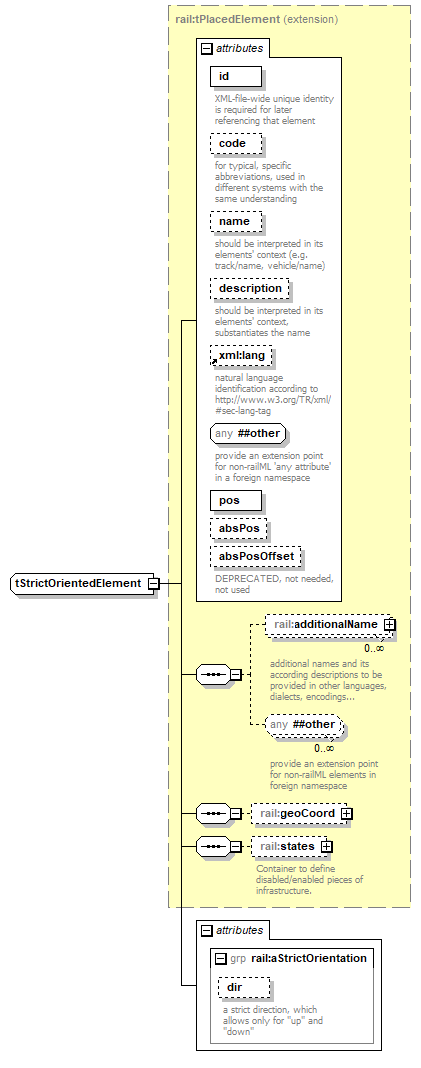 |
||||||||||||||||||||||||||||||||||||||||||||||||||||||||||||||||||||||||||
| namespace | https://www.railml.org/schemas/2018 | ||||||||||||||||||||||||||||||||||||||||||||||||||||||||||||||||||||||||||
| type | extension of rail:tPlacedElement | ||||||||||||||||||||||||||||||||||||||||||||||||||||||||||||||||||||||||||
| properties |
|
||||||||||||||||||||||||||||||||||||||||||||||||||||||||||||||||||||||||||
| children | rail:additionalName rail:geoCoord rail:states | ||||||||||||||||||||||||||||||||||||||||||||||||||||||||||||||||||||||||||
| used by | |||||||||||||||||||||||||||||||||||||||||||||||||||||||||||||||||||||||||||
| attributes |
|
||||||||||||||||||||||||||||||||||||||||||||||||||||||||||||||||||||||||||
| source | <xs:complexType name="tStrictOrientedElement"> <xs:complexContent> <xs:extension base="rail:tPlacedElement"> <xs:attributeGroup ref="rail:aStrictOrientation"/> </xs:extension> </xs:complexContent> </xs:complexType> |
complexType tStrictOrientedElementWithLength
| diagram | 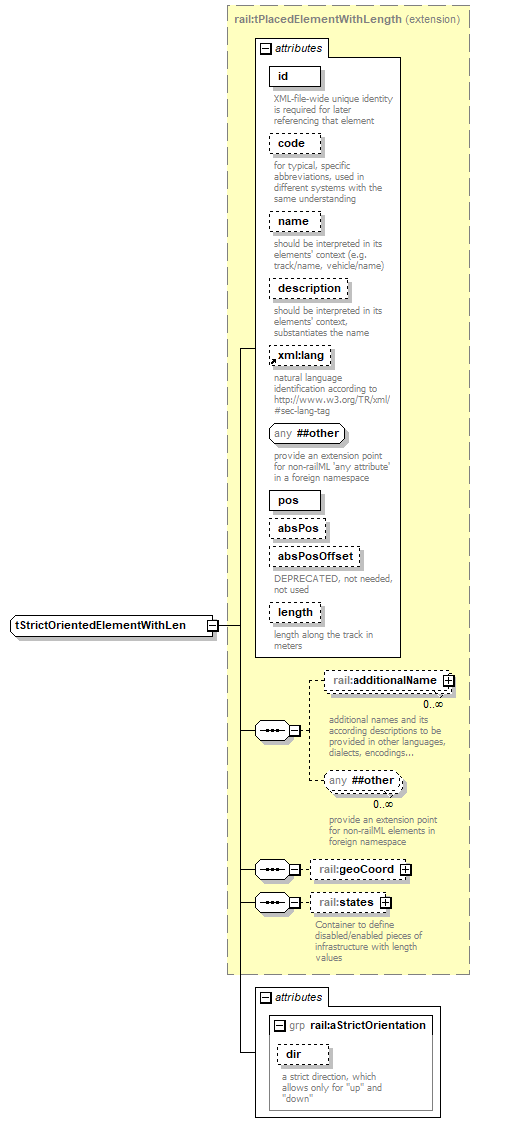 |
||||||||||||||||||||||||||||||||||||||||||||||||||||||||||||||||||||||||||||||||||
| namespace | https://www.railml.org/schemas/2018 | ||||||||||||||||||||||||||||||||||||||||||||||||||||||||||||||||||||||||||||||||||
| type | extension of rail:tPlacedElementWithLength | ||||||||||||||||||||||||||||||||||||||||||||||||||||||||||||||||||||||||||||||||||
| properties |
|
||||||||||||||||||||||||||||||||||||||||||||||||||||||||||||||||||||||||||||||||||
| children | rail:additionalName rail:geoCoord rail:states | ||||||||||||||||||||||||||||||||||||||||||||||||||||||||||||||||||||||||||||||||||
| used by |
|
||||||||||||||||||||||||||||||||||||||||||||||||||||||||||||||||||||||||||||||||||
| attributes |
|
||||||||||||||||||||||||||||||||||||||||||||||||||||||||||||||||||||||||||||||||||
| source | <xs:complexType name="tStrictOrientedElementWithLength"> <xs:complexContent> <xs:extension base="rail:tPlacedElementWithLength"> <xs:attributeGroup ref="rail:aStrictOrientation"/> </xs:extension> </xs:complexContent> </xs:complexType> |
complexType tSwitch
| diagram |  |
||||||||||||||||||||||||||||||||||||||||||||||||||||||||||||||||||||||||||||||||||||||||||||||||||||||||||||||||||||||
| namespace | https://www.railml.org/schemas/2018 | ||||||||||||||||||||||||||||||||||||||||||||||||||||||||||||||||||||||||||||||||||||||||||||||||||||||||||||||||||||||
| type | extension of rail:tCommonSwitchAndCrossingData | ||||||||||||||||||||||||||||||||||||||||||||||||||||||||||||||||||||||||||||||||||||||||||||||||||||||||||||||||||||||
| properties |
|
||||||||||||||||||||||||||||||||||||||||||||||||||||||||||||||||||||||||||||||||||||||||||||||||||||||||||||||||||||||
| children | rail:additionalName rail:geoCoord rail:states | ||||||||||||||||||||||||||||||||||||||||||||||||||||||||||||||||||||||||||||||||||||||||||||||||||||||||||||||||||||||
| used by |
|
||||||||||||||||||||||||||||||||||||||||||||||||||||||||||||||||||||||||||||||||||||||||||||||||||||||||||||||||||||||
| attributes |
|
||||||||||||||||||||||||||||||||||||||||||||||||||||||||||||||||||||||||||||||||||||||||||||||||||||||||||||||||||||||
| source | <xs:complexType name="tSwitch"> <xs:complexContent> <xs:extension base="rail:tCommonSwitchAndCrossingData"> <xs:attribute name="type" type="rail:tSwitchType"/> </xs:extension> </xs:complexContent> </xs:complexType> |
attribute tSwitch/@type
| type | rail:tSwitchType |
| source | <xs:attribute name="type" type="rail:tSwitchType"/> |
complexType tSwitchConnectionData
| diagram | 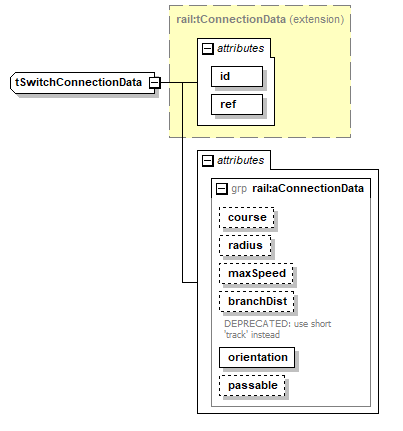 |
||||||||||||||||||||||||||||||||||||||||||||||||||||||||
| namespace | https://www.railml.org/schemas/2018 | ||||||||||||||||||||||||||||||||||||||||||||||||||||||||
| type | extension of rail:tConnectionData | ||||||||||||||||||||||||||||||||||||||||||||||||||||||||
| properties |
|
||||||||||||||||||||||||||||||||||||||||||||||||||||||||
| used by |
|
||||||||||||||||||||||||||||||||||||||||||||||||||||||||
| attributes |
|
||||||||||||||||||||||||||||||||||||||||||||||||||||||||
| source | <xs:complexType name="tSwitchConnectionData"> <xs:complexContent> <xs:extension base="rail:tConnectionData"> <xs:attributeGroup ref="rail:aConnectionData"/> </xs:extension> </xs:complexContent> </xs:complexType> |
complexType tTrack
| diagram | 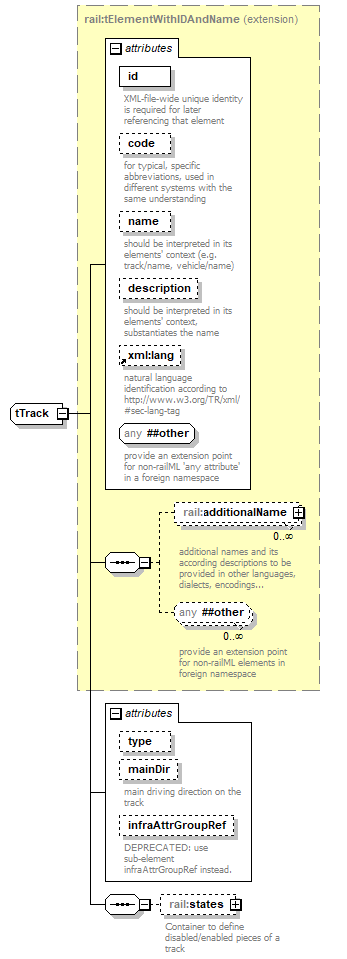 |
||||||||||||||||||||||||||||||||||||||||||||||||||||||||||||||||||||
| namespace | https://www.railml.org/schemas/2018 | ||||||||||||||||||||||||||||||||||||||||||||||||||||||||||||||||||||
| type | extension of rail:tElementWithIDAndName | ||||||||||||||||||||||||||||||||||||||||||||||||||||||||||||||||||||
| properties |
|
||||||||||||||||||||||||||||||||||||||||||||||||||||||||||||||||||||
| children | rail:additionalName rail:states | ||||||||||||||||||||||||||||||||||||||||||||||||||||||||||||||||||||
| used by |
|
||||||||||||||||||||||||||||||||||||||||||||||||||||||||||||||||||||
| attributes |
|
||||||||||||||||||||||||||||||||||||||||||||||||||||||||||||||||||||
| source | <xs:complexType name="tTrack"> <xs:complexContent> <xs:extension base="rail:tElementWithIDAndName"> <xs:sequence> <xs:element name="states" type="rail:tStatesWithLength" minOccurs="0"> <xs:annotation> <xs:documentation>Container to define disabled/enabled pieces of a track</xs:documentation> <xs:documentation source="http://wiki.railml.org/index.php?title=IS:states_track"/> </xs:annotation> </xs:element> </xs:sequence> <xs:attribute name="type" type="rail:tTrackType"/> <xs:attribute name="mainDir" type="rail:tExtendedDirection"> <xs:annotation> <xs:documentation>main driving direction on the track</xs:documentation> </xs:annotation> </xs:attribute> <xs:attribute name="infraAttrGroupRef" type="rail:tGenericRef"> <xs:annotation> <xs:documentation>DEPRECATED: use sub-element infraAttrGroupRef instead.</xs:documentation> </xs:annotation> </xs:attribute> </xs:extension> </xs:complexContent> </xs:complexType> |
attribute tTrack/@type
| type | rail:tTrackType |
| source | <xs:attribute name="type" type="rail:tTrackType"/> |
attribute tTrack/@mainDir
| type | rail:tExtendedDirection | |||||||||||||||
| facets |
|
|||||||||||||||
| annotation |
|
|||||||||||||||
| source | <xs:attribute name="mainDir" type="rail:tExtendedDirection"> <xs:annotation> <xs:documentation>main driving direction on the track</xs:documentation> </xs:annotation> </xs:attribute> |
attribute tTrack/@infraAttrGroupRef
| type | rail:tGenericRef | ||
| annotation |
|
||
| source | <xs:attribute name="infraAttrGroupRef" type="rail:tGenericRef"> <xs:annotation> <xs:documentation>DEPRECATED: use sub-element infraAttrGroupRef instead.</xs:documentation> </xs:annotation> </xs:attribute> |
element tTrack/states
| diagram | 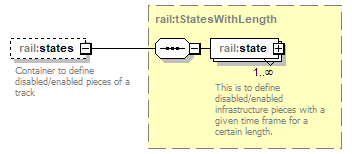 |
||||||
| namespace | https://www.railml.org/schemas/2018 | ||||||
| type | rail:tStatesWithLength | ||||||
| properties |
|
||||||
| children | rail:state | ||||||
| annotation |
|
||||||
| source | <xs:element name="states" type="rail:tStatesWithLength" minOccurs="0"> <xs:annotation> <xs:documentation>Container to define disabled/enabled pieces of a track</xs:documentation> <xs:documentation source="http://wiki.railml.org/index.php?title=IS:states_track"/> </xs:annotation> </xs:element> |
complexType tTrackCircuitBorder
| diagram | 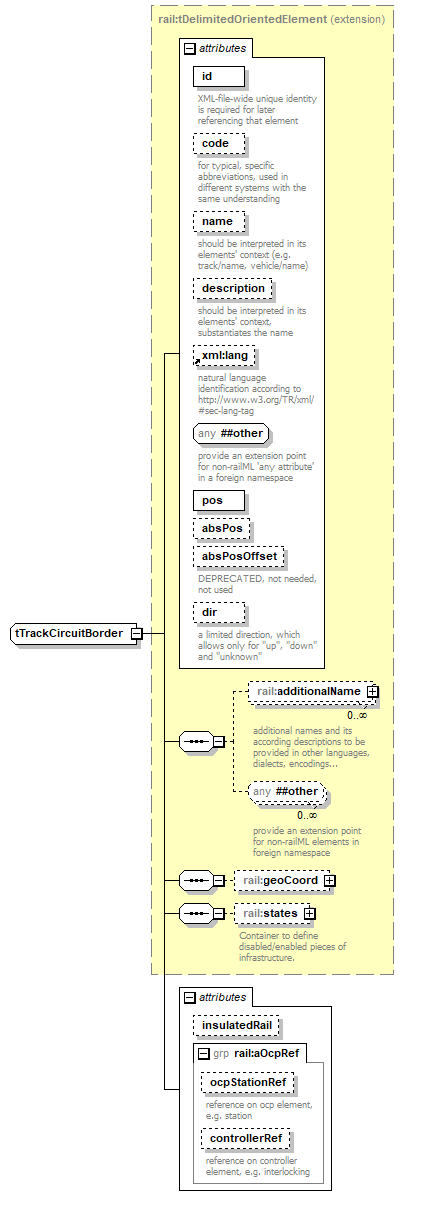 |
||||||||||||||||||||||||||||||||||||||||||||||||||||||||||||||||||||||||||||||||||||||||||||||||
| namespace | https://www.railml.org/schemas/2018 | ||||||||||||||||||||||||||||||||||||||||||||||||||||||||||||||||||||||||||||||||||||||||||||||||
| type | extension of rail:tDelimitedOrientedElement | ||||||||||||||||||||||||||||||||||||||||||||||||||||||||||||||||||||||||||||||||||||||||||||||||
| properties |
|
||||||||||||||||||||||||||||||||||||||||||||||||||||||||||||||||||||||||||||||||||||||||||||||||
| children | rail:additionalName rail:geoCoord rail:states | ||||||||||||||||||||||||||||||||||||||||||||||||||||||||||||||||||||||||||||||||||||||||||||||||
| used by |
|
||||||||||||||||||||||||||||||||||||||||||||||||||||||||||||||||||||||||||||||||||||||||||||||||
| attributes |
|
||||||||||||||||||||||||||||||||||||||||||||||||||||||||||||||||||||||||||||||||||||||||||||||||
| source | <xs:complexType name="tTrackCircuitBorder"> <xs:complexContent> <xs:extension base="rail:tDelimitedOrientedElement"> <xs:attribute name="insulatedRail" type="rail:tInsulatedRailSide"/> <xs:attributeGroup ref="rail:aOcpRef"/> </xs:extension> </xs:complexContent> </xs:complexType> |
attribute tTrackCircuitBorder/@insulatedRail
| type | rail:tInsulatedRailSide | |||||||||||||||
| facets |
|
|||||||||||||||
| source | <xs:attribute name="insulatedRail" type="rail:tInsulatedRailSide"/> |
complexType tTrackCondition
| diagram | 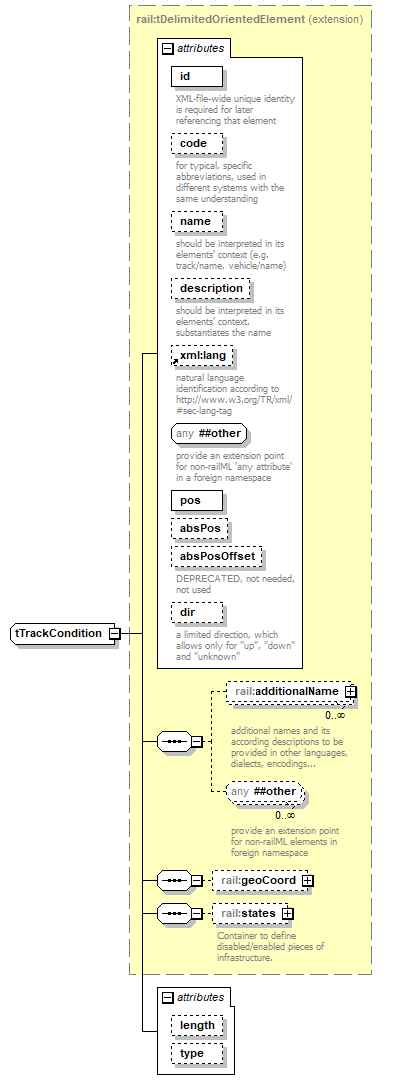 |
||||||||||||||||||||||||||||||||||||||||||||||||||||||||||||||||||||||||||||||||||||||
| namespace | https://www.railml.org/schemas/2018 | ||||||||||||||||||||||||||||||||||||||||||||||||||||||||||||||||||||||||||||||||||||||
| type | extension of rail:tDelimitedOrientedElement | ||||||||||||||||||||||||||||||||||||||||||||||||||||||||||||||||||||||||||||||||||||||
| properties |
|
||||||||||||||||||||||||||||||||||||||||||||||||||||||||||||||||||||||||||||||||||||||
| children | rail:additionalName rail:geoCoord rail:states | ||||||||||||||||||||||||||||||||||||||||||||||||||||||||||||||||||||||||||||||||||||||
| used by |
|
||||||||||||||||||||||||||||||||||||||||||||||||||||||||||||||||||||||||||||||||||||||
| attributes |
|
||||||||||||||||||||||||||||||||||||||||||||||||||||||||||||||||||||||||||||||||||||||
| source | <xs:complexType name="tTrackCondition"> <xs:complexContent> <xs:extension base="rail:tDelimitedOrientedElement"> <xs:attribute name="length" type="rail:tLengthM"/> <xs:attribute name="type" type="rail:tTrackConditionType"/> </xs:extension> </xs:complexContent> </xs:complexType> |
attribute tTrackCondition/@length
| type | rail:tLengthM | ||||||
| facets |
|
||||||
| source | <xs:attribute name="length" type="rail:tLengthM"/> |
attribute tTrackCondition/@type
| type | rail:tTrackConditionType |
| source | <xs:attribute name="type" type="rail:tTrackConditionType"/> |
complexType tTrackNode
| diagram | 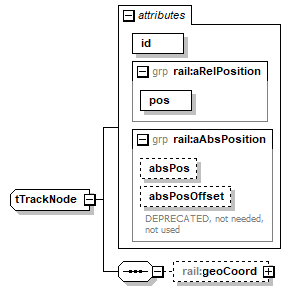 |
||||||||||||||||||||||||||||||||
| namespace | https://www.railml.org/schemas/2018 | ||||||||||||||||||||||||||||||||
| children | rail:geoCoord | ||||||||||||||||||||||||||||||||
| used by |
|
||||||||||||||||||||||||||||||||
| attributes |
|
||||||||||||||||||||||||||||||||
| source | <xs:complexType name="tTrackNode"> <xs:sequence> <xs:element name="geoCoord" type="rail:tGeoCoord" minOccurs="0"> <xs:annotation> <xs:documentation source="http://wiki.railml.org/index.php?title=IS:geoCoord_trackBegin"/> <xs:documentation source="http://wiki.railml.org/index.php?title=IS:geoCoord_trackEnd"/> </xs:annotation> </xs:element> </xs:sequence> <xs:attribute name="id" type="rail:tGenericID" use="required"/> <xs:attributeGroup ref="rail:aRelPosition"/> <xs:attributeGroup ref="rail:aAbsPosition"/> </xs:complexType> |
attribute tTrackNode/@id
| type | rail:tGenericID | ||
| properties |
|
||
| source | <xs:attribute name="id" type="rail:tGenericID" use="required"/> |
element tTrackNode/geoCoord
| diagram | 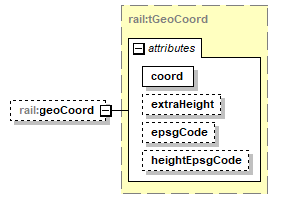 |
||||||||||||||||||||||||||||||
| namespace | https://www.railml.org/schemas/2018 | ||||||||||||||||||||||||||||||
| type | rail:tGeoCoord | ||||||||||||||||||||||||||||||
| properties |
|
||||||||||||||||||||||||||||||
| attributes |
|
||||||||||||||||||||||||||||||
| source | <xs:element name="geoCoord" type="rail:tGeoCoord" minOccurs="0"> <xs:annotation> <xs:documentation source="http://wiki.railml.org/index.php?title=IS:geoCoord_trackBegin"/> <xs:documentation source="http://wiki.railml.org/index.php?title=IS:geoCoord_trackEnd"/> </xs:annotation> </xs:element> |
complexType tTrackRefInGroup
| diagram | 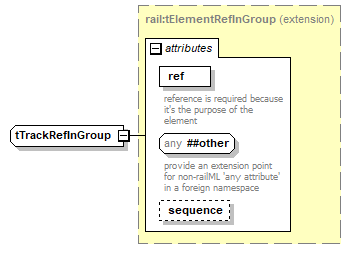 |
||||||||||||||||||||
| namespace | https://www.railml.org/schemas/2018 | ||||||||||||||||||||
| type | extension of rail:tElementRefInGroup | ||||||||||||||||||||
| properties |
|
||||||||||||||||||||
| used by |
|
||||||||||||||||||||
| attributes |
|
||||||||||||||||||||
| source | <xs:complexType name="tTrackRefInGroup"> <xs:complexContent> <xs:extension base="rail:tElementRefInGroup"/> <!-- Possible trackGroup-specific attributes to be added here later --> </xs:complexContent> </xs:complexType> |
complexType tTrainDetector
| diagram |  |
||||||||||||||||||||||||||||||||||||||||||||||||||||||||||||||||||||||||||||||||||||||||||||||||||||||||||||||||||||||||||||||
| namespace | https://www.railml.org/schemas/2018 | ||||||||||||||||||||||||||||||||||||||||||||||||||||||||||||||||||||||||||||||||||||||||||||||||||||||||||||||||||||||||||||||
| type | extension of rail:tDelimitedOrientedElement | ||||||||||||||||||||||||||||||||||||||||||||||||||||||||||||||||||||||||||||||||||||||||||||||||||||||||||||||||||||||||||||||
| properties |
|
||||||||||||||||||||||||||||||||||||||||||||||||||||||||||||||||||||||||||||||||||||||||||||||||||||||||||||||||||||||||||||||
| children | rail:additionalName rail:geoCoord rail:states | ||||||||||||||||||||||||||||||||||||||||||||||||||||||||||||||||||||||||||||||||||||||||||||||||||||||||||||||||||||||||||||||
| used by |
|
||||||||||||||||||||||||||||||||||||||||||||||||||||||||||||||||||||||||||||||||||||||||||||||||||||||||||||||||||||||||||||||
| attributes |
|
||||||||||||||||||||||||||||||||||||||||||||||||||||||||||||||||||||||||||||||||||||||||||||||||||||||||||||||||||||||||||||||
| source | <xs:complexType name="tTrainDetector"> <xs:complexContent> <xs:extension base="rail:tDelimitedOrientedElement"> <xs:attribute name="detectionObject" type="rail:tDetectionObject"/> <xs:attribute name="medium" type="rail:tDetectorMedium"/> <xs:attribute name="posInTrack" type="rail:tPosInTrack"/> <xs:attribute name="directionDetection" type="xs:boolean"/> <xs:attribute name="model" type="xs:string"/> <xs:attribute name="axleCounting" type="xs:boolean"/> <xs:attributeGroup ref="rail:aOcpRef"/> </xs:extension> </xs:complexContent> </xs:complexType> |
attribute tTrainDetector/@detectionObject
| type | rail:tDetectionObject |
| source | <xs:attribute name="detectionObject" type="rail:tDetectionObject"/> |
attribute tTrainDetector/@medium
| type | rail:tDetectorMedium |
| source | <xs:attribute name="medium" type="rail:tDetectorMedium"/> |
attribute tTrainDetector/@posInTrack
| type | rail:tPosInTrack | |||||||||||||||||||||||||||||||||
| facets |
|
|||||||||||||||||||||||||||||||||
| source | <xs:attribute name="posInTrack" type="rail:tPosInTrack"/> |
attribute tTrainDetector/@directionDetection
| type | xs:boolean |
| source | <xs:attribute name="directionDetection" type="xs:boolean"/> |
attribute tTrainDetector/@model
| type | xs:string |
| source | <xs:attribute name="model" type="xs:string"/> |
attribute tTrainDetector/@axleCounting
| type | xs:boolean |
| source | <xs:attribute name="axleCounting" type="xs:boolean"/> |
complexType tTrainProtection
| diagram | 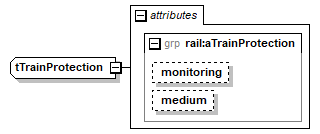 |
||||||||||||||||||
| namespace | https://www.railml.org/schemas/2018 | ||||||||||||||||||
| used by |
|
||||||||||||||||||
| attributes |
|
||||||||||||||||||
| source | <xs:complexType name="tTrainProtection"> <xs:attributeGroup ref="rail:aTrainProtection"/> </xs:complexType> |
complexType tTrainProtectionChange
| diagram | 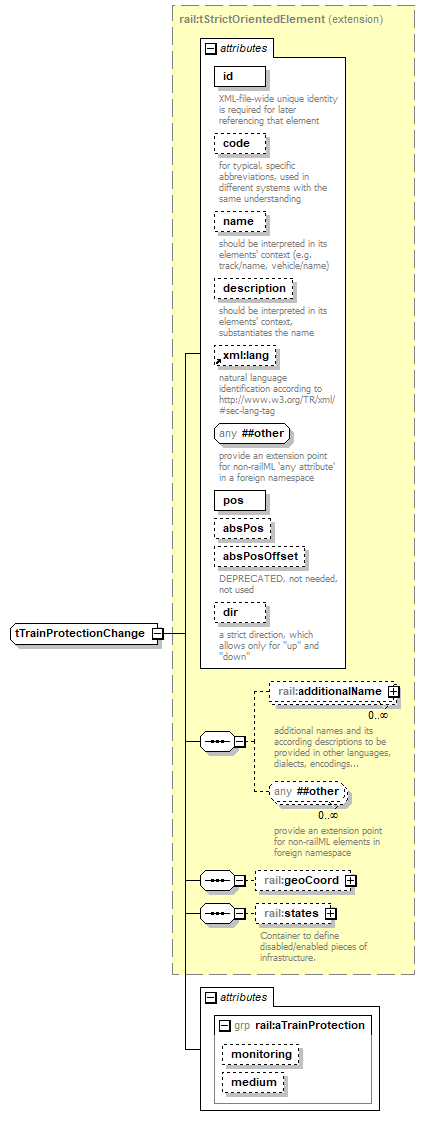 |
||||||||||||||||||||||||||||||||||||||||||||||||||||||||||||||||||||||||||||||||||||||
| namespace | https://www.railml.org/schemas/2018 | ||||||||||||||||||||||||||||||||||||||||||||||||||||||||||||||||||||||||||||||||||||||
| type | extension of rail:tStrictOrientedElement | ||||||||||||||||||||||||||||||||||||||||||||||||||||||||||||||||||||||||||||||||||||||
| properties |
|
||||||||||||||||||||||||||||||||||||||||||||||||||||||||||||||||||||||||||||||||||||||
| children | rail:additionalName rail:geoCoord rail:states | ||||||||||||||||||||||||||||||||||||||||||||||||||||||||||||||||||||||||||||||||||||||
| used by |
|
||||||||||||||||||||||||||||||||||||||||||||||||||||||||||||||||||||||||||||||||||||||
| attributes |
|
||||||||||||||||||||||||||||||||||||||||||||||||||||||||||||||||||||||||||||||||||||||
| source | <xs:complexType name="tTrainProtectionChange"> <xs:complexContent> <xs:extension base="rail:tStrictOrientedElement"> <xs:attributeGroup ref="rail:aTrainProtection"/> </xs:extension> </xs:complexContent> </xs:complexType> |
complexType tTrainProtectionElement
| diagram | 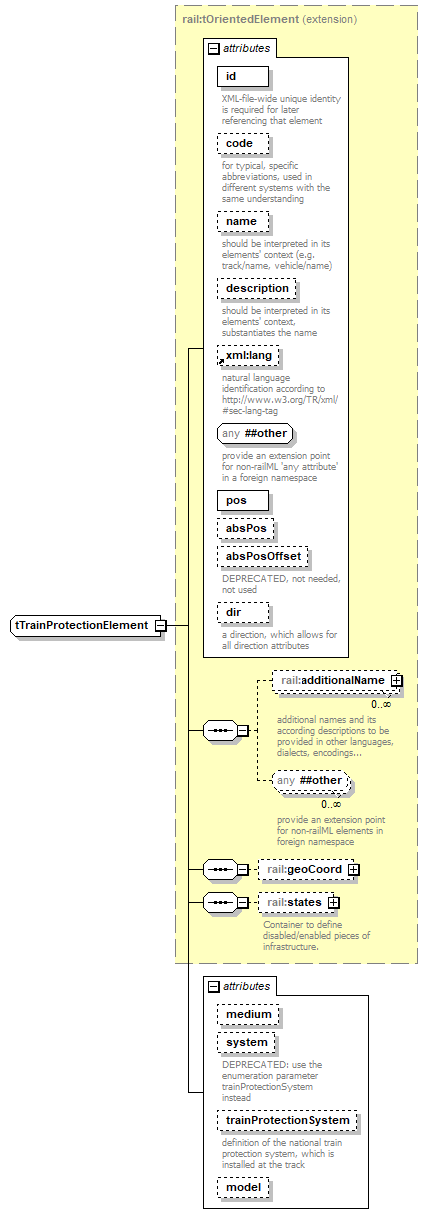 |
||||||||||||||||||||||||||||||||||||||||||||||||||||||||||||||||||||||||||||||||||||||||||||||||||||||||
| namespace | https://www.railml.org/schemas/2018 | ||||||||||||||||||||||||||||||||||||||||||||||||||||||||||||||||||||||||||||||||||||||||||||||||||||||||
| type | extension of rail:tOrientedElement | ||||||||||||||||||||||||||||||||||||||||||||||||||||||||||||||||||||||||||||||||||||||||||||||||||||||||
| properties |
|
||||||||||||||||||||||||||||||||||||||||||||||||||||||||||||||||||||||||||||||||||||||||||||||||||||||||
| children | rail:additionalName rail:geoCoord rail:states | ||||||||||||||||||||||||||||||||||||||||||||||||||||||||||||||||||||||||||||||||||||||||||||||||||||||||
| used by |
|
||||||||||||||||||||||||||||||||||||||||||||||||||||||||||||||||||||||||||||||||||||||||||||||||||||||||
| attributes |
|
||||||||||||||||||||||||||||||||||||||||||||||||||||||||||||||||||||||||||||||||||||||||||||||||||||||||
| source | <xs:complexType name="tTrainProtectionElement"> <xs:complexContent> <xs:extension base="rail:tOrientedElement"> <xs:attribute name="medium" type="rail:tTrainProtectionMedium"/> <xs:attribute name="system" type="xs:string"> <xs:annotation> <xs:documentation>DEPRECATED: use the enumeration parameter trainProtectionSystem instead</xs:documentation> </xs:annotation> </xs:attribute> <xs:attribute name="trainProtectionSystem" type="xs:string"> <xs:annotation> <xs:documentation>definition of the national train protection system, which is installed at the track</xs:documentation> <xs:documentation>use value from the separate code definition file 'TrainProtectionSystems.xml'/trainProtectionSystemsAtTrack</xs:documentation> </xs:annotation> </xs:attribute> <xs:attribute name="model" type="xs:string"/> </xs:extension> </xs:complexContent> </xs:complexType> |
attribute tTrainProtectionElement/@medium
| type | rail:tTrainProtectionMedium | ||||||||||||||||||||||||||||||
| facets |
|
||||||||||||||||||||||||||||||
| source | <xs:attribute name="medium" type="rail:tTrainProtectionMedium"/> |
attribute tTrainProtectionElement/@system
| type | xs:string | ||
| annotation |
|
||
| source | <xs:attribute name="system" type="xs:string"> <xs:annotation> <xs:documentation>DEPRECATED: use the enumeration parameter trainProtectionSystem instead</xs:documentation> </xs:annotation> </xs:attribute> |
attribute tTrainProtectionElement/@trainProtectionSystem
| type | xs:string | ||||
| annotation |
|
||||
| source | <xs:attribute name="trainProtectionSystem" type="xs:string"> <xs:annotation> <xs:documentation>definition of the national train protection system, which is installed at the track</xs:documentation> <xs:documentation>use value from the separate code definition file 'TrainProtectionSystems.xml'/trainProtectionSystemsAtTrack</xs:documentation> </xs:annotation> </xs:attribute> |
attribute tTrainProtectionElement/@model
| type | xs:string |
| source | <xs:attribute name="model" type="xs:string"/> |
complexType tTrainProtectionElementGroup
| diagram | 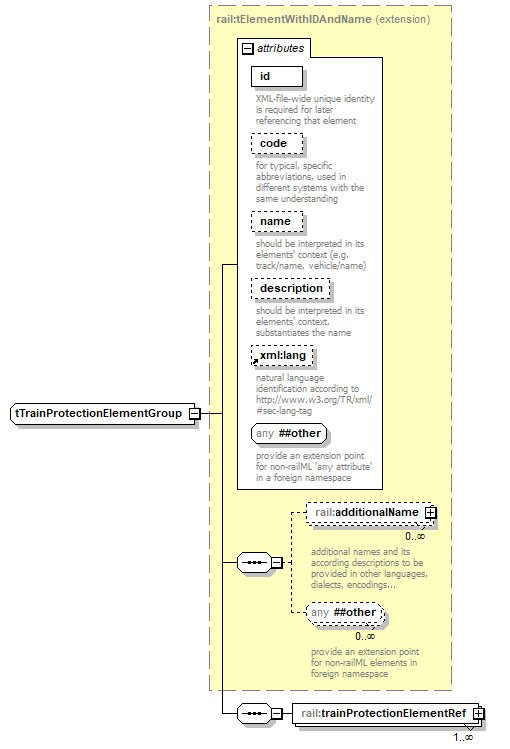 |
||||||||||||||||||||||||||||||||||||||||||||||
| namespace | https://www.railml.org/schemas/2018 | ||||||||||||||||||||||||||||||||||||||||||||||
| type | extension of rail:tElementWithIDAndName | ||||||||||||||||||||||||||||||||||||||||||||||
| properties |
|
||||||||||||||||||||||||||||||||||||||||||||||
| children | rail:additionalName rail:trainProtectionElementRef | ||||||||||||||||||||||||||||||||||||||||||||||
| used by |
|
||||||||||||||||||||||||||||||||||||||||||||||
| attributes |
|
||||||||||||||||||||||||||||||||||||||||||||||
| source | <xs:complexType name="tTrainProtectionElementGroup"> <xs:complexContent> <xs:extension base="rail:tElementWithIDAndName"> <xs:sequence> <xs:element name="trainProtectionElementRef" type="rail:tElementWithReference" maxOccurs="unbounded"> <xs:annotation> <xs:documentation source="http://wiki.railml.org/index.php?title=IS:trainProtectionElementRef"/> </xs:annotation> </xs:element> </xs:sequence> </xs:extension> </xs:complexContent> </xs:complexType> |
element tTrainProtectionElementGroup/trainProtectionElementRef
| diagram | 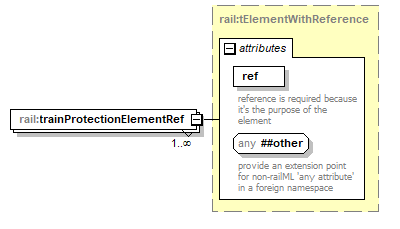 |
||||||||||||||
| namespace | https://www.railml.org/schemas/2018 | ||||||||||||||
| type | rail:tElementWithReference | ||||||||||||||
| properties |
|
||||||||||||||
| attributes |
|
||||||||||||||
| source | <xs:element name="trainProtectionElementRef" type="rail:tElementWithReference" maxOccurs="unbounded"> <xs:annotation> <xs:documentation source="http://wiki.railml.org/index.php?title=IS:trainProtectionElementRef"/> </xs:annotation> </xs:element> |
complexType tTrainRadioAttributes
| diagram | 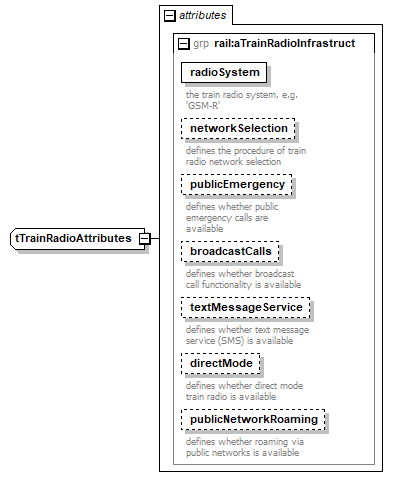 |
||||||||||||||||||||||||||||||||||||||||||||||||||||||||||||||
| namespace | https://www.railml.org/schemas/2018 | ||||||||||||||||||||||||||||||||||||||||||||||||||||||||||||||
| used by |
|
||||||||||||||||||||||||||||||||||||||||||||||||||||||||||||||
| attributes |
|
||||||||||||||||||||||||||||||||||||||||||||||||||||||||||||||
| source | <xs:complexType name="tTrainRadioAttributes"> <xs:attributeGroup ref="rail:aTrainRadioInfrastructure"/> </xs:complexType> |
complexType tTrainRadioChange
| diagram |  |
||||||||||||||||||||||||||||||||||||||||||||||||||||||||||||||||||||||||||||||||||||||||||||||||||||||||||||||||||||||||||||||||||
| namespace | https://www.railml.org/schemas/2018 | ||||||||||||||||||||||||||||||||||||||||||||||||||||||||||||||||||||||||||||||||||||||||||||||||||||||||||||||||||||||||||||||||||
| type | extension of rail:tOrientedElement | ||||||||||||||||||||||||||||||||||||||||||||||||||||||||||||||||||||||||||||||||||||||||||||||||||||||||||||||||||||||||||||||||||
| properties |
|
||||||||||||||||||||||||||||||||||||||||||||||||||||||||||||||||||||||||||||||||||||||||||||||||||||||||||||||||||||||||||||||||||
| children | rail:additionalName rail:geoCoord rail:states | ||||||||||||||||||||||||||||||||||||||||||||||||||||||||||||||||||||||||||||||||||||||||||||||||||||||||||||||||||||||||||||||||||
| used by |
|
||||||||||||||||||||||||||||||||||||||||||||||||||||||||||||||||||||||||||||||||||||||||||||||||||||||||||||||||||||||||||||||||||
| attributes |
|
||||||||||||||||||||||||||||||||||||||||||||||||||||||||||||||||||||||||||||||||||||||||||||||||||||||||||||||||||||||||||||||||||
| source | <xs:complexType name="tTrainRadioChange"> <xs:complexContent> <xs:extension base="rail:tOrientedElement"> <xs:attributeGroup ref="rail:aTrainRadioInfrastructure"/> <xs:attributeGroup ref="rail:anyAttribute"> <xs:annotation> <xs:documentation>provide an extension point for non-railML attributes in foreign namespace</xs:documentation> </xs:annotation> </xs:attributeGroup> </xs:extension> </xs:complexContent> </xs:complexType> |
complexType tTunnel
| diagram | 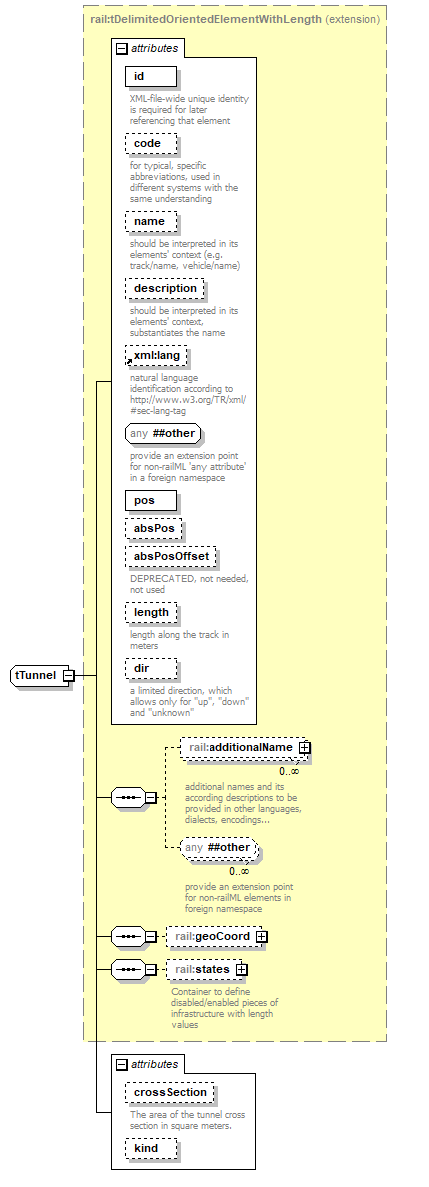 |
||||||||||||||||||||||||||||||||||||||||||||||||||||||||||||||||||||||||||||||||||||||||||||||||||
| namespace | https://www.railml.org/schemas/2018 | ||||||||||||||||||||||||||||||||||||||||||||||||||||||||||||||||||||||||||||||||||||||||||||||||||
| type | extension of rail:tDelimitedOrientedElementWithLength | ||||||||||||||||||||||||||||||||||||||||||||||||||||||||||||||||||||||||||||||||||||||||||||||||||
| properties |
|
||||||||||||||||||||||||||||||||||||||||||||||||||||||||||||||||||||||||||||||||||||||||||||||||||
| children | rail:additionalName rail:geoCoord rail:states | ||||||||||||||||||||||||||||||||||||||||||||||||||||||||||||||||||||||||||||||||||||||||||||||||||
| used by |
|
||||||||||||||||||||||||||||||||||||||||||||||||||||||||||||||||||||||||||||||||||||||||||||||||||
| attributes |
|
||||||||||||||||||||||||||||||||||||||||||||||||||||||||||||||||||||||||||||||||||||||||||||||||||
| source | <xs:complexType name="tTunnel"> <xs:complexContent> <xs:extension base="rail:tDelimitedOrientedElementWithLength"> <xs:attribute name="crossSection" type="rail:tLengthM"> <xs:annotation> <xs:documentation>The area of the tunnel cross section in square meters.</xs:documentation> <xs:documentation>Attention: currently the units given for crossSection in railML is given in metres (tLengthM), but to be understood and used as square metres. This issue will be fixed in a future railML version.</xs:documentation> </xs:annotation> </xs:attribute> <xs:attribute name="kind" type="rail:tTunnelType"/> </xs:extension> </xs:complexContent> </xs:complexType> |
attribute tTunnel/@crossSection
| type | rail:tLengthM | ||||||
| facets |
|
||||||
| annotation |
|
||||||
| source | <xs:attribute name="crossSection" type="rail:tLengthM"> <xs:annotation> <xs:documentation>The area of the tunnel cross section in square meters.</xs:documentation> <xs:documentation>Attention: currently the units given for crossSection in railML is given in metres (tLengthM), but to be understood and used as square metres. This issue will be fixed in a future railML version.</xs:documentation> </xs:annotation> </xs:attribute> |
attribute tTunnel/@kind
| type | rail:tTunnelType |
| source | <xs:attribute name="kind" type="rail:tTunnelType"/> |
complexType tValidForMovements
| diagram |  |
||||||||||||||
| namespace | https://www.railml.org/schemas/2018 | ||||||||||||||
| used by |
|
||||||||||||||
| attributes |
|
||||||||||||||
| source | <xs:complexType name="tValidForMovements"> <xs:attribute name="kind" type="rail:tTrainMovements"> <xs:annotation> <xs:documentation>specification of the train types</xs:documentation> </xs:annotation> </xs:attribute> </xs:complexType> |
attribute tValidForMovements/@kind
| type | rail:tTrainMovements | ||
| annotation |
|
||
| source | <xs:attribute name="kind" type="rail:tTrainMovements"> <xs:annotation> <xs:documentation>specification of the train types</xs:documentation> </xs:annotation> </xs:attribute> |
simpleType tBaliseCountryID
| namespace | https://www.railml.org/schemas/2018 | |||||||||
| type | restriction of xs:integer | |||||||||
| properties |
|
|||||||||
| used by |
|
|||||||||
| facets |
|
|||||||||
| source | <xs:simpleType name="tBaliseCountryID"> <xs:restriction base="xs:integer"> <xs:minInclusive value="0"/> <xs:maxInclusive value="1023"/> </xs:restriction> </xs:simpleType> |
simpleType tBaliseGroupID
| namespace | https://www.railml.org/schemas/2018 | |||||||||
| type | restriction of xs:integer | |||||||||
| properties |
|
|||||||||
| used by |
|
|||||||||
| facets |
|
|||||||||
| source | <xs:simpleType name="tBaliseGroupID"> <xs:restriction base="xs:integer"> <xs:minInclusive value="0"/> <xs:maxInclusive value="16383"/> </xs:restriction> </xs:simpleType> |
simpleType tBaliseGroupType
| namespace | https://www.railml.org/schemas/2018 | ||
| type | union of (restriction of xs:string, rail:tOtherEnumerationValue) | ||
| used by |
|
||
| source | <xs:simpleType name="tBaliseGroupType"> <xs:union> <xs:simpleType> <xs:restriction base="xs:string"> <xs:enumeration value="infill"/> <xs:enumeration value="signal"/> <xs:enumeration value="fixed"/> </xs:restriction> </xs:simpleType> <xs:simpleType> <xs:restriction base="rail:tOtherEnumerationValue"/> </xs:simpleType> </xs:union> </xs:simpleType> |
simpleType tBaliseLinkingAcc
| namespace | https://www.railml.org/schemas/2018 | |||||||||
| type | restriction of xs:integer | |||||||||
| properties |
|
|||||||||
| used by |
|
|||||||||
| facets |
|
|||||||||
| source | <xs:simpleType name="tBaliseLinkingAcc"> <xs:restriction base="xs:integer"> <xs:minInclusive value="-63"/> <xs:maxInclusive value="63"/> </xs:restriction> </xs:simpleType> |
simpleType tBaliseLinkReaction
| namespace | https://www.railml.org/schemas/2018 | ||||||||||||
| type | restriction of xs:string | ||||||||||||
| properties |
|
||||||||||||
| used by |
|
||||||||||||
| facets |
|
||||||||||||
| source | <xs:simpleType name="tBaliseLinkReaction"> <xs:restriction base="xs:string"> <xs:enumeration value="trainTrip"/> <xs:enumeration value="applyServiceBrake"/> <xs:enumeration value="noReaction"/> </xs:restriction> </xs:simpleType> |
simpleType tBorderType
| namespace | https://www.railml.org/schemas/2018 | ||
| type | union of (restriction of xs:string, rail:tOtherEnumerationValue) | ||
| used by |
|
||
| source | <xs:simpleType name="tBorderType"> <xs:union> <xs:simpleType> <xs:restriction base="xs:string"> <xs:enumeration value="tarif"/> <xs:enumeration value="area"/> <xs:enumeration value="state"/> <xs:enumeration value="country"/> <xs:enumeration value="station"/> </xs:restriction> </xs:simpleType> <xs:simpleType> <xs:restriction base="rail:tOtherEnumerationValue"/> </xs:simpleType> </xs:union> </xs:simpleType> |
simpleType tClearanceManaging
| namespace | https://www.railml.org/schemas/2018 | ||
| type | union of (restriction of xs:string, rail:tOtherEnumerationValue) | ||
| used by |
|
||
| source | <xs:simpleType name="tClearanceManaging"> <xs:union> <xs:simpleType> <xs:restriction base="xs:string"> <xs:enumeration value="sight"/> <xs:enumeration value="time"/> <xs:enumeration value="blocking"/> <xs:enumeration value="LZB-blocking"/> <xs:enumeration value="absBrakeDist"/> </xs:restriction> </xs:simpleType> <xs:simpleType> <xs:restriction base="rail:tOtherEnumerationValue"/> </xs:simpleType> </xs:union> </xs:simpleType> |
simpleType tConnectionOrientation
| namespace | https://www.railml.org/schemas/2018 | ||
| type | union of (restriction of xs:string, rail:tOtherEnumerationValue) | ||
| used by |
|
||
| source | <xs:simpleType name="tConnectionOrientation"> <xs:union> <xs:simpleType> <xs:restriction base="xs:string"> <xs:enumeration value="incoming"/> <xs:enumeration value="outgoing"/> <xs:enumeration value="rightAngled"/> <xs:enumeration value="unknown"/> </xs:restriction> </xs:simpleType> <xs:simpleType> <xs:restriction base="rail:tOtherEnumerationValue"/> </xs:simpleType> </xs:union> </xs:simpleType> |
simpleType tControllerTechnologyType
| namespace | https://www.railml.org/schemas/2018 | ||||||||||||||||||
| type | restriction of xs:string | ||||||||||||||||||
| properties |
|
||||||||||||||||||
| used by |
|
||||||||||||||||||
| facets |
|
||||||||||||||||||
| source | <xs:simpleType name="tControllerTechnologyType"> <xs:restriction base="xs:string"> <xs:enumeration value="manual"/> <xs:enumeration value="mechanical"/> <xs:enumeration value="electro-mechanical"/> <xs:enumeration value="electrical"/> <xs:enumeration value="electronic"/> </xs:restriction> </xs:simpleType> |
simpleType tControllerType
| namespace | https://www.railml.org/schemas/2018 | ||
| type | union of (restriction of xs:string, rail:tOtherEnumerationValue) | ||
| used by |
|
||
| source | <xs:simpleType name="tControllerType"> <xs:union> <xs:simpleType> <xs:restriction base="xs:string"> <xs:enumeration value="none"/> <xs:enumeration value="singleElement"/> <xs:enumeration value="local"/> <xs:enumeration value="regional"/> <xs:enumeration value="crossRegional"/> </xs:restriction> </xs:simpleType> <xs:simpleType> <xs:restriction base="rail:tOtherEnumerationValue"/> </xs:simpleType> </xs:union> </xs:simpleType> |
simpleType tCourse
| namespace | https://www.railml.org/schemas/2018 | ||
| type | union of (restriction of xs:string, rail:tOtherEnumerationValue) | ||
| used by |
|
||
| source | <xs:simpleType name="tCourse"> <xs:union> <xs:simpleType> <xs:restriction base="xs:string"> <xs:enumeration value="straight"/> <xs:enumeration value="left"/> <xs:enumeration value="right"/> </xs:restriction> </xs:simpleType> <xs:simpleType> <xs:restriction base="rail:tOtherEnumerationValue"/> </xs:simpleType> </xs:union> </xs:simpleType> |
simpleType tCrossedElementType
| namespace | https://www.railml.org/schemas/2018 | ||
| type | union of (restriction of xs:string, rail:tOtherEnumerationValue) | ||
| used by |
|
||
| source | <xs:simpleType name="tCrossedElementType"> <xs:union> <xs:simpleType> <xs:restriction base="xs:string"> <xs:enumeration value="highway:cycleway"> <xs:annotation> <xs:documentation source="http://wiki.openstreetmap.org/wiki/Tag:highway%3Dcycleway"/> </xs:annotation> </xs:enumeration> <xs:enumeration value="highway:footway"> <xs:annotation> <xs:documentation source="http://wiki.openstreetmap.org/wiki/Tag:highway%3Dfootway"/> </xs:annotation> </xs:enumeration> <xs:enumeration value="highway:motorway"> <xs:annotation> <xs:documentation source="http://wiki.openstreetmap.org/wiki/Tag:highway%3Dmotorway"/> </xs:annotation> </xs:enumeration> <xs:enumeration value="highway:road"> <xs:annotation> <xs:documentation source="http://wiki.openstreetmap.org/wiki/Tag:highway%3Droad"/> </xs:annotation> </xs:enumeration> <xs:enumeration value="natural:peak"> <xs:annotation> <xs:documentation source="http://wiki.openstreetmap.org/wiki/Tag:natural%3Dpeak"/> </xs:annotation> </xs:enumeration> <xs:enumeration value="natural:ridge"> <xs:annotation> <xs:documentation source="http://wiki.openstreetmap.org/wiki/Tag:natural%3Dridge"/> </xs:annotation> </xs:enumeration> <xs:enumeration value="natural:valley"> <xs:annotation> <xs:documentation source="http://wiki.openstreetmap.org/wiki/Tag:natural%3Dvalley"/> </xs:annotation> </xs:enumeration> <xs:enumeration value="natural:water"> <xs:annotation> <xs:documentation source="http://wiki.openstreetmap.org/wiki/Tag:natural%3Dwater"/> </xs:annotation> </xs:enumeration> <xs:enumeration value="waterway:river"> <xs:annotation> <xs:documentation source="http://wiki.openstreetmap.org/wiki/Tag:waterway%3Driver"/> </xs:annotation> </xs:enumeration> </xs:restriction> </xs:simpleType> <xs:simpleType> <xs:restriction base="rail:tOtherEnumerationValue"/> </xs:simpleType> </xs:union> </xs:simpleType> |
simpleType tCrossingType
| namespace | https://www.railml.org/schemas/2018 | ||
| type | union of (restriction of xs:string, rail:tOtherEnumerationValue) | ||
| used by |
|
||
| source | <xs:simpleType name="tCrossingType"> <xs:union> <xs:simpleType> <xs:restriction base="xs:string"> <xs:enumeration value="simpleCrossing"/> <xs:enumeration value="simpleSwitchCrossing"/> <xs:enumeration value="doubleSwitchCrossing"/> </xs:restriction> </xs:simpleType> <xs:simpleType> <xs:restriction base="rail:tOtherEnumerationValue"/> </xs:simpleType> </xs:union> </xs:simpleType> |
simpleType tCrossSectionBlockType
| namespace | https://www.railml.org/schemas/2018 | ||
| type | union of (restriction of xs:string, rail:tOtherEnumerationValue) | ||
| used by |
|
||
| source | <xs:simpleType name="tCrossSectionBlockType"> <xs:union> <xs:simpleType> <xs:restriction base="xs:string"> <xs:enumeration value="station"/> <xs:enumeration value="block"/> <xs:enumeration value="autoblock"/> </xs:restriction> </xs:simpleType> <xs:simpleType> <xs:restriction base="rail:tOtherEnumerationValue"/> </xs:simpleType> </xs:union> </xs:simpleType> |
simpleType tDerailKind
| namespace | https://www.railml.org/schemas/2018 | ||||||||||||||||||
| type | restriction of xs:string | ||||||||||||||||||
| properties |
|
||||||||||||||||||
| used by |
|
||||||||||||||||||
| facets |
|
||||||||||||||||||
| source | <xs:simpleType name="tDerailKind"> <xs:restriction base="xs:string"> <xs:enumeration value="blockDerail"> <xs:annotation> <xs:documentation>see book "Railway Signalling and Interlocking", p. 155</xs:documentation> </xs:annotation> </xs:enumeration> <xs:enumeration value="singleCatchPoints"> <xs:annotation> <xs:documentation>see book "Railway Signalling and Interlocking", p. 155</xs:documentation> </xs:annotation> </xs:enumeration> <xs:enumeration value="doubleCatchPoints"> <xs:annotation> <xs:documentation>see book "Railway Signalling and Interlocking", p. 155</xs:documentation> </xs:annotation> </xs:enumeration> </xs:restriction> </xs:simpleType> |
simpleType tDetectionObject
| namespace | https://www.railml.org/schemas/2018 | ||
| type | union of (restriction of xs:string, rail:tOtherEnumerationValue) | ||
| used by |
|
||
| source | <xs:simpleType name="tDetectionObject"> <xs:union> <xs:simpleType> <xs:restriction base="xs:string"> <xs:enumeration value="wheel"/> <xs:enumeration value="axle"/> <xs:enumeration value="train"/> <xs:enumeration value="endOfTrain"/> <xs:enumeration value="obstacle"/> </xs:restriction> </xs:simpleType> <xs:simpleType> <xs:restriction base="rail:tOtherEnumerationValue"/> </xs:simpleType> </xs:union> </xs:simpleType> |
simpleType tDetectorMedium
| namespace | https://www.railml.org/schemas/2018 | ||
| type | union of (restriction of xs:string, rail:tOtherEnumerationValue) | ||
| used by |
|
||
| source | <xs:simpleType name="tDetectorMedium"> <xs:union> <xs:simpleType> <xs:restriction base="xs:string"> <xs:enumeration value="mechanical"/> <xs:enumeration value="hydraulic"/> <xs:enumeration value="pneumatic"/> <xs:enumeration value="magnetic"/> <xs:enumeration value="inductive"/> <xs:enumeration value="optical"/> <xs:enumeration value="radio"/> </xs:restriction> </xs:simpleType> <xs:simpleType> <xs:restriction base="rail:tOtherEnumerationValue"/> </xs:simpleType> </xs:union> </xs:simpleType> |
simpleType tElectrificationType
| namespace | https://www.railml.org/schemas/2018 | ||
| type | union of (restriction of xs:string, rail:tOtherEnumerationValue) | ||
| used by |
|
||
| source | <xs:simpleType name="tElectrificationType"> <xs:union> <xs:simpleType> <xs:restriction base="xs:string"> <xs:enumeration value="none"/> <xs:enumeration value="overhead"/> <xs:enumeration value="3rdRail"/> <xs:enumeration value="sideRail"/> </xs:restriction> </xs:simpleType> <xs:simpleType> <xs:restriction base="rail:tOtherEnumerationValue"/> </xs:simpleType> </xs:union> </xs:simpleType> |
simpleType tHorizontalCurveType
| namespace | https://www.railml.org/schemas/2018 | ||
| type | union of (restriction of xs:string, rail:tOtherEnumerationValue) | ||
| used by |
|
||
| source | <xs:simpleType name="tHorizontalCurveType"> <xs:union> <xs:simpleType> <xs:restriction base="xs:string"> <xs:enumeration value="TS_cubicParabola"> <xs:annotation> <xs:documentation>begin of transition curve of type cubic parabola</xs:documentation> </xs:annotation> </xs:enumeration> <xs:enumeration value="TS_parabola4"> <xs:annotation> <xs:documentation>begin of transition curve of type 4th degree parabola</xs:documentation> </xs:annotation> </xs:enumeration> <xs:enumeration value="TS_clothoide"> <xs:annotation> <xs:documentation>begin of transition curve of type clothoide</xs:documentation> </xs:annotation> </xs:enumeration> <xs:enumeration value="TS_WienerBogen"> <xs:annotation> <xs:documentation>begin of transition curve of type Wiener Bogen</xs:documentation> </xs:annotation> </xs:enumeration> <xs:enumeration value="TS_BlossBogen"> <xs:annotation> <xs:documentation>begin of transition curve of type Bloss Bogen</xs:documentation> </xs:annotation> </xs:enumeration> <xs:enumeration value="TS_Sinusoide"> <xs:annotation> <xs:documentation>begin of transition curve of type Sinusoide</xs:documentation> </xs:annotation> </xs:enumeration> <xs:enumeration value="TS_Cosinusoide"> <xs:annotation> <xs:documentation>begin of transition curve of type Cosinusoide</xs:documentation> </xs:annotation> </xs:enumeration> <xs:enumeration value="SC"> <xs:annotation> <xs:documentation>end of transition curve (spiral - curve)</xs:documentation> </xs:annotation> </xs:enumeration> </xs:restriction> </xs:simpleType> <xs:simpleType> <xs:restriction base="rail:tOtherEnumerationValue"/> </xs:simpleType> </xs:union> </xs:simpleType> |
simpleType tInfluence
| namespace | https://www.railml.org/schemas/2018 | ||
| type | union of (restriction of xs:string, rail:tOtherEnumerationValue) | ||
| used by |
|
||
| source | <xs:simpleType name="tInfluence"> <xs:union> <xs:simpleType> <xs:restriction base="xs:string"> <xs:enumeration value="increasing"/> <xs:enumeration value="decreasing"/> </xs:restriction> </xs:simpleType> <xs:simpleType> <xs:restriction base="rail:tOtherEnumerationValue"/> </xs:simpleType> </xs:union> </xs:simpleType> |
simpleType tInfrastructureStatus
| namespace | https://www.railml.org/schemas/2018 | ||
| type | union of (restriction of xs:string, rail:tOtherEnumerationValue) | ||
| used by |
|
||
| source | <xs:simpleType name="tInfrastructureStatus"> <xs:union> <xs:simpleType> <xs:restriction base="xs:string"> <xs:enumeration value="conceptual"> <xs:annotation> <xs:documentation>The construction or commissioning of the element is planned for the medium or long term. However, there are still no concrete (planning) activities for the construction of the element beyond the preliminary planning and cost estimation.</xs:documentation> </xs:annotation> </xs:enumeration> <xs:enumeration value="planned"> <xs:annotation> <xs:documentation>The construction or commissioning of the element is planned concretely and at short notice or concrete planning activities for the construction take place, e.g. design, approval or implementation planning, cost calculation, award of contracts. It is not normally possible to use the element.</xs:documentation> </xs:annotation> </xs:enumeration> <xs:enumeration value="operational"> <xs:annotation> <xs:documentation>The element is operational and can be used regularly.</xs:documentation> </xs:annotation> </xs:enumeration> <xs:enumeration value="disabled"> <xs:annotation> <xs:documentation>The element is currently not usable, switched off or deactivated and therefore cannot be used regularly. However, it can be put back into operation at short notice without further construction, acceptance or approval activities.</xs:documentation> </xs:annotation> </xs:enumeration> <xs:enumeration value="closed"> <xs:annotation> <xs:documentation>The element is no longer available, removed, dismantled, or no longer exists. Planning, construction or commissioning activities are absolutely necessary for recommissioning.</xs:documentation> </xs:annotation> </xs:enumeration> </xs:restriction> </xs:simpleType> <xs:simpleType> <xs:restriction base="rail:tOtherEnumerationValue"/> </xs:simpleType> </xs:union> </xs:simpleType> |
simpleType tInsulatedRailSide
| namespace | https://www.railml.org/schemas/2018 | |||||||||||||||
| type | restriction of xs:string | |||||||||||||||
| properties |
|
|||||||||||||||
| used by |
|
|||||||||||||||
| facets |
|
|||||||||||||||
| source | <xs:simpleType name="tInsulatedRailSide"> <xs:restriction base="xs:string"> <xs:enumeration value="none"/> <xs:enumeration value="left"/> <xs:enumeration value="right"/> <xs:enumeration value="both"/> </xs:restriction> </xs:simpleType> |
simpleType tLevelCrossingSignalType
| namespace | https://www.railml.org/schemas/2018 | ||
| type | union of (restriction of xs:string, rail:tOtherEnumerationValue) | ||
| used by |
|
||
| source | <xs:simpleType name="tLevelCrossingSignalType"> <xs:union> <xs:simpleType> <xs:restriction base="xs:string"> <xs:enumeration value="bell"> <xs:annotation> <xs:documentation>signal for train driver to ring the locomotive's bell</xs:documentation> </xs:annotation> </xs:enumeration> <xs:enumeration value="whistle"> <xs:annotation> <xs:documentation>signal for train driver to blow the locomotive's whistle</xs:documentation> </xs:annotation> </xs:enumeration> <xs:enumeration value="announcing"> <xs:annotation> <xs:documentation>signal announcing the upcoming level crossing ("distant signal" for level crossing)</xs:documentation> </xs:annotation> </xs:enumeration> <xs:enumeration value="activating"> <xs:annotation> <xs:documentation>signal that marks the position where the train detector for activating the level crossing is situated</xs:documentation> </xs:annotation> </xs:enumeration> <xs:enumeration value="supervision"> <xs:annotation> <xs:documentation>signal supervising the level crossing</xs:documentation> </xs:annotation> </xs:enumeration> </xs:restriction> </xs:simpleType> <xs:simpleType> <xs:restriction base="rail:tOtherEnumerationValue"/> </xs:simpleType> </xs:union> </xs:simpleType> |
simpleType tLineType
| namespace | https://www.railml.org/schemas/2018 | ||
| type | union of (restriction of xs:string, rail:tOtherEnumerationValue) | ||
| used by |
|
||
| source | <xs:simpleType name="tLineType"> <xs:union> <xs:simpleType> <xs:restriction base="xs:string"> <xs:enumeration value="mainLine"/> <xs:enumeration value="secondaryLine"/> <xs:enumeration value="branchLine"/> </xs:restriction> </xs:simpleType> <xs:simpleType> <xs:restriction base="rail:tOtherEnumerationValue"/> </xs:simpleType> </xs:union> </xs:simpleType> |
simpleType tMaxTrainCurrentType
| namespace | https://www.railml.org/schemas/2018 | |||||||||
| type | restriction of xs:string | |||||||||
| properties |
|
|||||||||
| used by |
|
|||||||||
| facets |
|
|||||||||
| source | <xs:simpleType name="tMaxTrainCurrentType"> <xs:restriction base="xs:string"> <xs:enumeration value="driving"/> <xs:enumeration value="standstill"/> </xs:restriction> </xs:simpleType> |
simpleType tMaxTrainCurrentValidFor
| namespace | https://www.railml.org/schemas/2018 | |||||||||
| type | restriction of xs:string | |||||||||
| properties |
|
|||||||||
| used by |
|
|||||||||
| facets |
|
|||||||||
| source | <xs:simpleType name="tMaxTrainCurrentValidFor"> <xs:restriction base="xs:string"> <xs:enumeration value="train"/> <xs:enumeration value="pantograph"/> </xs:restriction> </xs:simpleType> |
simpleType tMileageChangeDescr
| namespace | https://www.railml.org/schemas/2018 | |||||||||
| type | restriction of xs:string | |||||||||
| properties |
|
|||||||||
| used by |
|
|||||||||
| facets |
|
|||||||||
| source | <xs:simpleType name="tMileageChangeDescr"> <xs:restriction base="xs:string"> <xs:enumeration value="overlapping"/> <xs:enumeration value="missing"/> </xs:restriction> </xs:simpleType> |
simpleType tOcpCenterSide
| namespace | https://www.railml.org/schemas/2018 | ||||||||||||||||||||||||
| type | restriction of xs:string | ||||||||||||||||||||||||
| properties |
|
||||||||||||||||||||||||
| used by |
|
||||||||||||||||||||||||
| facets |
|
||||||||||||||||||||||||
| source | <xs:simpleType name="tOcpCenterSide"> <xs:restriction base="xs:string"> <xs:enumeration value="left"/> <xs:enumeration value="right"/> <xs:enumeration value="above"/> <xs:enumeration value="below"/> <xs:enumeration value="ahead"/> <xs:enumeration value="behind"/> <xs:enumeration value="none"/> </xs:restriction> </xs:simpleType> |
simpleType tOcpManMode
| namespace | https://www.railml.org/schemas/2018 | ||
| type | union of (restriction of xs:string, rail:tOtherEnumerationValue) | ||
| used by |
|
||
| source | <xs:simpleType name="tOcpManMode"> <xs:union> <xs:simpleType> <xs:restriction base="xs:string"> <xs:enumeration value="manned"/> <xs:enumeration value="unmanned"/> <xs:enumeration value="off"/> </xs:restriction> </xs:simpleType> <xs:simpleType> <xs:restriction base="rail:tOtherEnumerationValue"/> </xs:simpleType> </xs:union> </xs:simpleType> |
simpleType tOcpNameType
| namespace | https://www.railml.org/schemas/2018 | ||
| type | union of (restriction of xs:string, rail:tOtherEnumerationValue) | ||
| used by |
|
||
| source | <xs:simpleType name="tOcpNameType"> <xs:union> <xs:simpleType> <xs:restriction base="xs:string"> <xs:enumeration value="operationalName"/> <xs:enumeration value="trafficName"/> <xs:enumeration value="localName"/> </xs:restriction> </xs:simpleType> <xs:simpleType> <xs:restriction base="rail:tOtherEnumerationValue"/> </xs:simpleType> </xs:union> </xs:simpleType> |
simpleType tOcpOperationalType
| namespace | https://www.railml.org/schemas/2018 | ||
| type | union of (restriction of xs:string, rail:tOtherEnumerationValue) | ||
| used by |
|
||
| source | <xs:simpleType name="tOcpOperationalType"> <xs:union> <xs:simpleType> <xs:restriction base="xs:string"> <xs:enumeration value="station"> <xs:annotation> <xs:documentation>a usual station for beginning, ending, overtaking of trains with passing tracks, ... </xs:documentation> </xs:annotation> </xs:enumeration> <xs:enumeration value="depot"> <xs:annotation> <xs:documentation>a train depot</xs:documentation> </xs:annotation> </xs:enumeration> <xs:enumeration value="stoppingPoint"> <xs:annotation> <xs:documentation>an ocp without signals, switches, addtional tracks where trains start, stop or end e. g. for passenger exchange</xs:documentation> </xs:annotation> </xs:enumeration> <xs:enumeration value="crossover"> <xs:annotation> <xs:documentation>a connection between two tracks of a double-track line </xs:documentation> </xs:annotation> </xs:enumeration> <xs:enumeration value="junction"> <xs:annotation> <xs:documentation>joining/splitting of two lines</xs:documentation> </xs:annotation> </xs:enumeration> <xs:enumeration value="blockPost"> <xs:annotation> <xs:documentation>a (mainly staffed) ocp with signals where the train spacing is monitored</xs:documentation> </xs:annotation> </xs:enumeration> <xs:enumeration value="blockSignal"> <xs:annotation> <xs:documentation>an ocp consisting of a block signal for train spacing only, mainly unstaffed and automated operating</xs:documentation> </xs:annotation> </xs:enumeration> <xs:enumeration value="siding"> <xs:annotation> <xs:documentation>an ocp to collect and deliver of cargo waggons to build trains, but not for train operation</xs:documentation> </xs:annotation> </xs:enumeration> </xs:restriction> </xs:simpleType> <xs:simpleType> <xs:restriction base="rail:tOtherEnumerationValue"/> </xs:simpleType> </xs:union> </xs:simpleType> |
simpleType tOcpTrafficType
| namespace | https://www.railml.org/schemas/2018 | ||
| type | union of (restriction of xs:string, rail:tOtherEnumerationValue) | ||
| used by |
|
||
| source | <xs:simpleType name="tOcpTrafficType"> <xs:union> <xs:simpleType> <xs:restriction base="xs:string"> <xs:enumeration value="passenger"/> <xs:enumeration value="freight"/> <xs:enumeration value="shunting"/> <xs:enumeration value="operational"/> </xs:restriction> </xs:simpleType> <xs:simpleType> <xs:restriction base="rail:tOtherEnumerationValue"/> </xs:simpleType> </xs:union> </xs:simpleType> |
simpleType tPIG
| namespace | https://www.railml.org/schemas/2018 | |||||||||
| type | restriction of xs:integer | |||||||||
| properties |
|
|||||||||
| used by |
|
|||||||||
| facets |
|
|||||||||
| source | <xs:simpleType name="tPIG"> <xs:restriction base="xs:integer"> <xs:minInclusive value="0"/> <xs:maxInclusive value="7"/> </xs:restriction> </xs:simpleType> |
simpleType tPosInTrack
| namespace | https://www.railml.org/schemas/2018 | |||||||||||||||||||||||||||||||||
| type | restriction of xs:string | |||||||||||||||||||||||||||||||||
| properties |
|
|||||||||||||||||||||||||||||||||
| used by |
|
|||||||||||||||||||||||||||||||||
| facets |
|
|||||||||||||||||||||||||||||||||
| source | <xs:simpleType name="tPosInTrack"> <xs:restriction base="xs:string"> <xs:enumeration value="center"/> <xs:enumeration value="leftRail"/> <xs:enumeration value="leftRailInside"/> <xs:enumeration value="leftRailOutside"/> <xs:enumeration value="rightRail"/> <xs:enumeration value="rightRailInside"/> <xs:enumeration value="rightRailOutside"/> <xs:enumeration value="outside"/> <xs:enumeration value="outsideLeft"/> <xs:enumeration value="outsideRight"/> </xs:restriction> </xs:simpleType> |
simpleType tPowerTransmissionType
| namespace | https://www.railml.org/schemas/2018 | ||
| type | union of (restriction of xs:string, rail:tOtherEnumerationValue) | ||
| used by |
|
||
| source | <xs:simpleType name="tPowerTransmissionType"> <xs:union> <xs:simpleType> <xs:restriction base="xs:string"> <xs:enumeration value="adhesion"/> <xs:enumeration value="gearrack"/> <xs:enumeration value="cable"/> </xs:restriction> </xs:simpleType> <xs:simpleType> <xs:restriction base="rail:tOtherEnumerationValue"/> </xs:simpleType> </xs:union> </xs:simpleType> |
simpleType tSide
| namespace | https://www.railml.org/schemas/2018 | |||||||||||||
| type | restriction of xs:string | |||||||||||||
| properties |
|
|||||||||||||
| used by |
|
|||||||||||||
| facets |
|
|||||||||||||
| source | <xs:simpleType name="tSide"> <xs:restriction base="xs:string"> <xs:enumeration value="left"> <xs:annotation> <xs:documentation>left side, regarding the relative direction of the track from trackBegin to trackEnd</xs:documentation> </xs:annotation> </xs:enumeration> <xs:enumeration value="right"> <xs:annotation> <xs:documentation>right side, regarding the relative direction of the track from trackBegin to trackEnd</xs:documentation> </xs:annotation> </xs:enumeration> </xs:restriction> </xs:simpleType> |
simpleType tSignalFunction
| namespace | https://www.railml.org/schemas/2018 | ||
| type | union of (restriction of xs:string, rail:tOtherEnumerationValue) | ||
| used by |
|
||
| source | <xs:simpleType name="tSignalFunction"> <xs:union> <xs:simpleType> <xs:restriction base="xs:string"> <xs:enumeration value="exit"/> <xs:enumeration value="home"/> <xs:enumeration value="blocking"/> <xs:enumeration value="intermediate"/> </xs:restriction> </xs:simpleType> <xs:simpleType> <xs:restriction base="rail:tOtherEnumerationValue"/> </xs:simpleType> </xs:union> </xs:simpleType> |
simpleType tSignalGroupType
| namespace | https://www.railml.org/schemas/2018 | ||
| type | union of (restriction of xs:string, rail:tOtherEnumerationValue) | ||
| used by |
|
||
| source | <xs:simpleType name="tSignalGroupType"> <xs:union> <xs:simpleType> <xs:restriction base="xs:string"> <xs:enumeration value="distant-main"/> <xs:enumeration value="station"/> </xs:restriction> </xs:simpleType> <xs:simpleType> <xs:restriction base="rail:tOtherEnumerationValue"/> </xs:simpleType> </xs:union> </xs:simpleType> |
simpleType tSignalKind
| namespace | https://www.railml.org/schemas/2018 | ||
| type | union of (restriction of xs:string, rail:tOtherEnumerationValue) | ||
| used by |
|
||
| source | <xs:simpleType name="tSignalKind"> <xs:union> <xs:simpleType> <xs:restriction base="xs:string"> <xs:enumeration value="announcement"/> <xs:enumeration value="execution"/> </xs:restriction> </xs:simpleType> <xs:simpleType> <xs:restriction base="rail:tOtherEnumerationValue"/> </xs:simpleType> </xs:union> </xs:simpleType> |
simpleType tSignalType
| namespace | https://www.railml.org/schemas/2018 | ||
| type | union of (restriction of xs:string, rail:tOtherEnumerationValue) | ||
| used by |
|
||
| source | <xs:simpleType name="tSignalType"> <xs:union> <xs:simpleType> <xs:restriction base="xs:string"> <xs:enumeration value="main"/> <xs:enumeration value="distant"/> <xs:enumeration value="repeater"/> <xs:enumeration value="combined"/> <xs:enumeration value="shunting"/> </xs:restriction> </xs:simpleType> <xs:simpleType> <xs:restriction base="rail:tOtherEnumerationValue"/> </xs:simpleType> </xs:union> </xs:simpleType> |
simpleType tSwitchType
| namespace | https://www.railml.org/schemas/2018 | ||
| type | union of (restriction of xs:string, rail:tOtherEnumerationValue) | ||
| used by |
|
||
| source | <xs:simpleType name="tSwitchType"> <xs:union> <xs:simpleType> <xs:restriction base="xs:string"> <xs:enumeration value="ordinarySwitch"/> <xs:enumeration value="insideCurvedSwitch"/> <xs:enumeration value="outsideCurvedSwitch"/> <xs:enumeration value="threeWaySwitch"/> </xs:restriction> </xs:simpleType> <xs:simpleType> <xs:restriction base="rail:tOtherEnumerationValue"/> </xs:simpleType> </xs:union> </xs:simpleType> |
simpleType tTrackConditionType
| namespace | https://www.railml.org/schemas/2018 | ||
| type | union of (restriction of xs:string, rail:tOtherEnumerationValue) | ||
| used by |
|
||
| source | <xs:simpleType name="tTrackConditionType"> <xs:union> <xs:simpleType> <xs:restriction base="xs:string"> <xs:enumeration value="nonStoppingArea"/> <xs:enumeration value="lowerPantograph"/> <xs:enumeration value="mainPowerSwitchOff"/> <xs:enumeration value="radioHole"/> <xs:enumeration value="airTightness"/> <xs:enumeration value="noRegenerativeBrake"/> <xs:enumeration value="noEddyCurrentBrake"/> <xs:enumeration value="noMagneticShoeBrake"/> </xs:restriction> </xs:simpleType> <xs:simpleType> <xs:restriction base="rail:tOtherEnumerationValue"/> </xs:simpleType> </xs:union> </xs:simpleType> |
simpleType tTrackType
| namespace | https://www.railml.org/schemas/2018 | ||
| type | union of (restriction of xs:string, rail:tOtherEnumerationValue) | ||
| used by |
|
||
| source | <xs:simpleType name="tTrackType"> <xs:union> <xs:simpleType> <xs:restriction base="xs:string"> <xs:enumeration value="mainTrack"> <xs:annotation> <xs:documentation>regular track a of line used for frequent passenger and freight transport</xs:documentation> </xs:annotation> </xs:enumeration> <xs:enumeration value="secondaryTrack"> <xs:annotation> <xs:documentation>a track not frequently used (e. g. loops for overtaking and/or crossing in stations)</xs:documentation> </xs:annotation> </xs:enumeration> <xs:enumeration value="connectingTrack"> <xs:annotation> <xs:documentation>a transfer track from one to another track e. g. in branches, points or cross overs</xs:documentation> </xs:annotation> </xs:enumeration> <xs:enumeration value="sidingTrack"> <xs:annotation> <xs:documentation>a siding</xs:documentation> </xs:annotation> </xs:enumeration> <xs:enumeration value="stationTrack"> <xs:annotation> <xs:documentation>DEPRECATED; a track in a station, possibly with platforms</xs:documentation> </xs:annotation> </xs:enumeration> </xs:restriction> </xs:simpleType> <xs:simpleType> <xs:restriction base="rail:tOtherEnumerationValue"/> </xs:simpleType> </xs:union> </xs:simpleType> |
simpleType tTrainMovements
| namespace | https://www.railml.org/schemas/2018 | ||
| type | union of (restriction of xs:string, rail:tOtherEnumerationValue) | ||
| used by |
|
||
| source | <xs:simpleType name="tTrainMovements"> <xs:union> <xs:simpleType> <xs:restriction base="xs:string"> <xs:enumeration value="freightTrains"/> <xs:enumeration value="passengerTrains"/> <xs:enumeration value="allTrains"/> <xs:enumeration value="shunting"/> </xs:restriction> </xs:simpleType> <xs:simpleType> <xs:restriction base="rail:tOtherEnumerationValue"/> </xs:simpleType> </xs:union> </xs:simpleType> |
simpleType tTrainRadioNetworkSelection
| namespace | https://www.railml.org/schemas/2018 | ||
| type | union of (restriction of xs:string, rail:tOtherEnumerationValue) | ||
| used by |
|
||
| source | <xs:simpleType name="tTrainRadioNetworkSelection"> <xs:union> <xs:simpleType> <xs:restriction base="xs:string"> <xs:enumeration value="manually"/> <xs:enumeration value="byBalise"/> <xs:enumeration value="automatic"/> </xs:restriction> </xs:simpleType> <xs:simpleType> <xs:restriction base="rail:tOtherEnumerationValue"/> </xs:simpleType> </xs:union> </xs:simpleType> |
simpleType tTrainRadioSystem
| namespace | https://www.railml.org/schemas/2018 | ||
| type | union of (restriction of xs:string, rail:tOtherEnumerationValue) | ||
| used by |
|
||
| source | <xs:simpleType name="tTrainRadioSystem"> <xs:union> <xs:simpleType> <xs:restriction base="xs:string"> <xs:enumeration value="GSM-R"/> <xs:enumeration value="otherDigitalRadio"/> <xs:enumeration value="analogLocalRadio"/> <xs:enumeration value="analogDistantRadio"/> </xs:restriction> </xs:simpleType> <xs:simpleType> <xs:restriction base="rail:tOtherEnumerationValue"/> </xs:simpleType> </xs:union> </xs:simpleType> |
simpleType tTrainRelation
| namespace | https://www.railml.org/schemas/2018 | ||
| type | union of (restriction of xs:string, rail:tOtherEnumerationValue) | ||
| used by |
|
||
| source | <xs:simpleType name="tTrainRelation"> <xs:union> <xs:simpleType> <xs:restriction base="xs:string"> <xs:enumeration value="headOfTrain"/> <xs:enumeration value="midOfTrain"/> <xs:enumeration value="endOfTrain"/> </xs:restriction> </xs:simpleType> <xs:simpleType> <xs:restriction base="rail:tOtherEnumerationValue"/> </xs:simpleType> </xs:union> </xs:simpleType> |
simpleType tTunnelType
| namespace | https://www.railml.org/schemas/2018 | ||
| type | union of (restriction of xs:string, rail:tOtherEnumerationValue) | ||
| used by |
|
||
| source | <xs:simpleType name="tTunnelType"> <xs:union> <xs:simpleType> <xs:restriction base="xs:string"> <xs:enumeration value="natural stone"/> <xs:enumeration value="quarrystone"/> <xs:enumeration value="brick"/> <xs:enumeration value="concrete"/> </xs:restriction> </xs:simpleType> <xs:simpleType> <xs:restriction base="rail:tOtherEnumerationValue"/> </xs:simpleType> </xs:union> </xs:simpleType> |
simpleType tVMax
| namespace | https://www.railml.org/schemas/2018 | ||
| type | union of (rail:tSpeedKmPerHour, restriction of xs:string) | ||
| used by |
|
||
| source | <xs:simpleType name="tVMax"> <xs:union memberTypes="rail:tSpeedKmPerHour"> <xs:simpleType> <xs:restriction base="xs:string"> <xs:enumeration value="end"> <xs:annotation> <xs:documentation>The value 'end' should be used for marking the end of temporary speed restrictions, otherwise define the next speed aspect.</xs:documentation> </xs:annotation> </xs:enumeration> </xs:restriction> </xs:simpleType> </xs:union> </xs:simpleType> |
attributeGroup aAbsPosition
| namespace | https://www.railml.org/schemas/2018 | ||||||||||||||||||||
| used by |
|
||||||||||||||||||||
| attributes |
|
||||||||||||||||||||
| source | <xs:attributeGroup name="aAbsPosition"> <xs:attribute name="absPos" type="rail:tLengthM"/> <xs:attribute name="absPosOffset" type="rail:tLengthM"> <xs:annotation> <xs:documentation>DEPRECATED, not needed, not used</xs:documentation> </xs:annotation> </xs:attribute> </xs:attributeGroup> |
attribute aAbsPosition/@absPos
| type | rail:tLengthM | ||||||
| facets |
|
||||||
| source | <xs:attribute name="absPos" type="rail:tLengthM"/> |
attribute aAbsPosition/@absPosOffset
| type | rail:tLengthM | ||||||
| facets |
|
||||||
| annotation |
|
||||||
| source | <xs:attribute name="absPosOffset" type="rail:tLengthM"> <xs:annotation> <xs:documentation>DEPRECATED, not needed, not used</xs:documentation> </xs:annotation> </xs:attribute> |
attributeGroup aAxleWeight
| namespace | https://www.railml.org/schemas/2018 | ||||||||||||||||||
| used by |
|
||||||||||||||||||
| attributes |
|
||||||||||||||||||
| source | <xs:attributeGroup name="aAxleWeight"> <xs:attribute name="value" type="rail:tWeightTons" use="required"/> <xs:attribute name="meterload" type="rail:tMeterloadTonsPerMeter"/> </xs:attributeGroup> |
attribute aAxleWeight/@value
| type | rail:tWeightTons | ||||||
| properties |
|
||||||
| facets |
|
||||||
| source | <xs:attribute name="value" type="rail:tWeightTons" use="required"/> |
attribute aAxleWeight/@meterload
| type | rail:tMeterloadTonsPerMeter | ||||||
| facets |
|
||||||
| source | <xs:attribute name="meterload" type="rail:tMeterloadTonsPerMeter"/> |
attributeGroup aBalise
| namespace | https://www.railml.org/schemas/2018 | ||||||||||||||||||||||||||||||||||||||||||||
| used by |
|
||||||||||||||||||||||||||||||||||||||||||||
| attributes |
|
||||||||||||||||||||||||||||||||||||||||||||
| source | <xs:attributeGroup name="aBalise"> <xs:attribute name="countryID" type="rail:tBaliseCountryID"/> <xs:attribute name="groupID" type="rail:tBaliseGroupID"/> <xs:attribute name="linkingAccuracy" type="rail:tBaliseLinkingAcc"/> <xs:attribute name="linkReactionAscending" type="rail:tBaliseLinkReaction"/> <xs:attribute name="linkReactionDescending" type="rail:tBaliseLinkReaction"/> <xs:attribute name="staticTelegram" type="rail:tHexString"> <xs:annotation> <xs:documentation>telegram coded to the balise; representation of the binary as hex string</xs:documentation> </xs:annotation> </xs:attribute> </xs:attributeGroup> |
attribute aBalise/@countryID
| type | rail:tBaliseCountryID | |||||||||
| facets |
|
|||||||||
| source | <xs:attribute name="countryID" type="rail:tBaliseCountryID"/> |
attribute aBalise/@groupID
| type | rail:tBaliseGroupID | |||||||||
| facets |
|
|||||||||
| source | <xs:attribute name="groupID" type="rail:tBaliseGroupID"/> |
attribute aBalise/@linkingAccuracy
| type | rail:tBaliseLinkingAcc | |||||||||
| facets |
|
|||||||||
| source | <xs:attribute name="linkingAccuracy" type="rail:tBaliseLinkingAcc"/> |
attribute aBalise/@linkReactionAscending
| type | rail:tBaliseLinkReaction | ||||||||||||
| facets |
|
||||||||||||
| source | <xs:attribute name="linkReactionAscending" type="rail:tBaliseLinkReaction"/> |
attribute aBalise/@linkReactionDescending
| type | rail:tBaliseLinkReaction | ||||||||||||
| facets |
|
||||||||||||
| source | <xs:attribute name="linkReactionDescending" type="rail:tBaliseLinkReaction"/> |
attribute aBalise/@staticTelegram
| type | rail:tHexString | ||||||
| facets |
|
||||||
| annotation |
|
||||||
| source | <xs:attribute name="staticTelegram" type="rail:tHexString"> <xs:annotation> <xs:documentation>telegram coded to the balise; representation of the binary as hex string</xs:documentation> </xs:annotation> </xs:attribute> |
attributeGroup aConnectionData
| namespace | https://www.railml.org/schemas/2018 | ||||||||||||||||||||||||||||||||||||||||||||
| used by |
|
||||||||||||||||||||||||||||||||||||||||||||
| attributes |
|
||||||||||||||||||||||||||||||||||||||||||||
| source | <xs:attributeGroup name="aConnectionData"> <xs:attribute name="course" type="rail:tCourse"/> <xs:attribute name="radius" type="rail:tRadiusM"/> <xs:attribute name="maxSpeed" type="rail:tSpeedKmPerHour"/> <xs:attribute name="branchDist" type="rail:tLengthM"> <xs:annotation> <xs:documentation>DEPRECATED: use short 'track' instead</xs:documentation> </xs:annotation> </xs:attribute> <xs:attribute name="orientation" type="rail:tConnectionOrientation" use="required"/> <xs:attribute name="passable" type="xs:boolean" default="true"/> </xs:attributeGroup> |
attribute aConnectionData/@course
| type | rail:tCourse |
| source | <xs:attribute name="course" type="rail:tCourse"/> |
attribute aConnectionData/@radius
| type | rail:tRadiusM | ||||||
| facets |
|
||||||
| source | <xs:attribute name="radius" type="rail:tRadiusM"/> |
attribute aConnectionData/@maxSpeed
| type | rail:tSpeedKmPerHour | ||||||||||||
| facets |
|
||||||||||||
| source | <xs:attribute name="maxSpeed" type="rail:tSpeedKmPerHour"/> |
attribute aConnectionData/@branchDist
| type | rail:tLengthM | ||||||
| facets |
|
||||||
| annotation |
|
||||||
| source | <xs:attribute name="branchDist" type="rail:tLengthM"> <xs:annotation> <xs:documentation>DEPRECATED: use short 'track' instead</xs:documentation> </xs:annotation> </xs:attribute> |
attribute aConnectionData/@orientation
| type | rail:tConnectionOrientation | ||
| properties |
|
||
| source | <xs:attribute name="orientation" type="rail:tConnectionOrientation" use="required"/> |
attribute aConnectionData/@passable
| type | xs:boolean | ||
| properties |
|
||
| source | <xs:attribute name="passable" type="xs:boolean" default="true"/> |
attributeGroup aController
| namespace | https://www.railml.org/schemas/2018 | ||||||||||||||||||||||||||||||||||||||||||||||
| used by |
|
||||||||||||||||||||||||||||||||||||||||||||||
| attributes |
|
||||||||||||||||||||||||||||||||||||||||||||||
| source | <xs:attributeGroup name="aController"> <xs:attribute name="parentControllerRef" type="rail:tGenericRef"> <xs:annotation> <xs:documentation>reference to parent controller</xs:documentation> </xs:annotation> </xs:attribute> <xs:attribute name="model" type="xs:string"> <xs:annotation> <xs:documentation>(product) name of the controller</xs:documentation> </xs:annotation> </xs:attribute> <xs:attribute name="type" type="rail:tControllerType"> <xs:annotation> <xs:documentation>type of controller regarding its complexity and responsibility</xs:documentation> </xs:annotation> </xs:attribute> <xs:attribute name="technologyType" type="rail:tControllerTechnologyType"> <xs:annotation> <xs:documentation>technology that the controller is based on</xs:documentation> </xs:annotation> </xs:attribute> <xs:attribute name="swVersion" type="xs:string"> <xs:annotation> <xs:documentation>controller software version</xs:documentation> </xs:annotation> </xs:attribute> </xs:attributeGroup> |
attribute aController/@parentControllerRef
| type | rail:tGenericRef | ||
| annotation |
|
||
| source | <xs:attribute name="parentControllerRef" type="rail:tGenericRef"> <xs:annotation> <xs:documentation>reference to parent controller</xs:documentation> </xs:annotation> </xs:attribute> |
attribute aController/@model
| type | xs:string | ||
| annotation |
|
||
| source | <xs:attribute name="model" type="xs:string"> <xs:annotation> <xs:documentation>(product) name of the controller</xs:documentation> </xs:annotation> </xs:attribute> |
attribute aController/@type
| type | rail:tControllerType | ||
| annotation |
|
||
| source | <xs:attribute name="type" type="rail:tControllerType"> <xs:annotation> <xs:documentation>type of controller regarding its complexity and responsibility</xs:documentation> </xs:annotation> </xs:attribute> |
attribute aController/@technologyType
| type | rail:tControllerTechnologyType | ||||||||||||||||||
| facets |
|
||||||||||||||||||
| annotation |
|
||||||||||||||||||
| source | <xs:attribute name="technologyType" type="rail:tControllerTechnologyType"> <xs:annotation> <xs:documentation>technology that the controller is based on</xs:documentation> </xs:annotation> </xs:attribute> |
attribute aController/@swVersion
| type | xs:string | ||
| annotation |
|
||
| source | <xs:attribute name="swVersion" type="xs:string"> <xs:annotation> <xs:documentation>controller software version</xs:documentation> </xs:annotation> </xs:attribute> |
attributeGroup aCrossedElement
| namespace | https://www.railml.org/schemas/2018 | ||||||||||||||||||||||||
| used by |
|
||||||||||||||||||||||||
| attributes |
|
||||||||||||||||||||||||
| source | <xs:attributeGroup name="aCrossedElement"> <xs:attribute name="type" type="rail:tCrossedElementType" use="required"> <xs:annotation> <xs:documentation>the type of element crossed by this element</xs:documentation> </xs:annotation> </xs:attribute> <xs:attribute name="pos" type="rail:tLengthM"> <xs:annotation> <xs:documentation>the relative position of the center of the crossed element as distance from begin of track</xs:documentation> <xs:documentation>this value must be within the position range of the parent element</xs:documentation> </xs:annotation> </xs:attribute> </xs:attributeGroup> |
attribute aCrossedElement/@type
| type | rail:tCrossedElementType | ||
| properties |
|
||
| annotation |
|
||
| source | <xs:attribute name="type" type="rail:tCrossedElementType" use="required"> <xs:annotation> <xs:documentation>the type of element crossed by this element</xs:documentation> </xs:annotation> </xs:attribute> |
attribute aCrossedElement/@pos
| type | rail:tLengthM | ||||||
| facets |
|
||||||
| annotation |
|
||||||
| source | <xs:attribute name="pos" type="rail:tLengthM"> <xs:annotation> <xs:documentation>the relative position of the center of the crossed element as distance from begin of track</xs:documentation> <xs:documentation>this value must be within the position range of the parent element</xs:documentation> </xs:annotation> </xs:attribute> |
attributeGroup aDelimitedOrientation
| namespace | https://www.railml.org/schemas/2018 | ||||||||||||||
| used by |
|
||||||||||||||
| attributes |
|
||||||||||||||
| source | <xs:attributeGroup name="aDelimitedOrientation"> <xs:attribute name="dir" type="rail:tDelimitedDirection"> <xs:annotation> <xs:documentation>a limited direction, which allows only for "up", "down" and "unknown"</xs:documentation> </xs:annotation> </xs:attribute> </xs:attributeGroup> |
attribute aDelimitedOrientation/@dir
| type | rail:tDelimitedDirection | ||||||||||||
| facets |
|
||||||||||||
| annotation |
|
||||||||||||
| source | <xs:attribute name="dir" type="rail:tDelimitedDirection"> <xs:annotation> <xs:documentation>a limited direction, which allows only for "up", "down" and "unknown"</xs:documentation> </xs:annotation> </xs:attribute> |
attributeGroup aElectrification
| namespace | https://www.railml.org/schemas/2018 | ||||||||||||||||||||||||
| used by |
|
||||||||||||||||||||||||
| attributes |
|
||||||||||||||||||||||||
| source | <xs:attributeGroup name="aElectrification"> <xs:attribute name="type" type="rail:tElectrificationType" default="none"/> <xs:attribute name="voltage" type="rail:tVoltageVolt" default="0"/> <xs:attribute name="frequency" type="rail:tFrequencyHertz" default="0"/> </xs:attributeGroup> |
attribute aElectrification/@type
| type | rail:tElectrificationType | ||
| properties |
|
||
| source | <xs:attribute name="type" type="rail:tElectrificationType" default="none"/> |
attribute aElectrification/@voltage
| type | rail:tVoltageVolt | ||||||
| properties |
|
||||||
| facets |
|
||||||
| source | <xs:attribute name="voltage" type="rail:tVoltageVolt" default="0"/> |
attribute aElectrification/@frequency
| type | rail:tFrequencyHertz | |||||||||
| properties |
|
|||||||||
| facets |
|
|||||||||
| source | <xs:attribute name="frequency" type="rail:tFrequencyHertz" default="0"/> |
attributeGroup aEpsgCode
| namespace | https://www.railml.org/schemas/2018 | ||||||||||||||||||
| used by |
|
||||||||||||||||||
| attributes |
|
||||||||||||||||||
| source | <xs:attributeGroup name="aEpsgCode"> <xs:attribute name="default" type="xs:anyURI" use="required"/> <xs:attribute name="extraHeight" type="xs:anyURI"/> </xs:attributeGroup> |
attribute aEpsgCode/@default
| type | xs:anyURI | ||
| properties |
|
||
| source | <xs:attribute name="default" type="xs:anyURI" use="required"/> |
attribute aEpsgCode/@extraHeight
| type | xs:anyURI |
| source | <xs:attribute name="extraHeight" type="xs:anyURI"/> |
attributeGroup aGauge
| namespace | https://www.railml.org/schemas/2018 | ||||||||||||
| used by |
|
||||||||||||
| attributes |
|
||||||||||||
| source | <xs:attributeGroup name="aGauge"> <xs:attribute name="value" type="rail:tLengthMM" default="1435"/> </xs:attributeGroup> |
attribute aGauge/@value
| type | rail:tLengthMM | ||||||
| properties |
|
||||||
| facets |
|
||||||
| source | <xs:attribute name="value" type="rail:tLengthMM" default="1435"/> |
attributeGroup aInfrastructure
| namespace | https://www.railml.org/schemas/2018 | ||||||||||||||||||
| used by |
|
||||||||||||||||||
| attributes |
|
||||||||||||||||||
| source | <xs:attributeGroup name="aInfrastructure"> <xs:attribute name="timetableRef" type="rail:tGenericRef"/> <xs:attribute name="rollingstockRef" type="rail:tGenericRef"/> </xs:attributeGroup> |
attribute aInfrastructure/@timetableRef
| type | rail:tGenericRef |
| source | <xs:attribute name="timetableRef" type="rail:tGenericRef"/> |
attribute aInfrastructure/@rollingstockRef
| type | rail:tGenericRef |
| source | <xs:attribute name="rollingstockRef" type="rail:tGenericRef"/> |
attributeGroup aLine
| namespace | https://www.railml.org/schemas/2018 | ||||||||||||||||||||||||||||||
| used by |
|
||||||||||||||||||||||||||||||
| attributes |
|
||||||||||||||||||||||||||||||
| source | <xs:attributeGroup name="aLine"> <xs:attribute name="type" type="rail:tLineType"> <xs:annotation> <xs:documentation>distinguish between different line type: main line, secondary line...</xs:documentation> </xs:annotation> </xs:attribute> <xs:attribute name="infrastructureManagerRef" type="rail:tGenericRef"> <xs:annotation> <xs:documentation>reference to the infrastructure manager entry</xs:documentation> </xs:annotation> </xs:attribute> <xs:attribute name="lineCategory" type="rail:tLineClassificationType"> <xs:annotation> <xs:documentation>the category of the line according to the EU regulation EN 15528 (other national values are also possible)</xs:documentation> </xs:annotation> </xs:attribute> </xs:attributeGroup> |
attribute aLine/@type
| type | rail:tLineType | ||
| annotation |
|
||
| source | <xs:attribute name="type" type="rail:tLineType"> <xs:annotation> <xs:documentation>distinguish between different line type: main line, secondary line...</xs:documentation> </xs:annotation> </xs:attribute> |
attribute aLine/@infrastructureManagerRef
| type | rail:tGenericRef | ||
| annotation |
|
||
| source | <xs:attribute name="infrastructureManagerRef" type="rail:tGenericRef"> <xs:annotation> <xs:documentation>reference to the infrastructure manager entry</xs:documentation> </xs:annotation> </xs:attribute> |
attribute aLine/@lineCategory
| type | rail:tLineClassificationType | ||
| annotation |
|
||
| source | <xs:attribute name="lineCategory" type="rail:tLineClassificationType"> <xs:annotation> <xs:documentation>the category of the line according to the EU regulation EN 15528 (other national values are also possible)</xs:documentation> </xs:annotation> </xs:attribute> |
attributeGroup aOcpRef
| namespace | https://www.railml.org/schemas/2018 | ||||||||||||||||||||||
| used by |
|
||||||||||||||||||||||
| attributes |
|
||||||||||||||||||||||
| source | <xs:attributeGroup name="aOcpRef"> <xs:attribute name="ocpStationRef" type="rail:tGenericRef"> <xs:annotation> <xs:documentation>reference on ocp element, e.g. station</xs:documentation> </xs:annotation> </xs:attribute> <xs:attribute name="controllerRef" type="rail:tGenericRef"> <xs:annotation> <xs:documentation>reference on controller element, e.g. interlocking</xs:documentation> </xs:annotation> </xs:attribute> </xs:attributeGroup> |
attribute aOcpRef/@ocpStationRef
| type | rail:tGenericRef | ||
| annotation |
|
||
| source | <xs:attribute name="ocpStationRef" type="rail:tGenericRef"> <xs:annotation> <xs:documentation>reference on ocp element, e.g. station</xs:documentation> </xs:annotation> </xs:attribute> |
attribute aOcpRef/@controllerRef
| type | rail:tGenericRef | ||
| annotation |
|
||
| source | <xs:attribute name="controllerRef" type="rail:tGenericRef"> <xs:annotation> <xs:documentation>reference on controller element, e.g. interlocking</xs:documentation> </xs:annotation> </xs:attribute> |
attributeGroup aOperationMode
| namespace | https://www.railml.org/schemas/2018 | ||||||||||||||||||||||||
| used by |
|
||||||||||||||||||||||||
| attributes |
|
||||||||||||||||||||||||
| source | <xs:attributeGroup name="aOperationMode"> <xs:attribute name="modeLegislative" type="xs:string" use="required"/> <xs:attribute name="modeExecutive" type="xs:string" use="required"/> <xs:attribute name="clearanceManaging" type="rail:tClearanceManaging"/> </xs:attributeGroup> |
attribute aOperationMode/@modeLegislative
| type | xs:string | ||
| properties |
|
||
| source | <xs:attribute name="modeLegislative" type="xs:string" use="required"/> |
attribute aOperationMode/@modeExecutive
| type | xs:string | ||
| properties |
|
||
| source | <xs:attribute name="modeExecutive" type="xs:string" use="required"/> |
attribute aOperationMode/@clearanceManaging
| type | rail:tClearanceManaging |
| source | <xs:attribute name="clearanceManaging" type="rail:tClearanceManaging"/> |
attributeGroup aOrientation
| namespace | https://www.railml.org/schemas/2018 | ||||||||||||||
| used by |
|
||||||||||||||
| attributes |
|
||||||||||||||
| source | <xs:attributeGroup name="aOrientation"> <xs:attribute name="dir" type="rail:tLaxDirection"> <xs:annotation> <xs:documentation>a direction, which allows for all direction attributes</xs:documentation> </xs:annotation> </xs:attribute> </xs:attributeGroup> |
attribute aOrientation/@dir
| type | rail:tLaxDirection | ||||||||||||||||||
| facets |
|
||||||||||||||||||
| annotation |
|
||||||||||||||||||
| source | <xs:attribute name="dir" type="rail:tLaxDirection"> <xs:annotation> <xs:documentation>a direction, which allows for all direction attributes</xs:documentation> </xs:annotation> </xs:attribute> |
attributeGroup aOwner
| namespace | https://www.railml.org/schemas/2018 | ||||||||||||||||||||||||||||
| used by |
|
||||||||||||||||||||||||||||
| attributes |
|
||||||||||||||||||||||||||||
| source | <xs:attributeGroup name="aOwner"> <xs:attribute name="ownerName" type="xs:string"> <xs:annotation> <xs:documentation>DEPRECATED, use infrastructureManagerRef instead to refer to a listed infrastructureManager</xs:documentation> </xs:annotation> </xs:attribute> <xs:attribute name="uic-no" type="rail:tPositiveCounter"/> <xs:attribute name="infrastructureManagerRef" type="rail:tGenericRef"> <xs:annotation> <xs:documentation>reference to the infrastructure manager entry</xs:documentation> </xs:annotation> </xs:attribute> </xs:attributeGroup> |
attribute aOwner/@ownerName
| type | xs:string | ||
| annotation |
|
||
| source | <xs:attribute name="ownerName" type="xs:string"> <xs:annotation> <xs:documentation>DEPRECATED, use infrastructureManagerRef instead to refer to a listed infrastructureManager</xs:documentation> </xs:annotation> </xs:attribute> |
attribute aOwner/@uic-no
| type | rail:tPositiveCounter |
| source | <xs:attribute name="uic-no" type="rail:tPositiveCounter"/> |
attribute aOwner/@infrastructureManagerRef
| type | rail:tGenericRef | ||
| annotation |
|
||
| source | <xs:attribute name="infrastructureManagerRef" type="rail:tGenericRef"> <xs:annotation> <xs:documentation>reference to the infrastructure manager entry</xs:documentation> </xs:annotation> </xs:attribute> |
attributeGroup aPowerTransmission
| namespace | https://www.railml.org/schemas/2018 | ||||||||||||||||||
| used by |
|
||||||||||||||||||
| attributes |
|
||||||||||||||||||
| source | <xs:attributeGroup name="aPowerTransmission"> <xs:attribute name="type" type="rail:tPowerTransmissionType" default="adhesion"/> <xs:attribute name="style" type="xs:string"/> </xs:attributeGroup> |
attribute aPowerTransmission/@type
| type | rail:tPowerTransmissionType | ||
| properties |
|
||
| source | <xs:attribute name="type" type="rail:tPowerTransmissionType" default="adhesion"/> |
attribute aPowerTransmission/@style
| type | xs:string |
| source | <xs:attribute name="style" type="xs:string"/> |
attributeGroup aRadiusChange
| namespace | https://www.railml.org/schemas/2018 | ||||||||||||||||||||||||||||||
| used by |
|
||||||||||||||||||||||||||||||
| attributes |
|
||||||||||||||||||||||||||||||
| source | <xs:attributeGroup name="aRadiusChange"> <xs:attribute name="radius" type="rail:tRadiusM" use="required"> <xs:annotation> <xs:documentation>The radius of the track in [m], which is either valid exactly at this point or from here until the next radiusChange element.</xs:documentation> </xs:annotation> </xs:attribute> <xs:attribute name="superelevation" type="rail:tLengthMM"> <xs:annotation> <xs:documentation>The superelevation of the track in [mm], which is either valid exactly at this point of from here until the next radiusChange element.</xs:documentation> </xs:annotation> </xs:attribute> <xs:attribute name="geometryElementDescription" type="rail:tHorizontalCurveType"> <xs:annotation> <xs:documentation>Specific geometric description either of this point or of the curve between this and the next radiusChange element (shall be used in particular for transition curves).</xs:documentation> </xs:annotation> </xs:attribute> </xs:attributeGroup> |
attribute aRadiusChange/@radius
| type | rail:tRadiusM | ||||||
| properties |
|
||||||
| facets |
|
||||||
| annotation |
|
||||||
| source | <xs:attribute name="radius" type="rail:tRadiusM" use="required"> <xs:annotation> <xs:documentation>The radius of the track in [m], which is either valid exactly at this point or from here until the next radiusChange element.</xs:documentation> </xs:annotation> </xs:attribute> |
attribute aRadiusChange/@superelevation
| type | rail:tLengthMM | ||||||
| facets |
|
||||||
| annotation |
|
||||||
| source | <xs:attribute name="superelevation" type="rail:tLengthMM"> <xs:annotation> <xs:documentation>The superelevation of the track in [mm], which is either valid exactly at this point of from here until the next radiusChange element.</xs:documentation> </xs:annotation> </xs:attribute> |
attribute aRadiusChange/@geometryElementDescription
| type | rail:tHorizontalCurveType | ||
| annotation |
|
||
| source | <xs:attribute name="geometryElementDescription" type="rail:tHorizontalCurveType"> <xs:annotation> <xs:documentation>Specific geometric description either of this point or of the curve between this and the next radiusChange element (shall be used in particular for transition curves).</xs:documentation> </xs:annotation> </xs:attribute> |
attributeGroup aRelPosition
| namespace | https://www.railml.org/schemas/2018 | ||||||||||||
| used by |
|
||||||||||||
| attributes |
|
||||||||||||
| source | <xs:attributeGroup name="aRelPosition"> <xs:attribute name="pos" type="rail:tLengthM" use="required"/> </xs:attributeGroup> |
attribute aRelPosition/@pos
| type | rail:tLengthM | ||||||
| properties |
|
||||||
| facets |
|
||||||
| source | <xs:attribute name="pos" type="rail:tLengthM" use="required"/> |
attributeGroup aSignal
| namespace | https://www.railml.org/schemas/2018 | ||||||||||||||||||||||||||||||||||||||||||||||||||||||||||||||||||||||||||||||||||||||||||||||||||||
| used by |
|
||||||||||||||||||||||||||||||||||||||||||||||||||||||||||||||||||||||||||||||||||||||||||||||||||||
| attributes |
|
||||||||||||||||||||||||||||||||||||||||||||||||||||||||||||||||||||||||||||||||||||||||||||||||||||
| source | <xs:attributeGroup name="aSignal"> <xs:attribute name="sight" type="rail:tLengthM"> <xs:annotation> <xs:documentation>DEPRECATED with railML 2.4 since it is not being used</xs:documentation> </xs:annotation> </xs:attribute> <xs:attribute name="type" type="rail:tSignalType"/> <xs:attribute name="function" type="rail:tSignalFunction"/> <xs:attribute name="sigSystem" type="xs:string"> <xs:annotation> <xs:documentation>DEPRECATED since it is not needed and not used.</xs:documentation> </xs:annotation> </xs:attribute> <xs:attribute name="switchable" type="xs:boolean"> <xs:annotation> <xs:documentation>DEPRECATED: use attribute 'switchable' in sub-elements instead</xs:documentation> </xs:annotation> </xs:attribute> <xs:attribute name="maskableRoute" type="xs:boolean"> <xs:annotation> <xs:documentation>DEPRECATED with railML 2.4 since it is not being used; refers to interlocking content</xs:documentation> </xs:annotation> </xs:attribute> <xs:attribute name="maskableATC" type="xs:boolean"> <xs:annotation> <xs:documentation>DEPRECATED with railML 2.4 since it is not being used; refers to interlocking content</xs:documentation> </xs:annotation> </xs:attribute> <xs:attribute name="virtual" type="xs:boolean" default="false"/> <xs:attribute name="signalBoxOcpRef" type="rail:tGenericRef"> <xs:annotation> <xs:documentation>DEPRECATED: use attribute 'controllerRef' instead</xs:documentation> </xs:annotation> </xs:attribute> <xs:attribute name="stationOcpRef" type="rail:tGenericRef"> <xs:annotation> <xs:documentation>DEPRECATED: use attribute 'ocpStationRef' instead</xs:documentation> </xs:annotation> </xs:attribute> <xs:attribute name="distNearestDangerPoint" type="rail:tLengthM"> <xs:annotation> <xs:documentation>DEPRECATED with railML 2.4 since it is not being used; refers to interlocking content</xs:documentation> </xs:annotation> </xs:attribute> <xs:attribute name="trackDist" type="rail:tLengthM"/> <xs:attribute name="height" type="rail:tLengthM"/> </xs:attributeGroup> |
attribute aSignal/@sight
| type | rail:tLengthM | ||||||
| facets |
|
||||||
| annotation |
|
||||||
| source | <xs:attribute name="sight" type="rail:tLengthM"> <xs:annotation> <xs:documentation>DEPRECATED with railML 2.4 since it is not being used</xs:documentation> </xs:annotation> </xs:attribute> |
attribute aSignal/@type
| type | rail:tSignalType |
| source | <xs:attribute name="type" type="rail:tSignalType"/> |
attribute aSignal/@function
| type | rail:tSignalFunction |
| source | <xs:attribute name="function" type="rail:tSignalFunction"/> |
attribute aSignal/@sigSystem
| type | xs:string | ||
| annotation |
|
||
| source | <xs:attribute name="sigSystem" type="xs:string"> <xs:annotation> <xs:documentation>DEPRECATED since it is not needed and not used.</xs:documentation> </xs:annotation> </xs:attribute> |
attribute aSignal/@switchable
| type | xs:boolean | ||
| annotation |
|
||
| source | <xs:attribute name="switchable" type="xs:boolean"> <xs:annotation> <xs:documentation>DEPRECATED: use attribute 'switchable' in sub-elements instead</xs:documentation> </xs:annotation> </xs:attribute> |
attribute aSignal/@maskableRoute
| type | xs:boolean | ||
| annotation |
|
||
| source | <xs:attribute name="maskableRoute" type="xs:boolean"> <xs:annotation> <xs:documentation>DEPRECATED with railML 2.4 since it is not being used; refers to interlocking content</xs:documentation> </xs:annotation> </xs:attribute> |
attribute aSignal/@maskableATC
| type | xs:boolean | ||
| annotation |
|
||
| source | <xs:attribute name="maskableATC" type="xs:boolean"> <xs:annotation> <xs:documentation>DEPRECATED with railML 2.4 since it is not being used; refers to interlocking content</xs:documentation> </xs:annotation> </xs:attribute> |
attribute aSignal/@virtual
| type | xs:boolean | ||
| properties |
|
||
| source | <xs:attribute name="virtual" type="xs:boolean" default="false"/> |
attribute aSignal/@signalBoxOcpRef
| type | rail:tGenericRef | ||
| annotation |
|
||
| source | <xs:attribute name="signalBoxOcpRef" type="rail:tGenericRef"> <xs:annotation> <xs:documentation>DEPRECATED: use attribute 'controllerRef' instead</xs:documentation> </xs:annotation> </xs:attribute> |
attribute aSignal/@stationOcpRef
| type | rail:tGenericRef | ||
| annotation |
|
||
| source | <xs:attribute name="stationOcpRef" type="rail:tGenericRef"> <xs:annotation> <xs:documentation>DEPRECATED: use attribute 'ocpStationRef' instead</xs:documentation> </xs:annotation> </xs:attribute> |
attribute aSignal/@distNearestDangerPoint
| type | rail:tLengthM | ||||||
| facets |
|
||||||
| annotation |
|
||||||
| source | <xs:attribute name="distNearestDangerPoint" type="rail:tLengthM"> <xs:annotation> <xs:documentation>DEPRECATED with railML 2.4 since it is not being used; refers to interlocking content</xs:documentation> </xs:annotation> </xs:attribute> |
attribute aSignal/@trackDist
| type | rail:tLengthM | ||||||
| facets |
|
||||||
| source | <xs:attribute name="trackDist" type="rail:tLengthM"/> |
attribute aSignal/@height
| type | rail:tLengthM | ||||||
| facets |
|
||||||
| source | <xs:attribute name="height" type="rail:tLengthM"/> |
attributeGroup aSignalGroup
| namespace | https://www.railml.org/schemas/2018 | ||||||||||||
| used by |
|
||||||||||||
| attributes |
|
||||||||||||
| source | <xs:attributeGroup name="aSignalGroup"> <xs:attribute name="type" type="rail:tSignalGroupType"/> </xs:attributeGroup> |
attribute aSignalGroup/@type
| type | rail:tSignalGroupType |
| source | <xs:attribute name="type" type="rail:tSignalGroupType"/> |
attributeGroup aSpeed
| namespace | https://www.railml.org/schemas/2018 | ||||||||||||||||||||||||||||||||||||||||||||
| used by |
|
||||||||||||||||||||||||||||||||||||||||||||
| attributes |
|
||||||||||||||||||||||||||||||||||||||||||||
| source | <xs:attributeGroup name="aSpeed"> <xs:attribute name="trainCategory" type="rail:tTrainCategory"> <xs:annotation> <xs:documentation>DEPRECATED. Use the new attribute etcsTrainCategory instead.</xs:documentation> </xs:annotation> </xs:attribute> <xs:attribute name="etcsTrainCategory" type="rail:tEtcsTrainCategory"> <xs:annotation> <xs:documentation>the international train category number as specified on page 38 in ERA_ERTMS_040001 "Assignment of values to ETCS variables" v1.9 from 10/07/12</xs:documentation> </xs:annotation> </xs:attribute> <xs:attribute name="profileRef" type="rail:tGenericRef"> <xs:annotation> <xs:documentation>reference to a speedProfile</xs:documentation> </xs:annotation> </xs:attribute> <xs:attribute name="status" type="xs:string"/> <xs:attribute name="vMax" type="rail:tVMax" use="required"> <xs:annotation> <xs:documentation>maximum allowed speed in km/h</xs:documentation> </xs:annotation> </xs:attribute> </xs:attributeGroup> |
attribute aSpeed/@trainCategory
| type | rail:tTrainCategory | ||
| annotation |
|
||
| source | <xs:attribute name="trainCategory" type="rail:tTrainCategory"> <xs:annotation> <xs:documentation>DEPRECATED. Use the new attribute etcsTrainCategory instead.</xs:documentation> </xs:annotation> </xs:attribute> |
attribute aSpeed/@etcsTrainCategory
| type | rail:tEtcsTrainCategory | |||||||||
| facets |
|
|||||||||
| annotation |
|
|||||||||
| source | <xs:attribute name="etcsTrainCategory" type="rail:tEtcsTrainCategory"> <xs:annotation> <xs:documentation>the international train category number as specified on page 38 in ERA_ERTMS_040001 "Assignment of values to ETCS variables" v1.9 from 10/07/12</xs:documentation> </xs:annotation> </xs:attribute> |
attribute aSpeed/@profileRef
| type | rail:tGenericRef | ||
| annotation |
|
||
| source | <xs:attribute name="profileRef" type="rail:tGenericRef"> <xs:annotation> <xs:documentation>reference to a speedProfile</xs:documentation> </xs:annotation> </xs:attribute> |
attribute aSpeed/@status
| type | xs:string |
| source | <xs:attribute name="status" type="xs:string"/> |
attribute aSpeed/@vMax
| type | rail:tVMax | ||
| properties |
|
||
| annotation |
|
||
| source | <xs:attribute name="vMax" type="rail:tVMax" use="required"> <xs:annotation> <xs:documentation>maximum allowed speed in km/h</xs:documentation> </xs:annotation> </xs:attribute> |
attributeGroup aStopPost
| namespace | https://www.railml.org/schemas/2018 | ||||||||||||||||||||||||||||||||||||||||||||||||||||||||||||||||||||||
| used by |
|
||||||||||||||||||||||||||||||||||||||||||||||||||||||||||||||||||||||
| attributes |
|
||||||||||||||||||||||||||||||||||||||||||||||||||||||||||||||||||||||
| source | <xs:attributeGroup name="aStopPost"> <xs:attribute name="trainRelation" type="rail:tTrainRelation"> <xs:annotation> <xs:documentation>Reference to the part of the train from where on the stop post is valid. Normally, a stop post relates to the head of the train.</xs:documentation> </xs:annotation> </xs:attribute> <xs:attribute name="platformEdgeRef" type="rail:tGenericRef"> <xs:annotation> <xs:documentation>reference to a platform edge for which the stop post is relevant</xs:documentation> </xs:annotation> </xs:attribute> <xs:attribute name="trainLength" type="rail:tLengthM"> <xs:annotation> <xs:documentation>set this value if the stop post is only valid for trains with a certain train length</xs:documentation> </xs:annotation> </xs:attribute> <xs:attribute name="axleCount" type="rail:tPositiveCounter"> <xs:annotation> <xs:documentation>set this value if the stop post is only valid for trains with a certain number of axles</xs:documentation> </xs:annotation> </xs:attribute> <xs:attribute name="wagonCount" type="rail:tPositiveCounter"> <xs:annotation> <xs:documentation>set this value if the stop post is only valid for trains with a certain number of wagons</xs:documentation> </xs:annotation> </xs:attribute> <xs:attribute name="verbalConstraints" type="xs:string"> <xs:annotation> <xs:documentation>set this value if the stop post is only valid for trains fulfilling a certain verbal constraint</xs:documentation> </xs:annotation> </xs:attribute> <xs:attribute name="virtual" type="xs:boolean"> <xs:annotation> <xs:documentation>marks a stop post being virtual if there is no physical representation along the track</xs:documentation> </xs:annotation> </xs:attribute> <xs:attribute name="ocpRef" type="rail:tGenericRef"> <xs:annotation> <xs:documentation>reference to an OCP, which the stop post belongs to</xs:documentation> </xs:annotation> </xs:attribute> </xs:attributeGroup> |
attribute aStopPost/@trainRelation
| type | rail:tTrainRelation | ||
| annotation |
|
||
| source | <xs:attribute name="trainRelation" type="rail:tTrainRelation"> <xs:annotation> <xs:documentation>Reference to the part of the train from where on the stop post is valid. Normally, a stop post relates to the head of the train.</xs:documentation> </xs:annotation> </xs:attribute> |
attribute aStopPost/@platformEdgeRef
| type | rail:tGenericRef | ||
| annotation |
|
||
| source | <xs:attribute name="platformEdgeRef" type="rail:tGenericRef"> <xs:annotation> <xs:documentation>reference to a platform edge for which the stop post is relevant</xs:documentation> </xs:annotation> </xs:attribute> |
attribute aStopPost/@trainLength
| type | rail:tLengthM | ||||||
| facets |
|
||||||
| annotation |
|
||||||
| source | <xs:attribute name="trainLength" type="rail:tLengthM"> <xs:annotation> <xs:documentation>set this value if the stop post is only valid for trains with a certain train length</xs:documentation> </xs:annotation> </xs:attribute> |
attribute aStopPost/@axleCount
| type | rail:tPositiveCounter | ||
| annotation |
|
||
| source | <xs:attribute name="axleCount" type="rail:tPositiveCounter"> <xs:annotation> <xs:documentation>set this value if the stop post is only valid for trains with a certain number of axles</xs:documentation> </xs:annotation> </xs:attribute> |
attribute aStopPost/@wagonCount
| type | rail:tPositiveCounter | ||
| annotation |
|
||
| source | <xs:attribute name="wagonCount" type="rail:tPositiveCounter"> <xs:annotation> <xs:documentation>set this value if the stop post is only valid for trains with a certain number of wagons</xs:documentation> </xs:annotation> </xs:attribute> |
attribute aStopPost/@verbalConstraints
| type | xs:string | ||
| annotation |
|
||
| source | <xs:attribute name="verbalConstraints" type="xs:string"> <xs:annotation> <xs:documentation>set this value if the stop post is only valid for trains fulfilling a certain verbal constraint</xs:documentation> </xs:annotation> </xs:attribute> |
attribute aStopPost/@virtual
| type | xs:boolean | ||
| annotation |
|
||
| source | <xs:attribute name="virtual" type="xs:boolean"> <xs:annotation> <xs:documentation>marks a stop post being virtual if there is no physical representation along the track</xs:documentation> </xs:annotation> </xs:attribute> |
attribute aStopPost/@ocpRef
| type | rail:tGenericRef | ||
| annotation |
|
||
| source | <xs:attribute name="ocpRef" type="rail:tGenericRef"> <xs:annotation> <xs:documentation>reference to an OCP, which the stop post belongs to</xs:documentation> </xs:annotation> </xs:attribute> |
attributeGroup aStrictOrientation
| namespace | https://www.railml.org/schemas/2018 | ||||||||||||||
| used by |
|
||||||||||||||
| attributes |
|
||||||||||||||
| source | <xs:attributeGroup name="aStrictOrientation"> <xs:attribute name="dir" type="rail:tStrictDirection"> <xs:annotation> <xs:documentation>a strict direction, which allows only for "up" and "down"</xs:documentation> </xs:annotation> </xs:attribute> </xs:attributeGroup> |
attribute aStrictOrientation/@dir
| type | rail:tStrictDirection | |||||||||
| facets |
|
|||||||||
| annotation |
|
|||||||||
| source | <xs:attribute name="dir" type="rail:tStrictDirection"> <xs:annotation> <xs:documentation>a strict direction, which allows only for "up" and "down"</xs:documentation> </xs:annotation> </xs:attribute> |
attributeGroup aTrainProtection
| namespace | https://www.railml.org/schemas/2018 | ||||||||||||||||||
| used by |
|
||||||||||||||||||
| attributes |
|
||||||||||||||||||
| source | <xs:attributeGroup name="aTrainProtection"> <xs:attribute name="monitoring" type="rail:tTrainProtectionMonitoring" default="none"/> <xs:attribute name="medium" type="rail:tTrainProtectionMedium"/> </xs:attributeGroup> |
attribute aTrainProtection/@monitoring
| type | rail:tTrainProtectionMonitoring | ||||||||||||
| properties |
|
||||||||||||
| facets |
|
||||||||||||
| source | <xs:attribute name="monitoring" type="rail:tTrainProtectionMonitoring" default="none"/> |
attribute aTrainProtection/@medium
| type | rail:tTrainProtectionMedium | ||||||||||||||||||||||||||||||
| facets |
|
||||||||||||||||||||||||||||||
| source | <xs:attribute name="medium" type="rail:tTrainProtectionMedium"/> |
attributeGroup aTrainRadioInfrastructure
| namespace | https://www.railml.org/schemas/2018 | ||||||||||||||||||||||||||||||||||||||||||||||||||||||||||||||
| used by |
|
||||||||||||||||||||||||||||||||||||||||||||||||||||||||||||||
| attributes |
|
||||||||||||||||||||||||||||||||||||||||||||||||||||||||||||||
| source | <xs:attributeGroup name="aTrainRadioInfrastructure"> <xs:attribute name="radioSystem" type="rail:tTrainRadioSystem" use="required"> <xs:annotation> <xs:documentation>the train radio system, e.g. 'GSM-R'</xs:documentation> </xs:annotation> </xs:attribute> <xs:attribute name="networkSelection" type="rail:tTrainRadioNetworkSelection"> <xs:annotation> <xs:documentation>defines the procedure of train radio network selection</xs:documentation> </xs:annotation> </xs:attribute> <xs:attribute name="publicEmergency" type="xs:boolean"> <xs:annotation> <xs:documentation>defines whether public emergency calls are available</xs:documentation> </xs:annotation> </xs:attribute> <xs:attribute name="broadcastCalls" type="xs:boolean"> <xs:annotation> <xs:documentation>defines whether broadcast call functionality is available</xs:documentation> </xs:annotation> </xs:attribute> <xs:attribute name="textMessageService" type="xs:boolean"> <xs:annotation> <xs:documentation>defines whether text message service (SMS) is available</xs:documentation> </xs:annotation> </xs:attribute> <xs:attribute name="directMode" type="xs:boolean"> <xs:annotation> <xs:documentation>defines whether direct mode train radio is available</xs:documentation> </xs:annotation> </xs:attribute> <xs:attribute name="publicNetworkRoaming" type="xs:boolean"> <xs:annotation> <xs:documentation>defines whether roaming via public networks is available</xs:documentation> </xs:annotation> </xs:attribute> </xs:attributeGroup> |
attribute aTrainRadioInfrastructure/@radioSystem
| type | rail:tTrainRadioSystem | ||
| properties |
|
||
| annotation |
|
||
| source | <xs:attribute name="radioSystem" type="rail:tTrainRadioSystem" use="required"> <xs:annotation> <xs:documentation>the train radio system, e.g. 'GSM-R'</xs:documentation> </xs:annotation> </xs:attribute> |
attribute aTrainRadioInfrastructure/@networkSelection
| type | rail:tTrainRadioNetworkSelection | ||
| annotation |
|
||
| source | <xs:attribute name="networkSelection" type="rail:tTrainRadioNetworkSelection"> <xs:annotation> <xs:documentation>defines the procedure of train radio network selection</xs:documentation> </xs:annotation> </xs:attribute> |
attribute aTrainRadioInfrastructure/@publicEmergency
| type | xs:boolean | ||
| annotation |
|
||
| source | <xs:attribute name="publicEmergency" type="xs:boolean"> <xs:annotation> <xs:documentation>defines whether public emergency calls are available</xs:documentation> </xs:annotation> </xs:attribute> |
attribute aTrainRadioInfrastructure/@broadcastCalls
| type | xs:boolean | ||
| annotation |
|
||
| source | <xs:attribute name="broadcastCalls" type="xs:boolean"> <xs:annotation> <xs:documentation>defines whether broadcast call functionality is available</xs:documentation> </xs:annotation> </xs:attribute> |
attribute aTrainRadioInfrastructure/@textMessageService
| type | xs:boolean | ||
| annotation |
|
||
| source | <xs:attribute name="textMessageService" type="xs:boolean"> <xs:annotation> <xs:documentation>defines whether text message service (SMS) is available</xs:documentation> </xs:annotation> </xs:attribute> |
attribute aTrainRadioInfrastructure/@directMode
| type | xs:boolean | ||
| annotation |
|
||
| source | <xs:attribute name="directMode" type="xs:boolean"> <xs:annotation> <xs:documentation>defines whether direct mode train radio is available</xs:documentation> </xs:annotation> </xs:attribute> |
attribute aTrainRadioInfrastructure/@publicNetworkRoaming
| type | xs:boolean | ||
| annotation |
|
||
| source | <xs:attribute name="publicNetworkRoaming" type="xs:boolean"> <xs:annotation> <xs:documentation>defines whether roaming via public networks is available</xs:documentation> </xs:annotation> </xs:attribute> |
attribute base
| namespace | http://www.w3.org/XML/1998/namespace | ||||||
| type | xs:anyURI | ||||||
| used by |
|
||||||
| annotation |
|
||||||
| source | <xs:attribute name="base" type="xs:anyURI"> <xs:annotation> <xs:documentation>See http://www.w3.org/TR/xmlbase/ for information about this attribute.</xs:documentation> </xs:annotation> </xs:attribute> |
attribute lang
| namespace | http://www.w3.org/XML/1998/namespace | ||||
| type | xs:language | ||||
| used by |
|
||||
| annotation |
|
||||
| source | <xs:attribute name="lang" type="xs:language"> <xs:annotation> <xs:documentation>In due course, we should install the relevant ISO 2- and 3-letter codes as the enumerated possible values . . .</xs:documentation> </xs:annotation> </xs:attribute> |
attribute space
| namespace | http://www.w3.org/XML/1998/namespace | |||||||||
| type | restriction of xs:NCName | |||||||||
| properties |
|
|||||||||
| used by |
|
|||||||||
| facets |
|
|||||||||
| source | <xs:attribute name="space" default="preserve"> <xs:simpleType> <xs:restriction base="xs:NCName"> <xs:enumeration value="default"/> <xs:enumeration value="preserve"/> </xs:restriction> </xs:simpleType> </xs:attribute> |
attributeGroup specialAttrs
| namespace | http://www.w3.org/XML/1998/namespace | ||||||||||||||||||||||||||||
| attributes |
|
||||||||||||||||||||||||||||
| source | <xs:attributeGroup name="specialAttrs"> <xs:attribute ref="xml:base"/> <xs:attribute ref="xml:lang"/> <xs:attribute ref="xml:space"/> </xs:attributeGroup> |
complexType tAuxiliarySupply
| diagram | 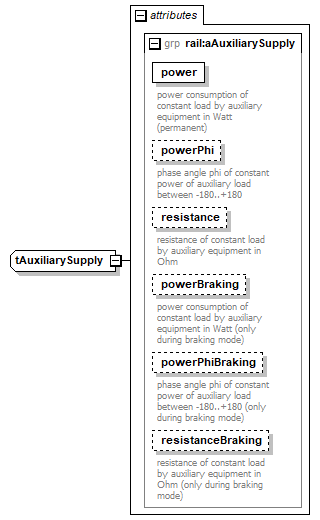 |
||||||||||||||||||||||||||||||||||||||||||||||||||||||
| namespace | https://www.railml.org/schemas/2018 | ||||||||||||||||||||||||||||||||||||||||||||||||||||||
| used by |
|
||||||||||||||||||||||||||||||||||||||||||||||||||||||
| attributes |
|
||||||||||||||||||||||||||||||||||||||||||||||||||||||
| source | <xs:complexType name="tAuxiliarySupply"> <xs:attributeGroup ref="rail:aAuxiliarySupply"/> </xs:complexType> |
complexType tAuxiliarySupplySystem
| diagram | 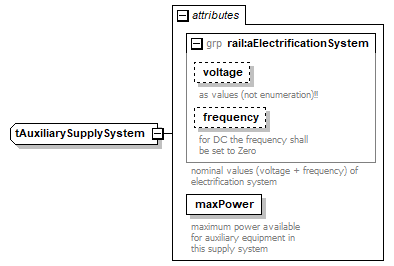 |
||||||||||||||||||||||||||||||
| namespace | https://www.railml.org/schemas/2018 | ||||||||||||||||||||||||||||||
| used by |
|
||||||||||||||||||||||||||||||
| attributes |
|
||||||||||||||||||||||||||||||
| source | <xs:complexType name="tAuxiliarySupplySystem"> <xs:attributeGroup ref="rail:aElectrificationSystem"/> <xs:attribute name="maxPower" type="rail:tPowerWatt" use="required"> <xs:annotation> <xs:documentation>maximum power available for auxiliary equipment in this supply system</xs:documentation> </xs:annotation> </xs:attribute> </xs:complexType> |
attribute tAuxiliarySupplySystem/@maxPower
| type | rail:tPowerWatt | ||||||
| properties |
|
||||||
| facets |
|
||||||
| annotation |
|
||||||
| source | <xs:attribute name="maxPower" type="rail:tPowerWatt" use="required"> <xs:annotation> <xs:documentation>maximum power available for auxiliary equipment in this supply system</xs:documentation> </xs:annotation> </xs:attribute> |
complexType tBasicBrakeOperation
| diagram | 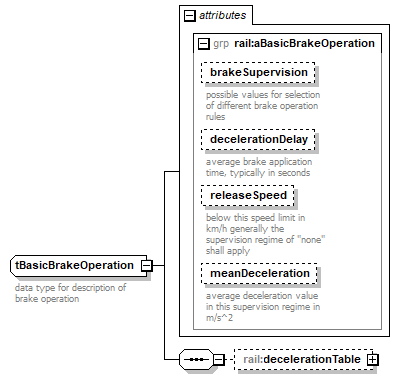 |
||||||||||||||||||||||||||||||||||||||
| namespace | https://www.railml.org/schemas/2018 | ||||||||||||||||||||||||||||||||||||||
| children | rail:decelerationTable | ||||||||||||||||||||||||||||||||||||||
| used by |
|
||||||||||||||||||||||||||||||||||||||
| attributes |
|
||||||||||||||||||||||||||||||||||||||
| annotation |
|
||||||||||||||||||||||||||||||||||||||
| source | <xs:complexType name="tBasicBrakeOperation"> <xs:annotation> <xs:documentation>data type for description of brake operation</xs:documentation> </xs:annotation> <xs:sequence> <xs:element name="decelerationTable" type="rail:tDecelerationCurve" minOccurs="0"/> </xs:sequence> <xs:attributeGroup ref="rail:aBasicBrakeOperation"/> </xs:complexType> |
element tBasicBrakeOperation/decelerationTable
| diagram | 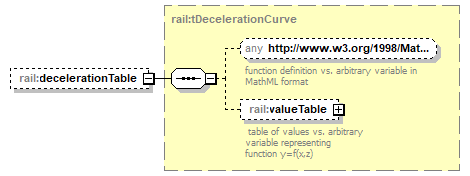 |
||||||
| namespace | https://www.railml.org/schemas/2018 | ||||||
| type | rail:tDecelerationCurve | ||||||
| properties |
|
||||||
| children | rail:valueTable | ||||||
| source | <xs:element name="decelerationTable" type="rail:tDecelerationCurve" minOccurs="0"/> |
complexType tCurrentCurve
| diagram | 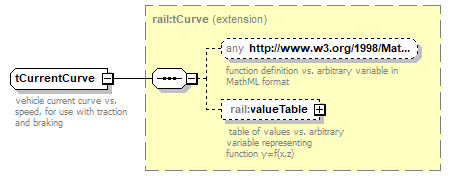 |
||
| namespace | https://www.railml.org/schemas/2018 | ||
| type | extension of rail:tCurve | ||
| properties |
|
||
| children | rail:valueTable | ||
| used by |
|
||
| annotation |
|
||
| source | <xs:complexType name="tCurrentCurve"> <xs:annotation> <xs:documentation>vehicle current curve vs. speed, for use with traction and braking</xs:documentation> </xs:annotation> <xs:complexContent> <xs:extension base="rail:tCurve"/> </xs:complexContent> </xs:complexType> |
complexType tCurrentLimitation
| diagram | 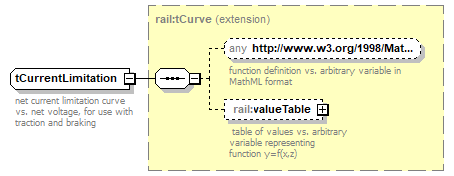 |
||
| namespace | https://www.railml.org/schemas/2018 | ||
| type | extension of rail:tCurve | ||
| properties |
|
||
| children | rail:valueTable | ||
| used by |
|
||
| annotation |
|
||
| source | <xs:complexType name="tCurrentLimitation"> <xs:annotation> <xs:documentation>net current limitation curve vs. net voltage, for use with traction and braking</xs:documentation> </xs:annotation> <xs:complexContent> <xs:extension base="rail:tCurve"/> </xs:complexContent> </xs:complexType> |
complexType tCurve
| diagram |  |
||||
| namespace | https://www.railml.org/schemas/2018 | ||||
| children | rail:valueTable | ||||
| used by |
|
||||
| annotation |
|
||||
| source | <xs:complexType name="tCurve"> <xs:annotation> <xs:documentation>generic curve of function y=f(x,z)</xs:documentation> </xs:annotation> <xs:sequence> <xs:any namespace="http://www.w3.org/1998/Math/MathML" processContents="strict" minOccurs="0"> <xs:annotation> <xs:documentation>function definition vs. arbitrary variable in MathML format</xs:documentation> </xs:annotation> </xs:any> <xs:element name="valueTable" minOccurs="0"> <xs:annotation> <xs:documentation> table of values vs. arbitrary variable representing function y=f(x,z)</xs:documentation> <xs:documentation source="http://wiki.railml.org/index.php?title=RS:valueTable_phi"/> <xs:documentation source="http://wiki.railml.org/index.php?title=RS:valueTable_trainResistance"/> <xs:documentation source="http://wiki.railml.org/index.php?title=RS:valueTable_mechanicalLosses"/> <xs:documentation source="http://wiki.railml.org/index.php?title=RS:valueTable_tractiveEffort"/> <xs:documentation source="http://wiki.railml.org/index.php?title=RS:valueTable_brakeEffort"/> <xs:documentation source="http://wiki.railml.org/index.php?title=RS:valueTable_mechanicalBrakeEffort"/> <xs:documentation source="http://wiki.railml.org/index.php?title=RS:valueTable_tractiveCurrent"/> <xs:documentation source="http://wiki.railml.org/index.php?title=RS:valueTable_brakeCurrent"/> <xs:documentation source="http://wiki.railml.org/index.php?title=RS:valueTable_tractiveCurrentLimitation"/> <xs:documentation source="http://wiki.railml.org/index.php?title=RS:valueTable_brakeCurrentLimitation"/> <xs:documentation source="http://wiki.railml.org/index.php?title=RS:valueTable_tractiveVehicleEfficiency"/> <xs:documentation source="http://wiki.railml.org/index.php?title=RS:valueTable_brakeVehicleEfficiency"/> <xs:documentation source="http://wiki.railml.org/index.php?title=RS:valueTable_efficiency_energyStorage"/> <xs:documentation source="http://wiki.railml.org/index.php?title=RS:valueTable_efficiency_transformer"/> <xs:documentation source="http://wiki.railml.org/index.php?title=RS:valueTable_efficiency_fourQuadrantChopper"/> <xs:documentation source="http://wiki.railml.org/index.php?title=RS:valueTable_efficiency_tractionInverter"/> <xs:documentation source="http://wiki.railml.org/index.php?title=RS:valueTable_efficiency_tractionMotor"/> <xs:documentation source="http://wiki.railml.org/index.php?title=RS:valueTable_efficiency_gear"/> </xs:annotation> <xs:complexType> <xs:complexContent> <xs:extension base="rail:tValueTable"/> </xs:complexContent> </xs:complexType> </xs:element> </xs:sequence> </xs:complexType> |
element tCurve/valueTable
| diagram | 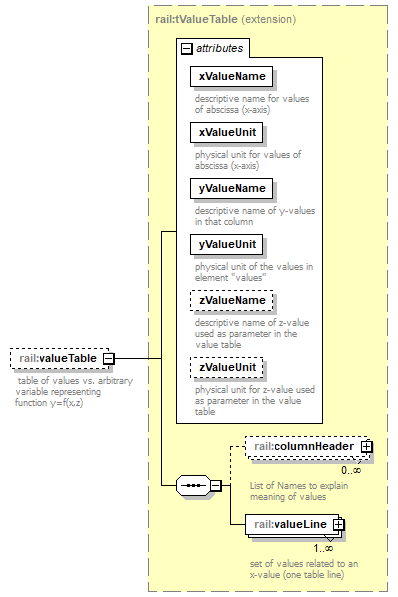 |
||||||||||||||||||||||||||||||||||||||||||||||||||||||
| namespace | https://www.railml.org/schemas/2018 | ||||||||||||||||||||||||||||||||||||||||||||||||||||||
| type | extension of rail:tValueTable | ||||||||||||||||||||||||||||||||||||||||||||||||||||||
| properties |
|
||||||||||||||||||||||||||||||||||||||||||||||||||||||
| children | rail:columnHeader rail:valueLine | ||||||||||||||||||||||||||||||||||||||||||||||||||||||
| attributes |
|
||||||||||||||||||||||||||||||||||||||||||||||||||||||
| annotation |
|
||||||||||||||||||||||||||||||||||||||||||||||||||||||
| source | <xs:element name="valueTable" minOccurs="0"> <xs:annotation> <xs:documentation> table of values vs. arbitrary variable representing function y=f(x,z)</xs:documentation> <xs:documentation source="http://wiki.railml.org/index.php?title=RS:valueTable_phi"/> <xs:documentation source="http://wiki.railml.org/index.php?title=RS:valueTable_trainResistance"/> <xs:documentation source="http://wiki.railml.org/index.php?title=RS:valueTable_mechanicalLosses"/> <xs:documentation source="http://wiki.railml.org/index.php?title=RS:valueTable_tractiveEffort"/> <xs:documentation source="http://wiki.railml.org/index.php?title=RS:valueTable_brakeEffort"/> <xs:documentation source="http://wiki.railml.org/index.php?title=RS:valueTable_mechanicalBrakeEffort"/> <xs:documentation source="http://wiki.railml.org/index.php?title=RS:valueTable_tractiveCurrent"/> <xs:documentation source="http://wiki.railml.org/index.php?title=RS:valueTable_brakeCurrent"/> <xs:documentation source="http://wiki.railml.org/index.php?title=RS:valueTable_tractiveCurrentLimitation"/> <xs:documentation source="http://wiki.railml.org/index.php?title=RS:valueTable_brakeCurrentLimitation"/> <xs:documentation source="http://wiki.railml.org/index.php?title=RS:valueTable_tractiveVehicleEfficiency"/> <xs:documentation source="http://wiki.railml.org/index.php?title=RS:valueTable_brakeVehicleEfficiency"/> <xs:documentation source="http://wiki.railml.org/index.php?title=RS:valueTable_efficiency_energyStorage"/> <xs:documentation source="http://wiki.railml.org/index.php?title=RS:valueTable_efficiency_transformer"/> <xs:documentation source="http://wiki.railml.org/index.php?title=RS:valueTable_efficiency_fourQuadrantChopper"/> <xs:documentation source="http://wiki.railml.org/index.php?title=RS:valueTable_efficiency_tractionInverter"/> <xs:documentation source="http://wiki.railml.org/index.php?title=RS:valueTable_efficiency_tractionMotor"/> <xs:documentation source="http://wiki.railml.org/index.php?title=RS:valueTable_efficiency_gear"/> </xs:annotation> <xs:complexType> <xs:complexContent> <xs:extension base="rail:tValueTable"/> </xs:complexContent> </xs:complexType> </xs:element> |
complexType tCurvingLimitationType
| diagram | 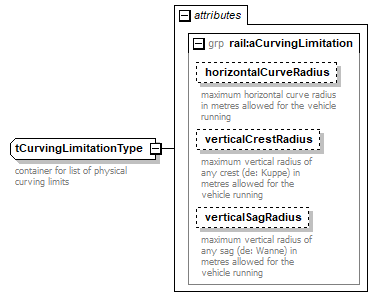 |
||||||||||||||||||||||||||||||
| namespace | https://www.railml.org/schemas/2018 | ||||||||||||||||||||||||||||||
| used by |
|
||||||||||||||||||||||||||||||
| attributes |
|
||||||||||||||||||||||||||||||
| annotation |
|
||||||||||||||||||||||||||||||
| source | <xs:complexType name="tCurvingLimitationType"> <xs:annotation> <xs:documentation>container for list of physical curving limits</xs:documentation> </xs:annotation> <xs:attributeGroup ref="rail:aCurvingLimitation"/> </xs:complexType> |
complexType tDecelerationCurve
| diagram | 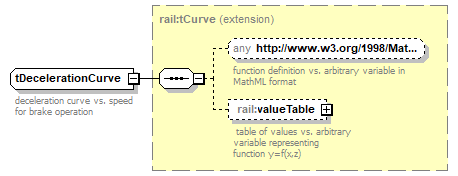 |
||
| namespace | https://www.railml.org/schemas/2018 | ||
| type | extension of rail:tCurve | ||
| properties |
|
||
| children | rail:valueTable | ||
| used by |
|
||
| annotation |
|
||
| source | <xs:complexType name="tDecelerationCurve"> <xs:annotation> <xs:documentation>deceleration curve vs. speed for brake operation</xs:documentation> </xs:annotation> <xs:complexContent> <xs:extension base="rail:tCurve"/> </xs:complexContent> </xs:complexType> |
complexType tDieselEngine
| diagram | 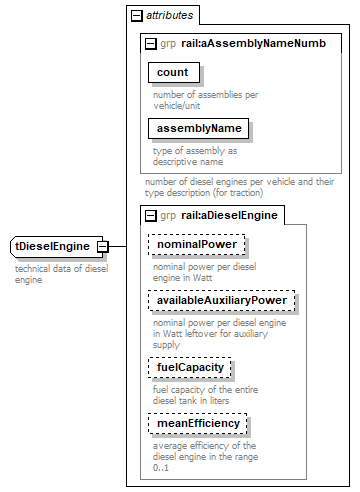 |
||||||||||||||||||||||||||||||||||||||||||||||||||||||
| namespace | https://www.railml.org/schemas/2018 | ||||||||||||||||||||||||||||||||||||||||||||||||||||||
| used by |
|
||||||||||||||||||||||||||||||||||||||||||||||||||||||
| attributes |
|
||||||||||||||||||||||||||||||||||||||||||||||||||||||
| annotation |
|
||||||||||||||||||||||||||||||||||||||||||||||||||||||
| source | <xs:complexType name="tDieselEngine"> <xs:annotation> <xs:documentation>technical data of diesel engine</xs:documentation> </xs:annotation> <xs:attributeGroup ref="rail:aAssemblyNameNumber"> <xs:annotation> <xs:documentation>number of diesel engines per vehicle and their type description (for traction)</xs:documentation> </xs:annotation> </xs:attributeGroup> <xs:attributeGroup ref="rail:aDieselEngine"/> </xs:complexType> |
complexType tDoors
| diagram | 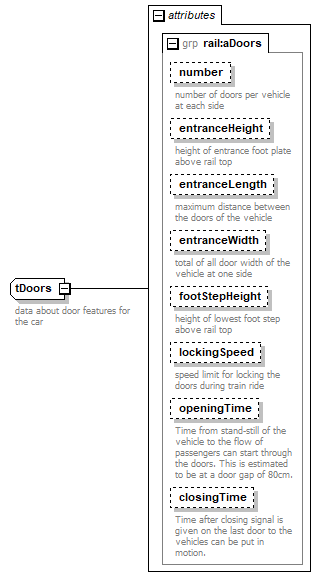 |
||||||||||||||||||||||||||||||||||||||||||||||||||||||||||||||||||||||
| namespace | https://www.railml.org/schemas/2018 | ||||||||||||||||||||||||||||||||||||||||||||||||||||||||||||||||||||||
| used by |
|
||||||||||||||||||||||||||||||||||||||||||||||||||||||||||||||||||||||
| attributes |
|
||||||||||||||||||||||||||||||||||||||||||||||||||||||||||||||||||||||
| annotation |
|
||||||||||||||||||||||||||||||||||||||||||||||||||||||||||||||||||||||
| source | <xs:complexType name="tDoors"> <xs:annotation> <xs:documentation>data about door features for the car</xs:documentation> </xs:annotation> <xs:attributeGroup ref="rail:aDoors"/> </xs:complexType> |
complexType tDriversCabType
| diagram | 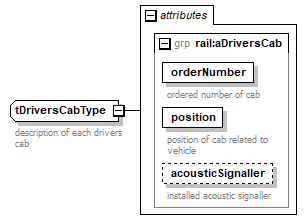 |
||||||||||||||||||||||||||||||
| namespace | https://www.railml.org/schemas/2018 | ||||||||||||||||||||||||||||||
| used by |
|
||||||||||||||||||||||||||||||
| attributes |
|
||||||||||||||||||||||||||||||
| annotation |
|
||||||||||||||||||||||||||||||
| source | <xs:complexType name="tDriversCabType"> <xs:annotation> <xs:documentation>description of each drivers cab</xs:documentation> </xs:annotation> <xs:attributeGroup ref="rail:aDriversCab"/> </xs:complexType> |
complexType tEddyCurrentBrake
| diagram | 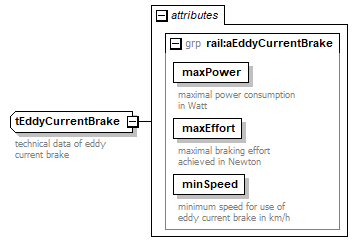 |
||||||||||||||||||||||||||||||
| namespace | https://www.railml.org/schemas/2018 | ||||||||||||||||||||||||||||||
| used by |
|
||||||||||||||||||||||||||||||
| attributes |
|
||||||||||||||||||||||||||||||
| annotation |
|
||||||||||||||||||||||||||||||
| source | <xs:complexType name="tEddyCurrentBrake"> <xs:annotation> <xs:documentation>technical data of eddy current brake</xs:documentation> </xs:annotation> <xs:attributeGroup ref="rail:aEddyCurrentBrake"/> </xs:complexType> |
complexType tEfficiencyCurve
| diagram | 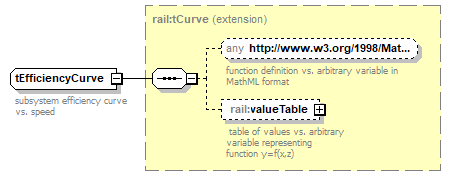 |
||
| namespace | https://www.railml.org/schemas/2018 | ||
| type | extension of rail:tCurve | ||
| properties |
|
||
| children | rail:valueTable | ||
| used by | |||
| annotation |
|
||
| source | <xs:complexType name="tEfficiencyCurve"> <xs:annotation> <xs:documentation>subsystem efficiency curve vs. speed</xs:documentation> </xs:annotation> <xs:complexContent> <xs:extension base="rail:tCurve"/> </xs:complexContent> </xs:complexType> |
complexType tEffortCurve
| diagram | 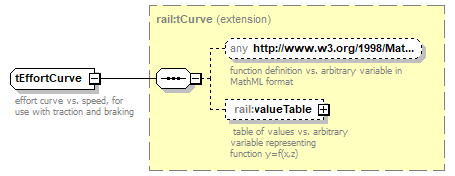 |
||
| namespace | https://www.railml.org/schemas/2018 | ||
| type | extension of rail:tCurve | ||
| properties |
|
||
| children | rail:valueTable | ||
| used by |
|
||
| annotation |
|
||
| source | <xs:complexType name="tEffortCurve"> <xs:annotation> <xs:documentation>effort curve vs. speed, for use with traction and braking</xs:documentation> </xs:annotation> <xs:complexContent> <xs:extension base="rail:tCurve"/> </xs:complexContent> </xs:complexType> |
complexType tElectricalWagonCouplerType
| diagram | 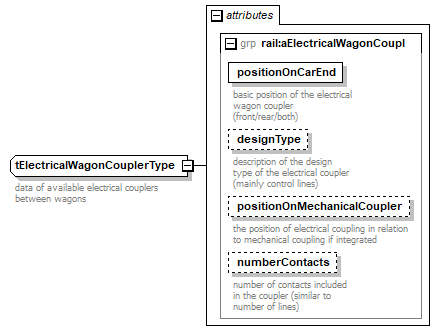 |
||||||||||||||||||||||||||||||||||||||
| namespace | https://www.railml.org/schemas/2018 | ||||||||||||||||||||||||||||||||||||||
| used by |
|
||||||||||||||||||||||||||||||||||||||
| attributes |
|
||||||||||||||||||||||||||||||||||||||
| annotation |
|
||||||||||||||||||||||||||||||||||||||
| source | <xs:complexType name="tElectricalWagonCouplerType"> <xs:annotation> <xs:documentation>data of available electrical couplers between wagons</xs:documentation> </xs:annotation> <xs:attributeGroup ref="rail:aElectricalWagonCoupler"/> </xs:complexType> |
complexType tElectrificationSystem
| diagram | 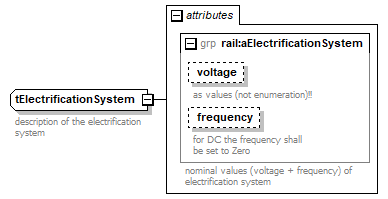 |
||||||||||||||||||||||
| namespace | https://www.railml.org/schemas/2018 | ||||||||||||||||||||||
| used by |
|
||||||||||||||||||||||
| attributes |
|
||||||||||||||||||||||
| annotation |
|
||||||||||||||||||||||
| source | <xs:complexType name="tElectrificationSystem"> <xs:annotation> <xs:documentation>description of the electrification system</xs:documentation> </xs:annotation> <xs:attributeGroup ref="rail:aElectrificationSystem"/> </xs:complexType> |
complexType tEngine
| diagram | 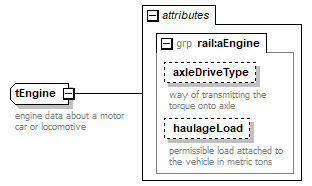 |
||||||||||||||||||||||
| namespace | https://www.railml.org/schemas/2018 | ||||||||||||||||||||||
| used by |
|
||||||||||||||||||||||
| attributes |
|
||||||||||||||||||||||
| annotation |
|
||||||||||||||||||||||
| source | <xs:complexType name="tEngine"> <xs:annotation> <xs:documentation>engine data about a motor car or locomotive</xs:documentation> </xs:annotation> <xs:attributeGroup ref="rail:aEngine"/> </xs:complexType> |
complexType tETCS
| diagram | 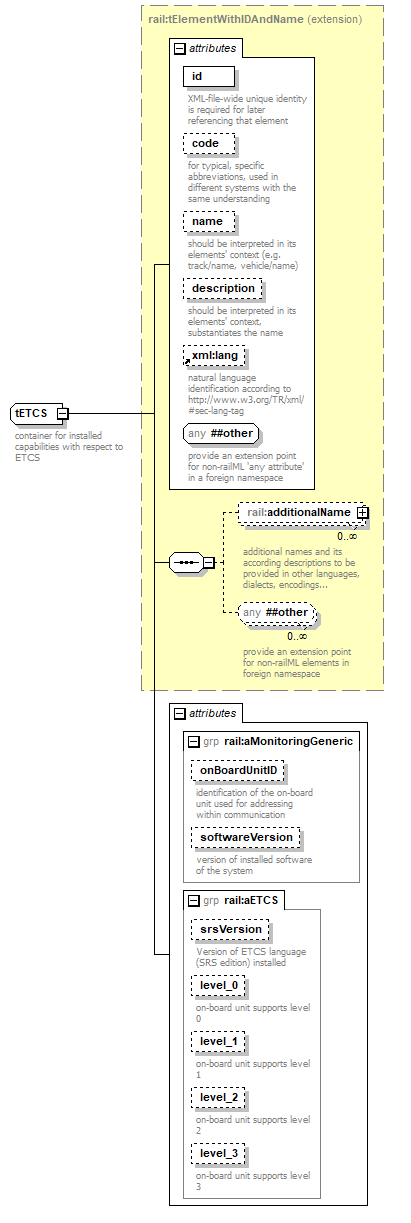 |
||||||||||||||||||||||||||||||||||||||||||||||||||||||||||||||||||||||||||||||||||||||||||||||||||||||
| namespace | https://www.railml.org/schemas/2018 | ||||||||||||||||||||||||||||||||||||||||||||||||||||||||||||||||||||||||||||||||||||||||||||||||||||||
| type | extension of rail:tElementWithIDAndName | ||||||||||||||||||||||||||||||||||||||||||||||||||||||||||||||||||||||||||||||||||||||||||||||||||||||
| properties |
|
||||||||||||||||||||||||||||||||||||||||||||||||||||||||||||||||||||||||||||||||||||||||||||||||||||||
| children | rail:additionalName | ||||||||||||||||||||||||||||||||||||||||||||||||||||||||||||||||||||||||||||||||||||||||||||||||||||||
| used by |
|
||||||||||||||||||||||||||||||||||||||||||||||||||||||||||||||||||||||||||||||||||||||||||||||||||||||
| attributes |
|
||||||||||||||||||||||||||||||||||||||||||||||||||||||||||||||||||||||||||||||||||||||||||||||||||||||
| annotation |
|
||||||||||||||||||||||||||||||||||||||||||||||||||||||||||||||||||||||||||||||||||||||||||||||||||||||
| source | <xs:complexType name="tETCS"> <xs:annotation> <xs:documentation>container for installed capabilities with respect to ETCS</xs:documentation> </xs:annotation> <xs:complexContent> <xs:extension base="rail:tElementWithIDAndName"> <xs:attributeGroup ref="rail:aMonitoringGeneric"/> <xs:attributeGroup ref="rail:aETCS"/> </xs:extension> </xs:complexContent> </xs:complexType> |
complexType tFormation
| diagram |  |
||||||||||||||||||||||||||||||||||||||||||||||||||||||||||||||||||||||||||||||||||||||||||||||||||||||||||||||
| namespace | https://www.railml.org/schemas/2018 | ||||||||||||||||||||||||||||||||||||||||||||||||||||||||||||||||||||||||||||||||||||||||||||||||||||||||||||||
| type | extension of rail:tElementWithIDAndName | ||||||||||||||||||||||||||||||||||||||||||||||||||||||||||||||||||||||||||||||||||||||||||||||||||||||||||||||
| properties |
|
||||||||||||||||||||||||||||||||||||||||||||||||||||||||||||||||||||||||||||||||||||||||||||||||||||||||||||||
| children | rail:additionalName | ||||||||||||||||||||||||||||||||||||||||||||||||||||||||||||||||||||||||||||||||||||||||||||||||||||||||||||||
| used by |
|
||||||||||||||||||||||||||||||||||||||||||||||||||||||||||||||||||||||||||||||||||||||||||||||||||||||||||||||
| attributes |
|
||||||||||||||||||||||||||||||||||||||||||||||||||||||||||||||||||||||||||||||||||||||||||||||||||||||||||||||
| annotation |
|
||||||||||||||||||||||||||||||||||||||||||||||||||||||||||||||||||||||||||||||||||||||||||||||||||||||||||||||
| source | <xs:complexType name="tFormation"> <xs:annotation> <xs:documentation>data for a single train formation made of rs-vehicles</xs:documentation> </xs:annotation> <xs:complexContent> <xs:extension base="rail:tElementWithIDAndName"> <xs:attributeGroup ref="rail:aFormation"/> </xs:extension> </xs:complexContent> </xs:complexType> |
complexType tFourQuadrantChopper
| diagram | 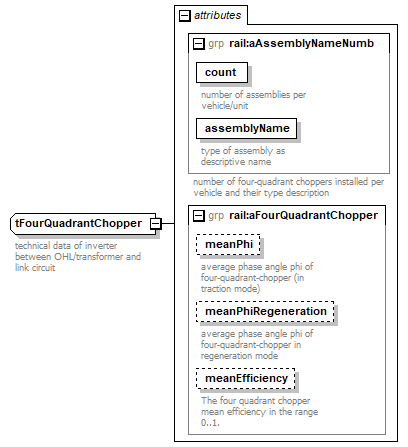 |
||||||||||||||||||||||||||||||||||||||||||||||
| namespace | https://www.railml.org/schemas/2018 | ||||||||||||||||||||||||||||||||||||||||||||||
| used by |
|
||||||||||||||||||||||||||||||||||||||||||||||
| attributes |
|
||||||||||||||||||||||||||||||||||||||||||||||
| annotation |
|
||||||||||||||||||||||||||||||||||||||||||||||
| source | <xs:complexType name="tFourQuadrantChopper"> <xs:annotation> <xs:documentation>technical data of inverter between OHL/transformer and link circuit</xs:documentation> </xs:annotation> <xs:attributeGroup ref="rail:aAssemblyNameNumber"> <xs:annotation> <xs:documentation>number of four-quadrant choppers installed per vehicle and their type description</xs:documentation> </xs:annotation> </xs:attributeGroup> <xs:attributeGroup ref="rail:aFourQuadrantChopper"/> </xs:complexType> |
complexType tGangway
| diagram | 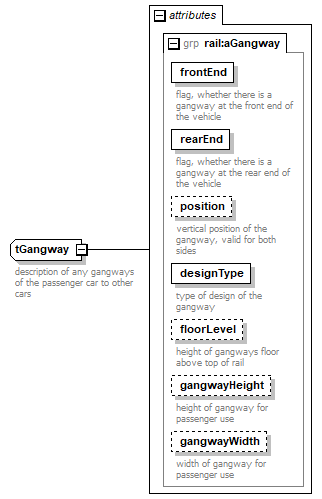 |
||||||||||||||||||||||||||||||||||||||||||||||||||||||||||||||
| namespace | https://www.railml.org/schemas/2018 | ||||||||||||||||||||||||||||||||||||||||||||||||||||||||||||||
| used by |
|
||||||||||||||||||||||||||||||||||||||||||||||||||||||||||||||
| attributes |
|
||||||||||||||||||||||||||||||||||||||||||||||||||||||||||||||
| annotation |
|
||||||||||||||||||||||||||||||||||||||||||||||||||||||||||||||
| source | <xs:complexType name="tGangway"> <xs:annotation> <xs:documentation>description of any gangways of the passenger car to other cars</xs:documentation> </xs:annotation> <xs:attributeGroup ref="rail:aGangway"/> </xs:complexType> |
complexType tGear
| diagram | 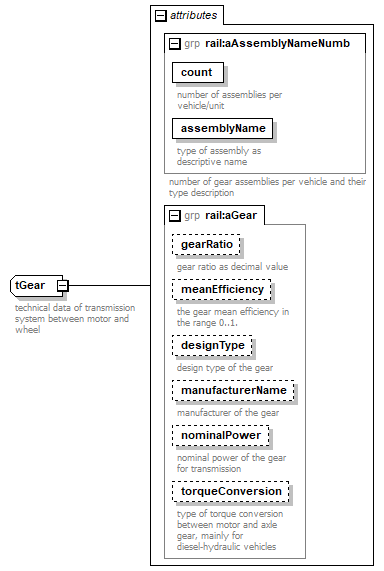 |
||||||||||||||||||||||||||||||||||||||||||||||||||||||||||||||||||||||
| namespace | https://www.railml.org/schemas/2018 | ||||||||||||||||||||||||||||||||||||||||||||||||||||||||||||||||||||||
| used by |
|
||||||||||||||||||||||||||||||||||||||||||||||||||||||||||||||||||||||
| attributes |
|
||||||||||||||||||||||||||||||||||||||||||||||||||||||||||||||||||||||
| annotation |
|
||||||||||||||||||||||||||||||||||||||||||||||||||||||||||||||||||||||
| source | <xs:complexType name="tGear"> <xs:annotation> <xs:documentation>technical data of transmission system between motor and wheel</xs:documentation> </xs:annotation> <xs:attributeGroup ref="rail:aAssemblyNameNumber"> <xs:annotation> <xs:documentation>number of gear assemblies per vehicle and their type description</xs:documentation> </xs:annotation> </xs:attributeGroup> <xs:attributeGroup ref="rail:aGear"/> </xs:complexType> |
complexType tGoods
| diagram | 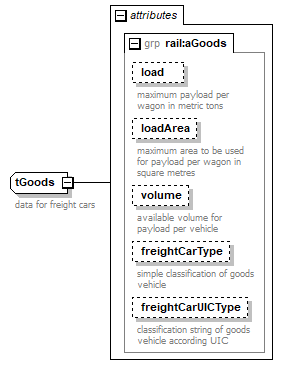 |
||||||||||||||||||||||||||||||||||||||||||||||
| namespace | https://www.railml.org/schemas/2018 | ||||||||||||||||||||||||||||||||||||||||||||||
| used by |
|
||||||||||||||||||||||||||||||||||||||||||||||
| attributes |
|
||||||||||||||||||||||||||||||||||||||||||||||
| annotation |
|
||||||||||||||||||||||||||||||||||||||||||||||
| source | <xs:complexType name="tGoods"> <xs:annotation> <xs:documentation>data for freight cars</xs:documentation> </xs:annotation> <xs:attributeGroup ref="rail:aGoods"/> </xs:complexType> |
complexType tLineClassification
| diagram | 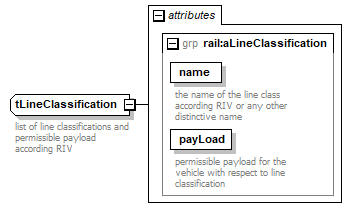 |
||||||||||||||||||||||
| namespace | https://www.railml.org/schemas/2018 | ||||||||||||||||||||||
| used by |
|
||||||||||||||||||||||
| attributes |
|
||||||||||||||||||||||
| annotation |
|
||||||||||||||||||||||
| source | <xs:complexType name="tLineClassification"> <xs:annotation> <xs:documentation>list of line classifications and permissible payload according RIV</xs:documentation> </xs:annotation> <xs:attributeGroup ref="rail:aLineClassification"/> </xs:complexType> |
complexType tLink
| diagram | 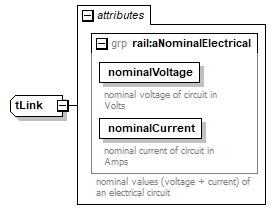 |
||||||||||||||||||||||
| namespace | https://www.railml.org/schemas/2018 | ||||||||||||||||||||||
| used by |
|
||||||||||||||||||||||
| attributes |
|
||||||||||||||||||||||
| source | <xs:complexType name="tLink"> <xs:attributeGroup ref="rail:aNominalElectrical"/> </xs:complexType> |
complexType tLoadLimitMatrixType
| diagram | 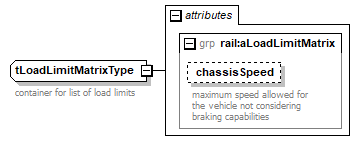 |
||||||||||||||
| namespace | https://www.railml.org/schemas/2018 | ||||||||||||||
| used by |
|
||||||||||||||
| attributes |
|
||||||||||||||
| annotation |
|
||||||||||||||
| source | <xs:complexType name="tLoadLimitMatrixType"> <xs:annotation> <xs:documentation>container for list of load limits</xs:documentation> </xs:annotation> <xs:attributeGroup ref="rail:aLoadLimitMatrix"/> </xs:complexType> |
complexType tLoadLimitType
| diagram | 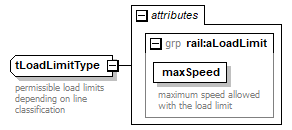 |
||||||||||||||
| namespace | https://www.railml.org/schemas/2018 | ||||||||||||||
| used by |
|
||||||||||||||
| attributes |
|
||||||||||||||
| annotation |
|
||||||||||||||
| source | <xs:complexType name="tLoadLimitType"> <xs:annotation> <xs:documentation>permissible load limits depending on line classification</xs:documentation> </xs:annotation> <xs:attributeGroup ref="rail:aLoadLimit"/> </xs:complexType> |
complexType tLosses
| diagram | 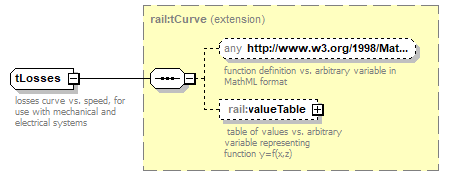 |
||
| namespace | https://www.railml.org/schemas/2018 | ||
| type | extension of rail:tCurve | ||
| properties |
|
||
| children | rail:valueTable | ||
| used by |
|
||
| annotation |
|
||
| source | <xs:complexType name="tLosses"> <xs:annotation> <xs:documentation>losses curve vs. speed, for use with mechanical and electrical systems</xs:documentation> </xs:annotation> <xs:complexContent> <xs:extension base="rail:tCurve"/> </xs:complexContent> </xs:complexType> |
complexType tMaintenanceInterval
| diagram | 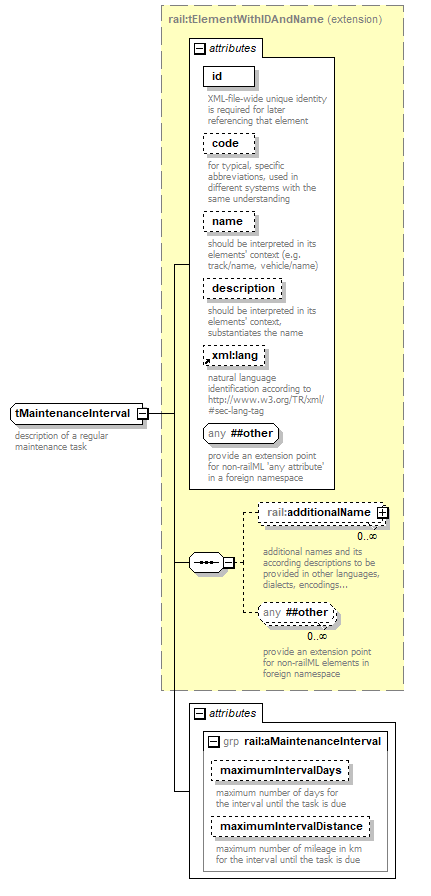 |
||||||||||||||||||||||||||||||||||||||||||||||||||||||||||||||
| namespace | https://www.railml.org/schemas/2018 | ||||||||||||||||||||||||||||||||||||||||||||||||||||||||||||||
| type | extension of rail:tElementWithIDAndName | ||||||||||||||||||||||||||||||||||||||||||||||||||||||||||||||
| properties |
|
||||||||||||||||||||||||||||||||||||||||||||||||||||||||||||||
| children | rail:additionalName | ||||||||||||||||||||||||||||||||||||||||||||||||||||||||||||||
| used by |
|
||||||||||||||||||||||||||||||||||||||||||||||||||||||||||||||
| attributes |
|
||||||||||||||||||||||||||||||||||||||||||||||||||||||||||||||
| annotation |
|
||||||||||||||||||||||||||||||||||||||||||||||||||||||||||||||
| source | <xs:complexType name="tMaintenanceInterval"> <xs:annotation> <xs:documentation>description of a regular maintenance task</xs:documentation> </xs:annotation> <xs:complexContent> <xs:extension base="rail:tElementWithIDAndName"> <xs:attributeGroup ref="rail:aMaintenanceInterval"/> </xs:extension> </xs:complexContent> </xs:complexType> |
complexType tManufacturer
| diagram | 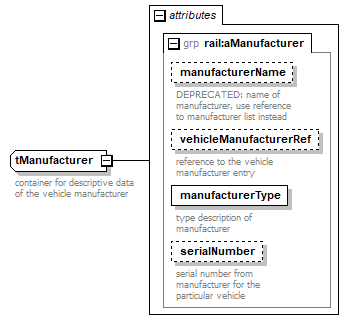 |
||||||||||||||||||||||||||||||||||||||
| namespace | https://www.railml.org/schemas/2018 | ||||||||||||||||||||||||||||||||||||||
| used by |
|
||||||||||||||||||||||||||||||||||||||
| attributes |
|
||||||||||||||||||||||||||||||||||||||
| annotation |
|
||||||||||||||||||||||||||||||||||||||
| source | <xs:complexType name="tManufacturer"> <xs:annotation> <xs:documentation>container for descriptive data of the vehicle manufacturer</xs:documentation> </xs:annotation> <xs:attributeGroup ref="rail:aManufacturer"/> </xs:complexType> |
complexType tMechanicalWagonCouplerType
| diagram | 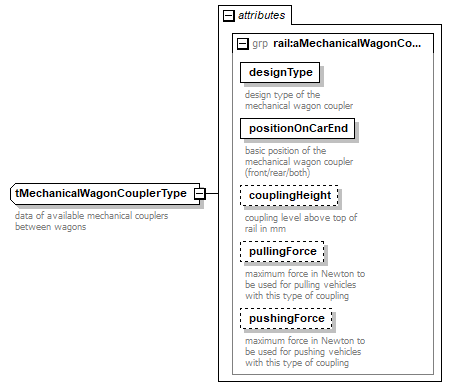 |
||||||||||||||||||||||||||||||||||||||||||||||
| namespace | https://www.railml.org/schemas/2018 | ||||||||||||||||||||||||||||||||||||||||||||||
| used by |
|
||||||||||||||||||||||||||||||||||||||||||||||
| attributes |
|
||||||||||||||||||||||||||||||||||||||||||||||
| annotation |
|
||||||||||||||||||||||||||||||||||||||||||||||
| source | <xs:complexType name="tMechanicalWagonCouplerType"> <xs:annotation> <xs:documentation>data of available mechanical couplers between wagons</xs:documentation> </xs:annotation> <xs:attributeGroup ref="rail:aMechanicalWagonCoupler"/> </xs:complexType> |
complexType tMonitoring
| diagram |  |
||
| namespace | https://www.railml.org/schemas/2018 | ||
| used by |
|
||
| annotation |
|
||
| source | <xs:complexType name="tMonitoring"> <xs:annotation> <xs:documentation>types of signalling systems fitted to the vehicle</xs:documentation> </xs:annotation> </xs:complexType> |
complexType tNationalSystem
| diagram | 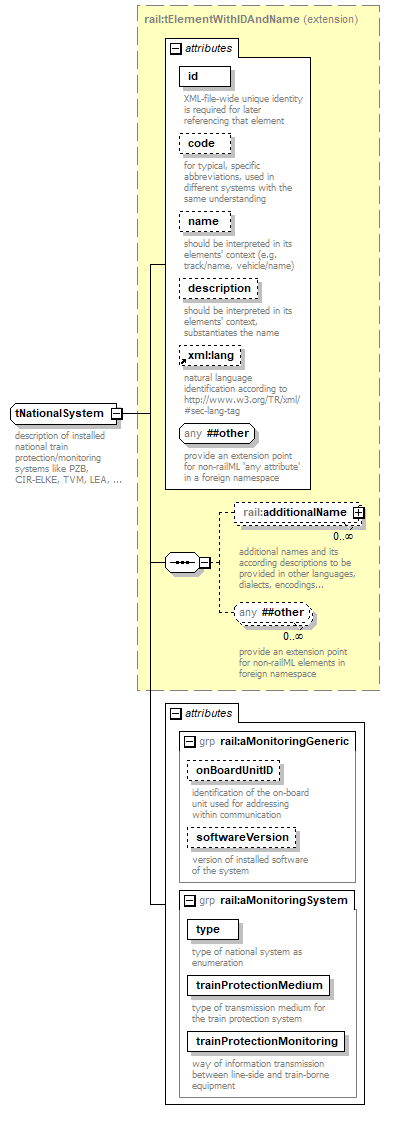 |
||||||||||||||||||||||||||||||||||||||||||||||||||||||||||||||||||||||||||||||||||||||||
| namespace | https://www.railml.org/schemas/2018 | ||||||||||||||||||||||||||||||||||||||||||||||||||||||||||||||||||||||||||||||||||||||||
| type | extension of rail:tElementWithIDAndName | ||||||||||||||||||||||||||||||||||||||||||||||||||||||||||||||||||||||||||||||||||||||||
| properties |
|
||||||||||||||||||||||||||||||||||||||||||||||||||||||||||||||||||||||||||||||||||||||||
| children | rail:additionalName | ||||||||||||||||||||||||||||||||||||||||||||||||||||||||||||||||||||||||||||||||||||||||
| used by |
|
||||||||||||||||||||||||||||||||||||||||||||||||||||||||||||||||||||||||||||||||||||||||
| attributes |
|
||||||||||||||||||||||||||||||||||||||||||||||||||||||||||||||||||||||||||||||||||||||||
| annotation |
|
||||||||||||||||||||||||||||||||||||||||||||||||||||||||||||||||||||||||||||||||||||||||
| source | <xs:complexType name="tNationalSystem"> <xs:annotation> <xs:documentation>description of installed national train protection/monitoring systems like PZB, CIR-ELKE, TVM, LEA, ...</xs:documentation> </xs:annotation> <xs:complexContent> <xs:extension base="rail:tElementWithIDAndName"> <xs:attributeGroup ref="rail:aMonitoringGeneric"/> <xs:attributeGroup ref="rail:aMonitoringSystem"/> </xs:extension> </xs:complexContent> </xs:complexType> |
complexType tOperator
| diagram | 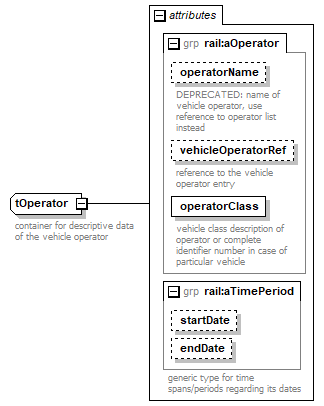 |
||||||||||||||||||||||||||||||||||||||||||
| namespace | https://www.railml.org/schemas/2018 | ||||||||||||||||||||||||||||||||||||||||||
| used by |
|
||||||||||||||||||||||||||||||||||||||||||
| attributes |
|
||||||||||||||||||||||||||||||||||||||||||
| annotation |
|
||||||||||||||||||||||||||||||||||||||||||
| source | <xs:complexType name="tOperator"> <xs:annotation> <xs:documentation>container for descriptive data of the vehicle operator</xs:documentation> </xs:annotation> <xs:attributeGroup ref="rail:aOperator"/> <xs:attributeGroup ref="rail:aTimePeriod"/> </xs:complexType> |
complexType tOtherEquipment
| diagram | 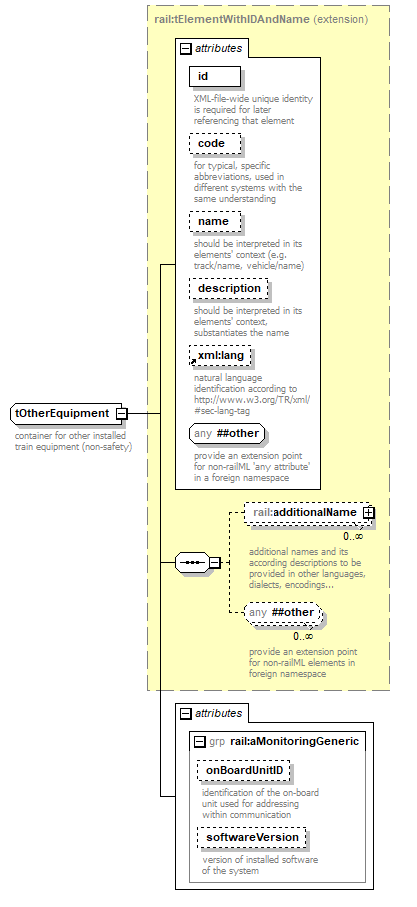 |
||||||||||||||||||||||||||||||||||||||||||||||||||||||||||||||
| namespace | https://www.railml.org/schemas/2018 | ||||||||||||||||||||||||||||||||||||||||||||||||||||||||||||||
| type | extension of rail:tElementWithIDAndName | ||||||||||||||||||||||||||||||||||||||||||||||||||||||||||||||
| properties |
|
||||||||||||||||||||||||||||||||||||||||||||||||||||||||||||||
| children | rail:additionalName | ||||||||||||||||||||||||||||||||||||||||||||||||||||||||||||||
| used by |
|
||||||||||||||||||||||||||||||||||||||||||||||||||||||||||||||
| attributes |
|
||||||||||||||||||||||||||||||||||||||||||||||||||||||||||||||
| annotation |
|
||||||||||||||||||||||||||||||||||||||||||||||||||||||||||||||
| source | <xs:complexType name="tOtherEquipment"> <xs:annotation> <xs:documentation>container for other installed train equipment (non-safety)</xs:documentation> </xs:annotation> <xs:complexContent> <xs:extension base="rail:tElementWithIDAndName"> <xs:attributeGroup ref="rail:aMonitoringGeneric"/> </xs:extension> </xs:complexContent> </xs:complexType> |
complexType tPantograph
| diagram | 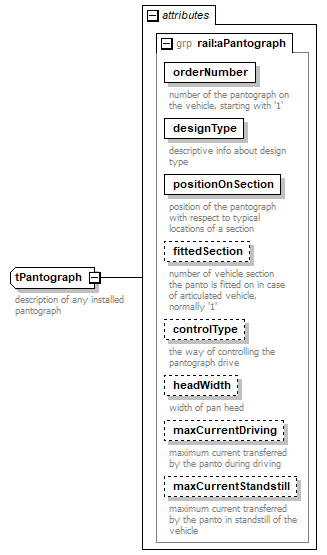 |
||||||||||||||||||||||||||||||||||||||||||||||||||||||||||||||||||||||
| namespace | https://www.railml.org/schemas/2018 | ||||||||||||||||||||||||||||||||||||||||||||||||||||||||||||||||||||||
| used by |
|
||||||||||||||||||||||||||||||||||||||||||||||||||||||||||||||||||||||
| attributes |
|
||||||||||||||||||||||||||||||||||||||||||||||||||||||||||||||||||||||
| annotation |
|
||||||||||||||||||||||||||||||||||||||||||||||||||||||||||||||||||||||
| source | <xs:complexType name="tPantograph"> <xs:annotation> <xs:documentation>description of any installed pantograph</xs:documentation> </xs:annotation> <xs:attributeGroup ref="rail:aPantograph"/> </xs:complexType> |
complexType tPassenger
| diagram | 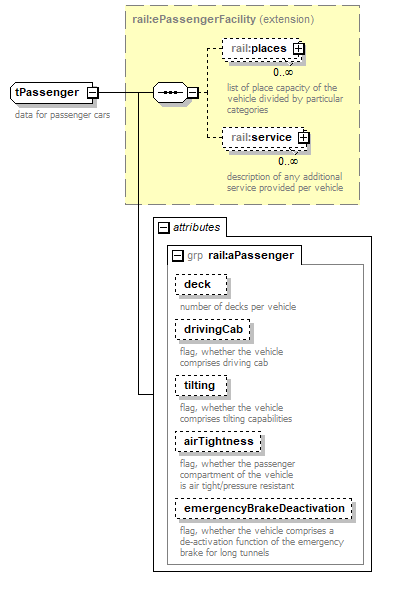 |
||||||||||||||||||||||||||||||||||||||||||||||
| namespace | https://www.railml.org/schemas/2018 | ||||||||||||||||||||||||||||||||||||||||||||||
| type | extension of rail:ePassengerFacility | ||||||||||||||||||||||||||||||||||||||||||||||
| properties |
|
||||||||||||||||||||||||||||||||||||||||||||||
| children | rail:places rail:service | ||||||||||||||||||||||||||||||||||||||||||||||
| used by |
|
||||||||||||||||||||||||||||||||||||||||||||||
| attributes |
|
||||||||||||||||||||||||||||||||||||||||||||||
| annotation |
|
||||||||||||||||||||||||||||||||||||||||||||||
| source | <xs:complexType name="tPassenger"> <xs:annotation> <xs:documentation>data for passenger cars</xs:documentation> </xs:annotation> <xs:complexContent> <xs:extension base="rail:ePassengerFacility"> <xs:attributeGroup ref="rail:aPassenger"/> </xs:extension> </xs:complexContent> </xs:complexType> |
complexType tPassengerFlowSpeed
| diagram | 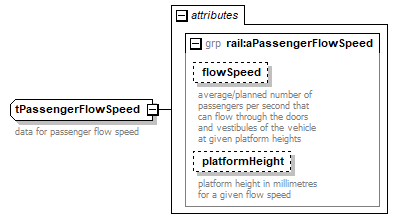 |
||||||||||||||||||||||
| namespace | https://www.railml.org/schemas/2018 | ||||||||||||||||||||||
| used by |
|
||||||||||||||||||||||
| attributes |
|
||||||||||||||||||||||
| annotation |
|
||||||||||||||||||||||
| source | <xs:complexType name="tPassengerFlowSpeed"> <xs:annotation> <xs:documentation>data for passenger flow speed</xs:documentation> </xs:annotation> <xs:attributeGroup ref="rail:aPassengerFlowSpeed"/> </xs:complexType> |
complexType tPneumaticWagonCouplerType
| diagram | 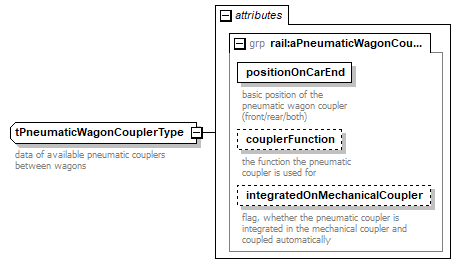 |
||||||||||||||||||||||||||||||
| namespace | https://www.railml.org/schemas/2018 | ||||||||||||||||||||||||||||||
| used by |
|
||||||||||||||||||||||||||||||
| attributes |
|
||||||||||||||||||||||||||||||
| annotation |
|
||||||||||||||||||||||||||||||
| source | <xs:complexType name="tPneumaticWagonCouplerType"> <xs:annotation> <xs:documentation>data of available pneumatic couplers between wagons</xs:documentation> </xs:annotation> <xs:attributeGroup ref="rail:aPneumaticWagonCoupler"/> </xs:complexType> |
complexType tPropulsion
| diagram |  |
||||||||||||||||||||||||||||||||||||||||||||||||||||||||||||||||||||||||||||||||||||||||||||||||||||||||||||||||||||||||||||||||||||||||||||||||||||||||||||||||||||||||||||||||||||||||||||||||||||||||||||||||||||||||||||||||||||||||||||||
| namespace | https://www.railml.org/schemas/2018 | ||||||||||||||||||||||||||||||||||||||||||||||||||||||||||||||||||||||||||||||||||||||||||||||||||||||||||||||||||||||||||||||||||||||||||||||||||||||||||||||||||||||||||||||||||||||||||||||||||||||||||||||||||||||||||||||||||||||||||||||
| type | extension of rail:tElementWithIDAndName | ||||||||||||||||||||||||||||||||||||||||||||||||||||||||||||||||||||||||||||||||||||||||||||||||||||||||||||||||||||||||||||||||||||||||||||||||||||||||||||||||||||||||||||||||||||||||||||||||||||||||||||||||||||||||||||||||||||||||||||||
| properties |
|
||||||||||||||||||||||||||||||||||||||||||||||||||||||||||||||||||||||||||||||||||||||||||||||||||||||||||||||||||||||||||||||||||||||||||||||||||||||||||||||||||||||||||||||||||||||||||||||||||||||||||||||||||||||||||||||||||||||||||||||
| children | rail:additionalName | ||||||||||||||||||||||||||||||||||||||||||||||||||||||||||||||||||||||||||||||||||||||||||||||||||||||||||||||||||||||||||||||||||||||||||||||||||||||||||||||||||||||||||||||||||||||||||||||||||||||||||||||||||||||||||||||||||||||||||||||
| used by |
|
||||||||||||||||||||||||||||||||||||||||||||||||||||||||||||||||||||||||||||||||||||||||||||||||||||||||||||||||||||||||||||||||||||||||||||||||||||||||||||||||||||||||||||||||||||||||||||||||||||||||||||||||||||||||||||||||||||||||||||||
| attributes |
|
||||||||||||||||||||||||||||||||||||||||||||||||||||||||||||||||||||||||||||||||||||||||||||||||||||||||||||||||||||||||||||||||||||||||||||||||||||||||||||||||||||||||||||||||||||||||||||||||||||||||||||||||||||||||||||||||||||||||||||||
| annotation |
|
||||||||||||||||||||||||||||||||||||||||||||||||||||||||||||||||||||||||||||||||||||||||||||||||||||||||||||||||||||||||||||||||||||||||||||||||||||||||||||||||||||||||||||||||||||||||||||||||||||||||||||||||||||||||||||||||||||||||||||||
| source | <xs:complexType name="tPropulsion"> <xs:annotation> <xs:documentation>technical data about the propulsion system of a vehicle</xs:documentation> </xs:annotation> <xs:complexContent> <xs:extension base="rail:tElementWithIDAndName"> <xs:attributeGroup ref="rail:aElectrificationSystem"> <xs:annotation> <xs:documentation>type of power supply system for electric vehicles (voltage + frequency)</xs:documentation> </xs:annotation> </xs:attributeGroup> <xs:attributeGroup ref="rail:aPropulsion"/> </xs:extension> </xs:complexContent> </xs:complexType> |
complexType tRackTractionType
| diagram | 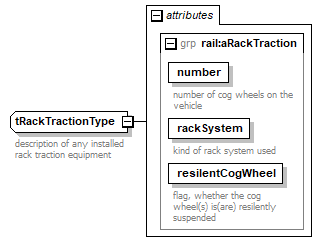 |
||||||||||||||||||||||||||||||
| namespace | https://www.railml.org/schemas/2018 | ||||||||||||||||||||||||||||||
| used by |
|
||||||||||||||||||||||||||||||
| attributes |
|
||||||||||||||||||||||||||||||
| annotation |
|
||||||||||||||||||||||||||||||
| source | <xs:complexType name="tRackTractionType"> <xs:annotation> <xs:documentation>description of any installed rack traction equipment</xs:documentation> </xs:annotation> <xs:attributeGroup ref="rail:aRackTraction"/> </xs:complexType> |
complexType tRailNetwork
| diagram | 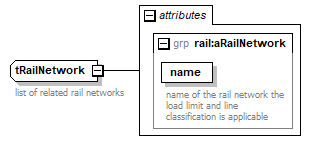 |
||||||||||||||
| namespace | https://www.railml.org/schemas/2018 | ||||||||||||||
| used by |
|
||||||||||||||
| attributes |
|
||||||||||||||
| annotation |
|
||||||||||||||
| source | <xs:complexType name="tRailNetwork"> <xs:annotation> <xs:documentation>list of related rail networks</xs:documentation> </xs:annotation> <xs:attributeGroup ref="rail:aRailNetwork"/> </xs:complexType> |
complexType tRollingstock
| diagram | 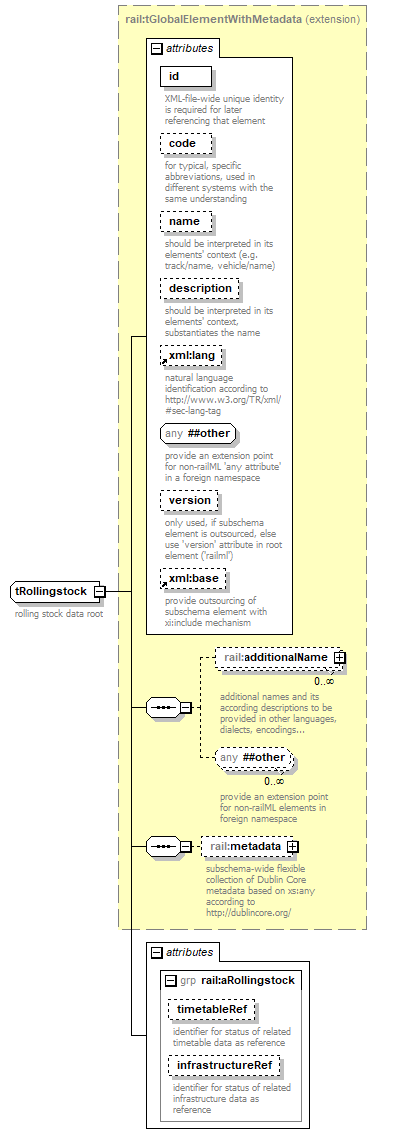 |
||||||||||||||||||||||||||||||||||||||||||||||||||||||||||||||||||||||||||||||
| namespace | https://www.railml.org/schemas/2018 | ||||||||||||||||||||||||||||||||||||||||||||||||||||||||||||||||||||||||||||||
| type | extension of rail:tGlobalElementWithMetadata | ||||||||||||||||||||||||||||||||||||||||||||||||||||||||||||||||||||||||||||||
| properties |
|
||||||||||||||||||||||||||||||||||||||||||||||||||||||||||||||||||||||||||||||
| children | rail:additionalName rail:metadata | ||||||||||||||||||||||||||||||||||||||||||||||||||||||||||||||||||||||||||||||
| used by |
|
||||||||||||||||||||||||||||||||||||||||||||||||||||||||||||||||||||||||||||||
| attributes |
|
||||||||||||||||||||||||||||||||||||||||||||||||||||||||||||||||||||||||||||||
| annotation |
|
||||||||||||||||||||||||||||||||||||||||||||||||||||||||||||||||||||||||||||||
| source | <xs:complexType name="tRollingstock"> <xs:annotation> <xs:documentation>rolling stock data root</xs:documentation> </xs:annotation> <xs:complexContent> <xs:extension base="rail:tGlobalElementWithMetadata"> <xs:attributeGroup ref="rail:aRollingstock"/> </xs:extension> </xs:complexContent> </xs:complexType> |
complexType tSpecificTransmissionModule
| diagram | 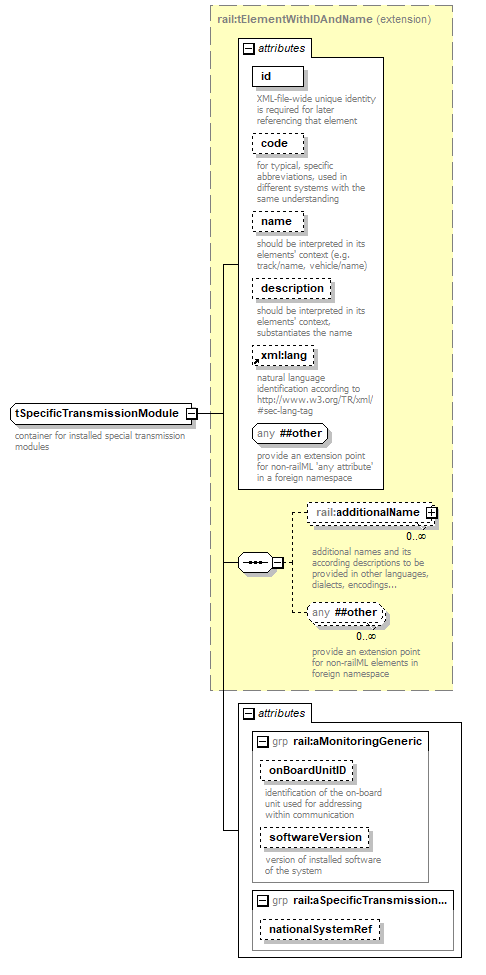 |
||||||||||||||||||||||||||||||||||||||||||||||||||||||||||||||||||||
| namespace | https://www.railml.org/schemas/2018 | ||||||||||||||||||||||||||||||||||||||||||||||||||||||||||||||||||||
| type | extension of rail:tElementWithIDAndName | ||||||||||||||||||||||||||||||||||||||||||||||||||||||||||||||||||||
| properties |
|
||||||||||||||||||||||||||||||||||||||||||||||||||||||||||||||||||||
| children | rail:additionalName | ||||||||||||||||||||||||||||||||||||||||||||||||||||||||||||||||||||
| used by |
|
||||||||||||||||||||||||||||||||||||||||||||||||||||||||||||||||||||
| attributes |
|
||||||||||||||||||||||||||||||||||||||||||||||||||||||||||||||||||||
| annotation |
|
||||||||||||||||||||||||||||||||||||||||||||||||||||||||||||||||||||
| source | <xs:complexType name="tSpecificTransmissionModule"> <xs:annotation> <xs:documentation>container for installed special transmission modules</xs:documentation> </xs:annotation> <xs:complexContent> <xs:extension base="rail:tElementWithIDAndName"> <xs:attributeGroup ref="rail:aMonitoringGeneric"/> <xs:attributeGroup ref="rail:aSpecificTransmissionModule"/> </xs:extension> </xs:complexContent> </xs:complexType> |
complexType tSpeedProfileRefRS
| diagram | 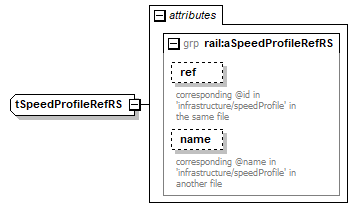 |
||||||||||||||||||||||
| namespace | https://www.railml.org/schemas/2018 | ||||||||||||||||||||||
| used by |
|
||||||||||||||||||||||
| attributes |
|
||||||||||||||||||||||
| source | <xs:complexType name="tSpeedProfileRefRS"> <xs:annotation> <xs:documentation/> </xs:annotation> <xs:attributeGroup ref="rail:aSpeedProfileRefRS"/> </xs:complexType> |
complexType tStorage
| diagram |  |
||||||||||||||||||||||||||||||||||||||||||||||||||||||||||||||||||||||||||||||||||||||||||||||||||||||||||||||
| namespace | https://www.railml.org/schemas/2018 | ||||||||||||||||||||||||||||||||||||||||||||||||||||||||||||||||||||||||||||||||||||||||||||||||||||||||||||||
| type | extension of rail:tElementWithIDAndName | ||||||||||||||||||||||||||||||||||||||||||||||||||||||||||||||||||||||||||||||||||||||||||||||||||||||||||||||
| properties |
|
||||||||||||||||||||||||||||||||||||||||||||||||||||||||||||||||||||||||||||||||||||||||||||||||||||||||||||||
| children | rail:additionalName | ||||||||||||||||||||||||||||||||||||||||||||||||||||||||||||||||||||||||||||||||||||||||||||||||||||||||||||||
| used by |
|
||||||||||||||||||||||||||||||||||||||||||||||||||||||||||||||||||||||||||||||||||||||||||||||||||||||||||||||
| attributes |
|
||||||||||||||||||||||||||||||||||||||||||||||||||||||||||||||||||||||||||||||||||||||||||||||||||||||||||||||
| annotation |
|
||||||||||||||||||||||||||||||||||||||||||||||||||||||||||||||||||||||||||||||||||||||||||||||||||||||||||||||
| source | <xs:complexType name="tStorage"> <xs:annotation> <xs:documentation>technical data of energy storage device</xs:documentation> </xs:annotation> <xs:complexContent> <xs:extension base="rail:tElementWithIDAndName"> <xs:attributeGroup ref="rail:aStorage"/> </xs:extension> </xs:complexContent> </xs:complexType> |
complexType tTechnicalStopActivity
| diagram | 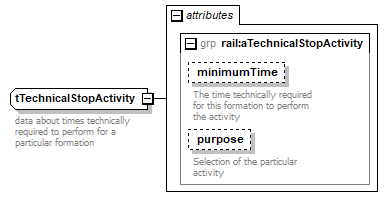 |
||||||||||||||||||||||
| namespace | https://www.railml.org/schemas/2018 | ||||||||||||||||||||||
| used by |
|
||||||||||||||||||||||
| attributes |
|
||||||||||||||||||||||
| annotation |
|
||||||||||||||||||||||
| source | <xs:complexType name="tTechnicalStopActivity"> <xs:annotation> <xs:documentation>data about times technically required to perform for a particular formation</xs:documentation> </xs:annotation> <xs:attributeGroup ref="rail:aTechnicalStopActivity"/> </xs:complexType> |
complexType tTractionInverter
| diagram | 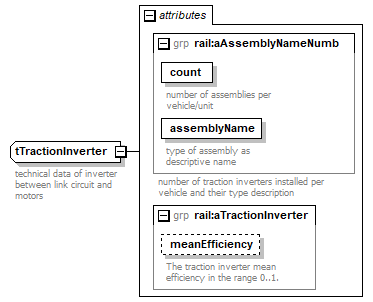 |
||||||||||||||||||||||||||||||
| namespace | https://www.railml.org/schemas/2018 | ||||||||||||||||||||||||||||||
| used by |
|
||||||||||||||||||||||||||||||
| attributes |
|
||||||||||||||||||||||||||||||
| annotation |
|
||||||||||||||||||||||||||||||
| source | <xs:complexType name="tTractionInverter"> <xs:annotation> <xs:documentation>technical data of inverter between link circuit and motors</xs:documentation> </xs:annotation> <xs:attributeGroup ref="rail:aAssemblyNameNumber"> <xs:annotation> <xs:documentation>number of traction inverters installed per vehicle and their type description</xs:documentation> </xs:annotation> </xs:attributeGroup> <xs:attributeGroup ref="rail:aTractionInverter"/> </xs:complexType> |
complexType tTractionMotor
| diagram |  |
||||||||||||||||||||||||||||||||||||||||||||||||||||||||||||||||||||||||||||||||||||||||||||||||||||||||||||||||||||||||||||||||||||||||||||||||||||||
| namespace | https://www.railml.org/schemas/2018 | ||||||||||||||||||||||||||||||||||||||||||||||||||||||||||||||||||||||||||||||||||||||||||||||||||||||||||||||||||||||||||||||||||||||||||||||||||||||
| used by |
|
||||||||||||||||||||||||||||||||||||||||||||||||||||||||||||||||||||||||||||||||||||||||||||||||||||||||||||||||||||||||||||||||||||||||||||||||||||||
| attributes |
|
||||||||||||||||||||||||||||||||||||||||||||||||||||||||||||||||||||||||||||||||||||||||||||||||||||||||||||||||||||||||||||||||||||||||||||||||||||||
| annotation |
|
||||||||||||||||||||||||||||||||||||||||||||||||||||||||||||||||||||||||||||||||||||||||||||||||||||||||||||||||||||||||||||||||||||||||||||||||||||||
| source | <xs:complexType name="tTractionMotor"> <xs:annotation> <xs:documentation>technical data of traction motor</xs:documentation> </xs:annotation> <xs:attributeGroup ref="rail:aAssemblyNameNumber"> <xs:annotation> <xs:documentation>number of traction motors per vehicle and their type description</xs:documentation> </xs:annotation> </xs:attributeGroup> <xs:attributeGroup ref="rail:aTractionMotor"/> </xs:complexType> |
complexType tTrainEngine
| diagram | 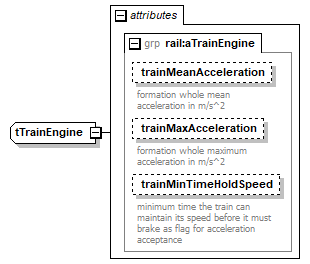 |
||||||||||||||||||||||||||||||
| namespace | https://www.railml.org/schemas/2018 | ||||||||||||||||||||||||||||||
| used by |
|
||||||||||||||||||||||||||||||
| attributes |
|
||||||||||||||||||||||||||||||
| source | <xs:complexType name="tTrainEngine"> <xs:attributeGroup ref="rail:aTrainEngine"/> </xs:complexType> |
complexType tTrainRadio
| diagram | 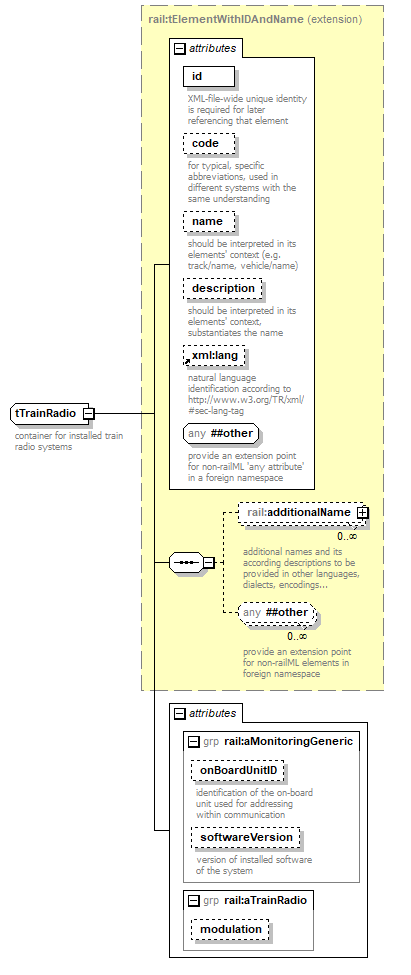 |
||||||||||||||||||||||||||||||||||||||||||||||||||||||||||||||||||||
| namespace | https://www.railml.org/schemas/2018 | ||||||||||||||||||||||||||||||||||||||||||||||||||||||||||||||||||||
| type | extension of rail:tElementWithIDAndName | ||||||||||||||||||||||||||||||||||||||||||||||||||||||||||||||||||||
| properties |
|
||||||||||||||||||||||||||||||||||||||||||||||||||||||||||||||||||||
| children | rail:additionalName | ||||||||||||||||||||||||||||||||||||||||||||||||||||||||||||||||||||
| used by |
|
||||||||||||||||||||||||||||||||||||||||||||||||||||||||||||||||||||
| attributes |
|
||||||||||||||||||||||||||||||||||||||||||||||||||||||||||||||||||||
| annotation |
|
||||||||||||||||||||||||||||||||||||||||||||||||||||||||||||||||||||
| source | <xs:complexType name="tTrainRadio"> <xs:annotation> <xs:documentation>container for installed train radio systems</xs:documentation> </xs:annotation> <xs:complexContent> <xs:extension base="rail:tElementWithIDAndName"> <xs:attributeGroup ref="rail:aMonitoringGeneric"/> <xs:attributeGroup ref="rail:aTrainRadio"/> </xs:extension> </xs:complexContent> </xs:complexType> |
complexType tTrainResistance
| diagram | 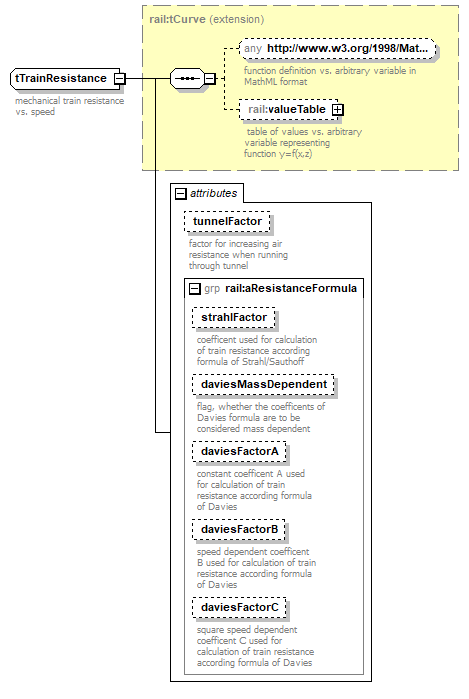 |
||||||||||||||||||||||||||||||||||||||||||||||||||||||
| namespace | https://www.railml.org/schemas/2018 | ||||||||||||||||||||||||||||||||||||||||||||||||||||||
| type | extension of rail:tCurve | ||||||||||||||||||||||||||||||||||||||||||||||||||||||
| properties |
|
||||||||||||||||||||||||||||||||||||||||||||||||||||||
| children | rail:valueTable | ||||||||||||||||||||||||||||||||||||||||||||||||||||||
| used by |
|
||||||||||||||||||||||||||||||||||||||||||||||||||||||
| attributes |
|
||||||||||||||||||||||||||||||||||||||||||||||||||||||
| annotation |
|
||||||||||||||||||||||||||||||||||||||||||||||||||||||
| source | <xs:complexType name="tTrainResistance"> <xs:annotation> <xs:documentation>mechanical train resistance vs. speed</xs:documentation> </xs:annotation> <xs:complexContent> <xs:extension base="rail:tCurve"> <xs:attribute name="tunnelFactor" type="xs:decimal"> <xs:annotation> <xs:documentation>factor for increasing air resistance when running through tunnel</xs:documentation> </xs:annotation> </xs:attribute> <xs:attributeGroup ref="rail:aResistanceFormula"/> </xs:extension> </xs:complexContent> </xs:complexType> |
attribute tTrainResistance/@tunnelFactor
| type | xs:decimal | ||
| annotation |
|
||
| source | <xs:attribute name="tunnelFactor" type="xs:decimal"> <xs:annotation> <xs:documentation>factor for increasing air resistance when running through tunnel</xs:documentation> </xs:annotation> </xs:attribute> |
complexType tTransformer
| diagram | 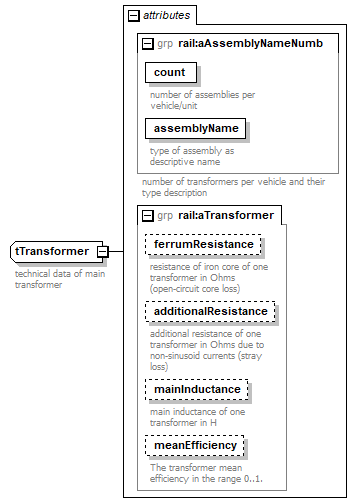 |
||||||||||||||||||||||||||||||||||||||||||||||||||||||
| namespace | https://www.railml.org/schemas/2018 | ||||||||||||||||||||||||||||||||||||||||||||||||||||||
| used by |
|
||||||||||||||||||||||||||||||||||||||||||||||||||||||
| attributes |
|
||||||||||||||||||||||||||||||||||||||||||||||||||||||
| annotation |
|
||||||||||||||||||||||||||||||||||||||||||||||||||||||
| source | <xs:complexType name="tTransformer"> <xs:annotation> <xs:documentation>technical data of main transformer</xs:documentation> </xs:annotation> <xs:attributeGroup ref="rail:aAssemblyNameNumber"> <xs:annotation> <xs:documentation>number of transformers per vehicle and their type description</xs:documentation> </xs:annotation> </xs:attributeGroup> <xs:attributeGroup ref="rail:aTransformer"/> </xs:complexType> |
complexType tValueTable
| diagram | 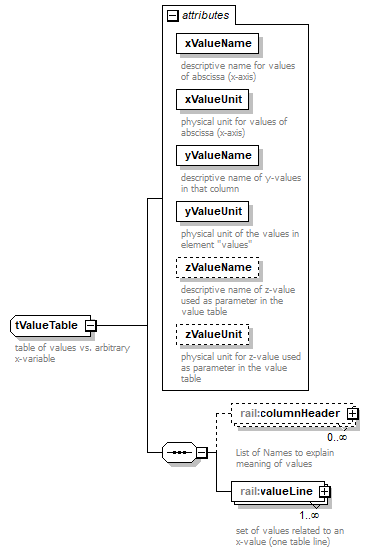 |
||||||||||||||||||||||||||||||||||||||||||||||||||||||
| namespace | https://www.railml.org/schemas/2018 | ||||||||||||||||||||||||||||||||||||||||||||||||||||||
| children | rail:columnHeader rail:valueLine | ||||||||||||||||||||||||||||||||||||||||||||||||||||||
| used by |
|
||||||||||||||||||||||||||||||||||||||||||||||||||||||
| attributes |
|
||||||||||||||||||||||||||||||||||||||||||||||||||||||
| annotation |
|
||||||||||||||||||||||||||||||||||||||||||||||||||||||
| source | <xs:complexType name="tValueTable"> <xs:annotation> <xs:documentation>table of values vs. arbitrary x-variable</xs:documentation> </xs:annotation> <xs:sequence> <xs:element name="columnHeader" minOccurs="0" maxOccurs="unbounded"> <xs:annotation> <xs:documentation>List of Names to explain meaning of values</xs:documentation> <xs:documentation source="http://wiki.railml.org/index.php?title=RS:columnHeader"/> </xs:annotation> <xs:complexType> <xs:attribute name="zValue" type="xs:decimal" use="required"> <xs:annotation> <xs:documentation>z-value itself as parameter in the value table</xs:documentation> </xs:annotation> </xs:attribute> </xs:complexType> </xs:element> <xs:element name="valueLine" maxOccurs="unbounded"> <xs:annotation> <xs:documentation>set of values related to an x-value (one table line)</xs:documentation> <xs:documentation source="http://wiki.railml.org/index.php?title=RS:valueLine"/> </xs:annotation> <xs:complexType> <xs:sequence> <xs:element name="values" maxOccurs="unbounded"> <xs:annotation> <xs:documentation>the values related to an x-value themselves</xs:documentation> <xs:documentation source="http://wiki.railml.org/index.php?title=RS:values"/> </xs:annotation> <xs:complexType> <xs:attribute name="yValue" type="xs:decimal" use="required"> <xs:annotation> <xs:documentation>value of ordinate (y-axis) for this line (row)</xs:documentation> </xs:annotation> </xs:attribute> </xs:complexType> </xs:element> </xs:sequence> <xs:attribute name="xValue" type="xs:decimal" use="required"> <xs:annotation> <xs:documentation>values of abscissa (x-axis) for this line (row)</xs:documentation> </xs:annotation> </xs:attribute> </xs:complexType> </xs:element> </xs:sequence> <xs:attribute name="xValueName" type="rail:tElementDescription" use="required"> <xs:annotation> <xs:documentation>descriptive name for values of abscissa (x-axis)</xs:documentation> </xs:annotation> </xs:attribute> <xs:attribute name="xValueUnit" type="rail:tUnitName" use="required"> <xs:annotation> <xs:documentation>physical unit for values of abscissa (x-axis)</xs:documentation> </xs:annotation> </xs:attribute> <xs:attribute name="yValueName" type="rail:tElementDescription" use="required"> <xs:annotation> <xs:documentation>descriptive name of y-values in that column</xs:documentation> </xs:annotation> </xs:attribute> <xs:attribute name="yValueUnit" type="rail:tUnitName" use="required"> <xs:annotation> <xs:documentation>physical unit of the values in element "values"</xs:documentation> </xs:annotation> </xs:attribute> <xs:attribute name="zValueName" type="rail:tElementDescription"> <xs:annotation> <xs:documentation>descriptive name of z-value used as parameter in the value table</xs:documentation> </xs:annotation> </xs:attribute> <xs:attribute name="zValueUnit" type="rail:tUnitName"> <xs:annotation> <xs:documentation>physical unit for z-value used as parameter in the value table</xs:documentation> </xs:annotation> </xs:attribute> </xs:complexType> |
attribute tValueTable/@xValueName
| type | rail:tElementDescription | ||
| properties |
|
||
| annotation |
|
||
| source | <xs:attribute name="xValueName" type="rail:tElementDescription" use="required"> <xs:annotation> <xs:documentation>descriptive name for values of abscissa (x-axis)</xs:documentation> </xs:annotation> </xs:attribute> |
attribute tValueTable/@xValueUnit
| type | rail:tUnitName | ||
| properties |
|
||
| annotation |
|
||
| source | <xs:attribute name="xValueUnit" type="rail:tUnitName" use="required"> <xs:annotation> <xs:documentation>physical unit for values of abscissa (x-axis)</xs:documentation> </xs:annotation> </xs:attribute> |
attribute tValueTable/@yValueName
| type | rail:tElementDescription | ||
| properties |
|
||
| annotation |
|
||
| source | <xs:attribute name="yValueName" type="rail:tElementDescription" use="required"> <xs:annotation> <xs:documentation>descriptive name of y-values in that column</xs:documentation> </xs:annotation> </xs:attribute> |
attribute tValueTable/@yValueUnit
| type | rail:tUnitName | ||
| properties |
|
||
| annotation |
|
||
| source | <xs:attribute name="yValueUnit" type="rail:tUnitName" use="required"> <xs:annotation> <xs:documentation>physical unit of the values in element "values"</xs:documentation> </xs:annotation> </xs:attribute> |
attribute tValueTable/@zValueName
| type | rail:tElementDescription | ||
| annotation |
|
||
| source | <xs:attribute name="zValueName" type="rail:tElementDescription"> <xs:annotation> <xs:documentation>descriptive name of z-value used as parameter in the value table</xs:documentation> </xs:annotation> </xs:attribute> |
attribute tValueTable/@zValueUnit
| type | rail:tUnitName | ||
| annotation |
|
||
| source | <xs:attribute name="zValueUnit" type="rail:tUnitName"> <xs:annotation> <xs:documentation>physical unit for z-value used as parameter in the value table</xs:documentation> </xs:annotation> </xs:attribute> |
element tValueTable/columnHeader
| diagram | 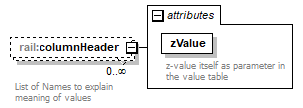 |
||||||||||||||
| namespace | https://www.railml.org/schemas/2018 | ||||||||||||||
| properties |
|
||||||||||||||
| attributes |
|
||||||||||||||
| annotation |
|
||||||||||||||
| source | <xs:element name="columnHeader" minOccurs="0" maxOccurs="unbounded"> <xs:annotation> <xs:documentation>List of Names to explain meaning of values</xs:documentation> <xs:documentation source="http://wiki.railml.org/index.php?title=RS:columnHeader"/> </xs:annotation> <xs:complexType> <xs:attribute name="zValue" type="xs:decimal" use="required"> <xs:annotation> <xs:documentation>z-value itself as parameter in the value table</xs:documentation> </xs:annotation> </xs:attribute> </xs:complexType> </xs:element> |
attribute tValueTable/columnHeader/@zValue
| type | xs:decimal | ||
| properties |
|
||
| annotation |
|
||
| source | <xs:attribute name="zValue" type="xs:decimal" use="required"> <xs:annotation> <xs:documentation>z-value itself as parameter in the value table</xs:documentation> </xs:annotation> </xs:attribute> |
element tValueTable/valueLine
| diagram | 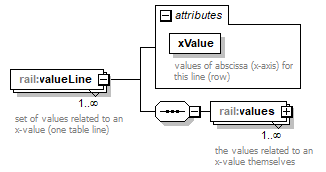 |
||||||||||||||
| namespace | https://www.railml.org/schemas/2018 | ||||||||||||||
| properties |
|
||||||||||||||
| children | rail:values | ||||||||||||||
| attributes |
|
||||||||||||||
| annotation |
|
||||||||||||||
| source | <xs:element name="valueLine" maxOccurs="unbounded"> <xs:annotation> <xs:documentation>set of values related to an x-value (one table line)</xs:documentation> <xs:documentation source="http://wiki.railml.org/index.php?title=RS:valueLine"/> </xs:annotation> <xs:complexType> <xs:sequence> <xs:element name="values" maxOccurs="unbounded"> <xs:annotation> <xs:documentation>the values related to an x-value themselves</xs:documentation> <xs:documentation source="http://wiki.railml.org/index.php?title=RS:values"/> </xs:annotation> <xs:complexType> <xs:attribute name="yValue" type="xs:decimal" use="required"> <xs:annotation> <xs:documentation>value of ordinate (y-axis) for this line (row)</xs:documentation> </xs:annotation> </xs:attribute> </xs:complexType> </xs:element> </xs:sequence> <xs:attribute name="xValue" type="xs:decimal" use="required"> <xs:annotation> <xs:documentation>values of abscissa (x-axis) for this line (row)</xs:documentation> </xs:annotation> </xs:attribute> </xs:complexType> </xs:element> |
attribute tValueTable/valueLine/@xValue
| type | xs:decimal | ||
| properties |
|
||
| annotation |
|
||
| source | <xs:attribute name="xValue" type="xs:decimal" use="required"> <xs:annotation> <xs:documentation>values of abscissa (x-axis) for this line (row)</xs:documentation> </xs:annotation> </xs:attribute> |
element tValueTable/valueLine/values
| diagram | 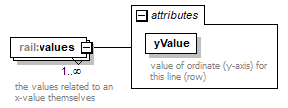 |
||||||||||||||
| namespace | https://www.railml.org/schemas/2018 | ||||||||||||||
| properties |
|
||||||||||||||
| attributes |
|
||||||||||||||
| annotation |
|
||||||||||||||
| source | <xs:element name="values" maxOccurs="unbounded"> <xs:annotation> <xs:documentation>the values related to an x-value themselves</xs:documentation> <xs:documentation source="http://wiki.railml.org/index.php?title=RS:values"/> </xs:annotation> <xs:complexType> <xs:attribute name="yValue" type="xs:decimal" use="required"> <xs:annotation> <xs:documentation>value of ordinate (y-axis) for this line (row)</xs:documentation> </xs:annotation> </xs:attribute> </xs:complexType> </xs:element> |
attribute tValueTable/valueLine/values/@yValue
| type | xs:decimal | ||
| properties |
|
||
| annotation |
|
||
| source | <xs:attribute name="yValue" type="xs:decimal" use="required"> <xs:annotation> <xs:documentation>value of ordinate (y-axis) for this line (row)</xs:documentation> </xs:annotation> </xs:attribute> |
complexType tVehicle
| diagram |  |
||||||||||||||||||||||||||||||||||||||||||||||||||||||||||||||||||||||||||||||||||||||||||||||||||||||||||||||||||||||||||||||||||||||||||||||||||||||||||||||||||||||||||||||||||||||||||||||||||||||||||||||||||||||
| namespace | https://www.railml.org/schemas/2018 | ||||||||||||||||||||||||||||||||||||||||||||||||||||||||||||||||||||||||||||||||||||||||||||||||||||||||||||||||||||||||||||||||||||||||||||||||||||||||||||||||||||||||||||||||||||||||||||||||||||||||||||||||||||||
| type | extension of rail:tElementWithIDAndName | ||||||||||||||||||||||||||||||||||||||||||||||||||||||||||||||||||||||||||||||||||||||||||||||||||||||||||||||||||||||||||||||||||||||||||||||||||||||||||||||||||||||||||||||||||||||||||||||||||||||||||||||||||||||
| properties |
|
||||||||||||||||||||||||||||||||||||||||||||||||||||||||||||||||||||||||||||||||||||||||||||||||||||||||||||||||||||||||||||||||||||||||||||||||||||||||||||||||||||||||||||||||||||||||||||||||||||||||||||||||||||||
| children | rail:additionalName | ||||||||||||||||||||||||||||||||||||||||||||||||||||||||||||||||||||||||||||||||||||||||||||||||||||||||||||||||||||||||||||||||||||||||||||||||||||||||||||||||||||||||||||||||||||||||||||||||||||||||||||||||||||||
| used by |
|
||||||||||||||||||||||||||||||||||||||||||||||||||||||||||||||||||||||||||||||||||||||||||||||||||||||||||||||||||||||||||||||||||||||||||||||||||||||||||||||||||||||||||||||||||||||||||||||||||||||||||||||||||||||
| attributes |
|
||||||||||||||||||||||||||||||||||||||||||||||||||||||||||||||||||||||||||||||||||||||||||||||||||||||||||||||||||||||||||||||||||||||||||||||||||||||||||||||||||||||||||||||||||||||||||||||||||||||||||||||||||||||
| annotation |
|
||||||||||||||||||||||||||||||||||||||||||||||||||||||||||||||||||||||||||||||||||||||||||||||||||||||||||||||||||||||||||||||||||||||||||||||||||||||||||||||||||||||||||||||||||||||||||||||||||||||||||||||||||||||
| source | <xs:complexType name="tVehicle"> <xs:annotation> <xs:documentation>vehicle related data</xs:documentation> </xs:annotation> <xs:complexContent> <xs:extension base="rail:tElementWithIDAndName"> <xs:attributeGroup ref="rail:aVehicle"/> </xs:extension> </xs:complexContent> </xs:complexType> |
complexType tVehicleIdentification
| diagram | 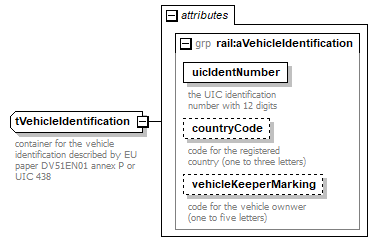 |
||||||||||||||||||||||||||||||
| namespace | https://www.railml.org/schemas/2018 | ||||||||||||||||||||||||||||||
| used by |
|
||||||||||||||||||||||||||||||
| attributes |
|
||||||||||||||||||||||||||||||
| annotation |
|
||||||||||||||||||||||||||||||
| source | <xs:complexType name="tVehicleIdentification"> <xs:annotation> <xs:documentation>container for the vehicle identification described by EU paper DV51EN01 annex P or UIC 438</xs:documentation> </xs:annotation> <xs:attributeGroup ref="rail:aVehicleIdentification"/> </xs:complexType> |
complexType tVehicleRef
| diagram | 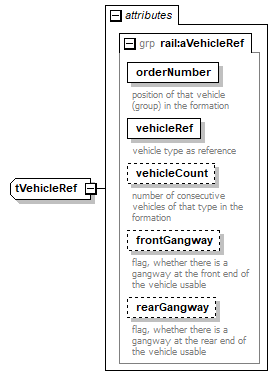 |
||||||||||||||||||||||||||||||||||||||||||||||
| namespace | https://www.railml.org/schemas/2018 | ||||||||||||||||||||||||||||||||||||||||||||||
| used by |
|
||||||||||||||||||||||||||||||||||||||||||||||
| attributes |
|
||||||||||||||||||||||||||||||||||||||||||||||
| source | <xs:complexType name="tVehicleRef"> <xs:attributeGroup ref="rail:aVehicleRef"/> </xs:complexType> |
complexType tWagon
| diagram | 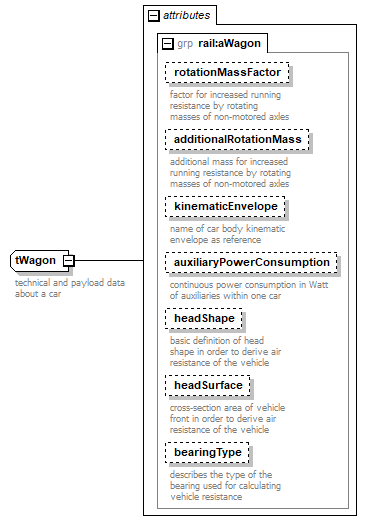 |
||||||||||||||||||||||||||||||||||||||||||||||||||||||||||||||
| namespace | https://www.railml.org/schemas/2018 | ||||||||||||||||||||||||||||||||||||||||||||||||||||||||||||||
| used by |
|
||||||||||||||||||||||||||||||||||||||||||||||||||||||||||||||
| attributes |
|
||||||||||||||||||||||||||||||||||||||||||||||||||||||||||||||
| annotation |
|
||||||||||||||||||||||||||||||||||||||||||||||||||||||||||||||
| source | <xs:complexType name="tWagon"> <xs:annotation> <xs:documentation>technical and payload data about a car</xs:documentation> </xs:annotation> <xs:attributeGroup ref="rail:aWagon"/> </xs:complexType> |
complexType tWinding
| diagram | 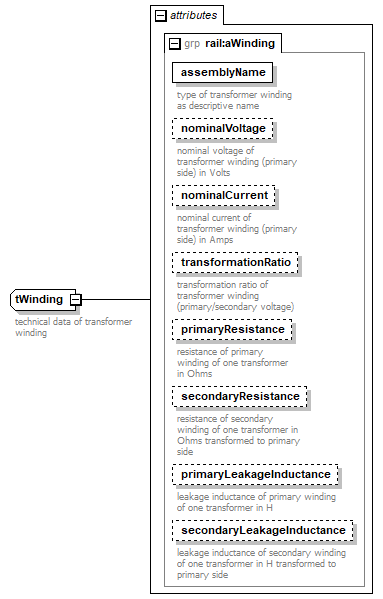 |
||||||||||||||||||||||||||||||||||||||||||||||||||||||||||||||||||||||
| namespace | https://www.railml.org/schemas/2018 | ||||||||||||||||||||||||||||||||||||||||||||||||||||||||||||||||||||||
| used by |
|
||||||||||||||||||||||||||||||||||||||||||||||||||||||||||||||||||||||
| attributes |
|
||||||||||||||||||||||||||||||||||||||||||||||||||||||||||||||||||||||
| annotation |
|
||||||||||||||||||||||||||||||||||||||||||||||||||||||||||||||||||||||
| source | <xs:complexType name="tWinding"> <xs:annotation> <xs:documentation>technical data of transformer winding</xs:documentation> </xs:annotation> <xs:attributeGroup ref="rail:aWinding"/> </xs:complexType> |
simpleType tAcousticSignalType
| namespace | https://www.railml.org/schemas/2018 | ||
| type | union of (restriction of xs:string, rail:tOtherEnumerationValue) | ||
| used by |
|
||
| source | <xs:simpleType name="tAcousticSignalType"> <xs:union> <xs:simpleType> <xs:restriction base="xs:string"> <xs:enumeration value="none"/> <xs:enumeration value="bell"/> <xs:enumeration value="alarmBell"/> <xs:enumeration value="horn"/> <xs:enumeration value="airChime"/> <xs:enumeration value="whistle"/> </xs:restriction> </xs:simpleType> <xs:simpleType> <xs:restriction base="rail:tOtherEnumerationValue"/> </xs:simpleType> </xs:union> </xs:simpleType> |
simpleType tAxleDriveType
| namespace | https://www.railml.org/schemas/2018 | ||
| type | union of (restriction of xs:string, rail:tOtherEnumerationValue) | ||
| used by |
|
||
| source | <xs:simpleType name="tAxleDriveType"> <xs:union> <xs:simpleType> <xs:restriction base="xs:string"> <xs:enumeration value="cardanShaft"/> <xs:enumeration value="tubularAxle"/> <xs:enumeration value="noseSuspensionDrive"/> <xs:enumeration value="helicalSpringGear"/> <xs:enumeration value="rubberRingResilientDrive"/> <xs:enumeration value="buchliDrive"/> <xs:enumeration value="inclinedRodDrive"/> <xs:enumeration value="sideRodDrive"/> <xs:enumeration value="chain"/> </xs:restriction> </xs:simpleType> <xs:simpleType> <xs:restriction base="rail:tOtherEnumerationValue"/> </xs:simpleType> </xs:union> </xs:simpleType> |
simpleType tBearingType
| namespace | https://www.railml.org/schemas/2018 | ||
| type | union of (restriction of xs:string, rail:tOtherEnumerationValue) | ||
| used by |
|
||
| source | <xs:simpleType name="tBearingType"> <xs:union> <xs:simpleType> <xs:restriction base="xs:string"> <xs:enumeration value="rollerBearing"/> <xs:enumeration value="ballBearing"/> <xs:enumeration value="plainBearing"/> </xs:restriction> </xs:simpleType> <xs:simpleType> <xs:restriction base="rail:tOtherEnumerationValue"/> </xs:simpleType> </xs:union> </xs:simpleType> |
simpleType tCabPositionType
| namespace | https://www.railml.org/schemas/2018 | |||||||||||||||
| type | restriction of xs:string | |||||||||||||||
| properties |
|
|||||||||||||||
| used by |
|
|||||||||||||||
| facets |
|
|||||||||||||||
| source | <xs:simpleType name="tCabPositionType"> <xs:restriction base="xs:string"> <xs:enumeration value="none"/> <xs:enumeration value="front"/> <xs:enumeration value="middle"/> <xs:enumeration value="rear"/> </xs:restriction> </xs:simpleType> |
simpleType tElectricalCouplerDesignType
| namespace | https://www.railml.org/schemas/2018 | ||
| type | union of (restriction of xs:string, rail:tOtherEnumerationValue) | ||
| used by |
|
||
| source | <xs:simpleType name="tElectricalCouplerDesignType"> <xs:union> <xs:simpleType> <xs:restriction base="xs:string"> <xs:enumeration value="unknown"/> <xs:enumeration value="pushTrainControl36"/> <xs:enumeration value="pushTrainControl34"/> <xs:enumeration value="emergencyBrakeDeactivation"/> <xs:enumeration value="UIC-IS-cable21"/> <xs:enumeration value="UIC556"/> <xs:enumeration value="UIC558-18"/> <xs:enumeration value="UIC568-13"/> <xs:enumeration value="wireTrainBus"/> <xs:enumeration value="multifunctionVehicleBus"/> <xs:enumeration value="trainCommunicationNetwork"/> <xs:enumeration value="vehicleSpecificConnection"/> <xs:enumeration value="fibreOptics"/> </xs:restriction> </xs:simpleType> <xs:simpleType> <xs:restriction base="rail:tOtherEnumerationValue"/> </xs:simpleType> </xs:union> </xs:simpleType> |
simpleType tEndPositionType
| namespace | https://www.railml.org/schemas/2018 | ||||||||||||
| type | restriction of xs:string | ||||||||||||
| properties |
|
||||||||||||
| used by |
|
||||||||||||
| facets |
|
||||||||||||
| source | <xs:simpleType name="tEndPositionType"> <xs:restriction base="xs:string"> <xs:enumeration value="both"/> <xs:enumeration value="front"/> <xs:enumeration value="rear"/> </xs:restriction> </xs:simpleType> |
simpleType tFreightCarType
| namespace | https://www.railml.org/schemas/2018 | ||
| type | union of (restriction of xs:string, rail:tOtherEnumerationValue) | ||
| used by |
|
||
| source | <xs:simpleType name="tFreightCarType"> <xs:union> <xs:simpleType> <xs:restriction base="xs:string"> <xs:enumeration value="open"/> <xs:enumeration value="covered"/> <xs:enumeration value="platform"/> <xs:enumeration value="refrigerated"/> <xs:enumeration value="tank"/> <xs:enumeration value="self-discharging"/> <xs:enumeration value="special"/> </xs:restriction> </xs:simpleType> <xs:simpleType> <xs:restriction base="rail:tOtherEnumerationValue"/> </xs:simpleType> </xs:union> </xs:simpleType> |
simpleType tGangwayDesignType
| namespace | https://www.railml.org/schemas/2018 | ||
| type | union of (restriction of xs:string, rail:tOtherEnumerationValue) | ||
| used by |
|
||
| source | <xs:simpleType name="tGangwayDesignType"> <xs:union> <xs:simpleType> <xs:restriction base="xs:string"> <xs:enumeration value="unknown"/> <xs:enumeration value="standardUIC561"/> <xs:enumeration value="special"/> <xs:enumeration value="nonPublic"/> <xs:enumeration value="sigI"/> <xs:enumeration value="sigII"/> </xs:restriction> </xs:simpleType> <xs:simpleType> <xs:restriction base="rail:tOtherEnumerationValue"/> </xs:simpleType> </xs:union> </xs:simpleType> |
simpleType tGangwayPosition
| namespace | https://www.railml.org/schemas/2018 | ||
| type | union of (restriction of xs:string, rail:tOtherEnumerationValue) | ||
| used by |
|
||
| source | <xs:simpleType name="tGangwayPosition"> <xs:union> <xs:simpleType> <xs:restriction base="xs:string"> <xs:enumeration value="standardUIC"/> <xs:enumeration value="upperDeck"/> <xs:enumeration value="lowerDeck"/> </xs:restriction> </xs:simpleType> <xs:simpleType> <xs:restriction base="rail:tOtherEnumerationValue"/> </xs:simpleType> </xs:union> </xs:simpleType> |
simpleType tHeadShapeType
| namespace | https://www.railml.org/schemas/2018 | ||
| type | union of (restriction of xs:string, rail:tOtherEnumerationValue) | ||
| used by |
|
||
| source | <xs:simpleType name="tHeadShapeType"> <xs:union> <xs:simpleType> <xs:restriction base="xs:string"> <xs:enumeration value="angular"/> <xs:enumeration value="rounded"/> <xs:enumeration value="streamlined"/> </xs:restriction> </xs:simpleType> <xs:simpleType> <xs:restriction base="rail:tOtherEnumerationValue"/> </xs:simpleType> </xs:union> </xs:simpleType> |
simpleType tLoadSwitch
| namespace | https://www.railml.org/schemas/2018 | |||||||||
| type | restriction of xs:string | |||||||||
| properties |
|
|||||||||
| used by |
|
|||||||||
| facets |
|
|||||||||
| source | <xs:simpleType name="tLoadSwitch"> <xs:restriction base="xs:string"> <xs:enumeration value="empty"/> <xs:enumeration value="full"/> </xs:restriction> </xs:simpleType> |
simpleType tMechanicalCouplerDesignType
| namespace | https://www.railml.org/schemas/2018 | ||
| type | union of (restriction of xs:string, rail:tOtherEnumerationValue) | ||
| used by |
|
||
| source | <xs:simpleType name="tMechanicalCouplerDesignType"> <xs:union> <xs:simpleType> <xs:restriction base="xs:string"> <xs:enumeration value="unknown"/> <xs:enumeration value="AAR_KnuckleCoupler"/> <xs:enumeration value="AK69e"/> <xs:enumeration value="AlbertCoupler"/> <xs:enumeration value="APTA_tightlock"/> <xs:enumeration value="BSI_compact"/> <xs:enumeration value="BSI_shunting"/> <xs:enumeration value="buckeyeKnuckleCoupler"/> <xs:enumeration value="BuddPinCup"/> <xs:enumeration value="buffersChainScrewCoupler"/> <xs:enumeration value="C-AKv"/> <xs:enumeration value="centralBuffer1Chain"/> <xs:enumeration value="centralBuffer2Chains"/> <xs:enumeration value="FK-3-2.5"/> <xs:enumeration value="FK-5.5-4"/> <xs:enumeration value="FK-9-6"/> <xs:enumeration value="FK-15-10"/> <xs:enumeration value="FK-15-12"/> <xs:enumeration value="GF_Coupler"/> <xs:enumeration value="GFN"/> <xs:enumeration value="GFT"/> <xs:enumeration value="GFV"/> <xs:enumeration value="Intermat"/> <xs:enumeration value="linkPin_flat"/> <xs:enumeration value="linkPin_round"/> <xs:enumeration value="NorwegianMeatChopper"/> <xs:enumeration value="SA3_WillisonCoupler"/> <xs:enumeration value="Scharfenberg"/> <xs:enumeration value="Scharfenberg10"/> <xs:enumeration value="Scharfenberg35"/> <xs:enumeration value="Scharfenberg55"/> <xs:enumeration value="Scharfenberg140"/> <xs:enumeration value="Scharfenberg330"/> <xs:enumeration value="Scharfenberg430"/> <xs:enumeration value="SchwabCoupler"/> <xs:enumeration value="Wedgelock"/> </xs:restriction> </xs:simpleType> <xs:simpleType> <xs:restriction base="rail:tOtherEnumerationValue"/> </xs:simpleType> </xs:union> </xs:simpleType> |
simpleType tModulationType
| namespace | https://www.railml.org/schemas/2018 | ||
| type | union of (restriction of xs:string, rail:tOtherEnumerationValue) | ||
| used by |
|
||
| source | <xs:simpleType name="tModulationType"> <xs:union> <xs:simpleType> <xs:restriction base="xs:string"> <xs:enumeration value="analogue"/> <xs:enumeration value="digital"/> </xs:restriction> </xs:simpleType> <xs:simpleType> <xs:restriction base="rail:tOtherEnumerationValue"/> </xs:simpleType> </xs:union> </xs:simpleType> |
simpleType tMotivePowerType
| namespace | https://www.railml.org/schemas/2018 | ||
| type | union of (restriction of xs:string, rail:tOtherEnumerationValue) | ||
| used by |
|
||
| source | <xs:simpleType name="tMotivePowerType"> <xs:union> <xs:simpleType> <xs:restriction base="xs:string"> <xs:enumeration value="electric"/> <xs:enumeration value="diesel"/> <xs:enumeration value="steam"/> </xs:restriction> </xs:simpleType> <xs:simpleType> <xs:restriction base="rail:tOtherEnumerationValue"/> </xs:simpleType> </xs:union> </xs:simpleType> |
simpleType tPantographControlType
| namespace | https://www.railml.org/schemas/2018 | ||
| type | union of (restriction of xs:string, rail:tOtherEnumerationValue) | ||
| used by |
|
||
| source | <xs:simpleType name="tPantographControlType"> <xs:union> <xs:simpleType> <xs:restriction base="xs:string"> <xs:enumeration value="cable"/> <xs:enumeration value="spring"/> <xs:enumeration value="air"/> </xs:restriction> </xs:simpleType> <xs:simpleType> <xs:restriction base="rail:tOtherEnumerationValue"/> </xs:simpleType> </xs:union> </xs:simpleType> |
simpleType tPantographPositionType
| namespace | https://www.railml.org/schemas/2018 | ||
| type | union of (restriction of xs:string, rail:tOtherEnumerationValue) | ||
| used by |
|
||
| source | <xs:simpleType name="tPantographPositionType"> <xs:union> <xs:simpleType> <xs:restriction base="xs:string"> <xs:enumeration value="front"/> <xs:enumeration value="frontSecond"/> <xs:enumeration value="middle"/> <xs:enumeration value="rearSecond"/> <xs:enumeration value="rear"/> </xs:restriction> </xs:simpleType> <xs:simpleType> <xs:restriction base="rail:tOtherEnumerationValue"/> </xs:simpleType> </xs:union> </xs:simpleType> |
simpleType tPneumaticCouplerFunctionType
| namespace | https://www.railml.org/schemas/2018 | ||
| type | union of (restriction of xs:string, rail:tOtherEnumerationValue) | ||
| used by |
|
||
| source | <xs:simpleType name="tPneumaticCouplerFunctionType"> <xs:union> <xs:simpleType> <xs:restriction base="xs:string"> <xs:enumeration value="unknown"/> <xs:enumeration value="mainAirPipe"/> <xs:enumeration value="mainAirReservoirPipe"/> <xs:enumeration value="additionalBrakeControlPipe"/> <xs:enumeration value="vacuumAirPipe"/> <xs:enumeration value="steamHeatingPipe"/> </xs:restriction> </xs:simpleType> <xs:simpleType> <xs:restriction base="rail:tOtherEnumerationValue"/> </xs:simpleType> </xs:union> </xs:simpleType> |
simpleType tPropulsionControlType
| namespace | https://www.railml.org/schemas/2018 | ||
| type | union of (restriction of xs:string, rail:tOtherEnumerationValue) | ||
| used by |
|
||
| source | <xs:simpleType name="tPropulsionControlType"> <xs:union> <xs:simpleType> <xs:restriction base="xs:string"> <xs:enumeration value="unknown"/> <xs:enumeration value="camshaftControl"/> <xs:enumeration value="contactorControl"/> <xs:enumeration value="rectifier"/> <xs:enumeration value="thyristorControl"/> </xs:restriction> </xs:simpleType> <xs:simpleType> <xs:restriction base="rail:tOtherEnumerationValue"/> </xs:simpleType> </xs:union> </xs:simpleType> |
simpleType tRackSystemType
| namespace | https://www.railml.org/schemas/2018 | ||
| type | union of (restriction of xs:string, rail:tOtherEnumerationValue) | ||
| used by |
|
||
| source | <xs:simpleType name="tRackSystemType"> <xs:union> <xs:simpleType> <xs:restriction base="xs:string"> <xs:enumeration value="none"/> <xs:enumeration value="Riggenbach"/> <xs:enumeration value="Riggenbach-Klose"/> <xs:enumeration value="Abt2Bars"/> <xs:enumeration value="Abt3Bars"/> <xs:enumeration value="Locher"/> <xs:enumeration value="Strub"/> <xs:enumeration value="Wetli"/> <xs:enumeration value="Marsh"/> <xs:enumeration value="Roll"/> </xs:restriction> </xs:simpleType> <xs:simpleType> <xs:restriction base="rail:tOtherEnumerationValue"/> </xs:simpleType> </xs:union> </xs:simpleType> |
simpleType tRadioSystem
| namespace | https://www.railml.org/schemas/2018 | ||
| type | rail:tGenericName | ||
| properties |
|
||
| used by |
|
||
| annotation |
|
||
| source | <xs:simpleType name="tRadioSystem"> <xs:annotation> <xs:documentation>list of available radio systems for communication like 'GSM-R'</xs:documentation> </xs:annotation> <xs:restriction base="rail:tGenericName"/> </xs:simpleType> |
simpleType tRelatedPositionType
| namespace | https://www.railml.org/schemas/2018 | |||||||||||||||
| type | restriction of xs:string | |||||||||||||||
| properties |
|
|||||||||||||||
| used by |
|
|||||||||||||||
| facets |
|
|||||||||||||||
| source | <xs:simpleType name="tRelatedPositionType"> <xs:restriction base="xs:string"> <xs:enumeration value="none"/> <xs:enumeration value="aside"/> <xs:enumeration value="ontop"/> <xs:enumeration value="below"/> </xs:restriction> </xs:simpleType> |
simpleType tSpeedRangeType
| namespace | https://www.railml.org/schemas/2018 | ||||||||||||
| type | restriction of xs:string | ||||||||||||
| properties |
|
||||||||||||
| used by |
|
||||||||||||
| facets |
|
||||||||||||
| source | <xs:simpleType name="tSpeedRangeType"> <xs:restriction base="xs:string"> <xs:enumeration value="dontcare"/> <xs:enumeration value="slow"/> <xs:enumeration value="fast"/> </xs:restriction> </xs:simpleType> |
simpleType tSupervisionType
| namespace | https://www.railml.org/schemas/2018 | ||
| type | union of (restriction of xs:string, rail:tOtherEnumerationValue) | ||
| used by |
|
||
| annotation |
|
||
| source | <xs:simpleType name="tSupervisionType"> <xs:annotation> <xs:documentation>list of possible brake supervision regimes causing different operational behaviour during braking</xs:documentation> </xs:annotation> <xs:union> <xs:simpleType> <xs:restriction base="xs:string"> <xs:enumeration value="none"/> <xs:enumeration value="ATP"/> <xs:enumeration value="ETCS"/> <xs:enumeration value="unknown"/> </xs:restriction> </xs:simpleType> <xs:simpleType> <xs:restriction base="rail:tOtherEnumerationValue"/> </xs:simpleType> </xs:union> </xs:simpleType> |
simpleType tTechnicalStopActivityTypes
| namespace | https://www.railml.org/schemas/2018 | ||
| type | union of (restriction of xs:string, rail:tOtherEnumerationValue) | ||
| used by |
|
||
| source | <xs:simpleType name="tTechnicalStopActivityTypes"> <xs:union> <xs:simpleType> <xs:restriction base="xs:string"> <xs:enumeration value="split"> <xs:annotation> <xs:documentation>Technical process for uncouple formations / train parts - intended for self-propelling train parts.</xs:documentation> </xs:annotation> </xs:enumeration> <xs:enumeration value="join"> <xs:annotation> <xs:documentation>Technical process for couple formations / train parts - intended for self-propelling train parts.</xs:documentation> </xs:annotation> </xs:enumeration> <xs:enumeration value="reversing-one_driver"> <xs:annotation> <xs:documentation>Technical process for reversing the train direction with one driver who needs to go from one cab to the other</xs:documentation> </xs:annotation> </xs:enumeration> <xs:enumeration value="reversing-two_driver"> <xs:annotation> <xs:documentation>Technical process for reversing train direction with two dirvers, thus without need to go from one cab to the other</xs:documentation> </xs:annotation> </xs:enumeration> </xs:restriction> </xs:simpleType> <xs:simpleType> <xs:restriction base="rail:tOtherEnumerationValue"/> </xs:simpleType> </xs:union> </xs:simpleType> |
simpleType tTorqueConversionType
| namespace | https://www.railml.org/schemas/2018 | ||
| type | union of (restriction of xs:string, rail:tOtherEnumerationValue) | ||
| used by |
|
||
| source | <xs:simpleType name="tTorqueConversionType"> <xs:union> <xs:simpleType> <xs:restriction base="xs:string"> <xs:enumeration value="converter"/> <xs:enumeration value="coupling"/> <xs:enumeration value="hydrodynamicTransmission"/> <xs:enumeration value="hydraulicTransmission"/> <xs:enumeration value="hydromechanicalTransmission"/> <xs:enumeration value="hydrostaticTransmission"/> </xs:restriction> </xs:simpleType> <xs:simpleType> <xs:restriction base="rail:tOtherEnumerationValue"/> </xs:simpleType> </xs:union> </xs:simpleType> |
simpleType tTransmission
| namespace | https://www.railml.org/schemas/2018 | ||
| type | union of (restriction of xs:string, rail:tOtherEnumerationValue) | ||
| used by |
|
||
| source | <xs:simpleType name="tTransmission"> <xs:union> <xs:simpleType> <xs:restriction base="xs:string"> <xs:enumeration value="electric"/> <xs:enumeration value="hydraulic"/> <xs:enumeration value="hydromechanical"/> <xs:enumeration value="mechanical"/> </xs:restriction> </xs:simpleType> <xs:simpleType> <xs:restriction base="rail:tOtherEnumerationValue"/> </xs:simpleType> </xs:union> </xs:simpleType> |
simpleType tVehicleCategoryType
| namespace | https://www.railml.org/schemas/2018 | ||
| type | union of (restriction of xs:string, rail:tOtherEnumerationValue) | ||
| used by |
|
||
| source | <xs:simpleType name="tVehicleCategoryType"> <xs:union> <xs:simpleType> <xs:restriction base="xs:string"> <xs:enumeration value="coach"/> <xs:enumeration value="motorCoach"/> <xs:enumeration value="controlCabCoach"/> <xs:enumeration value="motorVehicles"/> <xs:enumeration value="freightWagon"/> </xs:restriction> </xs:simpleType> <xs:simpleType> <xs:restriction base="rail:tOtherEnumerationValue"/> </xs:simpleType> </xs:union> </xs:simpleType> |
attributeGroup aAssemblyNameNumber
| namespace | https://www.railml.org/schemas/2018 | ||||||||||||||||||||||
| used by |
|
||||||||||||||||||||||
| attributes |
|
||||||||||||||||||||||
| source | <xs:attributeGroup name="aAssemblyNameNumber"> <xs:attribute name="count" type="rail:tCounter" use="required"> <xs:annotation> <xs:documentation>number of assemblies per vehicle/unit</xs:documentation> </xs:annotation> </xs:attribute> <xs:attribute name="assemblyName" type="rail:tGenericName" use="required"> <xs:annotation> <xs:documentation>type of assembly as descriptive name</xs:documentation> </xs:annotation> </xs:attribute> </xs:attributeGroup> |
attribute aAssemblyNameNumber/@count
| type | rail:tCounter | ||
| properties |
|
||
| annotation |
|
||
| source | <xs:attribute name="count" type="rail:tCounter" use="required"> <xs:annotation> <xs:documentation>number of assemblies per vehicle/unit</xs:documentation> </xs:annotation> </xs:attribute> |
attribute aAssemblyNameNumber/@assemblyName
| type | rail:tGenericName | ||
| properties |
|
||
| annotation |
|
||
| source | <xs:attribute name="assemblyName" type="rail:tGenericName" use="required"> <xs:annotation> <xs:documentation>type of assembly as descriptive name</xs:documentation> </xs:annotation> </xs:attribute> |
attributeGroup aAuxiliarySupply
| namespace | https://www.railml.org/schemas/2018 | ||||||||||||||||||||||||||||||||||||||||||||||||||||||
| used by |
|
||||||||||||||||||||||||||||||||||||||||||||||||||||||
| attributes |
|
||||||||||||||||||||||||||||||||||||||||||||||||||||||
| source | <xs:attributeGroup name="aAuxiliarySupply"> <xs:attribute name="power" type="rail:tPowerWatt" use="required"> <xs:annotation> <xs:documentation>power consumption of constant load by auxiliary equipment in Watt (permanent)</xs:documentation> </xs:annotation> </xs:attribute> <xs:attribute name="powerPhi" type="rail:tAngleDegFullCircle"> <xs:annotation> <xs:documentation>phase angle phi of constant power of auxiliary load between -180..+180</xs:documentation> </xs:annotation> </xs:attribute> <xs:attribute name="resistance" type="rail:tResistanceOhm"> <xs:annotation> <xs:documentation>resistance of constant load by auxiliary equipment in Ohm</xs:documentation> </xs:annotation> </xs:attribute> <xs:attribute name="powerBraking" type="rail:tPowerWatt"> <xs:annotation> <xs:documentation>power consumption of constant load by auxiliary equipment in Watt (only during braking mode)</xs:documentation> </xs:annotation> </xs:attribute> <xs:attribute name="powerPhiBraking" type="rail:tAngleDegFullCircle"> <xs:annotation> <xs:documentation>phase angle phi of constant power of auxiliary load between -180..+180 (only during braking mode)</xs:documentation> </xs:annotation> </xs:attribute> <xs:attribute name="resistanceBraking" type="rail:tResistanceOhm"> <xs:annotation> <xs:documentation>resistance of constant load by auxiliary equipment in Ohm (only during braking mode)</xs:documentation> </xs:annotation> </xs:attribute> </xs:attributeGroup> |
attribute aAuxiliarySupply/@power
| type | rail:tPowerWatt | ||||||
| properties |
|
||||||
| facets |
|
||||||
| annotation |
|
||||||
| source | <xs:attribute name="power" type="rail:tPowerWatt" use="required"> <xs:annotation> <xs:documentation>power consumption of constant load by auxiliary equipment in Watt (permanent)</xs:documentation> </xs:annotation> </xs:attribute> |
attribute aAuxiliarySupply/@powerPhi
| type | rail:tAngleDegFullCircle | |||||||||||||||
| facets |
|
|||||||||||||||
| annotation |
|
|||||||||||||||
| source | <xs:attribute name="powerPhi" type="rail:tAngleDegFullCircle"> <xs:annotation> <xs:documentation>phase angle phi of constant power of auxiliary load between -180..+180</xs:documentation> </xs:annotation> </xs:attribute> |
attribute aAuxiliarySupply/@resistance
| type | rail:tResistanceOhm | ||||||
| facets |
|
||||||
| annotation |
|
||||||
| source | <xs:attribute name="resistance" type="rail:tResistanceOhm"> <xs:annotation> <xs:documentation>resistance of constant load by auxiliary equipment in Ohm</xs:documentation> </xs:annotation> </xs:attribute> |
attribute aAuxiliarySupply/@powerBraking
| type | rail:tPowerWatt | ||||||
| facets |
|
||||||
| annotation |
|
||||||
| source | <xs:attribute name="powerBraking" type="rail:tPowerWatt"> <xs:annotation> <xs:documentation>power consumption of constant load by auxiliary equipment in Watt (only during braking mode)</xs:documentation> </xs:annotation> </xs:attribute> |
attribute aAuxiliarySupply/@powerPhiBraking
| type | rail:tAngleDegFullCircle | |||||||||||||||
| facets |
|
|||||||||||||||
| annotation |
|
|||||||||||||||
| source | <xs:attribute name="powerPhiBraking" type="rail:tAngleDegFullCircle"> <xs:annotation> <xs:documentation>phase angle phi of constant power of auxiliary load between -180..+180 (only during braking mode)</xs:documentation> </xs:annotation> </xs:attribute> |
attribute aAuxiliarySupply/@resistanceBraking
| type | rail:tResistanceOhm | ||||||
| facets |
|
||||||
| annotation |
|
||||||
| source | <xs:attribute name="resistanceBraking" type="rail:tResistanceOhm"> <xs:annotation> <xs:documentation>resistance of constant load by auxiliary equipment in Ohm (only during braking mode)</xs:documentation> </xs:annotation> </xs:attribute> |
attributeGroup aBasicBrakeOperation
| namespace | https://www.railml.org/schemas/2018 | ||||||||||||||||||||||||||||||||||||||
| used by |
|
||||||||||||||||||||||||||||||||||||||
| attributes |
|
||||||||||||||||||||||||||||||||||||||
| source | <xs:attributeGroup name="aBasicBrakeOperation"> <xs:attribute name="brakeSupervision" type="rail:tSupervisionType"> <xs:annotation> <xs:documentation>possible values for selection of different brake operation rules</xs:documentation> </xs:annotation> </xs:attribute> <xs:attribute name="decelerationDelay" type="xs:duration"> <xs:annotation> <xs:documentation>average brake application time, typically in seconds</xs:documentation> </xs:annotation> </xs:attribute> <xs:attribute name="releaseSpeed" type="rail:tSpeedKmPerHour"> <xs:annotation> <xs:documentation>below this speed limit in km/h generally the supervision regime of "none" shall apply</xs:documentation> </xs:annotation> </xs:attribute> <xs:attribute name="meanDeceleration" type="rail:tAccelerationMeterPerSquareSec"> <xs:annotation> <xs:documentation>average deceleration value in this supervision regime in m/s^2</xs:documentation> </xs:annotation> </xs:attribute> </xs:attributeGroup> |
attribute aBasicBrakeOperation/@brakeSupervision
| type | rail:tSupervisionType | ||
| annotation |
|
||
| source | <xs:attribute name="brakeSupervision" type="rail:tSupervisionType"> <xs:annotation> <xs:documentation>possible values for selection of different brake operation rules</xs:documentation> </xs:annotation> </xs:attribute> |
attribute aBasicBrakeOperation/@decelerationDelay
| type | xs:duration | ||
| annotation |
|
||
| source | <xs:attribute name="decelerationDelay" type="xs:duration"> <xs:annotation> <xs:documentation>average brake application time, typically in seconds</xs:documentation> </xs:annotation> </xs:attribute> |
attribute aBasicBrakeOperation/@releaseSpeed
| type | rail:tSpeedKmPerHour | ||||||||||||
| facets |
|
||||||||||||
| annotation |
|
||||||||||||
| source | <xs:attribute name="releaseSpeed" type="rail:tSpeedKmPerHour"> <xs:annotation> <xs:documentation>below this speed limit in km/h generally the supervision regime of "none" shall apply</xs:documentation> </xs:annotation> </xs:attribute> |
attribute aBasicBrakeOperation/@meanDeceleration
| type | rail:tAccelerationMeterPerSquareSec | ||||||
| facets |
|
||||||
| annotation |
|
||||||
| source | <xs:attribute name="meanDeceleration" type="rail:tAccelerationMeterPerSquareSec"> <xs:annotation> <xs:documentation>average deceleration value in this supervision regime in m/s^2</xs:documentation> </xs:annotation> </xs:attribute> |
attributeGroup aCurvingLimitation
| namespace | https://www.railml.org/schemas/2018 | ||||||||||||||||||||||||||||||
| used by |
|
||||||||||||||||||||||||||||||
| attributes |
|
||||||||||||||||||||||||||||||
| source | <xs:attributeGroup name="aCurvingLimitation"> <xs:attribute name="horizontalCurveRadius" type="rail:tLengthM"> <xs:annotation> <xs:documentation>maximum horizontal curve radius in metres allowed for the vehicle running</xs:documentation> </xs:annotation> </xs:attribute> <xs:attribute name="verticalCrestRadius" type="rail:tLengthM"> <xs:annotation> <xs:documentation>maximum vertical radius of any crest (de: Kuppe) in metres allowed for the vehicle running</xs:documentation> </xs:annotation> </xs:attribute> <xs:attribute name="verticalSagRadius" type="rail:tLengthM"> <xs:annotation> <xs:documentation>maximum vertical radius of any sag (de: Wanne) in metres allowed for the vehicle running</xs:documentation> </xs:annotation> </xs:attribute> </xs:attributeGroup> |
attribute aCurvingLimitation/@horizontalCurveRadius
| type | rail:tLengthM | ||||||
| facets |
|
||||||
| annotation |
|
||||||
| source | <xs:attribute name="horizontalCurveRadius" type="rail:tLengthM"> <xs:annotation> <xs:documentation>maximum horizontal curve radius in metres allowed for the vehicle running</xs:documentation> </xs:annotation> </xs:attribute> |
attribute aCurvingLimitation/@verticalCrestRadius
| type | rail:tLengthM | ||||||
| facets |
|
||||||
| annotation |
|
||||||
| source | <xs:attribute name="verticalCrestRadius" type="rail:tLengthM"> <xs:annotation> <xs:documentation>maximum vertical radius of any crest (de: Kuppe) in metres allowed for the vehicle running</xs:documentation> </xs:annotation> </xs:attribute> |
attribute aCurvingLimitation/@verticalSagRadius
| type | rail:tLengthM | ||||||
| facets |
|
||||||
| annotation |
|
||||||
| source | <xs:attribute name="verticalSagRadius" type="rail:tLengthM"> <xs:annotation> <xs:documentation>maximum vertical radius of any sag (de: Wanne) in metres allowed for the vehicle running</xs:documentation> </xs:annotation> </xs:attribute> |
attributeGroup aDieselEngine
| namespace | https://www.railml.org/schemas/2018 | ||||||||||||||||||||||||||||||||||||||
| used by |
|
||||||||||||||||||||||||||||||||||||||
| attributes |
|
||||||||||||||||||||||||||||||||||||||
| source | <xs:attributeGroup name="aDieselEngine"> <xs:attribute name="nominalPower" type="rail:tPowerWatt"> <xs:annotation> <xs:documentation>nominal power per diesel engine in Watt</xs:documentation> </xs:annotation> </xs:attribute> <xs:attribute name="availableAuxiliaryPower" type="rail:tPowerWatt"> <xs:annotation> <xs:documentation>nominal power per diesel engine in Watt leftover for auxiliary supply</xs:documentation> </xs:annotation> </xs:attribute> <xs:attribute name="fuelCapacity" type="rail:tVolumeLitre"> <xs:annotation> <xs:documentation>fuel capacity of the entire diesel tank in liters</xs:documentation> </xs:annotation> </xs:attribute> <xs:attribute name="meanEfficiency" type="rail:tOneToZero"> <xs:annotation> <xs:documentation>average efficiency of the diesel engine in the range 0..1</xs:documentation> </xs:annotation> </xs:attribute> </xs:attributeGroup> |
attribute aDieselEngine/@nominalPower
| type | rail:tPowerWatt | ||||||
| facets |
|
||||||
| annotation |
|
||||||
| source | <xs:attribute name="nominalPower" type="rail:tPowerWatt"> <xs:annotation> <xs:documentation>nominal power per diesel engine in Watt</xs:documentation> </xs:annotation> </xs:attribute> |
attribute aDieselEngine/@availableAuxiliaryPower
| type | rail:tPowerWatt | ||||||
| facets |
|
||||||
| annotation |
|
||||||
| source | <xs:attribute name="availableAuxiliaryPower" type="rail:tPowerWatt"> <xs:annotation> <xs:documentation>nominal power per diesel engine in Watt leftover for auxiliary supply</xs:documentation> </xs:annotation> </xs:attribute> |
attribute aDieselEngine/@fuelCapacity
| type | rail:tVolumeLitre | |||||||||
| facets |
|
|||||||||
| annotation |
|
|||||||||
| source | <xs:attribute name="fuelCapacity" type="rail:tVolumeLitre"> <xs:annotation> <xs:documentation>fuel capacity of the entire diesel tank in liters</xs:documentation> </xs:annotation> </xs:attribute> |
attribute aDieselEngine/@meanEfficiency
| type | rail:tOneToZero | ||||||||||||
| facets |
|
||||||||||||
| annotation |
|
||||||||||||
| source | <xs:attribute name="meanEfficiency" type="rail:tOneToZero"> <xs:annotation> <xs:documentation>average efficiency of the diesel engine in the range 0..1</xs:documentation> </xs:annotation> </xs:attribute> |
attributeGroup aDoors
| namespace | https://www.railml.org/schemas/2018 | ||||||||||||||||||||||||||||||||||||||||||||||||||||||||||||||||||||||
| used by |
|
||||||||||||||||||||||||||||||||||||||||||||||||||||||||||||||||||||||
| attributes |
|
||||||||||||||||||||||||||||||||||||||||||||||||||||||||||||||||||||||
| source | <xs:attributeGroup name="aDoors"> <xs:attribute name="number" type="rail:tCounter"> <xs:annotation> <xs:documentation>number of doors per vehicle at each side</xs:documentation> </xs:annotation> </xs:attribute> <xs:attribute name="entranceHeight" type="rail:tLengthM"> <xs:annotation> <xs:documentation>height of entrance foot plate above rail top</xs:documentation> </xs:annotation> </xs:attribute> <xs:attribute name="entranceLength" type="rail:tLengthM"> <xs:annotation> <xs:documentation>maximum distance between the doors of the vehicle</xs:documentation> </xs:annotation> </xs:attribute> <xs:attribute name="entranceWidth" type="rail:tLengthM"> <xs:annotation> <xs:documentation>total of all door width of the vehicle at one side</xs:documentation> </xs:annotation> </xs:attribute> <xs:attribute name="footStepHeight" type="rail:tLengthM"> <xs:annotation> <xs:documentation>height of lowest foot step above rail top</xs:documentation> </xs:annotation> </xs:attribute> <xs:attribute name="lockingSpeed" type="rail:tSpeedKmPerHour"> <xs:annotation> <xs:documentation>speed limit for locking the doors during train ride</xs:documentation> </xs:annotation> </xs:attribute> <xs:attribute name="openingTime" type="xs:duration"> <xs:annotation> <xs:documentation>Time from stand-still of the vehicle to the flow of passengers can start through the doors. This is estimated to be at a door gap of 80cm.</xs:documentation> </xs:annotation> </xs:attribute> <xs:attribute name="closingTime" type="xs:duration"> <xs:annotation> <xs:documentation>Time after closing signal is given on the last door to the vehicles can be put in motion.</xs:documentation> </xs:annotation> </xs:attribute> </xs:attributeGroup> |
attribute aDoors/@number
| type | rail:tCounter | ||
| annotation |
|
||
| source | <xs:attribute name="number" type="rail:tCounter"> <xs:annotation> <xs:documentation>number of doors per vehicle at each side</xs:documentation> </xs:annotation> </xs:attribute> |
attribute aDoors/@entranceHeight
| type | rail:tLengthM | ||||||
| facets |
|
||||||
| annotation |
|
||||||
| source | <xs:attribute name="entranceHeight" type="rail:tLengthM"> <xs:annotation> <xs:documentation>height of entrance foot plate above rail top</xs:documentation> </xs:annotation> </xs:attribute> |
attribute aDoors/@entranceLength
| type | rail:tLengthM | ||||||
| facets |
|
||||||
| annotation |
|
||||||
| source | <xs:attribute name="entranceLength" type="rail:tLengthM"> <xs:annotation> <xs:documentation>maximum distance between the doors of the vehicle</xs:documentation> </xs:annotation> </xs:attribute> |
attribute aDoors/@entranceWidth
| type | rail:tLengthM | ||||||
| facets |
|
||||||
| annotation |
|
||||||
| source | <xs:attribute name="entranceWidth" type="rail:tLengthM"> <xs:annotation> <xs:documentation>total of all door width of the vehicle at one side</xs:documentation> </xs:annotation> </xs:attribute> |
attribute aDoors/@footStepHeight
| type | rail:tLengthM | ||||||
| facets |
|
||||||
| annotation |
|
||||||
| source | <xs:attribute name="footStepHeight" type="rail:tLengthM"> <xs:annotation> <xs:documentation>height of lowest foot step above rail top</xs:documentation> </xs:annotation> </xs:attribute> |
attribute aDoors/@lockingSpeed
| type | rail:tSpeedKmPerHour | ||||||||||||
| facets |
|
||||||||||||
| annotation |
|
||||||||||||
| source | <xs:attribute name="lockingSpeed" type="rail:tSpeedKmPerHour"> <xs:annotation> <xs:documentation>speed limit for locking the doors during train ride</xs:documentation> </xs:annotation> </xs:attribute> |
attribute aDoors/@openingTime
| type | xs:duration | ||
| annotation |
|
||
| source | <xs:attribute name="openingTime" type="xs:duration"> <xs:annotation> <xs:documentation>Time from stand-still of the vehicle to the flow of passengers can start through the doors. This is estimated to be at a door gap of 80cm.</xs:documentation> </xs:annotation> </xs:attribute> |
attribute aDoors/@closingTime
| type | xs:duration | ||
| annotation |
|
||
| source | <xs:attribute name="closingTime" type="xs:duration"> <xs:annotation> <xs:documentation>Time after closing signal is given on the last door to the vehicles can be put in motion.</xs:documentation> </xs:annotation> </xs:attribute> |
attributeGroup aDriversCab
| namespace | https://www.railml.org/schemas/2018 | ||||||||||||||||||||||||||||||
| used by |
|
||||||||||||||||||||||||||||||
| attributes |
|
||||||||||||||||||||||||||||||
| source | <xs:attributeGroup name="aDriversCab"> <xs:attribute name="orderNumber" type="rail:tPositiveCounter" use="required"> <xs:annotation> <xs:documentation>ordered number of cab</xs:documentation> </xs:annotation> </xs:attribute> <xs:attribute name="position" type="rail:tCabPositionType" use="required"> <xs:annotation> <xs:documentation>position of cab related to vehicle</xs:documentation> </xs:annotation> </xs:attribute> <xs:attribute name="acousticSignaller" type="rail:tAcousticSignalType"> <xs:annotation> <xs:documentation>installed acoustic signaller</xs:documentation> </xs:annotation> </xs:attribute> </xs:attributeGroup> |
attribute aDriversCab/@orderNumber
| type | rail:tPositiveCounter | ||
| properties |
|
||
| annotation |
|
||
| source | <xs:attribute name="orderNumber" type="rail:tPositiveCounter" use="required"> <xs:annotation> <xs:documentation>ordered number of cab</xs:documentation> </xs:annotation> </xs:attribute> |
attribute aDriversCab/@position
| type | rail:tCabPositionType | |||||||||||||||
| properties |
|
|||||||||||||||
| facets |
|
|||||||||||||||
| annotation |
|
|||||||||||||||
| source | <xs:attribute name="position" type="rail:tCabPositionType" use="required"> <xs:annotation> <xs:documentation>position of cab related to vehicle</xs:documentation> </xs:annotation> </xs:attribute> |
attribute aDriversCab/@acousticSignaller
| type | rail:tAcousticSignalType | ||
| annotation |
|
||
| source | <xs:attribute name="acousticSignaller" type="rail:tAcousticSignalType"> <xs:annotation> <xs:documentation>installed acoustic signaller</xs:documentation> </xs:annotation> </xs:attribute> |
attributeGroup aEddyCurrentBrake
| namespace | https://www.railml.org/schemas/2018 | ||||||||||||||||||||||||||||||
| used by |
|
||||||||||||||||||||||||||||||
| attributes |
|
||||||||||||||||||||||||||||||
| source | <xs:attributeGroup name="aEddyCurrentBrake"> <xs:attribute name="maxPower" type="rail:tPowerWatt" use="required"> <xs:annotation> <xs:documentation>maximal power consumption in Watt</xs:documentation> </xs:annotation> </xs:attribute> <xs:attribute name="maxEffort" type="rail:tForceNewton" use="required"> <xs:annotation> <xs:documentation>maximal braking effort achieved in Newton</xs:documentation> </xs:annotation> </xs:attribute> <xs:attribute name="minSpeed" type="rail:tSpeedKmPerHour" use="required"> <xs:annotation> <xs:documentation>minimum speed for use of eddy current brake in km/h</xs:documentation> </xs:annotation> </xs:attribute> </xs:attributeGroup> |
attribute aEddyCurrentBrake/@maxPower
| type | rail:tPowerWatt | ||||||
| properties |
|
||||||
| facets |
|
||||||
| annotation |
|
||||||
| source | <xs:attribute name="maxPower" type="rail:tPowerWatt" use="required"> <xs:annotation> <xs:documentation>maximal power consumption in Watt</xs:documentation> </xs:annotation> </xs:attribute> |
attribute aEddyCurrentBrake/@maxEffort
| type | rail:tForceNewton | ||||||
| properties |
|
||||||
| facets |
|
||||||
| annotation |
|
||||||
| source | <xs:attribute name="maxEffort" type="rail:tForceNewton" use="required"> <xs:annotation> <xs:documentation>maximal braking effort achieved in Newton</xs:documentation> </xs:annotation> </xs:attribute> |
attribute aEddyCurrentBrake/@minSpeed
| type | rail:tSpeedKmPerHour | ||||||||||||
| properties |
|
||||||||||||
| facets |
|
||||||||||||
| annotation |
|
||||||||||||
| source | <xs:attribute name="minSpeed" type="rail:tSpeedKmPerHour" use="required"> <xs:annotation> <xs:documentation>minimum speed for use of eddy current brake in km/h</xs:documentation> </xs:annotation> </xs:attribute> |
attributeGroup aElectricalWagonCoupler
| namespace | https://www.railml.org/schemas/2018 | ||||||||||||||||||||||||||||||||||||||
| used by |
|
||||||||||||||||||||||||||||||||||||||
| attributes |
|
||||||||||||||||||||||||||||||||||||||
| source | <xs:attributeGroup name="aElectricalWagonCoupler"> <xs:attribute name="positionOnCarEnd" type="rail:tEndPositionType" use="required"> <xs:annotation> <xs:documentation>basic position of the electrical wagon coupler (front/rear/both)</xs:documentation> </xs:annotation> </xs:attribute> <xs:attribute name="designType" type="rail:tElectricalCouplerDesignType"> <xs:annotation> <xs:documentation>description of the design type of the electrical coupler (mainly control lines)</xs:documentation> </xs:annotation> </xs:attribute> <xs:attribute name="positionOnMechanicalCoupler" type="rail:tRelatedPositionType"> <xs:annotation> <xs:documentation>the position of electrical coupling in relation to mechanical coupling if integrated</xs:documentation> </xs:annotation> </xs:attribute> <xs:attribute name="numberContacts" type="rail:tCounter"> <xs:annotation> <xs:documentation>number of contacts included in the coupler (similar to number of lines)</xs:documentation> </xs:annotation> </xs:attribute> </xs:attributeGroup> |
attribute aElectricalWagonCoupler/@positionOnCarEnd
| type | rail:tEndPositionType | ||||||||||||
| properties |
|
||||||||||||
| facets |
|
||||||||||||
| annotation |
|
||||||||||||
| source | <xs:attribute name="positionOnCarEnd" type="rail:tEndPositionType" use="required"> <xs:annotation> <xs:documentation>basic position of the electrical wagon coupler (front/rear/both)</xs:documentation> </xs:annotation> </xs:attribute> |
attribute aElectricalWagonCoupler/@designType
| type | rail:tElectricalCouplerDesignType | ||
| annotation |
|
||
| source | <xs:attribute name="designType" type="rail:tElectricalCouplerDesignType"> <xs:annotation> <xs:documentation>description of the design type of the electrical coupler (mainly control lines)</xs:documentation> </xs:annotation> </xs:attribute> |
attribute aElectricalWagonCoupler/@positionOnMechanicalCoupler
| type | rail:tRelatedPositionType | |||||||||||||||
| facets |
|
|||||||||||||||
| annotation |
|
|||||||||||||||
| source | <xs:attribute name="positionOnMechanicalCoupler" type="rail:tRelatedPositionType"> <xs:annotation> <xs:documentation>the position of electrical coupling in relation to mechanical coupling if integrated</xs:documentation> </xs:annotation> </xs:attribute> |
attribute aElectricalWagonCoupler/@numberContacts
| type | rail:tCounter | ||
| annotation |
|
||
| source | <xs:attribute name="numberContacts" type="rail:tCounter"> <xs:annotation> <xs:documentation>number of contacts included in the coupler (similar to number of lines)</xs:documentation> </xs:annotation> </xs:attribute> |
attributeGroup aElectrificationSystem
| namespace | https://www.railml.org/schemas/2018 | ||||||||||||||||||||||
| used by |
|
||||||||||||||||||||||
| attributes |
|
||||||||||||||||||||||
| annotation |
|
||||||||||||||||||||||
| source | <xs:attributeGroup name="aElectrificationSystem"> <xs:annotation> <xs:documentation>nominal values (voltage + frequency) of electrification system</xs:documentation> </xs:annotation> <xs:attribute name="voltage" type="rail:tVoltageVolt"> <xs:annotation> <xs:documentation>as values (not enumeration)!!</xs:documentation> </xs:annotation> </xs:attribute> <xs:attribute name="frequency" type="rail:tFrequencyHertz"> <xs:annotation> <xs:documentation>for DC the frequency shall be set to Zero</xs:documentation> </xs:annotation> </xs:attribute> </xs:attributeGroup> |
attribute aElectrificationSystem/@voltage
| type | rail:tVoltageVolt | ||||||
| facets |
|
||||||
| annotation |
|
||||||
| source | <xs:attribute name="voltage" type="rail:tVoltageVolt"> <xs:annotation> <xs:documentation>as values (not enumeration)!!</xs:documentation> </xs:annotation> </xs:attribute> |
attribute aElectrificationSystem/@frequency
| type | rail:tFrequencyHertz | |||||||||
| facets |
|
|||||||||
| annotation |
|
|||||||||
| source | <xs:attribute name="frequency" type="rail:tFrequencyHertz"> <xs:annotation> <xs:documentation>for DC the frequency shall be set to Zero</xs:documentation> </xs:annotation> </xs:attribute> |
attributeGroup aEngine
| namespace | https://www.railml.org/schemas/2018 | ||||||||||||||||||||||
| used by |
|
||||||||||||||||||||||
| attributes |
|
||||||||||||||||||||||
| source | <xs:attributeGroup name="aEngine"> <xs:attribute name="axleDriveType" type="rail:tAxleDriveType"> <xs:annotation> <xs:documentation>way of transmitting the torque onto axle</xs:documentation> </xs:annotation> </xs:attribute> <xs:attribute name="haulageLoad" type="rail:tWeightTons"> <xs:annotation> <xs:documentation>permissible load attached to the vehicle in metric tons</xs:documentation> </xs:annotation> </xs:attribute> </xs:attributeGroup> |
attribute aEngine/@axleDriveType
| type | rail:tAxleDriveType | ||
| annotation |
|
||
| source | <xs:attribute name="axleDriveType" type="rail:tAxleDriveType"> <xs:annotation> <xs:documentation>way of transmitting the torque onto axle</xs:documentation> </xs:annotation> </xs:attribute> |
attribute aEngine/@haulageLoad
| type | rail:tWeightTons | ||||||
| facets |
|
||||||
| annotation |
|
||||||
| source | <xs:attribute name="haulageLoad" type="rail:tWeightTons"> <xs:annotation> <xs:documentation>permissible load attached to the vehicle in metric tons</xs:documentation> </xs:annotation> </xs:attribute> |
attributeGroup aFormation
| namespace | https://www.railml.org/schemas/2018 | ||||||||||||||||||||||||||||||||||||||||||||||||||||||||||||||||||||||
| used by |
|
||||||||||||||||||||||||||||||||||||||||||||||||||||||||||||||||||||||
| attributes |
|
||||||||||||||||||||||||||||||||||||||||||||||||||||||||||||||||||||||
| source | <xs:attributeGroup name="aFormation"> <xs:attribute name="formationCount" type="rail:tCounter"> <xs:annotation> <xs:documentation>number of similar formations forming that train</xs:documentation> </xs:annotation> </xs:attribute> <xs:attribute name="length" type="rail:tLengthM"> <xs:annotation> <xs:documentation>entire length of the formation (shall be in accordance with the sum of single vehicles)</xs:documentation> </xs:annotation> </xs:attribute> <xs:attribute name="speed" type="rail:tSpeedKmPerHour"> <xs:annotation> <xs:documentation>allowed maximum speed for the entire formation (shall be in accordance with single vehicle speed values)</xs:documentation> </xs:annotation> </xs:attribute> <xs:attribute name="weight" type="rail:tWeightTons"> <xs:annotation> <xs:documentation>DEPRECATED: weight in metrical tons of the entire formation (shall be in accordance with the sum of single vehicles)</xs:documentation> </xs:annotation> </xs:attribute> <xs:attribute name="bruttoWeight" type="rail:tWeightTons"> <xs:annotation> <xs:documentation>gross weight (vehicles plus payload) in metrical tons of the entire formation (shall be in accordance with the sum of single vehicles)</xs:documentation> </xs:annotation> </xs:attribute> <xs:attribute name="nettoWeight" type="rail:tWeightTons"> <xs:annotation> <xs:documentation>net weight (payload only) in metrical tons of the entire formation (shall be in accordance with the sum of single vehicles)</xs:documentation> </xs:annotation> </xs:attribute> <xs:attribute name="tareWeight" type="rail:tWeightTons"> <xs:annotation> <xs:documentation>tare weight (empty vehicles) in metrical tons of the entire formation (shall be in accordance with the sum of single vehicles)</xs:documentation> </xs:annotation> </xs:attribute> <xs:attribute name="etcsTrainCategory" type="rail:tEtcsTrainCategory"> <xs:annotation> <xs:documentation>the international train category number as specified on page 38 in ERA_ERTMS_040001 "Assignment of values to ETCS variables" v1.9 from 10/07/12</xs:documentation> </xs:annotation> </xs:attribute> </xs:attributeGroup> |
attribute aFormation/@formationCount
| type | rail:tCounter | ||
| annotation |
|
||
| source | <xs:attribute name="formationCount" type="rail:tCounter"> <xs:annotation> <xs:documentation>number of similar formations forming that train</xs:documentation> </xs:annotation> </xs:attribute> |
attribute aFormation/@length
| type | rail:tLengthM | ||||||
| facets |
|
||||||
| annotation |
|
||||||
| source | <xs:attribute name="length" type="rail:tLengthM"> <xs:annotation> <xs:documentation>entire length of the formation (shall be in accordance with the sum of single vehicles)</xs:documentation> </xs:annotation> </xs:attribute> |
attribute aFormation/@speed
| type | rail:tSpeedKmPerHour | ||||||||||||
| facets |
|
||||||||||||
| annotation |
|
||||||||||||
| source | <xs:attribute name="speed" type="rail:tSpeedKmPerHour"> <xs:annotation> <xs:documentation>allowed maximum speed for the entire formation (shall be in accordance with single vehicle speed values)</xs:documentation> </xs:annotation> </xs:attribute> |
attribute aFormation/@weight
| type | rail:tWeightTons | ||||||
| facets |
|
||||||
| annotation |
|
||||||
| source | <xs:attribute name="weight" type="rail:tWeightTons"> <xs:annotation> <xs:documentation>DEPRECATED: weight in metrical tons of the entire formation (shall be in accordance with the sum of single vehicles)</xs:documentation> </xs:annotation> </xs:attribute> |
attribute aFormation/@bruttoWeight
| type | rail:tWeightTons | ||||||
| facets |
|
||||||
| annotation |
|
||||||
| source | <xs:attribute name="bruttoWeight" type="rail:tWeightTons"> <xs:annotation> <xs:documentation>gross weight (vehicles plus payload) in metrical tons of the entire formation (shall be in accordance with the sum of single vehicles)</xs:documentation> </xs:annotation> </xs:attribute> |
attribute aFormation/@nettoWeight
| type | rail:tWeightTons | ||||||
| facets |
|
||||||
| annotation |
|
||||||
| source | <xs:attribute name="nettoWeight" type="rail:tWeightTons"> <xs:annotation> <xs:documentation>net weight (payload only) in metrical tons of the entire formation (shall be in accordance with the sum of single vehicles)</xs:documentation> </xs:annotation> </xs:attribute> |
attribute aFormation/@tareWeight
| type | rail:tWeightTons | ||||||
| facets |
|
||||||
| annotation |
|
||||||
| source | <xs:attribute name="tareWeight" type="rail:tWeightTons"> <xs:annotation> <xs:documentation>tare weight (empty vehicles) in metrical tons of the entire formation (shall be in accordance with the sum of single vehicles)</xs:documentation> </xs:annotation> </xs:attribute> |
attribute aFormation/@etcsTrainCategory
| type | rail:tEtcsTrainCategory | |||||||||
| facets |
|
|||||||||
| annotation |
|
|||||||||
| source | <xs:attribute name="etcsTrainCategory" type="rail:tEtcsTrainCategory"> <xs:annotation> <xs:documentation>the international train category number as specified on page 38 in ERA_ERTMS_040001 "Assignment of values to ETCS variables" v1.9 from 10/07/12</xs:documentation> </xs:annotation> </xs:attribute> |
attributeGroup aFourQuadrantChopper
| namespace | https://www.railml.org/schemas/2018 | ||||||||||||||||||||||||||||||
| used by |
|
||||||||||||||||||||||||||||||
| attributes |
|
||||||||||||||||||||||||||||||
| source | <xs:attributeGroup name="aFourQuadrantChopper"> <xs:attribute name="meanPhi" type="rail:tAngleDegFullCircle"> <xs:annotation> <xs:documentation>average phase angle phi of four-quadrant-chopper (in traction mode)</xs:documentation> </xs:annotation> </xs:attribute> <xs:attribute name="meanPhiRegeneration" type="rail:tAngleDegFullCircle"> <xs:annotation> <xs:documentation>average phase angle phi of four-quadrant-chopper in regeneration mode</xs:documentation> </xs:annotation> </xs:attribute> <xs:attribute name="meanEfficiency" type="rail:tOneToZero"> <xs:annotation> <xs:documentation>The four quadrant chopper mean efficiency in the range 0..1.</xs:documentation> </xs:annotation> </xs:attribute> </xs:attributeGroup> |
attribute aFourQuadrantChopper/@meanPhi
| type | rail:tAngleDegFullCircle | |||||||||||||||
| facets |
|
|||||||||||||||
| annotation |
|
|||||||||||||||
| source | <xs:attribute name="meanPhi" type="rail:tAngleDegFullCircle"> <xs:annotation> <xs:documentation>average phase angle phi of four-quadrant-chopper (in traction mode)</xs:documentation> </xs:annotation> </xs:attribute> |
attribute aFourQuadrantChopper/@meanPhiRegeneration
| type | rail:tAngleDegFullCircle | |||||||||||||||
| facets |
|
|||||||||||||||
| annotation |
|
|||||||||||||||
| source | <xs:attribute name="meanPhiRegeneration" type="rail:tAngleDegFullCircle"> <xs:annotation> <xs:documentation>average phase angle phi of four-quadrant-chopper in regeneration mode</xs:documentation> </xs:annotation> </xs:attribute> |
attribute aFourQuadrantChopper/@meanEfficiency
| type | rail:tOneToZero | ||||||||||||
| facets |
|
||||||||||||
| annotation |
|
||||||||||||
| source | <xs:attribute name="meanEfficiency" type="rail:tOneToZero"> <xs:annotation> <xs:documentation>The four quadrant chopper mean efficiency in the range 0..1.</xs:documentation> </xs:annotation> </xs:attribute> |
attributeGroup aGangway
| namespace | https://www.railml.org/schemas/2018 | ||||||||||||||||||||||||||||||||||||||||||||||||||||||||||||||
| used by |
|
||||||||||||||||||||||||||||||||||||||||||||||||||||||||||||||
| attributes |
|
||||||||||||||||||||||||||||||||||||||||||||||||||||||||||||||
| source | <xs:attributeGroup name="aGangway"> <xs:attribute name="frontEnd" type="xs:boolean" use="required"> <xs:annotation> <xs:documentation>flag, whether there is a gangway at the front end of the vehicle</xs:documentation> </xs:annotation> </xs:attribute> <xs:attribute name="rearEnd" type="xs:boolean" use="required"> <xs:annotation> <xs:documentation>flag, whether there is a gangway at the rear end of the vehicle</xs:documentation> </xs:annotation> </xs:attribute> <xs:attribute name="position" type="rail:tGangwayPosition"> <xs:annotation> <xs:documentation>vertical position of the gangway, valid for both sides</xs:documentation> </xs:annotation> </xs:attribute> <xs:attribute name="designType" type="rail:tGangwayDesignType" use="required"> <xs:annotation> <xs:documentation>type of design of the gangway</xs:documentation> </xs:annotation> </xs:attribute> <xs:attribute name="floorLevel" type="rail:tLengthM"> <xs:annotation> <xs:documentation>height of gangways floor above top of rail</xs:documentation> </xs:annotation> </xs:attribute> <xs:attribute name="gangwayHeight" type="rail:tLengthM"> <xs:annotation> <xs:documentation>height of gangway for passenger use</xs:documentation> </xs:annotation> </xs:attribute> <xs:attribute name="gangwayWidth" type="rail:tLengthM"> <xs:annotation> <xs:documentation>width of gangway for passenger use</xs:documentation> </xs:annotation> </xs:attribute> </xs:attributeGroup> |
attribute aGangway/@frontEnd
| type | xs:boolean | ||
| properties |
|
||
| annotation |
|
||
| source | <xs:attribute name="frontEnd" type="xs:boolean" use="required"> <xs:annotation> <xs:documentation>flag, whether there is a gangway at the front end of the vehicle</xs:documentation> </xs:annotation> </xs:attribute> |
attribute aGangway/@rearEnd
| type | xs:boolean | ||
| properties |
|
||
| annotation |
|
||
| source | <xs:attribute name="rearEnd" type="xs:boolean" use="required"> <xs:annotation> <xs:documentation>flag, whether there is a gangway at the rear end of the vehicle</xs:documentation> </xs:annotation> </xs:attribute> |
attribute aGangway/@position
| type | rail:tGangwayPosition | ||
| annotation |
|
||
| source | <xs:attribute name="position" type="rail:tGangwayPosition"> <xs:annotation> <xs:documentation>vertical position of the gangway, valid for both sides</xs:documentation> </xs:annotation> </xs:attribute> |
attribute aGangway/@designType
| type | rail:tGangwayDesignType | ||
| properties |
|
||
| annotation |
|
||
| source | <xs:attribute name="designType" type="rail:tGangwayDesignType" use="required"> <xs:annotation> <xs:documentation>type of design of the gangway</xs:documentation> </xs:annotation> </xs:attribute> |
attribute aGangway/@floorLevel
| type | rail:tLengthM | ||||||
| facets |
|
||||||
| annotation |
|
||||||
| source | <xs:attribute name="floorLevel" type="rail:tLengthM"> <xs:annotation> <xs:documentation>height of gangways floor above top of rail</xs:documentation> </xs:annotation> </xs:attribute> |
attribute aGangway/@gangwayHeight
| type | rail:tLengthM | ||||||
| facets |
|
||||||
| annotation |
|
||||||
| source | <xs:attribute name="gangwayHeight" type="rail:tLengthM"> <xs:annotation> <xs:documentation>height of gangway for passenger use</xs:documentation> </xs:annotation> </xs:attribute> |
attribute aGangway/@gangwayWidth
| type | rail:tLengthM | ||||||
| facets |
|
||||||
| annotation |
|
||||||
| source | <xs:attribute name="gangwayWidth" type="rail:tLengthM"> <xs:annotation> <xs:documentation>width of gangway for passenger use</xs:documentation> </xs:annotation> </xs:attribute> |
attributeGroup aGear
| namespace | https://www.railml.org/schemas/2018 | ||||||||||||||||||||||||||||||||||||||||||||||||||||||
| used by |
|
||||||||||||||||||||||||||||||||||||||||||||||||||||||
| attributes |
|
||||||||||||||||||||||||||||||||||||||||||||||||||||||
| source | <xs:attributeGroup name="aGear"> <xs:attribute name="gearRatio" type="xs:decimal"> <xs:annotation> <xs:documentation>gear ratio as decimal value</xs:documentation> </xs:annotation> </xs:attribute> <xs:attribute name="meanEfficiency" type="rail:tOneToZero"> <xs:annotation> <xs:documentation>the gear mean efficiency in the range 0..1.</xs:documentation> </xs:annotation> </xs:attribute> <xs:attribute name="designType" type="rail:tGenericName"> <xs:annotation> <xs:documentation>design type of the gear</xs:documentation> </xs:annotation> </xs:attribute> <xs:attribute name="manufacturerName" type="rail:tGenericName"> <xs:annotation> <xs:documentation>manufacturer of the gear</xs:documentation> </xs:annotation> </xs:attribute> <xs:attribute name="nominalPower" type="rail:tPowerWatt"> <xs:annotation> <xs:documentation>nominal power of the gear for transmission</xs:documentation> </xs:annotation> </xs:attribute> <xs:attribute name="torqueConversion" type="rail:tTorqueConversionType"> <xs:annotation> <xs:documentation>type of torque conversion between motor and axle gear, mainly for diesel-hydraulic vehicles</xs:documentation> </xs:annotation> </xs:attribute> </xs:attributeGroup> |
attribute aGear/@gearRatio
| type | xs:decimal | ||
| annotation |
|
||
| source | <xs:attribute name="gearRatio" type="xs:decimal"> <xs:annotation> <xs:documentation>gear ratio as decimal value</xs:documentation> </xs:annotation> </xs:attribute> |
attribute aGear/@meanEfficiency
| type | rail:tOneToZero | ||||||||||||
| facets |
|
||||||||||||
| annotation |
|
||||||||||||
| source | <xs:attribute name="meanEfficiency" type="rail:tOneToZero"> <xs:annotation> <xs:documentation>the gear mean efficiency in the range 0..1.</xs:documentation> </xs:annotation> </xs:attribute> |
attribute aGear/@designType
| type | rail:tGenericName | ||
| annotation |
|
||
| source | <xs:attribute name="designType" type="rail:tGenericName"> <xs:annotation> <xs:documentation>design type of the gear</xs:documentation> </xs:annotation> </xs:attribute> |
attribute aGear/@manufacturerName
| type | rail:tGenericName | ||
| annotation |
|
||
| source | <xs:attribute name="manufacturerName" type="rail:tGenericName"> <xs:annotation> <xs:documentation>manufacturer of the gear</xs:documentation> </xs:annotation> </xs:attribute> |
attribute aGear/@nominalPower
| type | rail:tPowerWatt | ||||||
| facets |
|
||||||
| annotation |
|
||||||
| source | <xs:attribute name="nominalPower" type="rail:tPowerWatt"> <xs:annotation> <xs:documentation>nominal power of the gear for transmission</xs:documentation> </xs:annotation> </xs:attribute> |
attribute aGear/@torqueConversion
| type | rail:tTorqueConversionType | ||
| annotation |
|
||
| source | <xs:attribute name="torqueConversion" type="rail:tTorqueConversionType"> <xs:annotation> <xs:documentation>type of torque conversion between motor and axle gear, mainly for diesel-hydraulic vehicles</xs:documentation> </xs:annotation> </xs:attribute> |
attributeGroup aGoods
| namespace | https://www.railml.org/schemas/2018 | ||||||||||||||||||||||||||||||||||||||||||||||
| used by |
|
||||||||||||||||||||||||||||||||||||||||||||||
| attributes |
|
||||||||||||||||||||||||||||||||||||||||||||||
| source | <xs:attributeGroup name="aGoods"> <xs:attribute name="load" type="rail:tWeightTons"> <xs:annotation> <xs:documentation>maximum payload per wagon in metric tons</xs:documentation> </xs:annotation> </xs:attribute> <xs:attribute name="loadArea" type="rail:tAreaSquareMeter"> <xs:annotation> <xs:documentation>maximum area to be used for payload per wagon in square metres</xs:documentation> </xs:annotation> </xs:attribute> <xs:attribute name="volume" type="rail:tVolumeCubicMeter"> <xs:annotation> <xs:documentation>available volume for payload per vehicle</xs:documentation> </xs:annotation> </xs:attribute> <xs:attribute name="freightCarType" type="rail:tFreightCarType"> <xs:annotation> <xs:documentation>simple classification of goods vehicle</xs:documentation> </xs:annotation> </xs:attribute> <xs:attribute name="freightCarUICType" type="rail:tGenericName"> <xs:annotation> <xs:documentation>classification string of goods vehicle according UIC</xs:documentation> </xs:annotation> </xs:attribute> </xs:attributeGroup> |
attribute aGoods/@load
| type | rail:tWeightTons | ||||||
| facets |
|
||||||
| annotation |
|
||||||
| source | <xs:attribute name="load" type="rail:tWeightTons"> <xs:annotation> <xs:documentation>maximum payload per wagon in metric tons</xs:documentation> </xs:annotation> </xs:attribute> |
attribute aGoods/@loadArea
| type | rail:tAreaSquareMeter | |||||||||
| facets |
|
|||||||||
| annotation |
|
|||||||||
| source | <xs:attribute name="loadArea" type="rail:tAreaSquareMeter"> <xs:annotation> <xs:documentation>maximum area to be used for payload per wagon in square metres</xs:documentation> </xs:annotation> </xs:attribute> |
attribute aGoods/@volume
| type | rail:tVolumeCubicMeter | |||||||||
| facets |
|
|||||||||
| annotation |
|
|||||||||
| source | <xs:attribute name="volume" type="rail:tVolumeCubicMeter"> <xs:annotation> <xs:documentation>available volume for payload per vehicle</xs:documentation> </xs:annotation> </xs:attribute> |
attribute aGoods/@freightCarType
| type | rail:tFreightCarType | ||
| annotation |
|
||
| source | <xs:attribute name="freightCarType" type="rail:tFreightCarType"> <xs:annotation> <xs:documentation>simple classification of goods vehicle</xs:documentation> </xs:annotation> </xs:attribute> |
attribute aGoods/@freightCarUICType
| type | rail:tGenericName | ||
| annotation |
|
||
| source | <xs:attribute name="freightCarUICType" type="rail:tGenericName"> <xs:annotation> <xs:documentation>classification string of goods vehicle according UIC</xs:documentation> </xs:annotation> </xs:attribute> |
attributeGroup aLineClassification
| namespace | https://www.railml.org/schemas/2018 | ||||||||||||||||||||||
| used by |
|
||||||||||||||||||||||
| attributes |
|
||||||||||||||||||||||
| source | <xs:attributeGroup name="aLineClassification"> <xs:attribute name="name" type="rail:tLineClassificationType" use="required"> <xs:annotation> <xs:documentation>the name of the line class according RIV or any other distinctive name</xs:documentation> </xs:annotation> </xs:attribute> <xs:attribute name="payLoad" type="rail:tWeightTons" use="required"> <xs:annotation> <xs:documentation>permissible payload for the vehicle with respect to line classification</xs:documentation> </xs:annotation> </xs:attribute> </xs:attributeGroup> |
attribute aLineClassification/@name
| type | rail:tLineClassificationType | ||
| properties |
|
||
| annotation |
|
||
| source | <xs:attribute name="name" type="rail:tLineClassificationType" use="required"> <xs:annotation> <xs:documentation>the name of the line class according RIV or any other distinctive name</xs:documentation> </xs:annotation> </xs:attribute> |
attribute aLineClassification/@payLoad
| type | rail:tWeightTons | ||||||
| properties |
|
||||||
| facets |
|
||||||
| annotation |
|
||||||
| source | <xs:attribute name="payLoad" type="rail:tWeightTons" use="required"> <xs:annotation> <xs:documentation>permissible payload for the vehicle with respect to line classification</xs:documentation> </xs:annotation> </xs:attribute> |
attributeGroup aLoadLimit
| namespace | https://www.railml.org/schemas/2018 | ||||||||||||||
| used by |
|
||||||||||||||
| attributes |
|
||||||||||||||
| source | <xs:attributeGroup name="aLoadLimit"> <xs:attribute name="maxSpeed" type="rail:tSpeedKmPerHour" use="required"> <xs:annotation> <xs:documentation>maximum speed allowed with the load limit</xs:documentation> </xs:annotation> </xs:attribute> </xs:attributeGroup> |
attribute aLoadLimit/@maxSpeed
| type | rail:tSpeedKmPerHour | ||||||||||||
| properties |
|
||||||||||||
| facets |
|
||||||||||||
| annotation |
|
||||||||||||
| source | <xs:attribute name="maxSpeed" type="rail:tSpeedKmPerHour" use="required"> <xs:annotation> <xs:documentation>maximum speed allowed with the load limit</xs:documentation> </xs:annotation> </xs:attribute> |
attributeGroup aLoadLimitMatrix
| namespace | https://www.railml.org/schemas/2018 | ||||||||||||||
| used by |
|
||||||||||||||
| attributes |
|
||||||||||||||
| source | <xs:attributeGroup name="aLoadLimitMatrix"> <xs:attribute name="chassisSpeed" type="rail:tSpeedKmPerHour"> <xs:annotation> <xs:documentation>maximum speed allowed for the vehicle not considering braking capabilities</xs:documentation> </xs:annotation> </xs:attribute> </xs:attributeGroup> |
attribute aLoadLimitMatrix/@chassisSpeed
| type | rail:tSpeedKmPerHour | ||||||||||||
| facets |
|
||||||||||||
| annotation |
|
||||||||||||
| source | <xs:attribute name="chassisSpeed" type="rail:tSpeedKmPerHour"> <xs:annotation> <xs:documentation>maximum speed allowed for the vehicle not considering braking capabilities</xs:documentation> </xs:annotation> </xs:attribute> |
attributeGroup aMaintenanceInterval
| namespace | https://www.railml.org/schemas/2018 | ||||||||||||||||||||||
| used by |
|
||||||||||||||||||||||
| attributes |
|
||||||||||||||||||||||
| source | <xs:attributeGroup name="aMaintenanceInterval"> <xs:attribute name="maximumIntervalDays" type="rail:tCounter"> <xs:annotation> <xs:documentation>maximum number of days for the interval until the task is due</xs:documentation> </xs:annotation> </xs:attribute> <xs:attribute name="maximumIntervalDistance" type="rail:tLengthKM"> <xs:annotation> <xs:documentation>maximum number of mileage in km for the interval until the task is due</xs:documentation> </xs:annotation> </xs:attribute> </xs:attributeGroup> |
attribute aMaintenanceInterval/@maximumIntervalDays
| type | rail:tCounter | ||
| annotation |
|
||
| source | <xs:attribute name="maximumIntervalDays" type="rail:tCounter"> <xs:annotation> <xs:documentation>maximum number of days for the interval until the task is due</xs:documentation> </xs:annotation> </xs:attribute> |
attribute aMaintenanceInterval/@maximumIntervalDistance
| type | rail:tLengthKM | ||||||
| facets |
|
||||||
| annotation |
|
||||||
| source | <xs:attribute name="maximumIntervalDistance" type="rail:tLengthKM"> <xs:annotation> <xs:documentation>maximum number of mileage in km for the interval until the task is due</xs:documentation> </xs:annotation> </xs:attribute> |
attributeGroup aManufacturer
| namespace | https://www.railml.org/schemas/2018 | ||||||||||||||||||||||||||||||||||||||
| used by |
|
||||||||||||||||||||||||||||||||||||||
| attributes |
|
||||||||||||||||||||||||||||||||||||||
| source | <xs:attributeGroup name="aManufacturer"> <xs:attribute name="manufacturerName" type="rail:tGenericName"> <xs:annotation> <xs:documentation>DEPRECATED: name of manufacturer, use reference to manufacturer list instead</xs:documentation> </xs:annotation> </xs:attribute> <xs:attribute name="vehicleManufacturerRef" type="rail:tGenericRef"> <xs:annotation> <xs:documentation>reference to the vehicle manufacturer entry</xs:documentation> </xs:annotation> </xs:attribute> <xs:attribute name="manufacturerType" type="rail:tElementDescription" use="required"> <xs:annotation> <xs:documentation>type description of manufacturer</xs:documentation> </xs:annotation> </xs:attribute> <xs:attribute name="serialNumber" type="xs:string"> <xs:annotation> <xs:documentation>serial number from manufacturer for the particular vehicle</xs:documentation> </xs:annotation> </xs:attribute> </xs:attributeGroup> |
attribute aManufacturer/@manufacturerName
| type | rail:tGenericName | ||
| annotation |
|
||
| source | <xs:attribute name="manufacturerName" type="rail:tGenericName"> <xs:annotation> <xs:documentation>DEPRECATED: name of manufacturer, use reference to manufacturer list instead</xs:documentation> </xs:annotation> </xs:attribute> |
attribute aManufacturer/@vehicleManufacturerRef
| type | rail:tGenericRef | ||
| annotation |
|
||
| source | <xs:attribute name="vehicleManufacturerRef" type="rail:tGenericRef"> <xs:annotation> <xs:documentation>reference to the vehicle manufacturer entry</xs:documentation> </xs:annotation> </xs:attribute> |
attribute aManufacturer/@manufacturerType
| type | rail:tElementDescription | ||
| properties |
|
||
| annotation |
|
||
| source | <xs:attribute name="manufacturerType" type="rail:tElementDescription" use="required"> <xs:annotation> <xs:documentation>type description of manufacturer</xs:documentation> </xs:annotation> </xs:attribute> |
attribute aManufacturer/@serialNumber
| type | xs:string | ||
| annotation |
|
||
| source | <xs:attribute name="serialNumber" type="xs:string"> <xs:annotation> <xs:documentation>serial number from manufacturer for the particular vehicle</xs:documentation> </xs:annotation> </xs:attribute> |
attributeGroup aMechanicalWagonCoupler
| namespace | https://www.railml.org/schemas/2018 | ||||||||||||||||||||||||||||||||||||||||||||||
| used by |
|
||||||||||||||||||||||||||||||||||||||||||||||
| attributes |
|
||||||||||||||||||||||||||||||||||||||||||||||
| source | <xs:attributeGroup name="aMechanicalWagonCoupler"> <xs:attribute name="designType" type="rail:tMechanicalCouplerDesignType" use="required"> <xs:annotation> <xs:documentation>design type of the mechanical wagon coupler</xs:documentation> </xs:annotation> </xs:attribute> <xs:attribute name="positionOnCarEnd" type="rail:tEndPositionType" use="required"> <xs:annotation> <xs:documentation>basic position of the mechanical wagon coupler (front/rear/both)</xs:documentation> </xs:annotation> </xs:attribute> <xs:attribute name="couplingHeight" type="rail:tLengthM"> <xs:annotation> <xs:documentation>coupling level above top of rail in mm</xs:documentation> </xs:annotation> </xs:attribute> <xs:attribute name="pullingForce" type="rail:tForceNewton"> <xs:annotation> <xs:documentation>maximum force in Newton to be used for pulling vehicles with this type of coupling</xs:documentation> </xs:annotation> </xs:attribute> <xs:attribute name="pushingForce" type="rail:tForceNewton"> <xs:annotation> <xs:documentation>maximum force in Newton to be used for pushing vehicles with this type of coupling</xs:documentation> </xs:annotation> </xs:attribute> </xs:attributeGroup> |
attribute aMechanicalWagonCoupler/@designType
| type | rail:tMechanicalCouplerDesignType | ||
| properties |
|
||
| annotation |
|
||
| source | <xs:attribute name="designType" type="rail:tMechanicalCouplerDesignType" use="required"> <xs:annotation> <xs:documentation>design type of the mechanical wagon coupler</xs:documentation> </xs:annotation> </xs:attribute> |
attribute aMechanicalWagonCoupler/@positionOnCarEnd
| type | rail:tEndPositionType | ||||||||||||
| properties |
|
||||||||||||
| facets |
|
||||||||||||
| annotation |
|
||||||||||||
| source | <xs:attribute name="positionOnCarEnd" type="rail:tEndPositionType" use="required"> <xs:annotation> <xs:documentation>basic position of the mechanical wagon coupler (front/rear/both)</xs:documentation> </xs:annotation> </xs:attribute> |
attribute aMechanicalWagonCoupler/@couplingHeight
| type | rail:tLengthM | ||||||
| facets |
|
||||||
| annotation |
|
||||||
| source | <xs:attribute name="couplingHeight" type="rail:tLengthM"> <xs:annotation> <xs:documentation>coupling level above top of rail in mm</xs:documentation> </xs:annotation> </xs:attribute> |
attribute aMechanicalWagonCoupler/@pullingForce
| type | rail:tForceNewton | ||||||
| facets |
|
||||||
| annotation |
|
||||||
| source | <xs:attribute name="pullingForce" type="rail:tForceNewton"> <xs:annotation> <xs:documentation>maximum force in Newton to be used for pulling vehicles with this type of coupling</xs:documentation> </xs:annotation> </xs:attribute> |
attribute aMechanicalWagonCoupler/@pushingForce
| type | rail:tForceNewton | ||||||
| facets |
|
||||||
| annotation |
|
||||||
| source | <xs:attribute name="pushingForce" type="rail:tForceNewton"> <xs:annotation> <xs:documentation>maximum force in Newton to be used for pushing vehicles with this type of coupling</xs:documentation> </xs:annotation> </xs:attribute> |
attributeGroup aMonitoringGeneric
| namespace | https://www.railml.org/schemas/2018 | ||||||||||||||||||||||
| used by |
|
||||||||||||||||||||||
| attributes |
|
||||||||||||||||||||||
| source | <xs:attributeGroup name="aMonitoringGeneric"> <xs:attribute name="onBoardUnitID" type="xs:string"> <xs:annotation> <xs:documentation>identification of the on-board unit used for addressing within communication</xs:documentation> </xs:annotation> </xs:attribute> <xs:attribute name="softwareVersion" type="rail:tVersionNumber"> <xs:annotation> <xs:documentation>version of installed software of the system</xs:documentation> </xs:annotation> </xs:attribute> </xs:attributeGroup> |
attribute aMonitoringGeneric/@onBoardUnitID
| type | xs:string | ||
| annotation |
|
||
| source | <xs:attribute name="onBoardUnitID" type="xs:string"> <xs:annotation> <xs:documentation>identification of the on-board unit used for addressing within communication</xs:documentation> </xs:annotation> </xs:attribute> |
attribute aMonitoringGeneric/@softwareVersion
| type | rail:tVersionNumber | ||
| annotation |
|
||
| source | <xs:attribute name="softwareVersion" type="rail:tVersionNumber"> <xs:annotation> <xs:documentation>version of installed software of the system</xs:documentation> </xs:annotation> </xs:attribute> |
attributeGroup aMonitoringSystem
| namespace | https://www.railml.org/schemas/2018 | ||||||||||||||||||||||||||||||||
| used by |
|
||||||||||||||||||||||||||||||||
| attributes |
|
||||||||||||||||||||||||||||||||
| source | <xs:attributeGroup name="aMonitoringSystem"> <xs:attribute name="type" type="xs:string" use="required"> <xs:annotation> <xs:documentation>type of national system as enumeration</xs:documentation> <xs:documentation>use value from the separate code definition file 'TrainProtectionSystems.xml'/trainProtectionSystemsOnVehicle</xs:documentation> </xs:annotation> </xs:attribute> <xs:attribute name="trainProtectionMedium" type="rail:tTrainProtectionMedium" use="required"> <xs:annotation> <xs:documentation>type of transmission medium for the train protection system</xs:documentation> </xs:annotation> </xs:attribute> <xs:attribute name="trainProtectionMonitoring" type="rail:tTrainProtectionMonitoring" use="required"> <xs:annotation> <xs:documentation>way of information transmission between line-side and train-borne equipment</xs:documentation> </xs:annotation> </xs:attribute> </xs:attributeGroup> |
attribute aMonitoringSystem/@type
| type | xs:string | ||||
| properties |
|
||||
| annotation |
|
||||
| source | <xs:attribute name="type" type="xs:string" use="required"> <xs:annotation> <xs:documentation>type of national system as enumeration</xs:documentation> <xs:documentation>use value from the separate code definition file 'TrainProtectionSystems.xml'/trainProtectionSystemsOnVehicle</xs:documentation> </xs:annotation> </xs:attribute> |
attribute aMonitoringSystem/@trainProtectionMedium
| type | rail:tTrainProtectionMedium | ||||||||||||||||||||||||||||||
| properties |
|
||||||||||||||||||||||||||||||
| facets |
|
||||||||||||||||||||||||||||||
| annotation |
|
||||||||||||||||||||||||||||||
| source | <xs:attribute name="trainProtectionMedium" type="rail:tTrainProtectionMedium" use="required"> <xs:annotation> <xs:documentation>type of transmission medium for the train protection system</xs:documentation> </xs:annotation> </xs:attribute> |
attribute aMonitoringSystem/@trainProtectionMonitoring
| type | rail:tTrainProtectionMonitoring | ||||||||||||
| properties |
|
||||||||||||
| facets |
|
||||||||||||
| annotation |
|
||||||||||||
| source | <xs:attribute name="trainProtectionMonitoring" type="rail:tTrainProtectionMonitoring" use="required"> <xs:annotation> <xs:documentation>way of information transmission between line-side and train-borne equipment</xs:documentation> </xs:annotation> </xs:attribute> |
attributeGroup aNominalElectrical
| namespace | https://www.railml.org/schemas/2018 | ||||||||||||||||||||||
| used by |
|
||||||||||||||||||||||
| attributes |
|
||||||||||||||||||||||
| annotation |
|
||||||||||||||||||||||
| source | <xs:attributeGroup name="aNominalElectrical"> <xs:annotation> <xs:documentation>nominal values (voltage + current) of an electrical circuit</xs:documentation> </xs:annotation> <xs:attribute name="nominalVoltage" type="rail:tVoltageVolt" use="required"> <xs:annotation> <xs:documentation>nominal voltage of circuit in Volts</xs:documentation> </xs:annotation> </xs:attribute> <xs:attribute name="nominalCurrent" type="rail:tCurrentAmpere" use="required"> <xs:annotation> <xs:documentation>nominal current of circuit in Amps</xs:documentation> </xs:annotation> </xs:attribute> </xs:attributeGroup> |
attribute aNominalElectrical/@nominalVoltage
| type | rail:tVoltageVolt | ||||||
| properties |
|
||||||
| facets |
|
||||||
| annotation |
|
||||||
| source | <xs:attribute name="nominalVoltage" type="rail:tVoltageVolt" use="required"> <xs:annotation> <xs:documentation>nominal voltage of circuit in Volts</xs:documentation> </xs:annotation> </xs:attribute> |
attribute aNominalElectrical/@nominalCurrent
| type | rail:tCurrentAmpere | ||||||
| properties |
|
||||||
| facets |
|
||||||
| annotation |
|
||||||
| source | <xs:attribute name="nominalCurrent" type="rail:tCurrentAmpere" use="required"> <xs:annotation> <xs:documentation>nominal current of circuit in Amps</xs:documentation> </xs:annotation> </xs:attribute> |
attributeGroup aOperator
| namespace | https://www.railml.org/schemas/2018 | ||||||||||||||||||||||||||||||
| used by |
|
||||||||||||||||||||||||||||||
| attributes |
|
||||||||||||||||||||||||||||||
| source | <xs:attributeGroup name="aOperator"> <xs:attribute name="operatorName" type="rail:tGenericName"> <xs:annotation> <xs:documentation>DEPRECATED: name of vehicle operator, use reference to operator list instead</xs:documentation> </xs:annotation> </xs:attribute> <xs:attribute name="vehicleOperatorRef" type="rail:tGenericRef"> <xs:annotation> <xs:documentation>reference to the vehicle operator entry</xs:documentation> </xs:annotation> </xs:attribute> <xs:attribute name="operatorClass" type="xs:string" use="required"> <xs:annotation> <xs:documentation>vehicle class description of operator or complete identifier number in case of particular vehicle</xs:documentation> </xs:annotation> </xs:attribute> </xs:attributeGroup> |
attribute aOperator/@operatorName
| type | rail:tGenericName | ||
| annotation |
|
||
| source | <xs:attribute name="operatorName" type="rail:tGenericName"> <xs:annotation> <xs:documentation>DEPRECATED: name of vehicle operator, use reference to operator list instead</xs:documentation> </xs:annotation> </xs:attribute> |
attribute aOperator/@vehicleOperatorRef
| type | rail:tGenericRef | ||
| annotation |
|
||
| source | <xs:attribute name="vehicleOperatorRef" type="rail:tGenericRef"> <xs:annotation> <xs:documentation>reference to the vehicle operator entry</xs:documentation> </xs:annotation> </xs:attribute> |
attribute aOperator/@operatorClass
| type | xs:string | ||
| properties |
|
||
| annotation |
|
||
| source | <xs:attribute name="operatorClass" type="xs:string" use="required"> <xs:annotation> <xs:documentation>vehicle class description of operator or complete identifier number in case of particular vehicle</xs:documentation> </xs:annotation> </xs:attribute> |
attributeGroup aPantograph
| namespace | https://www.railml.org/schemas/2018 | ||||||||||||||||||||||||||||||||||||||||||||||||||||||||||||||||||||||
| used by |
|
||||||||||||||||||||||||||||||||||||||||||||||||||||||||||||||||||||||
| attributes |
|
||||||||||||||||||||||||||||||||||||||||||||||||||||||||||||||||||||||
| source | <xs:attributeGroup name="aPantograph"> <xs:attribute name="orderNumber" type="rail:tPositiveCounter" use="required"> <xs:annotation> <xs:documentation>number of the pantograph on the vehicle, starting with '1'</xs:documentation> </xs:annotation> </xs:attribute> <xs:attribute name="designType" type="rail:tGenericName" use="required"> <xs:annotation> <xs:documentation>descriptive info about design type</xs:documentation> </xs:annotation> </xs:attribute> <xs:attribute name="positionOnSection" type="rail:tPantographPositionType" use="required"> <xs:annotation> <xs:documentation>position of the pantograph with respect to typical locations of a section</xs:documentation> </xs:annotation> </xs:attribute> <xs:attribute name="fittedSection" type="rail:tCounter"> <xs:annotation> <xs:documentation>number of vehicle section the panto is fitted on in case of articulated vehicle, normally '1'</xs:documentation> </xs:annotation> </xs:attribute> <xs:attribute name="controlType" type="rail:tPantographControlType"> <xs:annotation> <xs:documentation>the way of controlling the pantograph drive</xs:documentation> </xs:annotation> </xs:attribute> <xs:attribute name="headWidth" type="rail:tLengthM"> <xs:annotation> <xs:documentation>width of pan head</xs:documentation> </xs:annotation> </xs:attribute> <xs:attribute name="maxCurrentDriving" type="rail:tCurrentAmpere"> <xs:annotation> <xs:documentation>maximum current transferred by the panto during driving</xs:documentation> </xs:annotation> </xs:attribute> <xs:attribute name="maxCurrentStandstill" type="rail:tCurrentAmpere"> <xs:annotation> <xs:documentation>maximum current transferred by the panto in standstill of the vehicle</xs:documentation> </xs:annotation> </xs:attribute> </xs:attributeGroup> |
attribute aPantograph/@orderNumber
| type | rail:tPositiveCounter | ||
| properties |
|
||
| annotation |
|
||
| source | <xs:attribute name="orderNumber" type="rail:tPositiveCounter" use="required"> <xs:annotation> <xs:documentation>number of the pantograph on the vehicle, starting with '1'</xs:documentation> </xs:annotation> </xs:attribute> |
attribute aPantograph/@designType
| type | rail:tGenericName | ||
| properties |
|
||
| annotation |
|
||
| source | <xs:attribute name="designType" type="rail:tGenericName" use="required"> <xs:annotation> <xs:documentation>descriptive info about design type</xs:documentation> </xs:annotation> </xs:attribute> |
attribute aPantograph/@positionOnSection
| type | rail:tPantographPositionType | ||
| properties |
|
||
| annotation |
|
||
| source | <xs:attribute name="positionOnSection" type="rail:tPantographPositionType" use="required"> <xs:annotation> <xs:documentation>position of the pantograph with respect to typical locations of a section</xs:documentation> </xs:annotation> </xs:attribute> |
attribute aPantograph/@fittedSection
| type | rail:tCounter | ||
| annotation |
|
||
| source | <xs:attribute name="fittedSection" type="rail:tCounter"> <xs:annotation> <xs:documentation>number of vehicle section the panto is fitted on in case of articulated vehicle, normally '1'</xs:documentation> </xs:annotation> </xs:attribute> |
attribute aPantograph/@controlType
| type | rail:tPantographControlType | ||
| annotation |
|
||
| source | <xs:attribute name="controlType" type="rail:tPantographControlType"> <xs:annotation> <xs:documentation>the way of controlling the pantograph drive</xs:documentation> </xs:annotation> </xs:attribute> |
attribute aPantograph/@headWidth
| type | rail:tLengthM | ||||||
| facets |
|
||||||
| annotation |
|
||||||
| source | <xs:attribute name="headWidth" type="rail:tLengthM"> <xs:annotation> <xs:documentation>width of pan head</xs:documentation> </xs:annotation> </xs:attribute> |
attribute aPantograph/@maxCurrentDriving
| type | rail:tCurrentAmpere | ||||||
| facets |
|
||||||
| annotation |
|
||||||
| source | <xs:attribute name="maxCurrentDriving" type="rail:tCurrentAmpere"> <xs:annotation> <xs:documentation>maximum current transferred by the panto during driving</xs:documentation> </xs:annotation> </xs:attribute> |
attribute aPantograph/@maxCurrentStandstill
| type | rail:tCurrentAmpere | ||||||
| facets |
|
||||||
| annotation |
|
||||||
| source | <xs:attribute name="maxCurrentStandstill" type="rail:tCurrentAmpere"> <xs:annotation> <xs:documentation>maximum current transferred by the panto in standstill of the vehicle</xs:documentation> </xs:annotation> </xs:attribute> |
attributeGroup aPassenger
| namespace | https://www.railml.org/schemas/2018 | ||||||||||||||||||||||||||||||||||||||||||||||
| used by |
|
||||||||||||||||||||||||||||||||||||||||||||||
| attributes |
|
||||||||||||||||||||||||||||||||||||||||||||||
| source | <xs:attributeGroup name="aPassenger"> <xs:attribute name="deck" type="rail:tVerbalCounter"> <xs:annotation> <xs:documentation>number of decks per vehicle</xs:documentation> </xs:annotation> </xs:attribute> <xs:attribute name="drivingCab" type="xs:boolean"> <xs:annotation> <xs:documentation>flag, whether the vehicle comprises driving cab</xs:documentation> </xs:annotation> </xs:attribute> <xs:attribute name="tilting" type="xs:boolean"> <xs:annotation> <xs:documentation>flag, whether the vehicle comprises tilting capabilities</xs:documentation> </xs:annotation> </xs:attribute> <xs:attribute name="airTightness" type="xs:boolean"> <xs:annotation> <xs:documentation>flag, whether the passenger compartment of the vehicle is air tight/pressure resistant</xs:documentation> </xs:annotation> </xs:attribute> <xs:attribute name="emergencyBrakeDeactivation" type="xs:boolean"> <xs:annotation> <xs:documentation>flag, whether the vehicle comprises a de-activation function of the emergency brake for long tunnels</xs:documentation> </xs:annotation> </xs:attribute> </xs:attributeGroup> |
attribute aPassenger/@deck
| type | rail:tVerbalCounter | ||||||||||||
| facets |
|
||||||||||||
| annotation |
|
||||||||||||
| source | <xs:attribute name="deck" type="rail:tVerbalCounter"> <xs:annotation> <xs:documentation>number of decks per vehicle</xs:documentation> </xs:annotation> </xs:attribute> |
attribute aPassenger/@drivingCab
| type | xs:boolean | ||
| annotation |
|
||
| source | <xs:attribute name="drivingCab" type="xs:boolean"> <xs:annotation> <xs:documentation>flag, whether the vehicle comprises driving cab</xs:documentation> </xs:annotation> </xs:attribute> |
attribute aPassenger/@tilting
| type | xs:boolean | ||
| annotation |
|
||
| source | <xs:attribute name="tilting" type="xs:boolean"> <xs:annotation> <xs:documentation>flag, whether the vehicle comprises tilting capabilities</xs:documentation> </xs:annotation> </xs:attribute> |
attribute aPassenger/@airTightness
| type | xs:boolean | ||
| annotation |
|
||
| source | <xs:attribute name="airTightness" type="xs:boolean"> <xs:annotation> <xs:documentation>flag, whether the passenger compartment of the vehicle is air tight/pressure resistant</xs:documentation> </xs:annotation> </xs:attribute> |
attribute aPassenger/@emergencyBrakeDeactivation
| type | xs:boolean | ||
| annotation |
|
||
| source | <xs:attribute name="emergencyBrakeDeactivation" type="xs:boolean"> <xs:annotation> <xs:documentation>flag, whether the vehicle comprises a de-activation function of the emergency brake for long tunnels</xs:documentation> </xs:annotation> </xs:attribute> |
attributeGroup aPassengerFlowSpeed
| namespace | https://www.railml.org/schemas/2018 | ||||||||||||||||||||||
| used by |
|
||||||||||||||||||||||
| attributes |
|
||||||||||||||||||||||
| source | <xs:attributeGroup name="aPassengerFlowSpeed"> <xs:attribute name="flowSpeed" type="rail:tPassengersPerSecond"> <xs:annotation> <xs:documentation>average/planned number of passengers per second that can flow through the doors and vestibules of the vehicle at given platform heights</xs:documentation> </xs:annotation> </xs:attribute> <xs:attribute name="platformHeight" type="rail:tLengthMM"> <xs:annotation> <xs:documentation>platform height in millimetres for a given flow speed</xs:documentation> </xs:annotation> </xs:attribute> </xs:attributeGroup> |
attribute aPassengerFlowSpeed/@flowSpeed
| type | rail:tPassengersPerSecond | |||||||||
| facets |
|
|||||||||
| annotation |
|
|||||||||
| source | <xs:attribute name="flowSpeed" type="rail:tPassengersPerSecond"> <xs:annotation> <xs:documentation>average/planned number of passengers per second that can flow through the doors and vestibules of the vehicle at given platform heights</xs:documentation> </xs:annotation> </xs:attribute> |
attribute aPassengerFlowSpeed/@platformHeight
| type | rail:tLengthMM | ||||||
| facets |
|
||||||
| annotation |
|
||||||
| source | <xs:attribute name="platformHeight" type="rail:tLengthMM"> <xs:annotation> <xs:documentation>platform height in millimetres for a given flow speed</xs:documentation> </xs:annotation> </xs:attribute> |
attributeGroup aPneumaticWagonCoupler
| namespace | https://www.railml.org/schemas/2018 | ||||||||||||||||||||||||||||||
| used by |
|
||||||||||||||||||||||||||||||
| attributes |
|
||||||||||||||||||||||||||||||
| source | <xs:attributeGroup name="aPneumaticWagonCoupler"> <xs:attribute name="positionOnCarEnd" type="rail:tEndPositionType" use="required"> <xs:annotation> <xs:documentation>basic position of the pneumatic wagon coupler (front/rear/both)</xs:documentation> </xs:annotation> </xs:attribute> <xs:attribute name="couplerFunction" type="rail:tPneumaticCouplerFunctionType"> <xs:annotation> <xs:documentation>the function the pneumatic coupler is used for</xs:documentation> </xs:annotation> </xs:attribute> <xs:attribute name="integratedOnMechanicalCoupler" type="xs:boolean"> <xs:annotation> <xs:documentation>flag, whether the pneumatic coupler is integrated in the mechanical coupler and coupled automatically</xs:documentation> </xs:annotation> </xs:attribute> </xs:attributeGroup> |
attribute aPneumaticWagonCoupler/@positionOnCarEnd
| type | rail:tEndPositionType | ||||||||||||
| properties |
|
||||||||||||
| facets |
|
||||||||||||
| annotation |
|
||||||||||||
| source | <xs:attribute name="positionOnCarEnd" type="rail:tEndPositionType" use="required"> <xs:annotation> <xs:documentation>basic position of the pneumatic wagon coupler (front/rear/both)</xs:documentation> </xs:annotation> </xs:attribute> |
attribute aPneumaticWagonCoupler/@couplerFunction
| type | rail:tPneumaticCouplerFunctionType | ||
| annotation |
|
||
| source | <xs:attribute name="couplerFunction" type="rail:tPneumaticCouplerFunctionType"> <xs:annotation> <xs:documentation>the function the pneumatic coupler is used for</xs:documentation> </xs:annotation> </xs:attribute> |
attribute aPneumaticWagonCoupler/@integratedOnMechanicalCoupler
| type | xs:boolean | ||
| annotation |
|
||
| source | <xs:attribute name="integratedOnMechanicalCoupler" type="xs:boolean"> <xs:annotation> <xs:documentation>flag, whether the pneumatic coupler is integrated in the mechanical coupler and coupled automatically</xs:documentation> </xs:annotation> </xs:attribute> |
attributeGroup aPropulsion
| namespace | https://www.railml.org/schemas/2018 | ||||||||||||||||||||||||||||||||||||||||||||||||||||||||||||||||||||||||||||||||||||||||||||||||||||||||||||||||||||||||||||||||||||||||||||||||||||||||||||||||||||||||||||||||||||||
| used by |
|
||||||||||||||||||||||||||||||||||||||||||||||||||||||||||||||||||||||||||||||||||||||||||||||||||||||||||||||||||||||||||||||||||||||||||||||||||||||||||||||||||||||||||||||||||||||
| attributes |
|
||||||||||||||||||||||||||||||||||||||||||||||||||||||||||||||||||||||||||||||||||||||||||||||||||||||||||||||||||||||||||||||||||||||||||||||||||||||||||||||||||||||||||||||||||||||
| source | <xs:attributeGroup name="aPropulsion"> <xs:attribute name="power" type="rail:tPowerWatt" use="required"> <xs:annotation> <xs:documentation>installed power of propulsion system per vehicle in Watt</xs:documentation> </xs:annotation> </xs:attribute> <xs:attribute name="powerType" type="rail:tMotivePowerType" use="required"> <xs:annotation> <xs:documentation>type of power for propulsion system in the vehicle</xs:documentation> </xs:annotation> </xs:attribute> <xs:attribute name="transmission" type="rail:tTransmission"> <xs:annotation> <xs:documentation>type of transmission system in vehicle (mainly for diesel cars)</xs:documentation> </xs:annotation> </xs:attribute> <xs:attribute name="controlType" type="rail:tPropulsionControlType"> <xs:annotation> <xs:documentation>type of control for propulsion system in the vehicle</xs:documentation> </xs:annotation> </xs:attribute> <xs:attribute name="maxTractEffort" type="rail:tForceNewton"> <xs:annotation> <xs:documentation>maximum tractive effort per vehicle in Newton (to be used in conjunction with 'tractiveEffort' element)</xs:documentation> </xs:annotation> </xs:attribute> <xs:attribute name="rotationMassFactor" type="xs:decimal"> <xs:annotation> <xs:documentation>factor for increased running resistance by rotating masses of propulsion system</xs:documentation> </xs:annotation> </xs:attribute> <xs:attribute name="additionalRotationMass" type="rail:tWeightTons"> <xs:annotation> <xs:documentation>figure for increased running resistance by rotating masses of propulsion system</xs:documentation> </xs:annotation> </xs:attribute> <xs:attribute name="rackTraction" type="xs:boolean"> <xs:annotation> <xs:documentation>DEPRECATED: flag, whether the vehicle comprises equipment for use on rack railways</xs:documentation> </xs:annotation> </xs:attribute> <xs:attribute name="remoteControl" type="xs:boolean"> <xs:annotation> <xs:documentation>flag, whether the vehicle can be remotely controlled</xs:documentation> </xs:annotation> </xs:attribute> <xs:attribute name="numberNotches" type="rail:tCounter"> <xs:annotation> <xs:documentation>number of notches of propulsion system switch gear</xs:documentation> </xs:annotation> </xs:attribute> <xs:attribute name="wheelDiameter" type="rail:tLengthM"> <xs:annotation> <xs:documentation>nominal diameter of driven wheels in m</xs:documentation> </xs:annotation> </xs:attribute> <xs:attribute name="maxBrakeEffort" type="rail:tForceNewton"> <xs:annotation> <xs:documentation>maximum braking effort of propulsion system per vehicle in N (to be used in conjunction with 'brakeEffort' element)</xs:documentation> </xs:annotation> </xs:attribute> <xs:attribute name="maxBrakePower" type="rail:tPowerWatt"> <xs:annotation> <xs:documentation>maximum braking power in W for regenerative braking</xs:documentation> </xs:annotation> </xs:attribute> <xs:attribute name="totalTractEfficiency" type="rail:tOneToZero"> <xs:annotation> <xs:documentation>the average efficiency of the entire propulsion system in traction mode</xs:documentation> </xs:annotation> </xs:attribute> <xs:attribute name="totalBrakeEfficiency" type="rail:tOneToZero"> <xs:annotation> <xs:documentation>the average efficiency of the entire propulsion system in braking mode</xs:documentation> </xs:annotation> </xs:attribute> <xs:attribute name="tractionOffUndervoltageThreshold" type="rail:tVoltageVolt"> <xs:annotation> <xs:documentation>under voltage threshold to switch off traction power in case net voltage out of limit</xs:documentation> </xs:annotation> </xs:attribute> <xs:attribute name="zeroSpeedCurrentLimitation" type="rail:tCurrentAmpere"> <xs:annotation> <xs:documentation>current limitation in Amps at zero speed</xs:documentation> </xs:annotation> </xs:attribute> <xs:attribute name="maxRegenerativeVoltage" type="rail:tVoltageVolt"> <xs:annotation> <xs:documentation>maximum voltage in Volts for regenerative braking</xs:documentation> </xs:annotation> </xs:attribute> <xs:attribute name="speedRange" type="rail:tSpeedRangeType"> <xs:annotation> <xs:documentation>additional information, whether this propulsion dataset is for the normal, slow or fast speed range of the engine</xs:documentation> </xs:annotation> </xs:attribute> <xs:attribute name="forwardSpeed" type="rail:tSpeedKmPerHour"> <xs:annotation> <xs:documentation>permissible speed with front ahead (normal direction)</xs:documentation> </xs:annotation> </xs:attribute> <xs:attribute name="reverseSpeed" type="rail:tSpeedKmPerHour"> <xs:annotation> <xs:documentation>permissible speed with tail ahead (reverse direction)</xs:documentation> </xs:annotation> </xs:attribute> <xs:attribute name="activationStandstill" type="xs:boolean"> <xs:annotation> <xs:documentation>propulsion system can be activated only in standstill</xs:documentation> </xs:annotation> </xs:attribute> </xs:attributeGroup> |
attribute aPropulsion/@power
| type | rail:tPowerWatt | ||||||
| properties |
|
||||||
| facets |
|
||||||
| annotation |
|
||||||
| source | <xs:attribute name="power" type="rail:tPowerWatt" use="required"> <xs:annotation> <xs:documentation>installed power of propulsion system per vehicle in Watt</xs:documentation> </xs:annotation> </xs:attribute> |
attribute aPropulsion/@powerType
| type | rail:tMotivePowerType | ||
| properties |
|
||
| annotation |
|
||
| source | <xs:attribute name="powerType" type="rail:tMotivePowerType" use="required"> <xs:annotation> <xs:documentation>type of power for propulsion system in the vehicle</xs:documentation> </xs:annotation> </xs:attribute> |
attribute aPropulsion/@transmission
| type | rail:tTransmission | ||
| annotation |
|
||
| source | <xs:attribute name="transmission" type="rail:tTransmission"> <xs:annotation> <xs:documentation>type of transmission system in vehicle (mainly for diesel cars)</xs:documentation> </xs:annotation> </xs:attribute> |
attribute aPropulsion/@controlType
| type | rail:tPropulsionControlType | ||
| annotation |
|
||
| source | <xs:attribute name="controlType" type="rail:tPropulsionControlType"> <xs:annotation> <xs:documentation>type of control for propulsion system in the vehicle</xs:documentation> </xs:annotation> </xs:attribute> |
attribute aPropulsion/@maxTractEffort
| type | rail:tForceNewton | ||||||
| facets |
|
||||||
| annotation |
|
||||||
| source | <xs:attribute name="maxTractEffort" type="rail:tForceNewton"> <xs:annotation> <xs:documentation>maximum tractive effort per vehicle in Newton (to be used in conjunction with 'tractiveEffort' element)</xs:documentation> </xs:annotation> </xs:attribute> |
attribute aPropulsion/@rotationMassFactor
| type | xs:decimal | ||
| annotation |
|
||
| source | <xs:attribute name="rotationMassFactor" type="xs:decimal"> <xs:annotation> <xs:documentation>factor for increased running resistance by rotating masses of propulsion system</xs:documentation> </xs:annotation> </xs:attribute> |
attribute aPropulsion/@additionalRotationMass
| type | rail:tWeightTons | ||||||
| facets |
|
||||||
| annotation |
|
||||||
| source | <xs:attribute name="additionalRotationMass" type="rail:tWeightTons"> <xs:annotation> <xs:documentation>figure for increased running resistance by rotating masses of propulsion system</xs:documentation> </xs:annotation> </xs:attribute> |
attribute aPropulsion/@rackTraction
| type | xs:boolean | ||
| annotation |
|
||
| source | <xs:attribute name="rackTraction" type="xs:boolean"> <xs:annotation> <xs:documentation>DEPRECATED: flag, whether the vehicle comprises equipment for use on rack railways</xs:documentation> </xs:annotation> </xs:attribute> |
attribute aPropulsion/@remoteControl
| type | xs:boolean | ||
| annotation |
|
||
| source | <xs:attribute name="remoteControl" type="xs:boolean"> <xs:annotation> <xs:documentation>flag, whether the vehicle can be remotely controlled</xs:documentation> </xs:annotation> </xs:attribute> |
attribute aPropulsion/@numberNotches
| type | rail:tCounter | ||
| annotation |
|
||
| source | <xs:attribute name="numberNotches" type="rail:tCounter"> <xs:annotation> <xs:documentation>number of notches of propulsion system switch gear</xs:documentation> </xs:annotation> </xs:attribute> |
attribute aPropulsion/@wheelDiameter
| type | rail:tLengthM | ||||||
| facets |
|
||||||
| annotation |
|
||||||
| source | <xs:attribute name="wheelDiameter" type="rail:tLengthM"> <xs:annotation> <xs:documentation>nominal diameter of driven wheels in m</xs:documentation> </xs:annotation> </xs:attribute> |
attribute aPropulsion/@maxBrakeEffort
| type | rail:tForceNewton | ||||||
| facets |
|
||||||
| annotation |
|
||||||
| source | <xs:attribute name="maxBrakeEffort" type="rail:tForceNewton"> <xs:annotation> <xs:documentation>maximum braking effort of propulsion system per vehicle in N (to be used in conjunction with 'brakeEffort' element)</xs:documentation> </xs:annotation> </xs:attribute> |
attribute aPropulsion/@maxBrakePower
| type | rail:tPowerWatt | ||||||
| facets |
|
||||||
| annotation |
|
||||||
| source | <xs:attribute name="maxBrakePower" type="rail:tPowerWatt"> <xs:annotation> <xs:documentation>maximum braking power in W for regenerative braking</xs:documentation> </xs:annotation> </xs:attribute> |
attribute aPropulsion/@totalTractEfficiency
| type | rail:tOneToZero | ||||||||||||
| facets |
|
||||||||||||
| annotation |
|
||||||||||||
| source | <xs:attribute name="totalTractEfficiency" type="rail:tOneToZero"> <xs:annotation> <xs:documentation>the average efficiency of the entire propulsion system in traction mode</xs:documentation> </xs:annotation> </xs:attribute> |
attribute aPropulsion/@totalBrakeEfficiency
| type | rail:tOneToZero | ||||||||||||
| facets |
|
||||||||||||
| annotation |
|
||||||||||||
| source | <xs:attribute name="totalBrakeEfficiency" type="rail:tOneToZero"> <xs:annotation> <xs:documentation>the average efficiency of the entire propulsion system in braking mode</xs:documentation> </xs:annotation> </xs:attribute> |
attribute aPropulsion/@tractionOffUndervoltageThreshold
| type | rail:tVoltageVolt | ||||||
| facets |
|
||||||
| annotation |
|
||||||
| source | <xs:attribute name="tractionOffUndervoltageThreshold" type="rail:tVoltageVolt"> <xs:annotation> <xs:documentation>under voltage threshold to switch off traction power in case net voltage out of limit</xs:documentation> </xs:annotation> </xs:attribute> |
attribute aPropulsion/@zeroSpeedCurrentLimitation
| type | rail:tCurrentAmpere | ||||||
| facets |
|
||||||
| annotation |
|
||||||
| source | <xs:attribute name="zeroSpeedCurrentLimitation" type="rail:tCurrentAmpere"> <xs:annotation> <xs:documentation>current limitation in Amps at zero speed</xs:documentation> </xs:annotation> </xs:attribute> |
attribute aPropulsion/@maxRegenerativeVoltage
| type | rail:tVoltageVolt | ||||||
| facets |
|
||||||
| annotation |
|
||||||
| source | <xs:attribute name="maxRegenerativeVoltage" type="rail:tVoltageVolt"> <xs:annotation> <xs:documentation>maximum voltage in Volts for regenerative braking</xs:documentation> </xs:annotation> </xs:attribute> |
attribute aPropulsion/@speedRange
| type | rail:tSpeedRangeType | ||||||||||||
| facets |
|
||||||||||||
| annotation |
|
||||||||||||
| source | <xs:attribute name="speedRange" type="rail:tSpeedRangeType"> <xs:annotation> <xs:documentation>additional information, whether this propulsion dataset is for the normal, slow or fast speed range of the engine</xs:documentation> </xs:annotation> </xs:attribute> |
attribute aPropulsion/@forwardSpeed
| type | rail:tSpeedKmPerHour | ||||||||||||
| facets |
|
||||||||||||
| annotation |
|
||||||||||||
| source | <xs:attribute name="forwardSpeed" type="rail:tSpeedKmPerHour"> <xs:annotation> <xs:documentation>permissible speed with front ahead (normal direction)</xs:documentation> </xs:annotation> </xs:attribute> |
attribute aPropulsion/@reverseSpeed
| type | rail:tSpeedKmPerHour | ||||||||||||
| facets |
|
||||||||||||
| annotation |
|
||||||||||||
| source | <xs:attribute name="reverseSpeed" type="rail:tSpeedKmPerHour"> <xs:annotation> <xs:documentation>permissible speed with tail ahead (reverse direction)</xs:documentation> </xs:annotation> </xs:attribute> |
attribute aPropulsion/@activationStandstill
| type | xs:boolean | ||
| annotation |
|
||
| source | <xs:attribute name="activationStandstill" type="xs:boolean"> <xs:annotation> <xs:documentation>propulsion system can be activated only in standstill</xs:documentation> </xs:annotation> </xs:attribute> |
attributeGroup aRackTraction
| namespace | https://www.railml.org/schemas/2018 | ||||||||||||||||||||||||||||||
| used by |
|
||||||||||||||||||||||||||||||
| attributes |
|
||||||||||||||||||||||||||||||
| source | <xs:attributeGroup name="aRackTraction"> <xs:attribute name="number" type="rail:tCounter" use="required"> <xs:annotation> <xs:documentation>number of cog wheels on the vehicle</xs:documentation> </xs:annotation> </xs:attribute> <xs:attribute name="rackSystem" type="rail:tRackSystemType" use="required"> <xs:annotation> <xs:documentation>kind of rack system used</xs:documentation> </xs:annotation> </xs:attribute> <xs:attribute name="resilentCogWheel" type="xs:boolean" use="required"> <xs:annotation> <xs:documentation>flag, whether the cog wheel(s) is(are) resilently suspended</xs:documentation> </xs:annotation> </xs:attribute> </xs:attributeGroup> |
attribute aRackTraction/@number
| type | rail:tCounter | ||
| properties |
|
||
| annotation |
|
||
| source | <xs:attribute name="number" type="rail:tCounter" use="required"> <xs:annotation> <xs:documentation>number of cog wheels on the vehicle</xs:documentation> </xs:annotation> </xs:attribute> |
attribute aRackTraction/@rackSystem
| type | rail:tRackSystemType | ||
| properties |
|
||
| annotation |
|
||
| source | <xs:attribute name="rackSystem" type="rail:tRackSystemType" use="required"> <xs:annotation> <xs:documentation>kind of rack system used</xs:documentation> </xs:annotation> </xs:attribute> |
attribute aRackTraction/@resilentCogWheel
| type | xs:boolean | ||
| properties |
|
||
| annotation |
|
||
| source | <xs:attribute name="resilentCogWheel" type="xs:boolean" use="required"> <xs:annotation> <xs:documentation>flag, whether the cog wheel(s) is(are) resilently suspended</xs:documentation> </xs:annotation> </xs:attribute> |
attributeGroup aRailNetwork
| namespace | https://www.railml.org/schemas/2018 | ||||||||||||||
| used by |
|
||||||||||||||
| attributes |
|
||||||||||||||
| source | <xs:attributeGroup name="aRailNetwork"> <xs:attribute name="name" type="rail:tGenericName" use="required"> <xs:annotation> <xs:documentation>name of the rail network the load limit and line classification is applicable</xs:documentation> </xs:annotation> </xs:attribute> </xs:attributeGroup> |
attribute aRailNetwork/@name
| type | rail:tGenericName | ||
| properties |
|
||
| annotation |
|
||
| source | <xs:attribute name="name" type="rail:tGenericName" use="required"> <xs:annotation> <xs:documentation>name of the rail network the load limit and line classification is applicable</xs:documentation> </xs:annotation> </xs:attribute> |
attributeGroup aResistanceFormula
| namespace | https://www.railml.org/schemas/2018 | ||||||||||||||||||||||||||||||||||||||||||||||
| used by |
|
||||||||||||||||||||||||||||||||||||||||||||||
| attributes |
|
||||||||||||||||||||||||||||||||||||||||||||||
| source | <xs:attributeGroup name="aResistanceFormula"> <xs:attribute name="strahlFactor" type="rail:tForceCoefficentNewton"> <xs:annotation> <xs:documentation>coefficent used for calculation of train resistance according formula of Strahl/Sauthoff</xs:documentation> </xs:annotation> </xs:attribute> <xs:attribute name="daviesMassDependent" type="xs:boolean"> <xs:annotation> <xs:documentation>flag, whether the coefficents of Davies formula are to be considered mass dependent</xs:documentation> </xs:annotation> </xs:attribute> <xs:attribute name="daviesFactorA" type="rail:tForceCoefficentNewton"> <xs:annotation> <xs:documentation>constant coefficent A used for calculation of train resistance according formula of Davies</xs:documentation> </xs:annotation> </xs:attribute> <xs:attribute name="daviesFactorB" type="rail:tForceCoefficentNewton"> <xs:annotation> <xs:documentation>speed dependent coefficent B used for calculation of train resistance according formula of Davies</xs:documentation> </xs:annotation> </xs:attribute> <xs:attribute name="daviesFactorC" type="rail:tForceCoefficentNewton"> <xs:annotation> <xs:documentation>square speed dependent coefficent C used for calculation of train resistance according formula of Davies</xs:documentation> </xs:annotation> </xs:attribute> </xs:attributeGroup> |
attribute aResistanceFormula/@strahlFactor
| type | rail:tForceCoefficentNewton | ||||||
| facets |
|
||||||
| annotation |
|
||||||
| source | <xs:attribute name="strahlFactor" type="rail:tForceCoefficentNewton"> <xs:annotation> <xs:documentation>coefficent used for calculation of train resistance according formula of Strahl/Sauthoff</xs:documentation> </xs:annotation> </xs:attribute> |
attribute aResistanceFormula/@daviesMassDependent
| type | xs:boolean | ||
| annotation |
|
||
| source | <xs:attribute name="daviesMassDependent" type="xs:boolean"> <xs:annotation> <xs:documentation>flag, whether the coefficents of Davies formula are to be considered mass dependent</xs:documentation> </xs:annotation> </xs:attribute> |
attribute aResistanceFormula/@daviesFactorA
| type | rail:tForceCoefficentNewton | ||||||
| facets |
|
||||||
| annotation |
|
||||||
| source | <xs:attribute name="daviesFactorA" type="rail:tForceCoefficentNewton"> <xs:annotation> <xs:documentation>constant coefficent A used for calculation of train resistance according formula of Davies</xs:documentation> </xs:annotation> </xs:attribute> |
attribute aResistanceFormula/@daviesFactorB
| type | rail:tForceCoefficentNewton | ||||||
| facets |
|
||||||
| annotation |
|
||||||
| source | <xs:attribute name="daviesFactorB" type="rail:tForceCoefficentNewton"> <xs:annotation> <xs:documentation>speed dependent coefficent B used for calculation of train resistance according formula of Davies</xs:documentation> </xs:annotation> </xs:attribute> |
attribute aResistanceFormula/@daviesFactorC
| type | rail:tForceCoefficentNewton | ||||||
| facets |
|
||||||
| annotation |
|
||||||
| source | <xs:attribute name="daviesFactorC" type="rail:tForceCoefficentNewton"> <xs:annotation> <xs:documentation>square speed dependent coefficent C used for calculation of train resistance according formula of Davies</xs:documentation> </xs:annotation> </xs:attribute> |
attributeGroup aRollingstock
| namespace | https://www.railml.org/schemas/2018 | ||||||||||||||||||||||
| used by |
|
||||||||||||||||||||||
| attributes |
|
||||||||||||||||||||||
| source | <xs:attributeGroup name="aRollingstock"> <xs:attribute name="timetableRef" type="rail:tGenericRef"> <xs:annotation> <xs:documentation>identifier for status of related timetable data as reference</xs:documentation> </xs:annotation> </xs:attribute> <xs:attribute name="infrastructureRef" type="rail:tGenericRef"> <xs:annotation> <xs:documentation>identifier for status of related infrastructure data as reference</xs:documentation> </xs:annotation> </xs:attribute> </xs:attributeGroup> |
attribute aRollingstock/@timetableRef
| type | rail:tGenericRef | ||
| annotation |
|
||
| source | <xs:attribute name="timetableRef" type="rail:tGenericRef"> <xs:annotation> <xs:documentation>identifier for status of related timetable data as reference</xs:documentation> </xs:annotation> </xs:attribute> |
attribute aRollingstock/@infrastructureRef
| type | rail:tGenericRef | ||
| annotation |
|
||
| source | <xs:attribute name="infrastructureRef" type="rail:tGenericRef"> <xs:annotation> <xs:documentation>identifier for status of related infrastructure data as reference</xs:documentation> </xs:annotation> </xs:attribute> |
attributeGroup aSpecificTransmissionModule
| namespace | https://www.railml.org/schemas/2018 | ||||||||||||
| used by |
|
||||||||||||
| attributes |
|
||||||||||||
| source | <xs:attributeGroup name="aSpecificTransmissionModule"> <xs:attribute name="nationalSystemRef" type="rail:tGenericRef"/> </xs:attributeGroup> |
attribute aSpecificTransmissionModule/@nationalSystemRef
| type | rail:tGenericRef |
| source | <xs:attribute name="nationalSystemRef" type="rail:tGenericRef"/> |
attributeGroup aSpeedProfileRefRS
| namespace | https://www.railml.org/schemas/2018 | ||||||||||||||||||||||
| used by |
|
||||||||||||||||||||||
| attributes |
|
||||||||||||||||||||||
| source | <xs:attributeGroup name="aSpeedProfileRefRS"> <xs:attribute name="ref" type="rail:tGenericRef"> <xs:annotation> <xs:documentation>corresponding @id in 'infrastructure/speedProfile' in the same file</xs:documentation> </xs:annotation> </xs:attribute> <xs:attribute name="name" type="rail:tGenericName"> <xs:annotation> <xs:documentation>corresponding @name in 'infrastructure/speedProfile' in another file</xs:documentation> </xs:annotation> </xs:attribute> </xs:attributeGroup> |
attribute aSpeedProfileRefRS/@ref
| type | rail:tGenericRef | ||
| annotation |
|
||
| source | <xs:attribute name="ref" type="rail:tGenericRef"> <xs:annotation> <xs:documentation>corresponding @id in 'infrastructure/speedProfile' in the same file</xs:documentation> </xs:annotation> </xs:attribute> |
attribute aSpeedProfileRefRS/@name
| type | rail:tGenericName | ||
| annotation |
|
||
| source | <xs:attribute name="name" type="rail:tGenericName"> <xs:annotation> <xs:documentation>corresponding @name in 'infrastructure/speedProfile' in another file</xs:documentation> </xs:annotation> </xs:attribute> |
attributeGroup aStorage
| namespace | https://www.railml.org/schemas/2018 | ||||||||||||||||||||||||||||||||||||||||||||||||||||||||||||||||||||||
| used by |
|
||||||||||||||||||||||||||||||||||||||||||||||||||||||||||||||||||||||
| attributes |
|
||||||||||||||||||||||||||||||||||||||||||||||||||||||||||||||||||||||
| source | <xs:attributeGroup name="aStorage"> <xs:attribute name="maximumCurrentCharging" type="rail:tCurrentAmpere" use="required"> <xs:annotation> <xs:documentation>The maximum current in A while charging the energy storage.</xs:documentation> </xs:annotation> </xs:attribute> <xs:attribute name="maximumCurrentDischarging" type="rail:tCurrentAmpere" use="required"> <xs:annotation> <xs:documentation>The maximum current in A while discharging the energy storage.</xs:documentation> </xs:annotation> </xs:attribute> <xs:attribute name="maximumPowerCharging" type="rail:tPowerWatt" use="required"> <xs:annotation> <xs:documentation>The maximum power in W while charging the energy storage.</xs:documentation> </xs:annotation> </xs:attribute> <xs:attribute name="maximumPowerDischarging" type="rail:tPowerWatt" use="required"> <xs:annotation> <xs:documentation>The maximum power in W while discharging the energy storage.</xs:documentation> </xs:annotation> </xs:attribute> <xs:attribute name="maximumChargingEnergy" type="rail:tEnergyKiloWattHours" use="required"> <xs:annotation> <xs:documentation>The maximum energy in kWh charging to the energy storage.</xs:documentation> </xs:annotation> </xs:attribute> <xs:attribute name="chargingEfficiency" type="rail:tOneToZero"> <xs:annotation> <xs:documentation>The efficiency while charging the energy storage.</xs:documentation> </xs:annotation> </xs:attribute> <xs:attribute name="dischargingEfficiency" type="rail:tOneToZero"> <xs:annotation> <xs:documentation>The efficiency while discharging the energy storage.</xs:documentation> </xs:annotation> </xs:attribute> <xs:attribute name="meanStorageEfficiency" type="rail:tOneToZero"> <xs:annotation> <xs:documentation>The mean efficiency of the energy storage.</xs:documentation> </xs:annotation> </xs:attribute> </xs:attributeGroup> |
attribute aStorage/@maximumCurrentCharging
| type | rail:tCurrentAmpere | ||||||
| properties |
|
||||||
| facets |
|
||||||
| annotation |
|
||||||
| source | <xs:attribute name="maximumCurrentCharging" type="rail:tCurrentAmpere" use="required"> <xs:annotation> <xs:documentation>The maximum current in A while charging the energy storage.</xs:documentation> </xs:annotation> </xs:attribute> |
attribute aStorage/@maximumCurrentDischarging
| type | rail:tCurrentAmpere | ||||||
| properties |
|
||||||
| facets |
|
||||||
| annotation |
|
||||||
| source | <xs:attribute name="maximumCurrentDischarging" type="rail:tCurrentAmpere" use="required"> <xs:annotation> <xs:documentation>The maximum current in A while discharging the energy storage.</xs:documentation> </xs:annotation> </xs:attribute> |
attribute aStorage/@maximumPowerCharging
| type | rail:tPowerWatt | ||||||
| properties |
|
||||||
| facets |
|
||||||
| annotation |
|
||||||
| source | <xs:attribute name="maximumPowerCharging" type="rail:tPowerWatt" use="required"> <xs:annotation> <xs:documentation>The maximum power in W while charging the energy storage.</xs:documentation> </xs:annotation> </xs:attribute> |
attribute aStorage/@maximumPowerDischarging
| type | rail:tPowerWatt | ||||||
| properties |
|
||||||
| facets |
|
||||||
| annotation |
|
||||||
| source | <xs:attribute name="maximumPowerDischarging" type="rail:tPowerWatt" use="required"> <xs:annotation> <xs:documentation>The maximum power in W while discharging the energy storage.</xs:documentation> </xs:annotation> </xs:attribute> |
attribute aStorage/@maximumChargingEnergy
| type | rail:tEnergyKiloWattHours | ||||||
| properties |
|
||||||
| facets |
|
||||||
| annotation |
|
||||||
| source | <xs:attribute name="maximumChargingEnergy" type="rail:tEnergyKiloWattHours" use="required"> <xs:annotation> <xs:documentation>The maximum energy in kWh charging to the energy storage.</xs:documentation> </xs:annotation> </xs:attribute> |
attribute aStorage/@chargingEfficiency
| type | rail:tOneToZero | ||||||||||||
| facets |
|
||||||||||||
| annotation |
|
||||||||||||
| source | <xs:attribute name="chargingEfficiency" type="rail:tOneToZero"> <xs:annotation> <xs:documentation>The efficiency while charging the energy storage.</xs:documentation> </xs:annotation> </xs:attribute> |
attribute aStorage/@dischargingEfficiency
| type | rail:tOneToZero | ||||||||||||
| facets |
|
||||||||||||
| annotation |
|
||||||||||||
| source | <xs:attribute name="dischargingEfficiency" type="rail:tOneToZero"> <xs:annotation> <xs:documentation>The efficiency while discharging the energy storage.</xs:documentation> </xs:annotation> </xs:attribute> |
attribute aStorage/@meanStorageEfficiency
| type | rail:tOneToZero | ||||||||||||
| facets |
|
||||||||||||
| annotation |
|
||||||||||||
| source | <xs:attribute name="meanStorageEfficiency" type="rail:tOneToZero"> <xs:annotation> <xs:documentation>The mean efficiency of the energy storage.</xs:documentation> </xs:annotation> </xs:attribute> |
attributeGroup aTechnicalStopActivity
| namespace | https://www.railml.org/schemas/2018 | ||||||||||||||||||||||
| used by |
|
||||||||||||||||||||||
| attributes |
|
||||||||||||||||||||||
| source | <xs:attributeGroup name="aTechnicalStopActivity"> <xs:attribute name="minimumTime" type="xs:duration"> <xs:annotation> <xs:documentation>The time technically required for this formation to perform the activity</xs:documentation> </xs:annotation> </xs:attribute> <xs:attribute name="purpose" type="rail:tTechnicalStopActivityTypes"> <xs:annotation> <xs:documentation>Selection of the particular activity</xs:documentation> </xs:annotation> </xs:attribute> </xs:attributeGroup> |
attribute aTechnicalStopActivity/@minimumTime
| type | xs:duration | ||
| annotation |
|
||
| source | <xs:attribute name="minimumTime" type="xs:duration"> <xs:annotation> <xs:documentation>The time technically required for this formation to perform the activity</xs:documentation> </xs:annotation> </xs:attribute> |
attribute aTechnicalStopActivity/@purpose
| type | rail:tTechnicalStopActivityTypes | ||
| annotation |
|
||
| source | <xs:attribute name="purpose" type="rail:tTechnicalStopActivityTypes"> <xs:annotation> <xs:documentation>Selection of the particular activity</xs:documentation> </xs:annotation> </xs:attribute> |
attributeGroup aTractionInverter
| namespace | https://www.railml.org/schemas/2018 | ||||||||||||||
| used by |
|
||||||||||||||
| attributes |
|
||||||||||||||
| source | <xs:attributeGroup name="aTractionInverter"> <xs:attribute name="meanEfficiency" type="rail:tOneToZero"> <xs:annotation> <xs:documentation>The traction inverter mean efficiency in the range 0..1.</xs:documentation> </xs:annotation> </xs:attribute> </xs:attributeGroup> |
attribute aTractionInverter/@meanEfficiency
| type | rail:tOneToZero | ||||||||||||
| facets |
|
||||||||||||
| annotation |
|
||||||||||||
| source | <xs:attribute name="meanEfficiency" type="rail:tOneToZero"> <xs:annotation> <xs:documentation>The traction inverter mean efficiency in the range 0..1.</xs:documentation> </xs:annotation> </xs:attribute> |
attributeGroup aTractionMotor
| namespace | https://www.railml.org/schemas/2018 | ||||||||||||||||||||||||||||||||||||||||||||||||||||||||||||||||||||||||||||||||||||||||||||||||||||||||||||||||||||||||||||||||||||||
| used by |
|
||||||||||||||||||||||||||||||||||||||||||||||||||||||||||||||||||||||||||||||||||||||||||||||||||||||||||||||||||||||||||||||||||||||
| attributes |
|
||||||||||||||||||||||||||||||||||||||||||||||||||||||||||||||||||||||||||||||||||||||||||||||||||||||||||||||||||||||||||||||||||||||
| source | <xs:attributeGroup name="aTractionMotor"> <xs:attribute name="nominalPower" type="rail:tPowerWatt"> <xs:annotation> <xs:documentation>rated power consumption of one traction motor in Watt</xs:documentation> </xs:annotation> </xs:attribute> <xs:attribute name="nominalVoltage" type="rail:tVoltageVolt"> <xs:annotation> <xs:documentation>rated voltage of traction motor in Volts</xs:documentation> </xs:annotation> </xs:attribute> <xs:attribute name="nominalCurrent" type="rail:tCurrentAmpere"> <xs:annotation> <xs:documentation>rated current of one traction motor in Amps</xs:documentation> </xs:annotation> </xs:attribute> <xs:attribute name="nominalFrequency" type="rail:tFrequencyHertz"> <xs:annotation> <xs:documentation>rated frequency of traction motor windings in Hz</xs:documentation> </xs:annotation> </xs:attribute> <xs:attribute name="nominalFlux" type="rail:tFluxVoltSecond"> <xs:annotation> <xs:documentation>nominal flux of one traction motor in Volt*sec</xs:documentation> </xs:annotation> </xs:attribute> <xs:attribute name="nominalPhi" type="rail:tAngleDegFullCircle"> <xs:annotation> <xs:documentation>nominal phase angle phi of traction motor in the range -180..+180</xs:documentation> </xs:annotation> </xs:attribute> <xs:attribute name="numberPolePairs" type="rail:tCounter"> <xs:annotation> <xs:documentation>number of pole pairs of one traction motor</xs:documentation> </xs:annotation> </xs:attribute> <xs:attribute name="statorResistance" type="rail:tResistanceOhm"> <xs:annotation> <xs:documentation>resistance of stator winding of one traction motor in Ohms</xs:documentation> </xs:annotation> </xs:attribute> <xs:attribute name="rotorResistance" type="rail:tResistanceOhm"> <xs:annotation> <xs:documentation>resistance of rotor winding of one traction motor in Ohms</xs:documentation> </xs:annotation> </xs:attribute> <xs:attribute name="ferrumResistance" type="rail:tResistanceOhm"> <xs:annotation> <xs:documentation>resistance of iron core of one traction motor in Ohms (open-circuit core loss)</xs:documentation> </xs:annotation> </xs:attribute> <xs:attribute name="additionalResistance" type="rail:tResistanceOhm"> <xs:annotation> <xs:documentation>additional resistance of one traction motor in Ohms due to non-sinusoid currents (stray loss)</xs:documentation> </xs:annotation> </xs:attribute> <xs:attribute name="mainInductance" type="rail:tInductanceHenry"> <xs:annotation> <xs:documentation>main inductance of one traction motor in H</xs:documentation> </xs:annotation> </xs:attribute> <xs:attribute name="statorLeakageInductance" type="rail:tInductanceHenry"> <xs:annotation> <xs:documentation>leakage inductance of stator winding of one traction motor in H</xs:documentation> </xs:annotation> </xs:attribute> <xs:attribute name="rotorLeakageInductance" type="rail:tInductanceHenry"> <xs:annotation> <xs:documentation>leakage inductance of rotor winding of one traction motor in H</xs:documentation> </xs:annotation> </xs:attribute> <xs:attribute name="nominalRevolutions" type="rail:tRotationalFrequencyRevolutionsPerMinute"> <xs:annotation> <xs:documentation>nominal number of revolutions in revolutions per minute (rpm)</xs:documentation> </xs:annotation> </xs:attribute> <xs:attribute name="meanEfficiency" type="rail:tOneToZero"> <xs:annotation> <xs:documentation>The traction motor mean efficiency in the range 0..1.</xs:documentation> </xs:annotation> </xs:attribute> </xs:attributeGroup> |
attribute aTractionMotor/@nominalPower
| type | rail:tPowerWatt | ||||||
| facets |
|
||||||
| annotation |
|
||||||
| source | <xs:attribute name="nominalPower" type="rail:tPowerWatt"> <xs:annotation> <xs:documentation>rated power consumption of one traction motor in Watt</xs:documentation> </xs:annotation> </xs:attribute> |
attribute aTractionMotor/@nominalVoltage
| type | rail:tVoltageVolt | ||||||
| facets |
|
||||||
| annotation |
|
||||||
| source | <xs:attribute name="nominalVoltage" type="rail:tVoltageVolt"> <xs:annotation> <xs:documentation>rated voltage of traction motor in Volts</xs:documentation> </xs:annotation> </xs:attribute> |
attribute aTractionMotor/@nominalCurrent
| type | rail:tCurrentAmpere | ||||||
| facets |
|
||||||
| annotation |
|
||||||
| source | <xs:attribute name="nominalCurrent" type="rail:tCurrentAmpere"> <xs:annotation> <xs:documentation>rated current of one traction motor in Amps</xs:documentation> </xs:annotation> </xs:attribute> |
attribute aTractionMotor/@nominalFrequency
| type | rail:tFrequencyHertz | |||||||||
| facets |
|
|||||||||
| annotation |
|
|||||||||
| source | <xs:attribute name="nominalFrequency" type="rail:tFrequencyHertz"> <xs:annotation> <xs:documentation>rated frequency of traction motor windings in Hz</xs:documentation> </xs:annotation> </xs:attribute> |
attribute aTractionMotor/@nominalFlux
| type | rail:tFluxVoltSecond | ||||||
| facets |
|
||||||
| annotation |
|
||||||
| source | <xs:attribute name="nominalFlux" type="rail:tFluxVoltSecond"> <xs:annotation> <xs:documentation>nominal flux of one traction motor in Volt*sec</xs:documentation> </xs:annotation> </xs:attribute> |
attribute aTractionMotor/@nominalPhi
| type | rail:tAngleDegFullCircle | |||||||||||||||
| facets |
|
|||||||||||||||
| annotation |
|
|||||||||||||||
| source | <xs:attribute name="nominalPhi" type="rail:tAngleDegFullCircle"> <xs:annotation> <xs:documentation>nominal phase angle phi of traction motor in the range -180..+180</xs:documentation> </xs:annotation> </xs:attribute> |
attribute aTractionMotor/@numberPolePairs
| type | rail:tCounter | ||
| annotation |
|
||
| source | <xs:attribute name="numberPolePairs" type="rail:tCounter"> <xs:annotation> <xs:documentation>number of pole pairs of one traction motor</xs:documentation> </xs:annotation> </xs:attribute> |
attribute aTractionMotor/@statorResistance
| type | rail:tResistanceOhm | ||||||
| facets |
|
||||||
| annotation |
|
||||||
| source | <xs:attribute name="statorResistance" type="rail:tResistanceOhm"> <xs:annotation> <xs:documentation>resistance of stator winding of one traction motor in Ohms</xs:documentation> </xs:annotation> </xs:attribute> |
attribute aTractionMotor/@rotorResistance
| type | rail:tResistanceOhm | ||||||
| facets |
|
||||||
| annotation |
|
||||||
| source | <xs:attribute name="rotorResistance" type="rail:tResistanceOhm"> <xs:annotation> <xs:documentation>resistance of rotor winding of one traction motor in Ohms</xs:documentation> </xs:annotation> </xs:attribute> |
attribute aTractionMotor/@ferrumResistance
| type | rail:tResistanceOhm | ||||||
| facets |
|
||||||
| annotation |
|
||||||
| source | <xs:attribute name="ferrumResistance" type="rail:tResistanceOhm"> <xs:annotation> <xs:documentation>resistance of iron core of one traction motor in Ohms (open-circuit core loss)</xs:documentation> </xs:annotation> </xs:attribute> |
attribute aTractionMotor/@additionalResistance
| type | rail:tResistanceOhm | ||||||
| facets |
|
||||||
| annotation |
|
||||||
| source | <xs:attribute name="additionalResistance" type="rail:tResistanceOhm"> <xs:annotation> <xs:documentation>additional resistance of one traction motor in Ohms due to non-sinusoid currents (stray loss)</xs:documentation> </xs:annotation> </xs:attribute> |
attribute aTractionMotor/@mainInductance
| type | rail:tInductanceHenry | ||||||
| facets |
|
||||||
| annotation |
|
||||||
| source | <xs:attribute name="mainInductance" type="rail:tInductanceHenry"> <xs:annotation> <xs:documentation>main inductance of one traction motor in H</xs:documentation> </xs:annotation> </xs:attribute> |
attribute aTractionMotor/@statorLeakageInductance
| type | rail:tInductanceHenry | ||||||
| facets |
|
||||||
| annotation |
|
||||||
| source | <xs:attribute name="statorLeakageInductance" type="rail:tInductanceHenry"> <xs:annotation> <xs:documentation>leakage inductance of stator winding of one traction motor in H</xs:documentation> </xs:annotation> </xs:attribute> |
attribute aTractionMotor/@rotorLeakageInductance
| type | rail:tInductanceHenry | ||||||
| facets |
|
||||||
| annotation |
|
||||||
| source | <xs:attribute name="rotorLeakageInductance" type="rail:tInductanceHenry"> <xs:annotation> <xs:documentation>leakage inductance of rotor winding of one traction motor in H</xs:documentation> </xs:annotation> </xs:attribute> |
attribute aTractionMotor/@nominalRevolutions
| type | rail:tRotationalFrequencyRevolutionsPerMinute | ||
| annotation |
|
||
| source | <xs:attribute name="nominalRevolutions" type="rail:tRotationalFrequencyRevolutionsPerMinute"> <xs:annotation> <xs:documentation>nominal number of revolutions in revolutions per minute (rpm)</xs:documentation> </xs:annotation> </xs:attribute> |
attribute aTractionMotor/@meanEfficiency
| type | rail:tOneToZero | ||||||||||||
| facets |
|
||||||||||||
| annotation |
|
||||||||||||
| source | <xs:attribute name="meanEfficiency" type="rail:tOneToZero"> <xs:annotation> <xs:documentation>The traction motor mean efficiency in the range 0..1.</xs:documentation> </xs:annotation> </xs:attribute> |
attributeGroup aTrainEngine
| namespace | https://www.railml.org/schemas/2018 | ||||||||||||||||||||||||||||||
| used by |
|
||||||||||||||||||||||||||||||
| attributes |
|
||||||||||||||||||||||||||||||
| source | <xs:attributeGroup name="aTrainEngine"> <xs:attribute name="trainMeanAcceleration" type="rail:tAccelerationMeterPerSquareSec"> <xs:annotation> <xs:documentation>formation whole mean acceleration in m/s^2</xs:documentation> </xs:annotation> </xs:attribute> <xs:attribute name="trainMaxAcceleration" type="rail:tAccelerationMeterPerSquareSec"> <xs:annotation> <xs:documentation>formation whole maximum acceleration in m/s^2</xs:documentation> </xs:annotation> </xs:attribute> <xs:attribute name="trainMinTimeHoldSpeed" type="xs:duration"> <xs:annotation> <xs:documentation>minimum time the train can maintain its speed before it must brake as flag for acceleration acceptance</xs:documentation> </xs:annotation> </xs:attribute> </xs:attributeGroup> |
attribute aTrainEngine/@trainMeanAcceleration
| type | rail:tAccelerationMeterPerSquareSec | ||||||
| facets |
|
||||||
| annotation |
|
||||||
| source | <xs:attribute name="trainMeanAcceleration" type="rail:tAccelerationMeterPerSquareSec"> <xs:annotation> <xs:documentation>formation whole mean acceleration in m/s^2</xs:documentation> </xs:annotation> </xs:attribute> |
attribute aTrainEngine/@trainMaxAcceleration
| type | rail:tAccelerationMeterPerSquareSec | ||||||
| facets |
|
||||||
| annotation |
|
||||||
| source | <xs:attribute name="trainMaxAcceleration" type="rail:tAccelerationMeterPerSquareSec"> <xs:annotation> <xs:documentation>formation whole maximum acceleration in m/s^2</xs:documentation> </xs:annotation> </xs:attribute> |
attribute aTrainEngine/@trainMinTimeHoldSpeed
| type | xs:duration | ||
| annotation |
|
||
| source | <xs:attribute name="trainMinTimeHoldSpeed" type="xs:duration"> <xs:annotation> <xs:documentation>minimum time the train can maintain its speed before it must brake as flag for acceleration acceptance</xs:documentation> </xs:annotation> </xs:attribute> |
attributeGroup aTrainRadio
| namespace | https://www.railml.org/schemas/2018 | ||||||||||||
| used by |
|
||||||||||||
| attributes |
|
||||||||||||
| source | <xs:attributeGroup name="aTrainRadio"> <xs:attribute name="modulation" type="rail:tModulationType"/> </xs:attributeGroup> |
attribute aTrainRadio/@modulation
| type | rail:tModulationType |
| source | <xs:attribute name="modulation" type="rail:tModulationType"/> |
attributeGroup aTransformer
| namespace | https://www.railml.org/schemas/2018 | ||||||||||||||||||||||||||||||||||||||
| used by |
|
||||||||||||||||||||||||||||||||||||||
| attributes |
|
||||||||||||||||||||||||||||||||||||||
| source | <xs:attributeGroup name="aTransformer"> <xs:attribute name="ferrumResistance" type="rail:tResistanceOhm"> <xs:annotation> <xs:documentation>resistance of iron core of one transformer in Ohms (open-circuit core loss)</xs:documentation> </xs:annotation> </xs:attribute> <xs:attribute name="additionalResistance" type="rail:tResistanceOhm"> <xs:annotation> <xs:documentation>additional resistance of one transformer in Ohms due to non-sinusoid currents (stray loss)</xs:documentation> </xs:annotation> </xs:attribute> <xs:attribute name="mainInductance" type="rail:tInductanceHenry"> <xs:annotation> <xs:documentation>main inductance of one transformer in H</xs:documentation> </xs:annotation> </xs:attribute> <xs:attribute name="meanEfficiency" type="rail:tOneToZero"> <xs:annotation> <xs:documentation>The transformer mean efficiency in the range 0..1.</xs:documentation> </xs:annotation> </xs:attribute> </xs:attributeGroup> |
attribute aTransformer/@ferrumResistance
| type | rail:tResistanceOhm | ||||||
| facets |
|
||||||
| annotation |
|
||||||
| source | <xs:attribute name="ferrumResistance" type="rail:tResistanceOhm"> <xs:annotation> <xs:documentation>resistance of iron core of one transformer in Ohms (open-circuit core loss)</xs:documentation> </xs:annotation> </xs:attribute> |
attribute aTransformer/@additionalResistance
| type | rail:tResistanceOhm | ||||||
| facets |
|
||||||
| annotation |
|
||||||
| source | <xs:attribute name="additionalResistance" type="rail:tResistanceOhm"> <xs:annotation> <xs:documentation>additional resistance of one transformer in Ohms due to non-sinusoid currents (stray loss)</xs:documentation> </xs:annotation> </xs:attribute> |
attribute aTransformer/@mainInductance
| type | rail:tInductanceHenry | ||||||
| facets |
|
||||||
| annotation |
|
||||||
| source | <xs:attribute name="mainInductance" type="rail:tInductanceHenry"> <xs:annotation> <xs:documentation>main inductance of one transformer in H</xs:documentation> </xs:annotation> </xs:attribute> |
attribute aTransformer/@meanEfficiency
| type | rail:tOneToZero | ||||||||||||
| facets |
|
||||||||||||
| annotation |
|
||||||||||||
| source | <xs:attribute name="meanEfficiency" type="rail:tOneToZero"> <xs:annotation> <xs:documentation>The transformer mean efficiency in the range 0..1.</xs:documentation> </xs:annotation> </xs:attribute> |
attributeGroup aVehicle
| namespace | https://www.railml.org/schemas/2018 | ||||||||||||||||||||||||||||||||||||||||||||||||||||||||||||||||||||||||||||||||||||||||||||||||||||||||||||||||||||||||||||||||||||||||||||||||||||||||||||||||||||||||||||||
| used by |
|
||||||||||||||||||||||||||||||||||||||||||||||||||||||||||||||||||||||||||||||||||||||||||||||||||||||||||||||||||||||||||||||||||||||||||||||||||||||||||||||||||||||||||||||
| attributes |
|
||||||||||||||||||||||||||||||||||||||||||||||||||||||||||||||||||||||||||||||||||||||||||||||||||||||||||||||||||||||||||||||||||||||||||||||||||||||||||||||||||||||||||||||
| source | <xs:attributeGroup name="aVehicle"> <xs:attribute name="vehicleFamilyRef" type="rail:tGenericRef"> <xs:annotation> <xs:documentation>reference to 'id' in vehicle data in order to obtain all data common for the vehicle family not explicitly specified in this element of an individual vehicle</xs:documentation> </xs:annotation> </xs:attribute> <xs:attribute name="vehicleCategory" type="rail:tVehicleCategoryType"> <xs:annotation> <xs:documentation>basic vehicle category used for train formation planning</xs:documentation> </xs:annotation> </xs:attribute> <xs:attribute name="axleSequence" type="xs:string"> <xs:annotation> <xs:documentation>description of axle sequence</xs:documentation> </xs:annotation> </xs:attribute> <xs:attribute name="numberDrivenAxles" type="rail:tCounter"> <xs:annotation> <xs:documentation>the number of motored axles used for traction</xs:documentation> </xs:annotation> </xs:attribute> <xs:attribute name="numberNonDrivenAxles" type="rail:tCounter"> <xs:annotation> <xs:documentation>the number of axles not used for traction (without motor or gear)</xs:documentation> </xs:annotation> </xs:attribute> <xs:attribute name="trackGauge" type="rail:tLengthM"> <xs:annotation> <xs:documentation>the track gauge in metres the vehicle is mainly used for</xs:documentation> </xs:annotation> </xs:attribute> <xs:attribute name="trackGaugeAlternative" type="rail:tLengthM"> <xs:annotation> <xs:documentation>the track gauge in metres the vehicle is alternatively used for</xs:documentation> </xs:annotation> </xs:attribute> <xs:attribute name="adjustableWheelSet" type="xs:boolean"> <xs:annotation> <xs:documentation>the vehicle comprises wheelsets adjustable to different track gauge</xs:documentation> </xs:annotation> </xs:attribute> <xs:attribute name="length" type="rail:tLengthM"> <xs:annotation> <xs:documentation>vehicle length in metres</xs:documentation> </xs:annotation> </xs:attribute> <xs:attribute name="speed" type="rail:tSpeedKmPerHour"> <xs:annotation> <xs:documentation>maximum allowed vehicle speed in km/h</xs:documentation> </xs:annotation> </xs:attribute> <xs:attribute name="towingSpeed" type="rail:tSpeedKmPerHour"> <xs:annotation> <xs:documentation>maximum allowed vehicle speed in km/h when its towed (not powered)</xs:documentation> </xs:annotation> </xs:attribute> <xs:attribute name="bruttoWeight" type="rail:tWeightTons"> <xs:annotation> <xs:documentation>total weight of vehicle with full payload in metric tons (gross weight)</xs:documentation> </xs:annotation> </xs:attribute> <xs:attribute name="nettoWeight" type="rail:tWeightTons"> <xs:annotation> <xs:documentation>net weight of vehicle payload in metric tons</xs:documentation> </xs:annotation> </xs:attribute> <xs:attribute name="tareWeight" type="rail:tWeightTons"> <xs:annotation> <xs:documentation>tare weight of vehicle (empty) in metric tons</xs:documentation> </xs:annotation> </xs:attribute> <xs:attribute name="bruttoAdhesionWeight" type="rail:tWeightTons"> <xs:annotation> <xs:documentation>portion of total vehicle weight on motored axles in metric tons (adhesion weight)</xs:documentation> </xs:annotation> </xs:attribute> <xs:attribute name="tareAdhesionWeight" type="rail:tWeightTons"> <xs:annotation> <xs:documentation>portion of tare vehicle weight on motored axles in metric tons (adhesion weight)</xs:documentation> </xs:annotation> </xs:attribute> <xs:attribute name="nettoAdhesionWeight" type="rail:tWeightTons"> <xs:annotation> <xs:documentation>DEPRECATED: portion of vehicle payload weight on motored axles in metric tons (adhesion weight)</xs:documentation> </xs:annotation> </xs:attribute> <xs:attribute name="axleLoad" type="rail:tWeightTons"> <xs:annotation> <xs:documentation>weight per axle of vehicle in metric tons</xs:documentation> </xs:annotation> </xs:attribute> <xs:attribute name="resistanceFactor" type="xs:decimal"> <xs:annotation> <xs:documentation>running resistance of vehicle in N/kN (to be used in conjunction with 'trainResistance' element</xs:documentation> </xs:annotation> </xs:attribute> <xs:attribute name="onTrainHead" type="xs:boolean"> <xs:annotation> <xs:documentation>vehicle may run at the train head</xs:documentation> </xs:annotation> </xs:attribute> <xs:attribute name="onTrainTailOnly" type="xs:boolean"> <xs:annotation> <xs:documentation>vehicle must be the last one in any formation, no other vehicle coupled to its end</xs:documentation> </xs:annotation> </xs:attribute> </xs:attributeGroup> |
attribute aVehicle/@vehicleFamilyRef
| type | rail:tGenericRef | ||
| annotation |
|
||
| source | <xs:attribute name="vehicleFamilyRef" type="rail:tGenericRef"> <xs:annotation> <xs:documentation>reference to 'id' in vehicle data in order to obtain all data common for the vehicle family not explicitly specified in this element of an individual vehicle</xs:documentation> </xs:annotation> </xs:attribute> |
attribute aVehicle/@vehicleCategory
| type | rail:tVehicleCategoryType | ||
| annotation |
|
||
| source | <xs:attribute name="vehicleCategory" type="rail:tVehicleCategoryType"> <xs:annotation> <xs:documentation>basic vehicle category used for train formation planning</xs:documentation> </xs:annotation> </xs:attribute> |
attribute aVehicle/@axleSequence
| type | xs:string | ||
| annotation |
|
||
| source | <xs:attribute name="axleSequence" type="xs:string"> <xs:annotation> <xs:documentation>description of axle sequence</xs:documentation> </xs:annotation> </xs:attribute> |
attribute aVehicle/@numberDrivenAxles
| type | rail:tCounter | ||
| annotation |
|
||
| source | <xs:attribute name="numberDrivenAxles" type="rail:tCounter"> <xs:annotation> <xs:documentation>the number of motored axles used for traction</xs:documentation> </xs:annotation> </xs:attribute> |
attribute aVehicle/@numberNonDrivenAxles
| type | rail:tCounter | ||
| annotation |
|
||
| source | <xs:attribute name="numberNonDrivenAxles" type="rail:tCounter"> <xs:annotation> <xs:documentation>the number of axles not used for traction (without motor or gear)</xs:documentation> </xs:annotation> </xs:attribute> |
attribute aVehicle/@trackGauge
| type | rail:tLengthM | ||||||
| facets |
|
||||||
| annotation |
|
||||||
| source | <xs:attribute name="trackGauge" type="rail:tLengthM"> <xs:annotation> <xs:documentation>the track gauge in metres the vehicle is mainly used for</xs:documentation> </xs:annotation> </xs:attribute> |
attribute aVehicle/@trackGaugeAlternative
| type | rail:tLengthM | ||||||
| facets |
|
||||||
| annotation |
|
||||||
| source | <xs:attribute name="trackGaugeAlternative" type="rail:tLengthM"> <xs:annotation> <xs:documentation>the track gauge in metres the vehicle is alternatively used for</xs:documentation> </xs:annotation> </xs:attribute> |
attribute aVehicle/@adjustableWheelSet
| type | xs:boolean | ||
| annotation |
|
||
| source | <xs:attribute name="adjustableWheelSet" type="xs:boolean"> <xs:annotation> <xs:documentation>the vehicle comprises wheelsets adjustable to different track gauge</xs:documentation> </xs:annotation> </xs:attribute> |
attribute aVehicle/@length
| type | rail:tLengthM | ||||||
| facets |
|
||||||
| annotation |
|
||||||
| source | <xs:attribute name="length" type="rail:tLengthM"> <xs:annotation> <xs:documentation>vehicle length in metres</xs:documentation> </xs:annotation> </xs:attribute> |
attribute aVehicle/@speed
| type | rail:tSpeedKmPerHour | ||||||||||||
| facets |
|
||||||||||||
| annotation |
|
||||||||||||
| source | <xs:attribute name="speed" type="rail:tSpeedKmPerHour"> <xs:annotation> <xs:documentation>maximum allowed vehicle speed in km/h</xs:documentation> </xs:annotation> </xs:attribute> |
attribute aVehicle/@towingSpeed
| type | rail:tSpeedKmPerHour | ||||||||||||
| facets |
|
||||||||||||
| annotation |
|
||||||||||||
| source | <xs:attribute name="towingSpeed" type="rail:tSpeedKmPerHour"> <xs:annotation> <xs:documentation>maximum allowed vehicle speed in km/h when its towed (not powered)</xs:documentation> </xs:annotation> </xs:attribute> |
attribute aVehicle/@bruttoWeight
| type | rail:tWeightTons | ||||||
| facets |
|
||||||
| annotation |
|
||||||
| source | <xs:attribute name="bruttoWeight" type="rail:tWeightTons"> <xs:annotation> <xs:documentation>total weight of vehicle with full payload in metric tons (gross weight)</xs:documentation> </xs:annotation> </xs:attribute> |
attribute aVehicle/@nettoWeight
| type | rail:tWeightTons | ||||||
| facets |
|
||||||
| annotation |
|
||||||
| source | <xs:attribute name="nettoWeight" type="rail:tWeightTons"> <xs:annotation> <xs:documentation>net weight of vehicle payload in metric tons</xs:documentation> </xs:annotation> </xs:attribute> |
attribute aVehicle/@tareWeight
| type | rail:tWeightTons | ||||||
| facets |
|
||||||
| annotation |
|
||||||
| source | <xs:attribute name="tareWeight" type="rail:tWeightTons"> <xs:annotation> <xs:documentation>tare weight of vehicle (empty) in metric tons</xs:documentation> </xs:annotation> </xs:attribute> |
attribute aVehicle/@bruttoAdhesionWeight
| type | rail:tWeightTons | ||||||
| facets |
|
||||||
| annotation |
|
||||||
| source | <xs:attribute name="bruttoAdhesionWeight" type="rail:tWeightTons"> <xs:annotation> <xs:documentation>portion of total vehicle weight on motored axles in metric tons (adhesion weight)</xs:documentation> </xs:annotation> </xs:attribute> |
attribute aVehicle/@tareAdhesionWeight
| type | rail:tWeightTons | ||||||
| facets |
|
||||||
| annotation |
|
||||||
| source | <xs:attribute name="tareAdhesionWeight" type="rail:tWeightTons"> <xs:annotation> <xs:documentation>portion of tare vehicle weight on motored axles in metric tons (adhesion weight)</xs:documentation> </xs:annotation> </xs:attribute> |
attribute aVehicle/@nettoAdhesionWeight
| type | rail:tWeightTons | ||||||
| facets |
|
||||||
| annotation |
|
||||||
| source | <xs:attribute name="nettoAdhesionWeight" type="rail:tWeightTons"> <xs:annotation> <xs:documentation>DEPRECATED: portion of vehicle payload weight on motored axles in metric tons (adhesion weight)</xs:documentation> </xs:annotation> </xs:attribute> |
attribute aVehicle/@axleLoad
| type | rail:tWeightTons | ||||||
| facets |
|
||||||
| annotation |
|
||||||
| source | <xs:attribute name="axleLoad" type="rail:tWeightTons"> <xs:annotation> <xs:documentation>weight per axle of vehicle in metric tons</xs:documentation> </xs:annotation> </xs:attribute> |
attribute aVehicle/@resistanceFactor
| type | xs:decimal | ||
| annotation |
|
||
| source | <xs:attribute name="resistanceFactor" type="xs:decimal"> <xs:annotation> <xs:documentation>running resistance of vehicle in N/kN (to be used in conjunction with 'trainResistance' element</xs:documentation> </xs:annotation> </xs:attribute> |
attribute aVehicle/@onTrainHead
| type | xs:boolean | ||
| annotation |
|
||
| source | <xs:attribute name="onTrainHead" type="xs:boolean"> <xs:annotation> <xs:documentation>vehicle may run at the train head</xs:documentation> </xs:annotation> </xs:attribute> |
attribute aVehicle/@onTrainTailOnly
| type | xs:boolean | ||
| annotation |
|
||
| source | <xs:attribute name="onTrainTailOnly" type="xs:boolean"> <xs:annotation> <xs:documentation>vehicle must be the last one in any formation, no other vehicle coupled to its end</xs:documentation> </xs:annotation> </xs:attribute> |
attributeGroup aVehicleBrake
| namespace | https://www.railml.org/schemas/2018 | ||||||||||||||||||||||||||||||
| used by |
|
||||||||||||||||||||||||||||||
| attributes |
|
||||||||||||||||||||||||||||||
| source | <xs:attributeGroup name="aVehicleBrake"> <xs:attribute name="loadSwitch" type="rail:tLoadSwitch"> <xs:annotation> <xs:documentation>for wagons with "full" / "empty" switch</xs:documentation> </xs:annotation> </xs:attribute> <xs:attribute name="autoBrakePercentage" type="rail:tBrakePercentage"> <xs:annotation> <xs:documentation>automatically regulated brake percentages depending on actual load of vehicle</xs:documentation> </xs:annotation> </xs:attribute> <xs:attribute name="maxAutoBrakeMass" type="rail:tWeightTons"> <xs:annotation> <xs:documentation>maximum brake mass of automatic brake</xs:documentation> </xs:annotation> </xs:attribute> </xs:attributeGroup> |
attribute aVehicleBrake/@loadSwitch
| type | rail:tLoadSwitch | |||||||||
| facets |
|
|||||||||
| annotation |
|
|||||||||
| source | <xs:attribute name="loadSwitch" type="rail:tLoadSwitch"> <xs:annotation> <xs:documentation>for wagons with "full" / "empty" switch</xs:documentation> </xs:annotation> </xs:attribute> |
attribute aVehicleBrake/@autoBrakePercentage
| type | rail:tBrakePercentage | |||||||||
| facets |
|
|||||||||
| annotation |
|
|||||||||
| source | <xs:attribute name="autoBrakePercentage" type="rail:tBrakePercentage"> <xs:annotation> <xs:documentation>automatically regulated brake percentages depending on actual load of vehicle</xs:documentation> </xs:annotation> </xs:attribute> |
attribute aVehicleBrake/@maxAutoBrakeMass
| type | rail:tWeightTons | ||||||
| facets |
|
||||||
| annotation |
|
||||||
| source | <xs:attribute name="maxAutoBrakeMass" type="rail:tWeightTons"> <xs:annotation> <xs:documentation>maximum brake mass of automatic brake</xs:documentation> </xs:annotation> </xs:attribute> |
attributeGroup aVehicleIdentification
| namespace | https://www.railml.org/schemas/2018 | ||||||||||||||||||||||||||||||
| used by |
|
||||||||||||||||||||||||||||||
| attributes |
|
||||||||||||||||||||||||||||||
| source | <xs:attributeGroup name="aVehicleIdentification"> <xs:attribute name="uicIdentNumber" type="rail:tTwelveDigits" use="required"> <xs:annotation> <xs:documentation>the UIC identification number with 12 digits</xs:documentation> </xs:annotation> </xs:attribute> <xs:attribute name="countryCode" type="rail:tThreeLetterString"> <xs:annotation> <xs:documentation>code for the registered country (one to three letters)</xs:documentation> </xs:annotation> </xs:attribute> <xs:attribute name="vehicleKeeperMarking" type="rail:tFiveLetterString"> <xs:annotation> <xs:documentation>code for the vehicle ownwer (one to five letters)</xs:documentation> </xs:annotation> </xs:attribute> </xs:attributeGroup> |
attribute aVehicleIdentification/@uicIdentNumber
| type | rail:tTwelveDigits | |||||||||
| properties |
|
|||||||||
| facets |
|
|||||||||
| annotation |
|
|||||||||
| source | <xs:attribute name="uicIdentNumber" type="rail:tTwelveDigits" use="required"> <xs:annotation> <xs:documentation>the UIC identification number with 12 digits</xs:documentation> </xs:annotation> </xs:attribute> |
attribute aVehicleIdentification/@countryCode
| type | rail:tThreeLetterString | ||||||
| facets |
|
||||||
| annotation |
|
||||||
| source | <xs:attribute name="countryCode" type="rail:tThreeLetterString"> <xs:annotation> <xs:documentation>code for the registered country (one to three letters)</xs:documentation> </xs:annotation> </xs:attribute> |
attribute aVehicleIdentification/@vehicleKeeperMarking
| type | rail:tFiveLetterString | ||||||
| facets |
|
||||||
| annotation |
|
||||||
| source | <xs:attribute name="vehicleKeeperMarking" type="rail:tFiveLetterString"> <xs:annotation> <xs:documentation>code for the vehicle ownwer (one to five letters)</xs:documentation> </xs:annotation> </xs:attribute> |
attributeGroup aVehicleRef
| namespace | https://www.railml.org/schemas/2018 | ||||||||||||||||||||||||||||||||||||||||||||||
| used by |
|
||||||||||||||||||||||||||||||||||||||||||||||
| attributes |
|
||||||||||||||||||||||||||||||||||||||||||||||
| source | <xs:attributeGroup name="aVehicleRef"> <xs:attribute name="orderNumber" type="rail:tPositiveCounter" use="required"> <xs:annotation> <xs:documentation>position of that vehicle (group) in the formation</xs:documentation> </xs:annotation> </xs:attribute> <xs:attribute name="vehicleRef" type="rail:tGenericRef" use="required"> <xs:annotation> <xs:documentation>vehicle type as reference</xs:documentation> </xs:annotation> </xs:attribute> <xs:attribute name="vehicleCount" type="rail:tCounter"> <xs:annotation> <xs:documentation>number of consecutive vehicles of that type in the formation</xs:documentation> </xs:annotation> </xs:attribute> <xs:attribute name="frontGangway" type="xs:boolean"> <xs:annotation> <xs:documentation>flag, whether there is a gangway at the front end of the vehicle usable</xs:documentation> </xs:annotation> </xs:attribute> <xs:attribute name="rearGangway" type="xs:boolean"> <xs:annotation> <xs:documentation>flag, whether there is a gangway at the rear end of the vehicle usable</xs:documentation> </xs:annotation> </xs:attribute> </xs:attributeGroup> |
attribute aVehicleRef/@orderNumber
| type | rail:tPositiveCounter | ||
| properties |
|
||
| annotation |
|
||
| source | <xs:attribute name="orderNumber" type="rail:tPositiveCounter" use="required"> <xs:annotation> <xs:documentation>position of that vehicle (group) in the formation</xs:documentation> </xs:annotation> </xs:attribute> |
attribute aVehicleRef/@vehicleRef
| type | rail:tGenericRef | ||
| properties |
|
||
| annotation |
|
||
| source | <xs:attribute name="vehicleRef" type="rail:tGenericRef" use="required"> <xs:annotation> <xs:documentation>vehicle type as reference</xs:documentation> </xs:annotation> </xs:attribute> |
attribute aVehicleRef/@vehicleCount
| type | rail:tCounter | ||
| annotation |
|
||
| source | <xs:attribute name="vehicleCount" type="rail:tCounter"> <xs:annotation> <xs:documentation>number of consecutive vehicles of that type in the formation</xs:documentation> </xs:annotation> </xs:attribute> |
attribute aVehicleRef/@frontGangway
| type | xs:boolean | ||
| annotation |
|
||
| source | <xs:attribute name="frontGangway" type="xs:boolean"> <xs:annotation> <xs:documentation>flag, whether there is a gangway at the front end of the vehicle usable</xs:documentation> </xs:annotation> </xs:attribute> |
attribute aVehicleRef/@rearGangway
| type | xs:boolean | ||
| annotation |
|
||
| source | <xs:attribute name="rearGangway" type="xs:boolean"> <xs:annotation> <xs:documentation>flag, whether there is a gangway at the rear end of the vehicle usable</xs:documentation> </xs:annotation> </xs:attribute> |
attributeGroup aWagon
| namespace | https://www.railml.org/schemas/2018 | ||||||||||||||||||||||||||||||||||||||||||||||||||||||||||||||
| used by |
|
||||||||||||||||||||||||||||||||||||||||||||||||||||||||||||||
| attributes |
|
||||||||||||||||||||||||||||||||||||||||||||||||||||||||||||||
| source | <xs:attributeGroup name="aWagon"> <xs:attribute name="rotationMassFactor" type="xs:decimal"> <xs:annotation> <xs:documentation>factor for increased running resistance by rotating masses of non-motored axles</xs:documentation> </xs:annotation> </xs:attribute> <xs:attribute name="additionalRotationMass" type="rail:tWeightTons"> <xs:annotation> <xs:documentation>additional mass for increased running resistance by rotating masses of non-motored axles</xs:documentation> </xs:annotation> </xs:attribute> <xs:attribute name="kinematicEnvelope" type="rail:tElementDescription"> <xs:annotation> <xs:documentation>name of car body kinematic envelope as reference</xs:documentation> </xs:annotation> </xs:attribute> <xs:attribute name="auxiliaryPowerConsumption" type="rail:tPowerWatt"> <xs:annotation> <xs:documentation>continuous power consumption in Watt of auxiliaries within one car</xs:documentation> </xs:annotation> </xs:attribute> <xs:attribute name="headShape" type="rail:tHeadShapeType"> <xs:annotation> <xs:documentation>basic definition of head shape in order to derive air resistance of the vehicle</xs:documentation> </xs:annotation> </xs:attribute> <xs:attribute name="headSurface" type="rail:tAreaSquareMeter"> <xs:annotation> <xs:documentation>cross-section area of vehicle front in order to derive air resistance of the vehicle</xs:documentation> </xs:annotation> </xs:attribute> <xs:attribute name="bearingType" type="rail:tBearingType"> <xs:annotation> <xs:documentation>describes the type of the bearing used for calculating vehicle resistance</xs:documentation> </xs:annotation> </xs:attribute> </xs:attributeGroup> |
attribute aWagon/@rotationMassFactor
| type | xs:decimal | ||
| annotation |
|
||
| source | <xs:attribute name="rotationMassFactor" type="xs:decimal"> <xs:annotation> <xs:documentation>factor for increased running resistance by rotating masses of non-motored axles</xs:documentation> </xs:annotation> </xs:attribute> |
attribute aWagon/@additionalRotationMass
| type | rail:tWeightTons | ||||||
| facets |
|
||||||
| annotation |
|
||||||
| source | <xs:attribute name="additionalRotationMass" type="rail:tWeightTons"> <xs:annotation> <xs:documentation>additional mass for increased running resistance by rotating masses of non-motored axles</xs:documentation> </xs:annotation> </xs:attribute> |
attribute aWagon/@kinematicEnvelope
| type | rail:tElementDescription | ||
| annotation |
|
||
| source | <xs:attribute name="kinematicEnvelope" type="rail:tElementDescription"> <xs:annotation> <xs:documentation>name of car body kinematic envelope as reference</xs:documentation> </xs:annotation> </xs:attribute> |
attribute aWagon/@auxiliaryPowerConsumption
| type | rail:tPowerWatt | ||||||
| facets |
|
||||||
| annotation |
|
||||||
| source | <xs:attribute name="auxiliaryPowerConsumption" type="rail:tPowerWatt"> <xs:annotation> <xs:documentation>continuous power consumption in Watt of auxiliaries within one car</xs:documentation> </xs:annotation> </xs:attribute> |
attribute aWagon/@headShape
| type | rail:tHeadShapeType | ||
| annotation |
|
||
| source | <xs:attribute name="headShape" type="rail:tHeadShapeType"> <xs:annotation> <xs:documentation>basic definition of head shape in order to derive air resistance of the vehicle</xs:documentation> </xs:annotation> </xs:attribute> |
attribute aWagon/@headSurface
| type | rail:tAreaSquareMeter | |||||||||
| facets |
|
|||||||||
| annotation |
|
|||||||||
| source | <xs:attribute name="headSurface" type="rail:tAreaSquareMeter"> <xs:annotation> <xs:documentation>cross-section area of vehicle front in order to derive air resistance of the vehicle</xs:documentation> </xs:annotation> </xs:attribute> |
attribute aWagon/@bearingType
| type | rail:tBearingType | ||
| annotation |
|
||
| source | <xs:attribute name="bearingType" type="rail:tBearingType"> <xs:annotation> <xs:documentation>describes the type of the bearing used for calculating vehicle resistance</xs:documentation> </xs:annotation> </xs:attribute> |
attributeGroup aWinding
| namespace | https://www.railml.org/schemas/2018 | ||||||||||||||||||||||||||||||||||||||||||||||||||||||||||||||||||||||
| used by |
|
||||||||||||||||||||||||||||||||||||||||||||||||||||||||||||||||||||||
| attributes |
|
||||||||||||||||||||||||||||||||||||||||||||||||||||||||||||||||||||||
| source | <xs:attributeGroup name="aWinding"> <xs:attribute name="assemblyName" type="rail:tGenericName" use="required"> <xs:annotation> <xs:documentation>type of transformer winding as descriptive name</xs:documentation> </xs:annotation> </xs:attribute> <xs:attribute name="nominalVoltage" type="rail:tVoltageVolt"> <xs:annotation> <xs:documentation>nominal voltage of transformer winding (primary side) in Volts</xs:documentation> </xs:annotation> </xs:attribute> <xs:attribute name="nominalCurrent" type="rail:tCurrentAmpere"> <xs:annotation> <xs:documentation>nominal current of transformer winding (primary side) in Amps</xs:documentation> </xs:annotation> </xs:attribute> <xs:attribute name="transformationRatio" type="xs:decimal"> <xs:annotation> <xs:documentation>transformation ratio of transformer winding (primary/secondary voltage)</xs:documentation> </xs:annotation> </xs:attribute> <xs:attribute name="primaryResistance" type="rail:tResistanceOhm"> <xs:annotation> <xs:documentation>resistance of primary winding of one transformer in Ohms</xs:documentation> </xs:annotation> </xs:attribute> <xs:attribute name="secondaryResistance" type="rail:tResistanceOhm"> <xs:annotation> <xs:documentation>resistance of secondary winding of one transformer in Ohms transformed to primary side</xs:documentation> </xs:annotation> </xs:attribute> <xs:attribute name="primaryLeakageInductance" type="rail:tInductanceHenry"> <xs:annotation> <xs:documentation>leakage inductance of primary winding of one transformer in H</xs:documentation> </xs:annotation> </xs:attribute> <xs:attribute name="secondaryLeakageInductance" type="rail:tInductanceHenry"> <xs:annotation> <xs:documentation>leakage inductance of secondary winding of one transformer in H transformed to primary side</xs:documentation> </xs:annotation> </xs:attribute> </xs:attributeGroup> |
attribute aWinding/@assemblyName
| type | rail:tGenericName | ||
| properties |
|
||
| annotation |
|
||
| source | <xs:attribute name="assemblyName" type="rail:tGenericName" use="required"> <xs:annotation> <xs:documentation>type of transformer winding as descriptive name</xs:documentation> </xs:annotation> </xs:attribute> |
attribute aWinding/@nominalVoltage
| type | rail:tVoltageVolt | ||||||
| facets |
|
||||||
| annotation |
|
||||||
| source | <xs:attribute name="nominalVoltage" type="rail:tVoltageVolt"> <xs:annotation> <xs:documentation>nominal voltage of transformer winding (primary side) in Volts</xs:documentation> </xs:annotation> </xs:attribute> |
attribute aWinding/@nominalCurrent
| type | rail:tCurrentAmpere | ||||||
| facets |
|
||||||
| annotation |
|
||||||
| source | <xs:attribute name="nominalCurrent" type="rail:tCurrentAmpere"> <xs:annotation> <xs:documentation>nominal current of transformer winding (primary side) in Amps</xs:documentation> </xs:annotation> </xs:attribute> |
attribute aWinding/@transformationRatio
| type | xs:decimal | ||
| annotation |
|
||
| source | <xs:attribute name="transformationRatio" type="xs:decimal"> <xs:annotation> <xs:documentation>transformation ratio of transformer winding (primary/secondary voltage)</xs:documentation> </xs:annotation> </xs:attribute> |
attribute aWinding/@primaryResistance
| type | rail:tResistanceOhm | ||||||
| facets |
|
||||||
| annotation |
|
||||||
| source | <xs:attribute name="primaryResistance" type="rail:tResistanceOhm"> <xs:annotation> <xs:documentation>resistance of primary winding of one transformer in Ohms</xs:documentation> </xs:annotation> </xs:attribute> |
attribute aWinding/@secondaryResistance
| type | rail:tResistanceOhm | ||||||
| facets |
|
||||||
| annotation |
|
||||||
| source | <xs:attribute name="secondaryResistance" type="rail:tResistanceOhm"> <xs:annotation> <xs:documentation>resistance of secondary winding of one transformer in Ohms transformed to primary side</xs:documentation> </xs:annotation> </xs:attribute> |
attribute aWinding/@primaryLeakageInductance
| type | rail:tInductanceHenry | ||||||
| facets |
|
||||||
| annotation |
|
||||||
| source | <xs:attribute name="primaryLeakageInductance" type="rail:tInductanceHenry"> <xs:annotation> <xs:documentation>leakage inductance of primary winding of one transformer in H</xs:documentation> </xs:annotation> </xs:attribute> |
attribute aWinding/@secondaryLeakageInductance
| type | rail:tInductanceHenry | ||||||
| facets |
|
||||||
| annotation |
|
||||||
| source | <xs:attribute name="secondaryLeakageInductance" type="rail:tInductanceHenry"> <xs:annotation> <xs:documentation>leakage inductance of secondary winding of one transformer in H transformed to primary side</xs:documentation> </xs:annotation> </xs:attribute> |
complexType tAnnotation
| diagram | 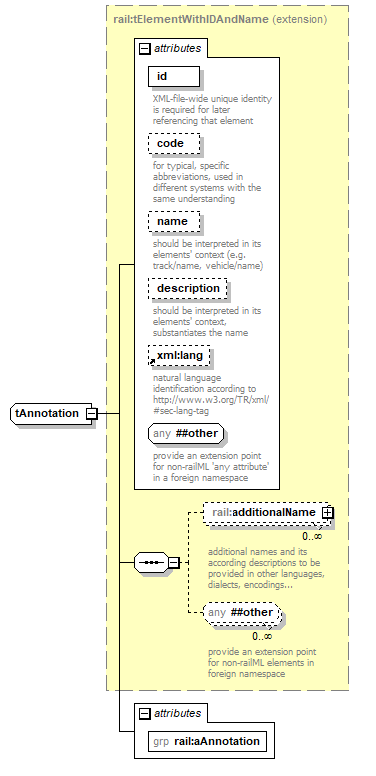 |
||||||||||||||||||||||||||||||||||||||||||||||
| namespace | https://www.railml.org/schemas/2018 | ||||||||||||||||||||||||||||||||||||||||||||||
| type | extension of rail:tElementWithIDAndName | ||||||||||||||||||||||||||||||||||||||||||||||
| properties |
|
||||||||||||||||||||||||||||||||||||||||||||||
| children | rail:additionalName | ||||||||||||||||||||||||||||||||||||||||||||||
| used by |
|
||||||||||||||||||||||||||||||||||||||||||||||
| attributes |
|
||||||||||||||||||||||||||||||||||||||||||||||
| source | <xs:complexType name="tAnnotation"> <xs:complexContent> <xs:extension base="rail:tElementWithIDAndName"> <xs:attributeGroup ref="rail:aAnnotation"/> </xs:extension> </xs:complexContent> </xs:complexType> |
complexType tAnnotationRef
| diagram | 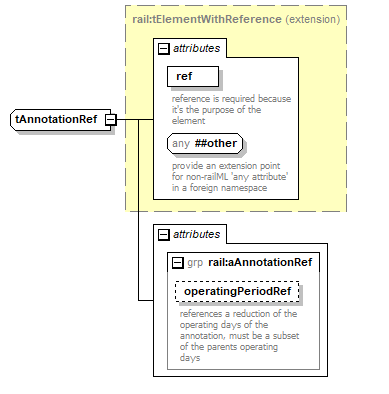 |
||||||||||||||||||||||
| namespace | https://www.railml.org/schemas/2018 | ||||||||||||||||||||||
| type | extension of rail:tElementWithReference | ||||||||||||||||||||||
| properties |
|
||||||||||||||||||||||
| used by |
|
||||||||||||||||||||||
| attributes |
|
||||||||||||||||||||||
| source | <xs:complexType name="tAnnotationRef"> <xs:complexContent> <xs:extension base="rail:tElementWithReference"> <xs:attributeGroup ref="rail:aAnnotationRef"/> </xs:extension> </xs:complexContent> </xs:complexType> |
complexType tAnnotationText
| diagram | 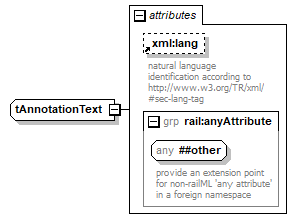 |
||||||||||||||
| namespace | https://www.railml.org/schemas/2018 | ||||||||||||||
| type | extension of xs:string | ||||||||||||||
| properties |
|
||||||||||||||
| used by |
|
||||||||||||||
| attributes |
|
||||||||||||||
| source | <xs:complexType name="tAnnotationText"> <xs:simpleContent> <xs:extension base="xs:string"> <xs:attribute ref="xml:lang"> <xs:annotation> <xs:documentation>natural language identification according to http://www.w3.org/TR/xml/#sec-lang-tag</xs:documentation> </xs:annotation> </xs:attribute> <xs:attributeGroup ref="rail:anyAttribute"/> </xs:extension> </xs:simpleContent> </xs:complexType> |
complexType tArrivalDepartureTimes
| diagram | 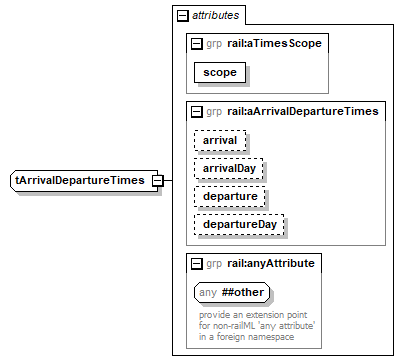 |
||||||||||||||||||||||||||||||||||||
| namespace | https://www.railml.org/schemas/2018 | ||||||||||||||||||||||||||||||||||||
| used by |
|
||||||||||||||||||||||||||||||||||||
| attributes |
|
||||||||||||||||||||||||||||||||||||
| source | <xs:complexType name="tArrivalDepartureTimes"> <xs:attributeGroup ref="rail:aTimesScope"/> <xs:attributeGroup ref="rail:aArrivalDepartureTimes"/> <xs:attributeGroup ref="rail:anyAttribute"/> </xs:complexType> |
complexType tBlock
| diagram | 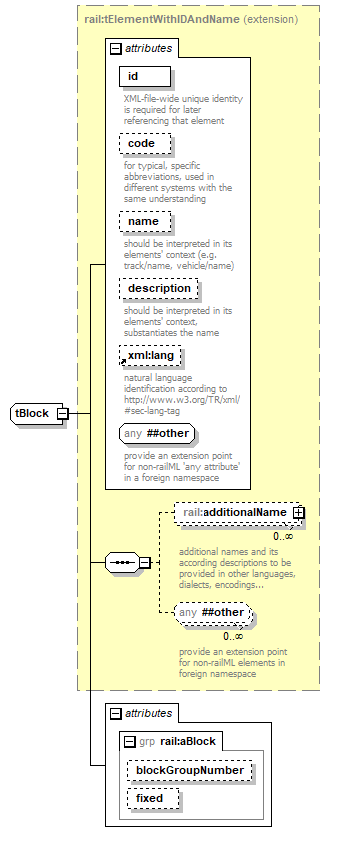 |
||||||||||||||||||||||||||||||||||||||||||||||||||||||||||
| namespace | https://www.railml.org/schemas/2018 | ||||||||||||||||||||||||||||||||||||||||||||||||||||||||||
| type | extension of rail:tElementWithIDAndName | ||||||||||||||||||||||||||||||||||||||||||||||||||||||||||
| properties |
|
||||||||||||||||||||||||||||||||||||||||||||||||||||||||||
| children | rail:additionalName | ||||||||||||||||||||||||||||||||||||||||||||||||||||||||||
| used by |
|
||||||||||||||||||||||||||||||||||||||||||||||||||||||||||
| attributes |
|
||||||||||||||||||||||||||||||||||||||||||||||||||||||||||
| source | <xs:complexType name="tBlock"> <xs:complexContent> <xs:extension base="rail:tElementWithIDAndName"> <xs:attributeGroup ref="rail:aBlock"/> </xs:extension> </xs:complexContent> </xs:complexType> |
complexType tBlockPart
| diagram |  |
||||||||||||||||||||||||||||||||||||||||||||||||||||||||||||||||||||||||||||||||||||||||||||||||||||||||||||||||||||||||||||
| namespace | https://www.railml.org/schemas/2018 | ||||||||||||||||||||||||||||||||||||||||||||||||||||||||||||||||||||||||||||||||||||||||||||||||||||||||||||||||||||||||||||
| type | extension of rail:tElementWithIDAndName | ||||||||||||||||||||||||||||||||||||||||||||||||||||||||||||||||||||||||||||||||||||||||||||||||||||||||||||||||||||||||||||
| properties |
|
||||||||||||||||||||||||||||||||||||||||||||||||||||||||||||||||||||||||||||||||||||||||||||||||||||||||||||||||||||||||||||
| children | rail:additionalName | ||||||||||||||||||||||||||||||||||||||||||||||||||||||||||||||||||||||||||||||||||||||||||||||||||||||||||||||||||||||||||||
| used by |
|
||||||||||||||||||||||||||||||||||||||||||||||||||||||||||||||||||||||||||||||||||||||||||||||||||||||||||||||||||||||||||||
| attributes |
|
||||||||||||||||||||||||||||||||||||||||||||||||||||||||||||||||||||||||||||||||||||||||||||||||||||||||||||||||||||||||||||
| source | <xs:complexType name="tBlockPart"> <xs:complexContent> <xs:extension base="rail:tElementWithIDAndName"> <xs:attributeGroup ref="rail:aBlockPart"/> </xs:extension> </xs:complexContent> </xs:complexType> |
complexType tBlockPartRef
| diagram | 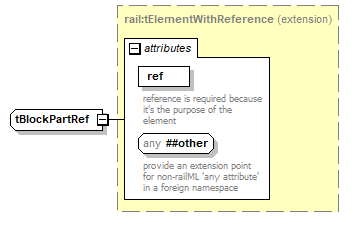 |
||||||||||||||
| namespace | https://www.railml.org/schemas/2018 | ||||||||||||||
| type | extension of rail:tElementWithReference | ||||||||||||||
| properties |
|
||||||||||||||
| used by |
|
||||||||||||||
| attributes |
|
||||||||||||||
| source | <xs:complexType name="tBlockPartRef"> <xs:complexContent> <xs:extension base="rail:tElementWithReference"/> </xs:complexContent> </xs:complexType> |
complexType tBlockPartSequence
| diagram | 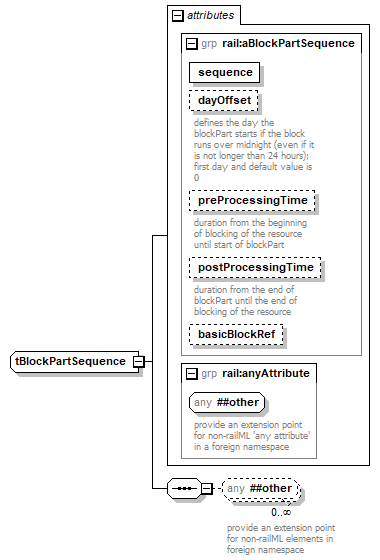 |
||||||||||||||||||||||||||||||||||||||||||
| namespace | https://www.railml.org/schemas/2018 | ||||||||||||||||||||||||||||||||||||||||||
| used by |
|
||||||||||||||||||||||||||||||||||||||||||
| attributes |
|
||||||||||||||||||||||||||||||||||||||||||
| source | <xs:complexType name="tBlockPartSequence"> <xs:sequence> <xs:any namespace="##other" processContents="strict" minOccurs="0" maxOccurs="unbounded"> <xs:annotation> <xs:documentation>provide an extension point for non-railML elements in foreign namespace</xs:documentation> </xs:annotation> </xs:any> </xs:sequence> <xs:attributeGroup ref="rail:aBlockPartSequence"/> <xs:attributeGroup ref="rail:anyAttribute"/> </xs:complexType> |
complexType tBooking
| diagram | 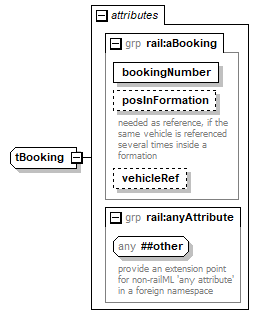 |
||||||||||||||||||||||||||
| namespace | https://www.railml.org/schemas/2018 | ||||||||||||||||||||||||||
| used by |
|
||||||||||||||||||||||||||
| attributes |
|
||||||||||||||||||||||||||
| source | <xs:complexType name="tBooking"> <xs:attributeGroup ref="rail:aBooking"/> <xs:attributeGroup ref="rail:anyAttribute"/> </xs:complexType> |
complexType tCategory
| diagram | 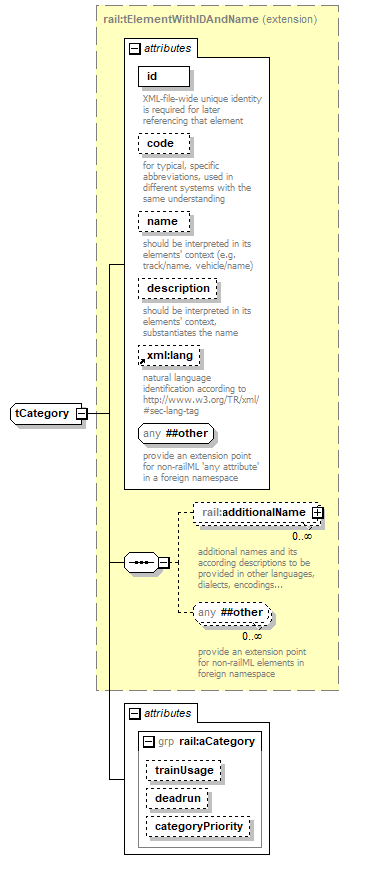 |
||||||||||||||||||||||||||||||||||||||||||||||||||||||||||||||||
| namespace | https://www.railml.org/schemas/2018 | ||||||||||||||||||||||||||||||||||||||||||||||||||||||||||||||||
| type | extension of rail:tElementWithIDAndName | ||||||||||||||||||||||||||||||||||||||||||||||||||||||||||||||||
| properties |
|
||||||||||||||||||||||||||||||||||||||||||||||||||||||||||||||||
| children | rail:additionalName | ||||||||||||||||||||||||||||||||||||||||||||||||||||||||||||||||
| used by |
|
||||||||||||||||||||||||||||||||||||||||||||||||||||||||||||||||
| attributes |
|
||||||||||||||||||||||||||||||||||||||||||||||||||||||||||||||||
| source | <xs:complexType name="tCategory"> <xs:complexContent> <xs:extension base="rail:tElementWithIDAndName"> <xs:attributeGroup ref="rail:aCategory"/> </xs:extension> </xs:complexContent> </xs:complexType> |
complexType tCirculation
| diagram | 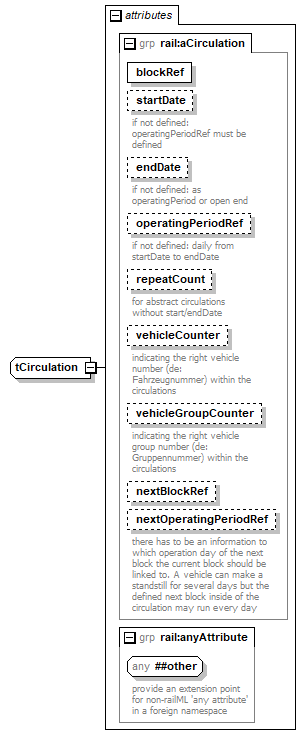 |
||||||||||||||||||||||||||||||||||||||||||||||||||||||||||||||||||||||||||
| namespace | https://www.railml.org/schemas/2018 | ||||||||||||||||||||||||||||||||||||||||||||||||||||||||||||||||||||||||||
| used by |
|
||||||||||||||||||||||||||||||||||||||||||||||||||||||||||||||||||||||||||
| attributes |
|
||||||||||||||||||||||||||||||||||||||||||||||||||||||||||||||||||||||||||
| source | <xs:complexType name="tCirculation"> <xs:attributeGroup ref="rail:aCirculation"/> <xs:attributeGroup ref="rail:anyAttribute"/> </xs:complexType> |
complexType tConnectionTT
| diagram | 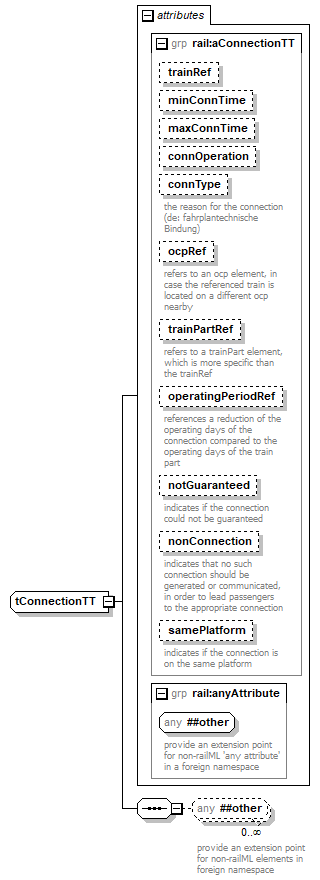 |
||||||||||||||||||||||||||||||||||||||||||||||||||||||||||||||||||||||||||||||||||||||
| namespace | https://www.railml.org/schemas/2018 | ||||||||||||||||||||||||||||||||||||||||||||||||||||||||||||||||||||||||||||||||||||||
| used by |
|
||||||||||||||||||||||||||||||||||||||||||||||||||||||||||||||||||||||||||||||||||||||
| attributes |
|
||||||||||||||||||||||||||||||||||||||||||||||||||||||||||||||||||||||||||||||||||||||
| source | <xs:complexType name="tConnectionTT"> <xs:sequence> <xs:any namespace="##other" processContents="strict" minOccurs="0" maxOccurs="unbounded"> <xs:annotation> <xs:documentation>provide an extension point for non-railML elements in foreign namespace</xs:documentation> </xs:annotation> </xs:any> </xs:sequence> <xs:attributeGroup ref="rail:aConnectionTT"/> <xs:attributeGroup ref="rail:anyAttribute"/> </xs:complexType> |
complexType tEquipment
| diagram | 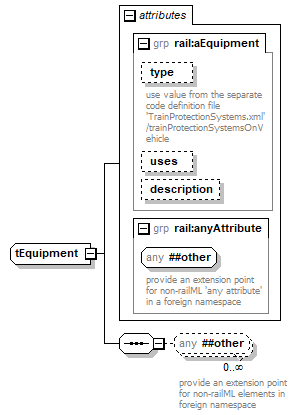 |
||||||||||||||||||||||||||
| namespace | https://www.railml.org/schemas/2018 | ||||||||||||||||||||||||||
| used by |
|
||||||||||||||||||||||||||
| attributes |
|
||||||||||||||||||||||||||
| source | <xs:complexType name="tEquipment"> <xs:sequence> <xs:any namespace="##other" processContents="strict" minOccurs="0" maxOccurs="unbounded"> <xs:annotation> <xs:documentation>provide an extension point for non-railML elements in foreign namespace</xs:documentation> </xs:annotation> </xs:any> </xs:sequence> <xs:attributeGroup ref="rail:aEquipment"/> <xs:attributeGroup ref="rail:anyAttribute"/> </xs:complexType> |
complexType tEtcsTT
| diagram | 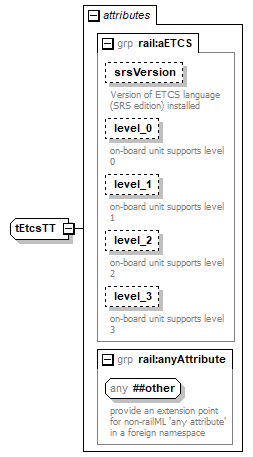 |
||||||||||||||||||||||||||||||||||||||||||||||
| namespace | https://www.railml.org/schemas/2018 | ||||||||||||||||||||||||||||||||||||||||||||||
| used by |
|
||||||||||||||||||||||||||||||||||||||||||||||
| attributes |
|
||||||||||||||||||||||||||||||||||||||||||||||
| source | <xs:complexType name="tEtcsTT"> <xs:attributeGroup ref="rail:aETCS"/> <xs:attributeGroup ref="rail:anyAttribute"/> </xs:complexType> |
complexType tFormationTT
| diagram | 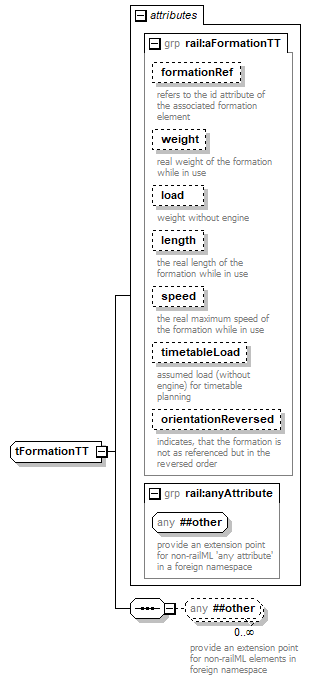 |
||||||||||||||||||||||||||||||||||||||||||||||||||||||||||||||
| namespace | https://www.railml.org/schemas/2018 | ||||||||||||||||||||||||||||||||||||||||||||||||||||||||||||||
| used by |
|
||||||||||||||||||||||||||||||||||||||||||||||||||||||||||||||
| attributes |
|
||||||||||||||||||||||||||||||||||||||||||||||||||||||||||||||
| source | <xs:complexType name="tFormationTT"> <xs:sequence> <xs:any namespace="##other" processContents="strict" minOccurs="0" maxOccurs="unbounded"> <xs:annotation> <xs:documentation>provide an extension point for non-railML elements in foreign namespace</xs:documentation> </xs:annotation> </xs:any> </xs:sequence> <xs:attributeGroup ref="rail:aFormationTT"/> <xs:attributeGroup ref="rail:anyAttribute"/> </xs:complexType> |
complexType tHoliday
| diagram | 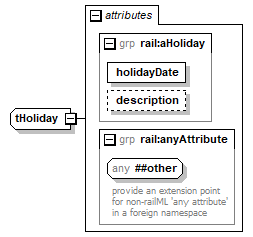 |
||||||||||||||||||
| namespace | https://www.railml.org/schemas/2018 | ||||||||||||||||||
| used by |
|
||||||||||||||||||
| attributes |
|
||||||||||||||||||
| source | <xs:complexType name="tHoliday"> <xs:attributeGroup ref="rail:aHoliday"/> <xs:attributeGroup ref="rail:anyAttribute"/> </xs:complexType> |
complexType tOcpTT
| diagram |  |
||||||||||||||||||||||||||||||||||||||||||||||||||||||||||||||||||||||||||||||||||||||
| namespace | https://www.railml.org/schemas/2018 | ||||||||||||||||||||||||||||||||||||||||||||||||||||||||||||||||||||||||||||||||||||||
| used by |
|
||||||||||||||||||||||||||||||||||||||||||||||||||||||||||||||||||||||||||||||||||||||
| attributes |
|
||||||||||||||||||||||||||||||||||||||||||||||||||||||||||||||||||||||||||||||||||||||
| source | <xs:complexType name="tOcpTT"> <xs:attributeGroup ref="rail:aOcpTT"/> <xs:attributeGroup ref="rail:anyAttribute"/> </xs:complexType> |
complexType tOperatingDay
| diagram | 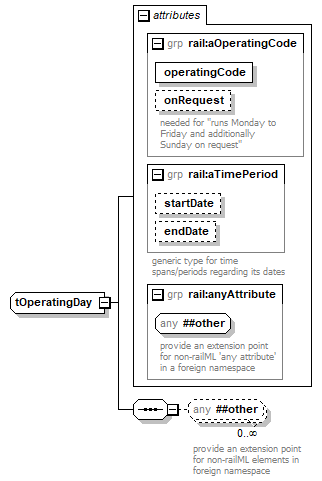 |
||||||||||||||||||||||||||||||||
| namespace | https://www.railml.org/schemas/2018 | ||||||||||||||||||||||||||||||||
| used by |
|
||||||||||||||||||||||||||||||||
| attributes |
|
||||||||||||||||||||||||||||||||
| source | <xs:complexType name="tOperatingDay"> <xs:sequence> <xs:any namespace="##other" processContents="strict" minOccurs="0" maxOccurs="unbounded"> <xs:annotation> <xs:documentation>provide an extension point for non-railML elements in foreign namespace</xs:documentation> </xs:annotation> </xs:any> </xs:sequence> <xs:attributeGroup ref="rail:aOperatingCode"/> <xs:attributeGroup ref="rail:aTimePeriod"/> <xs:attributeGroup ref="rail:anyAttribute"/> </xs:complexType> |
complexType tOperatingDayDeviance
| diagram | 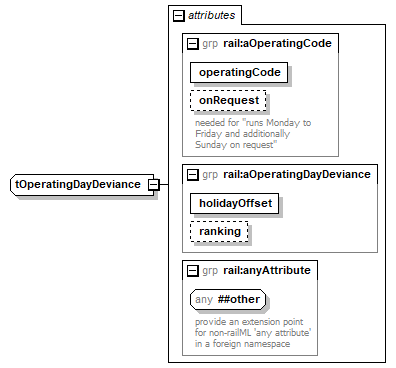 |
||||||||||||||||||||||||||||||||
| namespace | https://www.railml.org/schemas/2018 | ||||||||||||||||||||||||||||||||
| used by |
|
||||||||||||||||||||||||||||||||
| attributes |
|
||||||||||||||||||||||||||||||||
| source | <xs:complexType name="tOperatingDayDeviance"> <xs:attributeGroup ref="rail:aOperatingCode"/> <xs:attributeGroup ref="rail:aOperatingDayDeviance"/> <xs:attributeGroup ref="rail:anyAttribute"/> </xs:complexType> |
complexType tOperatingPeriod
| diagram | 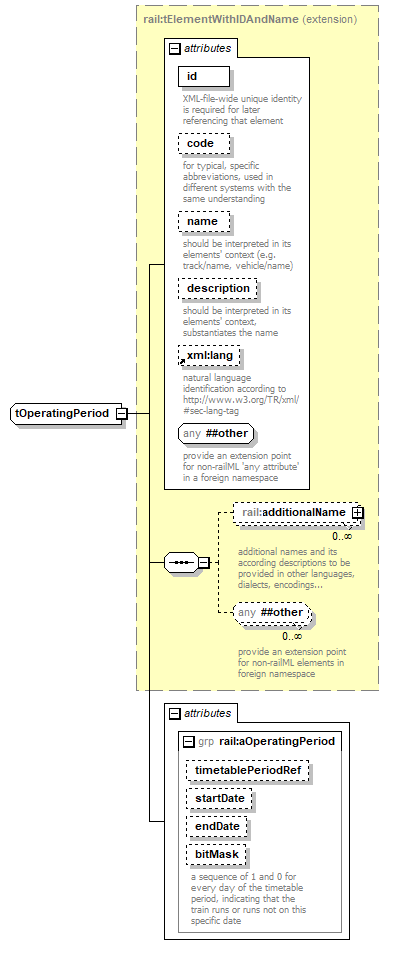 |
||||||||||||||||||||||||||||||||||||||||||||||||||||||||||||||||||||||||
| namespace | https://www.railml.org/schemas/2018 | ||||||||||||||||||||||||||||||||||||||||||||||||||||||||||||||||||||||||
| type | extension of rail:tElementWithIDAndName | ||||||||||||||||||||||||||||||||||||||||||||||||||||||||||||||||||||||||
| properties |
|
||||||||||||||||||||||||||||||||||||||||||||||||||||||||||||||||||||||||
| children | rail:additionalName | ||||||||||||||||||||||||||||||||||||||||||||||||||||||||||||||||||||||||
| used by |
|
||||||||||||||||||||||||||||||||||||||||||||||||||||||||||||||||||||||||
| attributes |
|
||||||||||||||||||||||||||||||||||||||||||||||||||||||||||||||||||||||||
| source | <xs:complexType name="tOperatingPeriod"> <xs:complexContent> <xs:extension base="rail:tElementWithIDAndName"> <xs:attributeGroup ref="rail:aOperatingPeriod"/> </xs:extension> </xs:complexContent> </xs:complexType> |
complexType tOperatingPeriodRef
| diagram | 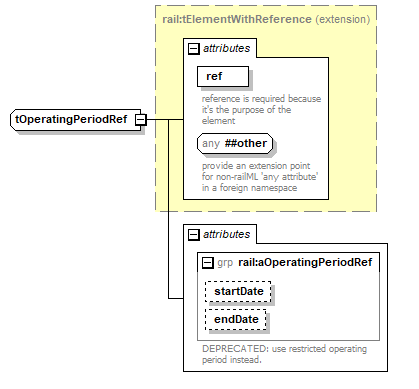 |
||||||||||||||||||||||||||
| namespace | https://www.railml.org/schemas/2018 | ||||||||||||||||||||||||||
| type | extension of rail:tElementWithReference | ||||||||||||||||||||||||||
| properties |
|
||||||||||||||||||||||||||
| used by |
|
||||||||||||||||||||||||||
| attributes |
|
||||||||||||||||||||||||||
| source | <xs:complexType name="tOperatingPeriodRef"> <xs:complexContent> <xs:extension base="rail:tElementWithReference"> <xs:attributeGroup ref="rail:aOperatingPeriodRef"> <xs:annotation> <xs:documentation>DEPRECATED: use restricted operating period instead.</xs:documentation> </xs:annotation> </xs:attributeGroup> </xs:extension> </xs:complexContent> </xs:complexType> |
complexType tPlacesTT
| diagram | 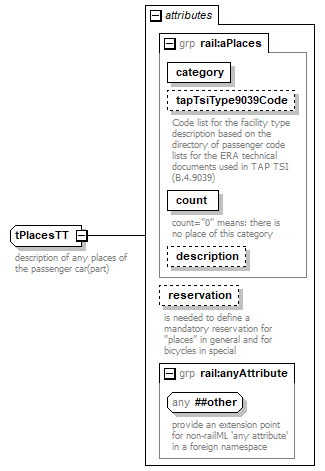 |
||||||||||||||||||||||||||||||||||||||||||||
| namespace | https://www.railml.org/schemas/2018 | ||||||||||||||||||||||||||||||||||||||||||||
| used by |
|
||||||||||||||||||||||||||||||||||||||||||||
| attributes |
|
||||||||||||||||||||||||||||||||||||||||||||
| annotation |
|
||||||||||||||||||||||||||||||||||||||||||||
| source | <xs:complexType name="tPlacesTT"> <xs:annotation> <xs:documentation>description of any places of the passenger car(part)</xs:documentation> </xs:annotation> <xs:attributeGroup ref="rail:aPlaces"/> <xs:attribute name="reservation" type="rail:tPlaceReservation"> <xs:annotation> <xs:documentation>is needed to define a mandatory reservation for "places" in general and for bicycles in special</xs:documentation> </xs:annotation> </xs:attribute> <xs:attributeGroup ref="rail:anyAttribute"/> </xs:complexType> |
attribute tPlacesTT/@reservation
| type | rail:tPlaceReservation | ||
| annotation |
|
||
| source | <xs:attribute name="reservation" type="rail:tPlaceReservation"> <xs:annotation> <xs:documentation>is needed to define a mandatory reservation for "places" in general and for bicycles in special</xs:documentation> </xs:annotation> </xs:attribute> |
complexType tPlatformEdgeRef
| diagram | 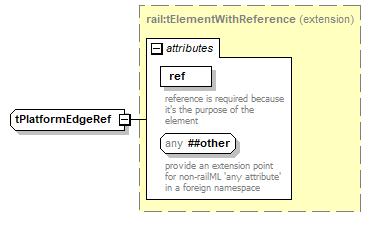 |
||||||||||||||
| namespace | https://www.railml.org/schemas/2018 | ||||||||||||||
| type | extension of rail:tElementWithReference | ||||||||||||||
| properties |
|
||||||||||||||
| used by |
|
||||||||||||||
| attributes |
|
||||||||||||||
| source | <xs:complexType name="tPlatformEdgeRef"> <xs:complexContent> <xs:extension base="rail:tElementWithReference"/> </xs:complexContent> </xs:complexType> |
complexType tRostering
| diagram |  |
||||||||||||||||||||||||||||||||||||||||||||||||||||||||||||||||||||||||||||||||||||||||||||||
| namespace | https://www.railml.org/schemas/2018 | ||||||||||||||||||||||||||||||||||||||||||||||||||||||||||||||||||||||||||||||||||||||||||||||
| type | extension of rail:tElementWithIDAndName | ||||||||||||||||||||||||||||||||||||||||||||||||||||||||||||||||||||||||||||||||||||||||||||||
| properties |
|
||||||||||||||||||||||||||||||||||||||||||||||||||||||||||||||||||||||||||||||||||||||||||||||
| children | rail:additionalName | ||||||||||||||||||||||||||||||||||||||||||||||||||||||||||||||||||||||||||||||||||||||||||||||
| used by |
|
||||||||||||||||||||||||||||||||||||||||||||||||||||||||||||||||||||||||||||||||||||||||||||||
| attributes |
|
||||||||||||||||||||||||||||||||||||||||||||||||||||||||||||||||||||||||||||||||||||||||||||||
| source | <xs:complexType name="tRostering"> <xs:complexContent> <xs:extension base="rail:tElementWithIDAndName"> <xs:attributeGroup ref="rail:aRostering"/> </xs:extension> </xs:complexContent> </xs:complexType> |
complexType tRunTimes
| diagram | 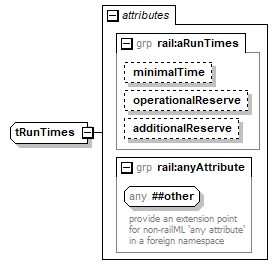 |
||||||||||||||||||||||||
| namespace | https://www.railml.org/schemas/2018 | ||||||||||||||||||||||||
| used by |
|
||||||||||||||||||||||||
| attributes |
|
||||||||||||||||||||||||
| source | <xs:complexType name="tRunTimes"> <xs:attributeGroup ref="rail:aRunTimes"/> <xs:attributeGroup ref="rail:anyAttribute"/> </xs:complexType> |
complexType tSectionTT
| diagram | 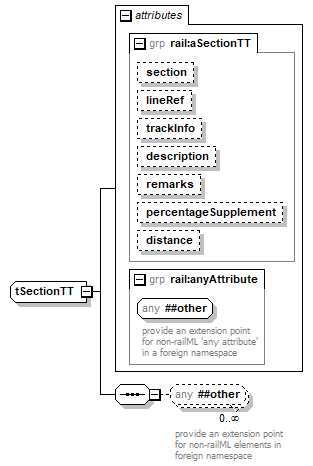 |
||||||||||||||||||||||||||||||||||||||||||||||||
| namespace | https://www.railml.org/schemas/2018 | ||||||||||||||||||||||||||||||||||||||||||||||||
| used by |
|
||||||||||||||||||||||||||||||||||||||||||||||||
| attributes |
|
||||||||||||||||||||||||||||||||||||||||||||||||
| source | <xs:complexType name="tSectionTT"> <xs:sequence> <xs:any namespace="##other" processContents="strict" minOccurs="0" maxOccurs="unbounded"> <xs:annotation> <xs:documentation>provide an extension point for non-railML elements in foreign namespace</xs:documentation> </xs:annotation> </xs:any> </xs:sequence> <xs:attributeGroup ref="rail:aSectionTT"/> <xs:attributeGroup ref="rail:anyAttribute"/> </xs:complexType> |
complexType tServiceSectionRef
| diagram | 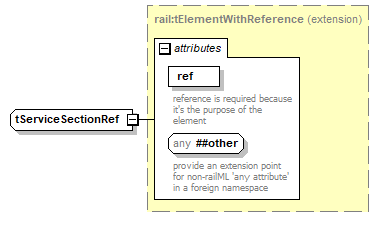 |
||||||||||||||
| namespace | https://www.railml.org/schemas/2018 | ||||||||||||||
| type | extension of rail:tElementWithReference | ||||||||||||||
| properties |
|
||||||||||||||
| used by |
|
||||||||||||||
| attributes |
|
||||||||||||||
| source | <xs:complexType name="tServiceSectionRef"> <xs:complexContent> <xs:extension base="rail:tElementWithReference"/> </xs:complexContent> </xs:complexType> |
complexType tSpecialService
| diagram | 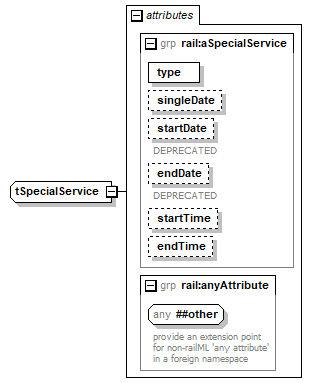 |
||||||||||||||||||||||||||||||||||||||||||||||
| namespace | https://www.railml.org/schemas/2018 | ||||||||||||||||||||||||||||||||||||||||||||||
| used by |
|
||||||||||||||||||||||||||||||||||||||||||||||
| attributes |
|
||||||||||||||||||||||||||||||||||||||||||||||
| source | <xs:complexType name="tSpecialService"> <xs:attributeGroup ref="rail:aSpecialService"/> <xs:attributeGroup ref="rail:anyAttribute"/> </xs:complexType> |
complexType tSpeedProfileRef
| diagram | 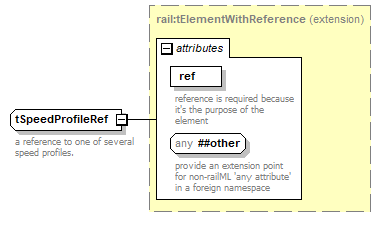 |
||||||||||||||
| namespace | https://www.railml.org/schemas/2018 | ||||||||||||||
| type | extension of rail:tElementWithReference | ||||||||||||||
| properties |
|
||||||||||||||
| used by |
|
||||||||||||||
| attributes |
|
||||||||||||||
| annotation |
|
||||||||||||||
| source | <xs:complexType name="tSpeedProfileRef"> <xs:annotation> <xs:documentation>a reference to one of several speed profiles.</xs:documentation> </xs:annotation> <xs:complexContent> <xs:extension base="rail:tElementWithReference"/> </xs:complexContent> </xs:complexType> |
complexType tStandardDeviationTimes
| diagram | 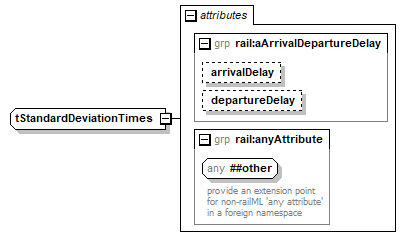 |
||||||||||||||||||
| namespace | https://www.railml.org/schemas/2018 | ||||||||||||||||||
| used by |
|
||||||||||||||||||
| attributes |
|
||||||||||||||||||
| source | <xs:complexType name="tStandardDeviationTimes"> <xs:attributeGroup ref="rail:aArrivalDepartureDelay"/> <xs:attributeGroup ref="rail:anyAttribute"/> </xs:complexType> |
complexType tStationTrackInfo
| diagram | 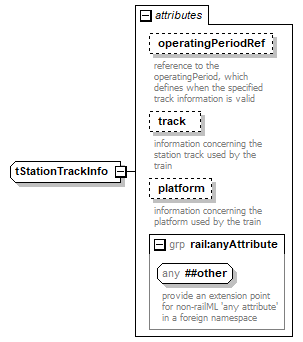 |
||||||||||||||||||||||||||||||
| namespace | https://www.railml.org/schemas/2018 | ||||||||||||||||||||||||||||||
| used by |
|
||||||||||||||||||||||||||||||
| attributes |
|
||||||||||||||||||||||||||||||
| source | <xs:complexType name="tStationTrackInfo"> <xs:attribute name="operatingPeriodRef" type="rail:tGenericRef"> <xs:annotation> <xs:documentation>reference to the operatingPeriod, which defines when the specified track information is valid</xs:documentation> </xs:annotation> </xs:attribute> <xs:attribute name="track" type="xs:string"> <xs:annotation> <xs:documentation>information concerning the station track used by the train</xs:documentation> </xs:annotation> </xs:attribute> <xs:attribute name="platform" type="xs:string"> <xs:annotation> <xs:documentation>information concerning the platform used by the train</xs:documentation> </xs:annotation> </xs:attribute> <xs:attributeGroup ref="rail:anyAttribute"/> </xs:complexType> |
attribute tStationTrackInfo/@operatingPeriodRef
| type | rail:tGenericRef | ||
| annotation |
|
||
| source | <xs:attribute name="operatingPeriodRef" type="rail:tGenericRef"> <xs:annotation> <xs:documentation>reference to the operatingPeriod, which defines when the specified track information is valid</xs:documentation> </xs:annotation> </xs:attribute> |
attribute tStationTrackInfo/@track
| type | xs:string | ||
| annotation |
|
||
| source | <xs:attribute name="track" type="xs:string"> <xs:annotation> <xs:documentation>information concerning the station track used by the train</xs:documentation> </xs:annotation> </xs:attribute> |
attribute tStationTrackInfo/@platform
| type | xs:string | ||
| annotation |
|
||
| source | <xs:attribute name="platform" type="xs:string"> <xs:annotation> <xs:documentation>information concerning the platform used by the train</xs:documentation> </xs:annotation> </xs:attribute> |
complexType tStatistic
| diagram | 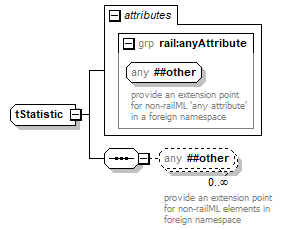 |
||||||
| namespace | https://www.railml.org/schemas/2018 | ||||||
| used by |
|
||||||
| attributes |
|
||||||
| source | <xs:complexType name="tStatistic"> <xs:sequence> <xs:any namespace="##other" processContents="strict" minOccurs="0" maxOccurs="unbounded"> <xs:annotation> <xs:documentation>provide an extension point for non-railML elements in foreign namespace</xs:documentation> </xs:annotation> </xs:any> </xs:sequence> <xs:attributeGroup ref="rail:anyAttribute"/> </xs:complexType> |
complexType tStatisticAnalyses
| diagram | 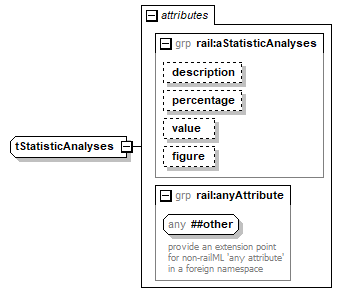 |
||||||||||||||||||||||||||||||
| namespace | https://www.railml.org/schemas/2018 | ||||||||||||||||||||||||||||||
| used by |
|
||||||||||||||||||||||||||||||
| attributes |
|
||||||||||||||||||||||||||||||
| source | <xs:complexType name="tStatisticAnalyses"> <xs:attributeGroup ref="rail:aStatisticAnalyses"/> <xs:attributeGroup ref="rail:anyAttribute"/> </xs:complexType> |
complexType tStatisticTimes
| diagram | 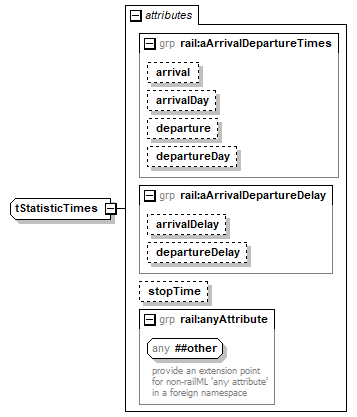 |
||||||||||||||||||||||||||||||||||||||||||||||||
| namespace | https://www.railml.org/schemas/2018 | ||||||||||||||||||||||||||||||||||||||||||||||||
| used by |
|
||||||||||||||||||||||||||||||||||||||||||||||||
| attributes |
|
||||||||||||||||||||||||||||||||||||||||||||||||
| source | <xs:complexType name="tStatisticTimes"> <xs:attributeGroup ref="rail:aArrivalDepartureTimes"/> <xs:attributeGroup ref="rail:aArrivalDepartureDelay"/> <xs:attribute name="stopTime" type="xs:duration"/> <xs:attributeGroup ref="rail:anyAttribute"/> </xs:complexType> |
attribute tStatisticTimes/@stopTime
| type | xs:duration |
| source | <xs:attribute name="stopTime" type="xs:duration"/> |
complexType tStopActivity
| diagram | 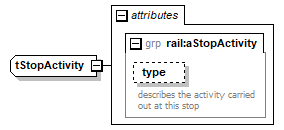 |
||||||||||||||
| namespace | https://www.railml.org/schemas/2018 | ||||||||||||||
| used by |
|
||||||||||||||
| attributes |
|
||||||||||||||
| source | <xs:complexType name="tStopActivity"> <xs:attributeGroup ref="rail:aStopActivity"/> </xs:complexType> |
complexType tStopDescription
| diagram | 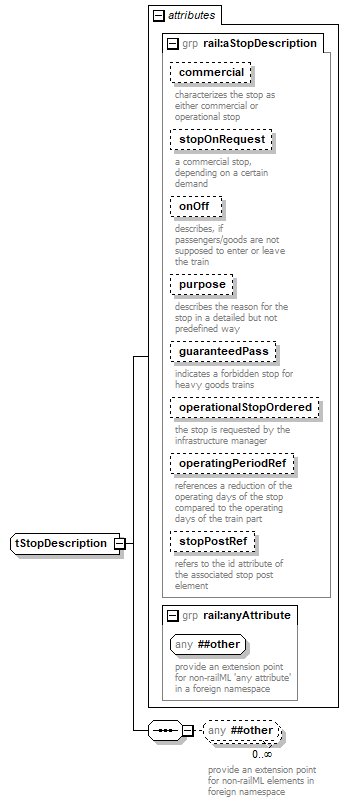 |
||||||||||||||||||||||||||||||||||||||||||||||||||||||||||||||||||||||
| namespace | https://www.railml.org/schemas/2018 | ||||||||||||||||||||||||||||||||||||||||||||||||||||||||||||||||||||||
| used by |
|
||||||||||||||||||||||||||||||||||||||||||||||||||||||||||||||||||||||
| attributes |
|
||||||||||||||||||||||||||||||||||||||||||||||||||||||||||||||||||||||
| source | <xs:complexType name="tStopDescription"> <xs:sequence> <xs:any namespace="##other" processContents="strict" minOccurs="0" maxOccurs="unbounded"> <xs:annotation> <xs:documentation>provide an extension point for non-railML elements in foreign namespace</xs:documentation> </xs:annotation> </xs:any> </xs:sequence> <xs:attributeGroup ref="rail:aStopDescription"/> <xs:attributeGroup ref="rail:anyAttribute"/> </xs:complexType> |
complexType tStopTimes
| diagram | 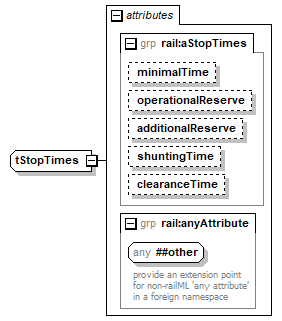 |
||||||||||||||||||||||||||||||||||||
| namespace | https://www.railml.org/schemas/2018 | ||||||||||||||||||||||||||||||||||||
| used by |
|
||||||||||||||||||||||||||||||||||||
| attributes |
|
||||||||||||||||||||||||||||||||||||
| source | <xs:complexType name="tStopTimes"> <xs:attributeGroup ref="rail:aStopTimes"/> <xs:attributeGroup ref="rail:anyAttribute"/> </xs:complexType> |
complexType tTapTsiCompositIdentifierOperationalType
| diagram | 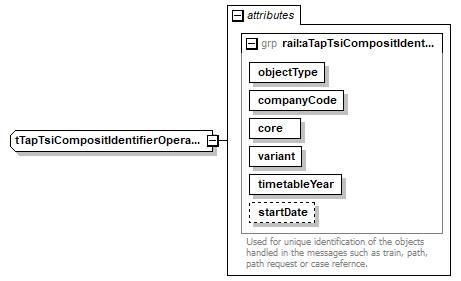 |
||||||||||||||||||||||||||||||||||||||||||
| namespace | https://www.railml.org/schemas/2018 | ||||||||||||||||||||||||||||||||||||||||||
| used by |
|
||||||||||||||||||||||||||||||||||||||||||
| attributes |
|
||||||||||||||||||||||||||||||||||||||||||
| source | <xs:complexType name="tTapTsiCompositIdentifierOperationalType"> <xs:attributeGroup ref="rail:aTapTsiCompositIdentifierOperationalType"/> </xs:complexType> |
complexType tTimetable
| diagram | 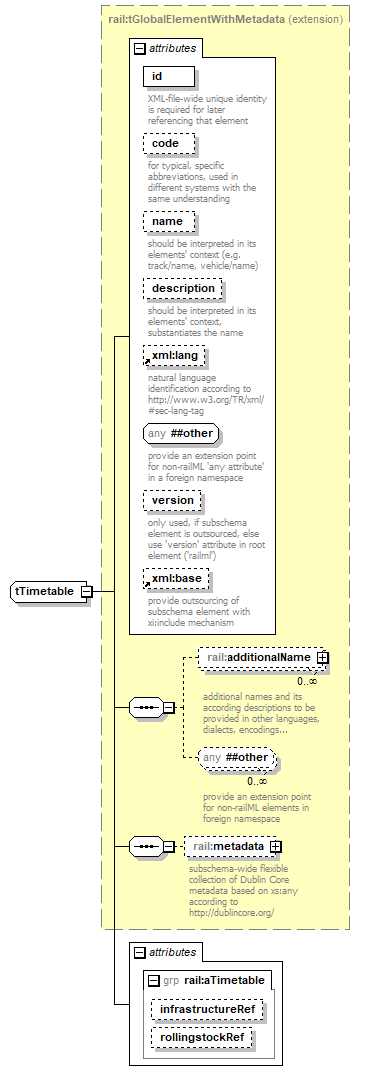 |
||||||||||||||||||||||||||||||||||||||||||||||||||||||||||||||||||||||||||
| namespace | https://www.railml.org/schemas/2018 | ||||||||||||||||||||||||||||||||||||||||||||||||||||||||||||||||||||||||||
| type | extension of rail:tGlobalElementWithMetadata | ||||||||||||||||||||||||||||||||||||||||||||||||||||||||||||||||||||||||||
| properties |
|
||||||||||||||||||||||||||||||||||||||||||||||||||||||||||||||||||||||||||
| children | rail:additionalName rail:metadata | ||||||||||||||||||||||||||||||||||||||||||||||||||||||||||||||||||||||||||
| used by |
|
||||||||||||||||||||||||||||||||||||||||||||||||||||||||||||||||||||||||||
| attributes |
|
||||||||||||||||||||||||||||||||||||||||||||||||||||||||||||||||||||||||||
| source | <xs:complexType name="tTimetable"> <xs:complexContent> <xs:extension base="rail:tGlobalElementWithMetadata"> <xs:attributeGroup ref="rail:aTimetable"/> </xs:extension> </xs:complexContent> </xs:complexType> |
complexType tTimetablePeriod
| diagram | 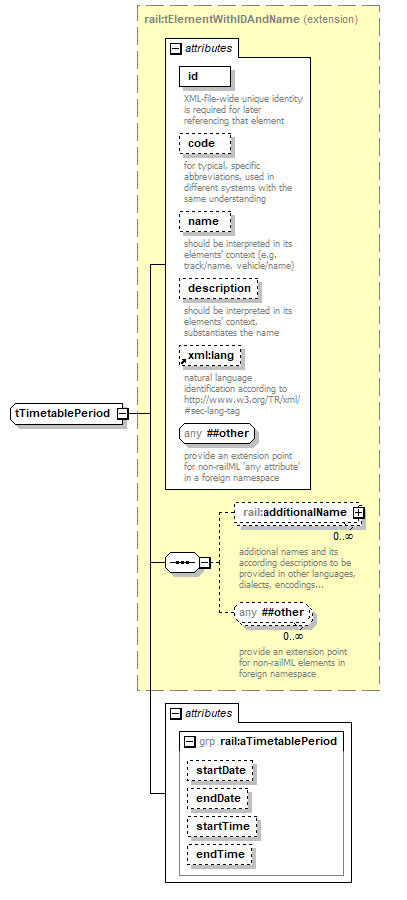 |
||||||||||||||||||||||||||||||||||||||||||||||||||||||||||||||||||||||
| namespace | https://www.railml.org/schemas/2018 | ||||||||||||||||||||||||||||||||||||||||||||||||||||||||||||||||||||||
| type | extension of rail:tElementWithIDAndName | ||||||||||||||||||||||||||||||||||||||||||||||||||||||||||||||||||||||
| properties |
|
||||||||||||||||||||||||||||||||||||||||||||||||||||||||||||||||||||||
| children | rail:additionalName | ||||||||||||||||||||||||||||||||||||||||||||||||||||||||||||||||||||||
| used by |
|
||||||||||||||||||||||||||||||||||||||||||||||||||||||||||||||||||||||
| attributes |
|
||||||||||||||||||||||||||||||||||||||||||||||||||||||||||||||||||||||
| source | <xs:complexType name="tTimetablePeriod"> <xs:complexContent> <xs:extension base="rail:tElementWithIDAndName"> <xs:attributeGroup ref="rail:aTimetablePeriod"/> </xs:extension> </xs:complexContent> </xs:complexType> |
complexType tTopologyReference
| diagram | 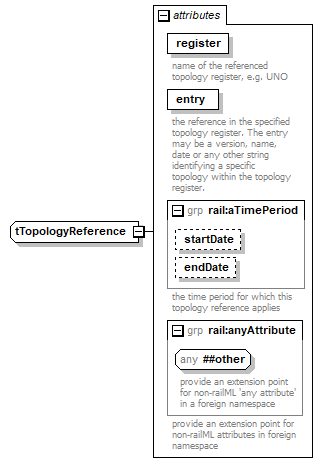 |
||||||||||||||||||||||||||||||||||
| namespace | https://www.railml.org/schemas/2018 | ||||||||||||||||||||||||||||||||||
| used by |
|
||||||||||||||||||||||||||||||||||
| attributes |
|
||||||||||||||||||||||||||||||||||
| source | <xs:complexType name="tTopologyReference"> <xs:attribute name="register" type="xs:string" use="required"> <xs:annotation> <xs:documentation>name of the referenced topology register, e.g. UNO</xs:documentation> </xs:annotation> </xs:attribute> <xs:attribute name="entry" type="xs:string" use="required"> <xs:annotation> <xs:documentation>the reference in the specified topology register. The entry may be a version, name, date or any other string identifying a specific topology within the topology register.</xs:documentation> </xs:annotation> </xs:attribute> <xs:attributeGroup ref="rail:aTimePeriod"> <xs:annotation> <xs:documentation>the time period for which this topology reference applies</xs:documentation> </xs:annotation> </xs:attributeGroup> <xs:attributeGroup ref="rail:anyAttribute"> <xs:annotation> <xs:documentation>provide an extension point for non-railML attributes in foreign namespace</xs:documentation> </xs:annotation> </xs:attributeGroup> </xs:complexType> |
attribute tTopologyReference/@register
| type | xs:string | ||
| properties |
|
||
| annotation |
|
||
| source | <xs:attribute name="register" type="xs:string" use="required"> <xs:annotation> <xs:documentation>name of the referenced topology register, e.g. UNO</xs:documentation> </xs:annotation> </xs:attribute> |
attribute tTopologyReference/@entry
| type | xs:string | ||
| properties |
|
||
| annotation |
|
||
| source | <xs:attribute name="entry" type="xs:string" use="required"> <xs:annotation> <xs:documentation>the reference in the specified topology register. The entry may be a version, name, date or any other string identifying a specific topology within the topology register.</xs:documentation> </xs:annotation> </xs:attribute> |
complexType tTrackRef
| diagram | 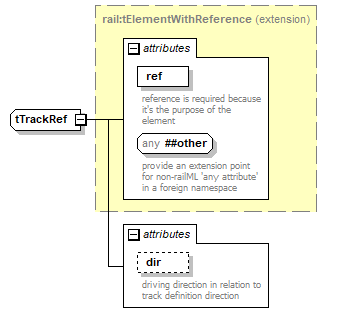 |
||||||||||||||||||||||
| namespace | https://www.railml.org/schemas/2018 | ||||||||||||||||||||||
| type | extension of rail:tElementWithReference | ||||||||||||||||||||||
| properties |
|
||||||||||||||||||||||
| used by |
|
||||||||||||||||||||||
| attributes |
|
||||||||||||||||||||||
| source | <xs:complexType name="tTrackRef"> <xs:complexContent> <xs:extension base="rail:tElementWithReference"> <xs:attribute name="dir" type="rail:tStrictDirection"> <xs:annotation> <xs:documentation>driving direction in relation to track definition direction</xs:documentation> </xs:annotation> </xs:attribute> </xs:extension> </xs:complexContent> </xs:complexType> |
attribute tTrackRef/@dir
| type | rail:tStrictDirection | |||||||||
| facets |
|
|||||||||
| annotation |
|
|||||||||
| source | <xs:attribute name="dir" type="rail:tStrictDirection"> <xs:annotation> <xs:documentation>driving direction in relation to track definition direction</xs:documentation> </xs:annotation> </xs:attribute> |
complexType tTrain
| diagram |  |
||||||||||||||||||||||||||||||||||||||||||||||||||||||||||||||||||||||||||||||||||||||||||||
| namespace | https://www.railml.org/schemas/2018 | ||||||||||||||||||||||||||||||||||||||||||||||||||||||||||||||||||||||||||||||||||||||||||||
| type | extension of rail:tElementWithIDAndName | ||||||||||||||||||||||||||||||||||||||||||||||||||||||||||||||||||||||||||||||||||||||||||||
| properties |
|
||||||||||||||||||||||||||||||||||||||||||||||||||||||||||||||||||||||||||||||||||||||||||||
| children | rail:additionalName | ||||||||||||||||||||||||||||||||||||||||||||||||||||||||||||||||||||||||||||||||||||||||||||
| used by |
|
||||||||||||||||||||||||||||||||||||||||||||||||||||||||||||||||||||||||||||||||||||||||||||
| attributes |
|
||||||||||||||||||||||||||||||||||||||||||||||||||||||||||||||||||||||||||||||||||||||||||||
| source | <xs:complexType name="tTrain"> <xs:complexContent> <xs:extension base="rail:tElementWithIDAndName"> <xs:attributeGroup ref="rail:aTrain"/> </xs:extension> </xs:complexContent> </xs:complexType> |
complexType tTrainGroup
| diagram | 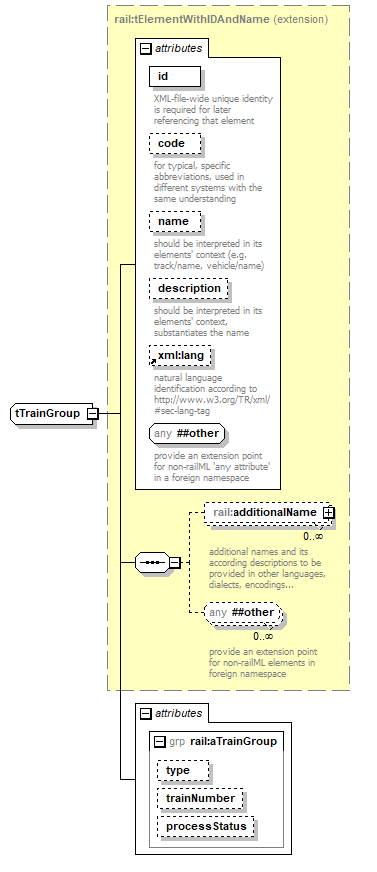 |
||||||||||||||||||||||||||||||||||||||||||||||||||||||||||||||||
| namespace | https://www.railml.org/schemas/2018 | ||||||||||||||||||||||||||||||||||||||||||||||||||||||||||||||||
| type | extension of rail:tElementWithIDAndName | ||||||||||||||||||||||||||||||||||||||||||||||||||||||||||||||||
| properties |
|
||||||||||||||||||||||||||||||||||||||||||||||||||||||||||||||||
| children | rail:additionalName | ||||||||||||||||||||||||||||||||||||||||||||||||||||||||||||||||
| used by |
|
||||||||||||||||||||||||||||||||||||||||||||||||||||||||||||||||
| attributes |
|
||||||||||||||||||||||||||||||||||||||||||||||||||||||||||||||||
| source | <xs:complexType name="tTrainGroup"> <xs:complexContent> <xs:extension base="rail:tElementWithIDAndName"> <xs:attributeGroup ref="rail:aTrainGroup"/> </xs:extension> </xs:complexContent> </xs:complexType> |
complexType tTrainPart
| diagram |  |
||||||||||||||||||||||||||||||||||||||||||||||||||||||||||||||||||||||||||||||||||||||||||||||||||||||||||||||||||||||||
| namespace | https://www.railml.org/schemas/2018 | ||||||||||||||||||||||||||||||||||||||||||||||||||||||||||||||||||||||||||||||||||||||||||||||||||||||||||||||||||||||||
| type | extension of rail:tElementWithIDAndName | ||||||||||||||||||||||||||||||||||||||||||||||||||||||||||||||||||||||||||||||||||||||||||||||||||||||||||||||||||||||||
| properties |
|
||||||||||||||||||||||||||||||||||||||||||||||||||||||||||||||||||||||||||||||||||||||||||||||||||||||||||||||||||||||||
| children | rail:additionalName | ||||||||||||||||||||||||||||||||||||||||||||||||||||||||||||||||||||||||||||||||||||||||||||||||||||||||||||||||||||||||
| used by |
|
||||||||||||||||||||||||||||||||||||||||||||||||||||||||||||||||||||||||||||||||||||||||||||||||||||||||||||||||||||||||
| attributes |
|
||||||||||||||||||||||||||||||||||||||||||||||||||||||||||||||||||||||||||||||||||||||||||||||||||||||||||||||||||||||||
| source | <xs:complexType name="tTrainPart"> <xs:complexContent> <xs:extension base="rail:tElementWithIDAndName"> <xs:attributeGroup ref="rail:aTrainPart"/> </xs:extension> </xs:complexContent> </xs:complexType> |
complexType tTrainPartRef
| diagram | 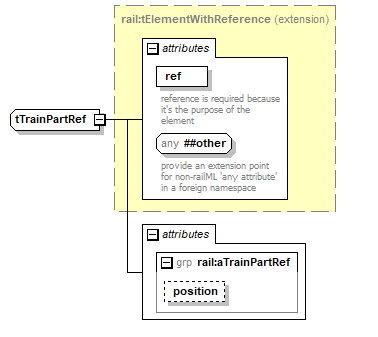 |
||||||||||||||||||||
| namespace | https://www.railml.org/schemas/2018 | ||||||||||||||||||||
| type | extension of rail:tElementWithReference | ||||||||||||||||||||
| properties |
|
||||||||||||||||||||
| used by |
|
||||||||||||||||||||
| attributes |
|
||||||||||||||||||||
| source | <xs:complexType name="tTrainPartRef"> <xs:complexContent> <xs:extension base="rail:tElementWithReference"> <xs:attributeGroup ref="rail:aTrainPartRef"/> </xs:extension> </xs:complexContent> </xs:complexType> |
complexType tTrainPartSequence
| diagram | 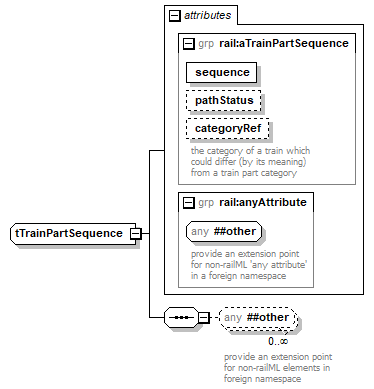 |
||||||||||||||||||||||||||
| namespace | https://www.railml.org/schemas/2018 | ||||||||||||||||||||||||||
| used by |
|
||||||||||||||||||||||||||
| attributes |
|
||||||||||||||||||||||||||
| source | <xs:complexType name="tTrainPartSequence"> <xs:sequence> <xs:any namespace="##other" processContents="strict" minOccurs="0" maxOccurs="unbounded"> <xs:annotation> <xs:documentation>provide an extension point for non-railML elements in foreign namespace</xs:documentation> </xs:annotation> </xs:any> </xs:sequence> <xs:attributeGroup ref="rail:aTrainPartSequence"/> <xs:attributeGroup ref="rail:anyAttribute"/> </xs:complexType> |
complexType tUniqueTrainKey
| diagram | 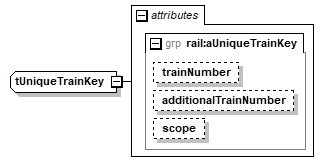 |
||||||||||||||||||||||||
| namespace | https://www.railml.org/schemas/2018 | ||||||||||||||||||||||||
| used by |
|
||||||||||||||||||||||||
| attributes |
|
||||||||||||||||||||||||
| source | <xs:complexType name="tUniqueTrainKey"> <xs:attributeGroup ref="rail:aUniqueTrainKey"/> </xs:complexType> |
simpleType tBitMask
| namespace | https://www.railml.org/schemas/2018 | ||||||
| type | restriction of xs:string | ||||||
| properties |
|
||||||
| used by |
|
||||||
| facets |
|
||||||
| source | <xs:simpleType name="tBitMask"> <xs:restriction base="xs:string"> <xs:pattern value="[0-1]*"/> </xs:restriction> </xs:simpleType> |
simpleType tCompanyCode
| namespace | https://www.railml.org/schemas/2018 | |||||||||
| type | restriction of xs:integer | |||||||||
| properties |
|
|||||||||
| used by |
|
|||||||||
| facets |
|
|||||||||
| annotation |
|
|||||||||
| source | <xs:simpleType name="tCompanyCode"> <xs:annotation> <xs:documentation>Company code according TAP TSI B.8 and UIC IRS/leaflet 920-1:2006</xs:documentation> </xs:annotation> <xs:restriction base="xs:integer"> <xs:minInclusive value="0001"/> <xs:maxInclusive value="9999"/> </xs:restriction> </xs:simpleType> |
simpleType tConnOperation
| namespace | https://www.railml.org/schemas/2018 | ||
| type | union of (restriction of xs:string, rail:tOtherEnumerationValue) | ||
| used by |
|
||
| source | <xs:simpleType name="tConnOperation"> <xs:union> <xs:simpleType> <xs:restriction base="xs:string"> <xs:enumeration value="none"/> <xs:enumeration value="join"> <xs:annotation> <xs:documentation>train will be coupled together with an other train</xs:documentation> <xs:documentation>DEPRECATED with 2.1: use commercial trains instead</xs:documentation> </xs:annotation> </xs:enumeration> <xs:enumeration value="split"> <xs:annotation> <xs:documentation>part of the train will go on as an other train</xs:documentation> <xs:documentation>DEPRECATED with 2.1: use commercial trains instead</xs:documentation> </xs:annotation> </xs:enumeration> <xs:enumeration value="meet"/> <xs:enumeration value="turnaround"> <xs:annotation> <xs:documentation>the train will go on as an other train</xs:documentation> <xs:documentation>DEPRECATED with 2.1: use rosterings instead</xs:documentation> </xs:annotation> </xs:enumeration> <xs:enumeration value="IsWaitingFor"/> <xs:enumeration value="IsExpectedBy"/> </xs:restriction> </xs:simpleType> <xs:simpleType> <xs:restriction base="rail:tOtherEnumerationValue"/> </xs:simpleType> </xs:union> </xs:simpleType> |
simpleType tConnType
| namespace | https://www.railml.org/schemas/2018 | ||
| type | union of (restriction of xs:string, rail:tOtherEnumerationValue) | ||
| used by |
|
||
| source | <xs:simpleType name="tConnType"> <xs:union> <xs:simpleType> <xs:restriction base="xs:string"> <xs:enumeration value="commercial"/> <xs:enumeration value="operational"/> </xs:restriction> </xs:simpleType> <xs:simpleType> <xs:restriction base="rail:tOtherEnumerationValue"/> </xs:simpleType> </xs:union> </xs:simpleType> |
simpleType tMission
| namespace | https://www.railml.org/schemas/2018 | ||
| type | union of (restriction of xs:string, rail:tOtherEnumerationValue) | ||
| used by |
|
||
| source | <xs:simpleType name="tMission"> <xs:union> <xs:simpleType> <xs:restriction base="xs:string"> <xs:enumeration value="timetable"/> <xs:enumeration value="fullRun"/> <xs:enumeration value="emptyRun"/> <xs:enumeration value="outOfOrder"/> <xs:enumeration value="fillIn"/> <xs:enumeration value="preheating"/> <xs:enumeration value="refuel"/> <xs:enumeration value="shunting"/> <xs:enumeration value="depotrun"/> <xs:enumeration value="standBy"/> <xs:enumeration value="cleaning"/> <xs:enumeration value="maintenance"/> <xs:enumeration value="inspection"/> </xs:restriction> </xs:simpleType> <xs:simpleType> <xs:restriction base="rail:tOtherEnumerationValue"/> </xs:simpleType> </xs:union> </xs:simpleType> |
simpleType tOcpTTType
| namespace | https://www.railml.org/schemas/2018 | |||||||||||||||||||||||
| type | restriction of xs:string | |||||||||||||||||||||||
| properties |
|
|||||||||||||||||||||||
| used by |
|
|||||||||||||||||||||||
| facets |
|
|||||||||||||||||||||||
| source | <xs:simpleType name="tOcpTTType"> <xs:restriction base="xs:string"> <xs:enumeration value="stop"> <xs:annotation> <xs:documentation>indicates that the train is going to stop at this ocp</xs:documentation> </xs:annotation> </xs:enumeration> <xs:enumeration value="pass"> <xs:annotation> <xs:documentation>indicates that the train is NOT going to stop at this ocp</xs:documentation> </xs:annotation> </xs:enumeration> <xs:enumeration value="begin"> <xs:annotation> <xs:documentation>DEPRECATED: possible for the first ocp, if train part begins at this ocp and is not part of a longer train path</xs:documentation> </xs:annotation> </xs:enumeration> <xs:enumeration value="end"> <xs:annotation> <xs:documentation>DEPRECATED: possible for the last ocp, if train part ends at this ocp and is not part of a longer train path</xs:documentation> </xs:annotation> </xs:enumeration> </xs:restriction> </xs:simpleType> |
simpleType tOnOff
| namespace | https://www.railml.org/schemas/2018 | ||||||||||||
| type | restriction of xs:string | ||||||||||||
| properties |
|
||||||||||||
| used by |
|
||||||||||||
| facets |
|
||||||||||||
| source | <xs:simpleType name="tOnOff"> <xs:restriction base="xs:string"> <xs:enumeration value="both"/> <xs:enumeration value="on"/> <xs:enumeration value="off"/> </xs:restriction> </xs:simpleType> |
simpleType tOperatingCode
| namespace | https://www.railml.org/schemas/2018 | |||||||||
| type | restriction of xs:string | |||||||||
| properties |
|
|||||||||
| used by |
|
|||||||||
| facets |
|
|||||||||
| source | <xs:simpleType name="tOperatingCode"> <xs:restriction base="xs:string"> <xs:length value="7"/> <xs:pattern value="[0-1]{7}"/> </xs:restriction> </xs:simpleType> |
simpleType tPathStatus
| namespace | https://www.railml.org/schemas/2018 | ||
| type | union of (restriction of xs:string, rail:tOtherEnumerationValue) | ||
| used by |
|
||
| source | <xs:simpleType name="tPathStatus"> <xs:union> <xs:simpleType> <xs:restriction base="xs:string"> <xs:enumeration value="planned"/> <xs:enumeration value="ordered"/> <xs:enumeration value="confirmed"/> <xs:enumeration value="detailsRefused"/> <xs:enumeration value="cancelled"/> <xs:enumeration value="notAvailable"/> </xs:restriction> </xs:simpleType> <xs:simpleType> <xs:restriction base="rail:tOtherEnumerationValue"/> </xs:simpleType> </xs:union> </xs:simpleType> |
simpleType tPlaceReservation
| namespace | https://www.railml.org/schemas/2018 | ||
| type | union of (restriction of xs:string, rail:tOtherEnumerationValue) | ||
| used by |
|
||
| source | <xs:simpleType name="tPlaceReservation"> <xs:union> <xs:simpleType> <xs:restriction base="xs:string"> <xs:enumeration value="notPossible"/> <xs:enumeration value="possible"/> <xs:enumeration value="recommended"/> <xs:enumeration value="compulsory"/> </xs:restriction> </xs:simpleType> <xs:simpleType> <xs:restriction base="rail:tOtherEnumerationValue"/> </xs:simpleType> </xs:union> </xs:simpleType> |
simpleType tProcessStatus
| namespace | https://www.railml.org/schemas/2018 | ||
| type | union of (restriction of xs:string, rail:tOtherEnumerationValue) | ||
| used by |
|
||
| source | <xs:simpleType name="tProcessStatus"> <xs:union> <xs:simpleType> <xs:restriction base="xs:string"> <xs:enumeration value="planned"/> <xs:enumeration value="actual"/> <xs:enumeration value="calculated"/> <xs:enumeration value="toBeChecked"/> <xs:enumeration value="changed"/> <xs:enumeration value="imported"/> </xs:restriction> </xs:simpleType> <xs:simpleType> <xs:restriction base="rail:tOtherEnumerationValue"/> </xs:simpleType> </xs:union> </xs:simpleType> |
simpleType tRosteringScope
| namespace | https://www.railml.org/schemas/2018 | ||
| type | union of (restriction of xs:string, rail:tOtherEnumerationValue) | ||
| used by |
|
||
| source | <xs:simpleType name="tRosteringScope"> <xs:union> <xs:simpleType> <xs:restriction base="xs:string"> <xs:enumeration value="conceptional"/> <xs:enumeration value="operational"/> <xs:enumeration value="timetable"/> </xs:restriction> </xs:simpleType> <xs:simpleType> <xs:restriction base="rail:tOtherEnumerationValue"/> </xs:simpleType> </xs:union> </xs:simpleType> |
simpleType tSpecialServiceType
| namespace | https://www.railml.org/schemas/2018 | |||||||||
| type | restriction of xs:string | |||||||||
| properties |
|
|||||||||
| used by |
|
|||||||||
| facets |
|
|||||||||
| source | <xs:simpleType name="tSpecialServiceType"> <xs:restriction base="xs:string"> <xs:enumeration value="include"/> <xs:enumeration value="exclude"/> </xs:restriction> </xs:simpleType> |
simpleType tStatisticFigure
| namespace | https://www.railml.org/schemas/2018 | ||
| type | union of (restriction of xs:string, rail:tOtherEnumerationValue) | ||
| used by |
|
||
| source | <xs:simpleType name="tStatisticFigure"> <xs:union> <xs:simpleType> <xs:restriction base="xs:string"> <xs:enumeration value="maxDelayArrival"/> <xs:enumeration value="maxDelayDeparture"/> <xs:enumeration value="meanDelayArrival"/> <xs:enumeration value="meanDelayDeparture"/> <xs:enumeration value="medianDelayArrival"/> <xs:enumeration value="medianDelayDeparture"/> </xs:restriction> </xs:simpleType> <xs:simpleType> <xs:restriction base="rail:tOtherEnumerationValue"/> </xs:simpleType> </xs:union> </xs:simpleType> |
simpleType tStopActivityTypes
| namespace | https://www.railml.org/schemas/2018 | ||
| type | union of (restriction of xs:string, rail:tOtherEnumerationValue) | ||
| used by |
|
||
| source | <xs:simpleType name="tStopActivityTypes"> <xs:union> <xs:simpleType> <xs:restriction base="xs:string"> <xs:enumeration value="collect"> <xs:annotation> <xs:documentation>Couple vehicles / train parts - intended for non-self-propelling train parts. Please consider relation to formations (as far as used)</xs:documentation> </xs:annotation> </xs:enumeration> <xs:enumeration value="drop"> <xs:annotation> <xs:documentation>Uncouple vehicles / train parts - intended for non-self-propelling train parts. Please consider relation to formations (as far as used)</xs:documentation> </xs:annotation> </xs:enumeration> <xs:enumeration value="split"> <xs:annotation> <xs:documentation>Uncouple vehicles / train parts - intended for self-propelling train parts. Please consider relation to formations (as far as used)</xs:documentation> </xs:annotation> </xs:enumeration> <xs:enumeration value="join"> <xs:annotation> <xs:documentation>Couple vehicles / train parts - intended for self-propelling train parts. Please consider relation to formations (as far as used)</xs:documentation> </xs:annotation> </xs:enumeration> <xs:enumeration value="shunting"> <xs:annotation> <xs:documentation>Shunting movements are planned during stop (may also be used additionally to collect/drop/split/join/staple on demand)</xs:documentation> </xs:annotation> </xs:enumeration> <xs:enumeration value="crewChange"> <xs:annotation> <xs:documentation>Stop to change engine or train crew</xs:documentation> </xs:annotation> </xs:enumeration> <xs:enumeration value="crewBreak"> <xs:annotation> <xs:documentation>Stop for engine or train crew to pause</xs:documentation> </xs:annotation> </xs:enumeration> <xs:enumeration value="reverse"> <xs:annotation> <xs:documentation>Stop to change driving direction of train. Consider relation to @formationReversed</xs:documentation> </xs:annotation> </xs:enumeration> <xs:enumeration value="runAround"> <xs:annotation> <xs:documentation>Shunting of the engine to the other end of train (normally during change of driving direction). Normally combined with reverse</xs:documentation> </xs:annotation> </xs:enumeration> <xs:enumeration value="engineAttach"> <xs:annotation> <xs:documentation>Receiving of pilot/pushing/double-heading engines - no train coupling</xs:documentation> </xs:annotation> </xs:enumeration> <xs:enumeration value="engineDetach"> <xs:annotation> <xs:documentation>Dropping of pilot/pushing/double-heading engines - no train splitting</xs:documentation> </xs:annotation> </xs:enumeration> <xs:enumeration value="engineChange"> <xs:annotation> <xs:documentation>Change of engine (no train coupling and sharing / splitting)</xs:documentation> </xs:annotation> </xs:enumeration> <xs:enumeration value="staple"> <xs:annotation> <xs:documentation>Notes the necessity of staple track(s) during the stop time</xs:documentation> </xs:annotation> </xs:enumeration> <xs:enumeration value="occupation"> <xs:annotation> <xs:documentation>Stop caused by occupation of lines, tracks, blocks incl. crossing without further specification</xs:documentation> </xs:annotation> </xs:enumeration> <xs:enumeration value="occupationBlock"> <xs:annotation> <xs:documentation>Stop caused by occupation of route by another train running ahead</xs:documentation> </xs:annotation> </xs:enumeration> <xs:enumeration value="occupationCrossing"> <xs:annotation> <xs:documentation>Stop caused by occupation of route by an oncoming train</xs:documentation> </xs:annotation> </xs:enumeration> <xs:enumeration value="occupationStation"> <xs:annotation> <xs:documentation>Stop caused by occupation of station track(s)</xs:documentation> </xs:annotation> </xs:enumeration> <xs:enumeration value="powerSystemChange"> <xs:annotation> <xs:documentation>Stop caused by a change of power supply (e.g. to change pantograph)</xs:documentation> </xs:annotation> </xs:enumeration> <xs:enumeration value="vehicleInspection"> <xs:annotation> <xs:documentation>Stop for technical / technological vehicle inspections</xs:documentation> </xs:annotation> </xs:enumeration> <xs:enumeration value="gaugeChange"> <xs:annotation> <xs:documentation>Stop caused by a change of gauge (e.g. to change or convert axles)</xs:documentation> </xs:annotation> </xs:enumeration> <xs:enumeration value="authorityCheck"> <xs:annotation> <xs:documentation>Stop for purposes of passport or customs check or other authorities</xs:documentation> </xs:annotation> </xs:enumeration> <xs:enumeration value="photo"> <xs:annotation> <xs:documentation/> </xs:annotation> </xs:enumeration> <xs:enumeration value="catering"> <xs:annotation> <xs:documentation>Supply or disposal of passengers or payload, e. g. catering</xs:documentation> </xs:annotation> </xs:enumeration> <xs:enumeration value="supplyOrDisposal"> <xs:annotation> <xs:documentation>Supply of vehicles with operating supplies or materials or disposal of waste, including taking water for steam traction or steam heating</xs:documentation> </xs:annotation> </xs:enumeration> <xs:enumeration value="movementAuthority"> <xs:annotation> <xs:documentation>Stop to receive the permission to proceed into the next route section</xs:documentation> </xs:annotation> </xs:enumeration> <xs:enumeration value="releaseLine"> <xs:annotation> <xs:documentation>Stop to release the permission to proceed from the previous route section</xs:documentation> </xs:annotation> </xs:enumeration> <xs:enumeration value="shuntingPermission"> <xs:annotation> <xs:documentation>Receive and/or release the permission to shunt inside ocp during stop time</xs:documentation> </xs:annotation> </xs:enumeration> <xs:enumeration value="misc"> <xs:annotation> <xs:documentation>Specification possible by using @purpose</xs:documentation> </xs:annotation> </xs:enumeration> </xs:restriction> </xs:simpleType> <xs:simpleType> <xs:restriction base="rail:tOtherEnumerationValue"/> </xs:simpleType> </xs:union> </xs:simpleType> |
simpleType tTapTsiCore
| namespace | https://www.railml.org/schemas/2018 | |||||||||||||||
| type | restriction of xs:string | |||||||||||||||
| properties |
|
|||||||||||||||
| used by |
|
|||||||||||||||
| facets |
|
|||||||||||||||
| annotation |
|
|||||||||||||||
| source | <xs:simpleType name="tTapTsiCore"> <xs:annotation> <xs:documentation>It is the main part of identifier and is determent by the company that creates it.</xs:documentation> </xs:annotation> <xs:restriction base="xs:string"> <xs:minLength value="12"/> <xs:whiteSpace value="replace"/> <xs:maxLength value="12"/> <xs:pattern value="[\-\*0-9A-Z]{12}"/> </xs:restriction> </xs:simpleType> |
simpleType tTapTsiObjectType
| namespace | https://www.railml.org/schemas/2018 | ||||||||||||||||||||||||
| type | restriction of xs:string | ||||||||||||||||||||||||
| properties |
|
||||||||||||||||||||||||
| used by |
|
||||||||||||||||||||||||
| facets |
|
||||||||||||||||||||||||
| annotation |
|
||||||||||||||||||||||||
| source | <xs:simpleType name="tTapTsiObjectType"> <xs:annotation> <xs:documentation>Provides a possibility for differentiantion between the objects: Train, Path, Case Reference and Path Request</xs:documentation> </xs:annotation> <xs:restriction base="xs:string"> <xs:minLength value="2"/> <xs:maxLength value="2"/> <xs:pattern value="[0-9A-Z]{2}"/> <xs:enumeration value="TR"/> <xs:enumeration value="PA"/> <xs:enumeration value="CR"/> <xs:enumeration value="PR"/> </xs:restriction> </xs:simpleType> |
simpleType tTapTsiStartDate
| namespace | https://www.railml.org/schemas/2018 | |||||||||
| type | restriction of xs:date | |||||||||
| properties |
|
|||||||||
| used by |
|
|||||||||
| facets |
|
|||||||||
| annotation |
|
|||||||||
| source | <xs:simpleType name="tTapTsiStartDate"> <xs:annotation> <xs:documentation>The start of the date/time in effect</xs:documentation> </xs:annotation> <xs:restriction base="xs:date"> <xs:minInclusive value="2012-01-01"/> <xs:maxInclusive value="2097-12-31"/> </xs:restriction> </xs:simpleType> |
simpleType tTapTsiTimetableYear
| namespace | https://www.railml.org/schemas/2018 | |||||||||
| type | restriction of xs:integer | |||||||||
| properties |
|
|||||||||
| used by |
|
|||||||||
| facets |
|
|||||||||
| annotation |
|
|||||||||
| source | <xs:simpleType name="tTapTsiTimetableYear"> <xs:annotation> <xs:documentation>Refers to the timetable period in which the business will be carried out</xs:documentation> </xs:annotation> <xs:restriction base="xs:integer"> <xs:minInclusive value="2012"/> <xs:maxInclusive value="2097"/> </xs:restriction> </xs:simpleType> |
simpleType tTapTsiVariant
| namespace | https://www.railml.org/schemas/2018 | ||||||||||||
| type | restriction of xs:string | ||||||||||||
| properties |
|
||||||||||||
| used by |
|
||||||||||||
| facets |
|
||||||||||||
| annotation |
|
||||||||||||
| source | <xs:simpleType name="tTapTsiVariant"> <xs:annotation> <xs:documentation>The variant shows a relationship between two identifiers referring to the same business case</xs:documentation> </xs:annotation> <xs:restriction base="xs:string"> <xs:minLength value="2"/> <xs:maxLength value="2"/> <xs:pattern value="[0-9A-Z]{2}"/> </xs:restriction> </xs:simpleType> |
simpleType tTimeScope
| namespace | https://www.railml.org/schemas/2018 | ||
| type | union of (restriction of xs:string, rail:tOtherEnumerationValue) | ||
| used by |
|
||
| source | <xs:simpleType name="tTimeScope"> <xs:union> <xs:simpleType> <xs:restriction base="xs:string"> <xs:enumeration value="actual"/> <xs:enumeration value="calculated"/> <xs:enumeration value="published"/> <xs:enumeration value="scheduled"/> <xs:enumeration value="earliest"/> <xs:enumeration value="latest"/> </xs:restriction> </xs:simpleType> <xs:simpleType> <xs:restriction base="rail:tOtherEnumerationValue"/> </xs:simpleType> </xs:union> </xs:simpleType> |
simpleType tTrainGroupType
| namespace | https://www.railml.org/schemas/2018 | ||
| type | union of (restriction of xs:string, rail:tOtherEnumerationValue) | ||
| used by |
|
||
| source | <xs:simpleType name="tTrainGroupType"> <xs:union> <xs:simpleType> <xs:restriction base="xs:string"> <xs:enumeration value="interval"/> </xs:restriction> </xs:simpleType> <xs:simpleType> <xs:restriction base="rail:tOtherEnumerationValue"/> </xs:simpleType> </xs:union> </xs:simpleType> |
simpleType tTrainScope
| namespace | https://www.railml.org/schemas/2018 | ||||||||||||||||||
| type | restriction of xs:string | ||||||||||||||||||
| properties |
|
||||||||||||||||||
| used by |
|
||||||||||||||||||
| facets |
|
||||||||||||||||||
| source | <xs:simpleType name="tTrainScope"> <xs:restriction base="xs:string"> <xs:enumeration value="primary"/> <xs:enumeration value="secondary"/> <xs:enumeration value="secondaryStart"/> <xs:enumeration value="secondaryEnd"/> <xs:enumeration value="secondaryInner"/> </xs:restriction> </xs:simpleType> |
simpleType tTrainType
| namespace | https://www.railml.org/schemas/2018 | |||||||||
| type | restriction of xs:string | |||||||||
| properties |
|
|||||||||
| used by |
|
|||||||||
| facets |
|
|||||||||
| source | <xs:simpleType name="tTrainType"> <xs:restriction base="xs:string"> <xs:enumeration value="operational"/> <xs:enumeration value="commercial"/> </xs:restriction> </xs:simpleType> |
attributeGroup aAnnotation
| namespace | https://www.railml.org/schemas/2018 | ||
| used by |
|
||
| source | <xs:attributeGroup name="aAnnotation"/> |
attributeGroup aAnnotationRef
| namespace | https://www.railml.org/schemas/2018 | ||||||||||||||
| used by |
|
||||||||||||||
| attributes |
|
||||||||||||||
| source | <xs:attributeGroup name="aAnnotationRef"> <xs:attribute name="operatingPeriodRef" type="rail:tGenericRef"> <xs:annotation> <xs:documentation>references a reduction of the operating days of the annotation, must be a subset of the parents operating days</xs:documentation> </xs:annotation> </xs:attribute> </xs:attributeGroup> |
attribute aAnnotationRef/@operatingPeriodRef
| type | rail:tGenericRef | ||
| annotation |
|
||
| source | <xs:attribute name="operatingPeriodRef" type="rail:tGenericRef"> <xs:annotation> <xs:documentation>references a reduction of the operating days of the annotation, must be a subset of the parents operating days</xs:documentation> </xs:annotation> </xs:attribute> |
attributeGroup aArrivalDepartureDelay
| namespace | https://www.railml.org/schemas/2018 | ||||||||||||||||||
| used by |
|
||||||||||||||||||
| attributes |
|
||||||||||||||||||
| source | <xs:attributeGroup name="aArrivalDepartureDelay"> <xs:attribute name="arrivalDelay" type="xs:duration"/> <xs:attribute name="departureDelay" type="xs:duration"/> </xs:attributeGroup> |
attribute aArrivalDepartureDelay/@arrivalDelay
| type | xs:duration |
| source | <xs:attribute name="arrivalDelay" type="xs:duration"/> |
attribute aArrivalDepartureDelay/@departureDelay
| type | xs:duration |
| source | <xs:attribute name="departureDelay" type="xs:duration"/> |
attributeGroup aArrivalDepartureTimes
| namespace | https://www.railml.org/schemas/2018 | ||||||||||||||||||||||||||||||
| used by |
|
||||||||||||||||||||||||||||||
| attributes |
|
||||||||||||||||||||||||||||||
| source | <xs:attributeGroup name="aArrivalDepartureTimes"> <xs:attribute name="arrival" type="xs:time"/> <xs:attribute name="arrivalDay" type="xs:integer" default="0"/> <xs:attribute name="departure" type="xs:time"/> <xs:attribute name="departureDay" type="xs:integer" default="0"/> </xs:attributeGroup> |
attribute aArrivalDepartureTimes/@arrival
| type | xs:time |
| source | <xs:attribute name="arrival" type="xs:time"/> |
attribute aArrivalDepartureTimes/@arrivalDay
| type | xs:integer | ||
| properties |
|
||
| source | <xs:attribute name="arrivalDay" type="xs:integer" default="0"/> |
attribute aArrivalDepartureTimes/@departure
| type | xs:time |
| source | <xs:attribute name="departure" type="xs:time"/> |
attribute aArrivalDepartureTimes/@departureDay
| type | xs:integer | ||
| properties |
|
||
| source | <xs:attribute name="departureDay" type="xs:integer" default="0"/> |
attributeGroup aBlock
| namespace | https://www.railml.org/schemas/2018 | ||||||||||||||||||
| used by |
|
||||||||||||||||||
| attributes |
|
||||||||||||||||||
| source | <xs:attributeGroup name="aBlock"> <xs:attribute name="blockGroupNumber" type="xs:string"/> <xs:attribute name="fixed" type="xs:boolean"/> </xs:attributeGroup> |
attribute aBlock/@blockGroupNumber
| type | xs:string |
| source | <xs:attribute name="blockGroupNumber" type="xs:string"/> |
attribute aBlock/@fixed
| type | xs:boolean |
| source | <xs:attribute name="fixed" type="xs:boolean"/> |
attributeGroup aBlockPart
| namespace | https://www.railml.org/schemas/2018 | ||||||||||||||||||||||||||||||||||||||||||||||||||||||||||||||||||||||||||||||||||||
| used by |
|
||||||||||||||||||||||||||||||||||||||||||||||||||||||||||||||||||||||||||||||||||||
| attributes |
|
||||||||||||||||||||||||||||||||||||||||||||||||||||||||||||||||||||||||||||||||||||
| source | <xs:attributeGroup name="aBlockPart"> <xs:attribute name="begin" type="xs:time"/> <xs:attribute name="beginDay" type="xs:integer" default="0"/> <xs:attribute name="end" type="xs:time"/> <xs:attribute name="endDay" type="xs:integer" default="0"/> <xs:attribute name="startOcpRef" type="rail:tGenericRef"/> <xs:attribute name="endOcpRef" type="rail:tGenericRef"/> <xs:attribute name="trainPartRef" type="rail:tGenericRef"/> <xs:attribute name="operatingPeriodRef" type="rail:tGenericRef"/> <xs:attribute name="mission" type="rail:tMission"/> <xs:attribute name="fixed" type="xs:boolean"/> <xs:attribute name="runLength" type="rail:tLengthKM"/> <xs:attribute name="vehicleRef" type="rail:tGenericRef"/> <xs:attribute name="formationRef" type="rail:tGenericRef"/> </xs:attributeGroup> |
attribute aBlockPart/@begin
| type | xs:time |
| source | <xs:attribute name="begin" type="xs:time"/> |
attribute aBlockPart/@beginDay
| type | xs:integer | ||
| properties |
|
||
| source | <xs:attribute name="beginDay" type="xs:integer" default="0"/> |
attribute aBlockPart/@end
| type | xs:time |
| source | <xs:attribute name="end" type="xs:time"/> |
attribute aBlockPart/@endDay
| type | xs:integer | ||
| properties |
|
||
| source | <xs:attribute name="endDay" type="xs:integer" default="0"/> |
attribute aBlockPart/@startOcpRef
| type | rail:tGenericRef |
| source | <xs:attribute name="startOcpRef" type="rail:tGenericRef"/> |
attribute aBlockPart/@endOcpRef
| type | rail:tGenericRef |
| source | <xs:attribute name="endOcpRef" type="rail:tGenericRef"/> |
attribute aBlockPart/@trainPartRef
| type | rail:tGenericRef |
| source | <xs:attribute name="trainPartRef" type="rail:tGenericRef"/> |
attribute aBlockPart/@operatingPeriodRef
| type | rail:tGenericRef |
| source | <xs:attribute name="operatingPeriodRef" type="rail:tGenericRef"/> |
attribute aBlockPart/@mission
| type | rail:tMission |
| source | <xs:attribute name="mission" type="rail:tMission"/> |
attribute aBlockPart/@fixed
| type | xs:boolean |
| source | <xs:attribute name="fixed" type="xs:boolean"/> |
attribute aBlockPart/@runLength
| type | rail:tLengthKM | ||||||
| facets |
|
||||||
| source | <xs:attribute name="runLength" type="rail:tLengthKM"/> |
attribute aBlockPart/@vehicleRef
| type | rail:tGenericRef |
| source | <xs:attribute name="vehicleRef" type="rail:tGenericRef"/> |
attribute aBlockPart/@formationRef
| type | rail:tGenericRef |
| source | <xs:attribute name="formationRef" type="rail:tGenericRef"/> |
attributeGroup aBlockPartSequence
| namespace | https://www.railml.org/schemas/2018 | ||||||||||||||||||||||||||||||||||||||||||
| used by |
|
||||||||||||||||||||||||||||||||||||||||||
| attributes |
|
||||||||||||||||||||||||||||||||||||||||||
| source | <xs:attributeGroup name="aBlockPartSequence"> <xs:attribute name="sequence" type="rail:tPositiveCounter" use="required"/> <xs:attribute name="dayOffset" type="rail:tCounter" default="0"> <xs:annotation> <xs:documentation>defines the day the blockPart starts if the block runs over midnight (even if it is not longer than 24 hours); first day and default value is 0</xs:documentation> </xs:annotation> </xs:attribute> <xs:attribute name="preProcessingTime" type="xs:duration"> <xs:annotation> <xs:documentation>duration from the beginning of blocking of the resource until start of blockPart</xs:documentation> </xs:annotation> </xs:attribute> <xs:attribute name="postProcessingTime" type="xs:duration"> <xs:annotation> <xs:documentation>duration from the end of blockPart until the end of blocking of the resource</xs:documentation> </xs:annotation> </xs:attribute> <xs:attribute name="basicBlockRef" type="rail:tGenericRef"/> </xs:attributeGroup> |
attribute aBlockPartSequence/@sequence
| type | rail:tPositiveCounter | ||
| properties |
|
||
| source | <xs:attribute name="sequence" type="rail:tPositiveCounter" use="required"/> |
attribute aBlockPartSequence/@dayOffset
| type | rail:tCounter | ||
| properties |
|
||
| annotation |
|
||
| source | <xs:attribute name="dayOffset" type="rail:tCounter" default="0"> <xs:annotation> <xs:documentation>defines the day the blockPart starts if the block runs over midnight (even if it is not longer than 24 hours); first day and default value is 0</xs:documentation> </xs:annotation> </xs:attribute> |
attribute aBlockPartSequence/@preProcessingTime
| type | xs:duration | ||
| annotation |
|
||
| source | <xs:attribute name="preProcessingTime" type="xs:duration"> <xs:annotation> <xs:documentation>duration from the beginning of blocking of the resource until start of blockPart</xs:documentation> </xs:annotation> </xs:attribute> |
attribute aBlockPartSequence/@postProcessingTime
| type | xs:duration | ||
| annotation |
|
||
| source | <xs:attribute name="postProcessingTime" type="xs:duration"> <xs:annotation> <xs:documentation>duration from the end of blockPart until the end of blocking of the resource</xs:documentation> </xs:annotation> </xs:attribute> |
attribute aBlockPartSequence/@basicBlockRef
| type | rail:tGenericRef |
| source | <xs:attribute name="basicBlockRef" type="rail:tGenericRef"/> |
attributeGroup aBooking
| namespace | https://www.railml.org/schemas/2018 | ||||||||||||||||||||||||||
| used by |
|
||||||||||||||||||||||||||
| attributes |
|
||||||||||||||||||||||||||
| source | <xs:attributeGroup name="aBooking"> <xs:attribute name="bookingNumber" type="rail:tGenericName" use="required"/> <xs:attribute name="posInFormation" type="rail:tPositiveCounter"> <xs:annotation> <xs:documentation>needed as reference, if the same vehicle is referenced several times inside a formation</xs:documentation> </xs:annotation> </xs:attribute> <xs:attribute name="vehicleRef" type="rail:tGenericRef"/> </xs:attributeGroup> |
attribute aBooking/@bookingNumber
| type | rail:tGenericName | ||
| properties |
|
||
| source | <xs:attribute name="bookingNumber" type="rail:tGenericName" use="required"/> |
attribute aBooking/@posInFormation
| type | rail:tPositiveCounter | ||
| annotation |
|
||
| source | <xs:attribute name="posInFormation" type="rail:tPositiveCounter"> <xs:annotation> <xs:documentation>needed as reference, if the same vehicle is referenced several times inside a formation</xs:documentation> </xs:annotation> </xs:attribute> |
attribute aBooking/@vehicleRef
| type | rail:tGenericRef |
| source | <xs:attribute name="vehicleRef" type="rail:tGenericRef"/> |
attributeGroup aBrakeUsage
| namespace | https://www.railml.org/schemas/2018 | ||||||||||||||||||||||||||||||
| used by |
|
||||||||||||||||||||||||||||||
| attributes |
|
||||||||||||||||||||||||||||||
| source | <xs:attributeGroup name="aBrakeUsage"> <xs:attribute name="brakePercentage" type="rail:tBrakePercentage"> <xs:annotation> <xs:documentation>DEPRECATED: so far used uncertain value, specific values should now be used instead"</xs:documentation> </xs:annotation> </xs:attribute> <xs:attribute name="regularBrakePercentage" type="rail:tBrakePercentage"> <xs:annotation> <xs:documentation>to be used instead of the uncertain "brakePercentage" as specific value for the regular case"</xs:documentation> </xs:annotation> </xs:attribute> <xs:attribute name="emergencyBrakePercentage" type="rail:tBrakePercentage"> <xs:annotation> <xs:documentation>to be used instead of the uncertain "brakePercentage" as specific value for the emergency case"</xs:documentation> </xs:annotation> </xs:attribute> <xs:attributeGroup ref="rail:anyAttribute"/> </xs:attributeGroup> |
attribute aBrakeUsage/@brakePercentage
| type | rail:tBrakePercentage | |||||||||
| facets |
|
|||||||||
| annotation |
|
|||||||||
| source | <xs:attribute name="brakePercentage" type="rail:tBrakePercentage"> <xs:annotation> <xs:documentation>DEPRECATED: so far used uncertain value, specific values should now be used instead"</xs:documentation> </xs:annotation> </xs:attribute> |
attribute aBrakeUsage/@regularBrakePercentage
| type | rail:tBrakePercentage | |||||||||
| facets |
|
|||||||||
| annotation |
|
|||||||||
| source | <xs:attribute name="regularBrakePercentage" type="rail:tBrakePercentage"> <xs:annotation> <xs:documentation>to be used instead of the uncertain "brakePercentage" as specific value for the regular case"</xs:documentation> </xs:annotation> </xs:attribute> |
attribute aBrakeUsage/@emergencyBrakePercentage
| type | rail:tBrakePercentage | |||||||||
| facets |
|
|||||||||
| annotation |
|
|||||||||
| source | <xs:attribute name="emergencyBrakePercentage" type="rail:tBrakePercentage"> <xs:annotation> <xs:documentation>to be used instead of the uncertain "brakePercentage" as specific value for the emergency case"</xs:documentation> </xs:annotation> </xs:attribute> |
attributeGroup aCategory
| namespace | https://www.railml.org/schemas/2018 | ||||||||||||||||||||||||
| used by |
|
||||||||||||||||||||||||
| attributes |
|
||||||||||||||||||||||||
| source | <xs:attributeGroup name="aCategory"> <xs:attribute name="trainUsage" type="rail:tUsageType"/> <xs:attribute name="deadrun" type="xs:boolean"/> <xs:attribute name="categoryPriority" type="xs:string"/> </xs:attributeGroup> |
attribute aCategory/@trainUsage
| type | rail:tUsageType | ||||||||||||
| facets |
|
||||||||||||
| source | <xs:attribute name="trainUsage" type="rail:tUsageType"/> |
attribute aCategory/@deadrun
| type | xs:boolean |
| source | <xs:attribute name="deadrun" type="xs:boolean"/> |
attribute aCategory/@categoryPriority
| type | xs:string |
| source | <xs:attribute name="categoryPriority" type="xs:string"/> |
attributeGroup aCirculation
| namespace | https://www.railml.org/schemas/2018 | ||||||||||||||||||||||||||||||||||||||||||||||||||||||||||||||||||||||||||
| used by |
|
||||||||||||||||||||||||||||||||||||||||||||||||||||||||||||||||||||||||||
| attributes |
|
||||||||||||||||||||||||||||||||||||||||||||||||||||||||||||||||||||||||||
| source | <xs:attributeGroup name="aCirculation"> <xs:attribute name="blockRef" type="rail:tGenericRef" use="required"/> <xs:attribute name="startDate" type="xs:date"> <xs:annotation> <xs:documentation>if not defined: operatingPeriodRef must be defined</xs:documentation> </xs:annotation> </xs:attribute> <xs:attribute name="endDate" type="xs:date"> <xs:annotation> <xs:documentation>if not defined: as operatingPeriod or open end</xs:documentation> </xs:annotation> </xs:attribute> <xs:attribute name="operatingPeriodRef" type="rail:tGenericRef"> <xs:annotation> <xs:documentation>if not defined: daily from startDate to endDate</xs:documentation> </xs:annotation> </xs:attribute> <xs:attribute name="repeatCount" type="rail:tCounter"> <xs:annotation> <xs:documentation>for abstract circulations without start/endDate</xs:documentation> </xs:annotation> </xs:attribute> <xs:attribute name="vehicleCounter" type="rail:tCounter"> <xs:annotation> <xs:documentation>indicating the right vehicle number (de: Fahrzeugnummer) within the circulations</xs:documentation> </xs:annotation> </xs:attribute> <xs:attribute name="vehicleGroupCounter" type="rail:tCounter"> <xs:annotation> <xs:documentation>indicating the right vehicle group number (de: Gruppennummer) within the circulations</xs:documentation> </xs:annotation> </xs:attribute> <xs:attribute name="nextBlockRef" type="rail:tGenericRef"/> <xs:attribute name="nextOperatingPeriodRef" type="rail:tGenericRef"> <xs:annotation> <xs:documentation>there has to be an information to which operation day of the next block the current block should be linked to. A vehicle can make a standstill for several days but the defined next block inside of the circulation may run every day</xs:documentation> </xs:annotation> </xs:attribute> </xs:attributeGroup> |
attribute aCirculation/@blockRef
| type | rail:tGenericRef | ||
| properties |
|
||
| source | <xs:attribute name="blockRef" type="rail:tGenericRef" use="required"/> |
attribute aCirculation/@startDate
| type | xs:date | ||
| annotation |
|
||
| source | <xs:attribute name="startDate" type="xs:date"> <xs:annotation> <xs:documentation>if not defined: operatingPeriodRef must be defined</xs:documentation> </xs:annotation> </xs:attribute> |
attribute aCirculation/@endDate
| type | xs:date | ||
| annotation |
|
||
| source | <xs:attribute name="endDate" type="xs:date"> <xs:annotation> <xs:documentation>if not defined: as operatingPeriod or open end</xs:documentation> </xs:annotation> </xs:attribute> |
attribute aCirculation/@operatingPeriodRef
| type | rail:tGenericRef | ||
| annotation |
|
||
| source | <xs:attribute name="operatingPeriodRef" type="rail:tGenericRef"> <xs:annotation> <xs:documentation>if not defined: daily from startDate to endDate</xs:documentation> </xs:annotation> </xs:attribute> |
attribute aCirculation/@repeatCount
| type | rail:tCounter | ||
| annotation |
|
||
| source | <xs:attribute name="repeatCount" type="rail:tCounter"> <xs:annotation> <xs:documentation>for abstract circulations without start/endDate</xs:documentation> </xs:annotation> </xs:attribute> |
attribute aCirculation/@vehicleCounter
| type | rail:tCounter | ||
| annotation |
|
||
| source | <xs:attribute name="vehicleCounter" type="rail:tCounter"> <xs:annotation> <xs:documentation>indicating the right vehicle number (de: Fahrzeugnummer) within the circulations</xs:documentation> </xs:annotation> </xs:attribute> |
attribute aCirculation/@vehicleGroupCounter
| type | rail:tCounter | ||
| annotation |
|
||
| source | <xs:attribute name="vehicleGroupCounter" type="rail:tCounter"> <xs:annotation> <xs:documentation>indicating the right vehicle group number (de: Gruppennummer) within the circulations</xs:documentation> </xs:annotation> </xs:attribute> |
attribute aCirculation/@nextBlockRef
| type | rail:tGenericRef |
| source | <xs:attribute name="nextBlockRef" type="rail:tGenericRef"/> |
attribute aCirculation/@nextOperatingPeriodRef
| type | rail:tGenericRef | ||
| annotation |
|
||
| source | <xs:attribute name="nextOperatingPeriodRef" type="rail:tGenericRef"> <xs:annotation> <xs:documentation>there has to be an information to which operation day of the next block the current block should be linked to. A vehicle can make a standstill for several days but the defined next block inside of the circulation may run every day</xs:documentation> </xs:annotation> </xs:attribute> |
attributeGroup aConnectionTT
| namespace | https://www.railml.org/schemas/2018 | ||||||||||||||||||||||||||||||||||||||||||||||||||||||||||||||||||||||||||||||||||||||
| used by |
|
||||||||||||||||||||||||||||||||||||||||||||||||||||||||||||||||||||||||||||||||||||||
| attributes |
|
||||||||||||||||||||||||||||||||||||||||||||||||||||||||||||||||||||||||||||||||||||||
| source | <xs:attributeGroup name="aConnectionTT"> <xs:attribute name="trainRef" type="rail:tGenericRef"/> <xs:attribute name="minConnTime" type="xs:duration"/> <xs:attribute name="maxConnTime" type="xs:duration"/> <xs:attribute name="connOperation" type="rail:tConnOperation"/> <xs:attribute name="connType" type="rail:tConnType"> <xs:annotation> <xs:documentation>the reason for the connection (de: fahrplantechnische Bindung)</xs:documentation> </xs:annotation> </xs:attribute> <xs:attribute name="ocpRef" type="rail:tGenericRef"> <xs:annotation> <xs:documentation>refers to an ocp element, in case the referenced train is located on a different ocp nearby</xs:documentation> </xs:annotation> </xs:attribute> <xs:attribute name="trainPartRef" type="rail:tGenericRef"> <xs:annotation> <xs:documentation>refers to a trainPart element, which is more specific than the trainRef</xs:documentation> </xs:annotation> </xs:attribute> <xs:attribute name="operatingPeriodRef" type="rail:tGenericRef"> <xs:annotation> <xs:documentation>references a reduction of the operating days of the connection compared to the operating days of the train part</xs:documentation> </xs:annotation> </xs:attribute> <xs:attribute name="notGuaranteed" type="xs:boolean"> <xs:annotation> <xs:documentation>indicates if the connection could not be guaranteed</xs:documentation> </xs:annotation> </xs:attribute> <xs:attribute name="nonConnection" type="xs:boolean"> <xs:annotation> <xs:documentation>indicates that no such connection should be generated or communicated, in order to lead passengers to the appropriate connection</xs:documentation> </xs:annotation> </xs:attribute> <xs:attribute name="samePlatform" type="xs:boolean"> <xs:annotation> <xs:documentation>indicates if the connection is on the same platform</xs:documentation> </xs:annotation> </xs:attribute> </xs:attributeGroup> |
attribute aConnectionTT/@trainRef
| type | rail:tGenericRef |
| source | <xs:attribute name="trainRef" type="rail:tGenericRef"/> |
attribute aConnectionTT/@minConnTime
| type | xs:duration |
| source | <xs:attribute name="minConnTime" type="xs:duration"/> |
attribute aConnectionTT/@maxConnTime
| type | xs:duration |
| source | <xs:attribute name="maxConnTime" type="xs:duration"/> |
attribute aConnectionTT/@connOperation
| type | rail:tConnOperation |
| source | <xs:attribute name="connOperation" type="rail:tConnOperation"/> |
attribute aConnectionTT/@connType
| type | rail:tConnType | ||
| annotation |
|
||
| source | <xs:attribute name="connType" type="rail:tConnType"> <xs:annotation> <xs:documentation>the reason for the connection (de: fahrplantechnische Bindung)</xs:documentation> </xs:annotation> </xs:attribute> |
attribute aConnectionTT/@ocpRef
| type | rail:tGenericRef | ||
| annotation |
|
||
| source | <xs:attribute name="ocpRef" type="rail:tGenericRef"> <xs:annotation> <xs:documentation>refers to an ocp element, in case the referenced train is located on a different ocp nearby</xs:documentation> </xs:annotation> </xs:attribute> |
attribute aConnectionTT/@trainPartRef
| type | rail:tGenericRef | ||
| annotation |
|
||
| source | <xs:attribute name="trainPartRef" type="rail:tGenericRef"> <xs:annotation> <xs:documentation>refers to a trainPart element, which is more specific than the trainRef</xs:documentation> </xs:annotation> </xs:attribute> |
attribute aConnectionTT/@operatingPeriodRef
| type | rail:tGenericRef | ||
| annotation |
|
||
| source | <xs:attribute name="operatingPeriodRef" type="rail:tGenericRef"> <xs:annotation> <xs:documentation>references a reduction of the operating days of the connection compared to the operating days of the train part</xs:documentation> </xs:annotation> </xs:attribute> |
attribute aConnectionTT/@notGuaranteed
| type | xs:boolean | ||
| annotation |
|
||
| source | <xs:attribute name="notGuaranteed" type="xs:boolean"> <xs:annotation> <xs:documentation>indicates if the connection could not be guaranteed</xs:documentation> </xs:annotation> </xs:attribute> |
attribute aConnectionTT/@nonConnection
| type | xs:boolean | ||
| annotation |
|
||
| source | <xs:attribute name="nonConnection" type="xs:boolean"> <xs:annotation> <xs:documentation>indicates that no such connection should be generated or communicated, in order to lead passengers to the appropriate connection</xs:documentation> </xs:annotation> </xs:attribute> |
attribute aConnectionTT/@samePlatform
| type | xs:boolean | ||
| annotation |
|
||
| source | <xs:attribute name="samePlatform" type="xs:boolean"> <xs:annotation> <xs:documentation>indicates if the connection is on the same platform</xs:documentation> </xs:annotation> </xs:attribute> |
attributeGroup aEquipment
| namespace | https://www.railml.org/schemas/2018 | ||||||||||||||||||||||||||
| used by |
|
||||||||||||||||||||||||||
| attributes |
|
||||||||||||||||||||||||||
| source | <xs:attributeGroup name="aEquipment"> <xs:attribute name="type" type="xs:string"> <xs:annotation> <xs:documentation>use value from the separate code definition file 'TrainProtectionSystems.xml'/trainProtectionSystemsOnVehicle</xs:documentation> </xs:annotation> </xs:attribute> <xs:attribute name="uses" type="xs:boolean"/> <xs:attribute name="description" type="xs:string"/> </xs:attributeGroup> |
attribute aEquipment/@type
| type | xs:string | ||
| annotation |
|
||
| source | <xs:attribute name="type" type="xs:string"> <xs:annotation> <xs:documentation>use value from the separate code definition file 'TrainProtectionSystems.xml'/trainProtectionSystemsOnVehicle</xs:documentation> </xs:annotation> </xs:attribute> |
attribute aEquipment/@uses
| type | xs:boolean |
| source | <xs:attribute name="uses" type="xs:boolean"/> |
attribute aEquipment/@description
| type | xs:string |
| source | <xs:attribute name="description" type="xs:string"/> |
attributeGroup aFormationTT
| namespace | https://www.railml.org/schemas/2018 | ||||||||||||||||||||||||||||||||||||||||||||||||||||||||||||||
| used by |
|
||||||||||||||||||||||||||||||||||||||||||||||||||||||||||||||
| attributes |
|
||||||||||||||||||||||||||||||||||||||||||||||||||||||||||||||
| source | <xs:attributeGroup name="aFormationTT"> <xs:attribute name="formationRef" type="rail:tGenericRef"> <xs:annotation> <xs:documentation>refers to the id attribute of the associated formation element</xs:documentation> </xs:annotation> </xs:attribute> <xs:attribute name="weight" type="rail:tWeightTons"> <xs:annotation> <xs:documentation>real weight of the formation while in use</xs:documentation> </xs:annotation> </xs:attribute> <xs:attribute name="load" type="rail:tWeightTons"> <xs:annotation> <xs:documentation>weight without engine</xs:documentation> </xs:annotation> </xs:attribute> <xs:attribute name="length" type="rail:tLengthM"> <xs:annotation> <xs:documentation>the real length of the formation while in use</xs:documentation> </xs:annotation> </xs:attribute> <xs:attribute name="speed" type="rail:tSpeedKmPerHour"> <xs:annotation> <xs:documentation>the real maximum speed of the formation while in use</xs:documentation> </xs:annotation> </xs:attribute> <xs:attribute name="timetableLoad" type="rail:tWeightTons"> <xs:annotation> <xs:documentation>assumed load (without engine) for timetable planning</xs:documentation> </xs:annotation> </xs:attribute> <xs:attribute name="orientationReversed" type="xs:boolean"> <xs:annotation> <xs:documentation>indicates, that the formation is not as referenced but in the reversed order</xs:documentation> </xs:annotation> </xs:attribute> </xs:attributeGroup> |
attribute aFormationTT/@formationRef
| type | rail:tGenericRef | ||
| annotation |
|
||
| source | <xs:attribute name="formationRef" type="rail:tGenericRef"> <xs:annotation> <xs:documentation>refers to the id attribute of the associated formation element</xs:documentation> </xs:annotation> </xs:attribute> |
attribute aFormationTT/@weight
| type | rail:tWeightTons | ||||||
| facets |
|
||||||
| annotation |
|
||||||
| source | <xs:attribute name="weight" type="rail:tWeightTons"> <xs:annotation> <xs:documentation>real weight of the formation while in use</xs:documentation> </xs:annotation> </xs:attribute> |
attribute aFormationTT/@load
| type | rail:tWeightTons | ||||||
| facets |
|
||||||
| annotation |
|
||||||
| source | <xs:attribute name="load" type="rail:tWeightTons"> <xs:annotation> <xs:documentation>weight without engine</xs:documentation> </xs:annotation> </xs:attribute> |
attribute aFormationTT/@length
| type | rail:tLengthM | ||||||
| facets |
|
||||||
| annotation |
|
||||||
| source | <xs:attribute name="length" type="rail:tLengthM"> <xs:annotation> <xs:documentation>the real length of the formation while in use</xs:documentation> </xs:annotation> </xs:attribute> |
attribute aFormationTT/@speed
| type | rail:tSpeedKmPerHour | ||||||||||||
| facets |
|
||||||||||||
| annotation |
|
||||||||||||
| source | <xs:attribute name="speed" type="rail:tSpeedKmPerHour"> <xs:annotation> <xs:documentation>the real maximum speed of the formation while in use</xs:documentation> </xs:annotation> </xs:attribute> |
attribute aFormationTT/@timetableLoad
| type | rail:tWeightTons | ||||||
| facets |
|
||||||
| annotation |
|
||||||
| source | <xs:attribute name="timetableLoad" type="rail:tWeightTons"> <xs:annotation> <xs:documentation>assumed load (without engine) for timetable planning</xs:documentation> </xs:annotation> </xs:attribute> |
attribute aFormationTT/@orientationReversed
| type | xs:boolean | ||
| annotation |
|
||
| source | <xs:attribute name="orientationReversed" type="xs:boolean"> <xs:annotation> <xs:documentation>indicates, that the formation is not as referenced but in the reversed order</xs:documentation> </xs:annotation> </xs:attribute> |
attributeGroup aHoliday
| namespace | https://www.railml.org/schemas/2018 | ||||||||||||||||||
| used by |
|
||||||||||||||||||
| attributes |
|
||||||||||||||||||
| source | <xs:attributeGroup name="aHoliday"> <xs:attribute name="holidayDate" type="xs:date" use="required"/> <xs:attribute name="description" type="rail:tElementDescription"/> </xs:attributeGroup> |
attribute aHoliday/@holidayDate
| type | xs:date | ||
| properties |
|
||
| source | <xs:attribute name="holidayDate" type="xs:date" use="required"/> |
attribute aHoliday/@description
| type | rail:tElementDescription |
| source | <xs:attribute name="description" type="rail:tElementDescription"/> |
attributeGroup aOcpTT
| namespace | https://www.railml.org/schemas/2018 | ||||||||||||||||||||||||||||||||||||||||||||||||||||||||||||||||||||||||||||||||||||||
| used by |
|
||||||||||||||||||||||||||||||||||||||||||||||||||||||||||||||||||||||||||||||||||||||
| attributes |
|
||||||||||||||||||||||||||||||||||||||||||||||||||||||||||||||||||||||||||||||||||||||
| source | <xs:attributeGroup name="aOcpTT"> <xs:attribute name="sequence" type="rail:tPositiveCounter"> <xs:annotation> <xs:documentation>defines explicitly the order of the ocpTTs which are supposed to be in chronological order along the train path</xs:documentation> </xs:annotation> </xs:attribute> <xs:attribute name="ocpRef" type="rail:tGenericRef" use="required"> <xs:annotation> <xs:documentation>refers to the id attribute of the associated ocp element</xs:documentation> </xs:annotation> </xs:attribute> <xs:attribute name="trackRef" type="rail:tGenericRef"> <xs:annotation> <xs:documentation>refers to the id attribute of the associated track element</xs:documentation> </xs:annotation> </xs:attribute> <xs:attribute name="trackInfo" type="xs:string"> <xs:annotation> <xs:documentation>is a description of the station track, often used for the platform number</xs:documentation> </xs:annotation> </xs:attribute> <xs:attribute name="ocpType" type="rail:tOcpTTType"> <xs:annotation> <xs:documentation>describes if the train is going to stop/pass</xs:documentation> </xs:annotation> </xs:attribute> <xs:attribute name="remarks" type="xs:string"> <xs:annotation> <xs:documentation>a free attribute for further descriptions</xs:documentation> </xs:annotation> </xs:attribute> <xs:attribute name="trainReverse" type="xs:boolean"> <xs:annotation> <xs:documentation>is true if the train changes its direction of travel at this station. After this station the rollingstock which is referenced in formationTT changes its order</xs:documentation> </xs:annotation> </xs:attribute> <xs:attribute name="alignment" type="rail:tTrainAlignment"> <xs:annotation> <xs:documentation>describes the alignment of the arriving train in relation to the point on a track referenced by ocpRef</xs:documentation> </xs:annotation> </xs:attribute> <xs:attribute name="offset" type="rail:tLengthM"> <xs:annotation> <xs:documentation>describes the offset of the stopping point in relation to the point on a track referenced by ocpRef</xs:documentation> </xs:annotation> </xs:attribute> <xs:attribute name="shuntingTime" type="xs:duration"> <xs:annotation> <xs:documentation>is the driving time used inside a station</xs:documentation> </xs:annotation> </xs:attribute> </xs:attributeGroup> |
attribute aOcpTT/@sequence
| type | rail:tPositiveCounter | ||
| annotation |
|
||
| source | <xs:attribute name="sequence" type="rail:tPositiveCounter"> <xs:annotation> <xs:documentation>defines explicitly the order of the ocpTTs which are supposed to be in chronological order along the train path</xs:documentation> </xs:annotation> </xs:attribute> |
attribute aOcpTT/@ocpRef
| type | rail:tGenericRef | ||
| properties |
|
||
| annotation |
|
||
| source | <xs:attribute name="ocpRef" type="rail:tGenericRef" use="required"> <xs:annotation> <xs:documentation>refers to the id attribute of the associated ocp element</xs:documentation> </xs:annotation> </xs:attribute> |
attribute aOcpTT/@trackRef
| type | rail:tGenericRef | ||
| annotation |
|
||
| source | <xs:attribute name="trackRef" type="rail:tGenericRef"> <xs:annotation> <xs:documentation>refers to the id attribute of the associated track element</xs:documentation> </xs:annotation> </xs:attribute> |
attribute aOcpTT/@trackInfo
| type | xs:string | ||
| annotation |
|
||
| source | <xs:attribute name="trackInfo" type="xs:string"> <xs:annotation> <xs:documentation>is a description of the station track, often used for the platform number</xs:documentation> </xs:annotation> </xs:attribute> |
attribute aOcpTT/@ocpType
| type | rail:tOcpTTType | |||||||||||||||||||||||
| facets |
|
|||||||||||||||||||||||
| annotation |
|
|||||||||||||||||||||||
| source | <xs:attribute name="ocpType" type="rail:tOcpTTType"> <xs:annotation> <xs:documentation>describes if the train is going to stop/pass</xs:documentation> </xs:annotation> </xs:attribute> |
attribute aOcpTT/@remarks
| type | xs:string | ||
| annotation |
|
||
| source | <xs:attribute name="remarks" type="xs:string"> <xs:annotation> <xs:documentation>a free attribute for further descriptions</xs:documentation> </xs:annotation> </xs:attribute> |
attribute aOcpTT/@trainReverse
| type | xs:boolean | ||
| annotation |
|
||
| source | <xs:attribute name="trainReverse" type="xs:boolean"> <xs:annotation> <xs:documentation>is true if the train changes its direction of travel at this station. After this station the rollingstock which is referenced in formationTT changes its order</xs:documentation> </xs:annotation> </xs:attribute> |
attribute aOcpTT/@alignment
| type | rail:tTrainAlignment | ||||||||||||
| facets |
|
||||||||||||
| annotation |
|
||||||||||||
| source | <xs:attribute name="alignment" type="rail:tTrainAlignment"> <xs:annotation> <xs:documentation>describes the alignment of the arriving train in relation to the point on a track referenced by ocpRef</xs:documentation> </xs:annotation> </xs:attribute> |
attribute aOcpTT/@offset
| type | rail:tLengthM | ||||||
| facets |
|
||||||
| annotation |
|
||||||
| source | <xs:attribute name="offset" type="rail:tLengthM"> <xs:annotation> <xs:documentation>describes the offset of the stopping point in relation to the point on a track referenced by ocpRef</xs:documentation> </xs:annotation> </xs:attribute> |
attribute aOcpTT/@shuntingTime
| type | xs:duration | ||
| annotation |
|
||
| source | <xs:attribute name="shuntingTime" type="xs:duration"> <xs:annotation> <xs:documentation>is the driving time used inside a station</xs:documentation> </xs:annotation> </xs:attribute> |
attributeGroup aOperatingCode
| namespace | https://www.railml.org/schemas/2018 | ||||||||||||||||||||
| used by |
|
||||||||||||||||||||
| attributes |
|
||||||||||||||||||||
| source | <xs:attributeGroup name="aOperatingCode"> <xs:attribute name="operatingCode" type="rail:tOperatingCode" use="required"/> <xs:attribute name="onRequest" type="xs:boolean"> <xs:annotation> <xs:documentation>needed for "runs Monday to Friday and additionally Sunday on request"</xs:documentation> </xs:annotation> </xs:attribute> </xs:attributeGroup> |
attribute aOperatingCode/@operatingCode
| type | rail:tOperatingCode | |||||||||
| properties |
|
|||||||||
| facets |
|
|||||||||
| source | <xs:attribute name="operatingCode" type="rail:tOperatingCode" use="required"/> |
attribute aOperatingCode/@onRequest
| type | xs:boolean | ||
| annotation |
|
||
| source | <xs:attribute name="onRequest" type="xs:boolean"> <xs:annotation> <xs:documentation>needed for "runs Monday to Friday and additionally Sunday on request"</xs:documentation> </xs:annotation> </xs:attribute> |
attributeGroup aOperatingDayDeviance
| namespace | https://www.railml.org/schemas/2018 | ||||||||||||||||||
| used by |
|
||||||||||||||||||
| attributes |
|
||||||||||||||||||
| source | <xs:attributeGroup name="aOperatingDayDeviance"> <xs:attribute name="holidayOffset" type="xs:integer" use="required"/> <xs:attribute name="ranking" type="rail:tPositiveCounter"/> </xs:attributeGroup> |
attribute aOperatingDayDeviance/@holidayOffset
| type | xs:integer | ||
| properties |
|
||
| source | <xs:attribute name="holidayOffset" type="xs:integer" use="required"/> |
attribute aOperatingDayDeviance/@ranking
| type | rail:tPositiveCounter |
| source | <xs:attribute name="ranking" type="rail:tPositiveCounter"/> |
attributeGroup aOperatingPeriod
| namespace | https://www.railml.org/schemas/2018 | ||||||||||||||||||||||||||||||||
| used by |
|
||||||||||||||||||||||||||||||||
| attributes |
|
||||||||||||||||||||||||||||||||
| source | <xs:attributeGroup name="aOperatingPeriod"> <xs:attribute name="timetablePeriodRef" type="rail:tGenericRef"/> <xs:attributeGroup ref="rail:aServicePeriod"/> </xs:attributeGroup> |
attribute aOperatingPeriod/@timetablePeriodRef
| type | rail:tGenericRef |
| source | <xs:attribute name="timetablePeriodRef" type="rail:tGenericRef"/> |
attributeGroup aOperatingPeriodRef
| namespace | https://www.railml.org/schemas/2018 | ||||||||||||||||||
| used by |
|
||||||||||||||||||
| attributes |
|
||||||||||||||||||
| source | <xs:attributeGroup name="aOperatingPeriodRef"> <xs:attributeGroup ref="rail:aTimePeriod"/> </xs:attributeGroup> |
attributeGroup aRostering
| namespace | https://www.railml.org/schemas/2018 | ||||||||||||||||||||||||||||||||||||||||||||||||||||||
| used by |
|
||||||||||||||||||||||||||||||||||||||||||||||||||||||
| attributes |
|
||||||||||||||||||||||||||||||||||||||||||||||||||||||
| source | <xs:attributeGroup name="aRostering"> <xs:attribute name="vehicleRef" type="rail:tGenericRef"> <xs:annotation> <xs:documentation>default vehicle, normally identical for all blockParts; can be superset by a certain blockPart</xs:documentation> </xs:annotation> </xs:attribute> <xs:attribute name="formationRef" type="rail:tGenericRef"> <xs:annotation> <xs:documentation>default formation, normally identical for all blockParts; can be superset by a certain blockPart</xs:documentation> </xs:annotation> </xs:attribute> <xs:attribute name="depot" type="xs:string"> <xs:annotation> <xs:documentation>depot or location this rostering belongs to</xs:documentation> </xs:annotation> </xs:attribute> <xs:attribute name="defaultPreProcessingTime" type="xs:duration"> <xs:annotation> <xs:documentation>default duration from the beginning of blocking of the resource until start of blockPart</xs:documentation> </xs:annotation> </xs:attribute> <xs:attribute name="defaultPostProcessingTime" type="xs:duration"> <xs:annotation> <xs:documentation>default duration from the end of blockPart until the end of blocking of the resource</xs:documentation> </xs:annotation> </xs:attribute> <xs:attribute name="scope" type="rail:tRosteringScope"> <xs:annotation> <xs:documentation>could be "conceptional" or "operational", or in case of timetable constraints for trainParts also "timetable"</xs:documentation> </xs:annotation> </xs:attribute> </xs:attributeGroup> |
attribute aRostering/@vehicleRef
| type | rail:tGenericRef | ||
| annotation |
|
||
| source | <xs:attribute name="vehicleRef" type="rail:tGenericRef"> <xs:annotation> <xs:documentation>default vehicle, normally identical for all blockParts; can be superset by a certain blockPart</xs:documentation> </xs:annotation> </xs:attribute> |
attribute aRostering/@formationRef
| type | rail:tGenericRef | ||
| annotation |
|
||
| source | <xs:attribute name="formationRef" type="rail:tGenericRef"> <xs:annotation> <xs:documentation>default formation, normally identical for all blockParts; can be superset by a certain blockPart</xs:documentation> </xs:annotation> </xs:attribute> |
attribute aRostering/@depot
| type | xs:string | ||
| annotation |
|
||
| source | <xs:attribute name="depot" type="xs:string"> <xs:annotation> <xs:documentation>depot or location this rostering belongs to</xs:documentation> </xs:annotation> </xs:attribute> |
attribute aRostering/@defaultPreProcessingTime
| type | xs:duration | ||
| annotation |
|
||
| source | <xs:attribute name="defaultPreProcessingTime" type="xs:duration"> <xs:annotation> <xs:documentation>default duration from the beginning of blocking of the resource until start of blockPart</xs:documentation> </xs:annotation> </xs:attribute> |
attribute aRostering/@defaultPostProcessingTime
| type | xs:duration | ||
| annotation |
|
||
| source | <xs:attribute name="defaultPostProcessingTime" type="xs:duration"> <xs:annotation> <xs:documentation>default duration from the end of blockPart until the end of blocking of the resource</xs:documentation> </xs:annotation> </xs:attribute> |
attribute aRostering/@scope
| type | rail:tRosteringScope | ||
| annotation |
|
||
| source | <xs:attribute name="scope" type="rail:tRosteringScope"> <xs:annotation> <xs:documentation>could be "conceptional" or "operational", or in case of timetable constraints for trainParts also "timetable"</xs:documentation> </xs:annotation> </xs:attribute> |
attributeGroup aRunTimes
| namespace | https://www.railml.org/schemas/2018 | ||||||||||||||||||||||||
| used by |
|
||||||||||||||||||||||||
| attributes |
|
||||||||||||||||||||||||
| source | <xs:attributeGroup name="aRunTimes"> <xs:attribute name="minimalTime" type="xs:duration"/> <xs:attribute name="operationalReserve" type="xs:duration"/> <xs:attribute name="additionalReserve" type="xs:duration"/> </xs:attributeGroup> |
attribute aRunTimes/@minimalTime
| type | xs:duration |
| source | <xs:attribute name="minimalTime" type="xs:duration"/> |
attribute aRunTimes/@operationalReserve
| type | xs:duration |
| source | <xs:attribute name="operationalReserve" type="xs:duration"/> |
attribute aRunTimes/@additionalReserve
| type | xs:duration |
| source | <xs:attribute name="additionalReserve" type="xs:duration"/> |
attributeGroup aSectionTT
| namespace | https://www.railml.org/schemas/2018 | ||||||||||||||||||||||||||||||||||||||||||||||||
| used by |
|
||||||||||||||||||||||||||||||||||||||||||||||||
| attributes |
|
||||||||||||||||||||||||||||||||||||||||||||||||
| source | <xs:attributeGroup name="aSectionTT"> <xs:attribute name="section" type="xs:string"/> <xs:attribute name="lineRef" type="rail:tGenericRef"/> <xs:attribute name="trackInfo" type="xs:string"/> <xs:attribute name="description" type="rail:tElementDescription"/> <xs:attribute name="remarks" type="xs:string"/> <xs:attribute name="percentageSupplement" type="xs:decimal"/> <xs:attribute name="distance" type="rail:tLengthM"/> </xs:attributeGroup> |
attribute aSectionTT/@section
| type | xs:string |
| source | <xs:attribute name="section" type="xs:string"/> |
attribute aSectionTT/@lineRef
| type | rail:tGenericRef |
| source | <xs:attribute name="lineRef" type="rail:tGenericRef"/> |
attribute aSectionTT/@trackInfo
| type | xs:string |
| source | <xs:attribute name="trackInfo" type="xs:string"/> |
attribute aSectionTT/@description
| type | rail:tElementDescription |
| source | <xs:attribute name="description" type="rail:tElementDescription"/> |
attribute aSectionTT/@remarks
| type | xs:string |
| source | <xs:attribute name="remarks" type="xs:string"/> |
attribute aSectionTT/@percentageSupplement
| type | xs:decimal |
| source | <xs:attribute name="percentageSupplement" type="xs:decimal"/> |
attribute aSectionTT/@distance
| type | rail:tLengthM | ||||||
| facets |
|
||||||
| source | <xs:attribute name="distance" type="rail:tLengthM"/> |
attributeGroup aServicePeriod
| namespace | https://www.railml.org/schemas/2018 | ||||||||||||||||||||||||||
| used by |
|
||||||||||||||||||||||||||
| attributes |
|
||||||||||||||||||||||||||
| source | <xs:attributeGroup name="aServicePeriod"> <xs:attributeGroup ref="rail:aTimePeriod"/> <xs:attribute name="bitMask" type="rail:tBitMask"> <xs:annotation> <xs:documentation>a sequence of 1 and 0 for every day of the timetable period, indicating that the train runs or runs not on this specific date</xs:documentation> </xs:annotation> </xs:attribute> </xs:attributeGroup> |
attribute aServicePeriod/@bitMask
| type | rail:tBitMask | ||||||
| facets |
|
||||||
| annotation |
|
||||||
| source | <xs:attribute name="bitMask" type="rail:tBitMask"> <xs:annotation> <xs:documentation>a sequence of 1 and 0 for every day of the timetable period, indicating that the train runs or runs not on this specific date</xs:documentation> </xs:annotation> </xs:attribute> |
attributeGroup aSpecialService
| namespace | https://www.railml.org/schemas/2018 | ||||||||||||||||||||||||||||||||||||||||||||||
| used by |
|
||||||||||||||||||||||||||||||||||||||||||||||
| attributes |
|
||||||||||||||||||||||||||||||||||||||||||||||
| source | <xs:attributeGroup name="aSpecialService"> <xs:attribute name="type" type="rail:tSpecialServiceType" use="required"/> <xs:attribute name="singleDate" type="xs:date"/> <xs:attribute name="startDate" type="xs:date"> <xs:annotation> <xs:documentation>DEPRECATED</xs:documentation> </xs:annotation> </xs:attribute> <xs:attribute name="endDate" type="xs:date"> <xs:annotation> <xs:documentation>DEPRECATED</xs:documentation> </xs:annotation> </xs:attribute> <xs:attributeGroup ref="rail:aPeriodTimeSpan"> <xs:annotation> <xs:documentation>DEPRECATED, not needed, not used</xs:documentation> </xs:annotation> </xs:attributeGroup> </xs:attributeGroup> |
attribute aSpecialService/@type
| type | rail:tSpecialServiceType | |||||||||
| properties |
|
|||||||||
| facets |
|
|||||||||
| source | <xs:attribute name="type" type="rail:tSpecialServiceType" use="required"/> |
attribute aSpecialService/@singleDate
| type | xs:date |
| source | <xs:attribute name="singleDate" type="xs:date"/> |
attribute aSpecialService/@startDate
| type | xs:date | ||
| annotation |
|
||
| source | <xs:attribute name="startDate" type="xs:date"> <xs:annotation> <xs:documentation>DEPRECATED</xs:documentation> </xs:annotation> </xs:attribute> |
attribute aSpecialService/@endDate
| type | xs:date | ||
| annotation |
|
||
| source | <xs:attribute name="endDate" type="xs:date"> <xs:annotation> <xs:documentation>DEPRECATED</xs:documentation> </xs:annotation> </xs:attribute> |
attributeGroup aStatisticAnalyses
| namespace | https://www.railml.org/schemas/2018 | ||||||||||||||||||||||||||||||
| used by |
|
||||||||||||||||||||||||||||||
| attributes |
|
||||||||||||||||||||||||||||||
| source | <xs:attributeGroup name="aStatisticAnalyses"> <xs:attribute name="description" type="xs:string"/> <xs:attribute name="percentage" type="xs:decimal"/> <xs:attribute name="value" type="xs:duration"/> <xs:attribute name="figure" type="rail:tStatisticFigure"/> </xs:attributeGroup> |
attribute aStatisticAnalyses/@description
| type | xs:string |
| source | <xs:attribute name="description" type="xs:string"/> |
attribute aStatisticAnalyses/@percentage
| type | xs:decimal |
| source | <xs:attribute name="percentage" type="xs:decimal"/> |
attribute aStatisticAnalyses/@value
| type | xs:duration |
| source | <xs:attribute name="value" type="xs:duration"/> |
attribute aStatisticAnalyses/@figure
| type | rail:tStatisticFigure |
| source | <xs:attribute name="figure" type="rail:tStatisticFigure"/> |
attributeGroup aStopActivity
| namespace | https://www.railml.org/schemas/2018 | ||||||||||||||
| used by |
|
||||||||||||||
| attributes |
|
||||||||||||||
| source | <xs:attributeGroup name="aStopActivity"> <xs:attribute name="type" type="rail:tStopActivityTypes"> <xs:annotation> <xs:documentation>describes the activity carried out at this stop</xs:documentation> </xs:annotation> </xs:attribute> </xs:attributeGroup> |
attribute aStopActivity/@type
| type | rail:tStopActivityTypes | ||
| annotation |
|
||
| source | <xs:attribute name="type" type="rail:tStopActivityTypes"> <xs:annotation> <xs:documentation>describes the activity carried out at this stop</xs:documentation> </xs:annotation> </xs:attribute> |
attributeGroup aStopDescription
| namespace | https://www.railml.org/schemas/2018 | ||||||||||||||||||||||||||||||||||||||||||||||||||||||||||||||||||||||
| used by |
|
||||||||||||||||||||||||||||||||||||||||||||||||||||||||||||||||||||||
| attributes |
|
||||||||||||||||||||||||||||||||||||||||||||||||||||||||||||||||||||||
| source | <xs:attributeGroup name="aStopDescription"> <xs:attribute name="commercial" type="xs:boolean"> <xs:annotation> <xs:documentation>characterizes the stop as either commercial or operational stop</xs:documentation> </xs:annotation> </xs:attribute> <xs:attribute name="stopOnRequest" type="xs:boolean"> <xs:annotation> <xs:documentation>a commercial stop, depending on a certain demand</xs:documentation> </xs:annotation> </xs:attribute> <xs:attribute name="onOff" type="rail:tOnOff"> <xs:annotation> <xs:documentation>describes, if passengers/goods are not supposed to enter or leave the train</xs:documentation> </xs:annotation> </xs:attribute> <xs:attribute name="purpose" type="xs:string"> <xs:annotation> <xs:documentation>describes the reason for the stop in a detailed but not predefined way</xs:documentation> </xs:annotation> </xs:attribute> <xs:attribute name="guaranteedPass" type="xs:boolean"> <xs:annotation> <xs:documentation>indicates a forbidden stop for heavy goods trains</xs:documentation> </xs:annotation> </xs:attribute> <xs:attribute name="operationalStopOrdered" type="xs:boolean"> <xs:annotation> <xs:documentation>the stop is requested by the infrastructure manager</xs:documentation> </xs:annotation> </xs:attribute> <xs:attribute name="operatingPeriodRef" type="rail:tGenericRef"> <xs:annotation> <xs:documentation>references a reduction of the operating days of the stop compared to the operating days of the train part</xs:documentation> </xs:annotation> </xs:attribute> <xs:attribute name="stopPostRef" type="rail:tGenericRef"> <xs:annotation> <xs:documentation>refers to the id attribute of the associated stop post element</xs:documentation> </xs:annotation> </xs:attribute> </xs:attributeGroup> |
attribute aStopDescription/@commercial
| type | xs:boolean | ||
| annotation |
|
||
| source | <xs:attribute name="commercial" type="xs:boolean"> <xs:annotation> <xs:documentation>characterizes the stop as either commercial or operational stop</xs:documentation> </xs:annotation> </xs:attribute> |
attribute aStopDescription/@stopOnRequest
| type | xs:boolean | ||
| annotation |
|
||
| source | <xs:attribute name="stopOnRequest" type="xs:boolean"> <xs:annotation> <xs:documentation>a commercial stop, depending on a certain demand</xs:documentation> </xs:annotation> </xs:attribute> |
attribute aStopDescription/@onOff
| type | rail:tOnOff | ||||||||||||
| facets |
|
||||||||||||
| annotation |
|
||||||||||||
| source | <xs:attribute name="onOff" type="rail:tOnOff"> <xs:annotation> <xs:documentation>describes, if passengers/goods are not supposed to enter or leave the train</xs:documentation> </xs:annotation> </xs:attribute> |
attribute aStopDescription/@purpose
| type | xs:string | ||
| annotation |
|
||
| source | <xs:attribute name="purpose" type="xs:string"> <xs:annotation> <xs:documentation>describes the reason for the stop in a detailed but not predefined way</xs:documentation> </xs:annotation> </xs:attribute> |
attribute aStopDescription/@guaranteedPass
| type | xs:boolean | ||
| annotation |
|
||
| source | <xs:attribute name="guaranteedPass" type="xs:boolean"> <xs:annotation> <xs:documentation>indicates a forbidden stop for heavy goods trains</xs:documentation> </xs:annotation> </xs:attribute> |
attribute aStopDescription/@operationalStopOrdered
| type | xs:boolean | ||
| annotation |
|
||
| source | <xs:attribute name="operationalStopOrdered" type="xs:boolean"> <xs:annotation> <xs:documentation>the stop is requested by the infrastructure manager</xs:documentation> </xs:annotation> </xs:attribute> |
attribute aStopDescription/@operatingPeriodRef
| type | rail:tGenericRef | ||
| annotation |
|
||
| source | <xs:attribute name="operatingPeriodRef" type="rail:tGenericRef"> <xs:annotation> <xs:documentation>references a reduction of the operating days of the stop compared to the operating days of the train part</xs:documentation> </xs:annotation> </xs:attribute> |
attribute aStopDescription/@stopPostRef
| type | rail:tGenericRef | ||
| annotation |
|
||
| source | <xs:attribute name="stopPostRef" type="rail:tGenericRef"> <xs:annotation> <xs:documentation>refers to the id attribute of the associated stop post element</xs:documentation> </xs:annotation> </xs:attribute> |
attributeGroup aStopTimes
| namespace | https://www.railml.org/schemas/2018 | ||||||||||||||||||||||||||||||||||||
| used by |
|
||||||||||||||||||||||||||||||||||||
| attributes |
|
||||||||||||||||||||||||||||||||||||
| source | <xs:attributeGroup name="aStopTimes"> <xs:attribute name="minimalTime" type="xs:duration"/> <xs:attribute name="operationalReserve" type="xs:duration"/> <xs:attribute name="additionalReserve" type="xs:duration"/> <xs:attribute name="shuntingTime" type="xs:duration"/> <xs:attribute name="clearanceTime" type="xs:duration"/> </xs:attributeGroup> |
attribute aStopTimes/@minimalTime
| type | xs:duration |
| source | <xs:attribute name="minimalTime" type="xs:duration"/> |
attribute aStopTimes/@operationalReserve
| type | xs:duration |
| source | <xs:attribute name="operationalReserve" type="xs:duration"/> |
attribute aStopTimes/@additionalReserve
| type | xs:duration |
| source | <xs:attribute name="additionalReserve" type="xs:duration"/> |
attribute aStopTimes/@shuntingTime
| type | xs:duration |
| source | <xs:attribute name="shuntingTime" type="xs:duration"/> |
attribute aStopTimes/@clearanceTime
| type | xs:duration |
| source | <xs:attribute name="clearanceTime" type="xs:duration"/> |
attributeGroup aTapTsiCompositIdentifierOperationalType
| namespace | https://www.railml.org/schemas/2018 | ||||||||||||||||||||||||||||||||||||||||||
| used by |
|
||||||||||||||||||||||||||||||||||||||||||
| attributes |
|
||||||||||||||||||||||||||||||||||||||||||
| annotation |
|
||||||||||||||||||||||||||||||||||||||||||
| source | <xs:attributeGroup name="aTapTsiCompositIdentifierOperationalType"> <xs:annotation> <xs:documentation>Used for unique identification of the objects handled in the messages such as train, path, path request or case refernce.</xs:documentation> </xs:annotation> <xs:attribute name="objectType" type="rail:tTapTsiObjectType" use="required"/> <xs:attribute name="companyCode" type="rail:tCompanyCode" use="required"/> <xs:attribute name="core" type="rail:tTapTsiCore" use="required"/> <xs:attribute name="variant" type="rail:tTapTsiVariant" use="required"/> <xs:attribute name="timetableYear" type="rail:tTapTsiTimetableYear" use="required"/> <xs:attribute name="startDate" type="rail:tTapTsiStartDate"/> </xs:attributeGroup> |
attribute aTapTsiCompositIdentifierOperationalType/@objectType
| type | rail:tTapTsiObjectType | ||||||||||||||||||||||||
| properties |
|
||||||||||||||||||||||||
| facets |
|
||||||||||||||||||||||||
| source | <xs:attribute name="objectType" type="rail:tTapTsiObjectType" use="required"/> |
attribute aTapTsiCompositIdentifierOperationalType/@companyCode
| type | rail:tCompanyCode | |||||||||
| properties |
|
|||||||||
| facets |
|
|||||||||
| source | <xs:attribute name="companyCode" type="rail:tCompanyCode" use="required"/> |
attribute aTapTsiCompositIdentifierOperationalType/@core
| type | rail:tTapTsiCore | |||||||||||||||
| properties |
|
|||||||||||||||
| facets |
|
|||||||||||||||
| source | <xs:attribute name="core" type="rail:tTapTsiCore" use="required"/> |
attribute aTapTsiCompositIdentifierOperationalType/@variant
| type | rail:tTapTsiVariant | ||||||||||||
| properties |
|
||||||||||||
| facets |
|
||||||||||||
| source | <xs:attribute name="variant" type="rail:tTapTsiVariant" use="required"/> |
attribute aTapTsiCompositIdentifierOperationalType/@timetableYear
| type | rail:tTapTsiTimetableYear | |||||||||
| properties |
|
|||||||||
| facets |
|
|||||||||
| source | <xs:attribute name="timetableYear" type="rail:tTapTsiTimetableYear" use="required"/> |
attribute aTapTsiCompositIdentifierOperationalType/@startDate
| type | rail:tTapTsiStartDate | |||||||||
| facets |
|
|||||||||
| source | <xs:attribute name="startDate" type="rail:tTapTsiStartDate"/> |
attributeGroup aTimesScope
| namespace | https://www.railml.org/schemas/2018 | ||||||||||||
| used by |
|
||||||||||||
| attributes |
|
||||||||||||
| source | <xs:attributeGroup name="aTimesScope"> <xs:attribute name="scope" type="rail:tTimeScope" use="required"/> </xs:attributeGroup> |
attribute aTimesScope/@scope
| type | rail:tTimeScope | ||
| properties |
|
||
| source | <xs:attribute name="scope" type="rail:tTimeScope" use="required"/> |
attributeGroup aTimetable
| namespace | https://www.railml.org/schemas/2018 | ||||||||||||||||||
| used by |
|
||||||||||||||||||
| attributes |
|
||||||||||||||||||
| source | <xs:attributeGroup name="aTimetable"> <xs:attribute name="infrastructureRef" type="rail:tGenericRef"/> <xs:attribute name="rollingstockRef" type="rail:tGenericRef"/> </xs:attributeGroup> |
attribute aTimetable/@infrastructureRef
| type | rail:tGenericRef |
| source | <xs:attribute name="infrastructureRef" type="rail:tGenericRef"/> |
attribute aTimetable/@rollingstockRef
| type | rail:tGenericRef |
| source | <xs:attribute name="rollingstockRef" type="rail:tGenericRef"/> |
attributeGroup aTimetablePeriod
| namespace | https://www.railml.org/schemas/2018 | ||||||||||||||||||||||||||||||
| used by |
|
||||||||||||||||||||||||||||||
| attributes |
|
||||||||||||||||||||||||||||||
| source | <xs:attributeGroup name="aTimetablePeriod"> <xs:attributeGroup ref="rail:aTimePeriod"/> <xs:attributeGroup ref="rail:aPeriodTimeSpan"/> </xs:attributeGroup> |
attributeGroup aTrain
| namespace | https://www.railml.org/schemas/2018 | ||||||||||||||||||||||||||||||||||||||||||||||||||||
| used by |
|
||||||||||||||||||||||||||||||||||||||||||||||||||||
| attributes |
|
||||||||||||||||||||||||||||||||||||||||||||||||||||
| source | <xs:attributeGroup name="aTrain"> <xs:attribute name="type" type="rail:tTrainType" use="required"/> <xs:attribute name="trainNumber" type="xs:string"/> <xs:attribute name="additionalTrainNumber" type="xs:string"/> <xs:attribute name="scope" type="rail:tTrainScope"/> <xs:attribute name="processStatus" type="rail:tProcessStatus"/> <xs:attribute name="remarks" type="xs:string"> <xs:annotation> <xs:documentation>a free attribute for further descriptions</xs:documentation> </xs:annotation> </xs:attribute> <xs:attribute name="cancellation" type="xs:boolean"> <xs:annotation> <xs:documentation>indicates, that this train is no longer valid and should be canceled out of a previously delivered set</xs:documentation> </xs:annotation> </xs:attribute> </xs:attributeGroup> |
attribute aTrain/@type
| type | rail:tTrainType | |||||||||
| properties |
|
|||||||||
| facets |
|
|||||||||
| source | <xs:attribute name="type" type="rail:tTrainType" use="required"/> |
attribute aTrain/@trainNumber
| type | xs:string |
| source | <xs:attribute name="trainNumber" type="xs:string"/> |
attribute aTrain/@additionalTrainNumber
| type | xs:string |
| source | <xs:attribute name="additionalTrainNumber" type="xs:string"/> |
attribute aTrain/@scope
| type | rail:tTrainScope | ||||||||||||||||||
| facets |
|
||||||||||||||||||
| source | <xs:attribute name="scope" type="rail:tTrainScope"/> |
attribute aTrain/@processStatus
| type | rail:tProcessStatus |
| source | <xs:attribute name="processStatus" type="rail:tProcessStatus"/> |
attribute aTrain/@remarks
| type | xs:string | ||
| annotation |
|
||
| source | <xs:attribute name="remarks" type="xs:string"> <xs:annotation> <xs:documentation>a free attribute for further descriptions</xs:documentation> </xs:annotation> </xs:attribute> |
attribute aTrain/@cancellation
| type | xs:boolean | ||
| annotation |
|
||
| source | <xs:attribute name="cancellation" type="xs:boolean"> <xs:annotation> <xs:documentation>indicates, that this train is no longer valid and should be canceled out of a previously delivered set</xs:documentation> </xs:annotation> </xs:attribute> |
attributeGroup aTrainGroup
| namespace | https://www.railml.org/schemas/2018 | ||||||||||||||||||||||||
| used by |
|
||||||||||||||||||||||||
| attributes |
|
||||||||||||||||||||||||
| source | <xs:attributeGroup name="aTrainGroup"> <xs:attribute name="type" type="rail:tTrainGroupType"/> <xs:attribute name="trainNumber" type="xs:string"/> <xs:attribute name="processStatus" type="rail:tProcessStatus"/> </xs:attributeGroup> |
attribute aTrainGroup/@type
| type | rail:tTrainGroupType |
| source | <xs:attribute name="type" type="rail:tTrainGroupType"/> |
attribute aTrainGroup/@trainNumber
| type | xs:string |
| source | <xs:attribute name="trainNumber" type="xs:string"/> |
attribute aTrainGroup/@processStatus
| type | rail:tProcessStatus |
| source | <xs:attribute name="processStatus" type="rail:tProcessStatus"/> |
attributeGroup aTrainPart
| namespace | https://www.railml.org/schemas/2018 | ||||||||||||||||||||||||||||||||||||||||||||||||||||||||||||||||||||||||||||||||
| used by |
|
||||||||||||||||||||||||||||||||||||||||||||||||||||||||||||||||||||||||||||||||
| attributes |
|
||||||||||||||||||||||||||||||||||||||||||||||||||||||||||||||||||||||||||||||||
| source | <xs:attributeGroup name="aTrainPart"> <xs:attribute name="line" type="xs:string"> <xs:annotation> <xs:documentation>the "train part line", which could be different from the "train line"</xs:documentation> </xs:annotation> </xs:attribute> <xs:attribute name="trainLine" type="xs:string"> <xs:annotation> <xs:documentation>DEPRECATED: the "train line" is located at the train and not to be mixed with a "train part line"</xs:documentation> </xs:annotation> </xs:attribute> <xs:attribute name="trainNumber" type="xs:string"/> <xs:attribute name="additionalTrainNumber" type="xs:string"/> <xs:attribute name="processStatus" type="rail:tProcessStatus"/> <xs:attribute name="debitcode" type="xs:integer"/> <xs:attribute name="remarks" type="xs:string"/> <xs:attribute name="timetablePeriodRef" type="rail:tGenericRef"/> <xs:attribute name="categoryRef" type="rail:tGenericRef"/> <xs:attribute name="operator" type="xs:string"> <xs:annotation> <xs:documentation>DEPRECATED: the "organizationalUnitBinding" should be used instead</xs:documentation> </xs:annotation> </xs:attribute> <xs:attribute name="cancellation" type="xs:boolean"> <xs:annotation> <xs:documentation>indicates, that this trainPart is no longer valid and should be canceled out of a previously delivered set</xs:documentation> </xs:annotation> </xs:attribute> </xs:attributeGroup> |
attribute aTrainPart/@line
| type | xs:string | ||
| annotation |
|
||
| source | <xs:attribute name="line" type="xs:string"> <xs:annotation> <xs:documentation>the "train part line", which could be different from the "train line"</xs:documentation> </xs:annotation> </xs:attribute> |
attribute aTrainPart/@trainLine
| type | xs:string | ||
| annotation |
|
||
| source | <xs:attribute name="trainLine" type="xs:string"> <xs:annotation> <xs:documentation>DEPRECATED: the "train line" is located at the train and not to be mixed with a "train part line"</xs:documentation> </xs:annotation> </xs:attribute> |
attribute aTrainPart/@trainNumber
| type | xs:string |
| source | <xs:attribute name="trainNumber" type="xs:string"/> |
attribute aTrainPart/@additionalTrainNumber
| type | xs:string |
| source | <xs:attribute name="additionalTrainNumber" type="xs:string"/> |
attribute aTrainPart/@processStatus
| type | rail:tProcessStatus |
| source | <xs:attribute name="processStatus" type="rail:tProcessStatus"/> |
attribute aTrainPart/@debitcode
| type | xs:integer |
| source | <xs:attribute name="debitcode" type="xs:integer"/> |
attribute aTrainPart/@remarks
| type | xs:string |
| source | <xs:attribute name="remarks" type="xs:string"/> |
attribute aTrainPart/@timetablePeriodRef
| type | rail:tGenericRef |
| source | <xs:attribute name="timetablePeriodRef" type="rail:tGenericRef"/> |
attribute aTrainPart/@categoryRef
| type | rail:tGenericRef |
| source | <xs:attribute name="categoryRef" type="rail:tGenericRef"/> |
attribute aTrainPart/@operator
| type | xs:string | ||
| annotation |
|
||
| source | <xs:attribute name="operator" type="xs:string"> <xs:annotation> <xs:documentation>DEPRECATED: the "organizationalUnitBinding" should be used instead</xs:documentation> </xs:annotation> </xs:attribute> |
attribute aTrainPart/@cancellation
| type | xs:boolean | ||
| annotation |
|
||
| source | <xs:attribute name="cancellation" type="xs:boolean"> <xs:annotation> <xs:documentation>indicates, that this trainPart is no longer valid and should be canceled out of a previously delivered set</xs:documentation> </xs:annotation> </xs:attribute> |
attributeGroup aTrainPartRef
| namespace | https://www.railml.org/schemas/2018 | ||||||||||||
| used by |
|
||||||||||||
| attributes |
|
||||||||||||
| source | <xs:attributeGroup name="aTrainPartRef"> <xs:attribute name="position" type="rail:tPositiveCounter"/> </xs:attributeGroup> |
attribute aTrainPartRef/@position
| type | rail:tPositiveCounter |
| source | <xs:attribute name="position" type="rail:tPositiveCounter"/> |
attributeGroup aTrainPartSequence
| namespace | https://www.railml.org/schemas/2018 | ||||||||||||||||||||||||||
| used by |
|
||||||||||||||||||||||||||
| attributes |
|
||||||||||||||||||||||||||
| source | <xs:attributeGroup name="aTrainPartSequence"> <xs:attribute name="sequence" type="rail:tPositiveCounter" use="required"/> <xs:attribute name="pathStatus" type="rail:tPathStatus"/> <xs:attribute name="categoryRef" type="rail:tGenericRef"> <xs:annotation> <xs:documentation>the category of a train which could differ (by its meaning) from a train part category</xs:documentation> </xs:annotation> </xs:attribute> </xs:attributeGroup> |
attribute aTrainPartSequence/@sequence
| type | rail:tPositiveCounter | ||
| properties |
|
||
| source | <xs:attribute name="sequence" type="rail:tPositiveCounter" use="required"/> |
attribute aTrainPartSequence/@pathStatus
| type | rail:tPathStatus |
| source | <xs:attribute name="pathStatus" type="rail:tPathStatus"/> |
attribute aTrainPartSequence/@categoryRef
| type | rail:tGenericRef | ||
| annotation |
|
||
| source | <xs:attribute name="categoryRef" type="rail:tGenericRef"> <xs:annotation> <xs:documentation>the category of a train which could differ (by its meaning) from a train part category</xs:documentation> </xs:annotation> </xs:attribute> |
attributeGroup aUniqueTrainKey
| namespace | https://www.railml.org/schemas/2018 | ||||||||||||||||||||||||
| used by |
|
||||||||||||||||||||||||
| attributes |
|
||||||||||||||||||||||||
| source | <xs:attributeGroup name="aUniqueTrainKey"> <xs:attribute name="trainNumber" type="xs:string"/> <xs:attribute name="additionalTrainNumber" type="xs:string"/> <xs:attribute name="scope" type="rail:tTrainScope"/> </xs:attributeGroup> |
attribute aUniqueTrainKey/@trainNumber
| type | xs:string |
| source | <xs:attribute name="trainNumber" type="xs:string"/> |
attribute aUniqueTrainKey/@additionalTrainNumber
| type | xs:string |
| source | <xs:attribute name="additionalTrainNumber" type="xs:string"/> |
attribute aUniqueTrainKey/@scope
| type | rail:tTrainScope | ||||||||||||||||||
| facets |
|
||||||||||||||||||
| source | <xs:attribute name="scope" type="rail:tTrainScope"/> |
simpleType tDelimitedDirection
| namespace | https://www.railml.org/schemas/2018 | ||||||||||||
| type | restriction of rail:tLaxDirection | ||||||||||||
| properties |
|
||||||||||||
| used by |
|
||||||||||||
| facets |
|
||||||||||||
| annotation |
|
||||||||||||
| source | <xs:simpleType name="tDelimitedDirection"> <xs:annotation> <xs:documentation>generic type for more constrained direction statements</xs:documentation> </xs:annotation> <xs:restriction base="rail:tLaxDirection"> <xs:enumeration value="up"/> <xs:enumeration value="down"/> <xs:enumeration value="unknown"/> </xs:restriction> </xs:simpleType> |
simpleType tEffortNewton
| namespace | https://www.railml.org/schemas/2018 | ||||||
| type | rail:tForceNewton | ||||||
| properties |
|
||||||
| facets |
|
||||||
| annotation |
|
||||||
| source | <xs:simpleType name="tEffortNewton"> <xs:annotation> <xs:documentation>DEPRECATED: Use physical unit data type tForceNewton instead.</xs:documentation> </xs:annotation> <xs:restriction base="rail:tForceNewton"/> </xs:simpleType> |
simpleType tEtcsTrainCategory
| namespace | https://www.railml.org/schemas/2018 | |||||||||
| type | restriction of xs:integer | |||||||||
| properties |
|
|||||||||
| used by |
|
|||||||||
| facets |
|
|||||||||
| annotation |
|
|||||||||
| source | <xs:simpleType name="tEtcsTrainCategory"> <xs:annotation> <xs:documentation>the international train category number as specified on page 38 in ERA_ERTMS_040001 "Assignment of values to ETCS variables" v1.9 from 10/07/12</xs:documentation> </xs:annotation> <xs:restriction base="xs:integer"> <xs:minInclusive value="0"/> <xs:maxInclusive value="15"/> </xs:restriction> </xs:simpleType> |
simpleType tExtendedDirection
| namespace | https://www.railml.org/schemas/2018 | |||||||||||||||
| type | restriction of rail:tLaxDirection | |||||||||||||||
| properties |
|
|||||||||||||||
| used by |
|
|||||||||||||||
| facets |
|
|||||||||||||||
| annotation |
|
|||||||||||||||
| source | <xs:simpleType name="tExtendedDirection"> <xs:annotation> <xs:documentation>generic type for more constrained direction statements</xs:documentation> </xs:annotation> <xs:restriction base="rail:tLaxDirection"> <xs:enumeration value="up"/> <xs:enumeration value="down"/> <xs:enumeration value="unknown"/> <xs:enumeration value="none"/> </xs:restriction> </xs:simpleType> |
simpleType tFlowDirection
| namespace | https://www.railml.org/schemas/2018 | ||
| type | union of (restriction of xs:string, rail:tOtherEnumerationValue) | ||
| used by |
|
||
| annotation |
|
||
| source | <xs:simpleType name="tFlowDirection"> <xs:annotation> <xs:documentation>extensible generic type for flow statements</xs:documentation> </xs:annotation> <xs:union> <xs:simpleType> <xs:restriction base="xs:string"> <xs:enumeration value="in"/> <xs:enumeration value="out"/> <xs:enumeration value="both"/> <xs:enumeration value="unknown"/> </xs:restriction> </xs:simpleType> <xs:simpleType> <xs:restriction base="rail:tOtherEnumerationValue"/> </xs:simpleType> </xs:union> </xs:simpleType> |
simpleType tLaxDirection
| namespace | https://www.railml.org/schemas/2018 | ||||||||||||||||||
| type | restriction of xs:string | ||||||||||||||||||
| properties |
|
||||||||||||||||||
| used by |
|
||||||||||||||||||
| facets |
|
||||||||||||||||||
| annotation |
|
||||||||||||||||||
| source | <xs:simpleType name="tLaxDirection"> <xs:annotation> <xs:documentation>generic type for direction statements</xs:documentation> </xs:annotation> <xs:restriction base="xs:string"> <xs:enumeration value="up"/> <xs:enumeration value="down"/> <xs:enumeration value="unknown"/> <xs:enumeration value="none"/> <xs:enumeration value="both"/> </xs:restriction> </xs:simpleType> |
simpleType tMeterload
| namespace | https://www.railml.org/schemas/2018 | ||||||
| type | restriction of xs:decimal | ||||||
| properties |
|
||||||
| used by |
|
||||||
| facets |
|
||||||
| annotation |
|
||||||
| source | <xs:simpleType name="tMeterload"> <xs:annotation> <xs:documentation>applies as basic type for inheritance, should not be used directly because of missing unit of measure</xs:documentation> </xs:annotation> <xs:restriction base="xs:decimal"> <xs:fractionDigits value="3" fixed="true"/> </xs:restriction> </xs:simpleType> |
simpleType tMeterloadTonsPerMeter
| namespace | https://www.railml.org/schemas/2018 | ||||||
| type | rail:tMeterload | ||||||
| properties |
|
||||||
| used by |
|
||||||
| facets |
|
||||||
| annotation |
|
||||||
| source | <xs:simpleType name="tMeterloadTonsPerMeter"> <xs:annotation> <xs:documentation>generic type for load per meter values measured in ton per meter</xs:documentation> </xs:annotation> <xs:restriction base="rail:tMeterload"/> </xs:simpleType> |
simpleType tMileageDirection
| namespace | https://www.railml.org/schemas/2018 | |||||||||
| type | restriction of xs:string | |||||||||
| properties |
|
|||||||||
| used by |
|
|||||||||
| facets |
|
|||||||||
| annotation |
|
|||||||||
| source | <xs:simpleType name="tMileageDirection"> <xs:annotation> <xs:documentation>generic type for mileage direction statements</xs:documentation> </xs:annotation> <xs:restriction base="xs:string"> <xs:enumeration value="raising"/> <xs:enumeration value="falling"/> </xs:restriction> </xs:simpleType> |
simpleType tStrictDirection
| namespace | https://www.railml.org/schemas/2018 | |||||||||
| type | restriction of rail:tLaxDirection | |||||||||
| properties |
|
|||||||||
| used by |
|
|||||||||
| facets |
|
|||||||||
| annotation |
|
|||||||||
| source | <xs:simpleType name="tStrictDirection"> <xs:annotation> <xs:documentation>generic type for even more constrained direction statements as optional attributes</xs:documentation> </xs:annotation> <xs:restriction base="rail:tLaxDirection"> <xs:enumeration value="up"/> <xs:enumeration value="down"/> </xs:restriction> </xs:simpleType> |
simpleType tTrainAlignment
| namespace | https://www.railml.org/schemas/2018 | ||||||||||||
| type | restriction of xs:string | ||||||||||||
| properties |
|
||||||||||||
| used by |
|
||||||||||||
| facets |
|
||||||||||||
| annotation |
|
||||||||||||
| source | <xs:simpleType name="tTrainAlignment"> <xs:annotation> <xs:documentation>generic type for the alignment of a train relative to some objective in the used context</xs:documentation> </xs:annotation> <xs:restriction base="xs:string"> <xs:enumeration value="head"/> <xs:enumeration value="center"/> <xs:enumeration value="rear"/> </xs:restriction> </xs:simpleType> |
simpleType tTrainCategory
| namespace | https://www.railml.org/schemas/2018 | ||
| type | xs:string | ||
| properties |
|
||
| used by |
|
||
| annotation |
|
||
| source | <xs:simpleType name="tTrainCategory"> <xs:annotation> <xs:documentation>generic type for category names of trains; allowing digits, letters and white spaces; length not limited</xs:documentation> </xs:annotation> <xs:restriction base="xs:string"/> </xs:simpleType> |
complexType ePassengerFacility
| diagram | 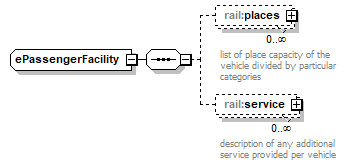 |
||
| namespace | https://www.railml.org/schemas/2018 | ||
| children | rail:places rail:service | ||
| used by |
|
||
| source | <xs:complexType name="ePassengerFacility"> <xs:sequence> <xs:element name="places" type="rail:tPlaces" minOccurs="0" maxOccurs="unbounded"> <xs:annotation> <xs:documentation>list of place capacity of the vehicle divided by particular categories</xs:documentation> <xs:documentation source="http://wiki.railml.org/index.php?title=RS:places"/> </xs:annotation> </xs:element> <xs:element name="service" type="rail:tService" minOccurs="0" maxOccurs="unbounded"> <xs:annotation> <xs:documentation>description of any additional service provided per vehicle</xs:documentation> <xs:documentation source="http://wiki.railml.org/index.php?title=RS:service_passenger"/> </xs:annotation> </xs:element> </xs:sequence> </xs:complexType> |
element ePassengerFacility/places
| diagram | 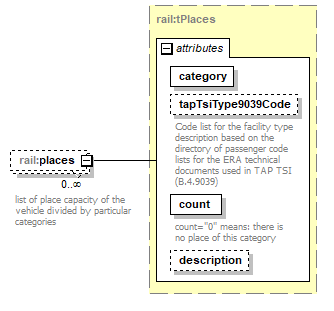 |
||||||||||||||||||||||||||||||||||||
| namespace | https://www.railml.org/schemas/2018 | ||||||||||||||||||||||||||||||||||||
| type | rail:tPlaces | ||||||||||||||||||||||||||||||||||||
| properties |
|
||||||||||||||||||||||||||||||||||||
| attributes |
|
||||||||||||||||||||||||||||||||||||
| annotation |
|
||||||||||||||||||||||||||||||||||||
| source | <xs:element name="places" type="rail:tPlaces" minOccurs="0" maxOccurs="unbounded"> <xs:annotation> <xs:documentation>list of place capacity of the vehicle divided by particular categories</xs:documentation> <xs:documentation source="http://wiki.railml.org/index.php?title=RS:places"/> </xs:annotation> </xs:element> |
element ePassengerFacility/service
| diagram | 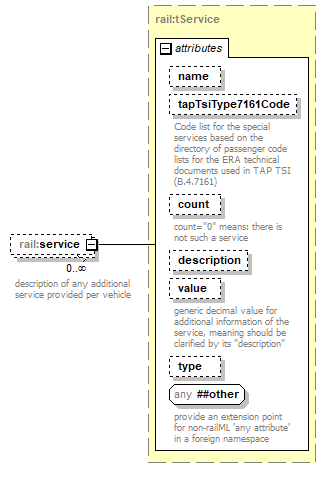 |
||||||||||||||||||||||||||||||||||||||||||||||||||
| namespace | https://www.railml.org/schemas/2018 | ||||||||||||||||||||||||||||||||||||||||||||||||||
| type | rail:tService | ||||||||||||||||||||||||||||||||||||||||||||||||||
| properties |
|
||||||||||||||||||||||||||||||||||||||||||||||||||
| attributes |
|
||||||||||||||||||||||||||||||||||||||||||||||||||
| annotation |
|
||||||||||||||||||||||||||||||||||||||||||||||||||
| source | <xs:element name="service" type="rail:tService" minOccurs="0" maxOccurs="unbounded"> <xs:annotation> <xs:documentation>description of any additional service provided per vehicle</xs:documentation> <xs:documentation source="http://wiki.railml.org/index.php?title=RS:service_passenger"/> </xs:annotation> </xs:element> |
complexType tBasicBrakeType
| diagram | 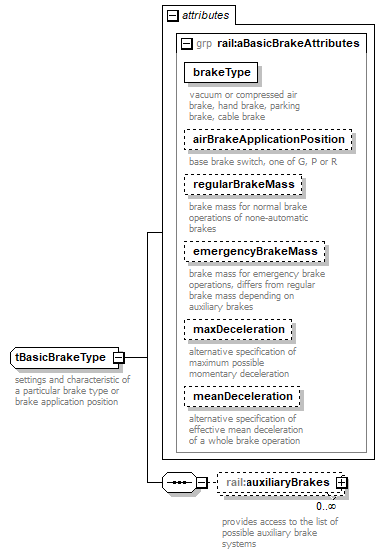 |
||||||||||||||||||||||||||||||||||||||||||||||||||||||
| namespace | https://www.railml.org/schemas/2018 | ||||||||||||||||||||||||||||||||||||||||||||||||||||||
| children | rail:auxiliaryBrakes | ||||||||||||||||||||||||||||||||||||||||||||||||||||||
| used by |
|
||||||||||||||||||||||||||||||||||||||||||||||||||||||
| attributes |
|
||||||||||||||||||||||||||||||||||||||||||||||||||||||
| annotation |
|
||||||||||||||||||||||||||||||||||||||||||||||||||||||
| source | <xs:complexType name="tBasicBrakeType"> <xs:annotation> <xs:documentation>settings and characteristic of a particular brake type or brake application position</xs:documentation> <xs:documentation source="http://wiki.railml.org/index.php?title=RS:vehicleBrake"/> </xs:annotation> <xs:sequence> <xs:element name="auxiliaryBrakes" minOccurs="0" maxOccurs="unbounded"> <xs:annotation> <xs:documentation>provides access to the list of possible auxiliary brake systems</xs:documentation> <xs:documentation source="http://wiki.railml.org/index.php?title=RS:auxiliaryBrakes_vehicleBrake"/> <xs:documentation source="http://wiki.railml.org/index.php?title=RS:auxiliaryBrakes_trainBrakes"/> <xs:documentation source="http://wiki.railml.org/index.php?title=TT:auxiliaryBrakes"/> </xs:annotation> <xs:complexType> <xs:attributeGroup ref="rail:aAuxiliaryBrakes"/> <xs:attributeGroup ref="rail:anyAttribute"/> </xs:complexType> </xs:element> </xs:sequence> <xs:attributeGroup ref="rail:aBasicBrakeAttributes"/> </xs:complexType> |
element tBasicBrakeType/auxiliaryBrakes
| diagram | 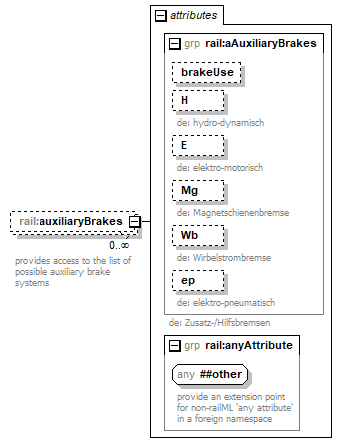 |
||||||||||||||||||||||||||||||||||||||||||||||||||||
| namespace | https://www.railml.org/schemas/2018 | ||||||||||||||||||||||||||||||||||||||||||||||||||||
| properties |
|
||||||||||||||||||||||||||||||||||||||||||||||||||||
| attributes |
|
||||||||||||||||||||||||||||||||||||||||||||||||||||
| annotation |
|
||||||||||||||||||||||||||||||||||||||||||||||||||||
| source | <xs:element name="auxiliaryBrakes" minOccurs="0" maxOccurs="unbounded"> <xs:annotation> <xs:documentation>provides access to the list of possible auxiliary brake systems</xs:documentation> <xs:documentation source="http://wiki.railml.org/index.php?title=RS:auxiliaryBrakes_vehicleBrake"/> <xs:documentation source="http://wiki.railml.org/index.php?title=RS:auxiliaryBrakes_trainBrakes"/> <xs:documentation source="http://wiki.railml.org/index.php?title=TT:auxiliaryBrakes"/> </xs:annotation> <xs:complexType> <xs:attributeGroup ref="rail:aAuxiliaryBrakes"/> <xs:attributeGroup ref="rail:anyAttribute"/> </xs:complexType> </xs:element> |
complexType tClearanceGaugeType
| diagram | 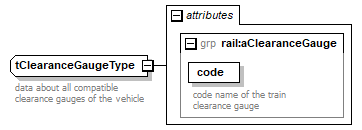 |
||||||||||||||||
| namespace | https://www.railml.org/schemas/2018 | ||||||||||||||||
| used by |
|
||||||||||||||||
| attributes |
|
||||||||||||||||
| annotation |
|
||||||||||||||||
| source | <xs:complexType name="tClearanceGaugeType"> <xs:annotation> <xs:documentation>data about all compatible clearance gauges of the vehicle</xs:documentation> </xs:annotation> <xs:attributeGroup ref="rail:aClearanceGauge"/> </xs:complexType> |
complexType tConcessionaire
| diagram | 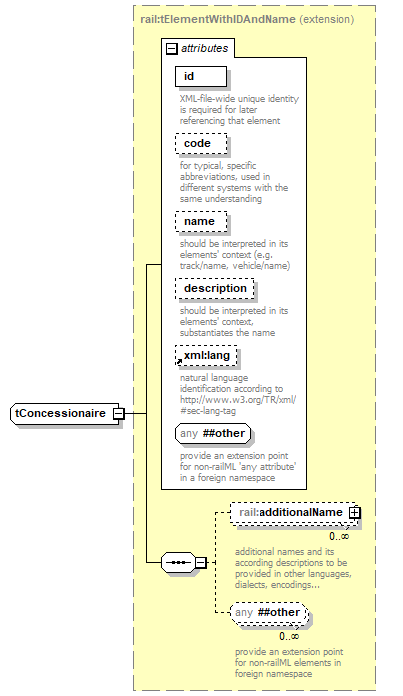 |
||||||||||||||||||||||||||||||||||||||||||||||
| namespace | https://www.railml.org/schemas/2018 | ||||||||||||||||||||||||||||||||||||||||||||||
| type | extension of rail:tElementWithIDAndName | ||||||||||||||||||||||||||||||||||||||||||||||
| properties |
|
||||||||||||||||||||||||||||||||||||||||||||||
| children | rail:additionalName | ||||||||||||||||||||||||||||||||||||||||||||||
| used by |
|
||||||||||||||||||||||||||||||||||||||||||||||
| attributes |
|
||||||||||||||||||||||||||||||||||||||||||||||
| source | <xs:complexType name="tConcessionaire"> <xs:complexContent> <xs:extension base="rail:tElementWithIDAndName"/> </xs:complexContent> </xs:complexType> |
complexType tContractor
| diagram | 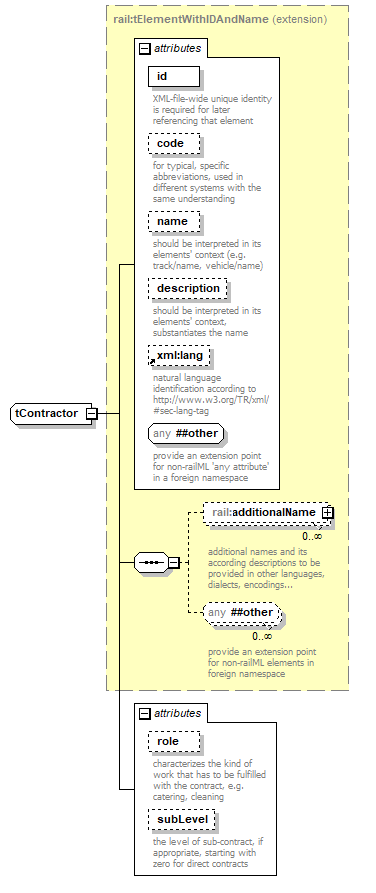 |
||||||||||||||||||||||||||||||||||||||||||||||||||||||||||||||
| namespace | https://www.railml.org/schemas/2018 | ||||||||||||||||||||||||||||||||||||||||||||||||||||||||||||||
| type | extension of rail:tElementWithIDAndName | ||||||||||||||||||||||||||||||||||||||||||||||||||||||||||||||
| properties |
|
||||||||||||||||||||||||||||||||||||||||||||||||||||||||||||||
| children | rail:additionalName | ||||||||||||||||||||||||||||||||||||||||||||||||||||||||||||||
| used by |
|
||||||||||||||||||||||||||||||||||||||||||||||||||||||||||||||
| attributes |
|
||||||||||||||||||||||||||||||||||||||||||||||||||||||||||||||
| source | <xs:complexType name="tContractor"> <xs:complexContent> <xs:extension base="rail:tElementWithIDAndName"> <xs:attribute name="role" type="rail:tGenericName"> <xs:annotation> <xs:documentation>characterizes the kind of work that has to be fulfilled with the contract, e.g. catering, cleaning</xs:documentation> </xs:annotation> </xs:attribute> <xs:attribute name="subLevel" type="rail:tCounter"> <xs:annotation> <xs:documentation>the level of sub-contract, if appropriate, starting with zero for direct contracts</xs:documentation> </xs:annotation> </xs:attribute> </xs:extension> </xs:complexContent> </xs:complexType> |
attribute tContractor/@role
| type | rail:tGenericName | ||
| annotation |
|
||
| source | <xs:attribute name="role" type="rail:tGenericName"> <xs:annotation> <xs:documentation>characterizes the kind of work that has to be fulfilled with the contract, e.g. catering, cleaning</xs:documentation> </xs:annotation> </xs:attribute> |
attribute tContractor/@subLevel
| type | rail:tCounter | ||
| annotation |
|
||
| source | <xs:attribute name="subLevel" type="rail:tCounter"> <xs:annotation> <xs:documentation>the level of sub-contract, if appropriate, starting with zero for direct contracts</xs:documentation> </xs:annotation> </xs:attribute> |
complexType tCustomer
| diagram | 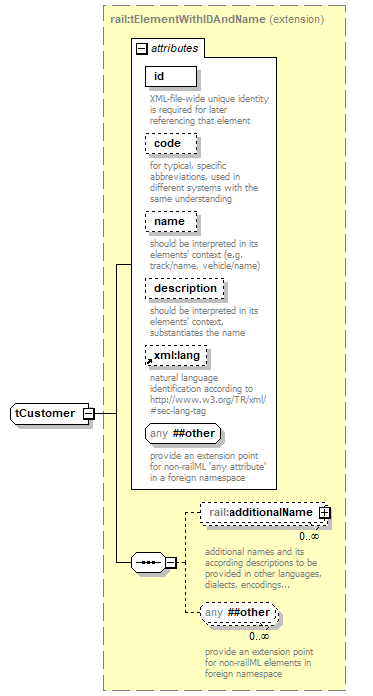 |
||||||||||||||||||||||||||||||||||||||||||||||
| namespace | https://www.railml.org/schemas/2018 | ||||||||||||||||||||||||||||||||||||||||||||||
| type | extension of rail:tElementWithIDAndName | ||||||||||||||||||||||||||||||||||||||||||||||
| properties |
|
||||||||||||||||||||||||||||||||||||||||||||||
| children | rail:additionalName | ||||||||||||||||||||||||||||||||||||||||||||||
| used by |
|
||||||||||||||||||||||||||||||||||||||||||||||
| attributes |
|
||||||||||||||||||||||||||||||||||||||||||||||
| source | <xs:complexType name="tCustomer"> <xs:complexContent> <xs:extension base="rail:tElementWithIDAndName"/> </xs:complexContent> </xs:complexType> |
complexType tInfrastructureManager
| diagram | 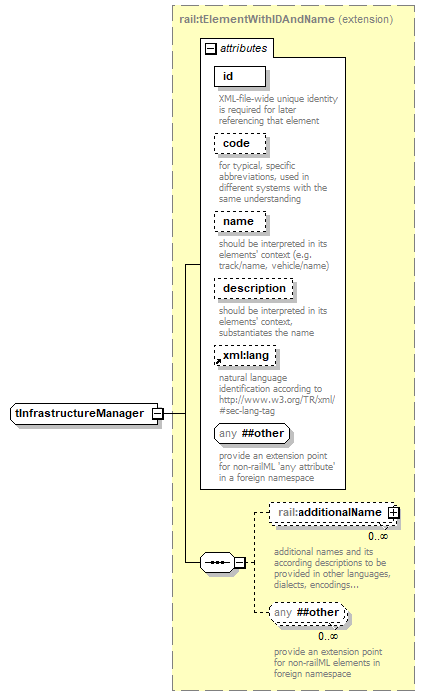 |
||||||||||||||||||||||||||||||||||||||||||||||
| namespace | https://www.railml.org/schemas/2018 | ||||||||||||||||||||||||||||||||||||||||||||||
| type | extension of rail:tElementWithIDAndName | ||||||||||||||||||||||||||||||||||||||||||||||
| properties |
|
||||||||||||||||||||||||||||||||||||||||||||||
| children | rail:additionalName | ||||||||||||||||||||||||||||||||||||||||||||||
| used by |
|
||||||||||||||||||||||||||||||||||||||||||||||
| attributes |
|
||||||||||||||||||||||||||||||||||||||||||||||
| source | <xs:complexType name="tInfrastructureManager"> <xs:complexContent> <xs:extension base="rail:tElementWithIDAndName"> <xs:annotation> <xs:documentation>use the separated infrastructureManagerCode list for the 'code' attribute</xs:documentation> </xs:annotation> </xs:extension> </xs:complexContent> </xs:complexType> |
complexType tMetadata
| diagram | 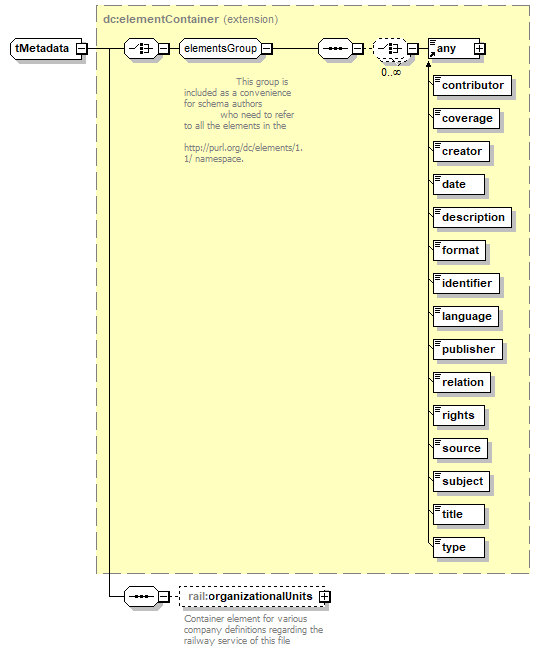 |
||
| namespace | https://www.railml.org/schemas/2018 | ||
| type | extension of elementContainer | ||
| properties |
|
||
| children | any rail:organizationalUnits | ||
| used by |
|
||
| source | <xs:complexType name="tMetadata"> <xs:complexContent> <xs:extension base="dc:elementContainer"> <xs:annotation> <xs:documentation>flexible collection of Dublin Core metadata based on xs:any according to http://dublincore.org/</xs:documentation> </xs:annotation> <xs:sequence> <xs:element name="organizationalUnits" type="rail:tOrganizationalUnits" minOccurs="0"> <xs:annotation> <xs:documentation>Container element for various company definitions regarding the railway service of this file</xs:documentation> <xs:documentation source="http://wiki.railml.org/index.php?title=CO:organizationalUnits"/> </xs:annotation> </xs:element> </xs:sequence> </xs:extension> </xs:complexContent> </xs:complexType> |
element tMetadata/organizationalUnits
| diagram | 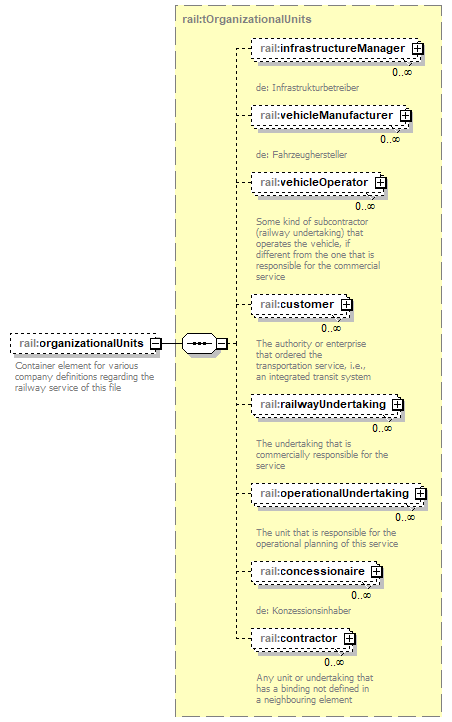 |
||||||
| namespace | https://www.railml.org/schemas/2018 | ||||||
| type | rail:tOrganizationalUnits | ||||||
| properties |
|
||||||
| children | rail:infrastructureManager rail:vehicleManufacturer rail:vehicleOperator rail:customer rail:railwayUndertaking rail:operationalUndertaking rail:concessionaire rail:contractor | ||||||
| annotation |
|
||||||
| source | <xs:element name="organizationalUnits" type="rail:tOrganizationalUnits" minOccurs="0"> <xs:annotation> <xs:documentation>Container element for various company definitions regarding the railway service of this file</xs:documentation> <xs:documentation source="http://wiki.railml.org/index.php?title=CO:organizationalUnits"/> </xs:annotation> </xs:element> |
complexType tOperationalUndertaking
| diagram | 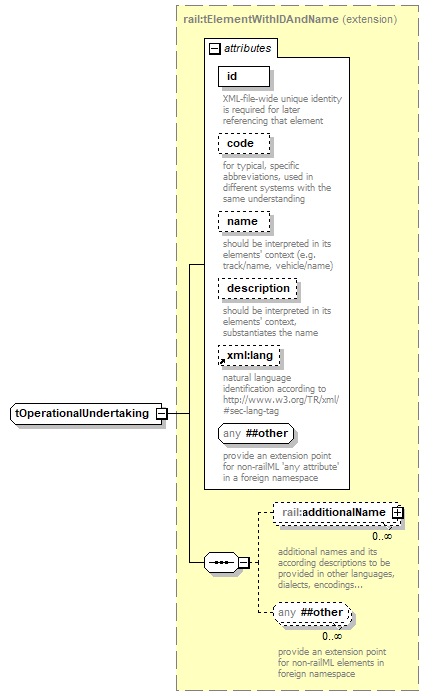 |
||||||||||||||||||||||||||||||||||||||||||||||
| namespace | https://www.railml.org/schemas/2018 | ||||||||||||||||||||||||||||||||||||||||||||||
| type | extension of rail:tElementWithIDAndName | ||||||||||||||||||||||||||||||||||||||||||||||
| properties |
|
||||||||||||||||||||||||||||||||||||||||||||||
| children | rail:additionalName | ||||||||||||||||||||||||||||||||||||||||||||||
| used by |
|
||||||||||||||||||||||||||||||||||||||||||||||
| attributes |
|
||||||||||||||||||||||||||||||||||||||||||||||
| source | <xs:complexType name="tOperationalUndertaking"> <xs:complexContent> <xs:extension base="rail:tElementWithIDAndName"/> </xs:complexContent> </xs:complexType> |
complexType tOrganizationalUnits
| diagram | 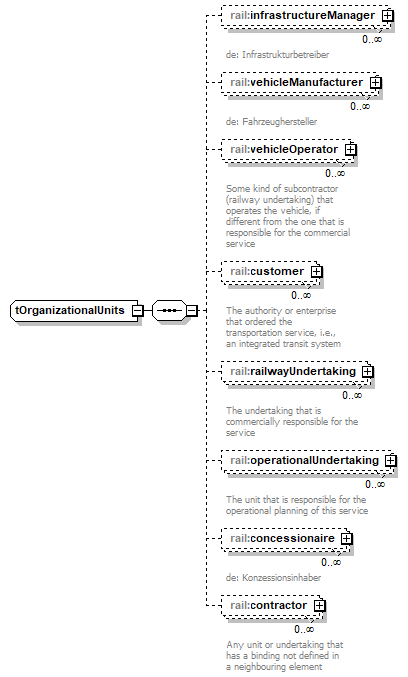 |
||
| namespace | https://www.railml.org/schemas/2018 | ||
| children | rail:infrastructureManager rail:vehicleManufacturer rail:vehicleOperator rail:customer rail:railwayUndertaking rail:operationalUndertaking rail:concessionaire rail:contractor | ||
| used by |
|
||
| source | <xs:complexType name="tOrganizationalUnits"> <xs:sequence> <xs:element name="infrastructureManager" type="rail:tInfrastructureManager" minOccurs="0" maxOccurs="unbounded"> <xs:annotation> <xs:documentation>de: Infrastrukturbetreiber</xs:documentation> <xs:documentation source="http://wiki.railml.org/index.php?title=CO:infrastructureManager"/> </xs:annotation> </xs:element> <xs:element name="vehicleManufacturer" type="rail:tVehicleManufacturer" minOccurs="0" maxOccurs="unbounded"> <xs:annotation> <xs:documentation>de: Fahrzeughersteller</xs:documentation> <xs:documentation source="http://wiki.railml.org/index.php?title=CO:vehicleManufacturer"/> </xs:annotation> </xs:element> <xs:element name="vehicleOperator" type="rail:tVehicleOperator" minOccurs="0" maxOccurs="unbounded"> <xs:annotation> <xs:documentation>Some kind of subcontractor (railway undertaking) that operates the vehicle, if different from the one that is responsible for the commercial service</xs:documentation> <xs:documentation source="http://wiki.railml.org/index.php?title=CO:vehicleOperator"/> </xs:annotation> </xs:element> <xs:element name="customer" type="rail:tCustomer" minOccurs="0" maxOccurs="unbounded"> <xs:annotation> <xs:documentation>The authority or enterprise that ordered the transportation service, i.e., an integrated transit system</xs:documentation> <xs:documentation source="http://wiki.railml.org/index.php?title=CO:customer"/> </xs:annotation> </xs:element> <xs:element name="railwayUndertaking" type="rail:tRailwayUndertaking" minOccurs="0" maxOccurs="unbounded"> <xs:annotation> <xs:documentation>The undertaking that is commercially responsible for the service</xs:documentation> <xs:documentation source="http://wiki.railml.org/index.php?title=CO:railwayUndertaking"/> </xs:annotation> </xs:element> <xs:element name="operationalUndertaking" type="rail:tOperationalUndertaking" minOccurs="0" maxOccurs="unbounded"> <xs:annotation> <xs:documentation>The unit that is responsible for the operational planning of this service</xs:documentation> <xs:documentation source="http://wiki.railml.org/index.php?title=CO:operationalUndertaking"/> </xs:annotation> </xs:element> <xs:element name="concessionaire" type="rail:tConcessionaire" minOccurs="0" maxOccurs="unbounded"> <xs:annotation> <xs:documentation>de: Konzessionsinhaber</xs:documentation> <xs:documentation source="http://wiki.railml.org/index.php?title=CO:concessionaire"/> </xs:annotation> </xs:element> <xs:element name="contractor" type="rail:tContractor" minOccurs="0" maxOccurs="unbounded"> <xs:annotation> <xs:documentation>Any unit or undertaking that has a binding not defined in a neighbouring element</xs:documentation> <xs:documentation source="http://wiki.railml.org/index.php?title=CO:contractor"/> </xs:annotation> </xs:element> </xs:sequence> </xs:complexType> |
element tOrganizationalUnits/infrastructureManager
| diagram | 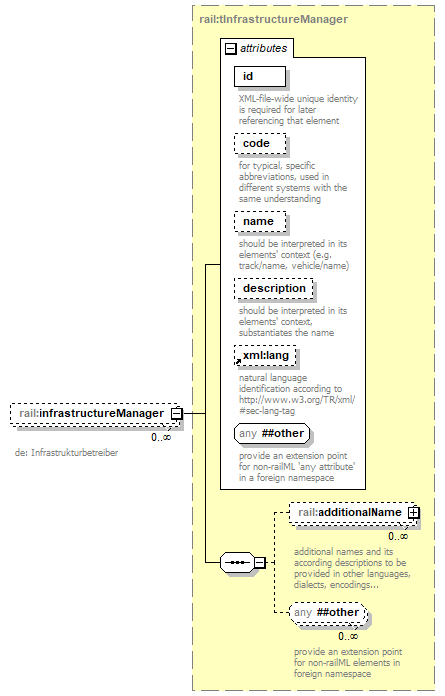 |
||||||||||||||||||||||||||||||||||||||||||||||
| namespace | https://www.railml.org/schemas/2018 | ||||||||||||||||||||||||||||||||||||||||||||||
| type | rail:tInfrastructureManager | ||||||||||||||||||||||||||||||||||||||||||||||
| properties |
|
||||||||||||||||||||||||||||||||||||||||||||||
| children | rail:additionalName | ||||||||||||||||||||||||||||||||||||||||||||||
| attributes |
|
||||||||||||||||||||||||||||||||||||||||||||||
| annotation |
|
||||||||||||||||||||||||||||||||||||||||||||||
| source | <xs:element name="infrastructureManager" type="rail:tInfrastructureManager" minOccurs="0" maxOccurs="unbounded"> <xs:annotation> <xs:documentation>de: Infrastrukturbetreiber</xs:documentation> <xs:documentation source="http://wiki.railml.org/index.php?title=CO:infrastructureManager"/> </xs:annotation> </xs:element> |
element tOrganizationalUnits/vehicleManufacturer
| diagram | 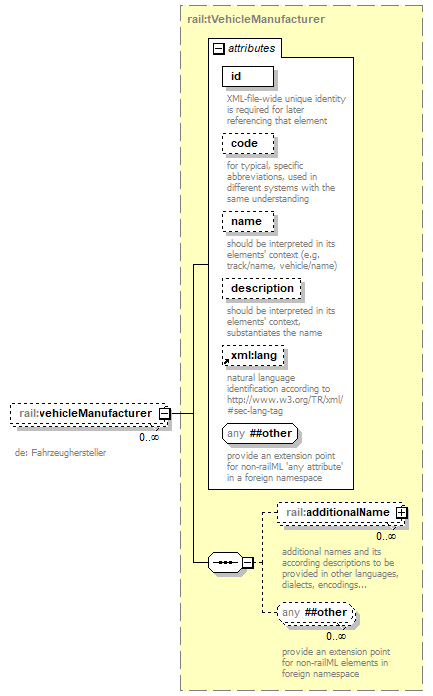 |
||||||||||||||||||||||||||||||||||||||||||||||
| namespace | https://www.railml.org/schemas/2018 | ||||||||||||||||||||||||||||||||||||||||||||||
| type | rail:tVehicleManufacturer | ||||||||||||||||||||||||||||||||||||||||||||||
| properties |
|
||||||||||||||||||||||||||||||||||||||||||||||
| children | rail:additionalName | ||||||||||||||||||||||||||||||||||||||||||||||
| attributes |
|
||||||||||||||||||||||||||||||||||||||||||||||
| annotation |
|
||||||||||||||||||||||||||||||||||||||||||||||
| source | <xs:element name="vehicleManufacturer" type="rail:tVehicleManufacturer" minOccurs="0" maxOccurs="unbounded"> <xs:annotation> <xs:documentation>de: Fahrzeughersteller</xs:documentation> <xs:documentation source="http://wiki.railml.org/index.php?title=CO:vehicleManufacturer"/> </xs:annotation> </xs:element> |
element tOrganizationalUnits/vehicleOperator
| diagram | 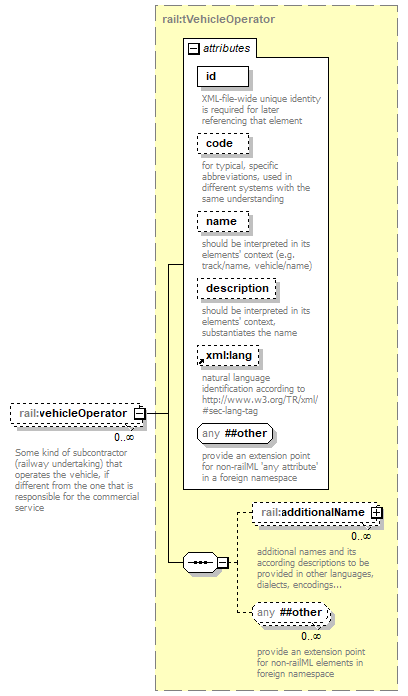 |
||||||||||||||||||||||||||||||||||||||||||||||
| namespace | https://www.railml.org/schemas/2018 | ||||||||||||||||||||||||||||||||||||||||||||||
| type | rail:tVehicleOperator | ||||||||||||||||||||||||||||||||||||||||||||||
| properties |
|
||||||||||||||||||||||||||||||||||||||||||||||
| children | rail:additionalName | ||||||||||||||||||||||||||||||||||||||||||||||
| attributes |
|
||||||||||||||||||||||||||||||||||||||||||||||
| annotation |
|
||||||||||||||||||||||||||||||||||||||||||||||
| source | <xs:element name="vehicleOperator" type="rail:tVehicleOperator" minOccurs="0" maxOccurs="unbounded"> <xs:annotation> <xs:documentation>Some kind of subcontractor (railway undertaking) that operates the vehicle, if different from the one that is responsible for the commercial service</xs:documentation> <xs:documentation source="http://wiki.railml.org/index.php?title=CO:vehicleOperator"/> </xs:annotation> </xs:element> |
element tOrganizationalUnits/customer
| diagram | 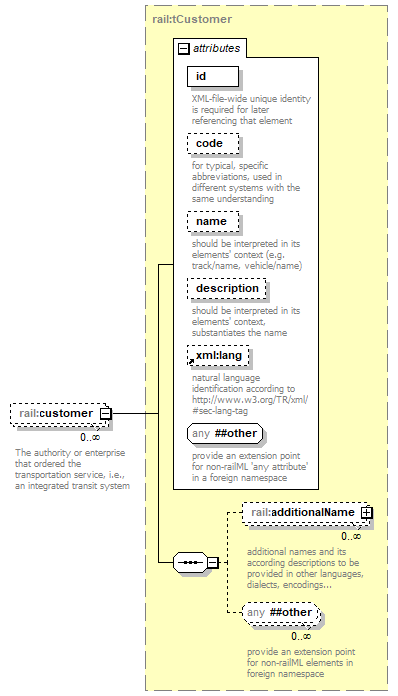 |
||||||||||||||||||||||||||||||||||||||||||||||
| namespace | https://www.railml.org/schemas/2018 | ||||||||||||||||||||||||||||||||||||||||||||||
| type | rail:tCustomer | ||||||||||||||||||||||||||||||||||||||||||||||
| properties |
|
||||||||||||||||||||||||||||||||||||||||||||||
| children | rail:additionalName | ||||||||||||||||||||||||||||||||||||||||||||||
| attributes |
|
||||||||||||||||||||||||||||||||||||||||||||||
| annotation |
|
||||||||||||||||||||||||||||||||||||||||||||||
| source | <xs:element name="customer" type="rail:tCustomer" minOccurs="0" maxOccurs="unbounded"> <xs:annotation> <xs:documentation>The authority or enterprise that ordered the transportation service, i.e., an integrated transit system</xs:documentation> <xs:documentation source="http://wiki.railml.org/index.php?title=CO:customer"/> </xs:annotation> </xs:element> |
element tOrganizationalUnits/railwayUndertaking
| diagram | 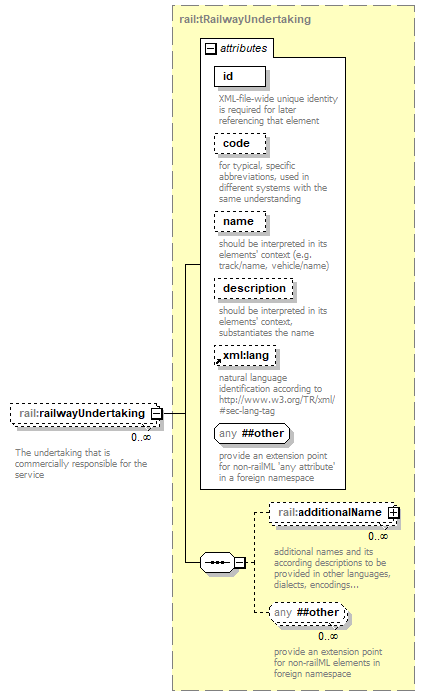 |
||||||||||||||||||||||||||||||||||||||||||||||
| namespace | https://www.railml.org/schemas/2018 | ||||||||||||||||||||||||||||||||||||||||||||||
| type | rail:tRailwayUndertaking | ||||||||||||||||||||||||||||||||||||||||||||||
| properties |
|
||||||||||||||||||||||||||||||||||||||||||||||
| children | rail:additionalName | ||||||||||||||||||||||||||||||||||||||||||||||
| attributes |
|
||||||||||||||||||||||||||||||||||||||||||||||
| annotation |
|
||||||||||||||||||||||||||||||||||||||||||||||
| source | <xs:element name="railwayUndertaking" type="rail:tRailwayUndertaking" minOccurs="0" maxOccurs="unbounded"> <xs:annotation> <xs:documentation>The undertaking that is commercially responsible for the service</xs:documentation> <xs:documentation source="http://wiki.railml.org/index.php?title=CO:railwayUndertaking"/> </xs:annotation> </xs:element> |
element tOrganizationalUnits/operationalUndertaking
| diagram | 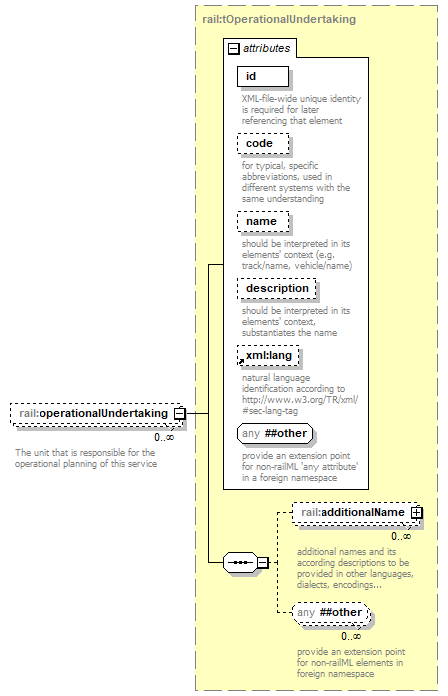 |
||||||||||||||||||||||||||||||||||||||||||||||
| namespace | https://www.railml.org/schemas/2018 | ||||||||||||||||||||||||||||||||||||||||||||||
| type | rail:tOperationalUndertaking | ||||||||||||||||||||||||||||||||||||||||||||||
| properties |
|
||||||||||||||||||||||||||||||||||||||||||||||
| children | rail:additionalName | ||||||||||||||||||||||||||||||||||||||||||||||
| attributes |
|
||||||||||||||||||||||||||||||||||||||||||||||
| annotation |
|
||||||||||||||||||||||||||||||||||||||||||||||
| source | <xs:element name="operationalUndertaking" type="rail:tOperationalUndertaking" minOccurs="0" maxOccurs="unbounded"> <xs:annotation> <xs:documentation>The unit that is responsible for the operational planning of this service</xs:documentation> <xs:documentation source="http://wiki.railml.org/index.php?title=CO:operationalUndertaking"/> </xs:annotation> </xs:element> |
element tOrganizationalUnits/concessionaire
| diagram | 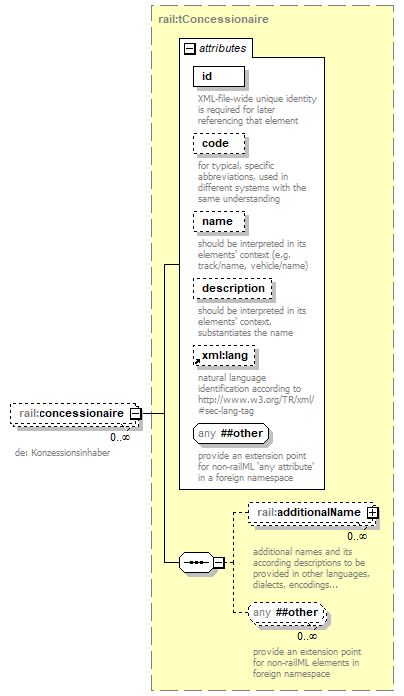 |
||||||||||||||||||||||||||||||||||||||||||||||
| namespace | https://www.railml.org/schemas/2018 | ||||||||||||||||||||||||||||||||||||||||||||||
| type | rail:tConcessionaire | ||||||||||||||||||||||||||||||||||||||||||||||
| properties |
|
||||||||||||||||||||||||||||||||||||||||||||||
| children | rail:additionalName | ||||||||||||||||||||||||||||||||||||||||||||||
| attributes |
|
||||||||||||||||||||||||||||||||||||||||||||||
| annotation |
|
||||||||||||||||||||||||||||||||||||||||||||||
| source | <xs:element name="concessionaire" type="rail:tConcessionaire" minOccurs="0" maxOccurs="unbounded"> <xs:annotation> <xs:documentation>de: Konzessionsinhaber</xs:documentation> <xs:documentation source="http://wiki.railml.org/index.php?title=CO:concessionaire"/> </xs:annotation> </xs:element> |
element tOrganizationalUnits/contractor
| diagram | 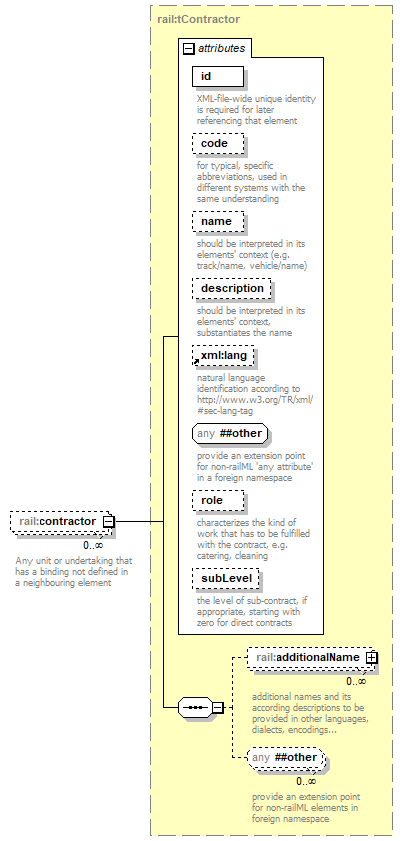 |
||||||||||||||||||||||||||||||||||||||||||||||||||||||||||||||
| namespace | https://www.railml.org/schemas/2018 | ||||||||||||||||||||||||||||||||||||||||||||||||||||||||||||||
| type | rail:tContractor | ||||||||||||||||||||||||||||||||||||||||||||||||||||||||||||||
| properties |
|
||||||||||||||||||||||||||||||||||||||||||||||||||||||||||||||
| children | rail:additionalName | ||||||||||||||||||||||||||||||||||||||||||||||||||||||||||||||
| attributes |
|
||||||||||||||||||||||||||||||||||||||||||||||||||||||||||||||
| annotation |
|
||||||||||||||||||||||||||||||||||||||||||||||||||||||||||||||
| source | <xs:element name="contractor" type="rail:tContractor" minOccurs="0" maxOccurs="unbounded"> <xs:annotation> <xs:documentation>Any unit or undertaking that has a binding not defined in a neighbouring element</xs:documentation> <xs:documentation source="http://wiki.railml.org/index.php?title=CO:contractor"/> </xs:annotation> </xs:element> |
complexType tPlaces
| diagram | 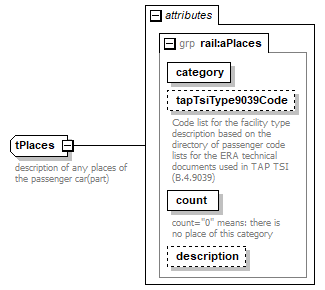 |
||||||||||||||||||||||||||||||||||||
| namespace | https://www.railml.org/schemas/2018 | ||||||||||||||||||||||||||||||||||||
| used by |
|
||||||||||||||||||||||||||||||||||||
| attributes |
|
||||||||||||||||||||||||||||||||||||
| annotation |
|
||||||||||||||||||||||||||||||||||||
| source | <xs:complexType name="tPlaces"> <xs:annotation> <xs:documentation>description of any places of the passenger car(part)</xs:documentation> <xs:documentation source="http://wiki.railml.org/index.php?title=RS:places"/> </xs:annotation> <xs:attributeGroup ref="rail:aPlaces"/> </xs:complexType> |
complexType tRailwayUndertaking
| diagram | 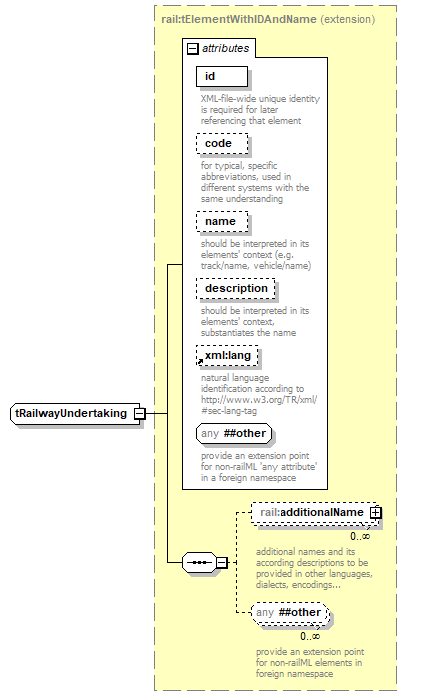 |
||||||||||||||||||||||||||||||||||||||||||||||
| namespace | https://www.railml.org/schemas/2018 | ||||||||||||||||||||||||||||||||||||||||||||||
| type | extension of rail:tElementWithIDAndName | ||||||||||||||||||||||||||||||||||||||||||||||
| properties |
|
||||||||||||||||||||||||||||||||||||||||||||||
| children | rail:additionalName | ||||||||||||||||||||||||||||||||||||||||||||||
| used by |
|
||||||||||||||||||||||||||||||||||||||||||||||
| attributes |
|
||||||||||||||||||||||||||||||||||||||||||||||
| source | <xs:complexType name="tRailwayUndertaking"> <xs:complexContent> <xs:extension base="rail:tElementWithIDAndName"/> </xs:complexContent> </xs:complexType> |
complexType tService
| diagram | 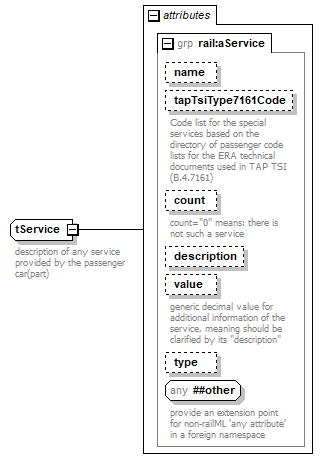 |
||||||||||||||||||||||||||||||||||||||||||||||||||
| namespace | https://www.railml.org/schemas/2018 | ||||||||||||||||||||||||||||||||||||||||||||||||||
| used by |
|
||||||||||||||||||||||||||||||||||||||||||||||||||
| attributes |
|
||||||||||||||||||||||||||||||||||||||||||||||||||
| annotation |
|
||||||||||||||||||||||||||||||||||||||||||||||||||
| source | <xs:complexType name="tService"> <xs:annotation> <xs:documentation>description of any service provided by the passenger car(part)</xs:documentation> <xs:documentation source="http://wiki.railml.org/index.php?title=RS:service"/> </xs:annotation> <xs:attributeGroup ref="rail:aService"/> </xs:complexType> |
complexType tTilting
| diagram | 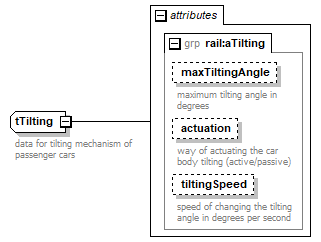 |
||||||||||||||||||||||||||||||
| namespace | https://www.railml.org/schemas/2018 | ||||||||||||||||||||||||||||||
| used by |
|
||||||||||||||||||||||||||||||
| attributes |
|
||||||||||||||||||||||||||||||
| annotation |
|
||||||||||||||||||||||||||||||
| source | <xs:complexType name="tTilting"> <xs:annotation> <xs:documentation>data for tilting mechanism of passenger cars</xs:documentation> </xs:annotation> <xs:attributeGroup ref="rail:aTilting"/> </xs:complexType> |
complexType tTimeSpan
| diagram | 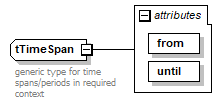 |
||||||||||||||||||
| namespace | https://www.railml.org/schemas/2018 | ||||||||||||||||||
| used by |
|
||||||||||||||||||
| attributes |
|
||||||||||||||||||
| annotation |
|
||||||||||||||||||
| source | <xs:complexType name="tTimeSpan"> <xs:annotation> <xs:documentation>generic type for time spans/periods in required context</xs:documentation> </xs:annotation> <xs:attribute name="from" type="xs:time" use="required"/> <xs:attribute name="until" type="xs:time" use="required"/> </xs:complexType> |
attribute tTimeSpan/@from
| type | xs:time | ||
| properties |
|
||
| source | <xs:attribute name="from" type="xs:time" use="required"/> |
attribute tTimeSpan/@until
| type | xs:time | ||
| properties |
|
||
| source | <xs:attribute name="until" type="xs:time" use="required"/> |
complexType tVehicleManufacturer
| diagram | 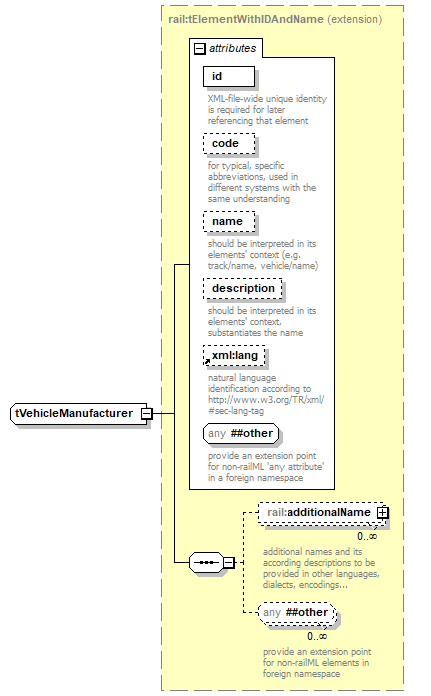 |
||||||||||||||||||||||||||||||||||||||||||||||
| namespace | https://www.railml.org/schemas/2018 | ||||||||||||||||||||||||||||||||||||||||||||||
| type | extension of rail:tElementWithIDAndName | ||||||||||||||||||||||||||||||||||||||||||||||
| properties |
|
||||||||||||||||||||||||||||||||||||||||||||||
| children | rail:additionalName | ||||||||||||||||||||||||||||||||||||||||||||||
| used by |
|
||||||||||||||||||||||||||||||||||||||||||||||
| attributes |
|
||||||||||||||||||||||||||||||||||||||||||||||
| source | <xs:complexType name="tVehicleManufacturer"> <xs:complexContent> <xs:extension base="rail:tElementWithIDAndName"/> </xs:complexContent> </xs:complexType> |
complexType tVehicleOperator
| diagram | 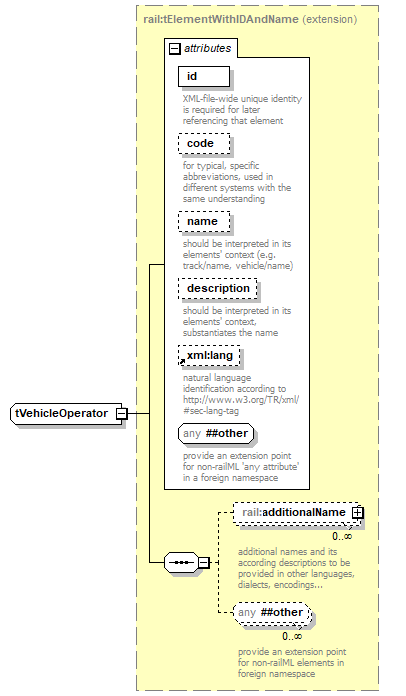 |
||||||||||||||||||||||||||||||||||||||||||||||
| namespace | https://www.railml.org/schemas/2018 | ||||||||||||||||||||||||||||||||||||||||||||||
| type | extension of rail:tElementWithIDAndName | ||||||||||||||||||||||||||||||||||||||||||||||
| properties |
|
||||||||||||||||||||||||||||||||||||||||||||||
| children | rail:additionalName | ||||||||||||||||||||||||||||||||||||||||||||||
| used by |
|
||||||||||||||||||||||||||||||||||||||||||||||
| attributes |
|
||||||||||||||||||||||||||||||||||||||||||||||
| source | <xs:complexType name="tVehicleOperator"> <xs:complexContent> <xs:extension base="rail:tElementWithIDAndName"/> </xs:complexContent> </xs:complexType> |
simpleType tAirBrakeApplicationPosition
| namespace | https://www.railml.org/schemas/2018 | |||||||||||||||||||||
| type | restriction of xs:string | |||||||||||||||||||||
| properties |
|
|||||||||||||||||||||
| used by |
|
|||||||||||||||||||||
| facets |
|
|||||||||||||||||||||
| source | <xs:simpleType name="tAirBrakeApplicationPosition"> <xs:restriction base="xs:string"> <xs:enumeration value="N/A"/> <xs:enumeration value="G"> <xs:annotation> <xs:documentation>Goods</xs:documentation> </xs:annotation> </xs:enumeration> <xs:enumeration value="P"> <xs:annotation> <xs:documentation>Passenger</xs:documentation> </xs:annotation> </xs:enumeration> <xs:enumeration value="R"> <xs:annotation> <xs:documentation>Rapid</xs:documentation> </xs:annotation> </xs:enumeration> </xs:restriction> </xs:simpleType> |
simpleType tBrakePercentage
| namespace | https://www.railml.org/schemas/2018 | |||||||||
| type | restriction of xs:integer | |||||||||
| properties |
|
|||||||||
| used by |
|
|||||||||
| facets |
|
|||||||||
| annotation |
|
|||||||||
| source | <xs:simpleType name="tBrakePercentage"> <xs:annotation> <xs:documentation>Brake percentage as value of braking performance in relation to vehicle weight</xs:documentation> </xs:annotation> <xs:restriction base="xs:integer"> <xs:maxInclusive value="225"/> <xs:minInclusive value="6"/> </xs:restriction> </xs:simpleType> |
simpleType tBrakeType
| namespace | https://www.railml.org/schemas/2018 | ||
| type | union of (restriction of xs:string, rail:tOtherEnumerationValue) | ||
| used by |
|
||
| source | <xs:simpleType name="tBrakeType"> <xs:union> <xs:simpleType> <xs:restriction base="xs:string"> <xs:enumeration value="none"/> <xs:enumeration value="compressedAir"> <xs:annotation> <xs:documentation>de: Druckluftbremse</xs:documentation> </xs:annotation> </xs:enumeration> <xs:enumeration value="vacuum"> <xs:annotation> <xs:documentation>de: Saugluftbremse</xs:documentation> </xs:annotation> </xs:enumeration> <xs:enumeration value="handBrake"/> <xs:enumeration value="parkingBrake"/> <xs:enumeration value="cableBrake"> <xs:annotation> <xs:documentation>de: Seilzugbremse</xs:documentation> </xs:annotation> </xs:enumeration> </xs:restriction> </xs:simpleType> <xs:simpleType> <xs:restriction base="rail:tOtherEnumerationValue"/> </xs:simpleType> </xs:union> </xs:simpleType> |
simpleType tBrakeUse
| namespace | https://www.railml.org/schemas/2018 | |||||||||||||||
| type | restriction of xs:string | |||||||||||||||
| properties |
|
|||||||||||||||
| used by |
|
|||||||||||||||
| facets |
|
|||||||||||||||
| annotation |
|
|||||||||||||||
| source | <xs:simpleType name="tBrakeUse"> <xs:annotation> <xs:documentation>planned/calculated usage of specified brakes</xs:documentation> </xs:annotation> <xs:restriction base="xs:string"> <xs:enumeration value="unknown"/> <xs:enumeration value="normal"/> <xs:enumeration value="emergency"/> <xs:enumeration value="both"/> </xs:restriction> </xs:simpleType> |
simpleType tHexString
| namespace | https://www.railml.org/schemas/2018 | ||||||
| type | restriction of xs:string | ||||||
| properties |
|
||||||
| used by |
|
||||||
| facets |
|
||||||
| annotation |
|
||||||
| source | <xs:simpleType name="tHexString"> <xs:annotation> <xs:documentation>an arbitrary string consisting of hex digits from 0 to 9, a to f; not allowing white space, letters; no length restriction</xs:documentation> </xs:annotation> <xs:restriction base="xs:string"> <xs:pattern value="[0-9a-fA-F]*"/> </xs:restriction> </xs:simpleType> |
simpleType tInterlockingTypes
| namespace | https://www.railml.org/schemas/2018 | ||||||||||||||||||||||
| type | restriction of xs:string | ||||||||||||||||||||||
| properties |
|
||||||||||||||||||||||
| used by |
|
||||||||||||||||||||||
| facets |
|
||||||||||||||||||||||
| annotation |
|
||||||||||||||||||||||
| source | <xs:simpleType name="tInterlockingTypes"> <xs:annotation> <xs:documentation>classification of an interlocking system by kind of implementation</xs:documentation> </xs:annotation> <xs:restriction base="xs:string"> <xs:enumeration value="none"/> <xs:enumeration value="mechanical"/> <xs:enumeration value="electro-mechanical"/> <xs:enumeration value="electrical"> <xs:annotation> <xs:documentation>de: Gleisbildstellwerk, Spurplanstellwerk ...</xs:documentation> </xs:annotation> </xs:enumeration> <xs:enumeration value="electronical"> <xs:annotation> <xs:documentation>de: ESTW</xs:documentation> </xs:annotation> </xs:enumeration> </xs:restriction> </xs:simpleType> |
simpleType tLineClassificationType
| namespace | https://www.railml.org/schemas/2018 | ||
| type | union of (restriction of xs:string, rail:tOtherEnumerationValue) | ||
| used by |
|
||
| annotation |
|
||
| source | <xs:simpleType name="tLineClassificationType"> <xs:annotation> <xs:documentation>according EN 15528 (other national values also possible)</xs:documentation> </xs:annotation> <xs:union> <xs:simpleType> <xs:restriction base="xs:string"> <xs:enumeration value="A"> <xs:annotation> <xs:documentation>axle load: 16.0 t, meter load: 5.0 t/m</xs:documentation> </xs:annotation> </xs:enumeration> <xs:enumeration value="B1"> <xs:annotation> <xs:documentation>axle load: 18.0 t, meter load: 5.0 t/m</xs:documentation> </xs:annotation> </xs:enumeration> <xs:enumeration value="B2"> <xs:annotation> <xs:documentation>axle load: 18.0 t, meter load: 6.4 t/m</xs:documentation> </xs:annotation> </xs:enumeration> <xs:enumeration value="C2"> <xs:annotation> <xs:documentation>axle load: 20.0 t, meter load: 6.4 t/m</xs:documentation> </xs:annotation> </xs:enumeration> <xs:enumeration value="C3"> <xs:annotation> <xs:documentation>axle load: 20.0 t, meter load: 7.2 t/m</xs:documentation> </xs:annotation> </xs:enumeration> <xs:enumeration value="C4"> <xs:annotation> <xs:documentation>axle load: 20.0 t, meter load: 8.0 t/m</xs:documentation> </xs:annotation> </xs:enumeration> <xs:enumeration value="D2"> <xs:annotation> <xs:documentation>axle load: 22.5 t, meter load: 6.4 t/m</xs:documentation> </xs:annotation> </xs:enumeration> <xs:enumeration value="D3"> <xs:annotation> <xs:documentation>axle load: 22.5 t, meter load: 7.2 t/m</xs:documentation> </xs:annotation> </xs:enumeration> <xs:enumeration value="D4"> <xs:annotation> <xs:documentation>axle load: 22.5 t, meter load: 8.0 t/m</xs:documentation> </xs:annotation> </xs:enumeration> <xs:enumeration value="D4xL"> <xs:annotation> <xs:documentation>only valid for locomotives</xs:documentation> </xs:annotation> </xs:enumeration> <xs:enumeration value="E4"> <xs:annotation> <xs:documentation>axle load: 25.0 t, meter load: 8.0 t/m</xs:documentation> <xs:documentation>only valid for freight cars</xs:documentation> </xs:annotation> </xs:enumeration> <xs:enumeration value="E5"> <xs:annotation> <xs:documentation>axle load: 25.0 t, meter load: 8.8 t/m</xs:documentation> <xs:documentation>only valid for freight cars</xs:documentation> </xs:annotation> </xs:enumeration> </xs:restriction> </xs:simpleType> <xs:simpleType> <xs:restriction base="rail:tOtherEnumerationValue"/> </xs:simpleType> </xs:union> </xs:simpleType> |
simpleType tPassengersPerSecond
| namespace | https://www.railml.org/schemas/2018 | |||||||||
| type | restriction of xs:decimal | |||||||||
| properties |
|
|||||||||
| used by |
|
|||||||||
| facets |
|
|||||||||
| annotation |
|
|||||||||
| source | <xs:simpleType name="tPassengersPerSecond"> <xs:annotation> <xs:documentation>number of passengers per second used for flow description</xs:documentation> </xs:annotation> <xs:restriction base="xs:decimal"> <xs:fractionDigits value="3"/> <xs:minInclusive value="0"/> </xs:restriction> </xs:simpleType> |
simpleType tPlaceCategory
| namespace | https://www.railml.org/schemas/2018 | ||
| type | union of (restriction of xs:string, rail:tOtherEnumerationValue) | ||
| used by |
|
||
| source | <xs:simpleType name="tPlaceCategory"> <xs:union> <xs:simpleType> <xs:restriction base="xs:string"> <xs:enumeration value="class1"/> <xs:enumeration value="class2"/> <xs:enumeration value="class3"/> <xs:enumeration value="standing"/> <xs:enumeration value="standingArea"/> <xs:enumeration value="wheelchair"/> <xs:enumeration value="bicycle"/> <xs:enumeration value="couchette"/> <xs:enumeration value="bed"/> <xs:enumeration value="chair"/> <xs:enumeration value="bistro"/> <xs:enumeration value="restaurant"/> <xs:enumeration value="foldingSeat"/> <xs:enumeration value="impairedToilet"/> <xs:enumeration value="toilet"/> <xs:enumeration value="business"/> <xs:enumeration value="businessCompartment"/> <xs:enumeration value="family"/> <xs:enumeration value="familyCompartment"/> <xs:enumeration value="stroller"/> <xs:enumeration value="toddler"/> <xs:enumeration value="toddlerCompartment"/> <xs:enumeration value="sleepingCompartment"/> </xs:restriction> </xs:simpleType> <xs:simpleType> <xs:restriction base="rail:tOtherEnumerationValue"/> </xs:simpleType> </xs:union> </xs:simpleType> |
simpleType tServiceType
| namespace | https://www.railml.org/schemas/2018 | ||
| type | union of (restriction of xs:string, rail:tOtherEnumerationValue) | ||
| used by |
|
||
| annotation |
|
||
| source | <xs:simpleType name="tServiceType"> <xs:annotation> <xs:documentation>list of common service types</xs:documentation> </xs:annotation> <xs:union> <xs:simpleType> <xs:restriction base="xs:string"> <xs:enumeration value="mobileCatering"/> <xs:enumeration value="WLAN"/> <xs:enumeration value="wheelchairLift"/> <xs:enumeration value="toiletClosed"/> <xs:enumeration value="toiletOpen"/> <xs:enumeration value="toiletHc"/> <xs:enumeration value="Snack"/> <xs:enumeration value="SelfService"/> <xs:enumeration value="PIS"/> <xs:enumeration value="HVAC"/> <xs:enumeration value="APC"/> <xs:enumeration value="SecurityCamera"/> </xs:restriction> </xs:simpleType> <xs:simpleType> <xs:restriction base="rail:tOtherEnumerationValue"/> </xs:simpleType> </xs:union> </xs:simpleType> |
simpleType tTiltingActuationType
| namespace | https://www.railml.org/schemas/2018 | |||||||||||||||
| type | restriction of xs:string | |||||||||||||||
| properties |
|
|||||||||||||||
| used by |
|
|||||||||||||||
| facets |
|
|||||||||||||||
| source | <xs:simpleType name="tTiltingActuationType"> <xs:restriction base="xs:string"> <xs:enumeration value="none"/> <xs:enumeration value="active"/> <xs:enumeration value="passive"/> <xs:enumeration value="rollCompensation"/> </xs:restriction> </xs:simpleType> |
simpleType tTimeZone
| namespace | https://www.railml.org/schemas/2018 | ||
| type | xs:string | ||
| properties |
|
||
| used by |
|
||
| annotation |
|
||
| source | <xs:simpleType name="tTimeZone"> <xs:annotation> <xs:documentation>timezone as defined in the tz database, e.g. "America/New_York"</xs:documentation> </xs:annotation> <xs:restriction base="xs:string"/> </xs:simpleType> |
simpleType tTrainProtectionMedium
| namespace | https://www.railml.org/schemas/2018 | ||||||||||||||||||||||||||||||
| type | restriction of xs:string | ||||||||||||||||||||||||||||||
| properties |
|
||||||||||||||||||||||||||||||
| used by |
|
||||||||||||||||||||||||||||||
| facets |
|
||||||||||||||||||||||||||||||
| annotation |
|
||||||||||||||||||||||||||||||
| source | <xs:simpleType name="tTrainProtectionMedium"> <xs:annotation> <xs:documentation>classification of a train protection system by physical medium</xs:documentation> </xs:annotation> <xs:restriction base="xs:string"> <xs:enumeration value="none"/> <xs:enumeration value="mechanical"/> <xs:enumeration value="electric"/> <xs:enumeration value="inductive"/> <xs:enumeration value="magnetic"/> <xs:enumeration value="optical"/> <xs:enumeration value="radio"/> <xs:enumeration value="rail"/> <xs:enumeration value="cable"/> </xs:restriction> </xs:simpleType> |
simpleType tTrainProtectionMonitoring
| namespace | https://www.railml.org/schemas/2018 | ||||||||||||
| type | restriction of xs:string | ||||||||||||
| properties |
|
||||||||||||
| used by |
|
||||||||||||
| facets |
|
||||||||||||
| annotation |
|
||||||||||||
| source | <xs:simpleType name="tTrainProtectionMonitoring"> <xs:annotation> <xs:documentation>classification of a train protection system by coverage</xs:documentation> </xs:annotation> <xs:restriction base="xs:string"> <xs:enumeration value="none"/> <xs:enumeration value="intermittent"/> <xs:enumeration value="continuous"/> </xs:restriction> </xs:simpleType> |
simpleType tUsageType
| namespace | https://www.railml.org/schemas/2018 | ||||||||||||
| type | restriction of xs:string | ||||||||||||
| properties |
|
||||||||||||
| used by |
|
||||||||||||
| facets |
|
||||||||||||
| source | <xs:simpleType name="tUsageType"> <xs:restriction base="xs:string"> <xs:enumeration value="passenger"/> <xs:enumeration value="goods"/> <xs:enumeration value="mixed"/> </xs:restriction> </xs:simpleType> |
attributeGroup aAuxiliaryBrakes
| namespace | https://www.railml.org/schemas/2018 | ||||||||||||||||||||||||||||||||||||||||||||||||||||
| used by |
|
||||||||||||||||||||||||||||||||||||||||||||||||||||
| attributes |
|
||||||||||||||||||||||||||||||||||||||||||||||||||||
| annotation |
|
||||||||||||||||||||||||||||||||||||||||||||||||||||
| source | <xs:attributeGroup name="aAuxiliaryBrakes"> <xs:annotation> <xs:documentation>de: Zusatz-/Hilfsbremsen</xs:documentation> </xs:annotation> <xs:attribute name="brakeUse" type="rail:tBrakeUse"/> <xs:attribute name="H" type="xs:boolean"> <xs:annotation> <xs:documentation>de: hydro-dynamisch</xs:documentation> </xs:annotation> </xs:attribute> <xs:attribute name="E" type="xs:boolean"> <xs:annotation> <xs:documentation>de: elektro-motorisch</xs:documentation> </xs:annotation> </xs:attribute> <xs:attribute name="Mg" type="xs:boolean"> <xs:annotation> <xs:documentation>de: Magnetschienenbremse</xs:documentation> </xs:annotation> </xs:attribute> <xs:attribute name="Wb" type="xs:boolean"> <xs:annotation> <xs:documentation>de: Wirbelstrombremse</xs:documentation> </xs:annotation> </xs:attribute> <xs:attribute name="ep" type="xs:boolean"> <xs:annotation> <xs:documentation>de: elektro-pneumatisch</xs:documentation> </xs:annotation> </xs:attribute> </xs:attributeGroup> |
attribute aAuxiliaryBrakes/@brakeUse
| type | rail:tBrakeUse | |||||||||||||||
| facets |
|
|||||||||||||||
| source | <xs:attribute name="brakeUse" type="rail:tBrakeUse"/> |
attribute aAuxiliaryBrakes/@H
| type | xs:boolean | ||
| annotation |
|
||
| source | <xs:attribute name="H" type="xs:boolean"> <xs:annotation> <xs:documentation>de: hydro-dynamisch</xs:documentation> </xs:annotation> </xs:attribute> |
attribute aAuxiliaryBrakes/@E
| type | xs:boolean | ||
| annotation |
|
||
| source | <xs:attribute name="E" type="xs:boolean"> <xs:annotation> <xs:documentation>de: elektro-motorisch</xs:documentation> </xs:annotation> </xs:attribute> |
attribute aAuxiliaryBrakes/@Mg
| type | xs:boolean | ||
| annotation |
|
||
| source | <xs:attribute name="Mg" type="xs:boolean"> <xs:annotation> <xs:documentation>de: Magnetschienenbremse</xs:documentation> </xs:annotation> </xs:attribute> |
attribute aAuxiliaryBrakes/@Wb
| type | xs:boolean | ||
| annotation |
|
||
| source | <xs:attribute name="Wb" type="xs:boolean"> <xs:annotation> <xs:documentation>de: Wirbelstrombremse</xs:documentation> </xs:annotation> </xs:attribute> |
attribute aAuxiliaryBrakes/@ep
| type | xs:boolean | ||
| annotation |
|
||
| source | <xs:attribute name="ep" type="xs:boolean"> <xs:annotation> <xs:documentation>de: elektro-pneumatisch</xs:documentation> </xs:annotation> </xs:attribute> |
attributeGroup aBasicBrakeAttributes
| namespace | https://www.railml.org/schemas/2018 | ||||||||||||||||||||||||||||||||||||||||||||||||||||||
| used by |
|
||||||||||||||||||||||||||||||||||||||||||||||||||||||
| attributes |
|
||||||||||||||||||||||||||||||||||||||||||||||||||||||
| source | <xs:attributeGroup name="aBasicBrakeAttributes"> <xs:attributeGroup ref="rail:aMinBasicBrakeAttributes"/> <xs:attribute name="regularBrakeMass" type="rail:tWeightTons"> <xs:annotation> <xs:documentation>brake mass for normal brake operations of none-automatic brakes</xs:documentation> </xs:annotation> </xs:attribute> <xs:attribute name="emergencyBrakeMass" type="rail:tWeightTons"> <xs:annotation> <xs:documentation>brake mass for emergency brake operations, differs from regular brake mass depending on auxiliary brakes</xs:documentation> </xs:annotation> </xs:attribute> <xs:attribute name="maxDeceleration" type="rail:tAccelerationMeterPerSquareSec"> <xs:annotation> <xs:documentation>alternative specification of maximum possible momentary deceleration</xs:documentation> </xs:annotation> </xs:attribute> <xs:attribute name="meanDeceleration" type="rail:tAccelerationMeterPerSquareSec"> <xs:annotation> <xs:documentation>alternative specification of effective mean deceleration of a whole brake operation</xs:documentation> </xs:annotation> </xs:attribute> </xs:attributeGroup> |
attribute aBasicBrakeAttributes/@regularBrakeMass
| type | rail:tWeightTons | ||||||
| facets |
|
||||||
| annotation |
|
||||||
| source | <xs:attribute name="regularBrakeMass" type="rail:tWeightTons"> <xs:annotation> <xs:documentation>brake mass for normal brake operations of none-automatic brakes</xs:documentation> </xs:annotation> </xs:attribute> |
attribute aBasicBrakeAttributes/@emergencyBrakeMass
| type | rail:tWeightTons | ||||||
| facets |
|
||||||
| annotation |
|
||||||
| source | <xs:attribute name="emergencyBrakeMass" type="rail:tWeightTons"> <xs:annotation> <xs:documentation>brake mass for emergency brake operations, differs from regular brake mass depending on auxiliary brakes</xs:documentation> </xs:annotation> </xs:attribute> |
attribute aBasicBrakeAttributes/@maxDeceleration
| type | rail:tAccelerationMeterPerSquareSec | ||||||
| facets |
|
||||||
| annotation |
|
||||||
| source | <xs:attribute name="maxDeceleration" type="rail:tAccelerationMeterPerSquareSec"> <xs:annotation> <xs:documentation>alternative specification of maximum possible momentary deceleration</xs:documentation> </xs:annotation> </xs:attribute> |
attribute aBasicBrakeAttributes/@meanDeceleration
| type | rail:tAccelerationMeterPerSquareSec | ||||||
| facets |
|
||||||
| annotation |
|
||||||
| source | <xs:attribute name="meanDeceleration" type="rail:tAccelerationMeterPerSquareSec"> <xs:annotation> <xs:documentation>alternative specification of effective mean deceleration of a whole brake operation</xs:documentation> </xs:annotation> </xs:attribute> |
attributeGroup aClearanceGauge
| namespace | https://www.railml.org/schemas/2018 | ||||||||||||||||
| used by |
|
||||||||||||||||
| attributes |
|
||||||||||||||||
| source | <xs:attributeGroup name="aClearanceGauge"> <xs:attribute name="code" type="xs:string" use="required"> <xs:annotation> <xs:documentation>code name of the train clearance gauge</xs:documentation> <xs:documentation>use value from the separate code definition file 'TrainClearanceGauges.xml'/trainClearanceGauge</xs:documentation> </xs:annotation> </xs:attribute> </xs:attributeGroup> |
attribute aClearanceGauge/@code
| type | xs:string | ||||
| properties |
|
||||
| annotation |
|
||||
| source | <xs:attribute name="code" type="xs:string" use="required"> <xs:annotation> <xs:documentation>code name of the train clearance gauge</xs:documentation> <xs:documentation>use value from the separate code definition file 'TrainClearanceGauges.xml'/trainClearanceGauge</xs:documentation> </xs:annotation> </xs:attribute> |
attributeGroup aETCS
| namespace | https://www.railml.org/schemas/2018 | ||||||||||||||||||||||||||||||||||||||||||||||
| used by |
|
||||||||||||||||||||||||||||||||||||||||||||||
| attributes |
|
||||||||||||||||||||||||||||||||||||||||||||||
| source | <xs:attributeGroup name="aETCS"> <xs:attribute name="srsVersion" type="rail:tVersionNumber"> <xs:annotation> <xs:documentation>Version of ETCS language (SRS edition) installed</xs:documentation> </xs:annotation> </xs:attribute> <xs:attribute name="level_0" type="xs:boolean"> <xs:annotation> <xs:documentation>on-board unit supports level 0</xs:documentation> </xs:annotation> </xs:attribute> <xs:attribute name="level_1" type="xs:boolean"> <xs:annotation> <xs:documentation>on-board unit supports level 1</xs:documentation> </xs:annotation> </xs:attribute> <xs:attribute name="level_2" type="xs:boolean"> <xs:annotation> <xs:documentation>on-board unit supports level 2</xs:documentation> </xs:annotation> </xs:attribute> <xs:attribute name="level_3" type="xs:boolean"> <xs:annotation> <xs:documentation>on-board unit supports level 3</xs:documentation> </xs:annotation> </xs:attribute> </xs:attributeGroup> |
attribute aETCS/@srsVersion
| type | rail:tVersionNumber | ||
| annotation |
|
||
| source | <xs:attribute name="srsVersion" type="rail:tVersionNumber"> <xs:annotation> <xs:documentation>Version of ETCS language (SRS edition) installed</xs:documentation> </xs:annotation> </xs:attribute> |
attribute aETCS/@level_0
| type | xs:boolean | ||
| annotation |
|
||
| source | <xs:attribute name="level_0" type="xs:boolean"> <xs:annotation> <xs:documentation>on-board unit supports level 0</xs:documentation> </xs:annotation> </xs:attribute> |
attribute aETCS/@level_1
| type | xs:boolean | ||
| annotation |
|
||
| source | <xs:attribute name="level_1" type="xs:boolean"> <xs:annotation> <xs:documentation>on-board unit supports level 1</xs:documentation> </xs:annotation> </xs:attribute> |
attribute aETCS/@level_2
| type | xs:boolean | ||
| annotation |
|
||
| source | <xs:attribute name="level_2" type="xs:boolean"> <xs:annotation> <xs:documentation>on-board unit supports level 2</xs:documentation> </xs:annotation> </xs:attribute> |
attribute aETCS/@level_3
| type | xs:boolean | ||
| annotation |
|
||
| source | <xs:attribute name="level_3" type="xs:boolean"> <xs:annotation> <xs:documentation>on-board unit supports level 3</xs:documentation> </xs:annotation> </xs:attribute> |
attributeGroup aMinBasicBrakeAttributes
| namespace | https://www.railml.org/schemas/2018 | ||||||||||||||||||||||
| used by |
|
||||||||||||||||||||||
| attributes |
|
||||||||||||||||||||||
| source | <xs:attributeGroup name="aMinBasicBrakeAttributes"> <xs:attribute name="brakeType" type="rail:tBrakeType" use="required"> <xs:annotation> <xs:documentation>vacuum or compressed air brake, hand brake, parking brake, cable brake</xs:documentation> </xs:annotation> </xs:attribute> <xs:attribute name="airBrakeApplicationPosition" type="rail:tAirBrakeApplicationPosition"> <xs:annotation> <xs:documentation>base brake switch, one of G, P or R</xs:documentation> </xs:annotation> </xs:attribute> </xs:attributeGroup> |
attribute aMinBasicBrakeAttributes/@brakeType
| type | rail:tBrakeType | ||
| properties |
|
||
| annotation |
|
||
| source | <xs:attribute name="brakeType" type="rail:tBrakeType" use="required"> <xs:annotation> <xs:documentation>vacuum or compressed air brake, hand brake, parking brake, cable brake</xs:documentation> </xs:annotation> </xs:attribute> |
attribute aMinBasicBrakeAttributes/@airBrakeApplicationPosition
| type | rail:tAirBrakeApplicationPosition | |||||||||||||||||||||
| facets |
|
|||||||||||||||||||||
| annotation |
|
|||||||||||||||||||||
| source | <xs:attribute name="airBrakeApplicationPosition" type="rail:tAirBrakeApplicationPosition"> <xs:annotation> <xs:documentation>base brake switch, one of G, P or R</xs:documentation> </xs:annotation> </xs:attribute> |
attributeGroup aPeriodTimeSpan
| namespace | https://www.railml.org/schemas/2018 | ||||||||||||||||||
| used by |
|
||||||||||||||||||
| attributes |
|
||||||||||||||||||
| annotation |
|
||||||||||||||||||
| source | <xs:attributeGroup name="aPeriodTimeSpan"> <xs:annotation> <xs:documentation>generic type for time spans/periods in optional context</xs:documentation> </xs:annotation> <xs:attribute name="startTime" type="xs:time"/> <xs:attribute name="endTime" type="xs:time"/> </xs:attributeGroup> |
attribute aPeriodTimeSpan/@startTime
| type | xs:time |
| source | <xs:attribute name="startTime" type="xs:time"/> |
attribute aPeriodTimeSpan/@endTime
| type | xs:time |
| source | <xs:attribute name="endTime" type="xs:time"/> |
attributeGroup aPlaces
| namespace | https://www.railml.org/schemas/2018 | ||||||||||||||||||||||||||||||||||||
| used by |
|
||||||||||||||||||||||||||||||||||||
| attributes |
|
||||||||||||||||||||||||||||||||||||
| source | <xs:attributeGroup name="aPlaces"> <xs:attribute name="category" type="rail:tPlaceCategory" use="required"/> <xs:attribute name="tapTsiType9039Code"> <xs:annotation> <xs:documentation>Code list for the facility type description based on the directory of passenger code lists for the ERA technical documents used in TAP TSI (B.4.9039)</xs:documentation> <xs:documentation>Values are outlined in the type9039CodeList (http://www.era.europa.eu/Document-Register/Documents/ERA_TAP_Passenger_Code_List_1.3.1.xsd)</xs:documentation> <xs:documentation source="http://www.era.europa.eu/Document-Register/Pages/TAP-TSI.aspx"/> </xs:annotation> <xs:simpleType> <xs:restriction base="rail:tDigitString"> <xs:maxLength value="3"/> </xs:restriction> </xs:simpleType> </xs:attribute> <xs:attribute name="count" type="rail:tCounter" use="required"> <xs:annotation> <xs:documentation>count="0" means: there is no place of this category</xs:documentation> </xs:annotation> </xs:attribute> <xs:attribute name="description" type="rail:tElementDescription"/> </xs:attributeGroup> |
attribute aPlaces/@category
| type | rail:tPlaceCategory | ||
| properties |
|
||
| source | <xs:attribute name="category" type="rail:tPlaceCategory" use="required"/> |
attribute aPlaces/@tapTsiType9039Code
| type | restriction of rail:tDigitString | |||||||||
| facets |
|
|||||||||
| annotation |
|
|||||||||
| source | <xs:attribute name="tapTsiType9039Code"> <xs:annotation> <xs:documentation>Code list for the facility type description based on the directory of passenger code lists for the ERA technical documents used in TAP TSI (B.4.9039)</xs:documentation> <xs:documentation>Values are outlined in the type9039CodeList (http://www.era.europa.eu/Document-Register/Documents/ERA_TAP_Passenger_Code_List_1.3.1.xsd)</xs:documentation> <xs:documentation source="http://www.era.europa.eu/Document-Register/Pages/TAP-TSI.aspx"/> </xs:annotation> <xs:simpleType> <xs:restriction base="rail:tDigitString"> <xs:maxLength value="3"/> </xs:restriction> </xs:simpleType> </xs:attribute> |
attribute aPlaces/@count
| type | rail:tCounter | ||
| properties |
|
||
| annotation |
|
||
| source | <xs:attribute name="count" type="rail:tCounter" use="required"> <xs:annotation> <xs:documentation>count="0" means: there is no place of this category</xs:documentation> </xs:annotation> </xs:attribute> |
attribute aPlaces/@description
| type | rail:tElementDescription |
| source | <xs:attribute name="description" type="rail:tElementDescription"/> |
attributeGroup aService
| namespace | https://www.railml.org/schemas/2018 | ||||||||||||||||||||||||||||||||||||||||||||||||||
| used by |
|
||||||||||||||||||||||||||||||||||||||||||||||||||
| attributes |
|
||||||||||||||||||||||||||||||||||||||||||||||||||
| source | <xs:attributeGroup name="aService"> <xs:attribute name="name" type="rail:tGenericName"/> <xs:attribute name="tapTsiType7161Code"> <xs:annotation> <xs:documentation>Code list for the special services based on the directory of passenger code lists for the ERA technical documents used in TAP TSI (B.4.7161)</xs:documentation> <xs:documentation>Values are outlined in the type7161CodeList (http://www.era.europa.eu/Document-Register/Documents/ERA_TAP_Passenger_Code_List_1.3.1.xsd)</xs:documentation> <xs:documentation source="http://www.era.europa.eu/Document-Register/Pages/TAP-TSI.aspx"/> </xs:annotation> <xs:simpleType> <xs:restriction base="rail:tDigitString"> <xs:maxLength value="3"/> </xs:restriction> </xs:simpleType> </xs:attribute> <xs:attribute name="count" type="rail:tCounter"> <xs:annotation> <xs:documentation>count="0" means: there is not such a service</xs:documentation> </xs:annotation> </xs:attribute> <xs:attribute name="description" type="rail:tElementDescription"/> <xs:attribute name="value" type="xs:decimal"> <xs:annotation> <xs:documentation>generic decimal value for additional information of the service, meaning should be clarified by its "description"</xs:documentation> </xs:annotation> </xs:attribute> <xs:attribute name="type" type="rail:tServiceType"/> <xs:attributeGroup ref="rail:anyAttribute"/> </xs:attributeGroup> |
attribute aService/@name
| type | rail:tGenericName |
| source | <xs:attribute name="name" type="rail:tGenericName"/> |
attribute aService/@tapTsiType7161Code
| type | restriction of rail:tDigitString | |||||||||
| facets |
|
|||||||||
| annotation |
|
|||||||||
| source | <xs:attribute name="tapTsiType7161Code"> <xs:annotation> <xs:documentation>Code list for the special services based on the directory of passenger code lists for the ERA technical documents used in TAP TSI (B.4.7161)</xs:documentation> <xs:documentation>Values are outlined in the type7161CodeList (http://www.era.europa.eu/Document-Register/Documents/ERA_TAP_Passenger_Code_List_1.3.1.xsd)</xs:documentation> <xs:documentation source="http://www.era.europa.eu/Document-Register/Pages/TAP-TSI.aspx"/> </xs:annotation> <xs:simpleType> <xs:restriction base="rail:tDigitString"> <xs:maxLength value="3"/> </xs:restriction> </xs:simpleType> </xs:attribute> |
attribute aService/@count
| type | rail:tCounter | ||
| annotation |
|
||
| source | <xs:attribute name="count" type="rail:tCounter"> <xs:annotation> <xs:documentation>count="0" means: there is not such a service</xs:documentation> </xs:annotation> </xs:attribute> |
attribute aService/@description
| type | rail:tElementDescription |
| source | <xs:attribute name="description" type="rail:tElementDescription"/> |
attribute aService/@value
| type | xs:decimal | ||
| annotation |
|
||
| source | <xs:attribute name="value" type="xs:decimal"> <xs:annotation> <xs:documentation>generic decimal value for additional information of the service, meaning should be clarified by its "description"</xs:documentation> </xs:annotation> </xs:attribute> |
attribute aService/@type
| type | rail:tServiceType |
| source | <xs:attribute name="type" type="rail:tServiceType"/> |
attributeGroup aTilting
| namespace | https://www.railml.org/schemas/2018 | ||||||||||||||||||||||||||||||
| used by |
|
||||||||||||||||||||||||||||||
| attributes |
|
||||||||||||||||||||||||||||||
| source | <xs:attributeGroup name="aTilting"> <xs:attribute name="maxTiltingAngle" type="rail:tAngleDegQuadrant"> <xs:annotation> <xs:documentation>maximum tilting angle in degrees</xs:documentation> </xs:annotation> </xs:attribute> <xs:attribute name="actuation" type="rail:tTiltingActuationType"> <xs:annotation> <xs:documentation>way of actuating the car body tilting (active/passive)</xs:documentation> </xs:annotation> </xs:attribute> <xs:attribute name="tiltingSpeed" type="rail:tSpeedDegreesPerSecond"> <xs:annotation> <xs:documentation>speed of changing the tilting angle in degrees per second</xs:documentation> </xs:annotation> </xs:attribute> </xs:attributeGroup> |
attribute aTilting/@maxTiltingAngle
| type | rail:tAngleDegQuadrant | ||||||||||||||||||
| facets |
|
||||||||||||||||||
| annotation |
|
||||||||||||||||||
| source | <xs:attribute name="maxTiltingAngle" type="rail:tAngleDegQuadrant"> <xs:annotation> <xs:documentation>maximum tilting angle in degrees</xs:documentation> </xs:annotation> </xs:attribute> |
attribute aTilting/@actuation
| type | rail:tTiltingActuationType | |||||||||||||||
| facets |
|
|||||||||||||||
| annotation |
|
|||||||||||||||
| source | <xs:attribute name="actuation" type="rail:tTiltingActuationType"> <xs:annotation> <xs:documentation>way of actuating the car body tilting (active/passive)</xs:documentation> </xs:annotation> </xs:attribute> |
attribute aTilting/@tiltingSpeed
| type | rail:tSpeedDegreesPerSecond | |||||||||
| facets |
|
|||||||||
| annotation |
|
|||||||||
| source | <xs:attribute name="tiltingSpeed" type="rail:tSpeedDegreesPerSecond"> <xs:annotation> <xs:documentation>speed of changing the tilting angle in degrees per second</xs:documentation> </xs:annotation> </xs:attribute> |
attributeGroup aTimePeriod
| namespace | https://www.railml.org/schemas/2018 | ||||||||||||||||||
| used by |
|
||||||||||||||||||
| attributes |
|
||||||||||||||||||
| annotation |
|
||||||||||||||||||
| source | <xs:attributeGroup name="aTimePeriod"> <xs:annotation> <xs:documentation>generic type for time spans/periods regarding its dates</xs:documentation> </xs:annotation> <xs:attribute name="startDate" type="xs:date"/> <xs:attribute name="endDate" type="xs:date"/> </xs:attributeGroup> |
attribute aTimePeriod/@startDate
| type | xs:date |
| source | <xs:attribute name="startDate" type="xs:date"/> |
attribute aTimePeriod/@endDate
| type | xs:date |
| source | <xs:attribute name="endDate" type="xs:date"/> |
simpleType tAcceleration
| namespace | https://www.railml.org/schemas/2018 | ||||||
| type | restriction of xs:decimal | ||||||
| properties |
|
||||||
| used by |
|
||||||
| facets |
|
||||||
| annotation |
|
||||||
| source | <xs:simpleType name="tAcceleration"> <xs:annotation> <xs:documentation>applies as basic type for inheritance, should not be used directly because of missing unit of measure</xs:documentation> </xs:annotation> <xs:restriction base="xs:decimal"> <xs:fractionDigits value="3"/> </xs:restriction> </xs:simpleType> |
simpleType tAccelerationMeterPerSquareSec
| namespace | https://www.railml.org/schemas/2018 | ||||||
| type | rail:tAcceleration | ||||||
| properties |
|
||||||
| used by |
|
||||||
| facets |
|
||||||
| annotation |
|
||||||
| source | <xs:simpleType name="tAccelerationMeterPerSquareSec"> <xs:annotation> <xs:documentation>generic type for acceleration values measured in meter per square second</xs:documentation> </xs:annotation> <xs:restriction base="rail:tAcceleration"/> </xs:simpleType> |
simpleType tAngleDeg
| namespace | https://www.railml.org/schemas/2018 | |||||||||||||||
| type | restriction of xs:decimal | |||||||||||||||
| properties |
|
|||||||||||||||
| used by |
|
|||||||||||||||
| facets |
|
|||||||||||||||
| annotation |
|
|||||||||||||||
| source | <xs:simpleType name="tAngleDeg"> <xs:annotation> <xs:documentation>applies as basic type for inheritance, should not be used directly because of missing unit of measure</xs:documentation> </xs:annotation> <xs:restriction base="xs:decimal"> <xs:fractionDigits value="3"/> <xs:totalDigits value="6"/> <xs:minInclusive value="-360"/> <xs:maxInclusive value="360"/> </xs:restriction> </xs:simpleType> |
simpleType tAngleDegFullCircle
| namespace | https://www.railml.org/schemas/2018 | |||||||||||||||
| type | restriction of rail:tAngleDeg | |||||||||||||||
| properties |
|
|||||||||||||||
| used by |
|
|||||||||||||||
| facets |
|
|||||||||||||||
| annotation |
|
|||||||||||||||
| source | <xs:simpleType name="tAngleDegFullCircle"> <xs:annotation> <xs:documentation>generic type for angle values measured in degree, allowing -180 ... +180</xs:documentation> </xs:annotation> <xs:restriction base="rail:tAngleDeg"> <xs:minInclusive value="-180"/> <xs:maxInclusive value="180"/> </xs:restriction> </xs:simpleType> |
simpleType tAngleDegQuadrant
| namespace | https://www.railml.org/schemas/2018 | ||||||||||||||||||
| type | restriction of rail:tAngleDeg | ||||||||||||||||||
| properties |
|
||||||||||||||||||
| used by |
|
||||||||||||||||||
| facets |
|
||||||||||||||||||
| annotation |
|
||||||||||||||||||
| source | <xs:simpleType name="tAngleDegQuadrant"> <xs:annotation> <xs:documentation>generic type for angle values measured in degree, allowing 0 ... +90</xs:documentation> </xs:annotation> <xs:restriction base="rail:tAngleDeg"> <xs:minExclusive value="0"/> <xs:maxInclusive value="90"/> </xs:restriction> </xs:simpleType> |
simpleType tArea
| namespace | https://www.railml.org/schemas/2018 | |||||||||
| type | restriction of xs:decimal | |||||||||
| properties |
|
|||||||||
| used by |
|
|||||||||
| facets |
|
|||||||||
| annotation |
|
|||||||||
| source | <xs:simpleType name="tArea"> <xs:annotation> <xs:documentation>applies as basic type for inheritance, should not be used directly because of missing unit of measure</xs:documentation> </xs:annotation> <xs:restriction base="xs:decimal"> <xs:fractionDigits value="3"/> <xs:minInclusive value="0"/> </xs:restriction> </xs:simpleType> |
simpleType tAreaSquareMeter
| namespace | https://www.railml.org/schemas/2018 | |||||||||
| type | rail:tArea | |||||||||
| properties |
|
|||||||||
| used by |
|
|||||||||
| facets |
|
|||||||||
| annotation |
|
|||||||||
| source | <xs:simpleType name="tAreaSquareMeter"> <xs:annotation> <xs:documentation>generic type for area values measured in square meter</xs:documentation> </xs:annotation> <xs:restriction base="rail:tArea"/> </xs:simpleType> |
simpleType tCurrent
| namespace | https://www.railml.org/schemas/2018 | ||||||
| type | restriction of xs:decimal | ||||||
| properties |
|
||||||
| used by |
|
||||||
| facets |
|
||||||
| annotation |
|
||||||
| source | <xs:simpleType name="tCurrent"> <xs:annotation> <xs:documentation>applies as basic type for inheritance, should not be used directly because of missing unit of measure</xs:documentation> </xs:annotation> <xs:restriction base="xs:decimal"> <xs:fractionDigits value="1"/> </xs:restriction> </xs:simpleType> |
simpleType tCurrentAmpere
| namespace | https://www.railml.org/schemas/2018 | ||||||
| type | rail:tCurrent | ||||||
| properties |
|
||||||
| used by | |||||||
| facets |
|
||||||
| annotation |
|
||||||
| source | <xs:simpleType name="tCurrentAmpere"> <xs:annotation> <xs:documentation>generic type for electric current values measured in ampere</xs:documentation> </xs:annotation> <xs:restriction base="rail:tCurrent"/> </xs:simpleType> |
simpleType tEnergy
| namespace | https://www.railml.org/schemas/2018 | ||||||
| type | restriction of xs:decimal | ||||||
| properties |
|
||||||
| used by |
|
||||||
| facets |
|
||||||
| annotation |
|
||||||
| source | <xs:simpleType name="tEnergy"> <xs:annotation> <xs:documentation>applies as basic type for inheritance, should not be used directly because of missing unit of measure</xs:documentation> </xs:annotation> <xs:restriction base="xs:decimal"> <xs:fractionDigits value="3"/> </xs:restriction> </xs:simpleType> |
simpleType tEnergyKiloWattHours
| namespace | https://www.railml.org/schemas/2018 | ||||||
| type | rail:tEnergy | ||||||
| properties |
|
||||||
| used by |
|
||||||
| facets |
|
||||||
| annotation |
|
||||||
| source | <xs:simpleType name="tEnergyKiloWattHours"> <xs:annotation> <xs:documentation>generic type for energy values measured in kilowatt*hour</xs:documentation> </xs:annotation> <xs:restriction base="rail:tEnergy"/> </xs:simpleType> |
simpleType tFlux
| namespace | https://www.railml.org/schemas/2018 | ||||||
| type | restriction of xs:decimal | ||||||
| properties |
|
||||||
| used by |
|
||||||
| facets |
|
||||||
| annotation |
|
||||||
| source | <xs:simpleType name="tFlux"> <xs:annotation> <xs:documentation>applies as basic type for inheritance, should not be used directly because of missing unit of measure</xs:documentation> </xs:annotation> <xs:restriction base="xs:decimal"> <xs:fractionDigits value="6"/> </xs:restriction> </xs:simpleType> |
simpleType tFluxVoltSecond
| namespace | https://www.railml.org/schemas/2018 | ||||||
| type | rail:tFlux | ||||||
| properties |
|
||||||
| used by |
|
||||||
| facets |
|
||||||
| annotation |
|
||||||
| source | <xs:simpleType name="tFluxVoltSecond"> <xs:annotation> <xs:documentation>generic type for electric flux values measured in volt*second</xs:documentation> </xs:annotation> <xs:restriction base="rail:tFlux"/> </xs:simpleType> |
simpleType tForce
| namespace | https://www.railml.org/schemas/2018 | ||||||
| type | restriction of xs:decimal | ||||||
| properties |
|
||||||
| used by |
|
||||||
| facets |
|
||||||
| annotation |
|
||||||
| source | <xs:simpleType name="tForce"> <xs:annotation> <xs:documentation>applies as basic type for inheritance, should not be used directly because of missing unit of measure</xs:documentation> </xs:annotation> <xs:restriction base="xs:decimal"> <xs:fractionDigits value="0"/> </xs:restriction> </xs:simpleType> |
simpleType tForceCoefficentNewton
| namespace | https://www.railml.org/schemas/2018 | ||||||
| type | restriction of xs:decimal | ||||||
| properties |
|
||||||
| used by |
|
||||||
| facets |
|
||||||
| annotation |
|
||||||
| source | <xs:simpleType name="tForceCoefficentNewton"> <xs:annotation> <xs:documentation>generic type for coefficent values measured in newton</xs:documentation> </xs:annotation> <xs:restriction base="xs:decimal"> <xs:fractionDigits value="6"/> </xs:restriction> </xs:simpleType> |
simpleType tForceNewton
| namespace | https://www.railml.org/schemas/2018 | ||||||
| type | rail:tForce | ||||||
| properties |
|
||||||
| used by |
|
||||||
| facets |
|
||||||
| annotation |
|
||||||
| source | <xs:simpleType name="tForceNewton"> <xs:annotation> <xs:documentation>generic type for force values measured in newton</xs:documentation> </xs:annotation> <xs:restriction base="rail:tForce"/> </xs:simpleType> |
simpleType tFrequency
| namespace | https://www.railml.org/schemas/2018 | |||||||||
| type | restriction of xs:decimal | |||||||||
| properties |
|
|||||||||
| used by |
|
|||||||||
| facets |
|
|||||||||
| annotation |
|
|||||||||
| source | <xs:simpleType name="tFrequency"> <xs:annotation> <xs:documentation>applies as basic type for inheritance, should not be used directly because of missing unit of measure</xs:documentation> </xs:annotation> <xs:restriction base="xs:decimal"> <xs:fractionDigits value="3"/> <xs:minInclusive value="0"/> </xs:restriction> </xs:simpleType> |
simpleType tFrequencyHertz
| namespace | https://www.railml.org/schemas/2018 | |||||||||
| type | rail:tFrequency | |||||||||
| properties |
|
|||||||||
| used by |
|
|||||||||
| facets |
|
|||||||||
| annotation |
|
|||||||||
| source | <xs:simpleType name="tFrequencyHertz"> <xs:annotation> <xs:documentation>generic type for frequency values measured in hertz</xs:documentation> </xs:annotation> <xs:restriction base="rail:tFrequency"/> </xs:simpleType> |
simpleType tGradient
| namespace | https://www.railml.org/schemas/2018 | ||||||
| type | restriction of xs:decimal | ||||||
| properties |
|
||||||
| used by |
|
||||||
| facets |
|
||||||
| annotation |
|
||||||
| source | <xs:simpleType name="tGradient"> <xs:annotation> <xs:documentation>applies as basic type for inheritance, should not be used directly because of missing unit of measure</xs:documentation> </xs:annotation> <xs:restriction base="xs:decimal"> <xs:fractionDigits value="3"/> </xs:restriction> </xs:simpleType> |
simpleType tGradientPromille
| namespace | https://www.railml.org/schemas/2018 | ||||||
| type | rail:tGradient | ||||||
| properties |
|
||||||
| used by |
|
||||||
| facets |
|
||||||
| annotation |
|
||||||
| source | <xs:simpleType name="tGradientPromille"> <xs:annotation> <xs:documentation>generic type for gradient values measured in per thousand/mill</xs:documentation> </xs:annotation> <xs:restriction base="rail:tGradient"/> </xs:simpleType> |
simpleType tInductance
| namespace | https://www.railml.org/schemas/2018 | ||||||
| type | restriction of xs:decimal | ||||||
| properties |
|
||||||
| used by |
|
||||||
| facets |
|
||||||
| annotation |
|
||||||
| source | <xs:simpleType name="tInductance"> <xs:annotation> <xs:documentation>applies as basic type for inheritance, should not be used directly because of missing unit of measure</xs:documentation> </xs:annotation> <xs:restriction base="xs:decimal"> <xs:fractionDigits value="6"/> </xs:restriction> </xs:simpleType> |
simpleType tInductanceHenry
| namespace | https://www.railml.org/schemas/2018 | ||||||
| type | rail:tInductance | ||||||
| properties |
|
||||||
| used by | |||||||
| facets |
|
||||||
| annotation |
|
||||||
| source | <xs:simpleType name="tInductanceHenry"> <xs:annotation> <xs:documentation>generic type for inductance values measured in henry</xs:documentation> </xs:annotation> <xs:restriction base="rail:tInductance"/> </xs:simpleType> |
simpleType tLength
| namespace | https://www.railml.org/schemas/2018 | ||||||
| type | restriction of xs:decimal | ||||||
| properties |
|
||||||
| used by |
|
||||||
| facets |
|
||||||
| annotation |
|
||||||
| source | <xs:simpleType name="tLength"> <xs:annotation> <xs:documentation>applies as basic type for inheritance, should not be used directly because of missing unit of measure</xs:documentation> </xs:annotation> <xs:restriction base="xs:decimal"> <xs:fractionDigits value="6"/> </xs:restriction> </xs:simpleType> |
simpleType tLengthKM
| namespace | https://www.railml.org/schemas/2018 | ||||||
| type | rail:tLength | ||||||
| properties |
|
||||||
| used by |
|
||||||
| facets |
|
||||||
| annotation |
|
||||||
| source | <xs:simpleType name="tLengthKM"> <xs:annotation> <xs:documentation>generic type for length values measured in kilometer</xs:documentation> </xs:annotation> <xs:restriction base="rail:tLength"/> </xs:simpleType> |
simpleType tLengthM
simpleType tLengthMM
| namespace | https://www.railml.org/schemas/2018 | ||||||
| type | rail:tLength | ||||||
| properties |
|
||||||
| used by |
|
||||||
| facets |
|
||||||
| annotation |
|
||||||
| source | <xs:simpleType name="tLengthMM"> <xs:annotation> <xs:documentation>generic type for length values measured in millimeter</xs:documentation> </xs:annotation> <xs:restriction base="rail:tLength"/> </xs:simpleType> |
simpleType tPower
| namespace | https://www.railml.org/schemas/2018 | ||||||
| type | restriction of xs:decimal | ||||||
| properties |
|
||||||
| used by |
|
||||||
| facets |
|
||||||
| annotation |
|
||||||
| source | <xs:simpleType name="tPower"> <xs:annotation> <xs:documentation>applies as basic type for inheritance, should not be used directly because of missing unit of measure</xs:documentation> </xs:annotation> <xs:restriction base="xs:decimal"> <xs:fractionDigits value="0"/> </xs:restriction> </xs:simpleType> |
simpleType tPowerWatt
| namespace | https://www.railml.org/schemas/2018 | ||||||
| type | rail:tPower | ||||||
| properties |
|
||||||
| used by |
|
||||||
| facets |
|
||||||
| annotation |
|
||||||
| source | <xs:simpleType name="tPowerWatt"> <xs:annotation> <xs:documentation>generic type for power values measured in watt</xs:documentation> </xs:annotation> <xs:restriction base="rail:tPower"/> </xs:simpleType> |
simpleType tRadiusM
| namespace | https://www.railml.org/schemas/2018 | ||||||
| type | rail:tLengthM | ||||||
| properties |
|
||||||
| used by |
|
||||||
| facets |
|
||||||
| annotation |
|
||||||
| source | <xs:simpleType name="tRadiusM"> <xs:annotation> <xs:documentation>generic type for radius values measured in meter</xs:documentation> </xs:annotation> <xs:restriction base="rail:tLengthM"/> </xs:simpleType> |
simpleType tResistance
| namespace | https://www.railml.org/schemas/2018 | ||||||
| type | restriction of xs:decimal | ||||||
| properties |
|
||||||
| used by |
|
||||||
| facets |
|
||||||
| annotation |
|
||||||
| source | <xs:simpleType name="tResistance"> <xs:annotation> <xs:documentation>applies as basic type for inheritance, should not be used directly because of missing unit of measure</xs:documentation> </xs:annotation> <xs:restriction base="xs:decimal"> <xs:fractionDigits value="4"/> </xs:restriction> </xs:simpleType> |
simpleType tResistanceOhm
| namespace | https://www.railml.org/schemas/2018 | ||||||
| type | rail:tResistance | ||||||
| properties |
|
||||||
| used by |
|
||||||
| facets |
|
||||||
| annotation |
|
||||||
| source | <xs:simpleType name="tResistanceOhm"> <xs:annotation> <xs:documentation>generic type for electric resistance values measured in ohm</xs:documentation> </xs:annotation> <xs:restriction base="rail:tResistance"/> </xs:simpleType> |
simpleType tRotationalFrequency
| namespace | https://www.railml.org/schemas/2018 | ||
| type | xs:positiveInteger | ||
| properties |
|
||
| used by |
|
||
| annotation |
|
||
| source | <xs:simpleType name="tRotationalFrequency"> <xs:annotation> <xs:documentation>applies as basic type for inheritance, should not be used directly because of missing unit of measure</xs:documentation> </xs:annotation> <xs:restriction base="xs:positiveInteger"/> </xs:simpleType> |
simpleType tRotationalFrequencyRevolutionsPerMinute
| namespace | https://www.railml.org/schemas/2018 | ||
| type | rail:tRotationalFrequency | ||
| properties |
|
||
| used by |
|
||
| annotation |
|
||
| source | <xs:simpleType name="tRotationalFrequencyRevolutionsPerMinute"> <xs:annotation> <xs:documentation>generic type for rotational frequency values measured in revolutions per minute</xs:documentation> </xs:annotation> <xs:restriction base="rail:tRotationalFrequency"/> </xs:simpleType> |
simpleType tSpeed
| namespace | https://www.railml.org/schemas/2018 | ||||||||||||
| type | restriction of xs:decimal | ||||||||||||
| properties |
|
||||||||||||
| used by |
|
||||||||||||
| facets |
|
||||||||||||
| annotation |
|
||||||||||||
| source | <xs:simpleType name="tSpeed"> <xs:annotation> <xs:documentation>applies as basic type for inheritance, should not be used directly because of missing unit of measure</xs:documentation> </xs:annotation> <xs:restriction base="xs:decimal"> <xs:fractionDigits value="1"/> <xs:minInclusive value="0"/> <xs:totalDigits value="5"/> </xs:restriction> </xs:simpleType> |
simpleType tSpeedDegreesPerSecond
| namespace | https://www.railml.org/schemas/2018 | |||||||||
| type | restriction of xs:decimal | |||||||||
| properties |
|
|||||||||
| used by |
|
|||||||||
| facets |
|
|||||||||
| annotation |
|
|||||||||
| source | <xs:simpleType name="tSpeedDegreesPerSecond"> <xs:annotation> <xs:documentation>generic type for angular speed/velocity values measured in degree per second</xs:documentation> </xs:annotation> <xs:restriction base="xs:decimal"> <xs:fractionDigits value="3"/> <xs:minInclusive value="0"/> </xs:restriction> </xs:simpleType> |
simpleType tSpeedKmPerHour
| namespace | https://www.railml.org/schemas/2018 | ||||||||||||
| type | rail:tSpeed | ||||||||||||
| properties |
|
||||||||||||
| used by |
|
||||||||||||
| facets |
|
||||||||||||
| annotation |
|
||||||||||||
| source | <xs:simpleType name="tSpeedKmPerHour"> <xs:annotation> <xs:documentation>generic type for speed/velocity values measured in kilometer per hour</xs:documentation> </xs:annotation> <xs:restriction base="rail:tSpeed"/> </xs:simpleType> |
simpleType tSpeedMPerSec
| namespace | https://www.railml.org/schemas/2018 | ||||||||||||
| type | rail:tSpeed | ||||||||||||
| properties |
|
||||||||||||
| facets |
|
||||||||||||
| annotation |
|
||||||||||||
| source | <xs:simpleType name="tSpeedMPerSec"> <xs:annotation> <xs:documentation>generic type for speed/velocity values measured in meter per second</xs:documentation> </xs:annotation> <xs:restriction base="rail:tSpeed"/> </xs:simpleType> |
simpleType tUnitName
| namespace | https://www.railml.org/schemas/2018 | ||
| type | union of (restriction of xs:string, rail:tOtherEnumerationValue) | ||
| used by |
|
||
| annotation |
|
||
| source | <xs:simpleType name="tUnitName"> <xs:annotation> <xs:documentation>enumeration of physical units</xs:documentation> </xs:annotation> <xs:union> <xs:simpleType> <xs:restriction base="xs:string"> <xs:enumeration value="m/s"/> <xs:enumeration value="km/h"/> <xs:enumeration value="A"/> <xs:enumeration value="N"/> <xs:enumeration value="Hz"/> <xs:enumeration value="%"/> <xs:enumeration value="V"/> <xs:enumeration value="W"/> <xs:enumeration value="VA"/> <xs:enumeration value="Vs"/> <xs:enumeration value="1"/> </xs:restriction> </xs:simpleType> <xs:simpleType> <xs:restriction base="rail:tOtherEnumerationValue"/> </xs:simpleType> </xs:union> </xs:simpleType> |
simpleType tVoltage
| namespace | https://www.railml.org/schemas/2018 | ||||||
| type | restriction of xs:decimal | ||||||
| properties |
|
||||||
| used by |
|
||||||
| facets |
|
||||||
| annotation |
|
||||||
| source | <xs:simpleType name="tVoltage"> <xs:annotation> <xs:documentation>applies as basic type for inheritance, should not be used directly because of missing unit of measure</xs:documentation> </xs:annotation> <xs:restriction base="xs:decimal"> <xs:fractionDigits value="1"/> </xs:restriction> </xs:simpleType> |
simpleType tVoltageVolt
| namespace | https://www.railml.org/schemas/2018 | ||||||
| type | rail:tVoltage | ||||||
| properties |
|
||||||
| used by |
|
||||||
| facets |
|
||||||
| annotation |
|
||||||
| source | <xs:simpleType name="tVoltageVolt"> <xs:annotation> <xs:documentation>generic type for voltage values measured in volt</xs:documentation> </xs:annotation> <xs:restriction base="rail:tVoltage"/> </xs:simpleType> |
simpleType tVolume
| namespace | https://www.railml.org/schemas/2018 | |||||||||
| type | restriction of xs:decimal | |||||||||
| properties |
|
|||||||||
| used by |
|
|||||||||
| facets |
|
|||||||||
| annotation |
|
|||||||||
| source | <xs:simpleType name="tVolume"> <xs:annotation> <xs:documentation>applies as basic type for inheritance, should not be used directly because of missing unit of measure</xs:documentation> </xs:annotation> <xs:restriction base="xs:decimal"> <xs:fractionDigits value="3"/> <xs:minInclusive value="0"/> </xs:restriction> </xs:simpleType> |
simpleType tVolumeCubicMeter
| namespace | https://www.railml.org/schemas/2018 | |||||||||
| type | rail:tVolume | |||||||||
| properties |
|
|||||||||
| used by |
|
|||||||||
| facets |
|
|||||||||
| annotation |
|
|||||||||
| source | <xs:simpleType name="tVolumeCubicMeter"> <xs:annotation> <xs:documentation>generic type for volume values measured in cubic meter</xs:documentation> </xs:annotation> <xs:restriction base="rail:tVolume"/> </xs:simpleType> |
simpleType tVolumeLitre
| namespace | https://www.railml.org/schemas/2018 | |||||||||
| type | rail:tVolume | |||||||||
| properties |
|
|||||||||
| used by |
|
|||||||||
| facets |
|
|||||||||
| annotation |
|
|||||||||
| source | <xs:simpleType name="tVolumeLitre"> <xs:annotation> <xs:documentation>generic type for volume values measured in litre</xs:documentation> </xs:annotation> <xs:restriction base="rail:tVolume"/> </xs:simpleType> |
simpleType tWeight
| namespace | https://www.railml.org/schemas/2018 | ||||||
| type | restriction of xs:decimal | ||||||
| properties |
|
||||||
| used by |
|
||||||
| facets |
|
||||||
| annotation |
|
||||||
| source | <xs:simpleType name="tWeight"> <xs:annotation> <xs:documentation>applies as basic type for inheritance, should not be used directly because of missing unit of measure</xs:documentation> </xs:annotation> <xs:restriction base="xs:decimal"> <xs:fractionDigits value="3"/> </xs:restriction> </xs:simpleType> |
simpleType tWeightKG
| namespace | https://www.railml.org/schemas/2018 | ||||||
| type | rail:tWeight | ||||||
| properties |
|
||||||
| facets |
|
||||||
| annotation |
|
||||||
| source | <xs:simpleType name="tWeightKG"> <xs:annotation> <xs:documentation>generic type for weight/load values measured in kilogram</xs:documentation> </xs:annotation> <xs:restriction base="rail:tWeight"/> </xs:simpleType> |
simpleType tWeightTons
| namespace | https://www.railml.org/schemas/2018 | ||||||
| type | rail:tWeight | ||||||
| properties |
|
||||||
| used by |
|
||||||
| facets |
|
||||||
| annotation |
|
||||||
| source | <xs:simpleType name="tWeightTons"> <xs:annotation> <xs:documentation>generic type for weight/load values measured in ton</xs:documentation> </xs:annotation> <xs:restriction base="rail:tWeight"/> </xs:simpleType> |
complexType tAdditionalName
| diagram | 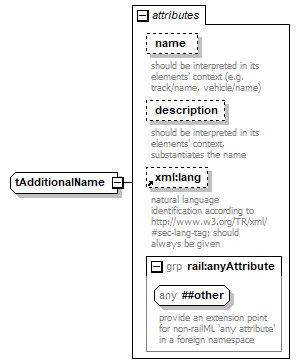 |
||||||||||||||||||||||||||||||
| namespace | https://www.railml.org/schemas/2018 | ||||||||||||||||||||||||||||||
| used by |
|
||||||||||||||||||||||||||||||
| attributes |
|
||||||||||||||||||||||||||||||
| source | <xs:complexType name="tAdditionalName"> <xs:attribute name="name" type="rail:tGenericName"> <xs:annotation> <xs:documentation>should be interpreted in its elements' context (e.g. track/name, vehicle/name)</xs:documentation> </xs:annotation> </xs:attribute> <xs:attribute name="description" type="rail:tElementDescription"> <xs:annotation> <xs:documentation>should be interpreted in its elements' context, substantiates the name</xs:documentation> </xs:annotation> </xs:attribute> <xs:attribute ref="xml:lang"> <xs:annotation> <xs:documentation>natural language identification according to http://www.w3.org/TR/xml/#sec-lang-tag; should always be given</xs:documentation> </xs:annotation> </xs:attribute> <xs:attributeGroup ref="rail:anyAttribute"/> </xs:complexType> |
attribute tAdditionalName/@name
| type | rail:tGenericName | ||
| annotation |
|
||
| source | <xs:attribute name="name" type="rail:tGenericName"> <xs:annotation> <xs:documentation>should be interpreted in its elements' context (e.g. track/name, vehicle/name)</xs:documentation> </xs:annotation> </xs:attribute> |
attribute tAdditionalName/@description
| type | rail:tElementDescription | ||
| annotation |
|
||
| source | <xs:attribute name="description" type="rail:tElementDescription"> <xs:annotation> <xs:documentation>should be interpreted in its elements' context, substantiates the name</xs:documentation> </xs:annotation> </xs:attribute> |
complexType tElementRefInGroup
| diagram | 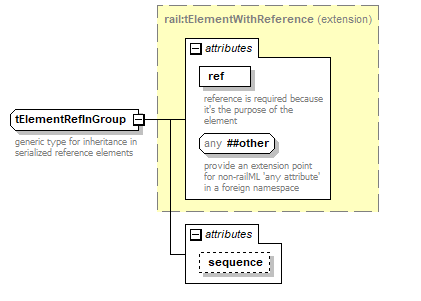 |
||||||||||||||||||||
| namespace | https://www.railml.org/schemas/2018 | ||||||||||||||||||||
| type | extension of rail:tElementWithReference | ||||||||||||||||||||
| properties |
|
||||||||||||||||||||
| used by |
|
||||||||||||||||||||
| attributes |
|
||||||||||||||||||||
| annotation |
|
||||||||||||||||||||
| source | <xs:complexType name="tElementRefInGroup"> <xs:annotation> <xs:documentation>generic type for inheritance in serialized reference elements</xs:documentation> </xs:annotation> <xs:complexContent> <xs:extension base="rail:tElementWithReference"> <xs:attribute name="sequence" type="rail:tPositiveCounter"/> </xs:extension> </xs:complexContent> </xs:complexType> |
attribute tElementRefInGroup/@sequence
| type | rail:tPositiveCounter |
| source | <xs:attribute name="sequence" type="rail:tPositiveCounter"/> |
complexType tElementWithIDAndName
| diagram | 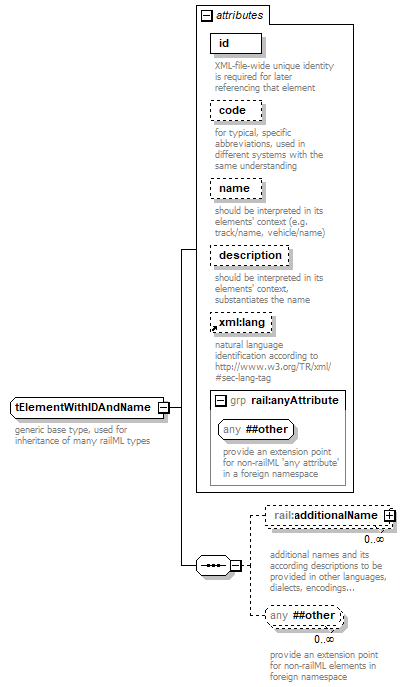 |
||||||||||||||||||||||||||||||||||||||||||||||
| namespace | https://www.railml.org/schemas/2018 | ||||||||||||||||||||||||||||||||||||||||||||||
| children | rail:additionalName | ||||||||||||||||||||||||||||||||||||||||||||||
| used by |
|
||||||||||||||||||||||||||||||||||||||||||||||
| attributes |
|
||||||||||||||||||||||||||||||||||||||||||||||
| annotation |
|
||||||||||||||||||||||||||||||||||||||||||||||
| source | <xs:complexType name="tElementWithIDAndName"> <xs:annotation> <xs:documentation>generic base type, used for inheritance of many railML types</xs:documentation> </xs:annotation> <xs:sequence> <xs:element name="additionalName" type="rail:tAdditionalName" minOccurs="0" maxOccurs="unbounded"> <xs:annotation> <xs:documentation>additional names and its according descriptions to be provided in other languages, dialects, encodings...</xs:documentation> <xs:documentation source="http://wiki.railml.org/index.php?title=IS:additionalName_infrastructure"/> <xs:documentation source="http://wiki.railml.org/index.php?title=IS:additionalName_track"/> <xs:documentation source="http://wiki.railml.org/index.php?title=IS:additionalName_mileageChange"/> <xs:documentation source="http://wiki.railml.org/index.php?title=IS:additionalName_switch"/> <xs:documentation source="http://wiki.railml.org/index.php?title=IS:additionalName_crossing"/> <xs:documentation source="http://wiki.railml.org/index.php?title=IS:additionalName_crossSection"/> <xs:documentation source="http://wiki.railml.org/index.php?title=IS:additionalName_border"/> <xs:documentation source="http://wiki.railml.org/index.php?title=IS:additionalName_speedChange"/> <xs:documentation source="http://wiki.railml.org/index.php?title=IS:additionalName_gradientChange"/> <xs:documentation source="http://wiki.railml.org/index.php?title=IS:additionalName_radiusChange"/> <xs:documentation source="http://wiki.railml.org/index.php?title=IS:additionalName_tunnel"/> <xs:documentation source="http://wiki.railml.org/index.php?title=IS:additionalName_brigde"/> <xs:documentation source="http://wiki.railml.org/index.php?title=IS:additionalName_levelCrossing"/> <xs:documentation source="http://wiki.railml.org/index.php?title=IS:additionalName_ownerChange"/> <xs:documentation source="http://wiki.railml.org/index.php?title=IS:additionalName_operationModeChange"/> <xs:documentation source="http://wiki.railml.org/index.php?title=IS:additionalName_trainProtectionChange"/> <xs:documentation source="http://wiki.railml.org/index.php?title=IS:additionalName_electrificationChange"/> <xs:documentation source="http://wiki.railml.org/index.php?title=IS:additionalName_powerTransmissionChange"/> <xs:documentation source="http://wiki.railml.org/index.php?title=IS:additionalName_axleWeightChange"/> <xs:documentation source="http://wiki.railml.org/index.php?title=IS:additionalName_gaugeChange"/> <xs:documentation source="http://wiki.railml.org/index.php?title=IS:additionalName_geoMapping"/> <xs:documentation source="http://wiki.railml.org/index.php?title=IS:additionalName_trackCondition"/> <xs:documentation source="http://wiki.railml.org/index.php?title=IS:additionalName_platformEdge"/> <xs:documentation source="http://wiki.railml.org/index.php?title=IS:additionalName_serviceSection"/> <xs:documentation source="http://wiki.railml.org/index.php?title=IS:additionalName_signal"/> <xs:documentation source="http://wiki.railml.org/index.php?title=IS:additionalName_signalGroup"/> <xs:documentation source="http://wiki.railml.org/index.php?title=IS:additionalName_trainDetector"/> <xs:documentation source="http://wiki.railml.org/index.php?title=IS:additionalName_trackCircuitBorder"/> <xs:documentation source="http://wiki.railml.org/index.php?title=IS:additionalName_balise"/> <xs:documentation source="http://wiki.railml.org/index.php?title=IS:additionalName_trainProtectionElement"/> <xs:documentation source="http://wiki.railml.org/index.php?title=IS:additionalName_line"/> <xs:documentation source="http://wiki.railml.org/index.php?title=IS:additionalName_locallyControlledArea"/> <xs:documentation source="http://wiki.railml.org/index.php?title=IS:additionalName_ocp"/> <xs:documentation source="http://wiki.railml.org/index.php?title=IS:additionalName_propOther"/> <xs:documentation source="http://wiki.railml.org/index.php?title=IS:additionalName_controller"/> <xs:documentation source="http://wiki.railml.org/index.php?title=IS:additionalName_speedProfile"/> <xs:documentation source="http://wiki.railml.org/index.php?title=IS:additionalName_macroscopicInfrastructureElement"/> <xs:documentation source="http://wiki.railml.org/index.php?title=RS:additionalName_rollingstock"/> <xs:documentation source="http://wiki.railml.org/index.php?title=RS:additionalName_vehicle"/> <xs:documentation source="http://wiki.railml.org/index.php?title=RS:additionalName_propulsion"/> <xs:documentation source="http://wiki.railml.org/index.php?title=RS:additionalName_energyStorage"/> <xs:documentation source="http://wiki.railml.org/index.php?title=RS:additionalName_etcs"/> <xs:documentation source="http://wiki.railml.org/index.php?title=RS:additionalName_specificTransmissionModule"/> <xs:documentation source="http://wiki.railml.org/index.php?title=RS:additionalName_nationalSystem"/> <xs:documentation source="http://wiki.railml.org/index.php?title=RS:additionalName_trainRadio"/> <xs:documentation source="http://wiki.railml.org/index.php?title=RS:additionalName_otherEquipment"/> <xs:documentation source="http://wiki.railml.org/index.php?title=RS:additionalName_formation"/> <xs:documentation source="http://wiki.railml.org/index.php?title=TT:additionalName_timetable"/> <xs:documentation source="http://wiki.railml.org/index.php?title=TT:additionalName_timetablePeriod"/> <xs:documentation source="http://wiki.railml.org/index.php?title=TT:additionalName_operatingPeriod"/> <xs:documentation source="http://wiki.railml.org/index.php?title=TT:additionalName_category"/> <xs:documentation source="http://wiki.railml.org/index.php?title=TT:additionalName_trainPart"/> <xs:documentation source="http://wiki.railml.org/index.php?title=TT:additionalName_train"/> <xs:documentation source="http://wiki.railml.org/index.php?title=TT:additionalName_trainGroup"/> <xs:documentation source="http://wiki.railml.org/index.php?title=TT:additionalName_rostering"/> <xs:documentation source="http://wiki.railml.org/index.php?title=TT:additionalName_blockPart"/> <xs:documentation source="http://wiki.railml.org/index.php?title=TT:additionalName_block"/> </xs:annotation> </xs:element> <xs:any namespace="##other" processContents="strict" minOccurs="0" maxOccurs="unbounded"> <xs:annotation> <xs:documentation>provide an extension point for non-railML elements in foreign namespace</xs:documentation> </xs:annotation> </xs:any> </xs:sequence> <xs:attribute name="id" type="rail:tGenericID" use="required"> <xs:annotation> <xs:documentation>XML-file-wide unique identity is required for later referencing that element</xs:documentation> </xs:annotation> </xs:attribute> <xs:attribute name="code" type="rail:tGenericName"> <xs:annotation> <xs:documentation>for typical, specific abbreviations, used in different systems with the same understanding</xs:documentation> </xs:annotation> </xs:attribute> <xs:attribute name="name" type="rail:tGenericName"> <xs:annotation> <xs:documentation>should be interpreted in its elements' context (e.g. track/name, vehicle/name)</xs:documentation> </xs:annotation> </xs:attribute> <xs:attribute name="description" type="rail:tElementDescription"> <xs:annotation> <xs:documentation>should be interpreted in its elements' context, substantiates the name</xs:documentation> </xs:annotation> </xs:attribute> <xs:attribute ref="xml:lang"> <xs:annotation> <xs:documentation>natural language identification according to http://www.w3.org/TR/xml/#sec-lang-tag</xs:documentation> </xs:annotation> </xs:attribute> <xs:attributeGroup ref="rail:anyAttribute"/> </xs:complexType> |
attribute tElementWithIDAndName/@id
| type | rail:tGenericID | ||
| properties |
|
||
| annotation |
|
||
| source | <xs:attribute name="id" type="rail:tGenericID" use="required"> <xs:annotation> <xs:documentation>XML-file-wide unique identity is required for later referencing that element</xs:documentation> </xs:annotation> </xs:attribute> |
attribute tElementWithIDAndName/@code
| type | rail:tGenericName | ||
| annotation |
|
||
| source | <xs:attribute name="code" type="rail:tGenericName"> <xs:annotation> <xs:documentation>for typical, specific abbreviations, used in different systems with the same understanding</xs:documentation> </xs:annotation> </xs:attribute> |
attribute tElementWithIDAndName/@name
| type | rail:tGenericName | ||
| annotation |
|
||
| source | <xs:attribute name="name" type="rail:tGenericName"> <xs:annotation> <xs:documentation>should be interpreted in its elements' context (e.g. track/name, vehicle/name)</xs:documentation> </xs:annotation> </xs:attribute> |
attribute tElementWithIDAndName/@description
| type | rail:tElementDescription | ||
| annotation |
|
||
| source | <xs:attribute name="description" type="rail:tElementDescription"> <xs:annotation> <xs:documentation>should be interpreted in its elements' context, substantiates the name</xs:documentation> </xs:annotation> </xs:attribute> |
element tElementWithIDAndName/additionalName
| diagram | 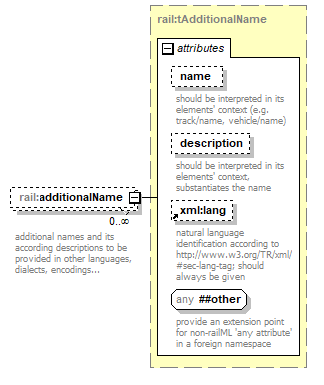 |
||||||||||||||||||||||||||||||
| namespace | https://www.railml.org/schemas/2018 | ||||||||||||||||||||||||||||||
| type | rail:tAdditionalName | ||||||||||||||||||||||||||||||
| properties |
|
||||||||||||||||||||||||||||||
| attributes |
|
||||||||||||||||||||||||||||||
| annotation |
|
||||||||||||||||||||||||||||||
| source | <xs:element name="additionalName" type="rail:tAdditionalName" minOccurs="0" maxOccurs="unbounded"> <xs:annotation> <xs:documentation>additional names and its according descriptions to be provided in other languages, dialects, encodings...</xs:documentation> <xs:documentation source="http://wiki.railml.org/index.php?title=IS:additionalName_infrastructure"/> <xs:documentation source="http://wiki.railml.org/index.php?title=IS:additionalName_track"/> <xs:documentation source="http://wiki.railml.org/index.php?title=IS:additionalName_mileageChange"/> <xs:documentation source="http://wiki.railml.org/index.php?title=IS:additionalName_switch"/> <xs:documentation source="http://wiki.railml.org/index.php?title=IS:additionalName_crossing"/> <xs:documentation source="http://wiki.railml.org/index.php?title=IS:additionalName_crossSection"/> <xs:documentation source="http://wiki.railml.org/index.php?title=IS:additionalName_border"/> <xs:documentation source="http://wiki.railml.org/index.php?title=IS:additionalName_speedChange"/> <xs:documentation source="http://wiki.railml.org/index.php?title=IS:additionalName_gradientChange"/> <xs:documentation source="http://wiki.railml.org/index.php?title=IS:additionalName_radiusChange"/> <xs:documentation source="http://wiki.railml.org/index.php?title=IS:additionalName_tunnel"/> <xs:documentation source="http://wiki.railml.org/index.php?title=IS:additionalName_brigde"/> <xs:documentation source="http://wiki.railml.org/index.php?title=IS:additionalName_levelCrossing"/> <xs:documentation source="http://wiki.railml.org/index.php?title=IS:additionalName_ownerChange"/> <xs:documentation source="http://wiki.railml.org/index.php?title=IS:additionalName_operationModeChange"/> <xs:documentation source="http://wiki.railml.org/index.php?title=IS:additionalName_trainProtectionChange"/> <xs:documentation source="http://wiki.railml.org/index.php?title=IS:additionalName_electrificationChange"/> <xs:documentation source="http://wiki.railml.org/index.php?title=IS:additionalName_powerTransmissionChange"/> <xs:documentation source="http://wiki.railml.org/index.php?title=IS:additionalName_axleWeightChange"/> <xs:documentation source="http://wiki.railml.org/index.php?title=IS:additionalName_gaugeChange"/> <xs:documentation source="http://wiki.railml.org/index.php?title=IS:additionalName_geoMapping"/> <xs:documentation source="http://wiki.railml.org/index.php?title=IS:additionalName_trackCondition"/> <xs:documentation source="http://wiki.railml.org/index.php?title=IS:additionalName_platformEdge"/> <xs:documentation source="http://wiki.railml.org/index.php?title=IS:additionalName_serviceSection"/> <xs:documentation source="http://wiki.railml.org/index.php?title=IS:additionalName_signal"/> <xs:documentation source="http://wiki.railml.org/index.php?title=IS:additionalName_signalGroup"/> <xs:documentation source="http://wiki.railml.org/index.php?title=IS:additionalName_trainDetector"/> <xs:documentation source="http://wiki.railml.org/index.php?title=IS:additionalName_trackCircuitBorder"/> <xs:documentation source="http://wiki.railml.org/index.php?title=IS:additionalName_balise"/> <xs:documentation source="http://wiki.railml.org/index.php?title=IS:additionalName_trainProtectionElement"/> <xs:documentation source="http://wiki.railml.org/index.php?title=IS:additionalName_line"/> <xs:documentation source="http://wiki.railml.org/index.php?title=IS:additionalName_locallyControlledArea"/> <xs:documentation source="http://wiki.railml.org/index.php?title=IS:additionalName_ocp"/> <xs:documentation source="http://wiki.railml.org/index.php?title=IS:additionalName_propOther"/> <xs:documentation source="http://wiki.railml.org/index.php?title=IS:additionalName_controller"/> <xs:documentation source="http://wiki.railml.org/index.php?title=IS:additionalName_speedProfile"/> <xs:documentation source="http://wiki.railml.org/index.php?title=IS:additionalName_macroscopicInfrastructureElement"/> <xs:documentation source="http://wiki.railml.org/index.php?title=RS:additionalName_rollingstock"/> <xs:documentation source="http://wiki.railml.org/index.php?title=RS:additionalName_vehicle"/> <xs:documentation source="http://wiki.railml.org/index.php?title=RS:additionalName_propulsion"/> <xs:documentation source="http://wiki.railml.org/index.php?title=RS:additionalName_energyStorage"/> <xs:documentation source="http://wiki.railml.org/index.php?title=RS:additionalName_etcs"/> <xs:documentation source="http://wiki.railml.org/index.php?title=RS:additionalName_specificTransmissionModule"/> <xs:documentation source="http://wiki.railml.org/index.php?title=RS:additionalName_nationalSystem"/> <xs:documentation source="http://wiki.railml.org/index.php?title=RS:additionalName_trainRadio"/> <xs:documentation source="http://wiki.railml.org/index.php?title=RS:additionalName_otherEquipment"/> <xs:documentation source="http://wiki.railml.org/index.php?title=RS:additionalName_formation"/> <xs:documentation source="http://wiki.railml.org/index.php?title=TT:additionalName_timetable"/> <xs:documentation source="http://wiki.railml.org/index.php?title=TT:additionalName_timetablePeriod"/> <xs:documentation source="http://wiki.railml.org/index.php?title=TT:additionalName_operatingPeriod"/> <xs:documentation source="http://wiki.railml.org/index.php?title=TT:additionalName_category"/> <xs:documentation source="http://wiki.railml.org/index.php?title=TT:additionalName_trainPart"/> <xs:documentation source="http://wiki.railml.org/index.php?title=TT:additionalName_train"/> <xs:documentation source="http://wiki.railml.org/index.php?title=TT:additionalName_trainGroup"/> <xs:documentation source="http://wiki.railml.org/index.php?title=TT:additionalName_rostering"/> <xs:documentation source="http://wiki.railml.org/index.php?title=TT:additionalName_blockPart"/> <xs:documentation source="http://wiki.railml.org/index.php?title=TT:additionalName_block"/> </xs:annotation> </xs:element> |
complexType tElementWithIDAndNameWithoutAny
| diagram | 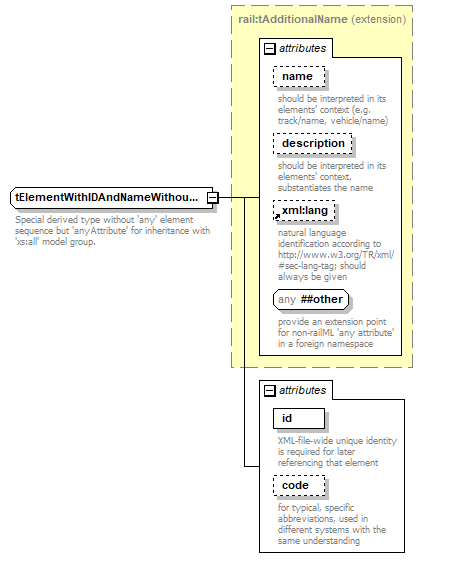 |
||||||||||||||||||||||||||||||||||||||||||||||
| namespace | https://www.railml.org/schemas/2018 | ||||||||||||||||||||||||||||||||||||||||||||||
| type | extension of rail:tAdditionalName | ||||||||||||||||||||||||||||||||||||||||||||||
| properties |
|
||||||||||||||||||||||||||||||||||||||||||||||
| used by |
|
||||||||||||||||||||||||||||||||||||||||||||||
| attributes |
|
||||||||||||||||||||||||||||||||||||||||||||||
| annotation |
|
||||||||||||||||||||||||||||||||||||||||||||||
| source | <xs:complexType name="tElementWithIDAndNameWithoutAny"> <xs:annotation> <xs:documentation>Special derived type without 'any' element sequence but 'anyAttribute' for inheritance with 'xs:all' model group.</xs:documentation> </xs:annotation> <xs:complexContent> <xs:extension base="rail:tAdditionalName"> <xs:attribute name="id" type="rail:tGenericID" use="required"> <xs:annotation> <xs:documentation>XML-file-wide unique identity is required for later referencing that element</xs:documentation> </xs:annotation> </xs:attribute> <xs:attribute name="code" type="rail:tGenericName"> <xs:annotation> <xs:documentation>for typical, specific abbreviations, used in different systems with the same understanding</xs:documentation> </xs:annotation> </xs:attribute> </xs:extension> </xs:complexContent> </xs:complexType> |
attribute tElementWithIDAndNameWithoutAny/@id
| type | rail:tGenericID | ||
| properties |
|
||
| annotation |
|
||
| source | <xs:attribute name="id" type="rail:tGenericID" use="required"> <xs:annotation> <xs:documentation>XML-file-wide unique identity is required for later referencing that element</xs:documentation> </xs:annotation> </xs:attribute> |
attribute tElementWithIDAndNameWithoutAny/@code
| type | rail:tGenericName | ||
| annotation |
|
||
| source | <xs:attribute name="code" type="rail:tGenericName"> <xs:annotation> <xs:documentation>for typical, specific abbreviations, used in different systems with the same understanding</xs:documentation> </xs:annotation> </xs:attribute> |
complexType tElementWithReference
| diagram | 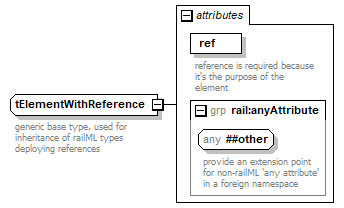 |
||||||||||||||
| namespace | https://www.railml.org/schemas/2018 | ||||||||||||||
| used by |
|
||||||||||||||
| attributes |
|
||||||||||||||
| annotation |
|
||||||||||||||
| source | <xs:complexType name="tElementWithReference"> <xs:annotation> <xs:documentation>generic base type, used for inheritance of railML types deploying references</xs:documentation> </xs:annotation> <xs:attribute name="ref" type="rail:tGenericRef" use="required"> <xs:annotation> <xs:documentation>reference is required because it's the purpose of the element</xs:documentation> </xs:annotation> </xs:attribute> <xs:attributeGroup ref="rail:anyAttribute"/> </xs:complexType> |
attribute tElementWithReference/@ref
| type | rail:tGenericRef | ||
| properties |
|
||
| annotation |
|
||
| source | <xs:attribute name="ref" type="rail:tGenericRef" use="required"> <xs:annotation> <xs:documentation>reference is required because it's the purpose of the element</xs:documentation> </xs:annotation> </xs:attribute> |
complexType tGlobalElementWithMetadata
| diagram | 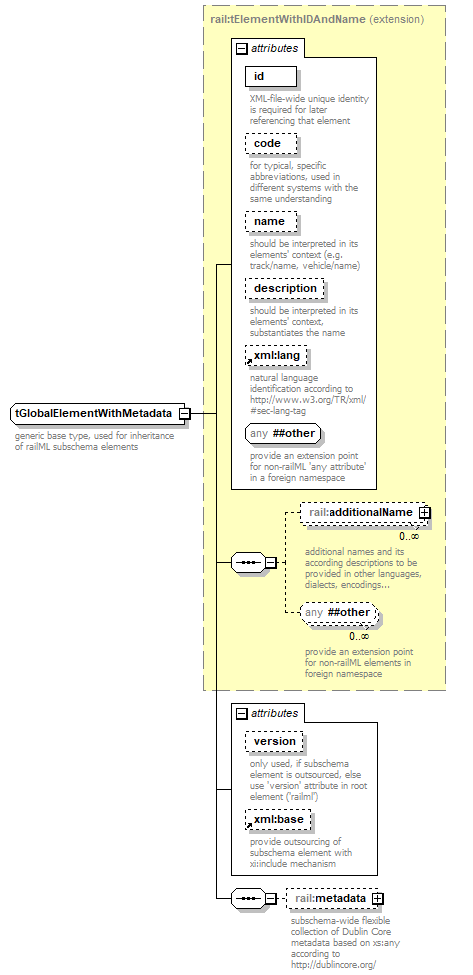 |
||||||||||||||||||||||||||||||||||||||||||||||||||||||||||||||
| namespace | https://www.railml.org/schemas/2018 | ||||||||||||||||||||||||||||||||||||||||||||||||||||||||||||||
| type | extension of rail:tElementWithIDAndName | ||||||||||||||||||||||||||||||||||||||||||||||||||||||||||||||
| properties |
|
||||||||||||||||||||||||||||||||||||||||||||||||||||||||||||||
| children | rail:additionalName rail:metadata | ||||||||||||||||||||||||||||||||||||||||||||||||||||||||||||||
| used by |
|
||||||||||||||||||||||||||||||||||||||||||||||||||||||||||||||
| attributes |
|
||||||||||||||||||||||||||||||||||||||||||||||||||||||||||||||
| annotation |
|
||||||||||||||||||||||||||||||||||||||||||||||||||||||||||||||
| source | <xs:complexType name="tGlobalElementWithMetadata"> <xs:annotation> <xs:documentation>generic base type, used for inheritance of railML subschema elements</xs:documentation> </xs:annotation> <xs:complexContent> <xs:extension base="rail:tElementWithIDAndName"> <xs:sequence> <xs:element name="metadata" type="dc:elementContainer" minOccurs="0"> <xs:annotation> <xs:documentation>subschema-wide flexible collection of Dublin Core metadata based on xs:any according to http://dublincore.org/</xs:documentation> <xs:documentation source="http://wiki.railml.org/index.php?title=IS:metadata"/> <xs:documentation source="http://wiki.railml.org/index.php?title=RS:metadata"/> <xs:documentation source="http://wiki.railml.org/index.php?title=TT:metadata"/> </xs:annotation> </xs:element> </xs:sequence> <xs:attribute name="version" type="rail:tRailMLVersion"> <xs:annotation> <xs:documentation>only used, if subschema element is outsourced, else use 'version' attribute in root element ('railml')</xs:documentation> </xs:annotation> </xs:attribute> <xs:attribute ref="xml:base"> <xs:annotation> <xs:documentation>provide outsourcing of subschema element with xi:include mechanism</xs:documentation> </xs:annotation> </xs:attribute> </xs:extension> </xs:complexContent> </xs:complexType> |
attribute tGlobalElementWithMetadata/@version
| type | rail:tRailMLVersion | ||||||
| facets |
|
||||||
| annotation |
|
||||||
| source | <xs:attribute name="version" type="rail:tRailMLVersion"> <xs:annotation> <xs:documentation>only used, if subschema element is outsourced, else use 'version' attribute in root element ('railml')</xs:documentation> </xs:annotation> </xs:attribute> |
element tGlobalElementWithMetadata/metadata
| diagram | 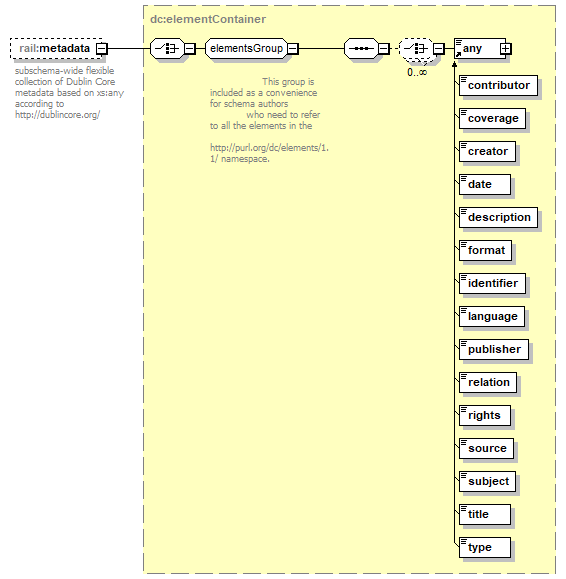 |
||||||
| namespace | https://www.railml.org/schemas/2018 | ||||||
| type | elementContainer | ||||||
| properties |
|
||||||
| children | any | ||||||
| annotation |
|
||||||
| source | <xs:element name="metadata" type="dc:elementContainer" minOccurs="0"> <xs:annotation> <xs:documentation>subschema-wide flexible collection of Dublin Core metadata based on xs:any according to http://dublincore.org/</xs:documentation> <xs:documentation source="http://wiki.railml.org/index.php?title=IS:metadata"/> <xs:documentation source="http://wiki.railml.org/index.php?title=RS:metadata"/> <xs:documentation source="http://wiki.railml.org/index.php?title=TT:metadata"/> </xs:annotation> </xs:element> |
simpleType tCoordinateList
| namespace | https://www.railml.org/schemas/2018 | |||||||||
| type | restriction of rail:tDoubleList | |||||||||
| properties |
|
|||||||||
| used by |
|
|||||||||
| facets |
|
|||||||||
| annotation |
|
|||||||||
| source | <xs:simpleType name="tCoordinateList"> <xs:annotation> <xs:documentation>an coordinate list consisting of two or three coordinates</xs:documentation> </xs:annotation> <xs:restriction base="rail:tDoubleList"> <xs:minLength value="2"/> <xs:maxLength value="3"/> </xs:restriction> </xs:simpleType> |
simpleType tCounter
| namespace | https://www.railml.org/schemas/2018 | ||
| type | xs:nonNegativeInteger | ||
| properties |
|
||
| used by |
|
||
| annotation |
|
||
| source | <xs:simpleType name="tCounter"> <xs:annotation> <xs:documentation>generic type for counters (e.g. number of equipment), allowing zero</xs:documentation> </xs:annotation> <xs:restriction base="xs:nonNegativeInteger"/> </xs:simpleType> |
simpleType tDigitString
| namespace | https://www.railml.org/schemas/2018 | ||||||
| type | restriction of xs:string | ||||||
| properties |
|
||||||
| used by |
|
||||||
| facets |
|
||||||
| annotation |
|
||||||
| source | <xs:simpleType name="tDigitString"> <xs:annotation> <xs:documentation>an arbitrary string consisting of digits from 0 to 9; not allowing white space, letters; no length restriction</xs:documentation> </xs:annotation> <xs:restriction base="xs:string"> <xs:pattern value="[0-9]*"/> </xs:restriction> </xs:simpleType> |
simpleType tDoubleList
| namespace | https://www.railml.org/schemas/2018 | ||
| type | list of xs:double | ||
| properties |
|
||
| used by |
|
||
| annotation |
|
||
| source | <xs:simpleType name="tDoubleList"> <xs:annotation> <xs:documentation>an arbitrary list consisting of xs:double values separated by white space; no length restriction</xs:documentation> </xs:annotation> <xs:list itemType="xs:double"/> </xs:simpleType> |
simpleType tElementDescription
| namespace | https://www.railml.org/schemas/2018 | ||
| type | xs:string | ||
| properties |
|
||
| used by |
|
||
| annotation |
|
||
| source | <xs:simpleType name="tElementDescription"> <xs:annotation> <xs:documentation>an detailed description of an railway facility (e.g. station, timetable period or vehicle), allowing digits, letters and white space</xs:documentation> </xs:annotation> <xs:restriction base="xs:string"/> </xs:simpleType> |
simpleType tFiveDigits
| namespace | https://www.railml.org/schemas/2018 | |||||||||
| type | restriction of rail:tDigitString | |||||||||
| properties |
|
|||||||||
| used by |
|
|||||||||
| facets |
|
|||||||||
| annotation |
|
|||||||||
| source | <xs:simpleType name="tFiveDigits"> <xs:annotation> <xs:documentation>an identification string consisting of exactly five digits</xs:documentation> </xs:annotation> <xs:restriction base="rail:tDigitString"> <xs:length value="5"/> </xs:restriction> </xs:simpleType> |
simpleType tFiveLetterString
| namespace | https://www.railml.org/schemas/2018 | ||||||
| type | restriction of xs:string | ||||||
| properties |
|
||||||
| used by |
|
||||||
| facets |
|
||||||
| source | <xs:simpleType name="tFiveLetterString"> <xs:restriction base="xs:string"> <xs:pattern value="\w{1,5}"/> </xs:restriction> </xs:simpleType> |
simpleType tFourDigits
| namespace | https://www.railml.org/schemas/2018 | |||||||||
| type | restriction of rail:tDigitString | |||||||||
| properties |
|
|||||||||
| facets |
|
|||||||||
| annotation |
|
|||||||||
| source | <xs:simpleType name="tFourDigits"> <xs:annotation> <xs:documentation>an identification string consisting of exactly four digits</xs:documentation> </xs:annotation> <xs:restriction base="rail:tDigitString"> <xs:length value="4"/> </xs:restriction> </xs:simpleType> |
simpleType tGenericID
| namespace | https://www.railml.org/schemas/2018 | ||
| type | xs:ID | ||
| properties |
|
||
| used by |
|
||
| annotation |
|
||
| source | <xs:simpleType name="tGenericID"> <xs:annotation> <xs:documentation>an XML-side constrained bi-unique identity; unique across an XML file including its outsourced components (xi:include mechanism); white spaces not allowed</xs:documentation> </xs:annotation> <xs:restriction base="xs:ID"/> </xs:simpleType> |
simpleType tGenericName
| namespace | https://www.railml.org/schemas/2018 | ||||
| type | xs:string | ||||
| properties |
|
||||
| used by |
|
||||
| annotation |
|
||||
| source | <xs:simpleType name="tGenericName"> <xs:annotation> <xs:documentation>system-wide known name of an railway facility (e.g. station, timetable period or vehicle), allowing digits, letters and white space</xs:documentation> </xs:annotation> <xs:restriction base="xs:string"/> </xs:simpleType> |
simpleType tGenericRef
| namespace | https://www.railml.org/schemas/2018 | ||
| type | xs:IDREF | ||
| properties |
|
||
| used by |
|
||
| annotation |
|
||
| source | <xs:simpleType name="tGenericRef"> <xs:annotation> <xs:documentation>an XML-side constrained reference to one xs:ID value, acts across an XML file including its outsourced components (xi:include mechanism)</xs:documentation> </xs:annotation> <xs:restriction base="xs:IDREF"/> </xs:simpleType> |
simpleType tOneDigit
| namespace | https://www.railml.org/schemas/2018 | |||||||||
| type | restriction of rail:tDigitString | |||||||||
| properties |
|
|||||||||
| used by |
|
|||||||||
| facets |
|
|||||||||
| annotation |
|
|||||||||
| source | <xs:simpleType name="tOneDigit"> <xs:annotation> <xs:documentation>an identification string consisting of exactly one digit</xs:documentation> </xs:annotation> <xs:restriction base="rail:tDigitString"> <xs:length value="1"/> </xs:restriction> </xs:simpleType> |
simpleType tOneToZero
| namespace | https://www.railml.org/schemas/2018 | ||||||||||||
| type | restriction of xs:decimal | ||||||||||||
| properties |
|
||||||||||||
| used by |
|
||||||||||||
| facets |
|
||||||||||||
| annotation |
|
||||||||||||
| source | <xs:simpleType name="tOneToZero"> <xs:annotation> <xs:documentation>generic type for values only between 0 and 1, as efficiency or cosine phi.</xs:documentation> </xs:annotation> <xs:restriction base="xs:decimal"> <xs:minInclusive value="0"/> <xs:maxInclusive value="1"/> <xs:fractionDigits value="6"/> </xs:restriction> </xs:simpleType> |
simpleType tOtherEnumerationValue
| namespace | https://www.railml.org/schemas/2018 | ||||||
| type | restriction of xs:string | ||||||
| properties |
|
||||||
| used by |
|
||||||
| facets |
|
||||||
| annotation |
|
||||||
| source | <xs:simpleType name="tOtherEnumerationValue"> <xs:annotation> <xs:documentation>an arbitrary string starting with 'other:' followed by at minimum two characters, white space not allowed for extending railML enumeration lists</xs:documentation> </xs:annotation> <xs:restriction base="xs:string"> <xs:pattern value="other:\w{2,}"/> </xs:restriction> </xs:simpleType> |
simpleType tPositiveCounter
| namespace | https://www.railml.org/schemas/2018 | ||
| type | xs:positiveInteger | ||
| properties |
|
||
| used by |
|
||
| annotation |
|
||
| source | <xs:simpleType name="tPositiveCounter"> <xs:annotation> <xs:documentation>generic type for counters (e.g. order number of a vehicle in an formation), starting with '1'</xs:documentation> </xs:annotation> <xs:restriction base="xs:positiveInteger"/> </xs:simpleType> |
simpleType tRailMLVersion
| namespace | https://www.railml.org/schemas/2018 | ||||||
| type | restriction of xs:string | ||||||
| properties |
|
||||||
| used by |
|
||||||
| facets |
|
||||||
| annotation |
|
||||||
| source | <xs:simpleType name="tRailMLVersion"> <xs:annotation> <xs:documentation>Version Number is some official release number, rather than any internal numbering from an version control system</xs:documentation> <xs:documentation>Allows two part or three part version numbers, 1.0 up to 99.99, or 1.0.1 up to 99.99.99</xs:documentation> <xs:documentation>Allows additional SVN release numbers for testing unofficial releases: 1.1r4 or 2.0r271</xs:documentation> </xs:annotation> <xs:restriction base="xs:string"> <xs:pattern value="[1-9][0-9]?\.([0-9]|[1-9][0-9])(\.[1-9][0-9]?)?(r[1-9][0-9]?[0-9]?)?"/> </xs:restriction> </xs:simpleType> |
simpleType tThreeDigits
| namespace | https://www.railml.org/schemas/2018 | |||||||||
| type | restriction of rail:tDigitString | |||||||||
| properties |
|
|||||||||
| facets |
|
|||||||||
| annotation |
|
|||||||||
| source | <xs:simpleType name="tThreeDigits"> <xs:annotation> <xs:documentation>an identification string consisting of exactly three digits</xs:documentation> </xs:annotation> <xs:restriction base="rail:tDigitString"> <xs:length value="3"/> </xs:restriction> </xs:simpleType> |
simpleType tThreeLetterString
| namespace | https://www.railml.org/schemas/2018 | ||||||
| type | restriction of xs:string | ||||||
| properties |
|
||||||
| used by |
|
||||||
| facets |
|
||||||
| source | <xs:simpleType name="tThreeLetterString"> <xs:restriction base="xs:string"> <xs:pattern value="\w{1,3}"/> </xs:restriction> </xs:simpleType> |
simpleType tTwelveDigits
| namespace | https://www.railml.org/schemas/2018 | |||||||||
| type | restriction of rail:tDigitString | |||||||||
| properties |
|
|||||||||
| used by |
|
|||||||||
| facets |
|
|||||||||
| annotation |
|
|||||||||
| source | <xs:simpleType name="tTwelveDigits"> <xs:annotation> <xs:documentation>an identification string consisting of exactly twelve digits, e.g. UIC ident numbers</xs:documentation> </xs:annotation> <xs:restriction base="rail:tDigitString"> <xs:length value="12"/> </xs:restriction> </xs:simpleType> |
simpleType tTwoDigits
| namespace | https://www.railml.org/schemas/2018 | |||||||||
| type | restriction of rail:tDigitString | |||||||||
| properties |
|
|||||||||
| used by |
|
|||||||||
| facets |
|
|||||||||
| annotation |
|
|||||||||
| source | <xs:simpleType name="tTwoDigits"> <xs:annotation> <xs:documentation>an identification string consisting of exactly two digits</xs:documentation> </xs:annotation> <xs:restriction base="rail:tDigitString"> <xs:length value="2"/> </xs:restriction> </xs:simpleType> |
simpleType tVerbalCounter
| namespace | https://www.railml.org/schemas/2018 | ||||||||||||
| type | restriction of xs:string | ||||||||||||
| properties |
|
||||||||||||
| used by |
|
||||||||||||
| facets |
|
||||||||||||
| annotation |
|
||||||||||||
| source | <xs:simpleType name="tVerbalCounter"> <xs:annotation> <xs:documentation>generic enumeration, where digits are not common</xs:documentation> </xs:annotation> <xs:restriction base="xs:string"> <xs:enumeration value="single"/> <xs:enumeration value="double"/> <xs:enumeration value="triple"/> </xs:restriction> </xs:simpleType> |
simpleType tVersionNumber
| namespace | https://www.railml.org/schemas/2018 | ||
| type | xs:string | ||
| properties |
|
||
| used by |
|
||
| annotation |
|
||
| source | <xs:simpleType name="tVersionNumber"> <xs:annotation> <xs:documentation>an arbitrary version number for any system; allowing digits, letters and white space</xs:documentation> </xs:annotation> <xs:restriction base="xs:string"/> </xs:simpleType> |
attributeGroup anyAttribute
| namespace | https://www.railml.org/schemas/2018 | ||||||
| used by |
|
||||||
| attributes |
|
||||||
| source | <xs:attributeGroup name="anyAttribute"> <xs:anyAttribute namespace="##other"> <xs:annotation> <xs:documentation>provide an extension point for non-railML 'any attribute' in a foreign namespace</xs:documentation> </xs:annotation> </xs:anyAttribute> </xs:attributeGroup> |
element any
| diagram | 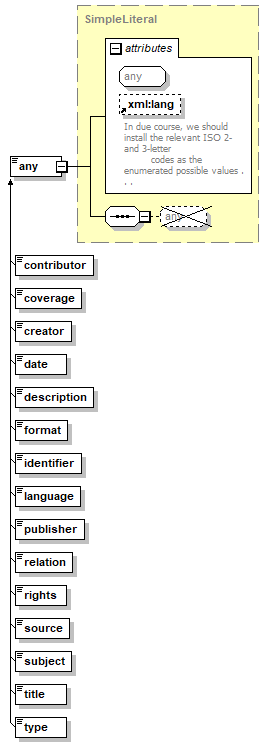 |
||||||||||||||
| namespace | http://purl.org/dc/elements/1.1/ | ||||||||||||||
| type | SimpleLiteral | ||||||||||||||
| properties |
|
||||||||||||||
| used by |
|
||||||||||||||
| attributes |
|
||||||||||||||
| source | <xs:element name="any" type="SimpleLiteral" abstract="true"/> |
element contributor
| diagram |  |
| namespace | http://purl.org/dc/elements/1.1/ |
| substitution group | any |
| source | <xs:element name="contributor" substitutionGroup="any"/> |
element coverage
| diagram |  |
| namespace | http://purl.org/dc/elements/1.1/ |
| substitution group | any |
| source | <xs:element name="coverage" substitutionGroup="any"/> |
element creator
| diagram |  |
| namespace | http://purl.org/dc/elements/1.1/ |
| substitution group | any |
| source | <xs:element name="creator" substitutionGroup="any"/> |
element date
| diagram |  |
| namespace | http://purl.org/dc/elements/1.1/ |
| substitution group | any |
| source | <xs:element name="date" substitutionGroup="any"/> |
element description
| diagram |  |
| namespace | http://purl.org/dc/elements/1.1/ |
| substitution group | any |
| source | <xs:element name="description" substitutionGroup="any"/> |
element format
| diagram |  |
| namespace | http://purl.org/dc/elements/1.1/ |
| substitution group | any |
| source | <xs:element name="format" substitutionGroup="any"/> |
element identifier
| diagram |  |
| namespace | http://purl.org/dc/elements/1.1/ |
| substitution group | any |
| source | <xs:element name="identifier" substitutionGroup="any"/> |
element language
| diagram |  |
| namespace | http://purl.org/dc/elements/1.1/ |
| substitution group | any |
| source | <xs:element name="language" substitutionGroup="any"/> |
element publisher
| diagram |  |
| namespace | http://purl.org/dc/elements/1.1/ |
| substitution group | any |
| source | <xs:element name="publisher" substitutionGroup="any"/> |
element relation
| diagram |  |
| namespace | http://purl.org/dc/elements/1.1/ |
| substitution group | any |
| source | <xs:element name="relation" substitutionGroup="any"/> |
element rights
| diagram |  |
| namespace | http://purl.org/dc/elements/1.1/ |
| substitution group | any |
| source | <xs:element name="rights" substitutionGroup="any"/> |
element source
| diagram |  |
| namespace | http://purl.org/dc/elements/1.1/ |
| substitution group | any |
| source | <xs:element name="source" substitutionGroup="any"/> |
element subject
| diagram |  |
| namespace | http://purl.org/dc/elements/1.1/ |
| substitution group | any |
| source | <xs:element name="subject" substitutionGroup="any"/> |
element title
| diagram |  |
| namespace | http://purl.org/dc/elements/1.1/ |
| substitution group | any |
| source | <xs:element name="title" substitutionGroup="any"/> |
element type
| diagram |  |
| namespace | http://purl.org/dc/elements/1.1/ |
| substitution group | any |
| source | <xs:element name="type" substitutionGroup="any"/> |
group elementsGroup
| diagram | 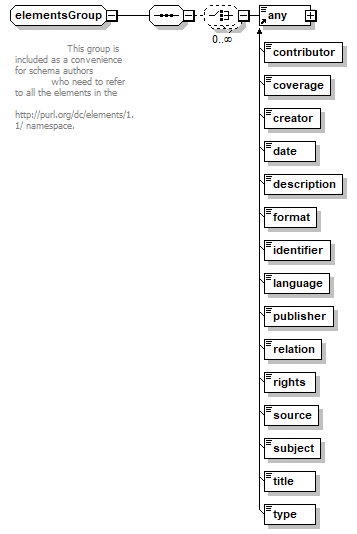 |
||
| namespace | http://purl.org/dc/elements/1.1/ | ||
| children | any | ||
| used by |
|
||
| annotation |
|
||
| source | <xs:group name="elementsGroup"> <xs:annotation> <xs:documentation xml:lang="en"> This group is included as a convenience for schema authors who need to refer to all the elements in the http://purl.org/dc/elements/1.1/ namespace. </xs:documentation> </xs:annotation> <xs:sequence> <xs:choice minOccurs="0" maxOccurs="unbounded"> <xs:element ref="any"/> </xs:choice> </xs:sequence> </xs:group> |
complexType elementContainer
| diagram | 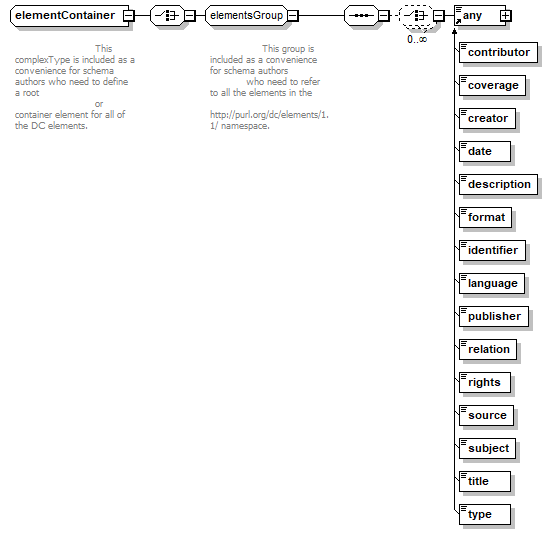 |
||||
| namespace | http://purl.org/dc/elements/1.1/ | ||||
| children | any | ||||
| used by |
|
||||
| annotation |
|
||||
| source | <xs:complexType name="elementContainer"> <xs:annotation> <xs:documentation xml:lang="en"> This complexType is included as a convenience for schema authors who need to define a root or container element for all of the DC elements. </xs:documentation> </xs:annotation> <xs:choice> <xs:group ref="elementsGroup"/> </xs:choice> </xs:complexType> |
complexType SimpleLiteral
| diagram | 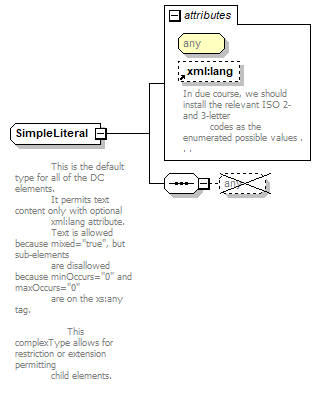 |
||||||||||||||
| namespace | http://purl.org/dc/elements/1.1/ | ||||||||||||||
| type | restriction of xs:anyType | ||||||||||||||
| properties |
|
||||||||||||||
| used by |
|
||||||||||||||
| attributes |
|
||||||||||||||
| annotation |
|
||||||||||||||
| source | <xs:complexType name="SimpleLiteral" mixed="true"> <xs:annotation> <xs:documentation xml:lang="en"> This is the default type for all of the DC elements. It permits text content only with optional xml:lang attribute. Text is allowed because mixed="true", but sub-elements are disallowed because minOccurs="0" and maxOccurs="0" are on the xs:any tag. This complexType allows for restriction or extension permitting child elements. </xs:documentation> </xs:annotation> <xs:complexContent> <xs:restriction base="xs:anyType"> <xs:sequence> <xs:any processContents="lax" minOccurs="0" maxOccurs="0"/> </xs:sequence> <xs:attribute ref="xml:lang" use="optional"/> </xs:restriction> </xs:complexContent> </xs:complexType> |
XML Schema documentation generated by XMLSpy Schema Editor http://www.altova.com/xmlspy